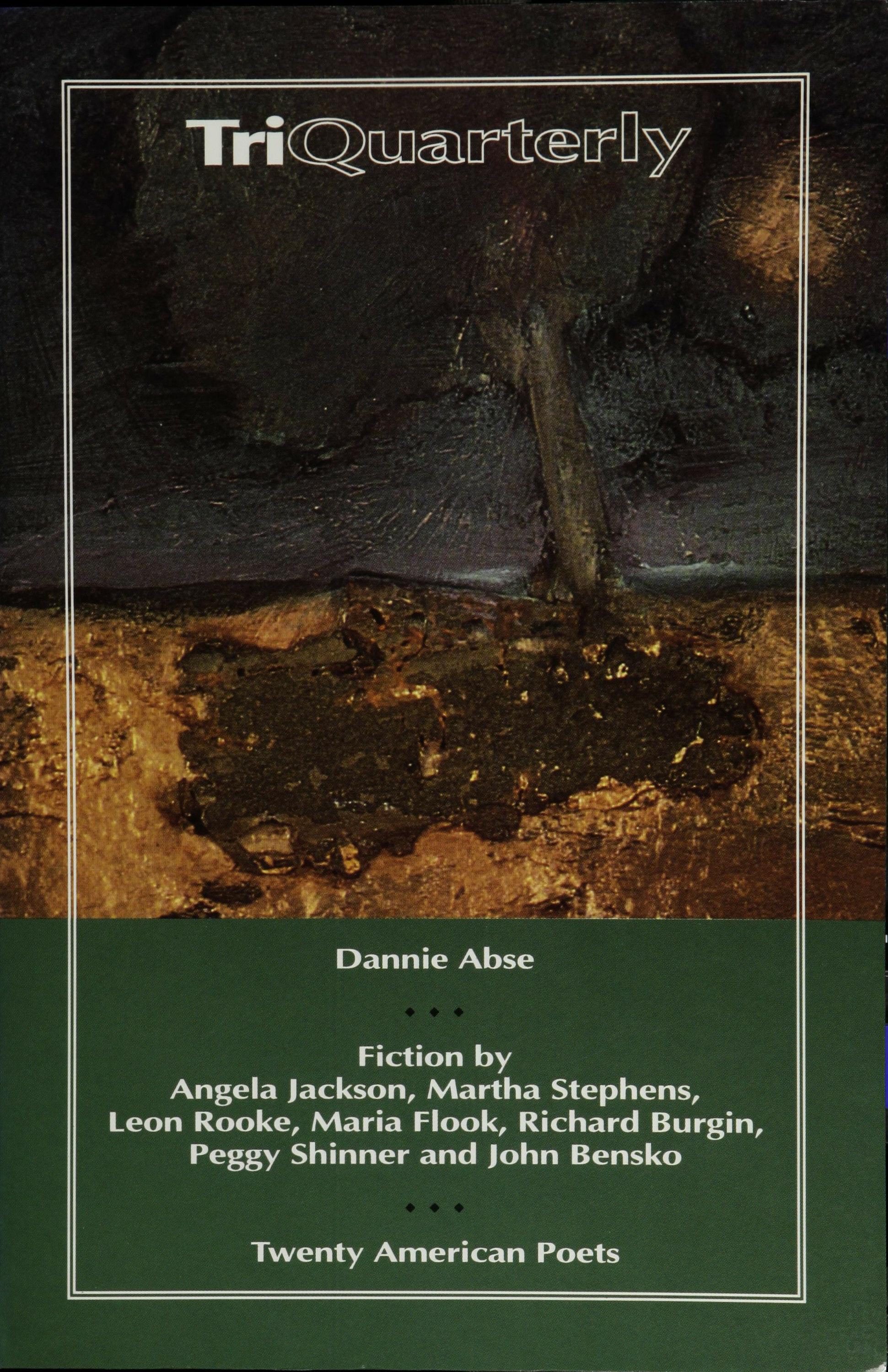
Publication of TriQuarterly is made possible in part by the donors of gifts and grants to the magazine. For their recent and continuing support, we are very pleased to thank the Illinois Arts Council, the Lannan Foundation, the John D. and Catherine T. MacArthur Foundation, the National Endowment for the Arts, the Sara Lee Foundation, the Wendling Foundation, and individual donors.
TriQuarterly also thanks the following recent donors and life subscribers:
Simon J. Blattner, Jr.
Louise Blosten
Paul Brownfield
Robert Creamer
Eleanore Devine
W. S. Di Piero
John B. Elliott
Mr. and Mrs. H. Bernard Firestone
C. Dwight Foster
Amy Godine
Jay Harkey
Mr. and Mrs. David C. Hilliard
Irwin T. Holtzman
Helen Jacob
Loy E. Knapp
Greg Kuzma
Patrick Mangan

Charles T. Martin
Florence D. McMillan
Mr. and Mrs. Andrew McNally
Dorothy J. Mikuska
Michal Miller
William T. Morgan, Jr.
Alicia Ostriker
Linda Pastan
Fran Podulka
Mark Rudman
Gilaine Shindelman
Allen R. Smart
Gary Soto
Susan A. Stewart
Lawrence Stewart
Dorothy H. Taylor
Scott Turow
NOTE: TriQuarterly welcomes financial support in the form of donations, bequests and planned gifts. Please write to Reginald Gibbons, editor. Please see the last page and the inside back cover for names of individual donors to TriQuarterly.
SPRING 1996 BOOKS AND BACKLIST

SHOOTING THE WORKS
w. s. DI PIERO
Shooting the Works: On Poetry and Pictures
These essays are elegant and passionate tributes to the intersection of art and self, from educated ruminations on the frescoes ofFlorence's Santa Maria del Carmine to the politics of Pound to reflections on his workingclass background and poetic development. Di Piero may be the most giftedpoet-critic ofhis generation.
Di Piero's taste andjudgments are refreshingly idiosyncratic, his frame ofreference broad. -PUBLISHERS WEEKLY
W. S. Di Piero is the author of six volumes of poetry and two earlier volumes of essays on art, literature and personalexperience. He has also produced acclaimed translations from Italian poetry. He is a professor of English and creative writing at Stanford University.
230 pages $29.95, cloth (0-8101-5051-4) $14.95, paper (0-8101-5052-2)
•• ••
TriQuarterly New Writers
Edited by Reginald Gibbons and Susan Hahn
words, words, words.
Paint's the thing. The rich, rhythmic slide through veins drained of blood. The heart
stripped to brittleness and ache, the job that deadens, the devouring, cowering family, all, all, all
redeemed -from "The Sexual Jackson Pollock" by Terri Brown-Davidson
136 pages
$39.95, cloth (0-8101-5057-3)
$14.95, paper (0-8101-5058-1)
BRUCE WEIGL
Sweet Lorain
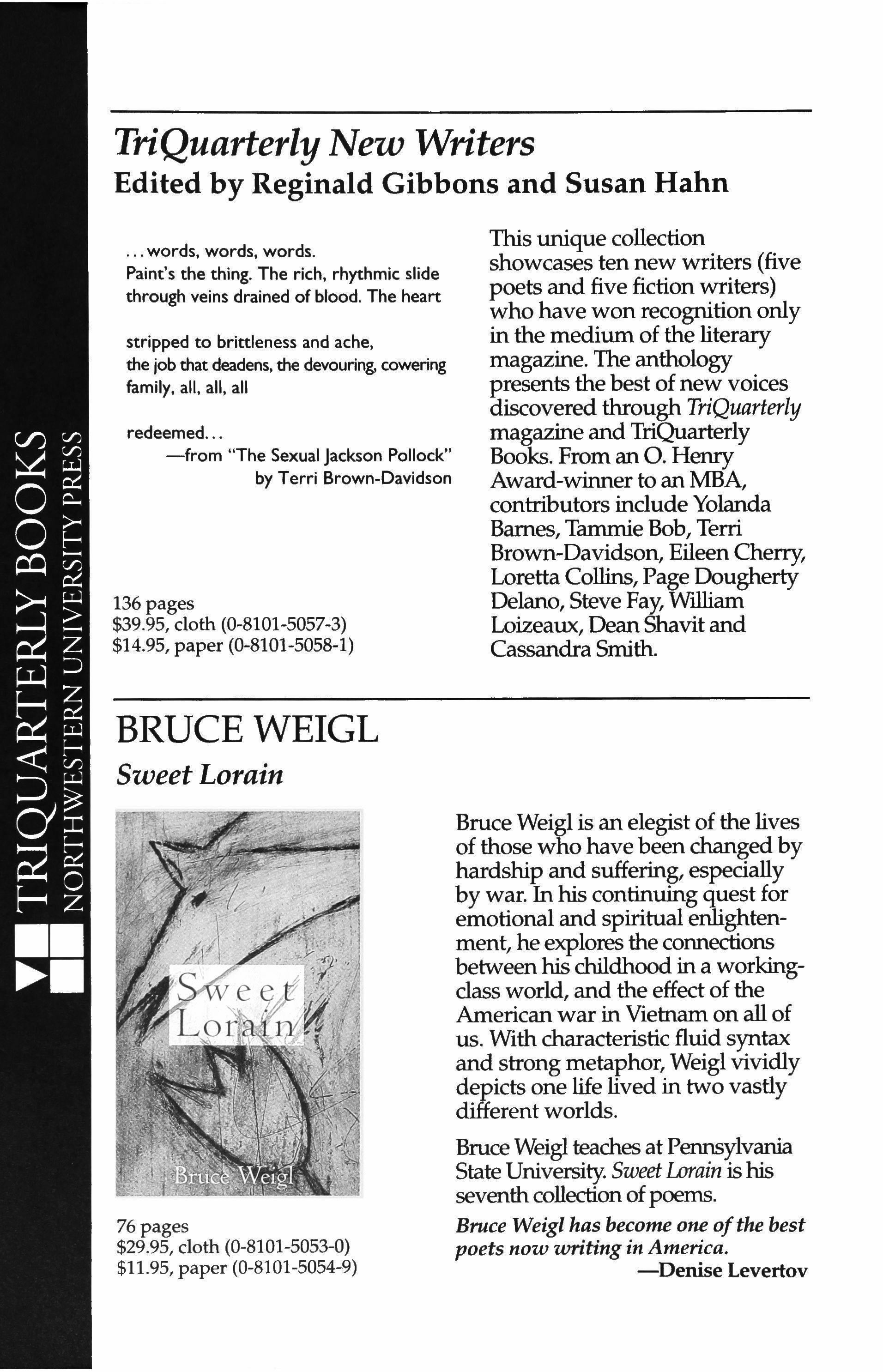
76 pages
$29.95, cloth (0-8101-5053-0)
$11.95, paper (0-8101-5054-9)
This unique collection showcases ten new writers (five poets and five fiction writers) who have won recognition only in the medium of the literary magazine. The anthology presents the best of new voices discovered through TriQuarterly magazine and TriQuarterly Books. From an 0. Henry Award-winner to an MBA, contributors include Yolanda Barnes, Tammie Bob, Terri Brown-Davidson, Eileen Cherry, Loretta Collins, Page Dougherty Delano, Steve Fay, William Loizeaux, Dean Shavit and Cassandra Smith.
Bruce Weigl is an elegist of the lives of those who have been changed by hardship and suffering, especially by war. In his continuing quest for emotional and spiritual enlightenment, he explores the connections between his childhood in a workingclass world, and the effect of the American war in Vietnam on all of us. With characteristic fluid syntax and strong metaphor, Weigl vividly depicts one life lived in two vastly different worlds.
Bruce Weigl teaches at Pennsylvania State University. Sweet Lorain is his seventh collection ofpoems.
Bruce Weigl has become one ofthe best poets now writing in America.
-Denise Levertov
STERLING A. BROWN
The Collected Poems ofSterling A. Brown
EDITED BY MICHAEL S. HARPER
One of the most important of American poets, Sterling Brown is a contemporary of Langston Hughes, Claude McKay and Jean Toomer. At once thoughtful and daring, Brown is known for his handling of folk materials, for his lack of pretension, and for his frank and unflinching portrayal of the Southern African-American experience. This is the definitive collection of his poems, and the only edition available in the U.S.
This is a great book ofpoems, stunningin its artistry andgigantic in its vision.
-Philip Levine
WILLIAM OLSEN
Vision of a Storm Cloud
Olsen's poems are energetic, expansive and romantic; his ability to manipulate language, image and form harkens back to the traditions of Blake and Whitman, while his range of subject and his use of metaphor forge his own uniqueand contemporary-artistic signature. These poems are a rich, dense and polished example of the voice of a strong new poet.
William Olsen teaches English at the University of Western Michigan. His poems have appeared in numerous periodicals, including the Paris Review, the Nation, the New Republic and Crazyhorse.
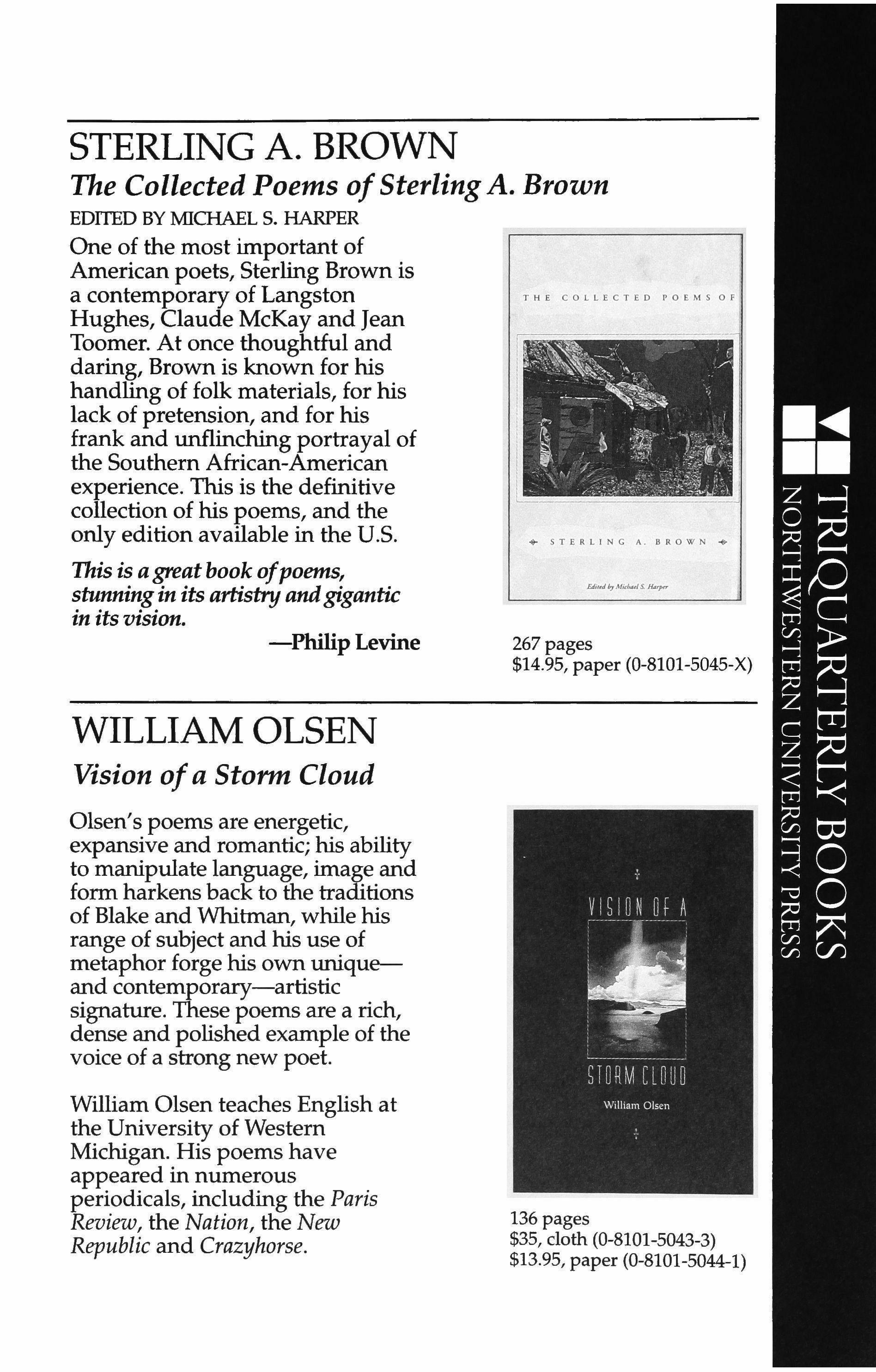
267 pages $14.95, paper (0-8101-5045-X)
136 pages $35, cloth (0-8101-5043-3) $13.95, paper (0-8101-5044-1)
THE COLLECTED POEMS OF + STERLING A. BROWN -t:r £tI;/uJity/lfic/" IS.H4,],"
CYRUS COLTER
The Beach Umbrella and Other Stories
'This is the long-awaited reissue of the award-winning stories of one of America's great authors. Set mostly on Chicago's South Side, these eighteen stories describe ordinarypeople whose live are transformed by small acts of chance of will. From depictions of the black middle class to the dank and dirty tenements of the lonelycity, Colter's sharp, spare prose etches perceptive portraits of people who endure and overcome the most severe threats to their spirits.
Cyrus Colter tackles epic themes as though they were wild horses-and he tames them.
-Studs Terkel
225 pages $14.95, paper (0-8101-5050-6)
CYRUS COLTER
A Chocolate Soldier
Colter's fourth novel is a cautionary tale of revolutionary dreams, bitter realities, and the persistence of both hope and falsehood. A kind of historical fable about the possibilities and perils ofblack revolution within and against twentieth-century white America, this novel is brilliantly structured and voiced. It is Colter's greatest and crowning work, and no reader will forget the tale it tells.
This powerful writer should win the attention ofevery serious reader of fiction.
-5AruRDAY REVIEW
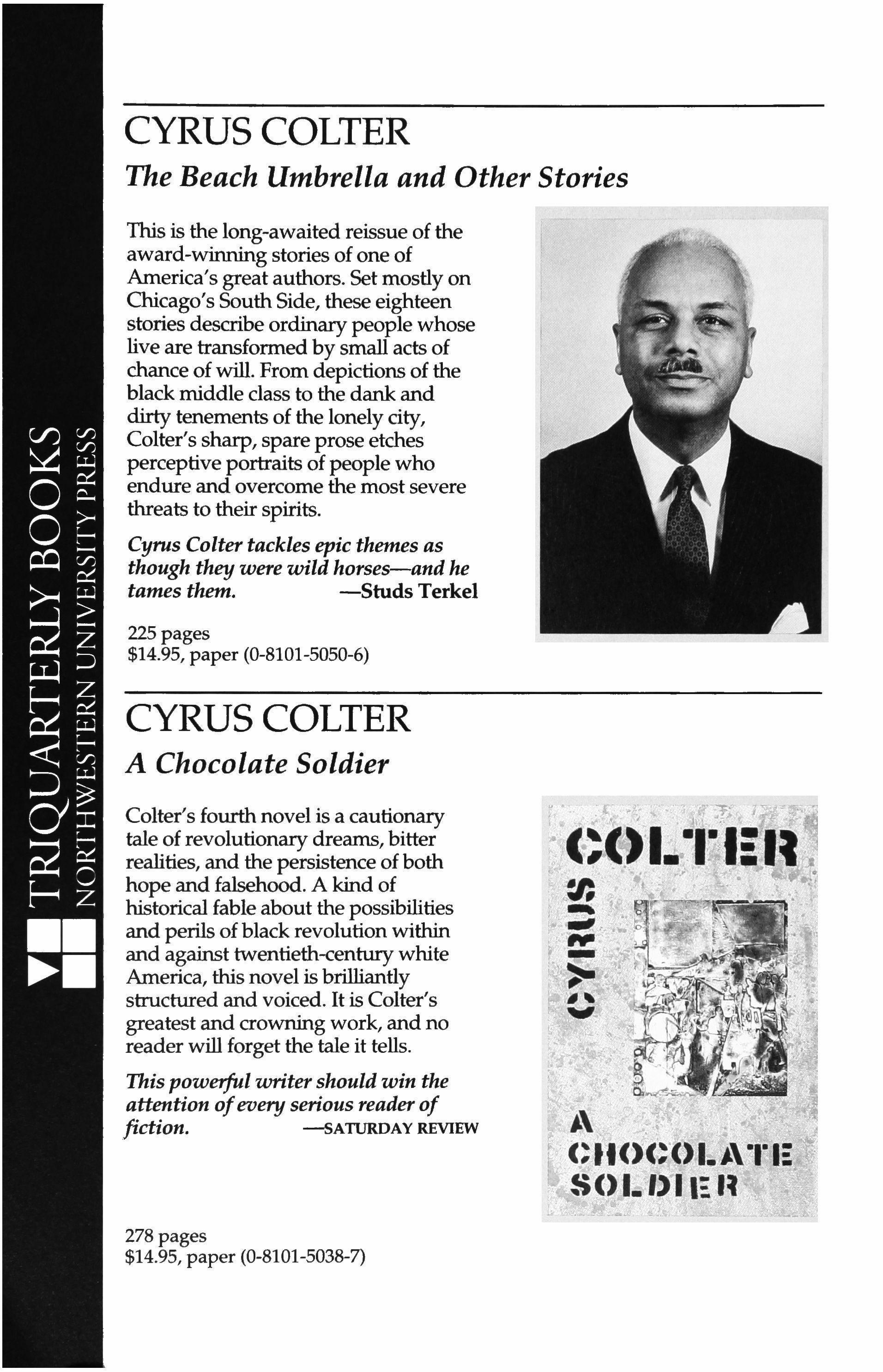
278 pages $14.95, paper (0-8101-5038-7)
CYRUS COLTER
The Hippodrome
Set in a Chicago seething with physical and psychological violence, this novel examines power and exploitation and their entanglement with sexuality.
In the tradition ofhisfictional ancestors, Dostoevsky andFaulkner, [Colter] has produced a work which uses the world of everydayreality in a manner beyond the scope ofjournalism or sociology-as an entree to the soul.
-James Park Sloan CHICAGO SUN-TIMES
Colteris a writer ofdistinction.
---ClIOICE
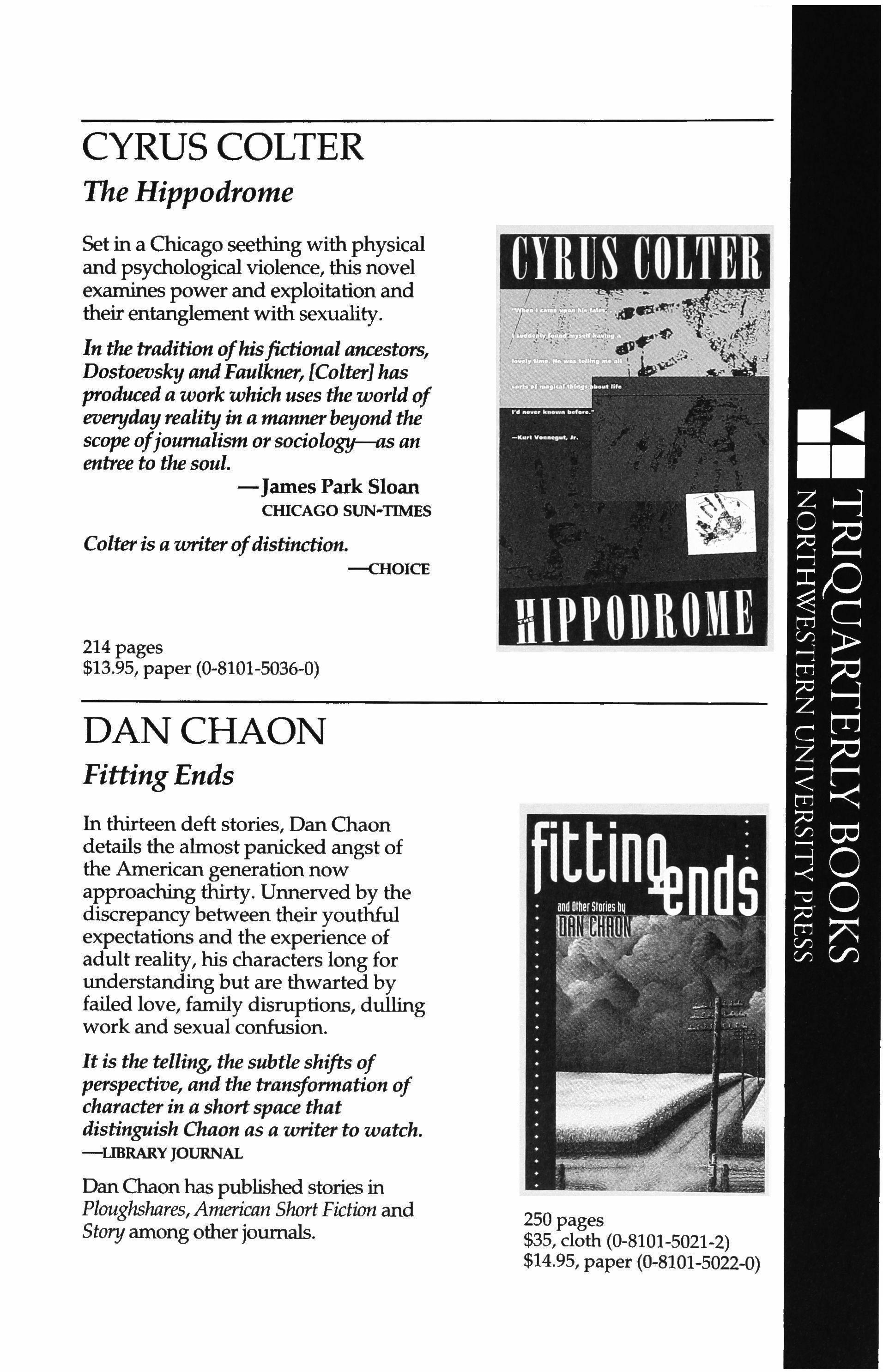
214 pages
$13.95, paper (0-8101-5036-0)
DANCHAON
Fitting Ends
In thirteen deft stories, Dan Chaon details the almost panicked angst of the American generation now approaching thirty. Unnerved by the discrepancy between their youthful expectations and the experience of adult reality, his characters long for understanding but are thwarted by failed love, family disruptions, dulling work and sexual confusion.
It is the telling, the subtle shifts of perspective, and the transformation of character in a short space that distinguish Chaon as a writer to watch.
-LIBRARY JOURNAL
Dan Chaon has published stories in Ploughshares, American Short Fiction and Story among otherjournals.
250 pages
$35, cloth (0-8101-5021-2)
$14.95, paper (0-8101-5022-0)
THEODORE WEISS
Selected Poems

This definitive selection of poems by one of America's most distinguished and original poets recovers work that is immensely contemporary and at the same time reaches back to the roots of an accomplished generation of poets that includes Lowell, Jarrell, Berryman and Bishop. Weiss's distinctive, idiosyncratic poems, noted for their syntacticcompression and linking of intimate experience and historical incident, are a major accomplishment. [Weiss'spoetry] is among the most valuable work produced in our time.
-James Merrill
DAVID BARBER
The Spirit Level
260 pages
$49.95, cloth (0-8101-5037-9)
$15.95, paper (0-8101-5040-9)
76 pages
$29.95, cloth (0-8101-5023-9)
$12.95, paper (0-8101-5024-7)
Winner of the 1995 Terrence Des Pres Prize for Poetry
Representing the world as a place of feverish energies, Barber creates a virtuoso tension between playful, sometimes flamboyant, diction and the seriousness of his concerns. Filled with rich detail and striking metaphor, his poetry is both technically brilliant and irresistibly inviting.
David Barber is the assistant poetry editor at the Atlantic Monthly and the recipient of a PEN/New England Discovery Award for poetry. The Spirit Level is his first published book of poems.
w. S. DI PIERO
Shadows Burning
Few other poets of his generation have succeeded in forging a style as original as W. S. Di Piero's. This sixth volume moves backward through the poet's life and American history, returning to origins both cultural and personal. With imaginative and linguistic power, Di Piero creates an elusive proportioning, a mourning and celebrating of his material.
In its intensepreoccupation with change and thefrailtyofwhatever continuities ofmemory and imagination we devise to order the unorderable, [Shadows Burning] makes an important contribution to American poetry.
-Alan Shapiro
ADRIAN C. LOUIS
Vortex ofIndian Fevers
Wordplay,metaphoricbrilliance, technical virtuosity and a scathingly sardonic critique of self and society fill this new collection Louis celebrateslife amid hardship and self-destructiveness, and consecrates a part of the past as a source of ideals for the present. N. Scott Momaday has characterized Louis's work as /I acceptance and defiance brought into delicate balance." Fueled by both anger and irony, Louis analyzes, excoriates,jests, prays and mourns. The result is psychologically and culturallycomplex.
76 pages
$29.95, cloth (0-8101-5017-4)
$11.95, paper (0-8101-5042-5)

80 pages $29.95, cloth (0-8101-5019-0)
$12.95, paper (0-8101-5020-4)
Beautifullyaglow with the love oflanguage. -James Tate
Prophetic, terrifyingly intelligent, unconditionally germane. -Hayden Carruth
DIANE GLANCY
Monkey Secret

This thoroughlyoriginal volume collects three short stories and a powerfulnovella by the awardwinningCherokee-German-English poet and prose writer. Glancy's tales of Native American life explore that essential American territory, the border-between: between past and present, betweennative and immigrant cultures, between self and society.
Hergiftforexpressive language and her courage in exploringpainfulsubjects like abandonment, illiteracy, and abuse make the readerhungryfor more. -NEW YORK TIMES BOOK REVIEW
Glancy is a treasure.
116 pages -AMERICAN BOOK REVIEW $19.95, cloth (0-8101-5016-6)
TRUDY LEWIS
Private Correspondences
VVUruner of the 1994 VVilliam Goyen Prize for Fiction
This moral thunderclap of a novel portrays a teenage girlwho, attacked by violentevil, chooses not to flee itbut to face it, and then to embrace it. In prose that swings between lyrical moments ofillumination and gritty sexual insight, Lewis explores the dark heart of a misogynist culture.
Lewis's shatteringstudyofsexual violence and individual vulnerability is both timely and universally resonant. --PUBLISHERS WEEKLY
196 pages $19.95, cloth (0-8101-5033-6)
ANNE CALCAGNO
Prayfor Yourself
Anne Calcagno vividly captures the textures of women's lives in this exhilarating collection of short stories. Her characters grapple with problems ranging from domestic violence to obsessiveness with bodyweight; the dramatic situations are extreme, edgy and utterlyconvincing.
Calcagno has the clean voice and sharp unblinking eye of a true storyteller.
-Larry Heinemann
Language as maddeninglyfascinating as a fifty-car locomotive, perfectly carved, from a single piece ofwood.
136 pages
$26.95, cloth (0-8101-5000-X)
-Lynda Barry
$12.95, paper (0-8101-5003-4)
EUGENE GARBER
The Historian
Winner of the 1992 William Goyen Prize for Fiction
This rollickingmetaphysical tale takes readers on a rich fictional odyssey that is a meditation on the American character and experience. The historian's quest to find the American Woman, whose vitality has been all but written out of history by puritan consciousness, leads him to muses, lovers, figures of sensual liberation, frontierswomen and powerful agents for social change. The battle between myth and fact, between romance and science, to grasp the soul of historythe so-called truth of a given time-is at the heart of Garber's compelling tale.
FIRST PAPERBACK PUBUCATION
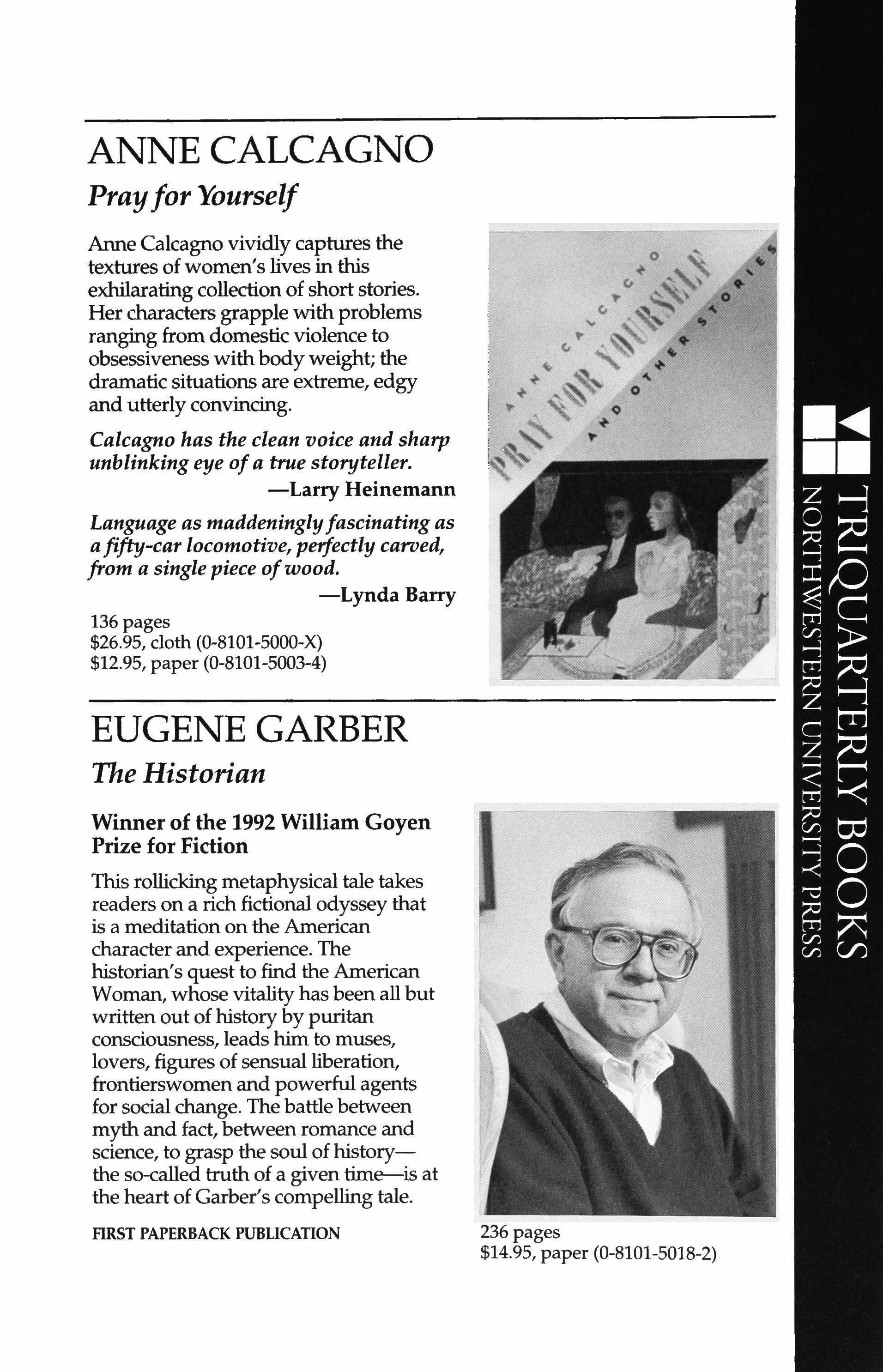
236 pages $14.95, paper (0-8101-5018-2)
CAROL FROST
Pure

For all poetry collections. -LIBRARY JOURNAL
PETER READING
A fierce, passionate series of meditations on experience and consciousness, morals and customs, and on the natural world that surrounds and shapes human life. Frost's poems bear the stamp of a thoroughly original artistic vision and style-they are discursive yet filled with concrete images; they inquire into moral issues (responsibility, pleasure, guilt,jealousy) without moralizing; they catch the echoes of western myths in domestic and quotidian events; they sharply diagnose relations between the sexes.
64 pages
$26.95, cloth (0-8101-5029-8)
$10.95, paper (0-8101-5004-2)
Ukulele Music • Perduta Gente
tl:rt aJQ,rba.,w�ot>tbn\ ILGJeJptp'1cnl'otllIllOurtbml �"",,",,"orloO..I;.,..,.,.., """""'" I.q!.dd"""""'''''= lC!"*.,1tf-pb iIh9n,....,_,. �_�-pftJtni�...o:r..f 1-fllrrrtllrlJ9l!, ..:mJ.I.hoqul..d.Ji ""-!."nJ � ..,.Iri--
This double volume of poems is the first U.S. publication of an important English poet. "There is nothing safe about Peter Reading's work," one reviewer has written, and a storm of letters to the London Times and the Times Literary Supplement, attacking and defending Reading's work, has made him the most controversial English poet of the age. Rarely has any poet found a way to address the most appalling and dispiriting aspects of life with such astonishing artistic virtuosity, bitter humor and disconcerting honesty.
112 pages
$26.95, cloth (0-8101-5030-1)
$11.95, paper (0-8101-5005-0)
i I

TINO VILLANUEVA
Chronicle ofMy Worst Years I Cronica de mis aiios peores
TRANSLATED AND WITH AN AFTERWORD BY
In this bilingual edition, an established Chicanopoetrepresents withpassion and elegance some of the American realities that remain absent from mainstream poetry. Villanueva voices complex and compelling historical, literary and cultural questions as urgent personal utterances, investing the book with appealingintimacy and seriousness. Villanueva is a writer to spend time with.
-PUBLISHERS WEEKLY
Tino Villanueva won the 1994 American Book Award forhis recentbook, Scene from theMovie GIANT.
96 pages
$34.95, cloth (0-8101-5009-3)
$12.95, paper (0-8101-5034-4)
MARC J. STRAUS
One Word
In his first collection ofpoems, physician Marc J. Straus combines poetic craft, medical expertise and a keen sense of human vulnerability in an uncommon portrayal of the complex and often troubled relationsbetween physician and patient. With directness and power, Straus confronts matters rarely encountered in poetry. These poems are a fine addition to the scant body of imaginative work that speaks from within the medical world.
Offering a new perspective on patientdoctor relations, [Straus] brings humanity into the sterile hospital environment. -BOOKUST
80 pages
$29.95, cloth (0-8101-5010-7)
$11.95, paper (0-8101-5035-2)
JAMES HOGGARD
-
TUNSUHO AND WITH AN AmlWOID IT JAMB HOGGARD
WILLIAM GOYEN
Arcadio
Completed while he was dying, William Goyen's Arcadia is one of the most affecting and imaginative farewells to life ever written.
Arcadio, whose voice is inimitably Goyenesque, is a creature from beyond the normal walks of life.
Half man, half woman, raised in a whorehouse and for years the veteran exhibitionist of an itinerant circus sideshow, he has escaped from the show and has been wandering in a quest for his lost family. Speaking intimately and secretly to the reader, he tells the bizarre and fantastic tale of his life.
148 pages $12.95, paper (0-8101-5006-9)
WILLIAM GOYEN
Half a Look of Cain: A Fantastical Narrative
Chris, whose leg is injured, and his lover Stella, with whom he lives in a ruined, abandoned house; Chris's male nurse; Marvello, the circus aerialist; a lighthouse keeper; a flagpole-sitter in small-town America-these are the creatures of William Goyens visionary fable of love, lust and loneliness. Because of its central focus on the erotic and its unusual novelistic form, Half a Look ofCain was rejected in the 1950s by Goyen's publisher. The first publication of this novel inaugurates a TriQuarterly Books/Northwestern University Press plan to publish and reprint all of Goyen's out-ofprint work.
[Arcadio] virtuallypulses with life; it is both audacious and wise; a timelessfable that manages to be boldlycontemporary as well.
-Joyce Carol Oates

Goyen's paramount concern is with the ways in which people connect, commune and create, with the ways they hurt and heal one another and with the capacity of everyone to do good or evil [Half a Look of Cain] is the work of a gifted, intelligent artist.
-NEW YORK TIMFS BOOK REVIEW
220 pages $22.50, cloth (0-8101-5031-X)
WILLIAM GOYEN
In a Farther Country
Subtitled U A Romance," In a Farther Country is an intense performance, both lyrical and colloquial, shaped as a series of meditative narratives. Set in a Spanish arts factory in New York City, the novel grows around the conflict of its main character's mixed ancestry. Marietta McGee-Chavez and her friends and acquaintances populate a world in which they experience dreams and reality, sexual desire and loneliness, triumph and defeat. This is the first paperback edition of Goyen's small neglected masterpiece.
182 pages
$13.95, paper (0-8101-5039-5)
ALAN SHAPIRO
In Praise ofthe Impure:Poetry and the EthicalImagination
A collection of passionate, rigorously argued essays on the situation of poetry in American culture today. These essays speak forcefully to the literary debates concerning the use of tradition, the openness of American poetry to diverse subjects, and the teaching of creative writing. This book should be read by any poet who teaches in the United States and by anyone with an interest in contemporary poetry. It will become a benchmark for discussion of contemporary American poetry.

200 pages
$39.95, cloth (0-8101-5025-5)
$12.95, paper (0-8101-5028-X)
MURIEL RUKEYSER
Out ofSilence: Selected Poems
EDITED BY KATE DANIELS

In a recent article, someone defined the deplorable state ofpublishing (and the Republic) by a singlefact: Muriel Rukeyser'spoetry was out ofprint. So this is notjust another book: it is a restitution. -Eleanor Wilner
Thepublication ofOut of Silence is an event worthyofcelebration. Finally one ofthis century's most distinguished, misunderstood and undervaluedpoets is back in print The timefor a justestimate of Rukeyser's contributions is longoverdue. Out of Silence is a necessary start.
-TIlE WOMEN'S REVIEW OF BOOKS
192 pages
$28, cloth (0-916384-11-X)
$14.95, paper (0-8101-5015-8) (PAPERBACK REISSUED WITH A NEW ISBN)
BRUCE WEIGL
What Saves Us
In these wrenching, elegant poems Bruce Weigl writes out of uncompromising memory and vision. From bars and bedrooms, in Ohio and Nicaragua and Vietnam, his voice rises through the noise of history and habit to reach us with impeccable grace and remarkable invention.
Song of Napalm made almost everything else that has been written about the Vietnam War seem irrelevant. What Saves Us moves right alongfrom that achievement. Bruce Weigl has become one ofthe bestpoets now writing in America. -Denise Levertov
80 pages
$17, cloth (0-916384-08-X)
$11.95, paper (0-8101-5013-1)
ANGELA JACKSON
Dark
Legs and Silk
Kisses: The Beatitudes ofthe Spinners
Wmnerofthe Carl SandburgAward and the 1993 Chicago Sun-Tunes Book ofthe YearAward in Poetry
Angela Jacksonbrings remarkable gifts to the articulation of African-American experience. Her poetry features an impressive variety of characters exploring social identity, the rituals of race relations, the female psyche, creativity and spiritual experience.
Angela Jackson has known,forlong, what is rightfor her attention and scrupulous investigation.
-Gwendolyn Brooks
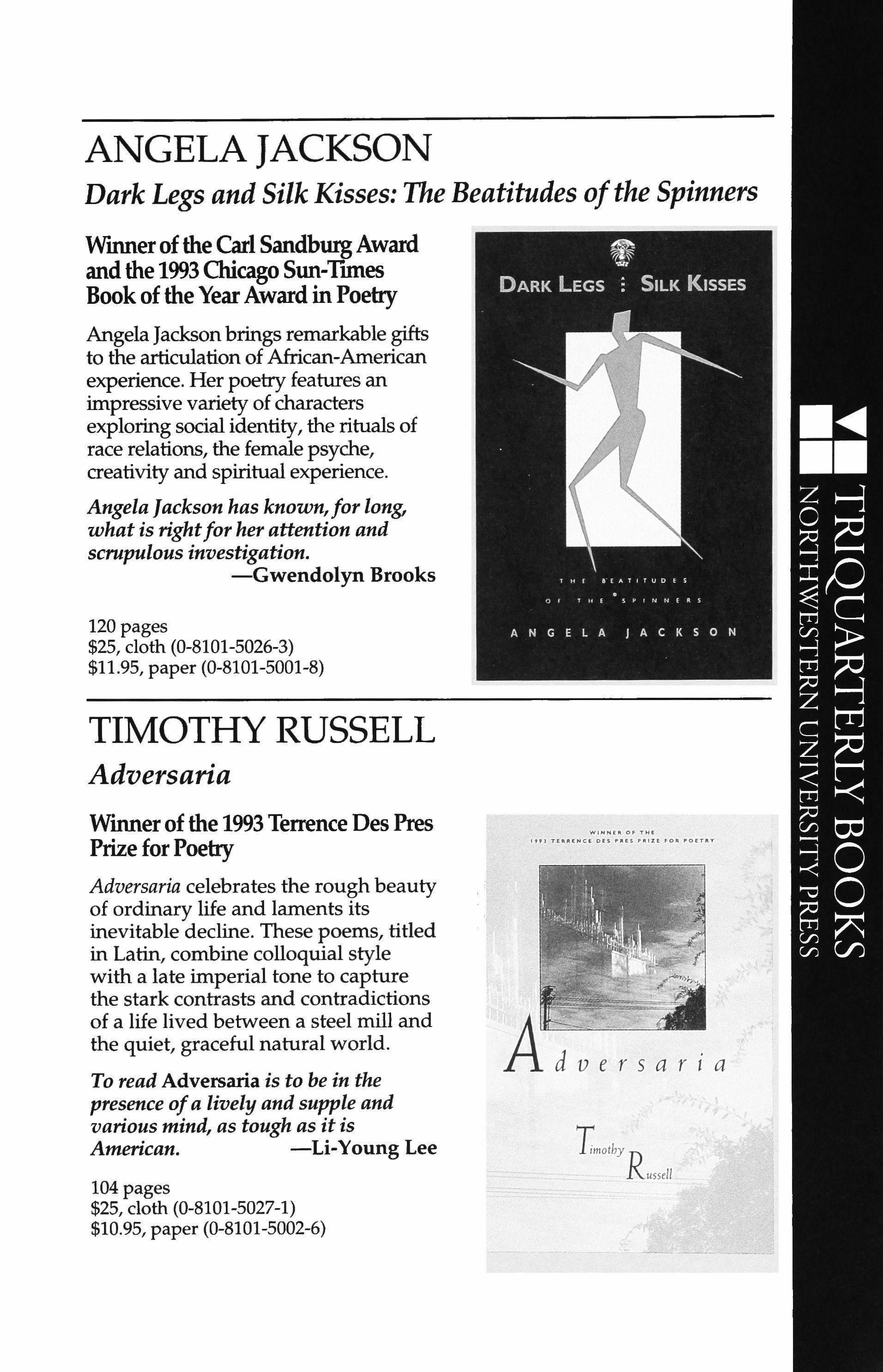
120 pages
$25, cloth (0-8101-5026-3)
$11.95, paper (0-8101-5001-8)
TIMOTHY RUSSELL
Adversaria
Wmner of the 1993 Terrence Des Pres Prize for Poetry
Adversaria celebrates the rough beauty of ordinary life and laments its inevitable decline. These poems, titled in Latin, combine colloquial style with a late imperial tone to capture the stark contrasts and contradictions of a life lived between a steel mill and the quiet, graceful natural world.
To read Adversaria is to be in the presence of a lively and supple and various mind, as tough as it is American.
-Li-Young Lee
104 pages
$25, cloth (0-8101-5027-1)
$10.95, paper (0-8101-5002-6)
W'NH£I\ O� TNE ''') T(��( eE OfS �1I(5 '�Il( fOil 'OETIIY TmothYR"mil
LINDA McCARRISTON
Eva-Mary
1991 National Book Award Finalist
Wmnerofthe 1991 Terrence Des Pres Prize for Poetry
NOW IN A FOURTH PRINTING!
An extended poetic meditation on suffering and change, on cruelty and innocence, on love and endurance.
An immensely moving book,fearless in its passion. Linda McCarriston accomplishes a near miracle, transforming memories oftrauma into poems that are luminous and often sacramental, arriving at a hard-won peace. -Lisel Mueller
80 pages
$10.95, paper (0-8101-5008-5)
(REISSUED WITH A NEW ISBN)
EVAN ZIMROTH
Dead, Dinner, or Naked
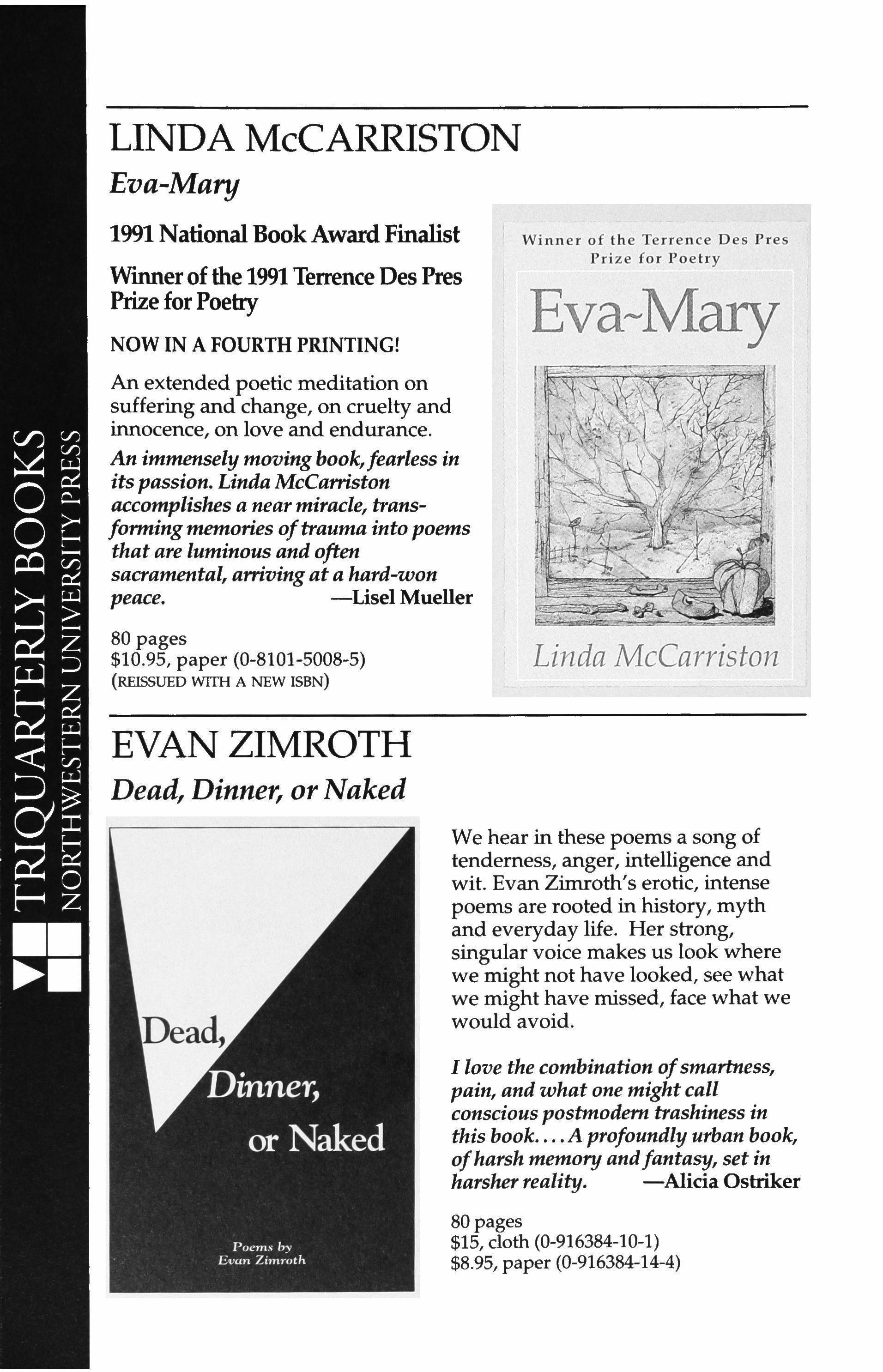
We hear in these poems a song of tenderness, anger, intelligence and wit. Evan Zirnroth's erotic, intense poems are rooted in history, myth and everyday life. Her strong, singular voice makes us look where we might not have looked, see what we might have missed, face what we would avoid.
I love the combination ofsmartness, pain, and what one might call conscious postmodern trashiness in this book A profoundly urban book, ofharsh memory andfantasy, set in harsher reality. -Alicia Ostriker
80 pages
$15, cloth (0-916384-10-1)
$8.95, paper (0-916384-14-4)
Winner of the Terrence Des Pres Prize for Poetry
Eva-Mary
Linda McCarriston
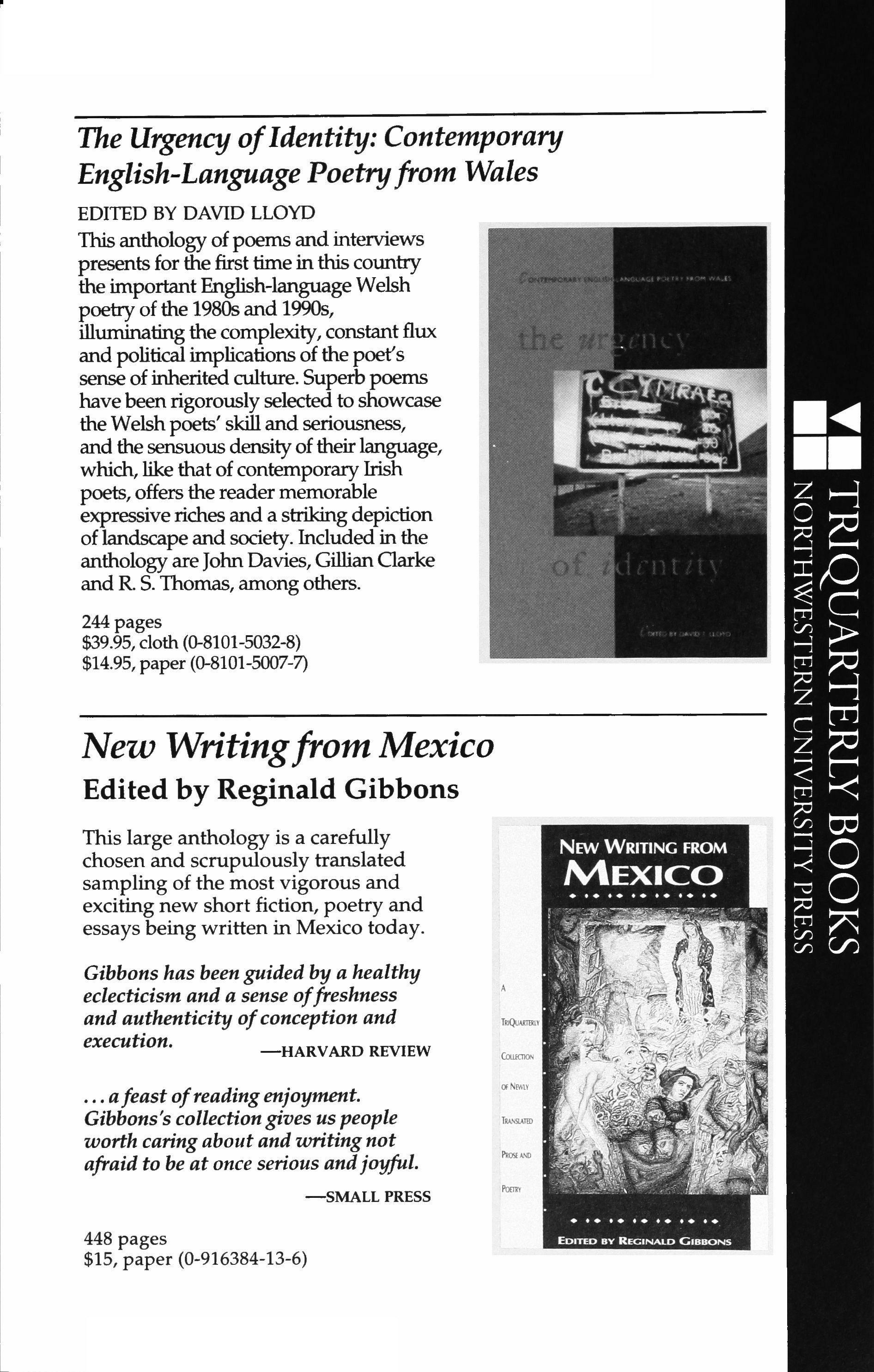
The Urgency ofIdentity: Contemporary English-Language Poetryfrom Wales
EDITED BY DAVID LLOYD
This anthology ofpoems and interviews presents for the first time in this country the important English-language Welsh poetry of the 1980s and 19905, illuminating the complexity, constant flux and politicalimplications of the poet's sense of inherited culture. Superb poems have been rigorously selected to showcase the Welsh poets' skill and seriousness, and the sensuous densityoftheir language, which, like that of contemporary Irish poets, offers the reader memorable expressive riches and a striking depiction of landscape and society. Included in the anthology are JohnDavies, Gillian Oarke and R S. Thomas, among others.
244 pages
$39.95, cloth (0-8101-5032-8) $14.95, paper (0-8101-5007-7)
New Writingfrom Mexico
Edited by Reginald Gibbons
This large anthology is a carefully chosen and scrupulously translated sampling of the most vigorous and exciting new short fiction, poetry and essays being written in Mexico today.
Gibbons has been guided by a healthy eclecticism and a sense offreshness and authenticity ofconception and execution.
-HARVARD REVIEW
afeastofreadingenjoyment. Gibbons's collection gives us people worth caring about and writing not afraid to be at once serious andjoyful.
-SMALL PRESS
448 pages $15, paper (0-916384-13-6)
Fiction ofthe Eighties
Edited by Reginald Gibbons and Susan Hahn
This landmark anthology honoring TriQuarterly's 25th anniversary includes 47 of the best short stories to have appeared in the magazine over the past decade. The stories range widely over the experience of modem life, and share a high level of artistry. An incomparableprimer of the contemporary possibilities of fiction.
For contemporaryfiction [Fiction ofthe Eighties] is a standard-bearer The multiplicity and depth ofthefictional lives here are astonishing wisdom and wildness ofwriters too numerous to thank. -PUBLISHERS WEEKLY
592 pages
$26.95, cloth (0-916384-05-5)
$16.95, paper (0-916384-06-3)
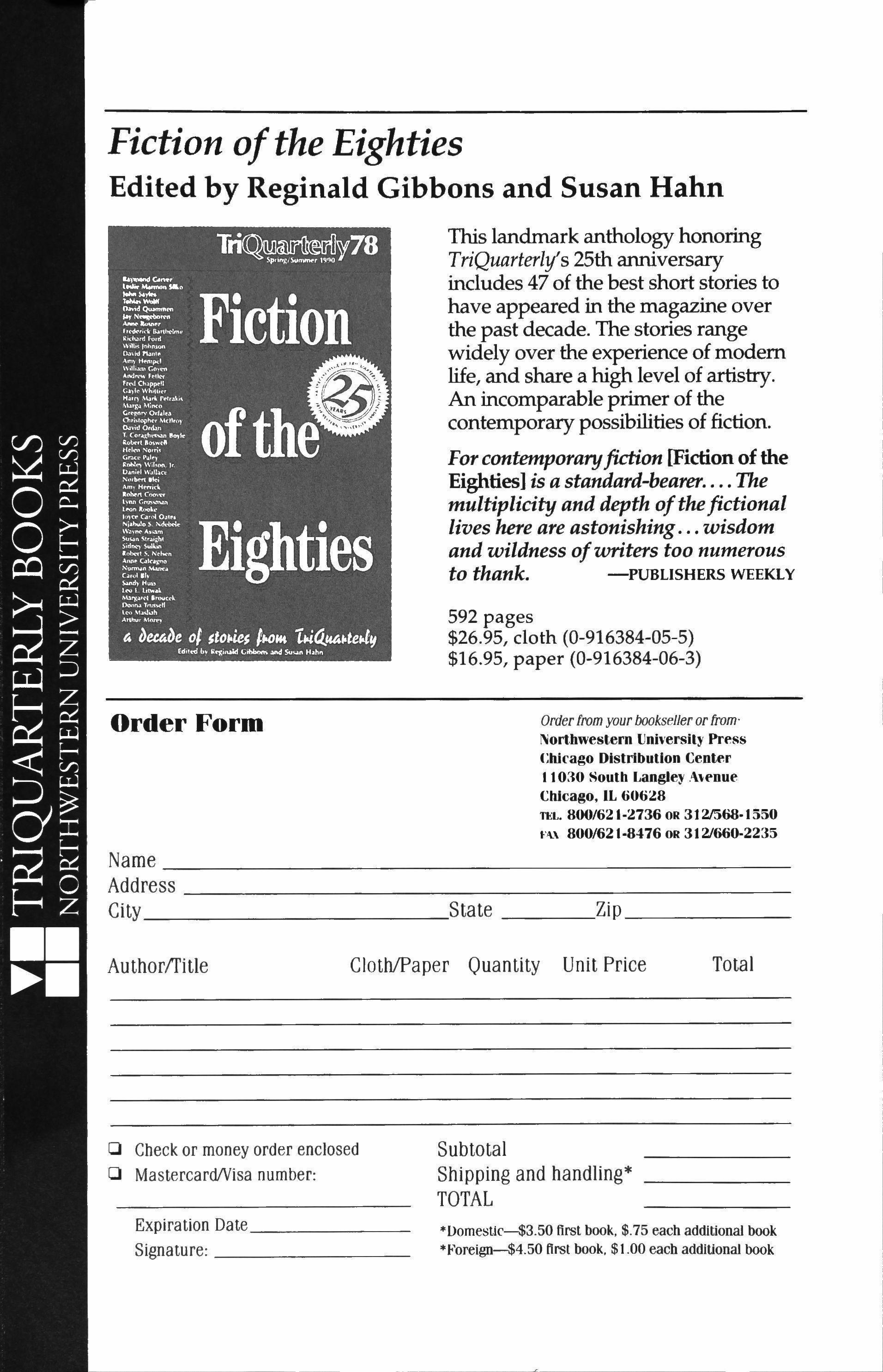
Order Form
ThL. 800/621·2736 OR 3 t 21568·1550 1'>\.\ 800/621·8476 OR 3t 21660-2235 Narne Address
Distribution Center
60628
State Zip Authorlfitle ClothiPaper Quantity Unit Price Total Subtotal Shipping and handling* TOTAL
enclosed
*l>omestlc-$3.50
*Foreign-$4.50
Order from your tJookseJ/er or from' Northwestern Universily Press f:birago
11030 South Langley Alenue Chicago, IL
City
o Check or money order
o Mastercard/Visa number: Expiration Date Signature:
first book. $.75 each additional book
first book. $1.00 each additional book
Editor
Reginald Gibbons
Managing Editor Kirstie Felland
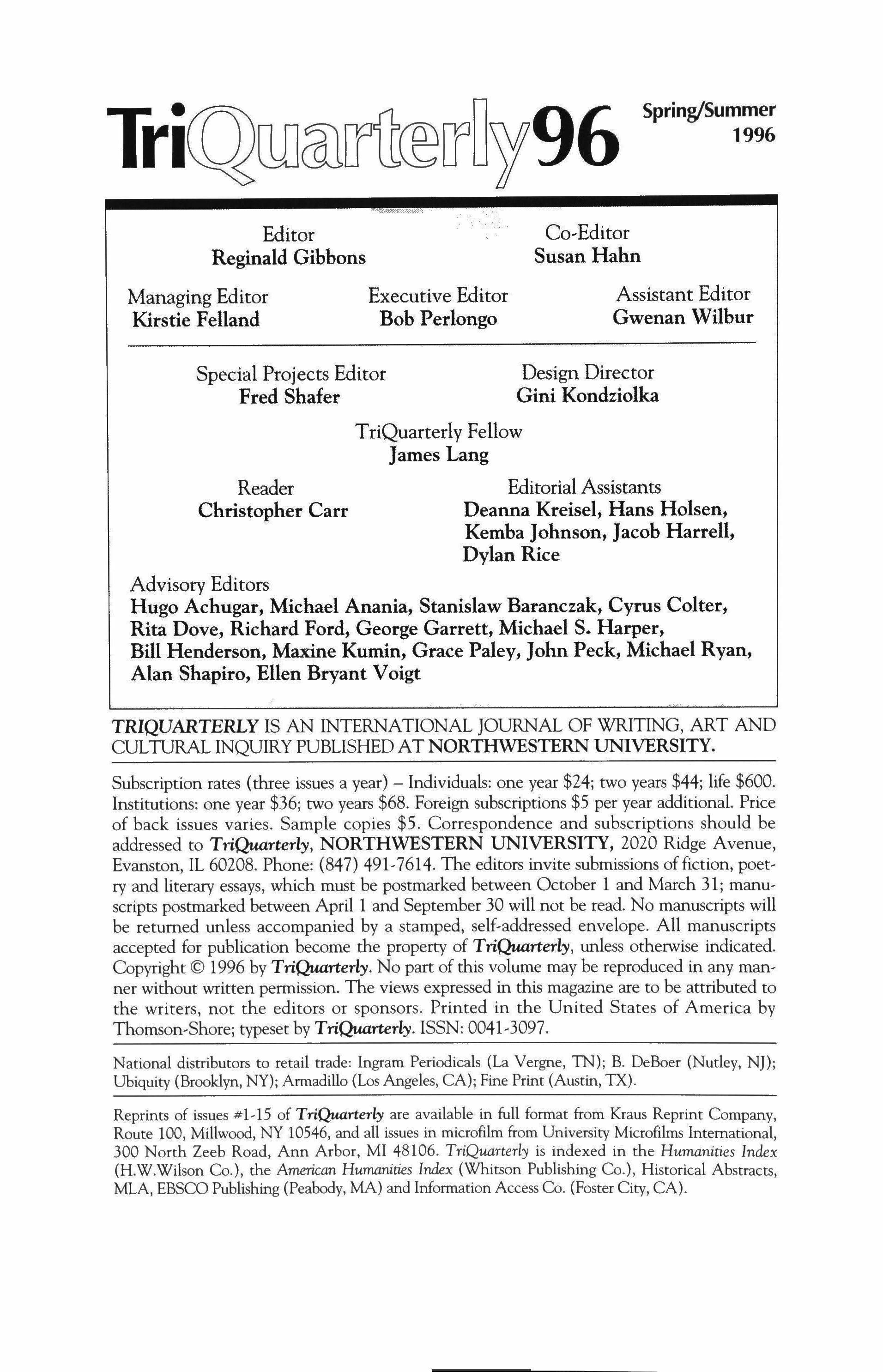
Executive Editor Bob Perlongo
Special Projects Editor Fred Shafer
Co-Editor Susan Hahn
Assistant Editor Gwenan Wilbur
Design Director Gini Kondziolka
TriQuarterly Fellow
James Lang
Reader
Christopher Carr
Advisory Editors
Editorial Assistants
Deanna Kreisel, Hans Holsen, Kemba Johnson, Jacob Harrell, Dylan Rice
Hugo Achugar, Michael Anania, Stanislaw Baranczak, Cyrus Colter, Rita Dove, Richard Ford, George Garrett, Michael S. Harper, Bill Henderson, Maxine Kumin, Grace Paley, John Peck, Michael Ryan, Alan Shapiro, Ellen Bryant Voigt
TRIQUARTERLY IS AN INTERNATIONAL JOURNAL OF WRITING, ART AND CULTURAL INQUIRY PUBLISHED AT NORTHWESTERN UNIVERSITY.
Subscription rates (three issues a year) - Individuals: one year $24; two years $44; life $600. Institutions: one year $36; two years $68. Foreign subscriptions $5 per year additional. Price of back issues varies. Sample copies $5. Correspondence and subscriptions should be addressed to TriQuarterly, NORTHWESTERN UNIVERSITY, 2020 Ridge Avenue, Evanston, Il, 60208. Phone: (847) 491-7614. The editors invite submissions offiction, poetry and literary essays, which must be postmarked between October 1 and March 31; manuscripts postmarked between April 1 and September 30 will not be read. No manuscripts will be returned unless accompanied by a stamped, self-addressed envelope. All manuscripts accepted for publication become the property of TriQuarterly, unless otherwise indicated. Copyright © 1996 by TriQuarterly. No part of this volume may be reproduced in any manner without written permission. The views expressed in this magazine are to be attributed to the writers, not the editors or sponsors. Printed in the United States of America by Thomson-Shore; typeset by TriQuarterly. ISSN: 0041-3097.
National distributors to retail trade: Ingram Periodicals (La Vergne, TN); B. DeBoer (Nutley, NJ); Ubiquity (Brooklyn, NY); Armadillo (Los Angeles, CAl; Fine Print (Austin, TX).
Reprints of issues #1-15 of TriQuarterly are available in full format from Kraus Reprint Company, Route 100, Millwood, NY 10546, and all issues in microfilm from University Microfilms International, 300 North Zeeb Road, Ann Arbor, MI 48106. TriQuarterly is indexed in the Humanities Index (H.W.Wilson Co.), the American Humanities Index (Whitson Publishing Co.), Historical Abstracts, MLA, EBSCO Publishing (Peabody, MA) and Information Access Co. (Foster City, CAl.
Spring/Summer 1996
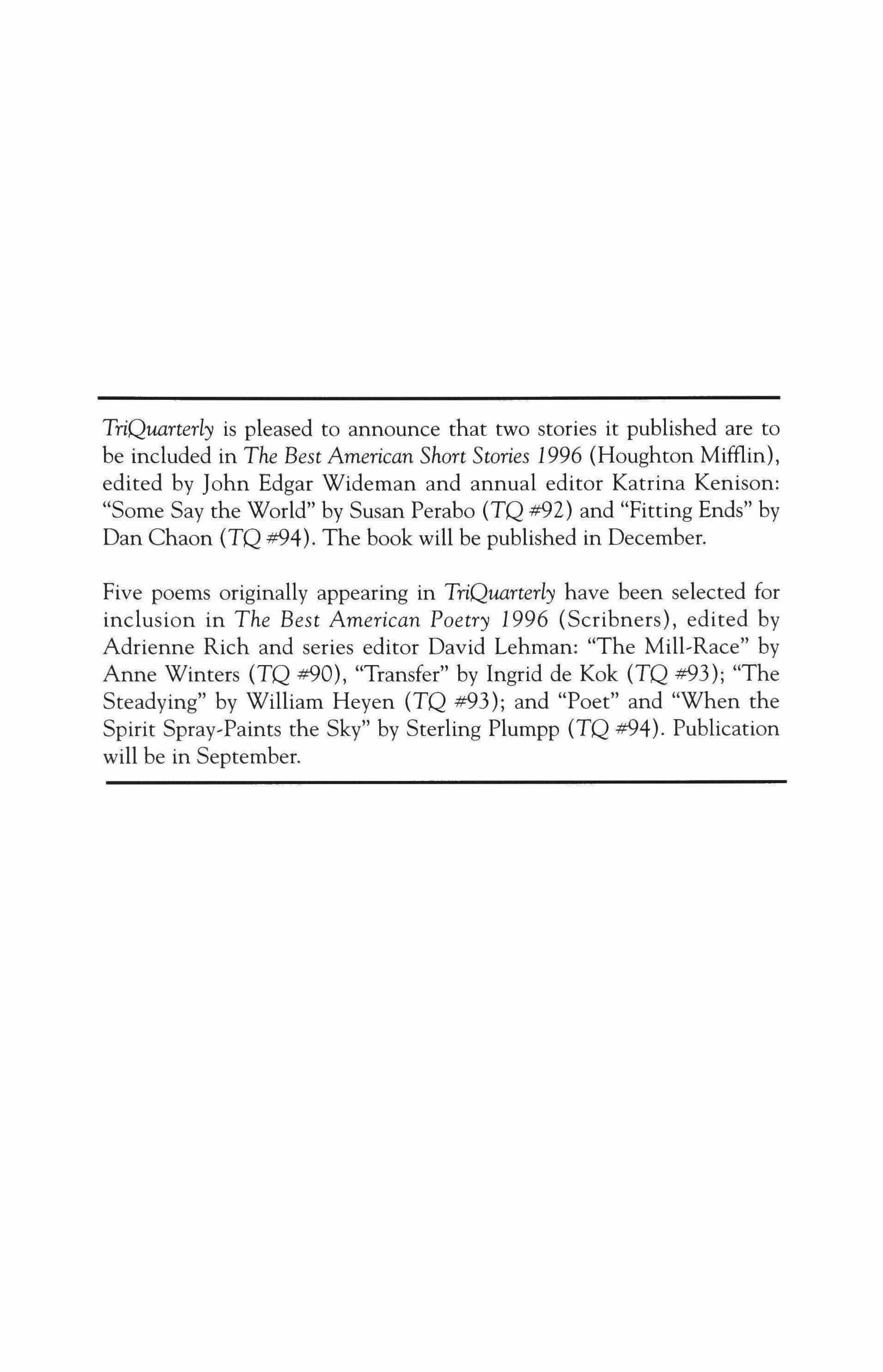
TriQuarterly is pleased to announce that two stories it published are to be included in The Best American Short Stories 1996 (Houghton Mifflin), edited by John Edgar Wideman and annual editor Katrina Kenison: "Some Say the World" by Susan Perabo (TQ #92) and "Fitting Ends" by Dan Chaon (TQ #94). The book will be published in December.
Five poems originally appearing in TriQuarterly have been selected for inclusion in The Best American Poetry 1996 (Scribners), edited by Adrienne Rich and series editor David Lehman: "The Mill-Race" by Anne Winters (TQ #90), "Transfer" by Ingrid de Kok (TQ #93); "The Steadying" by William Heyen (TQ #93); and "Poet" and "When the Spirit Spray-Paints the Sky" by Sterling Plumpp (TQ #94). Publication will be in September.

Editors
Reginald Gibbons and Susan Hahn
Contents
of this issue:
Souls; A Heritage; Photograph and White Tulips 25 Dannie Abse FICTION Great Zimbabwe (from Treemont Stone) ••••.•.••••••• 30 AngelaJackson Two Women 44 Martha Stephens The Lithuanian Wife •...........••••••............•.•.....••••• 62 Leon Rooke Prince of Motown 70 Maria Flook Mistakes 92 Richard Burgin Do I Know You? 106 Peggy Shinner As the Hawk Flies 118 John Bensko 21
POETRY
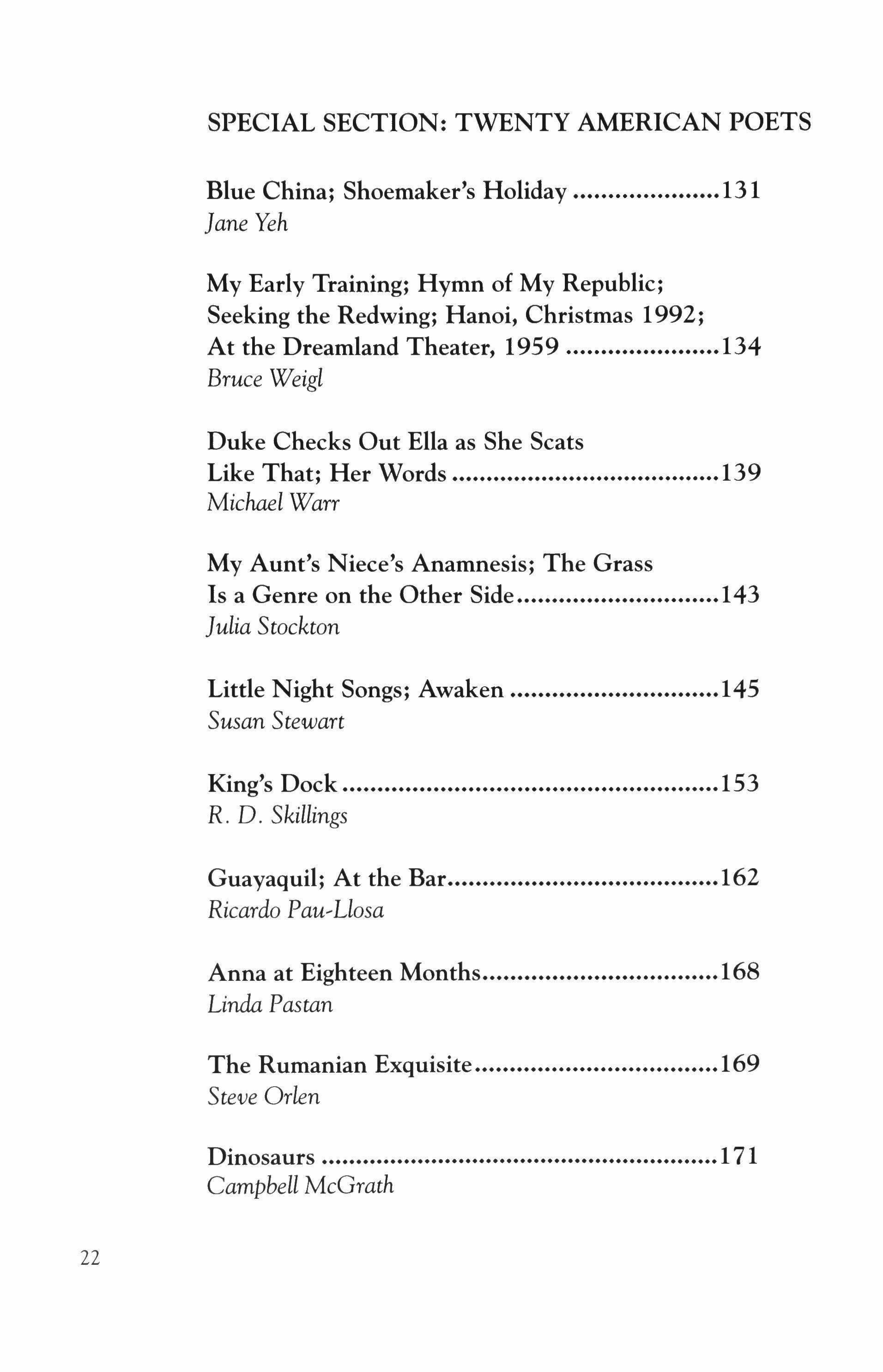
SPECIAL SECTION: TWENTY AMERICAN POETS Blue China; Shoemaker's Holiday ...................•. 131 Jane Yeh My Early Training; Hymn of My Republic; Seeking the Redwing; Hanoi, Christmas 1992; At the Dreamland Theater, 1959 134 Bruce Weigl Duke Checks Out Ella as She Scats Like That; Her Words 139 Michael Warr My Aunt's Niece's Anamnesis; The Grass Is a Genre on the Other Side 143 Julia Stockton Little Night Songs; Awaken 145 Susan Stewart King's Dock 153 R. D. Skillings Guayaquil; At the Bar 162 Ricardo Pau�Llosa Anna at Eighteen Months 168 Linda Pas tan The Rumanian Exquisite 169 Steve Orlen Dinosaurs 1 71 Campbell McGrath 22

Reductio Ad Absurdum; Love Strikes; She Speaks, He Listens; Listening to The Doors; At the Freight Yards; Pacific Highway: 1967; San Francisco: 1969; Trees, Rush Limbaugh, and the Failed Exorcism of China Girl's Ghost; Star Quilt; This Is the Rez 174 Adrian C. Louis
Adam and Eve; The Teacher Listens to the Past; Why We Went and What We Found 186 Tony Hoagland
Angelo; Mexican 193 Ray Gonzalez
Brave; Obsession; Comfort; Patience; Void; Conscience; Time •••..•••••••.•.•••...............•..
Frost
Aphasiac; The Match Girl
Nancy Eimers
God's at the Top of the Stairs ••••••••••••.••.........•••••
Steven Cramer
Covered Bridge; Recollections of a Contingent of Coxey's Army Passing Through Straughn, Indiana, in April of 1894 •••••.••........••...••.......••••
Jared Carter
Eras del Lugar; Mojacar Love Poem; El Camino 225 Nick Carb6
196
Carol
203
207
209
23
Social Studies; Of Sameness and Thirst; Campanile; Wakened; Lipstick 230
Pam Bernard
From Treatise on the Rainbow: Thirst; Death; Cap; Speak; Caritas; Shit-Stick: Thread; Hooks; Windows 236
Stephen Berg
PHOTOGRAPHS
From the Series NOW (Dachau)
Alan Cohen after 144
MIXED�MEDIA COLLAGES
Fruits 'n' Nuts; Rock of Ages; Jack; Bob White; Rocky Road; Gander; Ebb Tide; Marriage on the Rocks;
Alexis Smith 69, 91, 117, 128, 173, 185, 249, 250
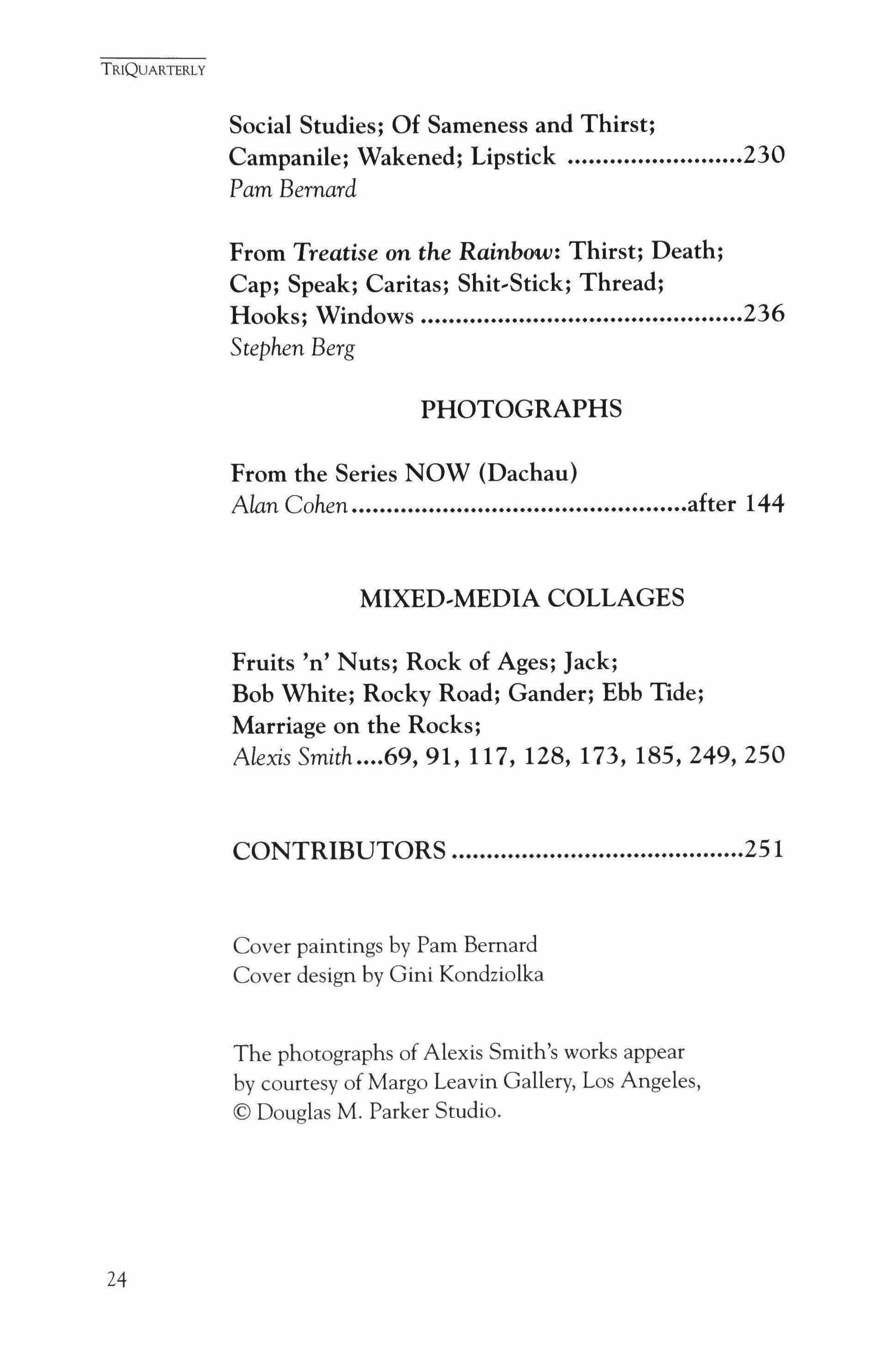
CONTRIBUTORS 251
Cover paintings by Pam Bernard
Cover design by Gini Kondziolka
The photographs of Alexis Smith's works appear by courtesy of Margo Leavin Gallery, Los Angeles, © Douglas M. Parker Studio.
TRIQUARTERLY 24
Three Poems
Dannie Abse
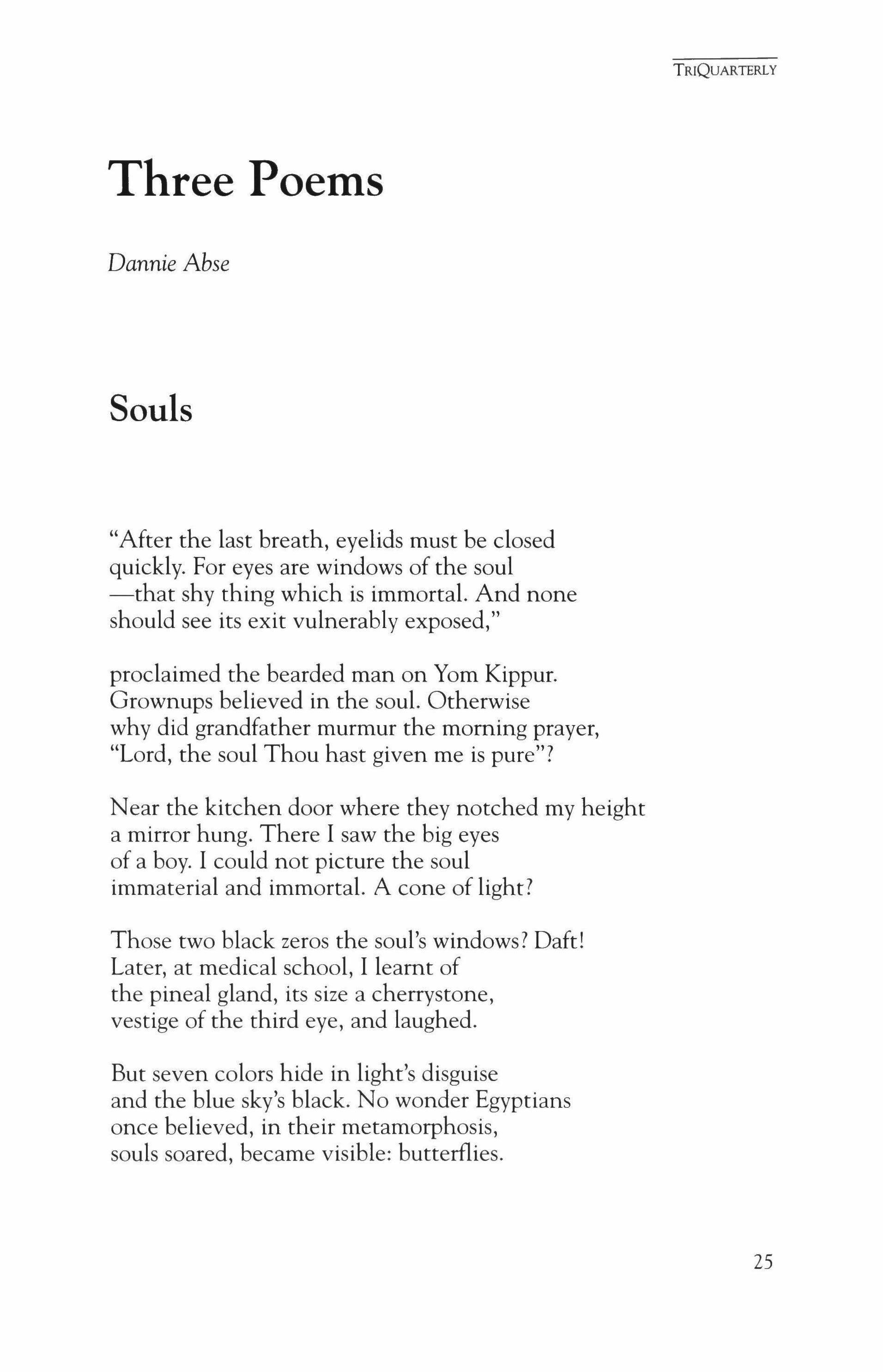
Souls
"After the last breath, eyelids must be closed quickly. For eyes are windows of the soul -that shy thing which is immortal. And none should see its exit vulnerably exposed,"
proclaimed the bearded man on Yom Kippur. Grownups believed in the soul. Otherwise why did grandfather murmur the morning prayer, "Lord, the soul Thou hast given me is pure"?
Near the kitchen door where they notched my height a mirror hung. There I saw the big eyes of a boy. I could not picture the soul immaterial and immortal. A cone of light?
Those two black zeros the soul's windows? Daft! Later, at medical school, I learnt of the pineal gland, its size a cherrystone, vestige of the third eye, and laughed.
But seven colors hide in light's disguise and the blue sky's black. No wonder Egyptians once believed, in their metamorphosis, souls soared, became visible: butterflies.
TRIQUARTERLY 25

Now old, I'm credulous. Superstition clings. After the melting eyes and devastation of Hiroshima, they say butterflies, crazed, flew about, fluttering soundless things.
TRIQUARTERLY
26

A Heritage
A heritage of a sort. A heritage of comradeship and suffocation.
The bawling pit-hooter and the god's explosive foray, vengeance, before retreating to his throne of sulfur.
Now this black-robed god of fossils and funerals, petrifier of underground forests and flowers, emerges with his grim retinue past a pony's skeleton, past human skulls, into his half-propped-up, empty, carbon colony.
Above, on the brutalized, unstitched side of a Welsh mountain, it has to be someone from somewhere else who will sing solo
not of the marasmus of the Valleys, the pit-wheels that do not tum, the pump-house abandoned;
nor of how, after a half-mile fall, regiments of miners' lamps no longer, midge-like, rise and slip and bob.
Only someone uncommitted, someone from somewhere else, panorama-high on a coal-tip, may jubilantly laud the re-entry of the exiled god into his shadowless kingdom.
TRIQUARTERLY 27
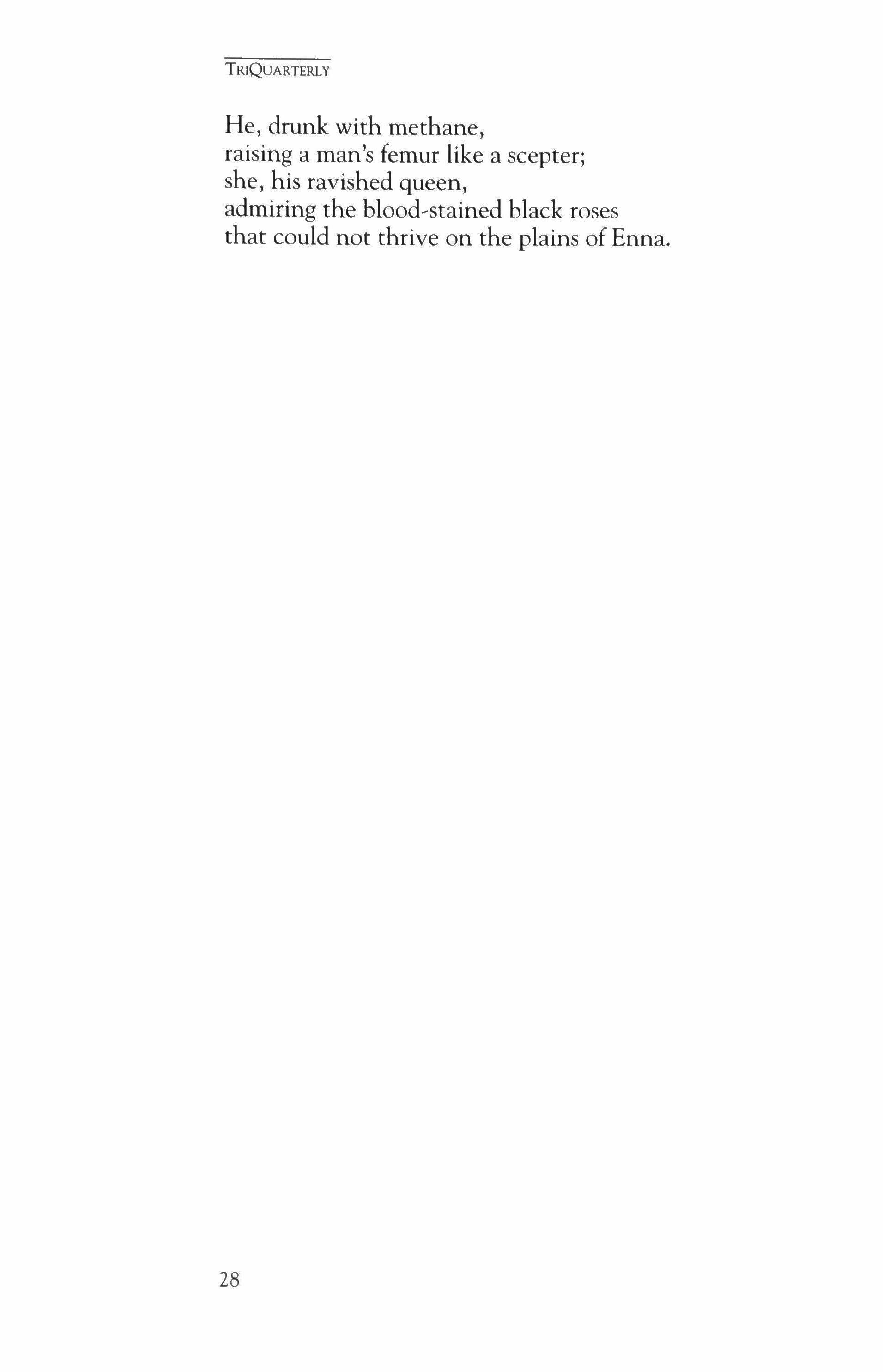
He, drunk with methane, raising a man's femur like a scepter; she, his ravished queen, admiring the blood-stained black roses that could not thrive on the plains of Enna.
TRIQUARTERLY
28
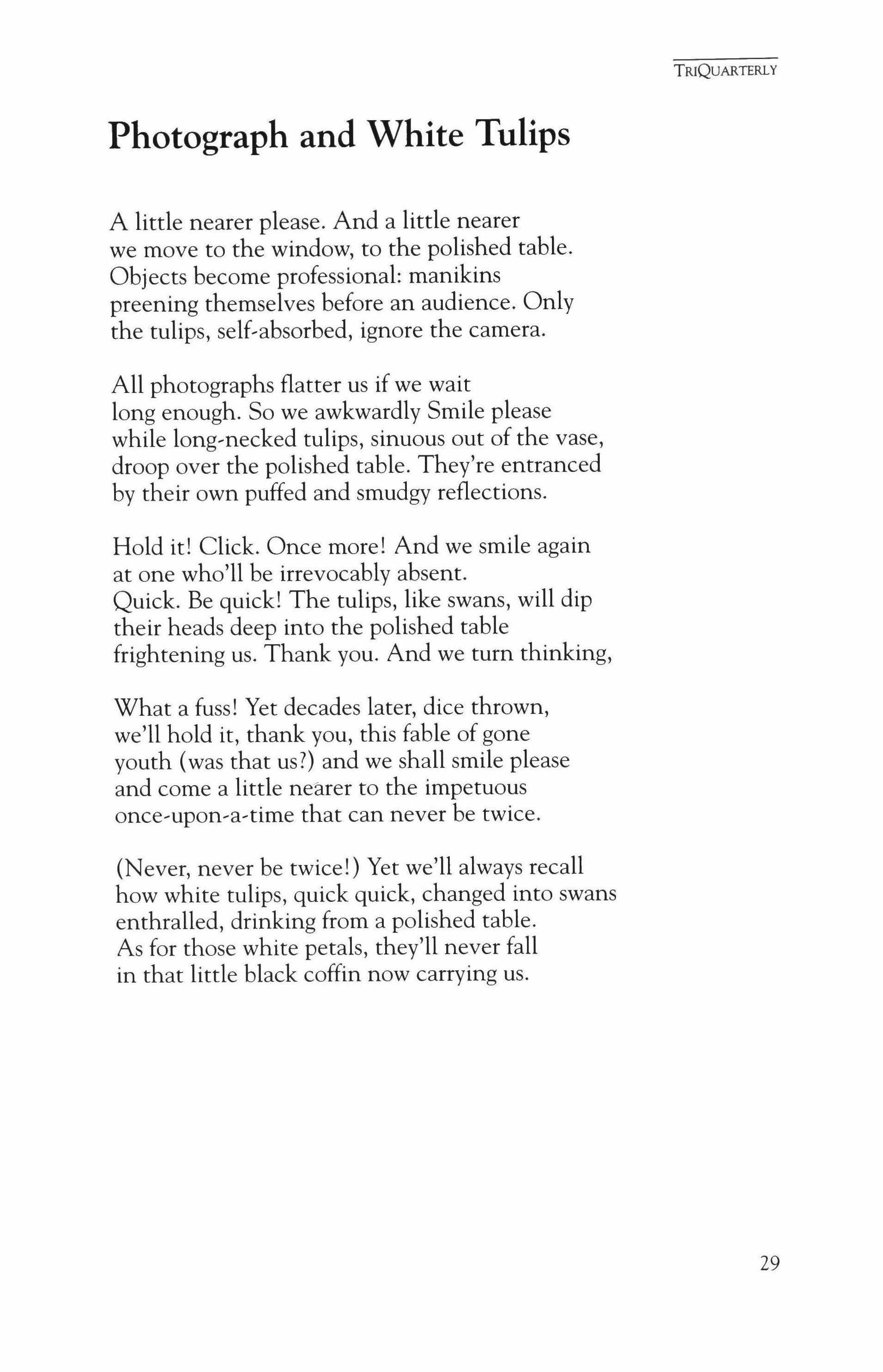
Photograph and White Tulips
A little nearer please. And a little nearer we move to the window, to the polished table. Objects become professional: manikins preening themselves before an audience. Only the tulips, self-absorbed, ignore the camera.
All photographs flatter us if we wait long enough. So we awkwardly Smile please while long-necked tulips, sinuous out of the vase, droop over the polished table. They're entranced by their own puffed and smudgy reflections.
Hold it! Click. Once more! And we smile again at one who'll be irrevocably absent.
Quick. Be quick! The tulips, like swans, will dip their heads deep into the polished table frightening us. Thank you. And we turn thinking,
What a fuss! Yet decades later, dice thrown, we'll hold it, thank you, this fable of gone youth (was that us?) and we shall smile please and come a little nearer to the impetuous once-upon-a-time that can never be twice.
(Never, never be twicel ) Yet we'll always recall how white tulips, quick quick, changed into swans enthralled, drinking from a polished table. As for those white petals, they'll never fall in that little black coffin now carrying us.
TruQUARTERLY 29
Great Zimbabwe (from Treemont Stone)
AngelaJackson
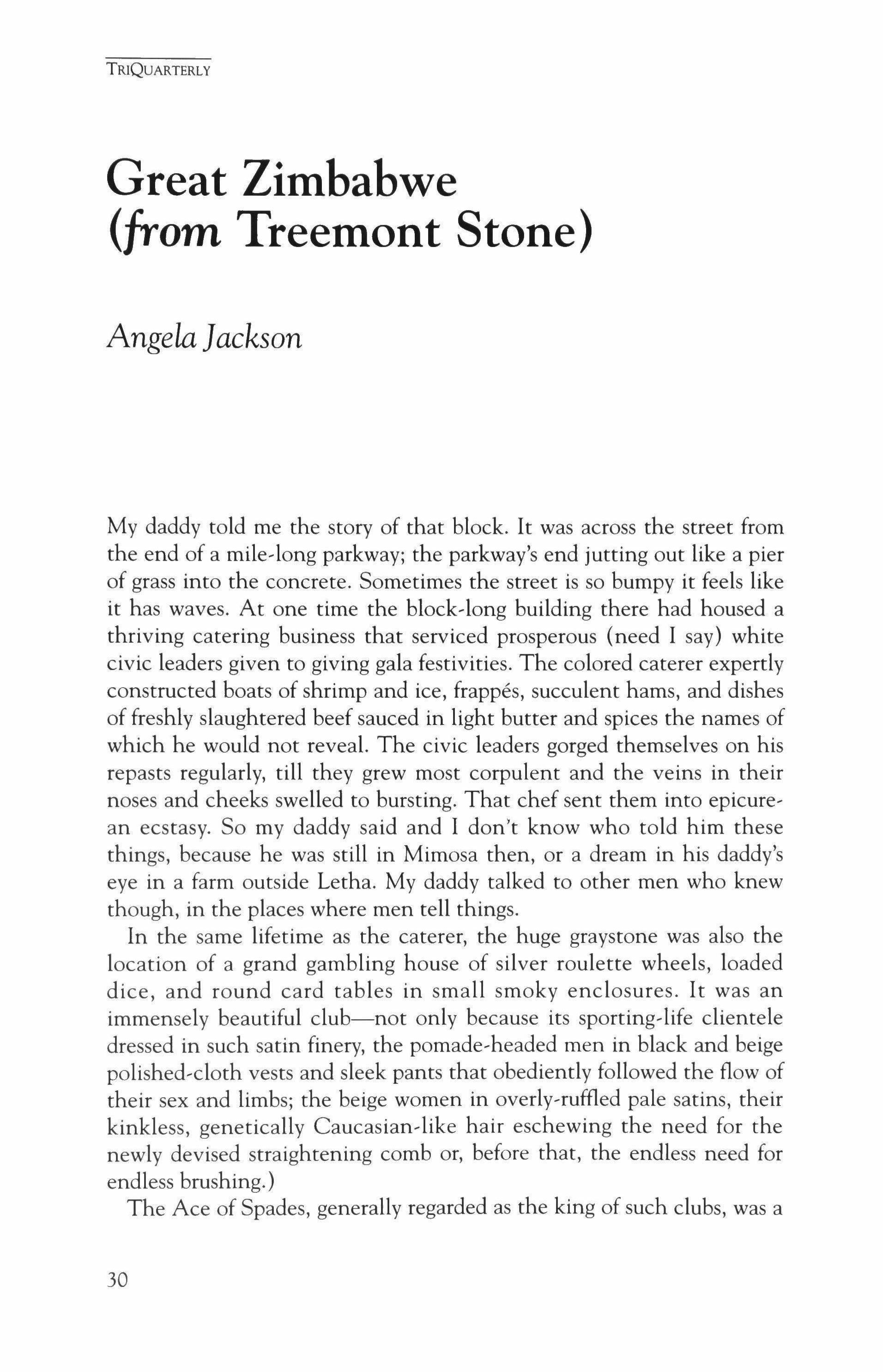
My daddy told me the story of that block. It was across the street from the end of a mile-long parkway; the parkway's end jutting out like a pier of grass into the concrete. Sometimes the street is so bumpy it feels like it has waves. At one time the block-long building there had housed a thriving catering business that serviced prosperous (need I say) white civic leaders given to giving gala festivities. The colored caterer expertly constructed boats of shrimp and ice, frappes, succulent hams, and dishes of freshly slaughtered beef sauced in light butter and spices the names of which he would not reveal. The civic leaders gorged themselves on his repasts regularly, till they grew most corpulent and the veins in their noses and cheeks swelled to bursting. That chef sent them into epicurean ecstasy. So my daddy said and I don't know who told him these things, because he was still in Mimosa then, or a dream in his daddy's eye in a farm outside Letha. My daddy talked to other men who knew though, in the places where men tell things.
In the same lifetime as the caterer, the huge graystone was also the location of a grand gambling house of silver roulette wheels, loaded dice, and round card tables in small smoky enclosures. It was an immensely beautiful club-not only because its sporting-life clientele dressed in such satin finery, the pomade-headed men in black and beige polished-cloth vests and sleek pants that obediently followed the flow of their sex and limbs; the beige women in overly-ruffled pale satins, their kinkless, genetically Caucasian-like hair eschewing the need for the newly devised straightening comb or, before that, the endless need for endless brushing.)
The Ace of Spades, generally regarded as the king of such clubs, was a
TRIQUARTERLY
30

beautiful place because there beautiful music charged the air. Not the arias of overstuffed or desiccated sopranos; not the mellifluous guitarstriped wail of the Moor-inspired Spaniards; not the chants of whiterobed choirs reading black notes dancing on white sheets and the rapid arm-signals of the choir director. Not exactly the hypnotic dust-dancing ritual songs of African cloth-makers, reapers and sowers, grain-grinders, masked and masqueraded priests and country people binding a nation together with the bloody threads of song. Not exactly that African song, but close. A song divided from the older African ones.-drvided by guns, bead-barterings, war-instigators, fearful, duped, or greedy and duplicitous leaders, suicide and oceans and a land where burdens were so heavy and the lash so cruel its cut snaked and churned in the blood and the song lay down too much of memory and picked up new habits.
Still, the Ace of Spades, slightly seedy, of limited opulence and mimicking decadence, was beautiful when the musicians came up the long river and the segregated train and brought the music. The stiff-backed piano opened its black-and-white mouth and laughed when the velvetfingered player brushed its teeth. Saxophones and trumpets at the big lips of round-cheeked horn men became the fabled horns of plenty. A cornucopia of life-fulfilling sound.
Some woman, big-bosomed-and-buttocked, big-footed and fine, a shimmy dress fitting tight around the hips, a feather poised in her hair, a river in her throat, would flood the night with blues. Or a slip of a girl would loose all night long a stream of pain and wit and dignity and sensuality that would work a groove in a heart of granite.
That was in one life.
In another lifetime, after the death of the renowned chef, the shop and club gave rise to a series of ill-financed clubs that opened and promptly failed. In 1939, while Europe flamed, the old Ace of Spades had been gutted by a fire. In 1942 The Colored Bugle Corps opened and closed.
Throughout World War II only rats and black black marketeers made quick, scuffling music in the once-regal graystone building. In 1945 two veterans of the Negro corps of engineers (chain gangs of black collegetrained volunteers and draftees who built airstrips in the Pacific theater) came home. They pooled their resources of accumulated Army pay and opened the Club Desiree. Negroes, buoyed by the job booms during the War, dressed up and went out at night. The Club Desiree was the place to go. Brown-toned women pressed their hair, curled it, then pinned it into upsweeps that ended in frizzy cliffs over their foreheads.
TRIQUARTERLY
31

This is where Mama and Madaddy went when they first moved up from Mimosa. I've seen the one picture of them, seated in a booth behind the curve of a round table. Mama is pretty under a little hat with a black net that crisscrosses finely in front of her shining eyes. Her dress is long-sleeved with puffs of air in the shoulders; the neckline swings down to her bosom. She had nursed five babies by then. Looking gorgeous as any woman in love, with her husband home and her cottonpicking days over. Looking relieved as any good mother with her babies safe at home in bed, and another one-Earnestine--quiet in her belly.
The evening is "a salute to Negro veterans," posthumously honoring Dorie Miller. Dorie Miller, the cook who picked up the rat-a-tat-tat of the machine gun and shot down enemy planes that swooped down over Pearl Harbor. My father, Sam Grace, bird-tail intact in the front of his Negro regulation haircut, has donned his eight- or nine-year-old Army uniform. He is handsome and still hopeful, having found a decent job (two decent jobs), having made steady payments on a house in a neighborhood where whites were caught as if by a slow-motion camera in mid-flight, having moved his young yet sizable family up from Mimosa to that street that was Arbor in one spot and Plenty in another. His eyes are dreamy and his mouth is pursed as if he is about to sing.
There is attitude in this photograph of my parents taken I am told by a "cute little" meandering photographer who doubled as a hatcheck girl when somebody called in sick. It is a special occasion. I think the chorus line kicks moon-high. This picture in the shadow. Two visitors have arrived from Mimosa, Mississippi; just stepped off the platform from the City of New Orleans. They all lean forward around the curve of the table. My Uncle Lazarus, whom we call Uncle Blackstrap, who is Mama's brother, seated on the edge of the curve beside my father, leans so far across the table the top of a bottle of Scotch seems to pierce his heart. My Aunt Leah-Bethel, my father's sister, sits next to Mama, her elbow propped on the table, a cigarette burning down to her knuckle. She doesn't seem to notice.
My mama told me the singer that night was Mockingbird July. I laughed at the name. I had never heard of her. My daddy didn't look at me, but sat in his chair and half-chuckled, half-giggled in his deep voice. He rattled his magazine. I felt like saying, "What's so doggone funny?" in just the tone he used on one of us, belligerent, defensive. I rolled my eyes at him and looked again at the picture. Looking at pictures was one of my favorite things to do. Hearing Mama and sometimes Madaddy tell about them was another.
TRIQUARTERLY
32
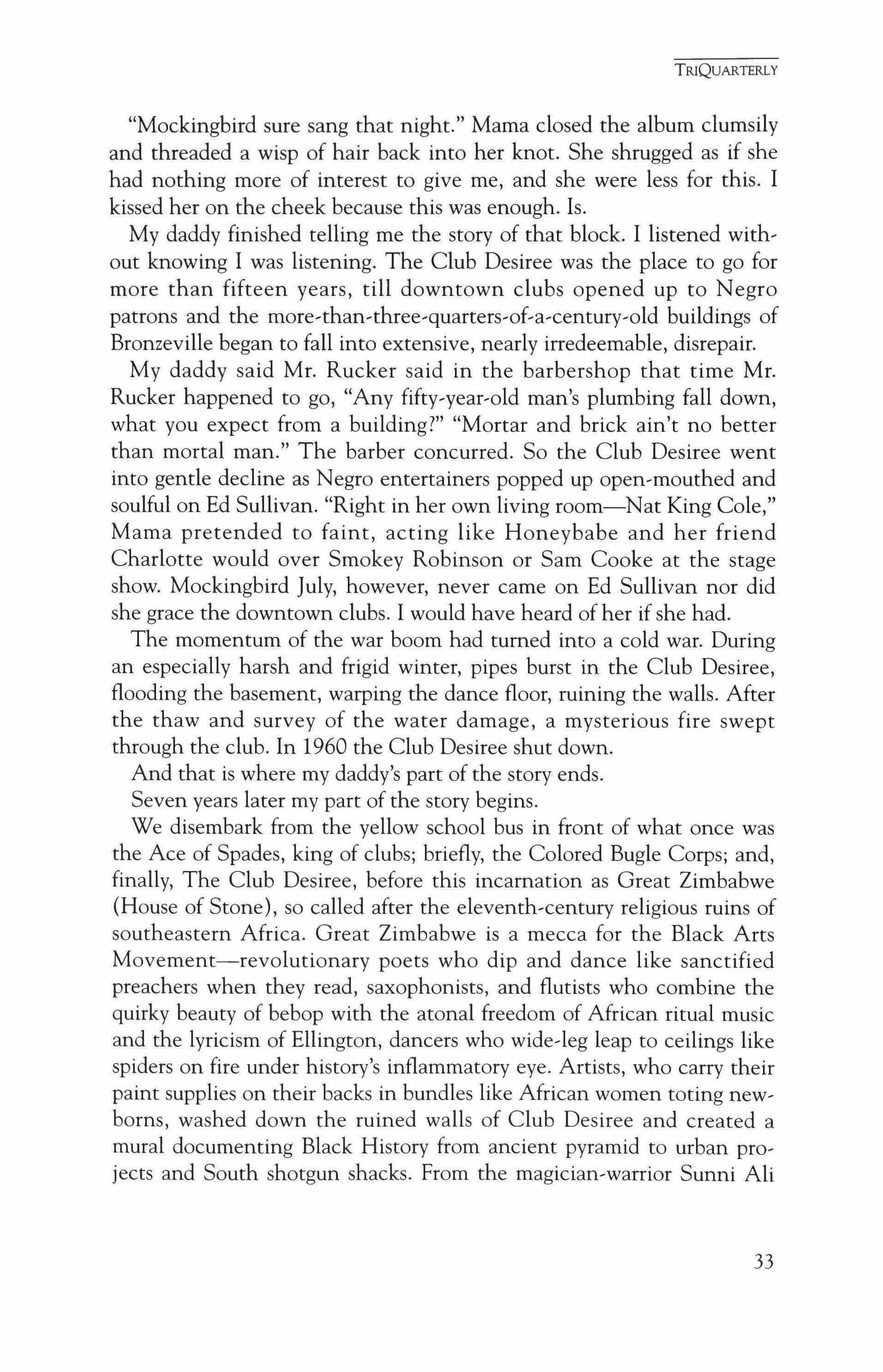
"Mockingbird sure sang that night." Mama closed the album clumsily and threaded a wisp of hair back into her knot. She shrugged as if she had nothing more of interest to give me, and she were less for this. I kissed her on the cheek because this was enough. Is.
My daddy finished telling me the story of that block. I listened without knowing I was listening. The Club Desiree was the place to go for more than fifteen years, till downtown clubs opened up to Negro patrons and the more�than�three�quarters�of�a�century-old buildings of Bronzeville began to fall into extensive, nearly irredeemable, disrepair.
My daddy said Mr. Rucker said in the barbershop that time Mr. Rucker happened to go, "Any fifty-year-old man's plumbing fall down, what you expect from a building?" "Mortar and brick ain't no better than mortal man." The barber concurred. So the Club Desiree went into gentle decline as Negro entertainers popped up open-mouthed and soulful on Ed Sullivan. "Right in her own living room-Nat King Cole," Mama pretended to faint, acting like Honeybabe and her friend Charlotte would over Smokey Robinson or Sam Cooke at the stage show. Mockingbird July, however, never came on Ed Sullivan nor did she grace the downtown clubs. I would have heard of her if she had.
The momentum of the war boom had turned into a cold war. During an especially harsh and frigid winter, pipes burst in the Club Desiree, flooding the basement, warping the dance floor, ruining the walls. After the thaw and survey of the water damage, a mysterious fire swept through the club. In 1960 the Club Desiree shut down.
And that is where my daddy's part of the story ends.
Seven years later my part of the story begins.
We disembark from the yellow school bus in front of what once was the Ace of Spades, king of clubs; briefly, the Colored Bugle Corps; and, finally, The Club Desiree, before this incarnation as Great Zimbabwe (House of Stone), so called after the eleventh-century religious ruins of southeastern Africa. Great Zimbabwe is a mecca for the Black Arts Movement-revolutionary poets who dip and dance like sanctified preachers when they read, saxophonists, and flutists who combine the quirky beauty of bebop with the atonal freedom of African ritual music and the lyricism of Ellington, dancers who wide-leg leap to ceilings like spiders on fire under history's inflammatory eye. Artists, who carry their paint supplies on their backs in bundles like African women toting newborns, washed down the ruined walls of Club Desiree and created a mural documenting Black History from ancient pyramid to urban projects and South shotgun shacks. From the magician-warrior Sunni Ali
TRIQUARTERLY
33
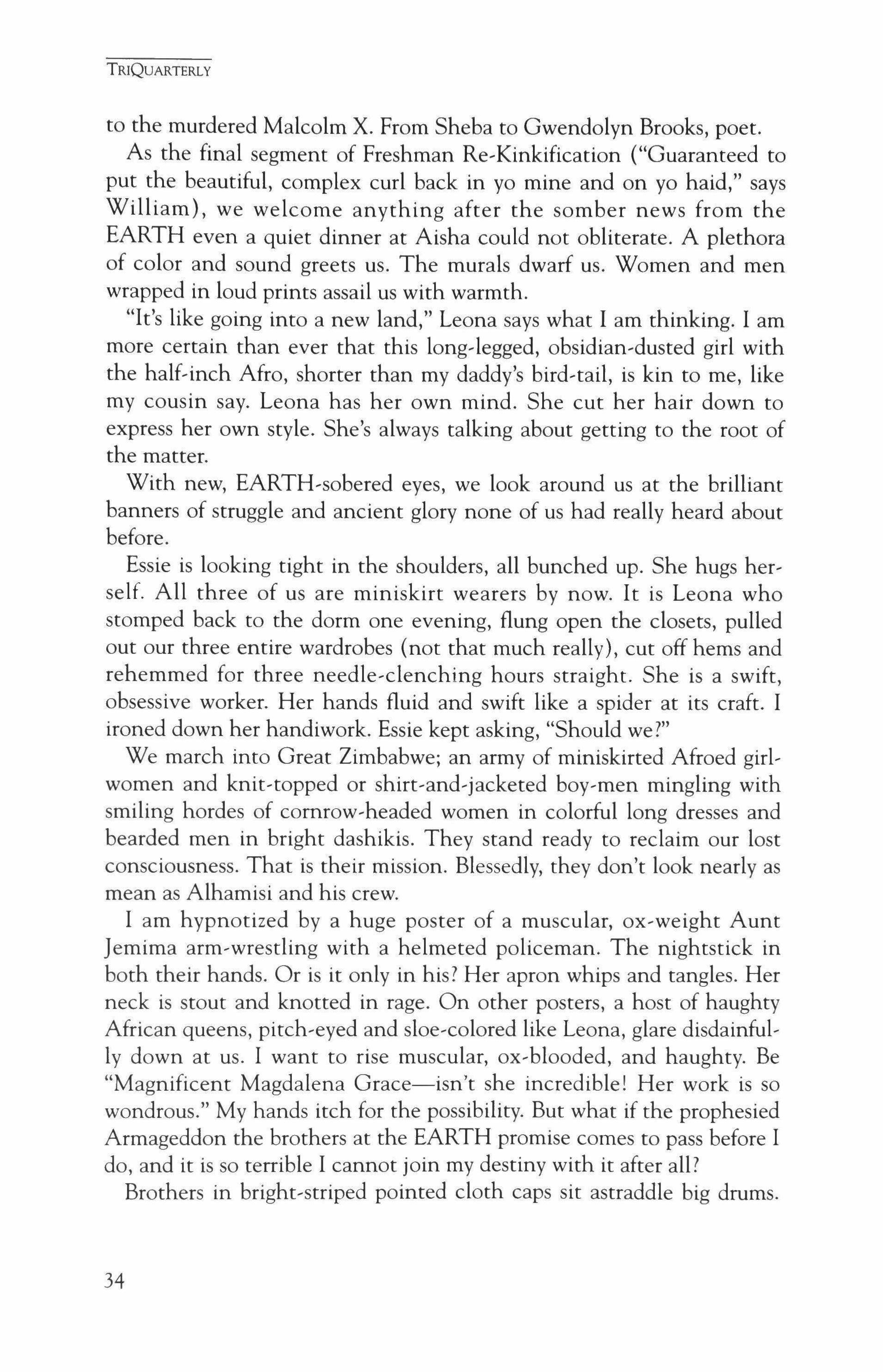
to the murdered Malcolm X. From Sheba to Gwendolyn Brooks, poet.
As the final segment of Freshman Re-Kinkification ("Guaranteed to put the beautiful, complex curl back in yo mine and on yo haid," says William), we welcome anything after the somber news from the EARTH even a quiet dinner at Aisha could not obliterate. A plethora of color and sound greets us. The murals dwarf us. Women and men wrapped in loud prints assail us with warmth.
"It's like going into a new land," Leona says what I am thinking. I am more certain than ever that this long-legged, obsidian-dusted girl with the half-inch Afro, shorter than my daddy's bird-tail, is kin to me, like my cousin say. Leona has her own mind. She cut her hair down to express her own style. She's always talking about getting to the root of the matter.
With new, EARTH�sobered eyes, we look around us at the brilliant banners of struggle and ancient glory none of us had really heard about before.
Essie is looking tight in the shoulders, all bunched up. She hugs herself. All three of us are miniskirt wearers by now. It is Leona who stomped back to the dorm one evening, flung open the closets, pulled out our three entire wardrobes (not that much really), cut off hems and rehemmed for three needle-clenching hours straight. She is a swift, obsessive worker. Her hands fluid and swift like a spider at its craft. I ironed down her handiwork. Essie kept asking, "Should we?"
We march into Great Zimbabwe; an army of miniskirted Afroed girlwomen and knit-topped or shirt-and-jacketed boy-men mingling with smiling hordes of cornrow-headed women in colorful long dresses and bearded men in bright dashikis. They stand ready to reclaim our lost consciousness. That is their mission. Blessedly, they don't look nearly as mean as Alhamisi and his crew.
I am hypnotized by a huge poster of a muscular, ox-weight Aunt Jemima arm-wrestling with a helmeted policeman. The nightstick in both their hands. Or is it only in his? Her apron whips and tangles. Her neck is stout and knotted in rage. On other posters, a host of haughty African queens, pitch-eyed and sloe-colored like Leona, glare disdainfully down at us. I want to rise muscular, ox-blooded, and haughty. Be "Magnificent Magdalena Grace-isn't she incredible! Her work is so wondrous." My hands itch for the possibility. But what if the prophesied Armageddon the brothers at the EARTH promise comes to pass before I do, and it is so terrible I cannot join my destiny with it after all?
Brothers in bright-striped pointed cloth caps sit astraddle big drums.
TRIQUARTERLY
34
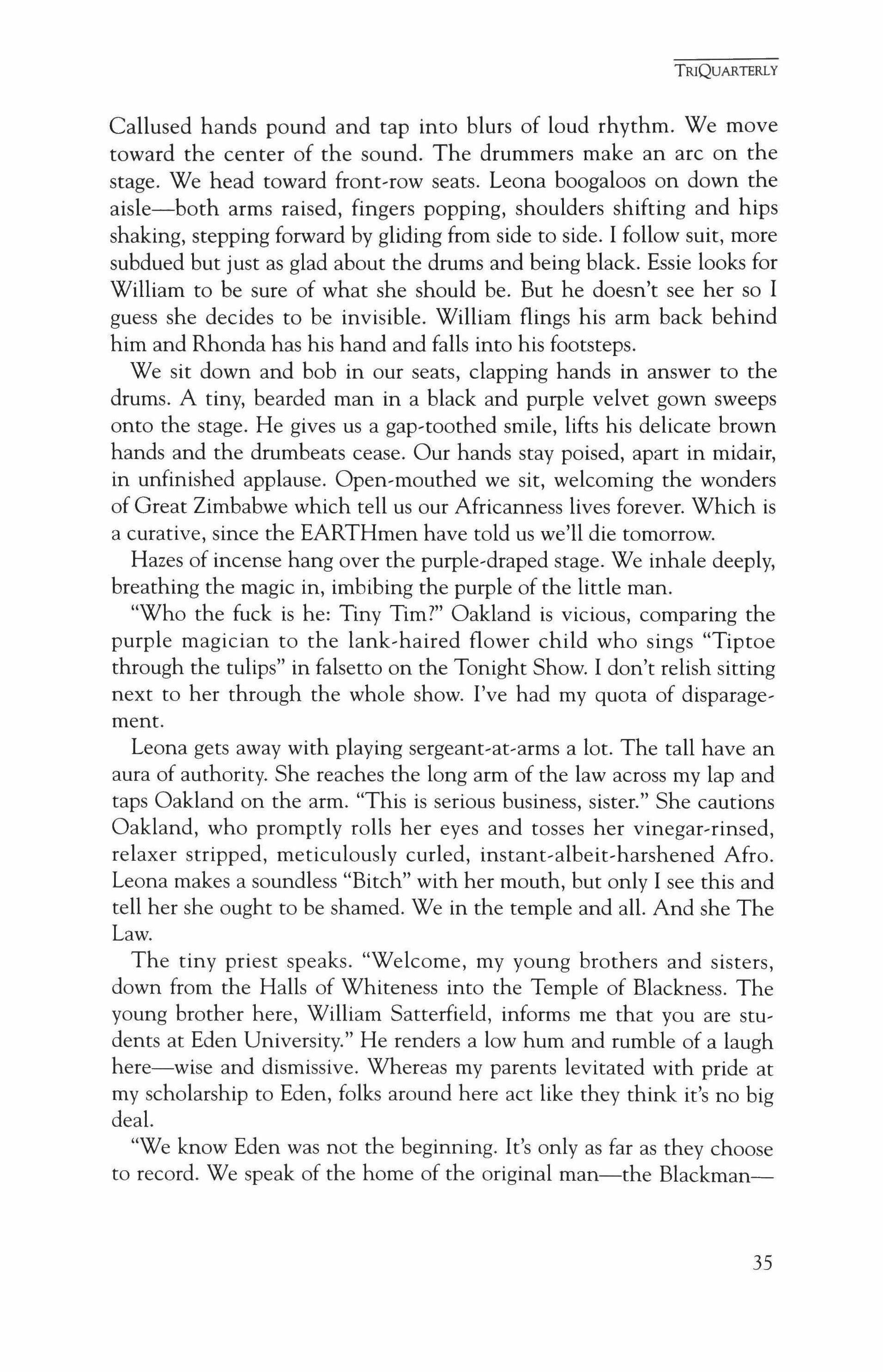
Callused hands pound and tap into blurs of loud rhythm. We move toward the center of the sound. The drummers make an arc on the stage. We head toward front-row seats. Leona boogaloos on down the aisle-both arms raised, fingers popping, shoulders shifting and hips shaking, stepping forward by gliding from side to side. I follow suit, more subdued but just as glad about the drums and being black. Essie looks for William to be sure of what she should be. But he doesn't see her so I guess she decides to be invisible. William flings his arm back behind him and Rhonda has his hand and falls into his footsteps.
We sit down and bob in our seats, clapping hands in answer to the drums. A tiny, bearded man in a black and purple velvet gown sweeps onto the stage. He gives us a gap'toothed smile, lifts his delicate brown hands and the drumbeats cease. Our hands stay poised, apart in midair, in unfinished applause. Open'mouthed we sit, welcoming the wonders of Great Zimbabwe which tell us our Africanness lives forever. Which is a curative, since the EARTHmen have told us we'll die tomorrow.
Hazes of incense hang over the purple-draped stage. We inhale deeply, breathing the magic in, imbibing the purple of the little man.
"Who the fuck is he: Tiny Tim?" Oakland is vicious, comparing the purple magician to the lank,haired flower child who sings "Tiptoe through the tulips" in falsetto on the Tonight Show. I don't relish sitting next to her through the whole show. I've had my quota of disparage, ment.
Leona gets away with playing sergeant,at,arms a lot. The tall have an aura of authority. She reaches the long arm of the law across my lap and taps Oakland on the arm. "This is serious business, sister." She cautions Oakland, who promptly rolls her eyes and tosses her vinegar-rinsed, relaxer stripped, meticulously curled, instant'albeit,harshened Afro. Leona makes a soundless "Bitch" with her mouth, but only I see this and tell her she ought to be shamed. We in the temple and all. And she The Law.
The tiny priest speaks. "Welcome, my young brothers and sisters, down from the Halls of Whiteness into the Temple of Blackness. The young brother here, William Satterfield, informs me that you are stu, dents at Eden University." He renders a low hum and rumble of a laugh here-wise and dismissive. Whereas my parents levitated with pride at my scholarship to Eden, folks around here act like they think it's no big deal.
"We know Eden was not the beginning. It's only as far as they choose to record. We speak of the home of the original man-the Blackman-
TRIQUARTERLY
35
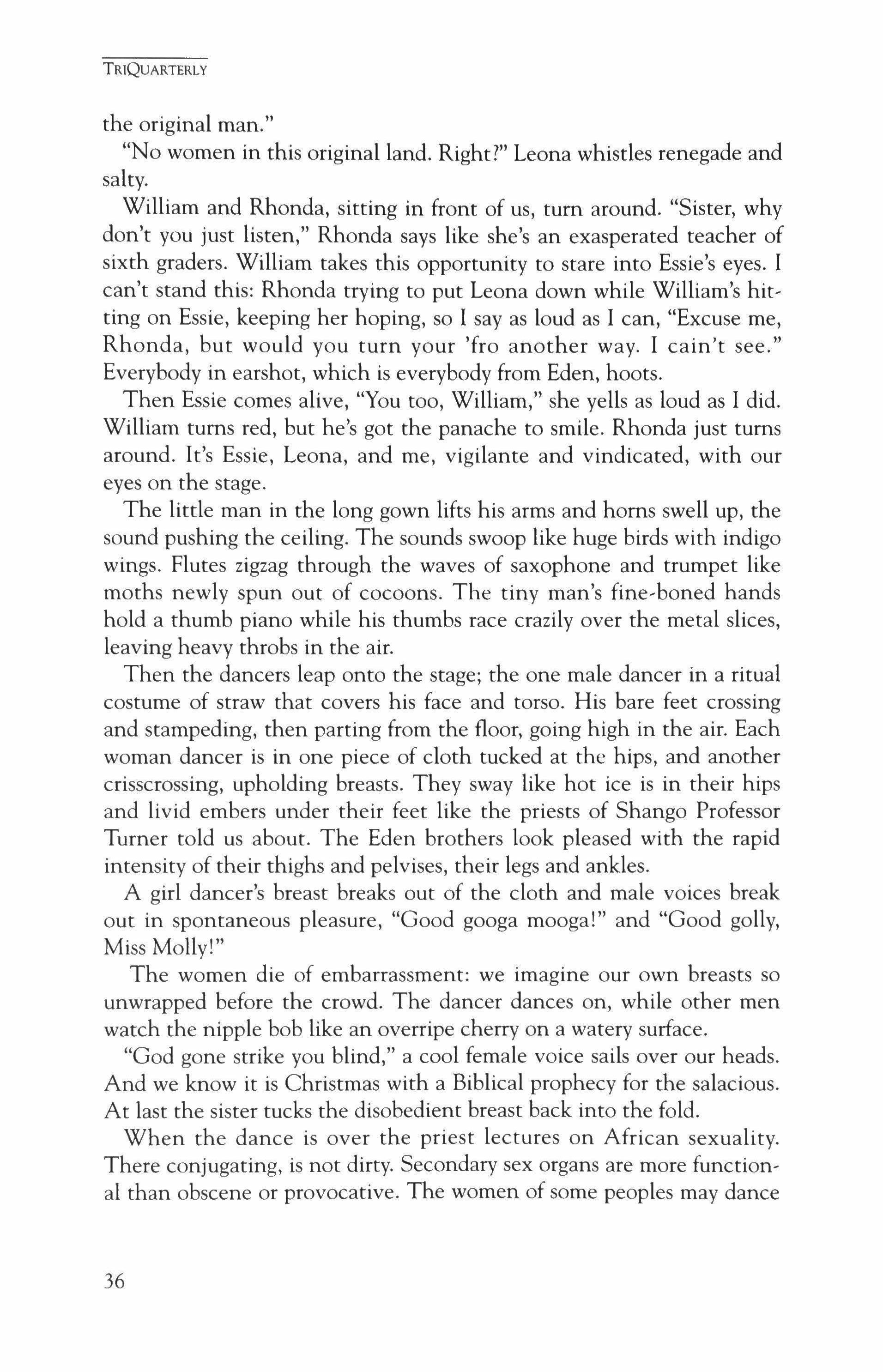
the original man."
"No women in this original land. Right?" Leona whistles renegade and salty.
William and Rhonda, sitting in front of us, tum around. "Sister, why don't you just listen," Rhonda says like she's an exasperated teacher of sixth graders. William takes this opportunity to stare into Essie's eyes. I can't stand this: Rhonda trying to put Leona down while William's hitting on Essie, keeping her hoping, so I say as loud as I can, "Excuse me, Rhonda, but would you turn your 'fro another way. I cairi't see." Everybody in earshot, which is everybody from Eden, hoots.
Then Essie comes alive, "You too, William," she yells as loud as I did. William turns red, but he's got the panache to smile. Rhonda just turns around. It's Essie, Leona, and me, vigilante and vindicated, with our eyes on the stage.
The little man in the long gown lifts his arms and horns swell up, the sound pushing the ceiling. The sounds swoop like huge birds with indigo wings. Flutes zigzag through the waves of saxophone and trumpet like moths newly spun out of cocoons. The tiny man's fine-boned hands hold a thumb piano while his thumbs race crazily over the metal slices, leaving heavy throbs in the air.
Then the dancers leap onto the stage; the one male dancer in a ritual costume of straw that covers his face and torso. His bare feet crossing and stampeding, then parting from the floor, going high in the air. Each woman dancer is in one piece of cloth tucked at the hips, and another crisscrossing, upholding breasts. They sway like hot ice is in their hips and livid embers under their feet like the priests of Shango Professor Turner told us about. The Eden brothers look pleased with the rapid intensity of their thighs and pelvises, their legs and ankles.
A girl dancer's breast breaks out of the cloth and male voices break out in spontaneous pleasure, "Good googa mooga!" and "Good golly, Miss Molly!"
The women die of embarrassment: we imagine our own breasts so unwrapped before the crowd. The dancer dances on, while other men watch the nipple bob like an overripe cherry on a watery surface.
"God gone strike you blind," a cool female voice sails over our heads. And we know it is Christmas with a Biblical prophecy for the salacious. At last the sister tucks the disobedient breast back into the fold.
When the dance is over the priest lectures on African sexuality. There conjugating, is not dirty. Secondary sex organs are more functional than obscene or provocative. The women of some peoples may dance
TRIQUARTERLY
36

unbound. Puritanism has made us all dirty children in the eye of the nipple. His audience properly chastened, the priest introduces John Olorun, master poet.
"He's so fine," Trixia already in the know about Olorun oozes at the name, as another underfed fine-boned man moves into the lights.
John Olorun wears shades that wrap around his eyes like raccoon's markings, or a Zorro mask. He slips through the crowd of students, the brothers studying his stance and walk; the sisters casting dreams of rescue and romance into the slight mold of his physique. Longing thuds heavily in my chest like a stone tossed into a dry well. I can hear the same desire echoing among sisters gathered here. We've seen pictures of Olorun, minus shades, smiling from a poster Great Zimbabwe sent to Eden, which we unhesitantly posted in Blood Island. Somewhere around Marcus Garvey. An homage achieved in the space of a slim volume of poems, black acts.
I wish I could draw in the dark.
We dream of his eyes-a dense brown we imagine losing ourselves in and find the lost secrets of cathartic release and serene repose under the gaze of a tender god. The wish-stone vibrates inside me. Like an egg cracking to life. He of the hidden eyes has a voice that barely slips out of hiding; it comes out of him husky, covered in innuendo, furtive, quiet as wine. We lean forward, us would-be-women, closer to his whisper; we wait for the heady rush of flight, lifting wish-stones out of our insides. He knows, doesn't he, his power? He draws images in the air, whispers, and does not look at us with his hidden eyes. All his nuances enchant.
He makes a joke about bloods ripping off sisters; laughs without sound. A twinless dimple flashes in one cheek. A sigh at the sight of the tiny triangle in his cheek ripples through the sisters. Most brothers study him with greater intensity-searching for flaw or scar. The remaining brothers guess what gesture, eccentricity of Olorun's to cop and incorporate into their caches of coolest mannerism. Always there are one or two who listen only to the words.
Ducking his head shyly under the blue glow, John Olorun reads a poem he calls "Promiseland."
Race-keeper, Warm-bringer, Misunderstood by her man.
I have seen you sisters, Lovely queens, quiet in your beauty.
TRIQUARTERLY
37
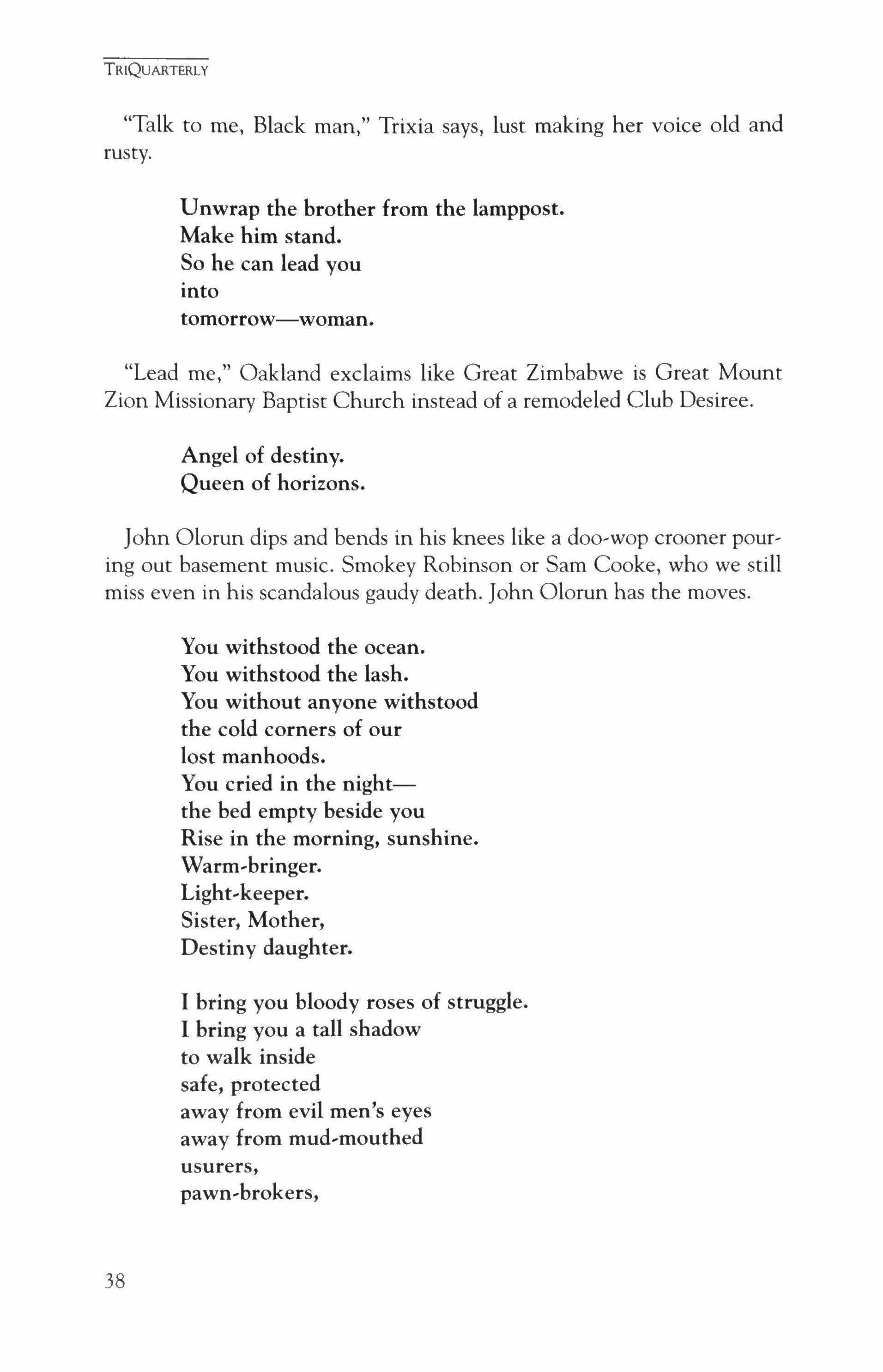
"Talk to me, Black man," Trixia says, lust making her voice old and rusty.
Unwrap the brother from the lamppost. Make him stand. So he can lead you into tomorrow-woman.
"Lead me," Oakland exclaims like Great Zimbabwe is Great Mount Zion Missionary Baptist Church instead of a remodeled Club Desiree.
Angel of destiny. Queen of horizons.
John Olorun dips and bends in his knees like a doo-wop crooner pouring out basement music. Smokey Robinson or Sam Cooke, who we still miss even in his scandalous gaudy death. John Olorun has the moves.
You withstood the ocean. You withstood the lash. You without anyone withstood the cold corners of our lost manhoods. You cried in the nightthe bed empty beside you Rise in the morning, sunshine. Warm-bringer. Light-keeper. Sister, Mother, Destiny daughter.
I bring you bloody roses of struggle. I bring you a tall shadow to walk inside safe, protected away from evil men's eyes away from mud-mouthed usurers, pawn-brokers,
TRIQUARTERLY
38
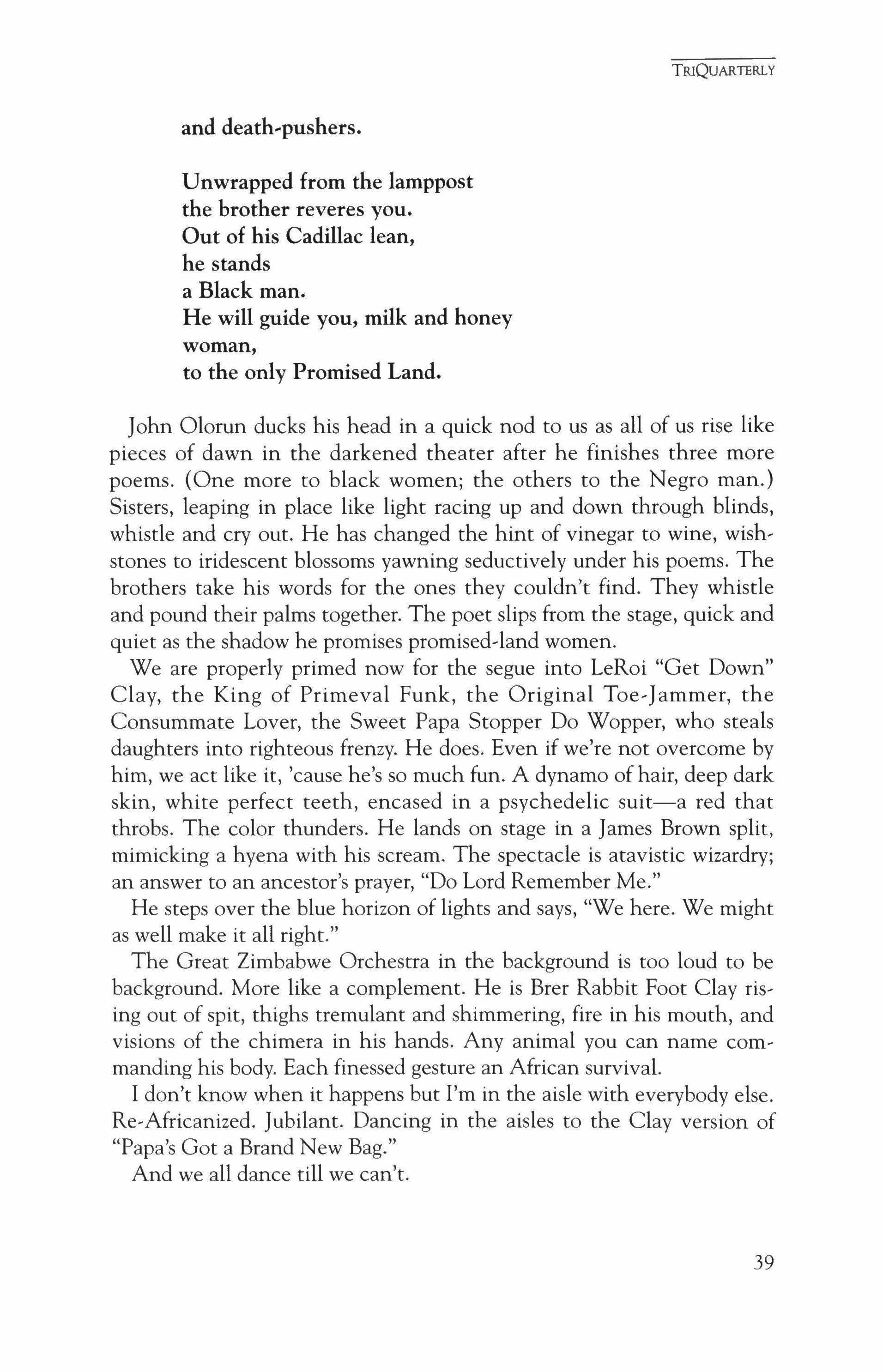
and death-pushers.
Unwrapped from the lamppost the brother reveres you. Out of his Cadillac lean, he stands a Black man. He will guide you, milk and honey woman, to the only Promised Land.
John Olorun ducks his head in a quick nod to us as all of us rise like pieces of dawn in the darkened theater after he finishes three more poems. (One more to black women; the others to the Negro man.) Sisters, leaping in place like light racing up and down through blinds, whistle and cry out. He has changed the hint of vinegar to wine, wishstones to iridescent blossoms yawning seductively under his poems. The brothers take his words for the ones they couldn't find. They whistle and pound their palms together. The poet slips from the stage, quick and quiet as the shadow he promises promised-land women.
We are properly primed now for the segue into LeRoi "Get Down" Clay, the King of Primeval Funk, the Original Toe-jammer, the Consummate Lover, the Sweet Papa Stopper Do Wopper, who steals daughters into righteous frenzy. He does. Even if we're not overcome by him, we act like it, 'cause he's so much fun. A dynamo of hair, deep dark skin, white perfect teeth, encased in a psychedelic suit-a red that throbs. The color thunders. He lands on stage in a James Brown split, mimicking a hyena with his scream. The spectacle is atavistic wizardry; an answer to an ancestor's prayer, "Do Lord Remember Me."
He steps over the blue horizon of lights and says, "We here. We might as well make it all right."
The Great Zimbabwe Orchestra in the background is too loud to be background. More like a complement. He is Brer Rabbit Foot Clay rising out of spit, thighs tremulant and shimmering, fire in his mouth, and visions of the chimera in his hands. Any animal you can name commanding his body. Each finessed gesture an African survival.
I don't know when it happens but I'm in the aisle with everybody else. Re-Africanized. Jubilant. Dancing in the aisles to the Clay version of "Papa's Got a Brand New Bag."
And we all dance till we can't.
TRIQUARTERLY
39
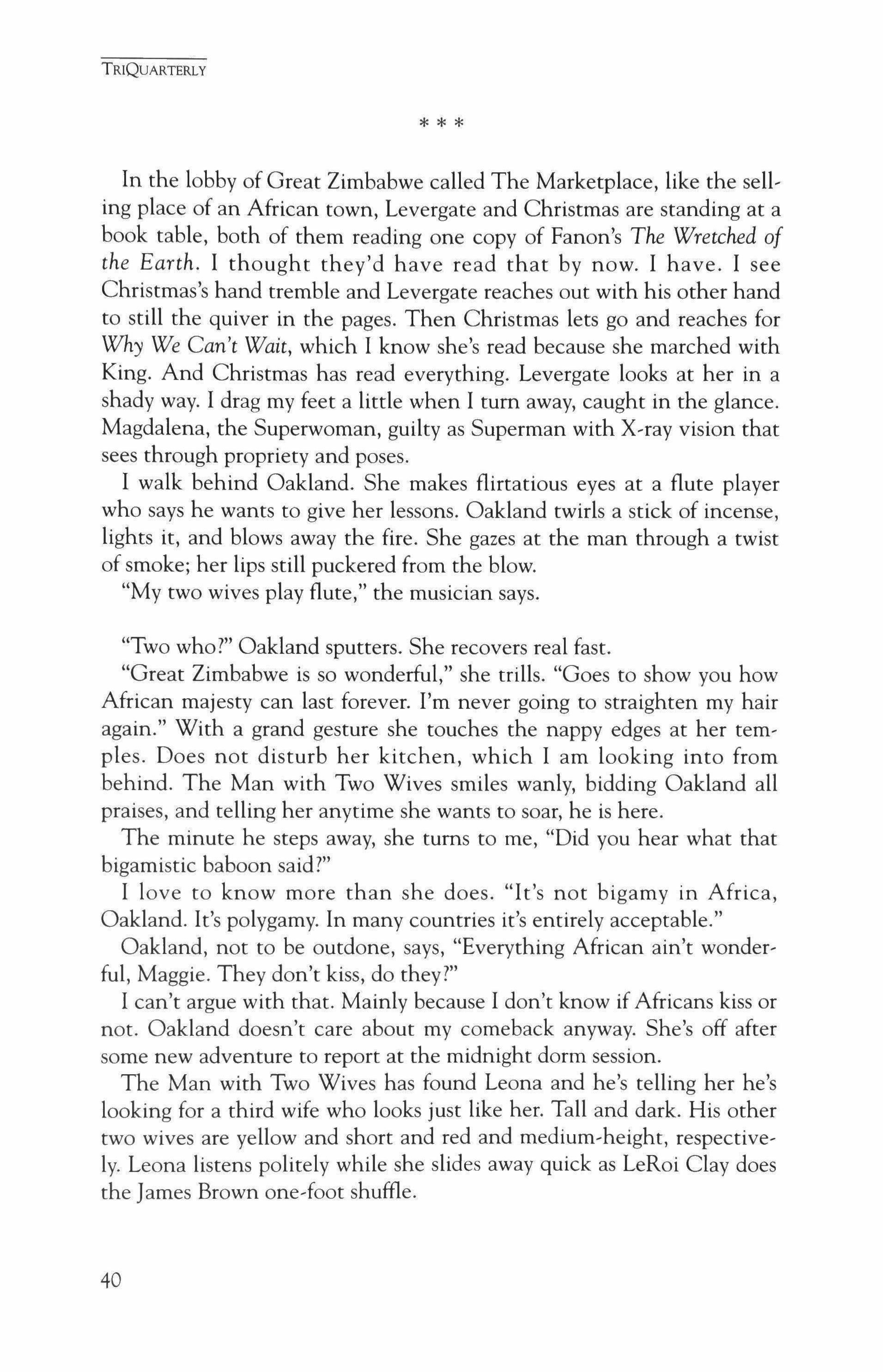
In the lobby of Great Zimbabwe called The Marketplace, like the selling place of an African town, Levergate and Christmas are standing at a book table, both of them reading one copy of Fanon's The Wretched of the Earth. I thought they'd have read that by now. I have. I see Christmas's hand tremble and Levergate reaches out with his other hand to still the quiver in the pages. Then Christmas lets go and reaches for Why We Can't Wait, which I know she's read because she marched with King. And Christmas has read everything. Levergate looks at her in a shady way. I drag my feet a little when I tum away, caught in the glance. Magdalena, the Superwoman, guilty as Superman with Xvray vision that sees through propriety and poses.
I walk behind Oakland. She makes flirtatious eyes at a flute player who says he wants to give her lessons. Oakland twirls a stick of incense, lights it, and blows away the fire. She gazes at the man through a twist of smoke; her lips still puckered from the blow.
"My two wives play flute," the musician says.
"Two who?" Oakland sputters. She recovers real fast.
"Great Zimbabwe is so wonderful," she trills. "Goes to show you how African majesty can last forever. I'm never going to straighten my hair again." With a grand gesture she touches the nappy edges at her ternples. Does not disturb her kitchen, which I am looking into from behind. The Man with Two Wives smiles wanly, bidding Oakland all praises, and telling her anytime she wants to soar, he is here.
The minute he steps away, she turns to me, "Did you hear what that bigamistic baboon said?"
I love to know more than she does. "It's not bigamy in Africa, Oakland. It's polygamy. In many countries it's entirely acceptable." Oakland, not to be outdone, says, "Everything African ain't wonderful, Maggie. They don't kiss, do they?"
I can't argue with that. Mainly because I don't know if Africans kiss or not. Oakland doesn't care about my comeback anyway. She's off after some new adventure to report at the midnight dorm session.
The Man with Two Wives has found Leona and he's telling her he's looking for a third wife who looks just like her. Tall and dark. His other two wives are yellow and short and red and medium-height, respectively. Leona listens politely while she slides away quick as LeRoi Clay does the J ames Brown one-foot shuffle.
TRIQUARTERLY * * *
40
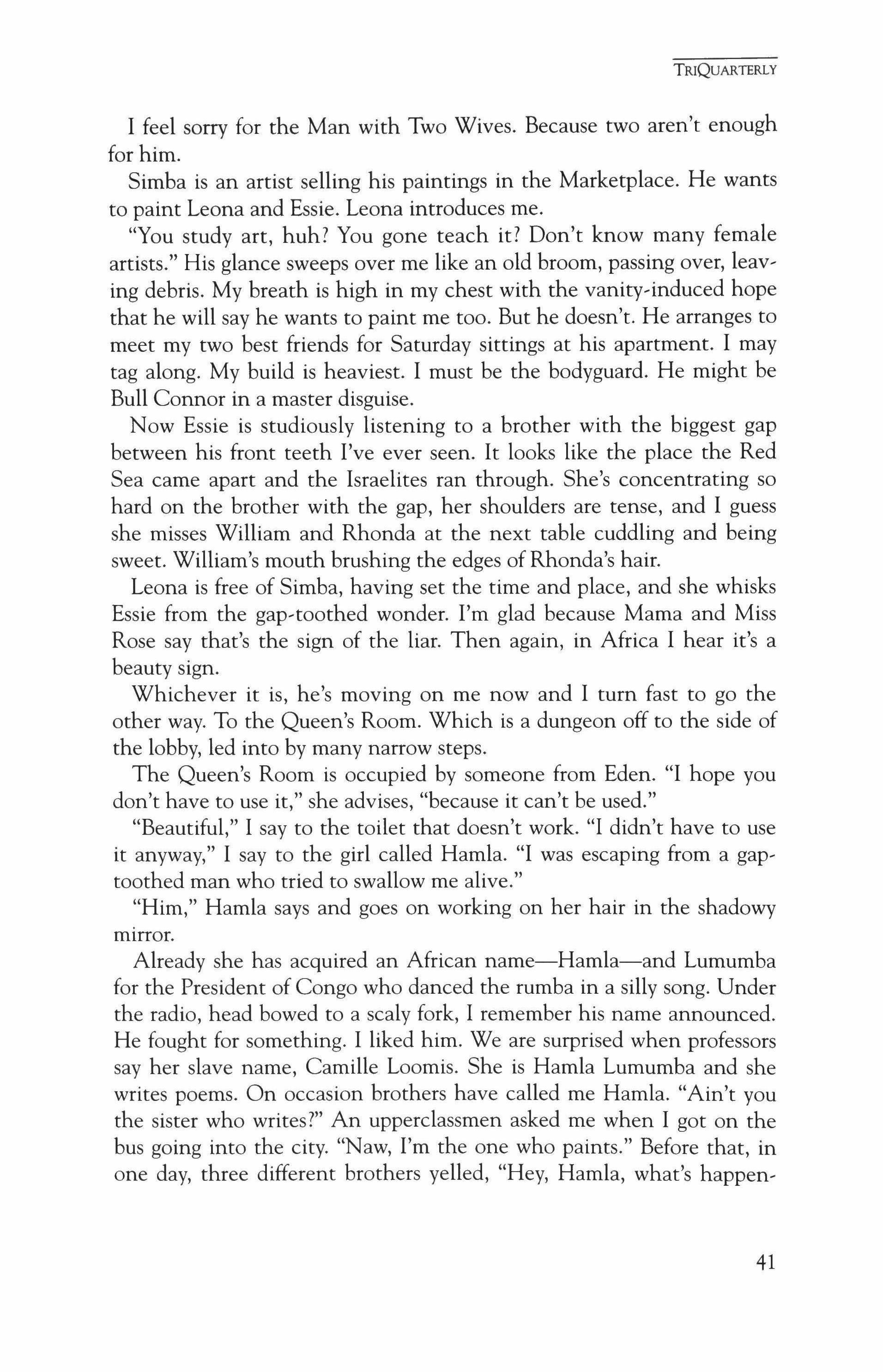
I feel sorry for the Man with Two Wives. Because two aren't enough for him.
Simba is an artist selling his paintings in the Marketplace. He wants to paint Leona and Essie. Leona introduces me.
"You study art, huh? You gone teach it? Don't know many female artists." His glance sweeps over me like an old broom, passing over, leaving debris. My breath is high in my chest with the vanity,induced hope that he will say he wants to paint me too. But he doesn't. He arranges to meet my two best friends for Saturday sittings at his apartment. I may tag along. My build is heaviest. I must be the bodyguard. He might be Bull Connor in a master disguise.
Now Essie is studiously listening to a brother with the biggest gap between his front teeth I've ever seen. It looks like the place the Red Sea came apart and the Israelites ran through. She's concentrating so hard on the brother with the gap, her shoulders are tense, and I guess she misses William and Rhonda at the next table cuddling and being sweet. William's mouth brushing the edges of Rhonda's hair.
Leona is free of Simba, having set the time and place, and she whisks Essie from the gap'toothed wonder. I'm glad because Mama and Miss Rose say that's the sign of the liar. Then again, in Africa I hear it's a beauty sign.
Whichever it is, he's moving on me now and I turn fast to go the other way. To the Queen's Room. Which is a dungeon off to the side of the lobby, led into by many narrow steps.
The Queen's Room is occupied by someone from Eden. "I hope you don't have to use it," she advises, "because it can't be used."
"Beautiful," I say to the toilet that doesn't work. "I didn't have to use it anyway," I say to the girl called Hamla. "I was escaping from a gap' toothed man who tried to swallow me alive."
"Him," Hamla says and goes on working on her hair in the shadowy mirror.
Already she has acquired an African name-Hamla-and Lumumba for the President of Congo who danced the rumba in a silly song. Under the radio, head bowed to a scaly fork, I remember his name announced. He fought for something. I liked him. We are surprised when professors say her slave name, Camille Loomis. She is Hamla Lumumba and she writes poems. On occasion brothers have called me Hamla. "Ain't you the sister who writes?" An upperclassmen asked me when I got on the bus going into the city. "Naw, I'm the one who paints." Before that, in one day, three different brothers yelled, "Hey, Hamla, what's happen,
TRIQUARTERLY
41

ing?" to me. Into the dorm room I had flown to the mirror to engage my true identity. In the mirror we stand together today. And I search out the distinction between us.
Hamla's skin is like polished pecans. So is mine. Hamla's eyes are almond-shaped. So are mine. Hamla's eyes are keen with intelligence and soft with imagination. Aren't mine? Hamla's body is ripe and curvaceous, innocently curved in jeans and sweaters or skirts that are modest as minis go. So is my body curved so. Hamla's hair is gently sculptured. So is mine, shined with Afro Sheen. Hamla is shy with restrained pride, tender ego. So am I.
In the mirror I am gloomy because I am not spectacularly individual. I search for exemplary deviation-my cheekbones are higher, my face fuller, my hips rounder, my arms thinner, one tooth almost imperceptibly chipped one day when I was seven and drinking water from the kitchen faucet. A piece of tooth, like a large grain of sand, in the palm of my hand. I trace the tiny dent in my tooth, relieved to be set apart by the smallest memory. Hamla leaves me in my minuscule victory. I comb my hair.
When I re-enter The Marketplace, Hamla who looks like me is talking to John Olorun, the poet. I recognize the glow around her as she hands him a notebook full of what must be her poems. She bows a little when she talks to him; he looks earnest, ducking his head like a retarded goose like when he performs his poems. I observe him coldly because he's not talking to me. Envy crawls from under my wish-stone, slips through me like a snake. I have nothing to show a poet. My right hand lifts to the tear duct in my right eye. I want to ask why my hand paints instead of writes at a time like this, when poets rule hearts and imaginations. And get so much applause and approval in The Marketplace. I scoot near enough to hear John Olorun promise to give Hamla a call after he's read her poems. What's she doing carrying poems around with her anyway? I don't carry an easel. But I sure wish I could.
Everybody but me has found something to treasure in the club known as desire. It feels like that.
* * *
Trixia has a craving like she's pregnant all the time. This time she longs for barbecue with mambo sauce. She moans for it so loud and long we start to want some too. Leona swears her daddy's barbecue is the best in the city, but Pryor's BoneYard is too far to go.
TRIQUARTERLY
42

"The bus leaves here at 11:30 and we're not keeping colored people's time," William warns us in case we're having second thoughts about trying to make it to Leona's Daddy's for free ribs or chicken and back in time for the bus to Eden. Essie knuckles her hunger under William's warning. She gets on the bus obediently, which makes Leona and me more determined to taste the forbidden sauce.
"I heard about a place," Leona declares. Mutinous. "Three blocks from here."
"Who's hungry?" Trixia announces the question to the crowd. And Oakland, Hamla and two other sisters line up with their tongues hanging out.
Stomachs rumbling, mouths watering, we go in search of mambo sauce and bones to suck on.
"Flesh Eaters. Flesh Eaters. That pig, cow, and bird will kill you, beautiful sisters." We beautiful sisters now. The Man with Two Wives admonishes us, loud as neon, painting us scarlet. Like the kids sing, "Yo mama got the measles and yo daddy got the pox." Mama laughed one night at the window, crying from it, "When we was little pox meant syphilis." Anything evil and contagious. We the ones.
"We gone die smiling," Trixia trots on down the street behind Leona. Then we follow.
TRIQUARTERLY
43
Two Women
Martha Stephens
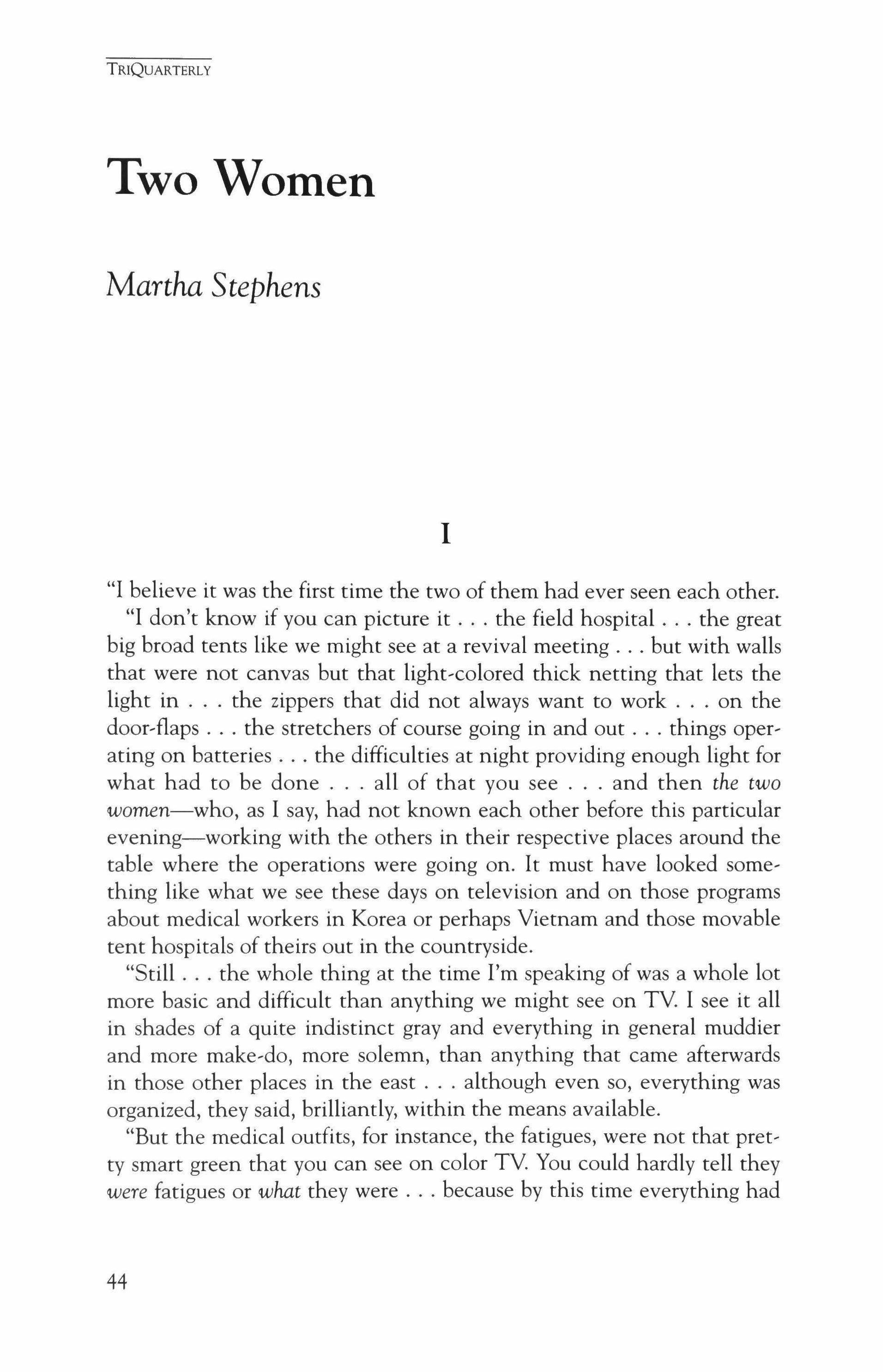
I"I believe it was the first time the two of them had ever seen each other.
"I don't know if you can picture it the field hospital the great big broad tents like we might see at a revival meeting but with walls that were not canvas but that light-colored thick netting that lets the light in the zippers that did not always want to work on the door-flaps the stretchers of course going in and out things operating on batteries the difficulties at night providing enough light for what had to be done all of that you see and then the two women-who, as I say, had not known each other before this particular evening-working with the others in their respective places around the table where the operations were going on. It must have looked something like what we see these days on television and on those programs about medical workers in Korea or perhaps Vietnam and those movable tent hospitals of theirs out in the countryside.
"Still the whole thing at the time I'm speaking of was a whole lot more basic and difficult than anything we might see on TV. I see it all in shades of a quite indistinct gray and everything in general muddier and more make-do, more solemn, than anything that came afterwards in those other places in the east although even so, everything was organized, they said, brilliantly, within the means available.
"But the medical outfits, for instance, the fatigues, were not that pretty smart green that you can see on color TV. You could hardly tell they were fatigues or what they were because by this time everything had
TRIQUARTERLY
44
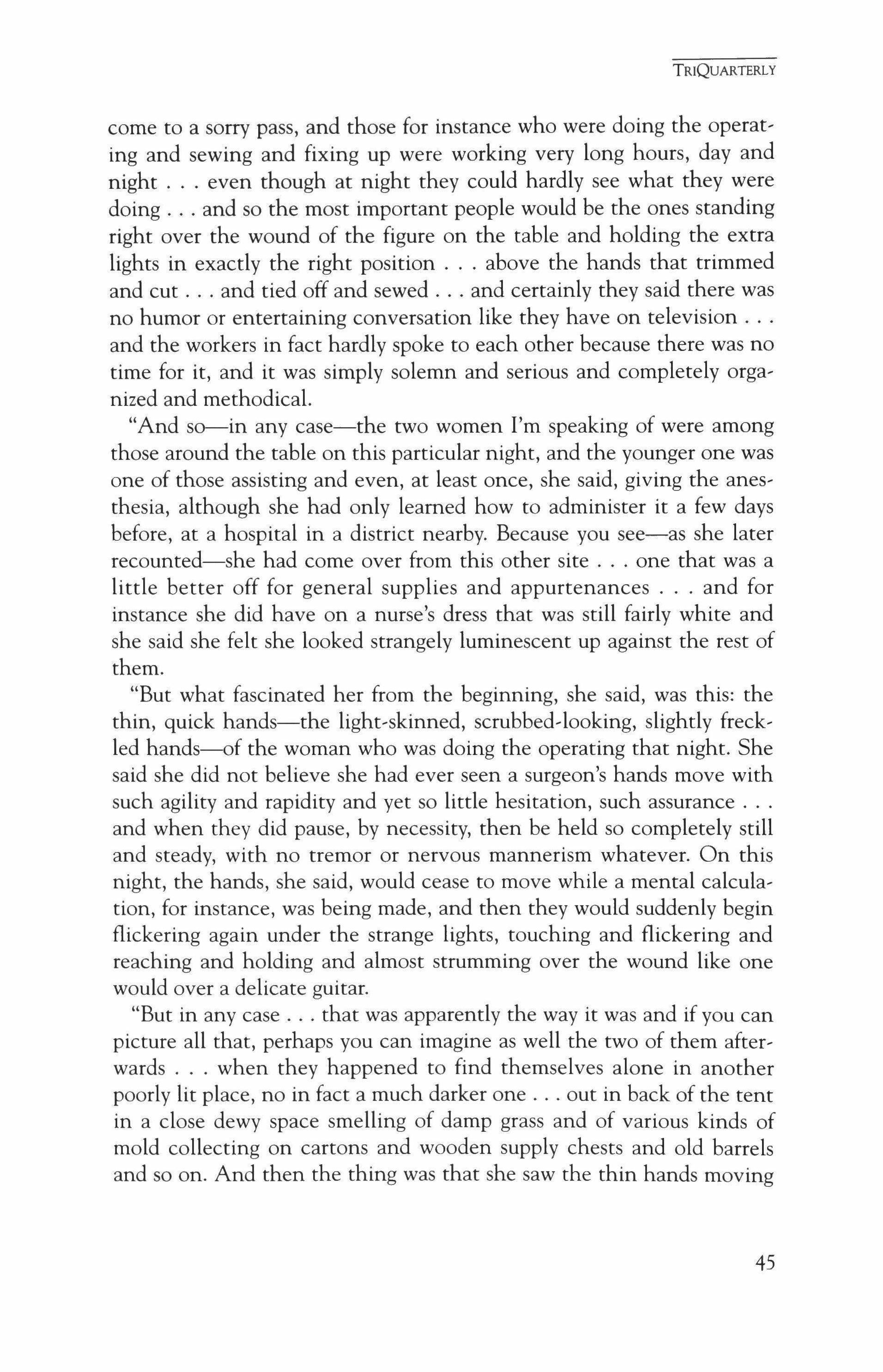
come to a sorry pass, and those for instance who were doing the operating and sewing and fixing up were working very long hours, day and night even though at night they could hardly see what they were doing and so the most important people would be the ones standing right over the wound of the figure on the table and holding the extra lights in exactly the right position above the hands that trimmed and cut and tied off and sewed and certainly they said there was no humor or entertaining conversation like they have on television and the workers in fact hardly spoke to each other because there was no time for it, and it was simply solemn and serious and completely organized and methodical.
"And so-in any case-the two women I'm speaking of were among those around the table on this particular night, and the younger one was one of those assisting and even, at least once, she said, giving the anesthesia, although she had only learned how to administer it a few days before, at a hospital in a district nearby. Because you see-as she later recounted-she had come over from this other site one that was a little better off for general supplies and appurtenances and for instance she did have on a nurse's dress that was still fairly white and she said she felt she looked strangely luminescent up against the rest of them.
"But what fascinated her from the beginning, she said, was this: the thin, quick hands-the light-skinned, scrubbed-looking, slightly freckled hands-of the woman who was doing the operating that night. She said she did not believe she had ever seen a surgeon's hands move with such agility and rapidity and yet so little hesitation, such assurance and when they did pause, by necessity, then be held so completely still and steady, with no tremor or nervous mannerism whatever. On this night, the hands, she said, would cease to move while a mental calculation, for instance, was being made, and then they would suddenly begin flickering again under the strange lights, touching and flickering and reaching and holding and almost strumming over the wound like one would over a delicate guitar.
"But in any case that was apparently the way it was and if you can picture all that, perhaps you can imagine as well the two of them afterwards when they happened to find themselves alone in another poorly lit place, no in fact a much darker one out in back of the tent in a close dewy space smelling of damp grass and of various kinds of mold collecting on cartons and wooden supply chests and old barrels and so on. And then the thing was that she saw the thin hands moving
TRIQUARTERLY
45
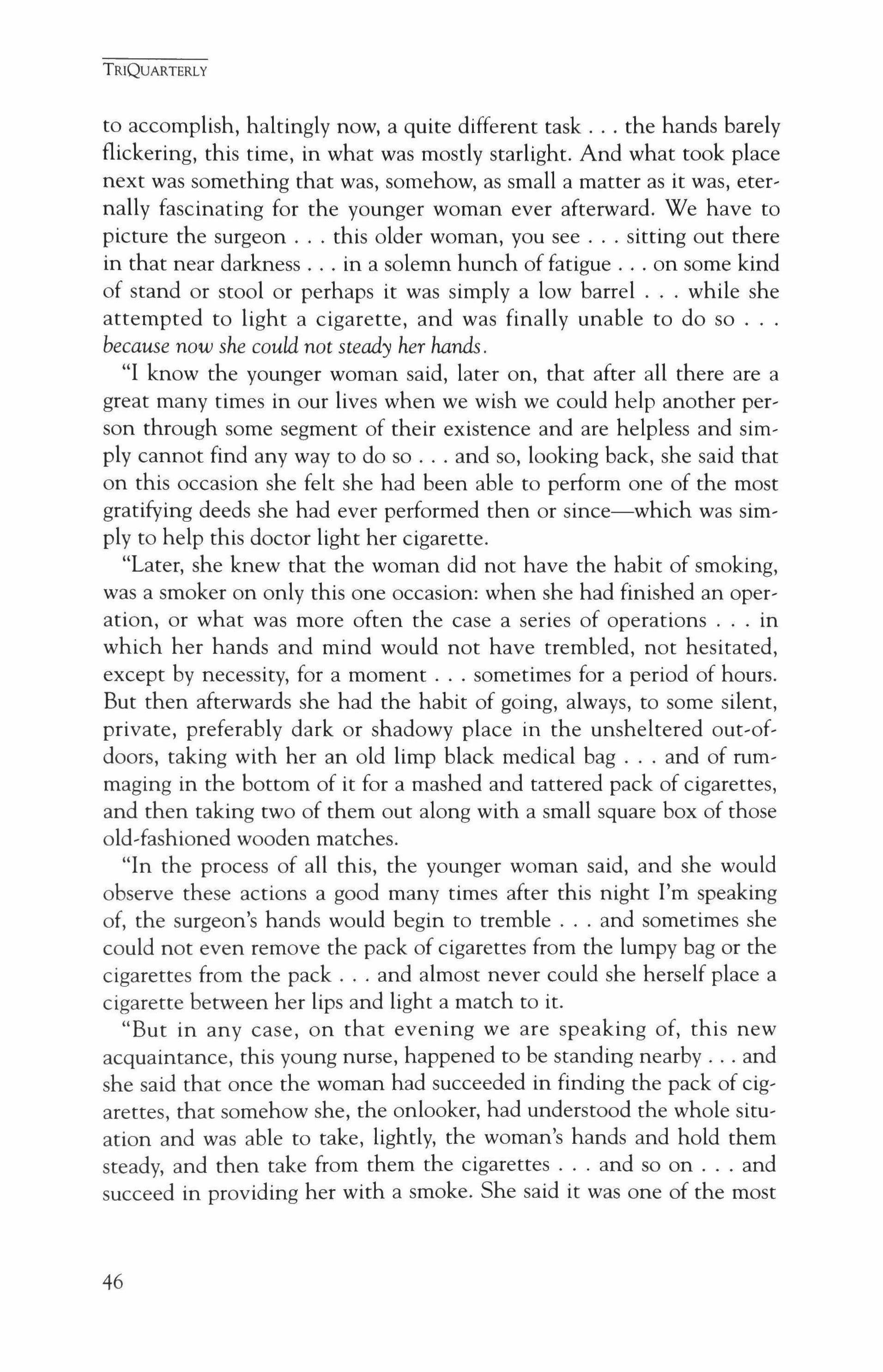
to accomplish, haltingly now, a quite different task the hands barely flickering, this time, in what was mostly starlight. And what took place next was something that was, somehow, as small a matter as it was, eternally fascinating for the younger woman ever afterward. We have to picture the surgeon this older woman, you see sitting out there in that near darkness in a solemn hunch of fatigue on some kind of stand or stool or perhaps it was simply a low barrel while she attempted to light a cigarette, and was finally unable to do so because now she could not steady her hands.
"I know the younger woman said, later on, that after all there are a great many times in our lives when we wish we could help another person through some segment of their existence and are helpless and simply cannot find any way to do so and so, looking back, she said that on this occasion she felt she had been able to perform one of the most gratifying deeds she had ever performed then or since-which was simply to help this doctor light her cigarette.
"Later, she knew that the woman did not have the habit of smoking, was a smoker on only this one occasion: when she had finished an operation, or what was more often the case a series of operations in which her hands and mind would not have trembled, not hesitated, except by necessity, for a moment sometimes for a period of hours. But then afterwards she had the habit of going, always, to some silent, private, preferably dark or shadowy place in the unsheltered out-ofdoors, taking with her an old limp black medical bag and of rummaging in the bottom of it for a mashed and tattered pack of cigarettes, and then taking two of them out along with a small square box of those old-fashioned wooden matches.
"In the process of all this, the younger woman said, and she would observe these actions a good many times after this night I'm speaking of, the surgeon's hands would begin to tremble and sometimes she could not even remove the pack of cigarettes from the lumpy bag or the cigarettes from the pack and almost never could she herself place a cigarette between her lips and light a match to it.
"But in any case, on that evening we are speaking of, this new acquaintance, this young nurse, happened to be standing nearby and she said that once the woman had succeeded in finding the pack of cigarettes, that somehow she, the onlooker, had understood the whole situation and was able to take, lightly, the woman's hands and hold them steady, and then take from them the cigarettes and so on and succeed in providing her with a smoke. She said it was one of the most
TRIQUARTERLY
46
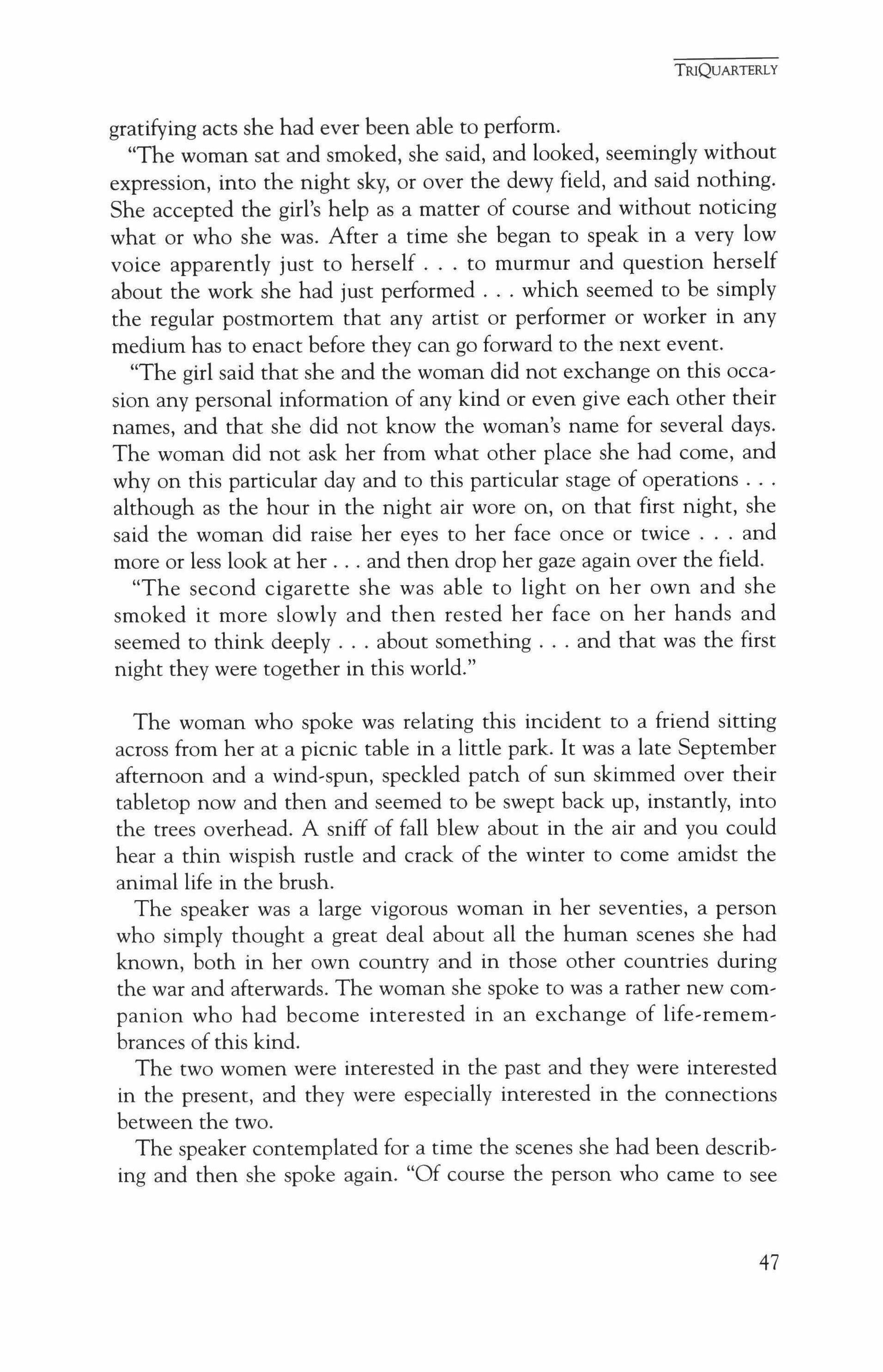
gratifying acts she had ever been able to perform.
"The woman sat and smoked, she said, and looked, seemingly without expression, into the night sky, or over the dewy field, and said nothing. She accepted the girl's help as a matter of course and without noticing what or who she was. After a time she began to speak in a very low voice apparently just to herself to murmur and question herself about the work she had just performed which seemed to be simply the regular postmortem that any artist or performer or worker in any medium has to enact before they can go forward to the next event.
"The girl said that she and the woman did not exchange on this occasion any personal information of any kind or even give each other their names, and that she did not know the woman's name for several days. The woman did not ask her from what other place she had come, and why on this particular day and to this particular stage of operations although as the hour in the night air wore on, on that first night, she said the woman did raise her eyes to her face once or twice and more or less look at her and then drop her gaze again over the field.
"The second cigarette she was able to light on her own and she smoked it more slowly and then rested her face on her hands and seemed to think deeply about something and that was the first night they were together in this world."
The woman who spoke was relating this incident to a friend sitting across from her at a picnic table in a little park. It was a late September afternoon and a wind-spun, speckled patch of sun skimmed over their tabletop now and then and seemed to be swept back up, instantly, into the trees overhead. A sniff of fall blew about in the air and you could hear a thin wispish rustle and crack of the winter to come amidst the animal life in the brush.
The speaker was a large vigorous woman in her seventies, a person who simply thought a great deal about all the human scenes she had known, both in her own country and in those other countries during the war and afterwards. The woman she spoke to was a rather new companion who had become interested in an exchange of life-remembrances of this kind.
The two women were interested in the past and they were interested in the present, and they were especially interested in the connections between the two.
The speaker contemplated for a time the scenes she had been describing and then she spoke again. "Of course the person who came to see
TruQUARTERLY
47

me last week the visitor I had caused me to think once more about all of this and these two women I had known during the war and to relate to him certain things that-" She smiled faintly.
"I probably sound like that old book Wuthering Heights the old woman telling that peculiar story by a fireside years later after the main characters, if I may put it that way, had all died." The speaker smiled wryly at herself. "I know I used to like that book very much. But in fact I did speak to this young visitor quite frankly since he seemed to want that very much, and these days, especially with the new attitudes that people have about all kinds of relationships Her voice drew itself out and she looked away for a moment into the green hedges of the park and listened to the thin crackle of the insect life within the brush.
"Of course I myself was not in their line of work and although I was in the same army, I was not usually involved in that district. But I visited them once in the town where they went to live afterwards sometime, that is, after they had worked together in the field hospitals of the army and then been transferred or assigned in some way-I'm not sure I understood it even at the time-to an organization of European doctors who were treating the noncombatants, the common people themselves living in the zones of war.
"The two of them had found, or been loaned or assigned in some way, an abandoned apartment in a building that had been fitted for rather decent living before the war but which was mostly empty, at the time we're speaking of, and in fact had had one of its front porticos half-gutted by bombs. From the street you might not have thought anyone was living there at all, and yet the electricity had been kept on, when there was any in the district to be kept on, and some water, and sometimes the old steam heat even consented to work, and there were a number of apartments in the building that were being used in a similar way by people in the military or the other special populations that had been brought there by the war.
"To say that it was a home-no and certainly it was not a romantic retreat of any kind no-o. I have a picture in my mind though of a certain kind of order achieved out of a fundamental, a profound disorder in the society of war around them.
"The main room where they slept was also a makeshift kind of sitting room, with an ancient sofa sitting along the back wall, and some rather strange chairs, and then along the front wall was a line of what seemed
TRIQUARTERLY
48
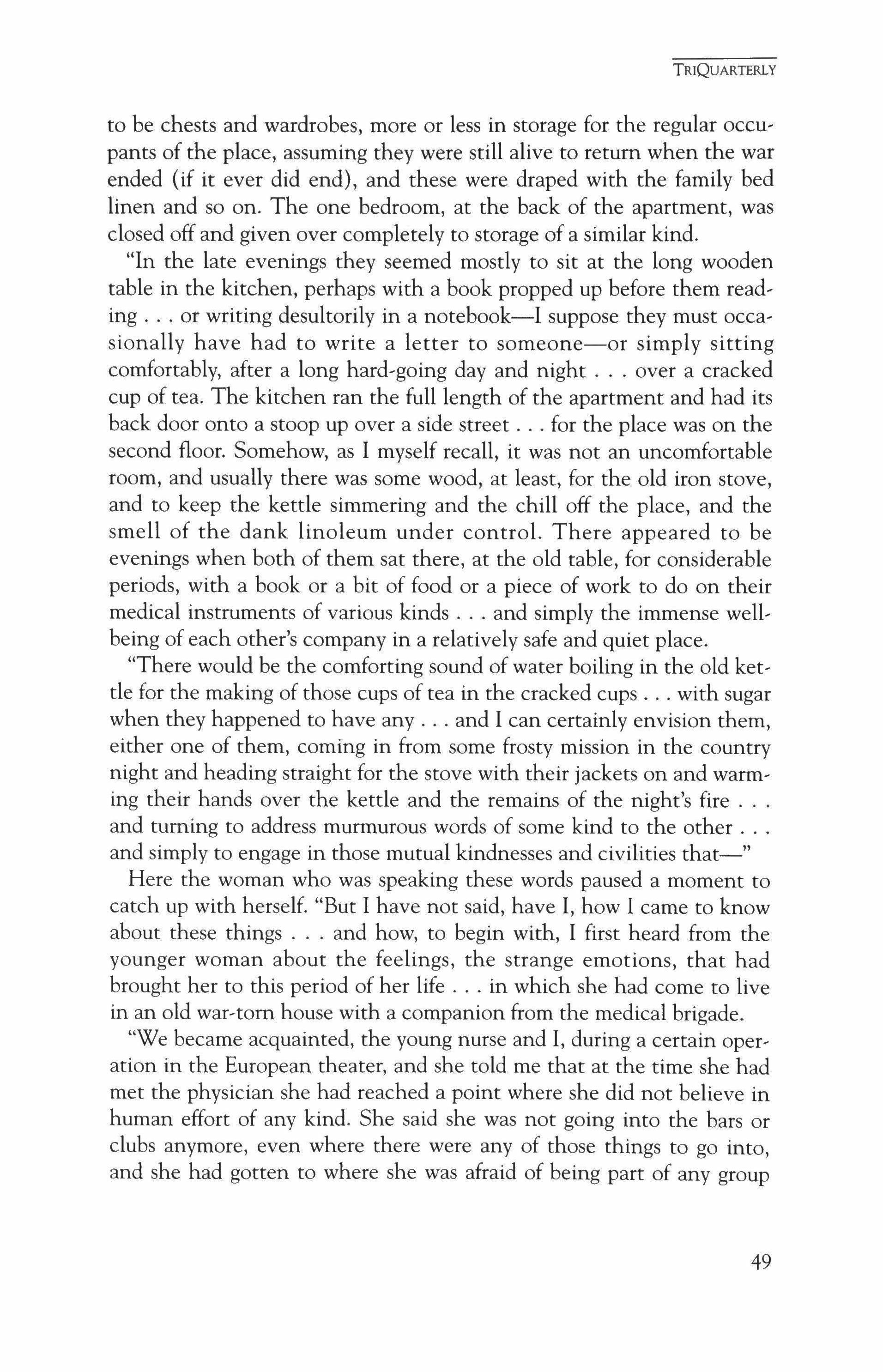
to be chests and wardrobes, more or less in storage for the regular occupants of the place, assuming they were still alive to return when the war ended (if it ever did end), and these were draped with the family bed linen and so on. The one bedroom, at the back of the apartment, was closed off and given over completely to storage of a similar kind.
"In the late evenings they seemed mostly to sit at the long wooden table in the kitchen, perhaps with a book propped up before them reading or writing desultorily in a notebook-I suppose they must occasionally have had to write a letter to someone-or simply sitting comfortably, after a long hard-going day and night over a cracked cup of tea. The kitchen ran the full length of the apartment and had its back door onto a stoop up over a side street for the place was on the second floor. Somehow, as I myself recall, it was not an uncomfortable room, and usually there was some wood, at least, for the old iron stove, and to keep the kettle simmering and the chill off the place, and the smell of the dank linoleum under control. There appeared to be evenings when both of them sat there, at the old table, for considerable periods, with a book or a bit of food or a piece of work to do on their medical instruments of various kinds and simply the immense wellbeing of each other's company in a relatively safe and quiet place.
"There would be the comforting sound of water boiling in the old kettle for the making of those cups of tea in the cracked cups with sugar when they happened to have any and I can certainly envision them, either one of them, coming in from some frosty mission in the country night and heading straight for the stove with their jackets on and warming their hands over the kettle and the remains of the night's fire and turning to address murmurous words of some kind to the other and simply to engage in those mutual kindnesses and civilities that-"
Here the woman who was speaking these words paused a moment to catch up with herself. "But I have not said, have I, how I came to know about these things and how, to begin with, I first heard from the younger woman about the feelings, the strange emotions, that had brought her to this period of her life in which she had come to live in an old war-tom house with a companion from the medical brigade.
"We became acquainted, the young nurse and I, during a certain operation in the European theater, and she told me that at the time she had met the physician she had reached a point where she did not believe in human effort of any kind. She said she was not going into the bars or clubs anymore, even where there were any of those things to go into, and she had gotten to where she was afraid of being part of any group
TRIQUARTERLY
49
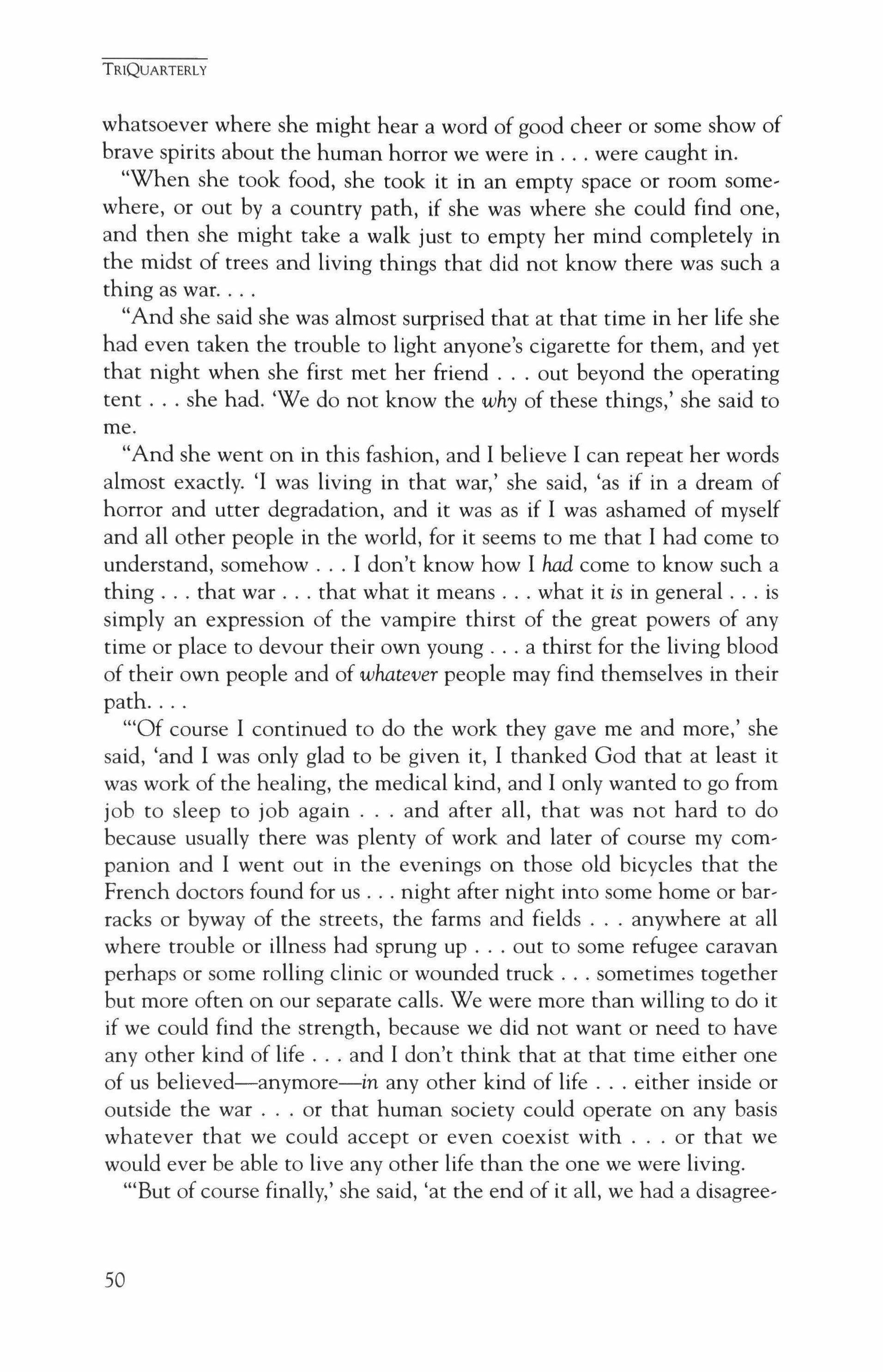
whatsoever where she might hear a word of good cheer or some show of brave spirits about the human horror we were in were caught in.
"When she took food, she took it in an empty space or room somewhere, or out by a country path, if she was where she could find one, and then she might take a walk just to empty her mind completely in the midst of trees and living things that did not know there was such a thing as war
"And she said she was almost surprised that at that time in her life she had even taken the trouble to light anyone's cigarette for them, and yet that night when she first met her friend out beyond the operating tent she had. 'We do not know the why of these things,' she said to me.
"And she went on in this fashion, and I believe I can repeat her words almost exactly. 'I was living in that war,' she said, 'as if in a dream of horror and utter degradation, and it was as if I was ashamed of myself and all other people in the world, for it seems to me that I had come to understand, somehow I don't know how I had come to know such a thing that war that what it means what it is in general is simply an expression of the vampire thirst of the great powers of any time or place to devour their own young a thirst for the living blood of their own people and of whatever people may find themselves in their path
'''Of course I continued to do the work they gave me and more,' she said, 'and I was only glad to be given it, I thanked God that at least it was work of the healing, the medical kind, and I only wanted to go from job to sleep to job again and after all, that was not hard to do because usually there was plenty of work and later of course my companion and I went out in the evenings on those old bicycles that the French doctors found for us night after night into some home or barracks or byway of the streets, the farms and fields anywhere at all where trouble or illness had sprung up out to some refugee caravan perhaps or some rolling clinic or wounded truck sometimes together but more often on our separate calls. We were more than willing to do it if we could find the strength, because we did not want or need to have any other kind of life and I don't think that at that time either one of us believed-anymore-in any other kind of life either inside or outside the war or that human society could operate on any basis whatever that we could accept or even coexist with or that we would ever be able to live any other life than the one we were living.
"'But of course finally,' she said, 'at the end of it all, we had a disagree-
TRIQUARTERLY
50
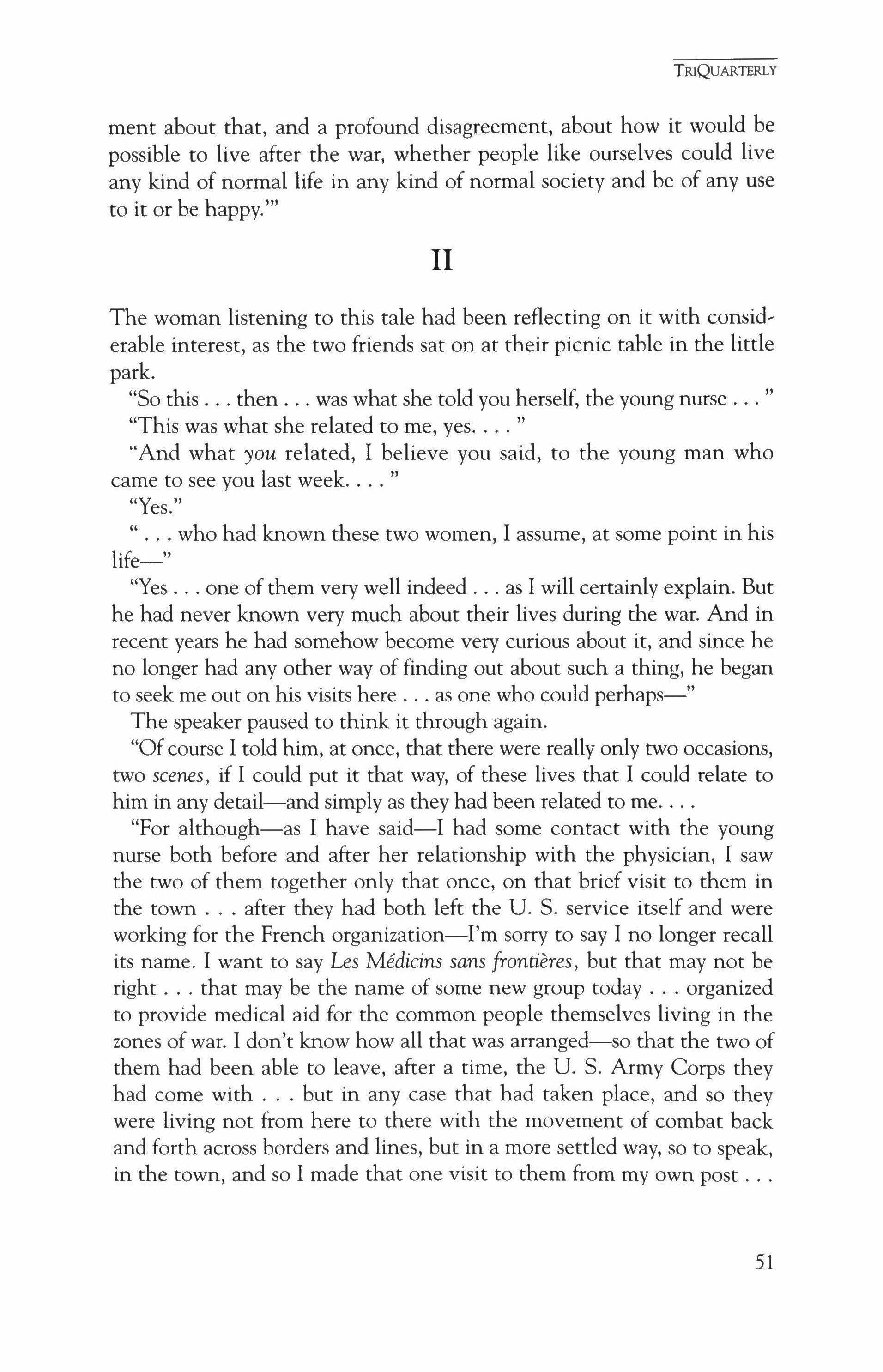
ment about that, and a profound disagreement, about how it would be possible to live after the war, whether people like ourselves could live any kind of normal life in any kind of normal society and be of any use to it or be happy.
II
The woman listening to this tale had been reflecting on it with considerable interest, as the two friends sat on at their picnic table in the little park.
"So this then was what she told you herself, the young nurse
"This was what she related to me, yes
"And what you related, I believe you said, to the young man who came to see you last week
"Yes."
who had known these two women, I assume, at some point in his life-"
"Yes one of them very well indeed as I will certainly explain. But he had never known very much about their lives during the war. And in recent years he had somehow become very curious about it, and since he no longer had any other way of finding out about such a thing, he began to seek me out on his visits here as one who could perhaps-"
The speaker paused to think it through again.
"Of course I told him, at once, that there were really only two occasions, two scenes, if I could put it that way, of these lives that I could relate to him in any detail-and simply as they had been related to me
"For although-as I have said-l had some contact with the young nurse both before and after her relationship with the physician, I saw the two of them together only that once, on that brief visit to them in the town after they had both left the U. S. service itself and were working for the French organization-I'm sorry to say I no longer recall its name. I want to say Les Medicins sans frontieres, but that may not be right that may be the name of some new group today organized to provide medical aid for the common people themselves living in the zones of war. I don't know how all that was arranged-so that the two of them had been able to leave, after a time, the U. S. Army Corps they had come with but in any case that had taken place, and so they were living not from here to there with the movement of combat back and forth across borders and lines, but in a more settled way, so to speak, in the town, and so I made that one visit to them from my own post
TRIQUARTERLY
51
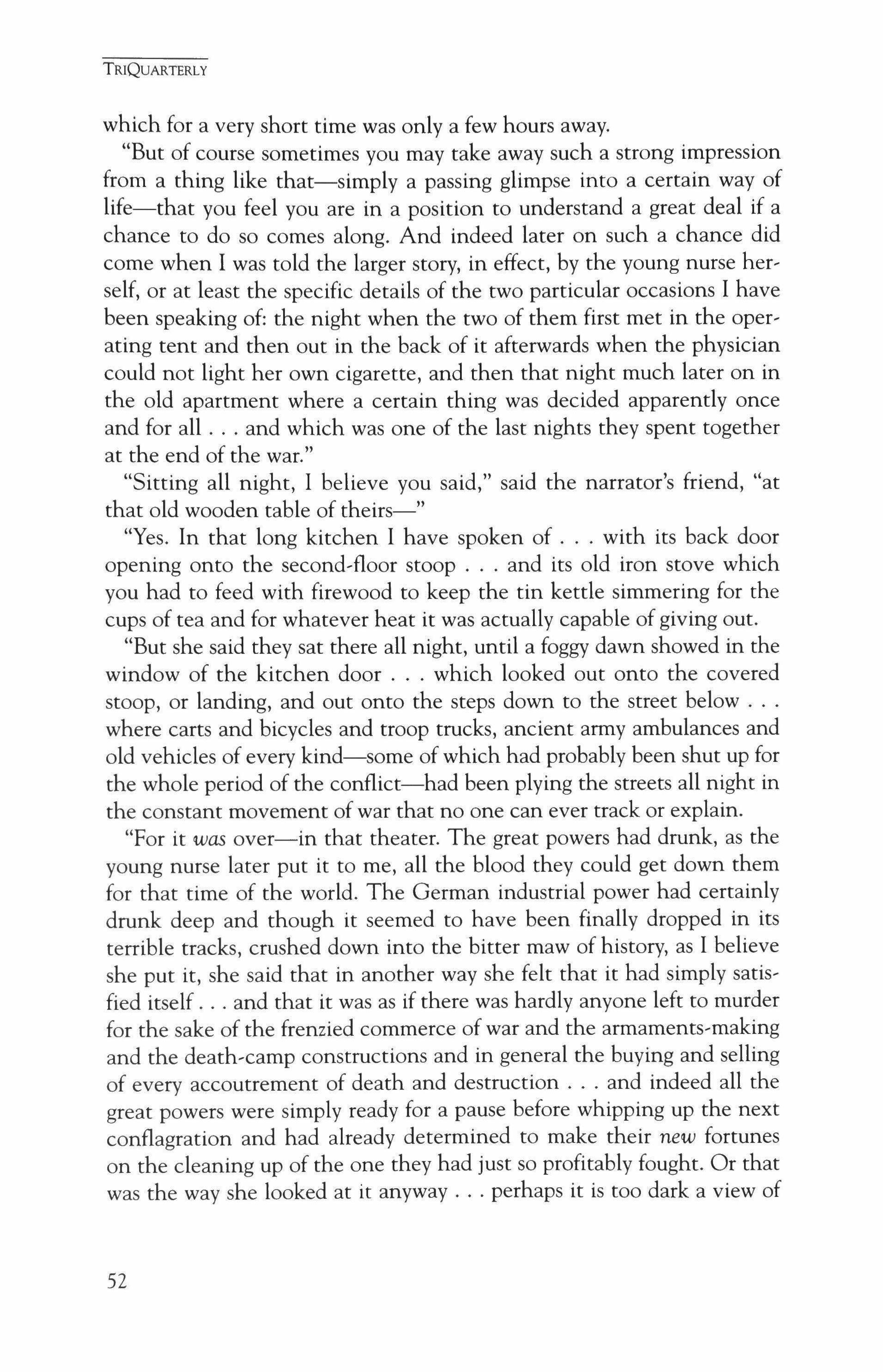
which for a very short time was only a few hours away.
"But of course sometimes you may take away such a strong impression from a thing like that-simply a passing glimpse into a certain way of life-that you feel you are in a position to understand a great deal if a chance to do so comes along. And indeed later on such a chance did come when I was told the larger story, in effect, by the young nurse herself, or at least the specific details of the two particular occasions I have been speaking of: the night when the two of them first met in the operating tent and then out in the back of it afterwards when the physician could not light her own cigarette, and then that night much later on in the old apartment where a certain thing was decided apparently once and for all and which was one of the last nights they spent together at the end of the war."
"Sitting all night, I believe you said," said the narrator's friend, "at that old wooden table of theirs-"
"Yes. In that long kitchen I have spoken of with its back door opening onto the second-floor stoop and its old iron stove which you had to feed with firewood to keep the tin kettle simmering for the cups of tea and for whatever heat it was actually capable of giving out.
"But she said they sat there all night, until a foggy dawn showed in the window of the kitchen door which looked out onto the covered stoop, or landing, and out onto the steps down to the street below where carts and bicycles and troop trucks, ancient army ambulances and old vehicles of every kind-some of which had probably been shut up for the whole period of the conflict-had been plying the streets all night in the constant movement of war that no one can ever track or explain.
"For it was over-in that theater. The great powers had drunk, as the young nurse later put it to me, all the blood they could get down them for that time of the world. The German industrial power had certainly drunk deep and though it seemed to have been finally dropped in its terrible tracks, crushed down into the bitter maw of history, as I believe she put it, she said that in another way she felt that it had simply satisfied itself and that it was as if there was hardly anyone left to murder for the sake of the frenzied commerce of war and the armaments-making and the death-camp constructions and in general the buying and selling of every accoutrement of death and destruction and indeed all the great powers were simply ready for a pause before whipping up the next conflagration and had already determined to make their new fortunes on the cleaning up of the one they had just so profitably fought. Or that was the way she looked at it anyway perhaps it is too dark a view of
TRIQUARTERLY
52
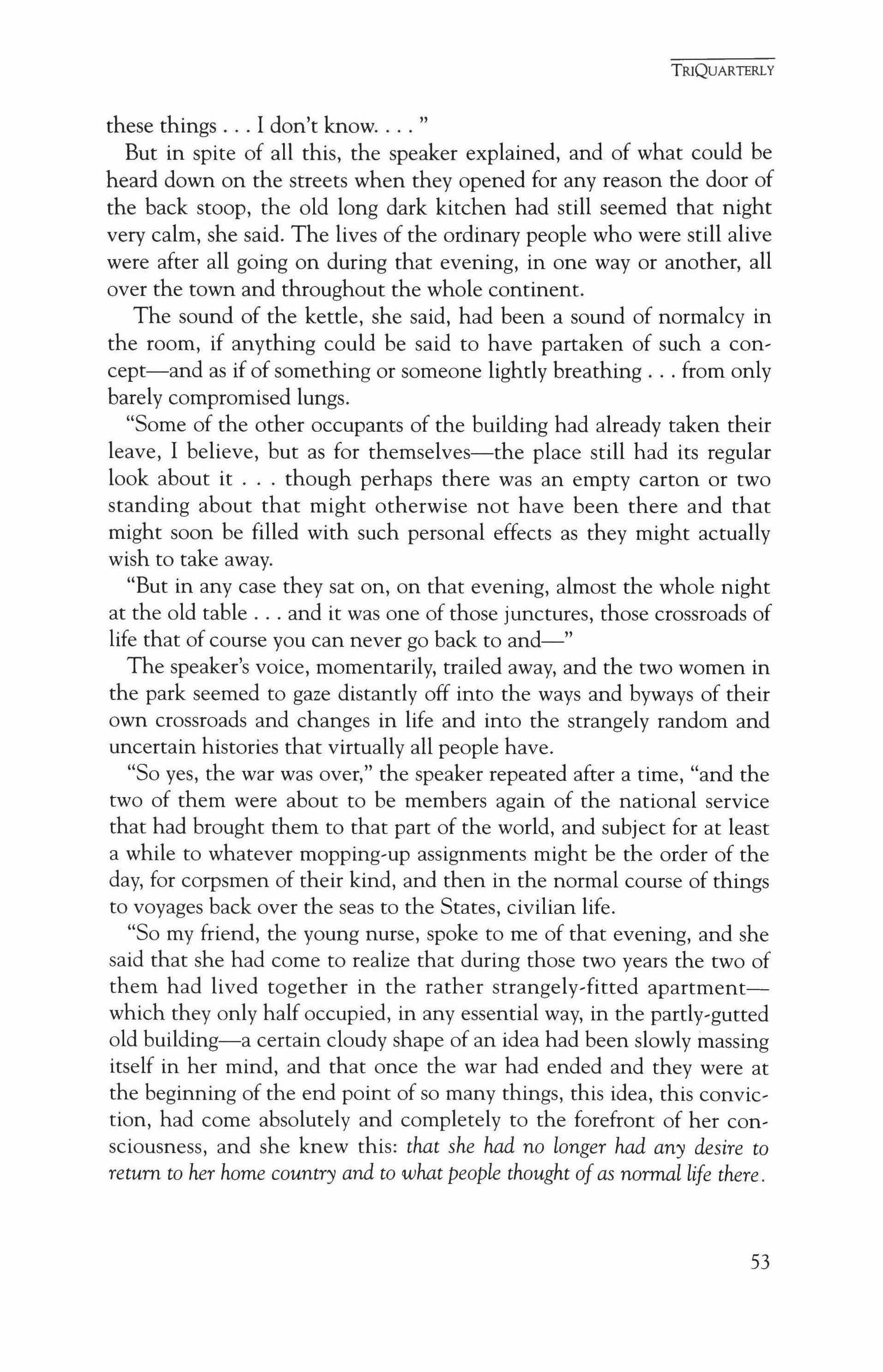
these things I don't know
But in spite of all this, the speaker explained, and of what could be heard down on the streets when they opened for any reason the door of the back stoop, the old long dark kitchen had still seemed that night very calm, she said. The lives of the ordinary people who were still alive were after all going on during that evening, in one way or another, all over the town and throughout the whole continent.
The sound of the kettle, she said, had been a sound of normalcy in the room, if anything could be said to have partaken of such a concept-and as if of something or someone lightly breathing from only barely compromised lungs.
"Some of the other occupants of the building had already taken their leave, I believe, but as for themselves-the place still had its regular look about it though perhaps there was an empty carton or two standing about that might otherwise not have been there and that might soon be filled with such personal effects as they might actually wish to take away.
"But in any case they sat on, on that evening, almost the whole night at the old table and it was one of those junctures, those crossroads of life that of course you can never go back to and-"
The speaker's voice, momentarily, trailed away, and the two women in the park seemed to gaze distantly off into the ways and byways of their own crossroads and changes in life and into the strangely random and uncertain histories that virtually all people have.
"So yes, the war was over," the speaker repeated after a time, "and the two of them were about to be members again of the national service that had brought them to that part of the world, and subject for at least a while to whatever mopping-up assignments might be the order of the day, for corpsmen of their kind, and then in the normal course of things to voyages back over the seas to the States, civilian life.
"So my friend, the young nurse, spoke to me of that evening, and she said that she had come to realize that during those two years the two of them had lived together in the rather strangely-fitted apartmentwhich they only half occupied, in any essential way, in the partly-gutted old building-a certain cloudy shape of an idea had been slowly massing itself in her mind, and that once the war had ended and they were at the beginning of the end point of so many things, this idea, this conviction, had come absolutely and completely to the forefront of her consciousness, and she knew this: that she had no longer had any desire to return to her home country and to what people thought of as nonnallife there.
TRIQUARTERLY
53
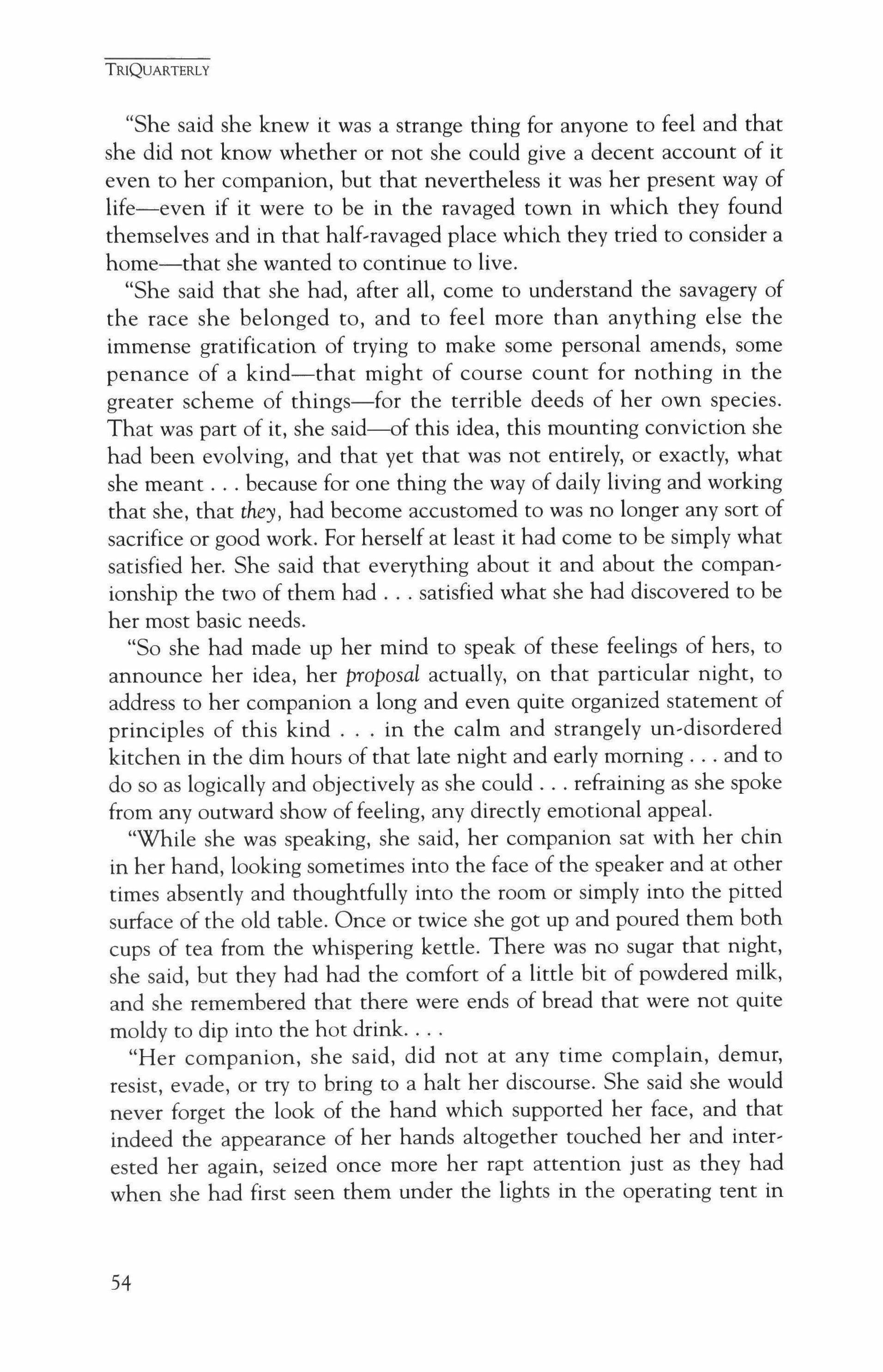
"She said she knew it was a strange thing for anyone to feel and that she did not know whether or not she could give a decent account of it even to her companion, but that nevertheless it was her present way of life-even if it were to be in the ravaged town in which they found themselves and in that half,ravaged place which they tried to consider a home-that she wanted to continue to live.
"She said that she had, after all, come to understand the savagery of the race she belonged to, and to feel more than anything else the immense gratification of trying to make some personal amends, some penance of a kind-that might of course count for nothing in the greater scheme of things-for the terrible deeds of her own species. That was part of it, she said-of this idea, this mounting conviction she had been evolving, and that yet that was not entirely, or exactly, what she meant because for one thing the way of daily living and working that she, that they, had become accustomed to was no longer any sort of sacrifice or good work. For herself at least it had come to be simply what satisfied her. She said that everything about it and about the companionship the two of them had satisfied what she had discovered to be her most basic needs.
"So she had made up her mind to speak of these feelings of hers, to announce her idea, her proposal actually, on that particular night, to address to her companion a long and even quite organized statement of principles of this kind in the calm and strangely uri-disordered kitchen in the dim hours of that late night and early morning and to do so as logically and objectively as she could refraining as she spoke from any outward show offeeling, any directly emotional appeal.
"While she was speaking, she said, her companion sat with her chin in her hand, looking sometimes into the face of the speaker and at other times absently and thoughtfully into the room or simply into the pitted surface of the old table. Once or twice she got up and poured them both cups of tea from the whispering kettle. There was no sugar that night, she said, but they had had the comfort of a little bit of powdered milk, and she remembered that there were ends of bread that were not quite moldy to dip into the hot drink
"Her companion, she said, did not at any time complain, demur, resist, evade, or try to bring to a halt her discourse. She said she would never forget the look of the hand which supported her face, and that indeed the appearance of her hands altogether touched her and interested her again, seized once more her rapt attention just as they had when she had first seen them under the lights in the operating tent in
TRIQUARTERLY
54
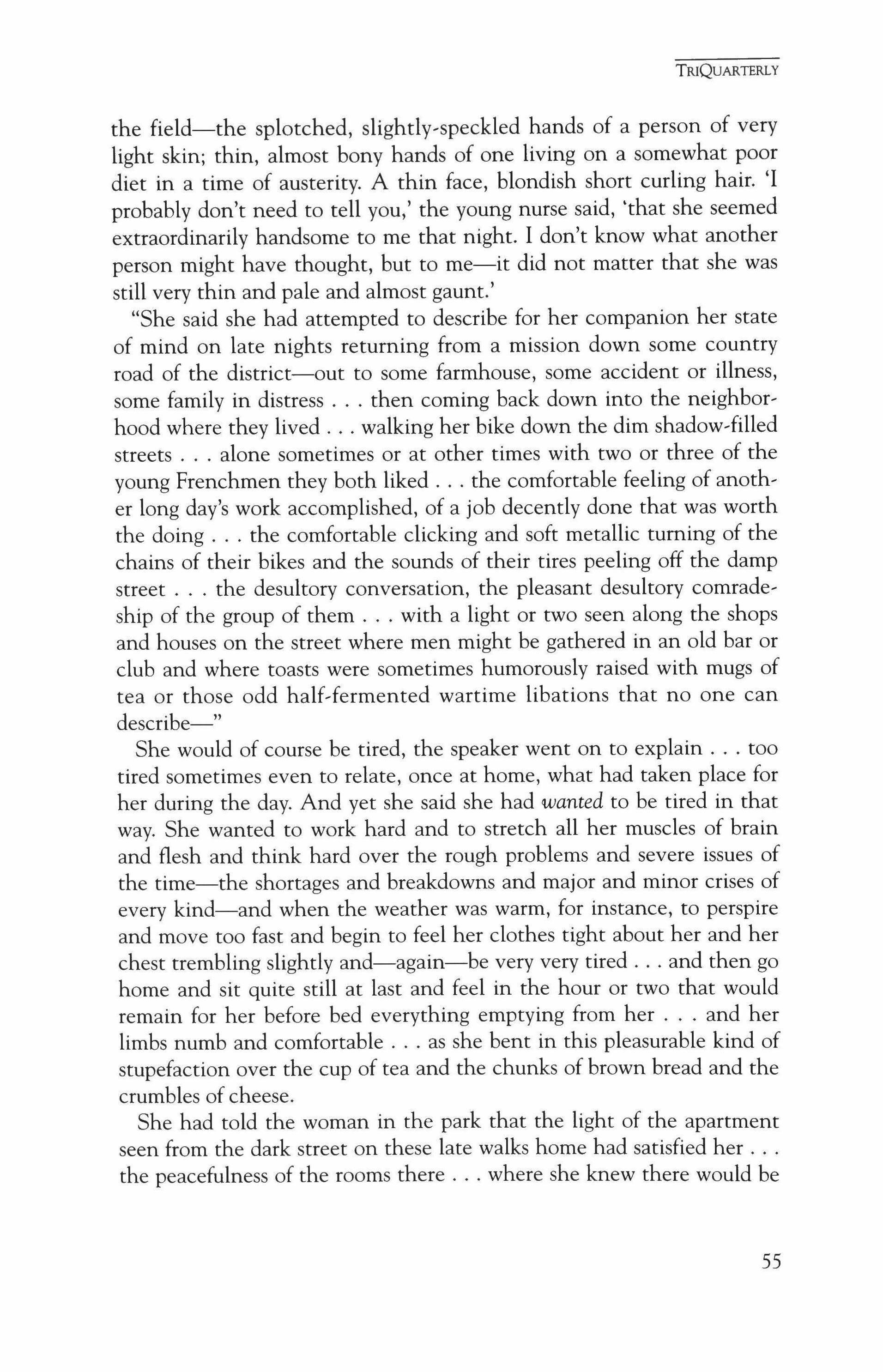
the field-the splotched, slightly-speckled hands of a person of very light skin; thin, almost bony hands of one living on a somewhat poor diet in a time of austerity. A thin face, blondish short curling hair. 'I probably don't need to tell you,' the young nurse said, 'that she seemed extraordinarily handsome to me that night. I don't know what another person might have thought, but to me-it did not matter that she was still very thin and pale and almost gaunt.'
"She said she had attempted to describe for her companion her state of mind on late nights returning from a mission down some country road of the district-out to some farmhouse, some accident or illness, some family in distress then coming back down into the neighborhood where they lived walking her bike down the dim shadow-filled streets alone sometimes or at other times with two or three of the young Frenchmen they both liked the comfortable feeling of anether long day's work accomplished, of a job decently done that was worth the doing the comfortable clicking and soft metallic turning of the chains of their bikes and the sounds of their tires peeling off the damp street the desultory conversation, the pleasant desultory comradeship of the group of them with a light or two seen along the shops and houses on the street where men might be gathered in an old bar or club and where toasts were sometimes humorously raised with mugs of tea or those odd half-fermented wartime libations that no one can describe-"
She would of course be tired, the speaker went on to explain too tired sometimes even to relate, once at home, what had taken place for her during the day. And yet she said she had wanted to be tired in that way. She wanted to work hard and to stretch all her muscles of brain and flesh and think hard over the rough problems and severe issues of the time-the shortages and breakdowns and major and minor crises of every kind-and when the weather was warm, for instance, to perspire and move too fast and begin to feel her clothes tight about her and her chest trembling slightly and-again-be very very tired and then go home and sit quite still at last and feel in the hour or two that would remain for her before bed everything emptying from her and her limbs numb and comfortable as she bent in this pleasurable kind of stupefaction over the cup of tea and the chunks of brown bread and the crumbles of cheese.
She had told the woman in the park that the light of the apartment seen from the dark street on these late walks home had satisfied her the peacefulness of the rooms there where she knew there would be
TruQUARTERLY
55
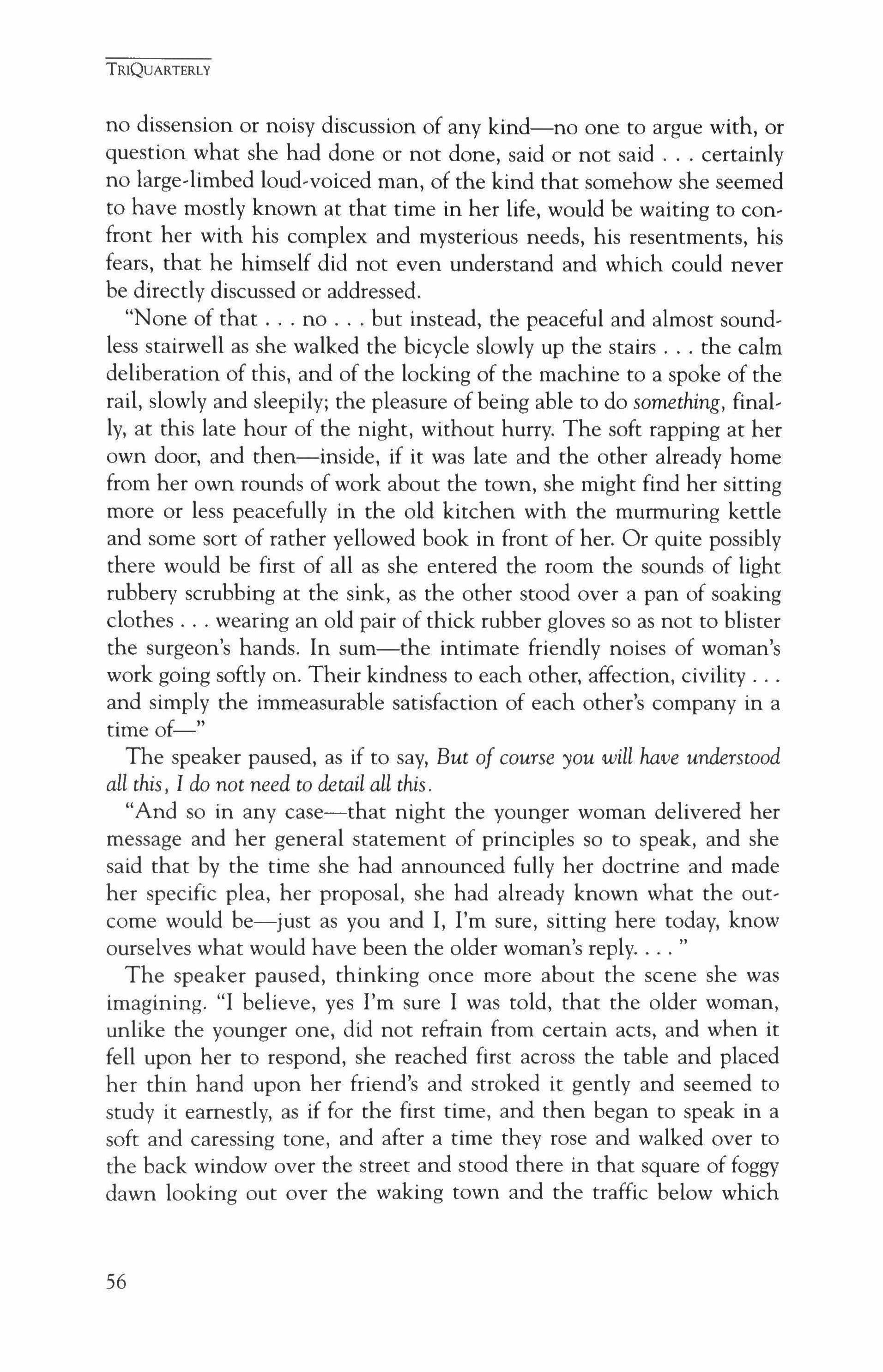
no dissension or noisy discussion of any kind-no one to argue with, or question what she had done or not done, said or not said certainly no large-limbed loud-voiced man, of the kind that somehow she seemed to have mostly known at that time in her life, would be waiting to confront her with his complex and mysterious needs, his resentments, his fears, that he himself did not even understand and which could never be directly discussed or addressed.
"None of that no but instead, the peaceful and almost soundless stairwell as she walked the bicycle slowly up the stairs the calm deliberation of this, and of the locking of the machine to a spoke of the rail, slowly and sleepily; the pleasure of being able to do something, finally, at this late hour of the night, without hurry. The soft rapping at her own door, and then-inside, if it was late and the other already home from her own rounds of work about the town, she might find her sitting more or less peacefully in the old kitchen with the murmuring kettle and some sort of rather yellowed book in front of her. Or quite possibly there would be first of all as she entered the room the sounds of light rubbery scrubbing at the sink, as the other stood over a pan of soaking clothes wearing an old pair of thick rubber gloves so as not to blister the surgeon's hands. In sum-the intimate friendly noises of woman's work going softly on. Their kindness to each other, affection, civility and simply the immeasurable satisfaction of each other's company in a time of-"
The speaker paused, as if to say, But of course you will have understood all this, I do not need to detail all this.
"And so in any case-that night the younger woman delivered her message and her general statement of principles so to speak, and she said that by the time she had announced fully her doctrine and made her specific plea, her proposal, she had already known what the outcome would be-just as you and I, I'm sure, sitting here today, know ourselves what would have been the older woman's reply
The speaker paused, thinking once more about the scene she was imagining. "I believe, yes I'm sure I was told, that the older woman, unlike the younger one, did not refrain from certain acts, and when it fell upon her to respond, she reached first across the table and placed her thin hand upon her friend's and stroked it gently and seemed to study it earnestly, as if for the first time, and then began to speak in a soft and caressing tone, and after a time they rose and walked over to the back window over the street and stood there in that square of foggy dawn looking out over the waking town and the traffic below which
TRIQUARTERLY
56
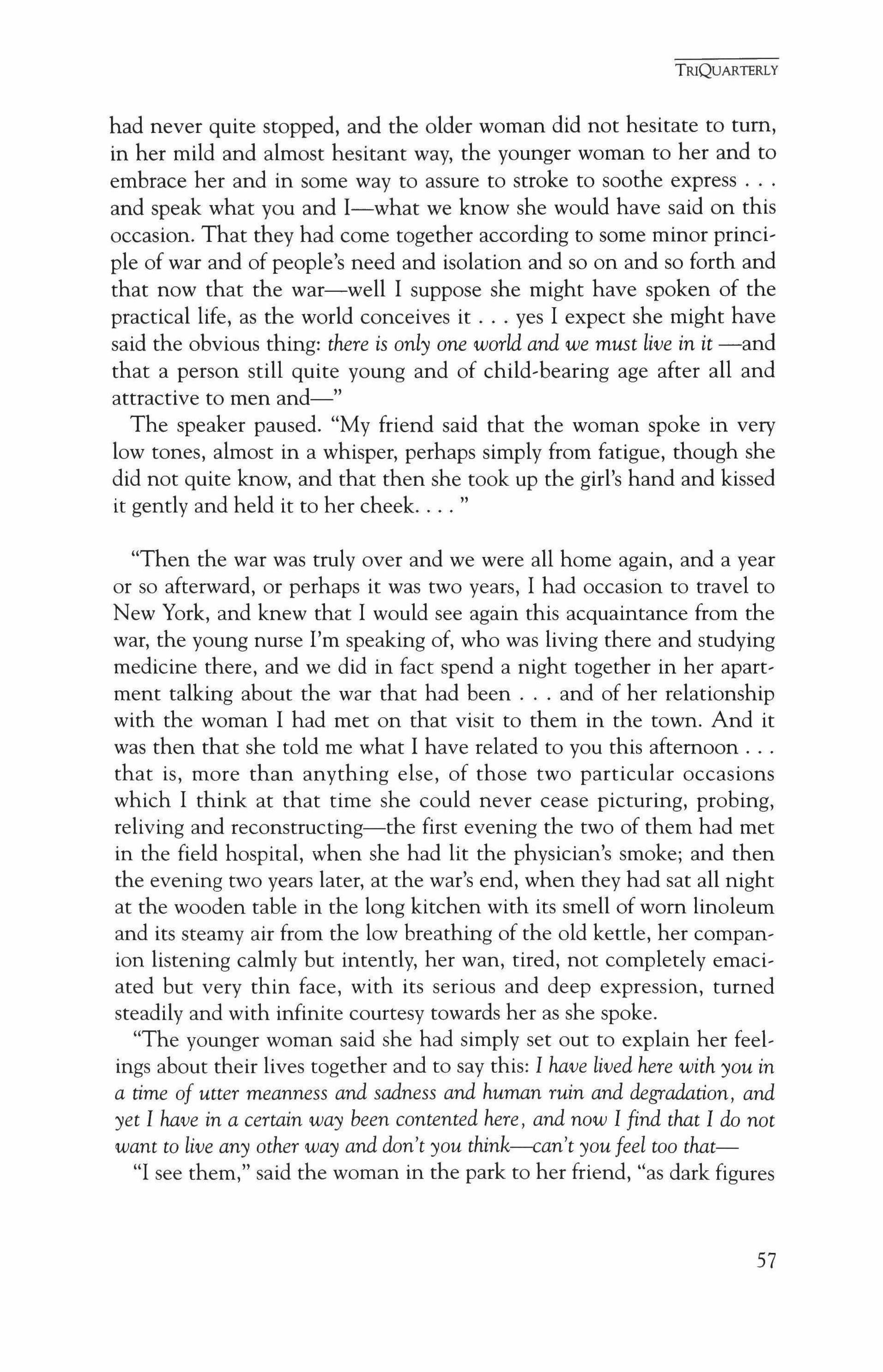
had never quite stopped, and the older woman did not hesitate to turn, in her mild and almost hesitant way, the younger woman to her and to embrace her and in some way to assure to stroke to soothe express and speak what you and I-what we know she would have said on this occasion. That they had come together according to some minor principle of war and of people's need and isolation and so on and so forth and that now that the war-well I suppose she might have spoken of the practical life, as the world conceives it yes I expect she might have said the obvious thing: there is only one world and we must live in it -and that a person still quite young and of child-bearing age after all and attractive to men and-"
The speaker paused. "My friend said that the woman spoke in very low tones, almost in a whisper, perhaps simply from fatigue, though she did not quite know, and that then she took up the girl's hand and kissed it gently and held it to her cheek
"Then the war was truly over and we were all home again, and a year or so afterward, or perhaps it was two years, I had occasion to travel to New York, and knew that I would see again this acquaintance from the war, the young nurse I'm speaking of, who was living there and studying medicine there, and we did in fact spend a night together in her apartment talking about the war that had been and of her relationship with the woman I had met on that visit to them in the town. And it was then that she told me what I have related to you this afternoon that is, more than anything else, of those two particular occasions which I think at that time she could never cease picturing, probing, reliving and reconstructing-the first evening the two of them had met in the field hospital, when she had lit the physician's smoke; and then the evening two years later, at the war's end, when they had sat all night at the wooden table in the long kitchen with its smell of worn linoleum and its steamy air from the low breathing of the old kettle, her companion listening calmly but intently, her wan, tired, not completely emaciated but very thin face, with its serious and deep expression, turned steadily and with infinite courtesy towards her as she spoke.
"The younger woman said she had simply set out to explain her feelings about their lives together and to say this: I have lived here with you in a time of utter meanness and sadness and human ruin and degradation, and yet I have in a certain way been contented here, and now I find that I do not want to live any other way and don't you think----can't you feel too that"I see them," said the woman in the park to her friend, "as dark figures
TRIQUARTERLY
57
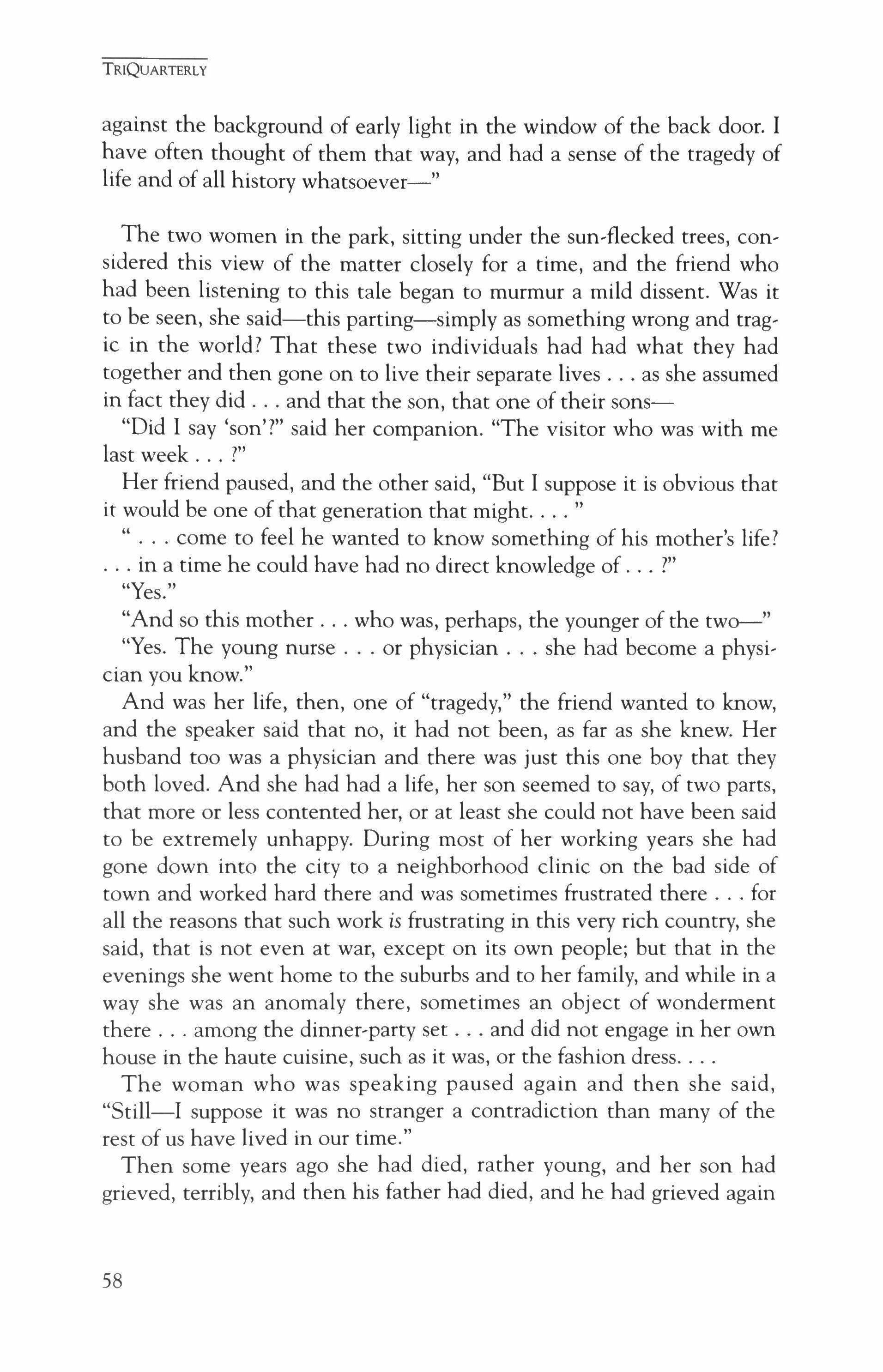
against the background of early light in the window of the back door. I have often thought of them that way, and had a sense of the tragedy of life and of all history whatsoever-"
The two women in the park, sitting under the sun-flecked trees, con, sidered this view of the matter closely for a time, and the friend who had been listening to this tale began to murmur a mild dissent. Was it to be seen, she said-this parting-simply as something wrong and trag, ic in the world? That these two individuals had had what they had together and then gone on to live their separate lives as she assumed in fact they did and that the son, that one of their sons"Did I say 'son'?" said her companion. "The visitor who was with me last week ?"
Her friend paused, and the other said, "But I suppose it is obvious that it would be one of that generation that might " come to feel he wanted to know something of his mother's life? in a time he could have had no direct knowledge of ?" "Yes."
"And so this mother who was, perhaps, the younger of the two--" "Yes. The young nurse or physician she had become a physician you know."
And was her life, then, one of "tragedy," the friend wanted to know, and the speaker said that no, it had not been, as far as she knew. Her husband too was a physician and there was just this one boy that they both loved. And she had had a life, her son seemed to say, of two parts, that more or less contented her, or at least she could not have been said to be extremely unhappy. During most of her working years she had gone down into the city to a neighborhood clinic on the bad side of town and worked hard there and was sometimes frustrated there for all the reasons that such work is frustrating in this very rich country, she said, that is not even at war, except on its own people; but that in the evenings she went home to the suburbs and to her family, and while in a way she was an anomaly there, sometimes an object of wonderment there among the dinner-party set and did not engage in her own house in the haute cuisine, such as it was, or the fashion dress
The woman who was speaking paused again and then she said, "Still-I suppose it was no stranger a contradiction than many of the rest of us have lived in our time."
Then some years ago she had died, rather young, and her son had grieved, terribly, and then his father had died, and he had grieved again
TRIQUARTERLY
58
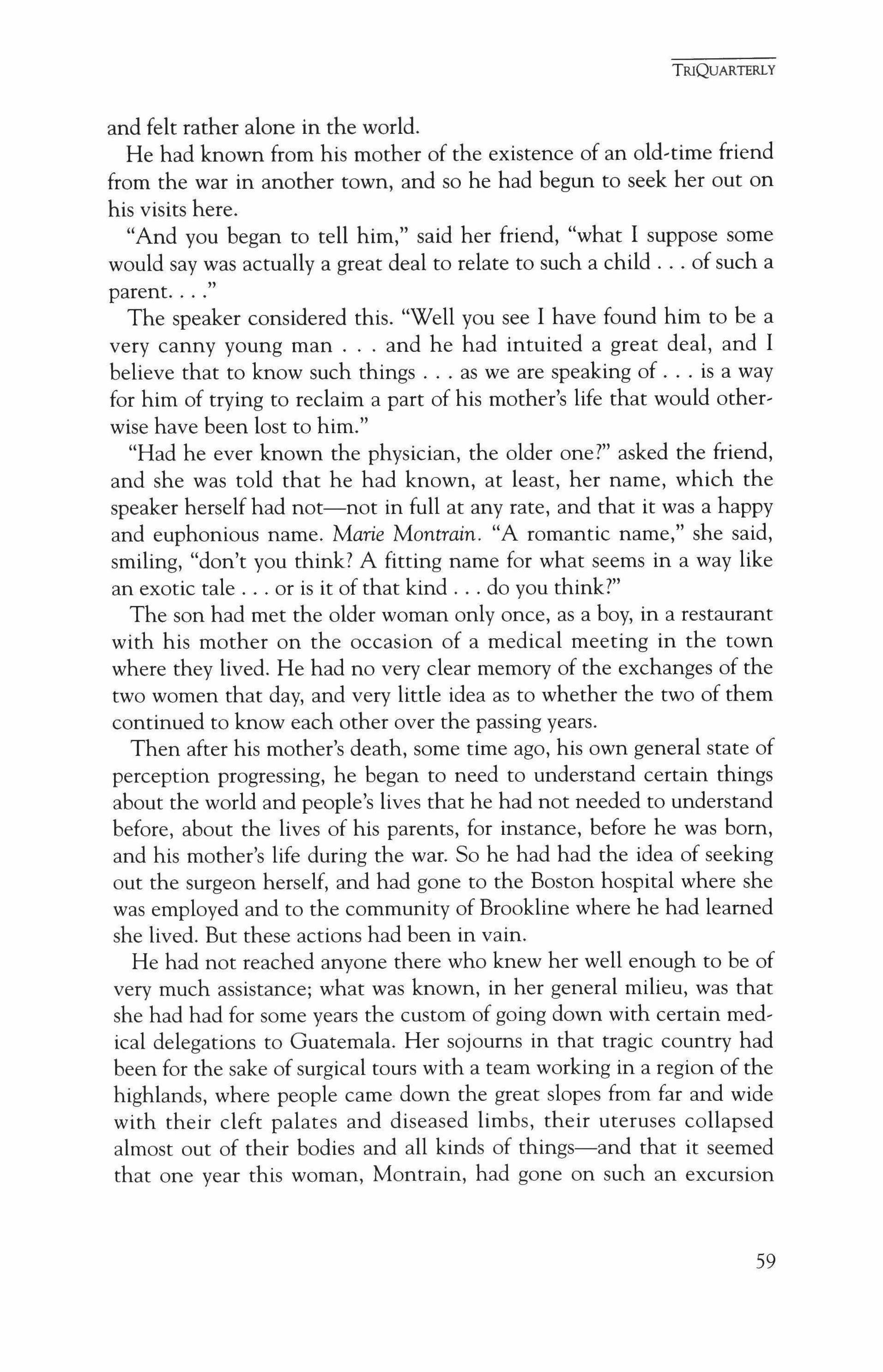
and felt rather alone in the world.
He had known from his mother of the existence of an old-time friend from the war in another town, and so he had begun to seek her out on his visits here.
"And you began to tell him," said her friend, "what I suppose some would say was actually a great deal to relate to such a child of such a parent
The speaker considered this. "Well you see I have found him to be a very canny young man and he had intuited a great deal, and I believe that to know such things as we are speaking of is a way for him of trying to reclaim a part of his mother's life that would otherwise have been lost to him."
"Had he ever known the physician, the older one?" asked the friend, and she was told that he had known, at least, her name, which the speaker herself had not-not in full at any rate, and that it was a happy and euphonious name. Marie Montrain. "A romantic name," she said, smiling, "don't you think? A fitting name for what seems in a way like an exotic tale or is it of that kind do you think?"
The son had met the older woman only once, as a boy, in a restaurant with his mother on the occasion of a medical meeting in the town where they lived. He had no very clear memory of the exchanges of the two women that day, and very little idea as to whether the two of them continued to know each other over the passing years.
Then after his mother's death, some time ago, his own general state of perception progressing, he began to need to understand certain things about the world and people's lives that he had not needed to understand before, about the lives of his parents, for instance, before he was born, and his mother's life during the war. So he had had the idea of seeking out the surgeon herself, and had gone to the Boston hospital where she was employed and to the community of Brookline where he had learned she lived. But these actions had been in vain.
He had not reached anyone there who knew her well enough to be of very much assistance; what was known, in her general milieu, was that she had had for some years the custom of going down with certain medical delegations to Guatemala. Her sojourns in that tragic country had been for the sake of surgical tours with a team working in a region of the highlands, where people came down the great slopes from far and wide with their cleft palates and diseased limbs, their uteruses collapsed almost out of their bodies and all kinds of things-and that it seemed that one year this woman, Montrain, had gone on such an excursion
TRlQUARTERLY
59
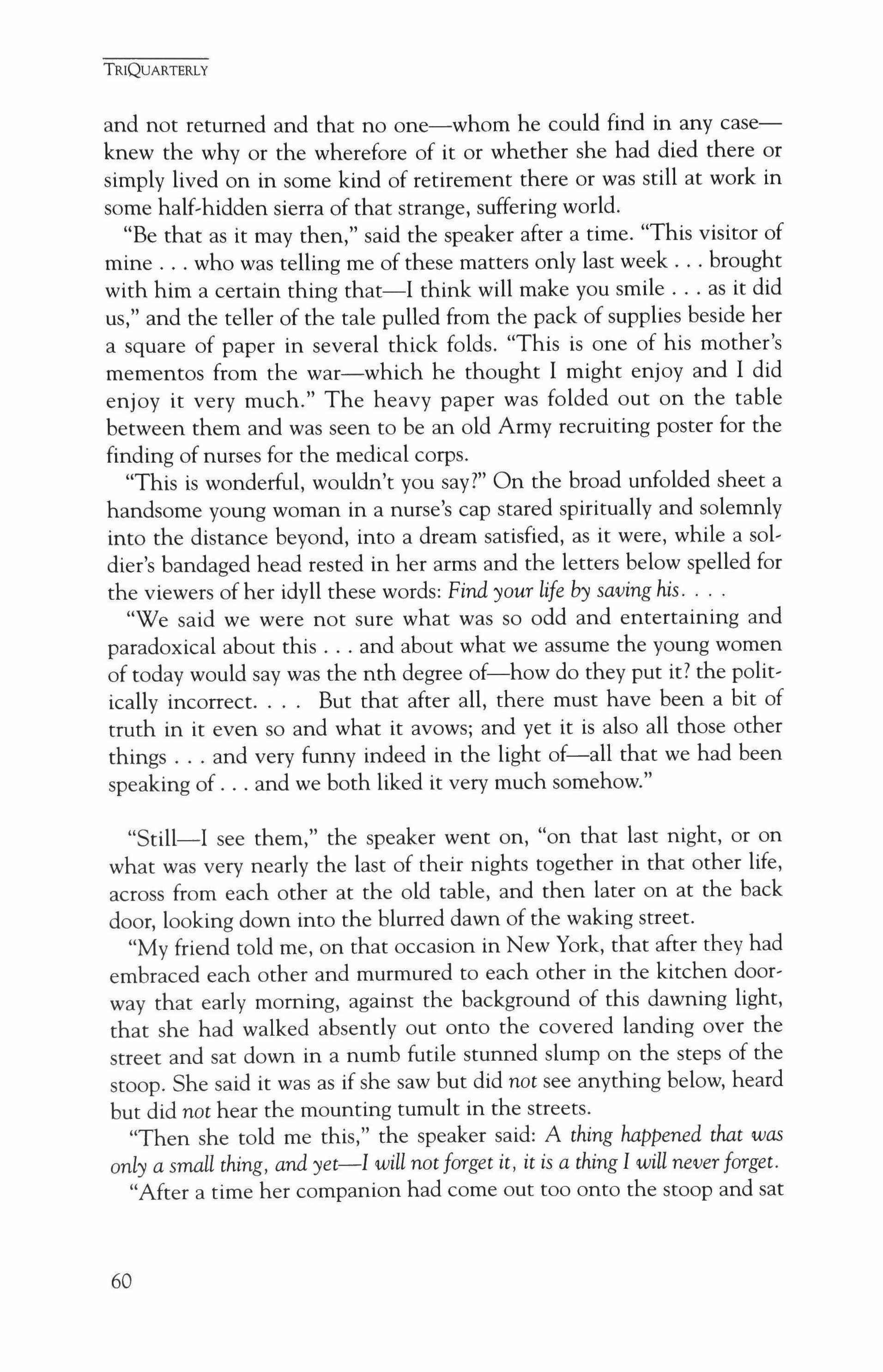
and not returned and that no one-whom he could find in any caseknew the why or the wherefore of it or whether she had died there or simply lived on in some kind of retirement there or was still at work in some half-hidden sierra of that strange, suffering world.
"Be that as it may then," said the speaker after a time. "This visitor of mine who was telling me of these matters only last week brought with him a certain thing that-I think will make you smile as it did us," and the teller of the tale pulled from the pack of supplies beside her a square of paper in several thick folds. "This is one of his mother's mementos from the war-which he thought I might enjoy and I did enjoy it very much." The heavy paper was folded out on the table between them and was seen to be an old Army recruiting poster for the finding of nurses for the medical corps.
"This is wonderful, wouldn't you say?" On the broad unfolded sheet a handsome young woman in a nurse's cap stared spiritually and solemnly into the distance beyond, into a dream satisfied, as it were, while a soldier's bandaged head rested in her arms and the letters below spelled for the viewers of her idyll these words: Find your life by saving his
"We said we were not sure what was so odd and entertaining and paradoxical about this and about what we assume the young women of today would say was the nth degree of-how do they put it? the politically incorrect. But that after all, there must have been a bit of truth in it even so and what it avows; and yet it is also all those other things and very funny indeed in the light of-all that we had been speaking of and we both liked it very much somehow."
"Still-I see them," the speaker went on, "on that last night, or on what was very nearly the last of their nights together in that other life, across from each other at the old table, and then later on at the back door, looking down into the blurred dawn of the waking street.
"My friend told me, on that occasion in New York, that after they had embraced each other and murmured to each other in the kitchen doorway that early morning, against the background of this dawning light, that she had walked absently out onto the covered landing over the street and sat down in a numb futile stunned slump on the steps of the stoop. She said it was as if she saw but did not see anything below, heard but did not hear the mounting tumult in the streets.
"Then she told me this," the speaker said: A thing happened that was only a small thing, and yet-I will not forget it, it is a thing I will never forget.
"After a time her companion had come out too onto the stoop and sat
TRIQUARTERLY
60
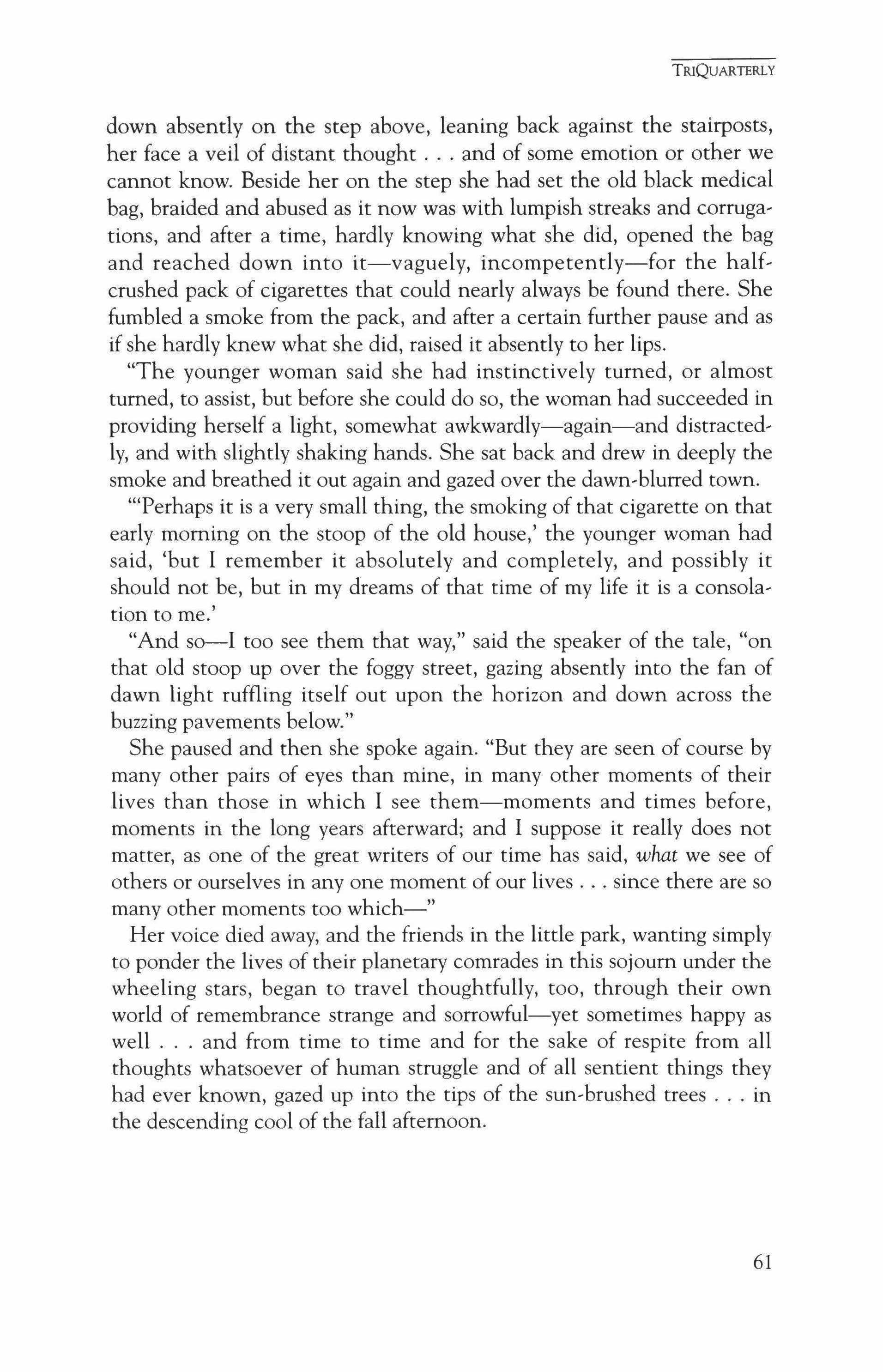
down absently on the step above, leaning back against the stairposts, her face a veil of distant thought and of some emotion or other we cannot know. Beside her on the step she had set the old black medical bag, braided and abused as it now was with lumpish streaks and corrugations, and after a time, hardly knowing what she did, opened the bag and reached down into it-vaguely, incompetently-for the half, crushed pack of cigarettes that could nearly always be found there. She fumbled a smoke from the pack, and after a certain further pause and as if she hardly knew what she did, raised it absently to her lips.
"The younger woman said she had instinctively turned, or almost turned, to assist, but before she could do so, the woman had succeeded in providing herself a light, somewhat awkwardly-again-and distracted, lv, and with slightly shaking hands. She sat back and drew in deeply the smoke and breathed it out again and gazed over the dawn,blurred town.
"'Perhaps it is a very small thing, the smoking of that cigarette on that early morning on the stoop of the old house,' the younger woman had said, 'but 1 remember it absolutely and completely, and possibly it should not be, but in my dreams of that time of my life it is a consolation to me.'
"And so-I too see them that way," said the speaker of the tale, "on that old stoop up over the foggy street, gazing absently into the fan of dawn light ruffling itself out upon the horizon and down across the buzzing pavements below."
She paused and then she spoke again. "But they are seen of course by many other pairs of eyes than mine, in many other moments of their lives than those in which 1 see them-moments and times before, moments in the long years afterward; and 1 suppose it really does not matter, as one of the great writers of our time has said, what we see of others or ourselves in anyone moment of our lives since there are so many other moments too which-"
Her voice died away, and the friends in the little park, wanting simply to ponder the lives of their planetary comrades in this sojourn under the wheeling stars, began to travel thoughtfully, too, through their own world of remembrance strange and sorrowful-yet sometimes happy as well and from time to time and for the sake of respite from all thoughts whatsoever of human struggle and of all sentient things they had ever known, gazed up into the tips of the sun,brushed trees in the descending cool of the fall afternoon.
TRIQUARTERLY
61
The Lithuanian Wife
Leon Rooke
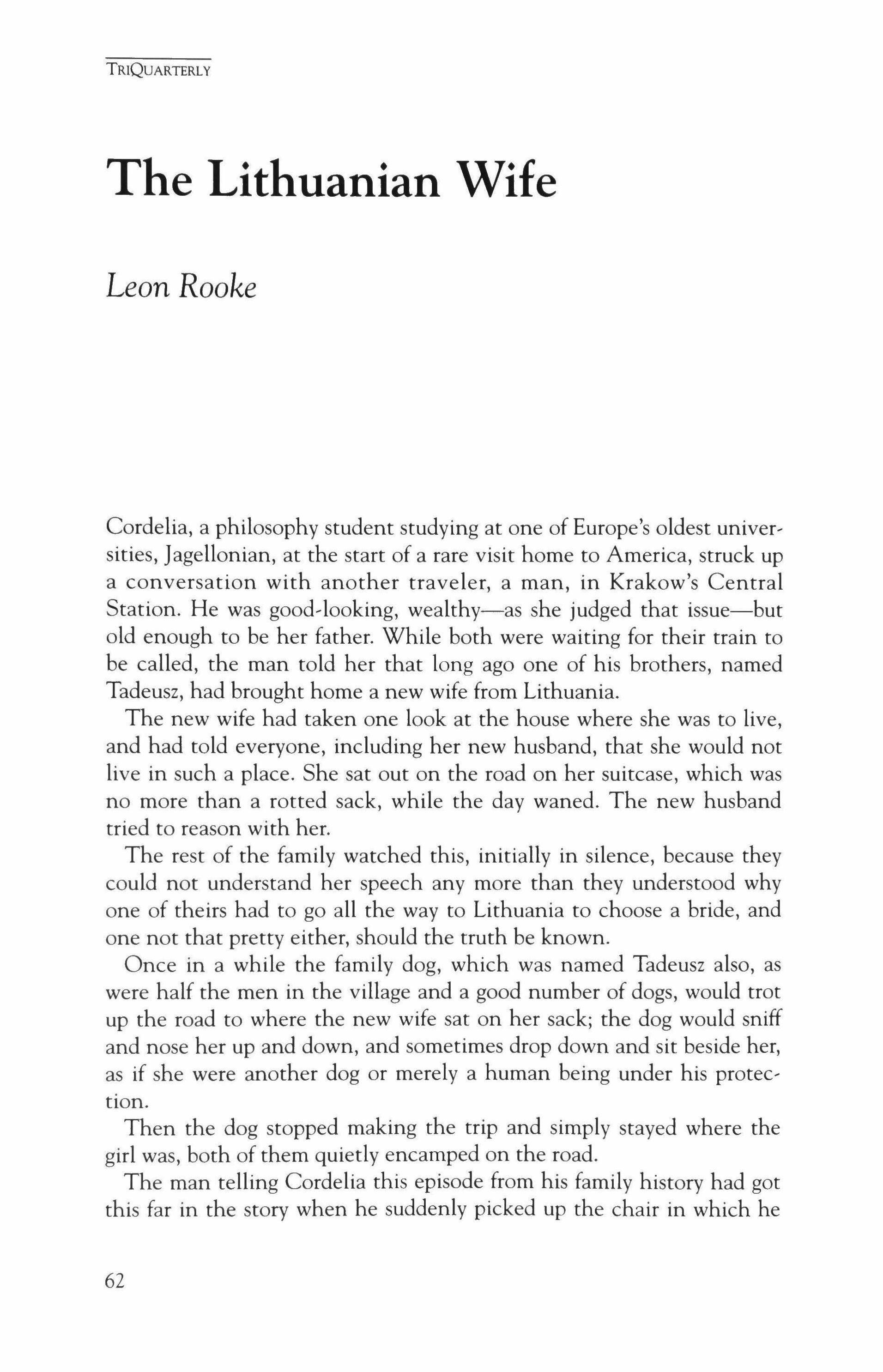
Cordelia, a philosophy student studying at one of Europe's oldest universities, Jagellonian, at the start of a rare visit home to America, struck up a conversation with another traveler, a man, in Krakow's Central Station. He was good,looking, wealthy-as she judged that issue-but old enough to be her father. While both were waiting for their train to be called, the man told her that long ago one of his brothers, named Tadeusz, had brought home a new wife from Lithuania.
The new wife had taken one look at the house where she was to live, and had told everyone, including her new husband, that she would not live in such a place. She sat out on the road on her suitcase, which was no more than a rotted sack, while the day waned. The new husband tried to reason with her.
The rest of the family watched this, initially in silence, because they could not understand her speech any more than they understood why one of theirs had to go all the way to Lithuania to choose a bride, and one not that pretty either, should the truth be known.
Once in a while the family dog, which was named Tadeusz also, as were half the men in the village and a good number of dogs, would trot up the road to where the new wife sat on her sack; the dog would sniff and nose her up and down, and sometimes drop down and sit beside her, as if she were another dog or merely a human being under his protection.
Then the dog stopped making the trip and simply stayed where the girl was, both of them quietly encamped on the road.
The man telling Cordelia this episode from his family history had got this far in the story when he suddenly picked up the chair in which he
TRIQUARTERLY
62
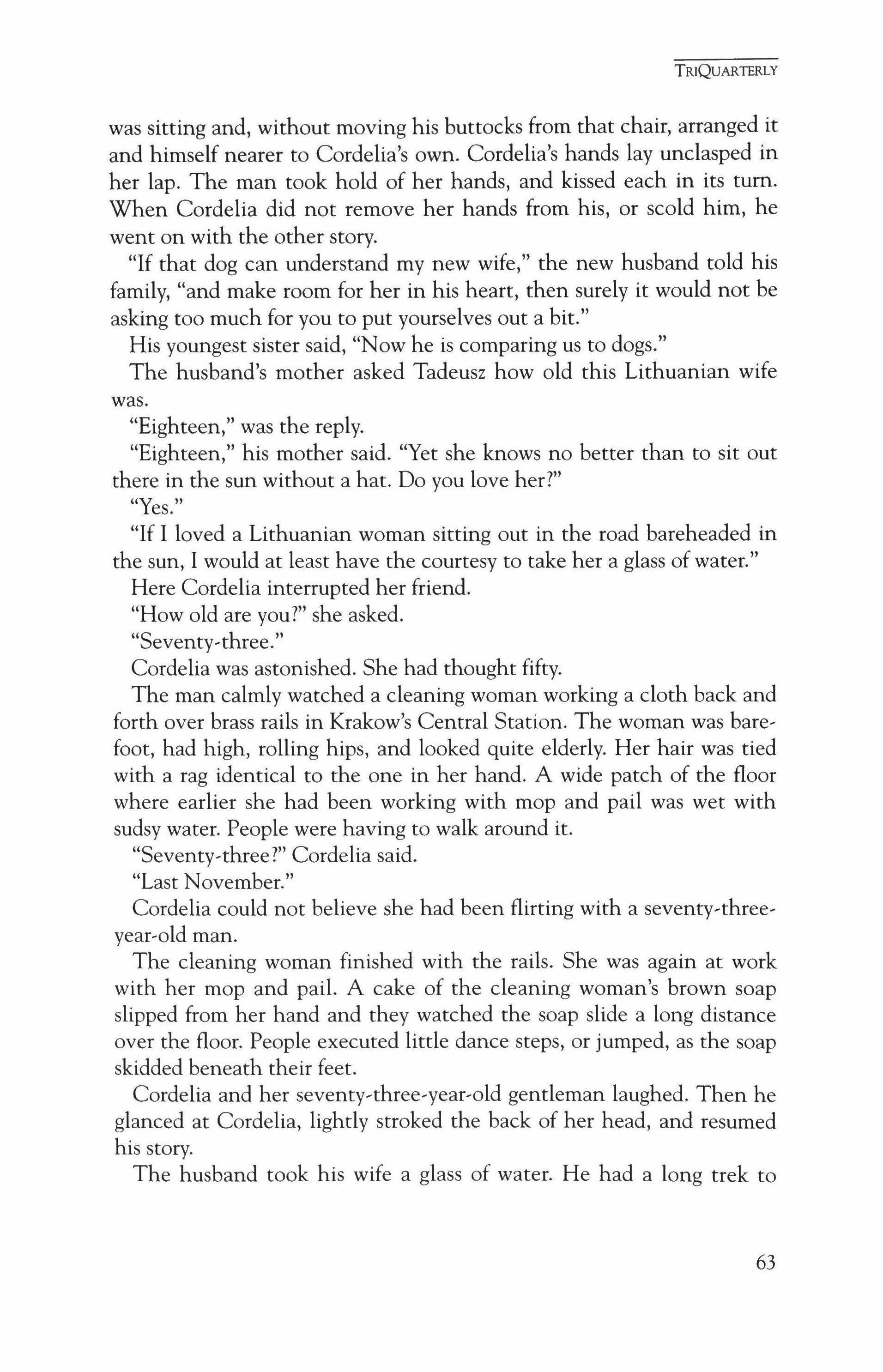
was sitting and, without moving his buttocks from that chair, arranged it and himself nearer to Cordelia's own. Cordelia's hands lay unclasped in her lap. The man took hold of her hands, and kissed each in its tum. When Cordelia did not remove her hands from his, or scold him, he went on with the other story.
"If that dog can understand my new wife," the new husband told his family, "and make room for her in his heart, then surely it would not be asking too much for you to put yourselves out a bit."
His youngest sister said, "Now he is comparing us to dogs."
The husband's mother asked Tadeusz how old this Lithuanian wife was.
"Eighteen," was the reply.
"Eighteen," his mother said. "Yet she knows no better than to sit out there in the sun without a hat. Do you love her?"
"Yes."
"If I loved a Lithuanian woman sitting out in the road bareheaded in the sun, I would at least have the courtesy to take her a glass of water."
Here Cordelia interrupted her friend.
"How old are you?" she asked.
"Seventy-three."
Cordelia was astonished. She had thought fifty.
The man calmly watched a cleaning woman working a cloth back and forth over brass rails in Krakow's Central Station. The woman was barefoot, had high, rolling hips, and looked quite elderly. Her hair was tied with a rag identical to the one in her hand. A wide patch of the floor where earlier she had been working with mop and pail was wet with sudsy water. People were having to walk around it.
"Seventy-three?" Cordelia said.
"Last November."
Cordelia could not believe she had been flirting with a seventy-threeyear-old man.
The cleaning woman finished with the rails. She was again at work with her mop and pail. A cake of the cleaning woman's brown soap slipped from her hand and they watched the soap slide a long distance over the floor. People executed little dance steps, or jumped, as the soap skidded beneath their feet.
Cordelia and her seventy-three-year-old gentleman laughed. Then he glanced at Cordelia, lightly stroked the back of her head, and resumed his story.
The husband took his wife a glass of water. He had a long trek to
TRlQUARTERLY
63

reach her, because over the recent hours the girl had been occasionally springing up from her sack and retreating down the road another hundred yards or so, as if she meant through this method to effect her return to Lithuania. She was now about a half mile from the family house and no more than a speck. Each time she had moved the dog had moved with her, so actually there were two specks on the road for the family and everyone else in the village to see.
Then for a time there were the three specks, after Tadeusz had finally reached her with his glass of water.
At this point in the narrative the man telling Cordelia this story had to break it off. Their train had been announced and they had to hurry between the gates and find their proper car, with their baggage bumping the man's knees, since he was such a gentleman that he had insisted on conveying his own many bags and Cordelia's rucksack also. He was old enough to be her father, even her grandfather, Cordelia thought, stealing glances at him, but appeared to be in good physical condition. He was certainly good-looking,
Once on the train the man stowed this baggage in an overhead rack and he and Cordelia took seats together. Again the man held Cordelia's hand, since she did not discourage this; in a little while-actually, before the train was even out of the station-she was resting her head on his shoulder and aimlessly stroking a button on his suit jacket, as he continued his family saga.
When the husband returned from his trip down the road with the glass of water, the family asked the new husband what had been his wife's reaction to this little kindness.
"She dribbled a few drops of water over her head," the husband said. "The rest she poured into the palm of her hand, so Tadeusz, the dog, could drink."
"My God!" everyone said, for this had not been the expected response.
"Then she pitched the glass into the nettles by the side of the road, picked up her bag, and she and the dog went a little further down the road."
"Life must be good in Lithuania," said the mother, "if they can afford to throwaway decent glasses."
"I never knew Lithuanians liked dogs," another brother said. "It is not a thing I have ever heard about them, although I am by no means versed in the subject."
"A Lithuanian woman can be very dramatic," someone else said.
TRIQUARTERLY
64
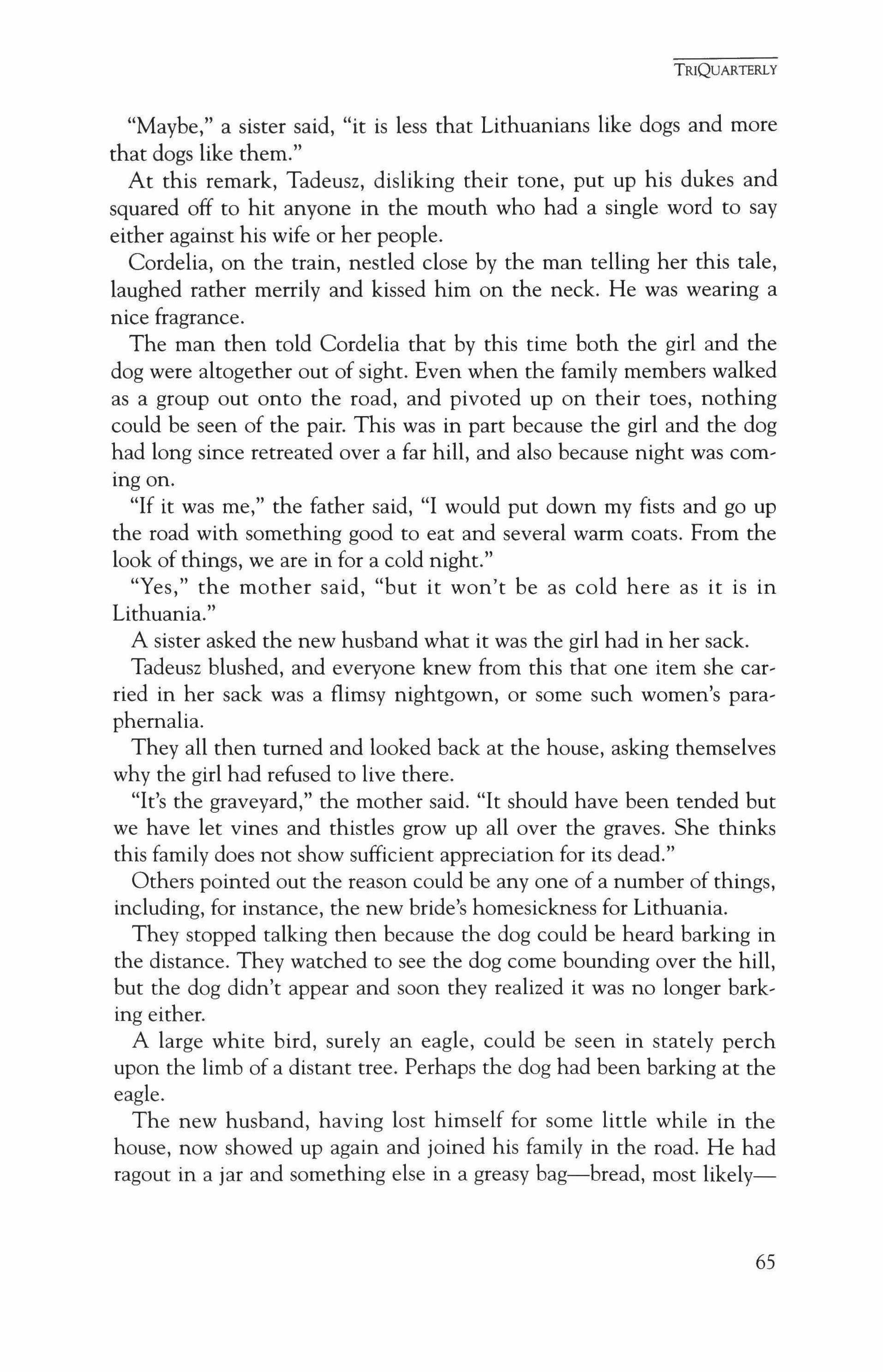
"Maybe," a sister said, "it is less that Lithuanians like dogs and more that dogs like them."
At this remark, Tadeusz, disliking their tone, put up his dukes and squared off to hit anyone in the mouth who had a single word to say either against his wife or her people.
Cordelia, on the train, nestled close by the man telling her this tale, laughed rather merrily and kissed him on the neck. He was wearing a nice fragrance.
The man then told Cordelia that by this time both the girl and the dog were altogether out of sight. Even when the family members walked as a group out onto the road, and pivoted up on their toes, nothing could be seen of the pair. This was in part because the girl and the dog had long since retreated over a far hill, and also because night was com' ing on.
"If it was me," the father said, "I would put down my fists and go up the road with something good to eat and several warm coats. From the look of things, we are in for a cold night."
"Yes," the mother said, "but it won't be as cold here as it is in Lithuania."
A sister asked the new husband what it was the girl had in her sack.
Tadeusz blushed, and everyone knew from this that one item she car, ried in her sack was a flimsy nightgown, or some such women's para' phernalia.
They all then turned and looked back at the house, asking themselves why the girl had refused to live there.
"It's the graveyard," the mother said. "It should have been tended but we have let vines and thistles grow up all over the graves. She thinks this family does not show sufficient appreciation for its dead."
Others pointed out the reason could be anyone of a number of things, including, for instance, the new bride's homesickness for Lithuania.
They stopped talking then because the dog could be heard barking in the distance. They watched to see the dog come bounding over the hill, but the dog didn't appear and soon they realized it was no longer bark, ing either.
A large white bird, surely an eagle, could be seen in stately perch upon the limb of a distant tree. Perhaps the dog had been barking at the eagle.
The new husband, having lost himself for some little while in the house, now showed up again and joined his family in the road. He had ragout in a jar and something else in a greasy bag-bread, most likely-
TRIQUARTERLY
65

his form all but hidden away by a dozen bulky coats.
"Those Lithuanians," someone said-but quietly-"have always been a lot of trouble."
"You best take good matches, too," the father said, and rooted in his pockets until he found a box of matches made in Sweden and not those Soviet sticks which would spit and fizzle and rarely light.
"You will have a devil of a time finding dry wood," someone said, because just then it started raining.
The new husband was now about ten feet up the road, where he turned.
"Your lot would scare me, too," he said. "I've never seen such a scruffy bunch of useless Poles."
A third brother in the family, who had not spoken until this point, now decided that he would. "Jews through that door!" he cried. "Poles through the other!"
No one said anything to this. The brother who had spoken had been a tram conductor in the city when the Nazis invaded the country, and again during its Sovietization, with time out at Majdanek, and now he could no longer remember when he was driving the tram and when he wasn't.
Here the man paused again in his story, embracing Cordelia, who had shivered at that remark about the Jews.
"What was that all about?" she asked.
"It is a long story," her friend said. "I am not up to its rendering."
"Try."
After kissing Cordelia's warm throat, he said:
"Let us go back two thousand years."
Cordelia tightened her grip on his upper arm, preparing her mind for this journey.
"It is now two thousand years ago," he said, "and 1 am being born on one side of that same road, while you are being born on the other side."
"Must we be so old?" asked Cordelia.
"No. This is just my way of telling you this is a story that has been going on for a long time."
She scrunched herself tight against him and told him to continue.
"Now we have both been born and are feeding at our mother's breasts quite contentedly. Your mother, however, is a Jew. You, and your whole family across the road, are Jews. Mine are Poles."
He fell silent, as if he had completed the story. After a moment, Cordelia raised her face to his, looking at him expectantly. He smiled, but still did not speak.
TRIQUARTERLY
66
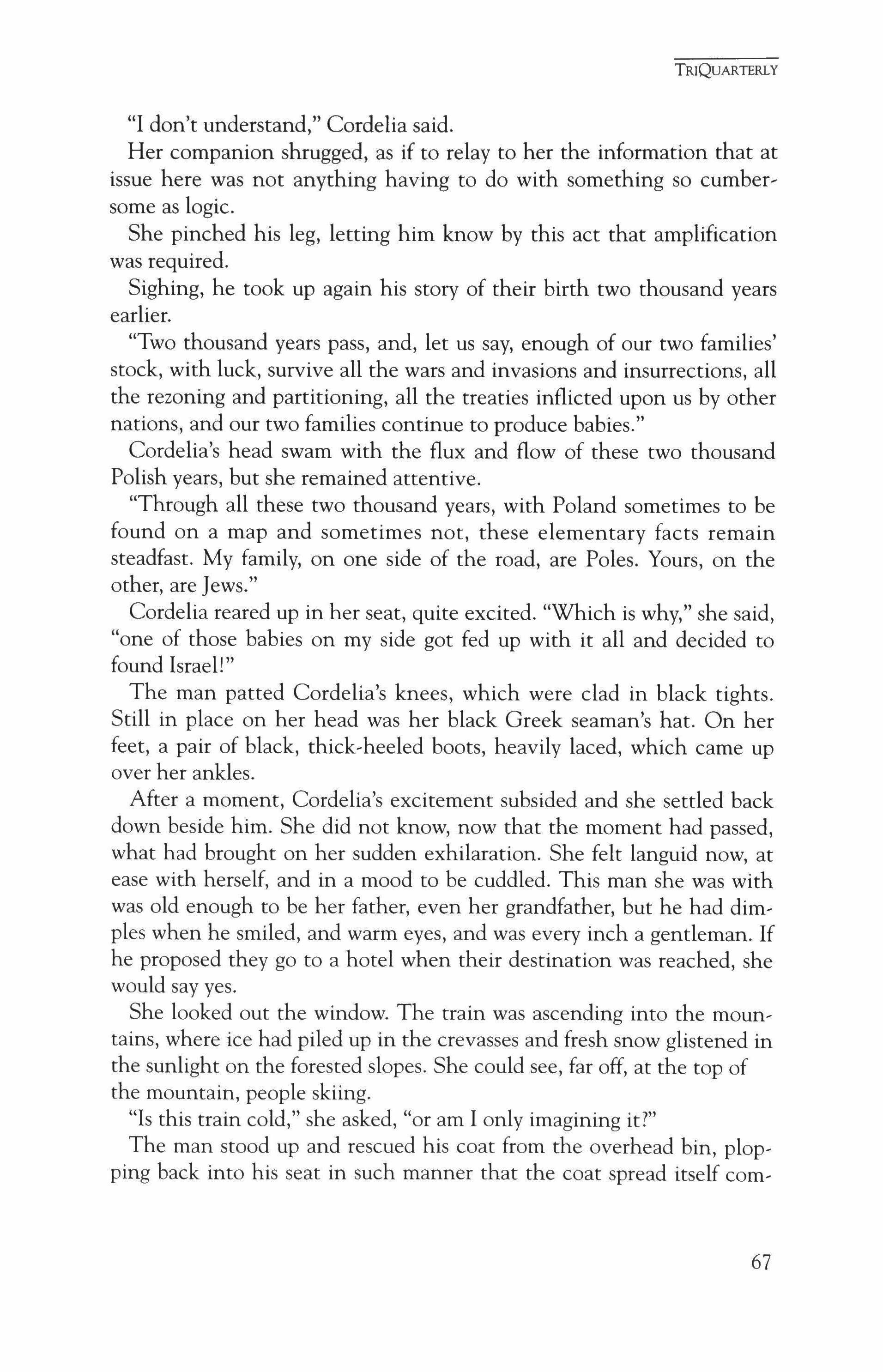
"I don't understand," Cordelia said.
Her companion shrugged, as if to relay to her the information that at issue here was not anything having to do with something so cumbersome as logic.
She pinched his leg, letting him know by this act that amplification was required.
Sighing, he took up again his story of their birth two thousand years earlier.
"Two thousand years pass, and, let us say, enough of our two families' stock, with luck, survive all the wars and invasions and insurrections, all the rezoning and partitioning, all the treaties inflicted upon us by other nations, and our two families continue to produce babies."
Cordelia's head swam with the flux and flow of these two thousand Polish years, but she remained attentive.
"Through all these two thousand years, with Poland sometimes to be found on a map and sometimes not, these elementary facts remain steadfast. My family, on one side of the road, are Poles. Yours, on the other, are Jews."
Cordelia reared up in her seat, quite excited. "Which is why," she said, "one of those babies on my side got fed up with it all and decided to found Israel!"
The man patted Cordelia's knees, which were clad in black tights. Still in place on her head was her black Greek seaman's hat. On her feet, a pair of black, thick-heeled boots, heavily laced, which came up over her ankles.
After a moment, Cordelia's excitement subsided and she settled back down beside him. She did not know, now that the moment had passed, what had brought on her sudden exhilaration. She felt languid now, at ease with herself, and in a mood to be cuddled. This man she was with was old enough to be her father, even her grandfather, but he had dimples when he smiled, and warm eyes, and was every inch a gentleman. If he proposed they go to a hotel when their destination was reached, she would say yes.
She looked out the window. The train was ascending into the mountains, where ice had piled up in the crevasses and fresh snow glistened in the sunlight on the forested slopes. She could see, far off, at the top of the mountain, people skiing.
"Is this train cold," she asked, "or am I only imagining it?"
The man stood up and rescued his coat from the overhead bin, plopping back into his seat in such manner that the coat spread itself com-
TRIQUARTERLY
67

pletely over both their laps. He placed his hand between her thighs; Cordelia, closing her eyes, considered whether she should ask him to remove it.
He took up again the family saga.
"The wedded brother," he said, "was now at the crest of the hill, look, ing far larger than a speck, with all the coats he was carrying, though the family was still able to make out his arm flapping over his head in a gesture that signified his departure."
A few seconds later they saw the dog trot up and sniff at his heels.
Then he and the dog disappeared over the hill.
For a time they heard barking, and reasoned this must be because of the eagle which had abandoned its perch in the distance and was now an invisible presence in the swollen sky.
The brother who once had driven the tram in the city and survived the ovens at Majdanek, shouted, "Hold the potatoes!"
It was all but dark now, and the rain a steady drizzle.
"We never even got her name," the mother said.
"Sometime this week," the father said, "if any is to be found, I am going to paint this house, and you lazy boys are going to get busy clean' ing up the graves."
The entire family trooped back into the house. In a little while the dog Tadeusz came running home with his tail between his legs, nosing everyone's legs and crotch for sympathy. The dog had always been nervous at nighttime and never liked to stray far from home.
TRIQUARTERLY
68
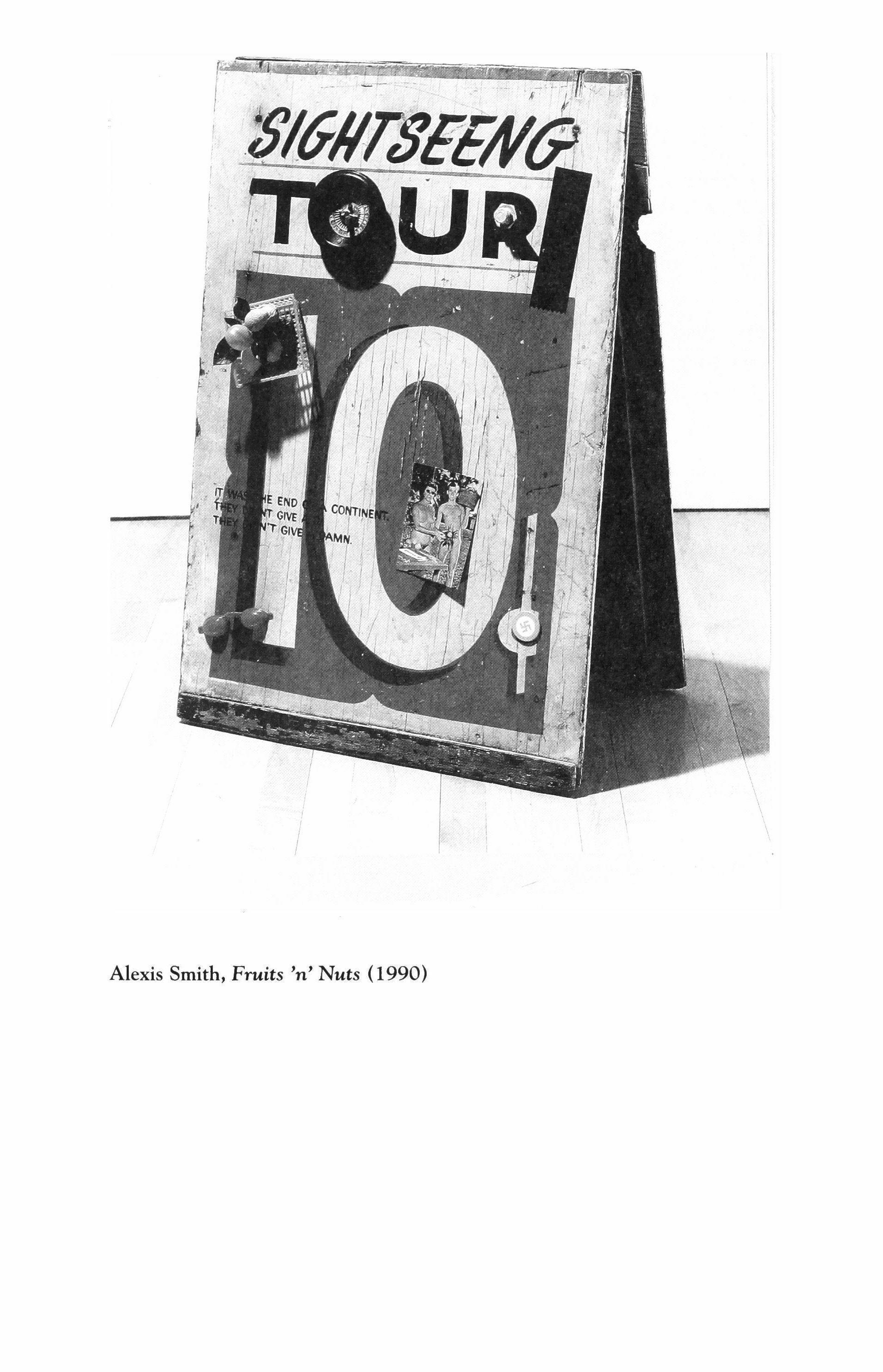 Alexis Smith, Fruits 'n' Nuts (1990)
Alexis Smith, Fruits 'n' Nuts (1990)
Prince of Motown
Maria Flook
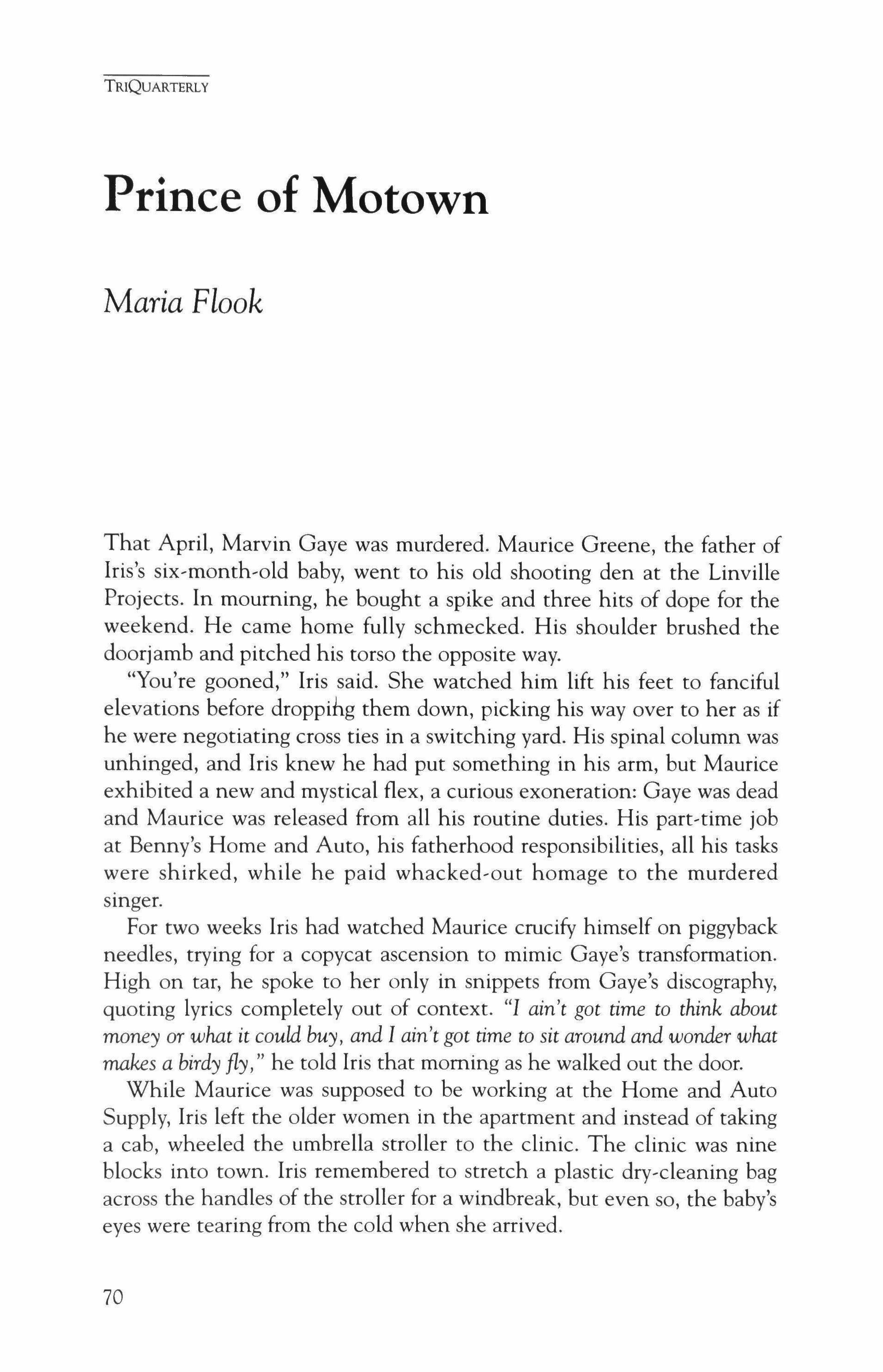
That April, Marvin Gaye was murdered. Maurice Greene, the father of Iris's six-month-old baby, went to his old shooting den at the Linville Projects. In mourning, he bought a spike and three hits of dope for the weekend. He came home fully schmecked. His shoulder brushed the doorjamb and pitched his torso the opposite way.
"You're gooned," Iris said. She watched him lift his feet to fanciful elevations before dropping them down, picking his way over to her as if he were negotiating cross ties in a switching yard. His spinal column was unhinged, and Iris knew he had put something in his arm, but Maurice exhibited a new and mystical flex, a curious exoneration: Gaye was dead and Maurice was released from all his routine duties. His part,time job at Benny's Home and Auto, his fatherhood responsibilities, all his tasks were shirked, while he paid whacked,out homage to the murdered singer.
For two weeks Iris had watched Maurice crucify himself on piggyback needles, trying for a copycat ascension to mimic Gaye's transformation. High on tar, he spoke to her only in snippets from Gaye's discography, quoting lyrics completely out of context. "I ain't got time to think about money or what it could buy, and I ain't got time to sit around and wonder what makes a birdy fly," he told Iris that morning as he walked out the door.
While Maurice was supposed to be working at the Home and Auto Supply, Iris left the older women in the apartment and instead of taking a cab, wheeled the umbrella stroller to the clinic. The clinic was nine blocks into town. Iris remembered to stretch a plastic dry,cleaning bag across the handles of the stroller for a windbreak, but even so, the baby's eyes were tearing from the cold when she arrived.
TRIQUARTERLY
70
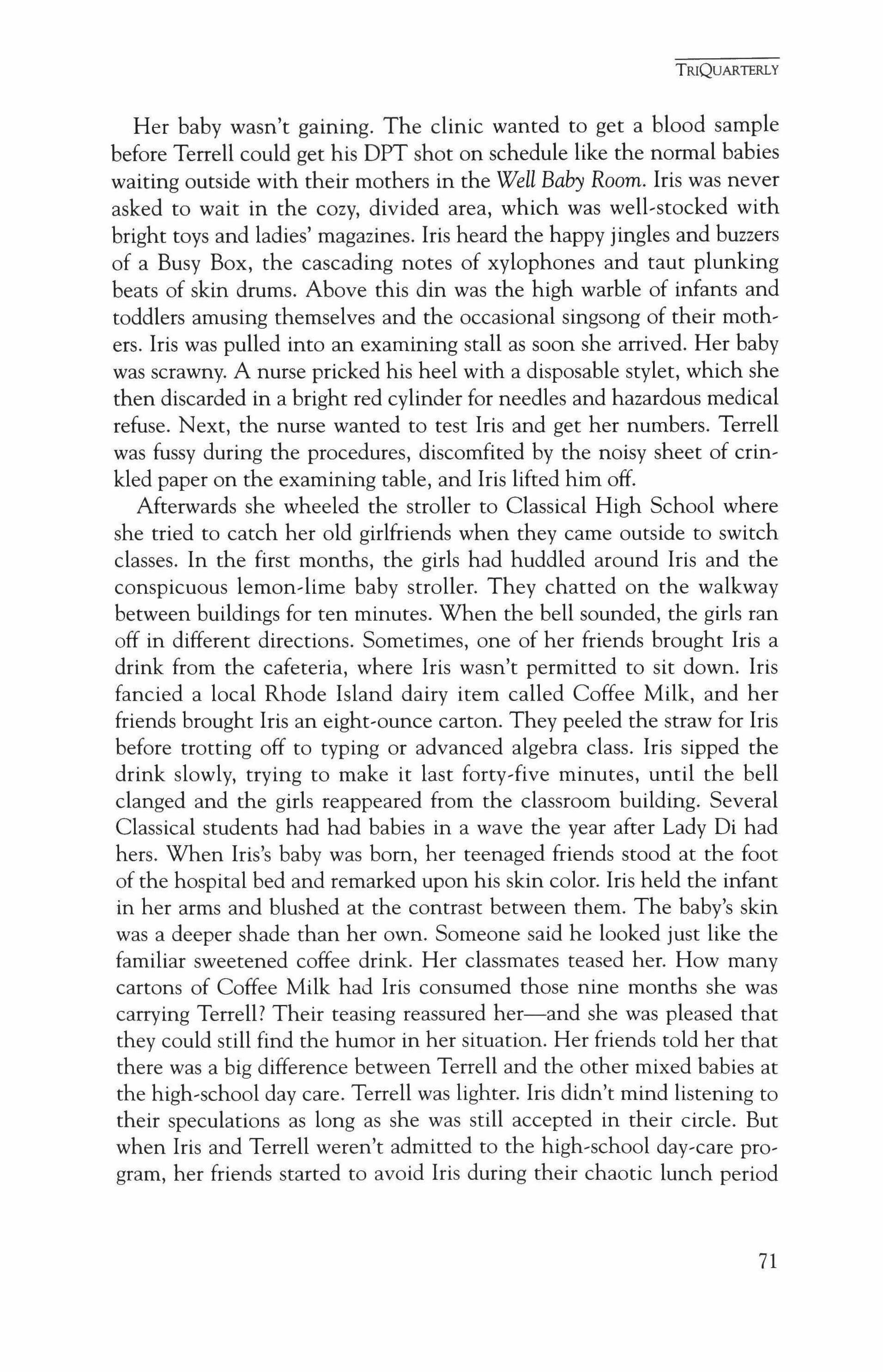
Her baby wasn't gaining. The clinic wanted to get a blood sample before Terrell could get his OPT shot on schedule like the normal babies waiting outside with their mothers in the Well Baby Room. Iris was never asked to wait in the cozy, divided area, which was well-stocked with bright toys and ladies' magazines. Iris heard the happy jingles and buzzers of a Busy Box, the cascading notes of xylophones and taut plunking beats of skin drums. Above this din was the high warble of infants and toddlers amusing themselves and the occasional singsong of their mothers. Iris was pulled into an examining stall as soon she arrived. Her baby was scrawny. A nurse pricked his heel with a disposable stylet, which she then discarded in a bright red cylinder for needles and hazardous medical refuse. Next, the nurse wanted to test Iris and get her numbers. Terrell was fussy during the procedures, discomfited by the noisy sheet of crinkled paper on the examining table, and Iris lifted him off. Afterwards she wheeled the stroller to Classical High School where she tried to catch her old girlfriends when they came outside to switch classes. In the first months, the girls had huddled around Iris and the conspicuous lemon-lime baby stroller. They chatted on the walkway between buildings for ten minutes. When the bell sounded, the girls ran off in different directions. Sometimes, one of her friends brought Iris a drink from the cafeteria, where Iris wasn't permitted to sit down. Iris fancied a local Rhode Island dairy item called Coffee Milk, and her friends brought Iris an eight-ounce carton. They peeled the straw for Iris before trotting off to typing or advanced algebra class. Iris sipped the drink slowly, trying to make it last forty-five minutes, until the bell clanged and the girls reappeared from the classroom building. Several Classical students had had babies in a wave the year after Lady Di had hers. When Iris's baby was born, her teenaged friends stood at the foot of the hospital bed and remarked upon his skin color. Iris held the infant in her arms and blushed at the contrast between them. The baby's skin was a deeper shade than her own. Someone said he looked just like the familiar sweetened coffee drink. Her classmates teased her. How many cartons of Coffee Milk had Iris consumed those nine months she was carrying Terrell? Their teasing reassured her-and she was pleased that they could still find the humor in her situation. Her friends told her that there was a big difference between Terrell and the other mixed babies at the high-school day care. Terrell was lighter. Iris didn't mind listening to their speculations as long as she was still accepted in their circle. But when Iris and Terrell weren't admitted to the high-school day-care program, her friends started to avoid Iris during their chaotic lunch period
TRiQUARTERLY
71

and at the city bus stops, where she sometimes waited for them after school was dismissed. The novelty of being outcast wore off. She wheeled the umbrella stroller up and down the curbstones, bumping the nylon sling and startling the infant; the plastic dry-cleaning bag whipped in a mean wind, until he started bawling. By spring, Iris was totally abandoned by her high-school friends, and she no longer tried to intercept them.
Maurice crossed the linoleum as if he were testing an ice pond. His jeans were slipping off his hips and bunched at his unlaced Cons. Maurice prowled toward her; his weight lagged behind or tumbled ahead. His legs couldn't align with his trunk.
"You're cranked," she said.
He twirled around and fell on the couch. They had been forced to move in with Maurice's mother, Vicki, and Vicki's sister, Estelle. This arrangement was to be temporary. Iris was tender meat for that pair of harpies, and when Maurice was like this, he couldn't protect her.
Iris asked Maurice, "Answer me this. You give up everything just because Marvin Gaye bought it off his own father?" Her eyes were burning. She noted that her tears were not the everyday drips but new and unplanned for, brimming in huge and pitiful droplets. She wiped her face with the heel of her hand and stared at her moist palm. Its shiny residue did not directly reveal the exact nature of the new disaster she faced, and she rubbed her hand on her knee.
Maurice crumpled to one side of the sofa. She stood over him and raised her voice. "So what about me and Terrell? This is our life, you know. It's not just your life."
She bit her lip, trying not to say it again.
Maurice fluttered his eyes, trying to follow, but he never met her level of conjecture, which was a steep threshold and he couldn't pull himself across its difficult lip. "My bro is gone," he told her.
"Fuck that. That's yesterday's news."
His eyeballs were tight. He flopped over on the sofa and stretched his legs out. He told her, "We're all sensitive people with so much to give-"
"What's this?" Iris said. "Is that Marvin Gaye? Is that him? You make me crazy."
"-Understand me, sugar," Maurice quoted the murder victim.
She smacked him. Maurice rolled onto his stomach and groaned with pleasure, which made her strike him again. His comic whimper alerted his mother and aunt. Iris started tugging his floppy arm and the whole
TRIQUARTERLY
72
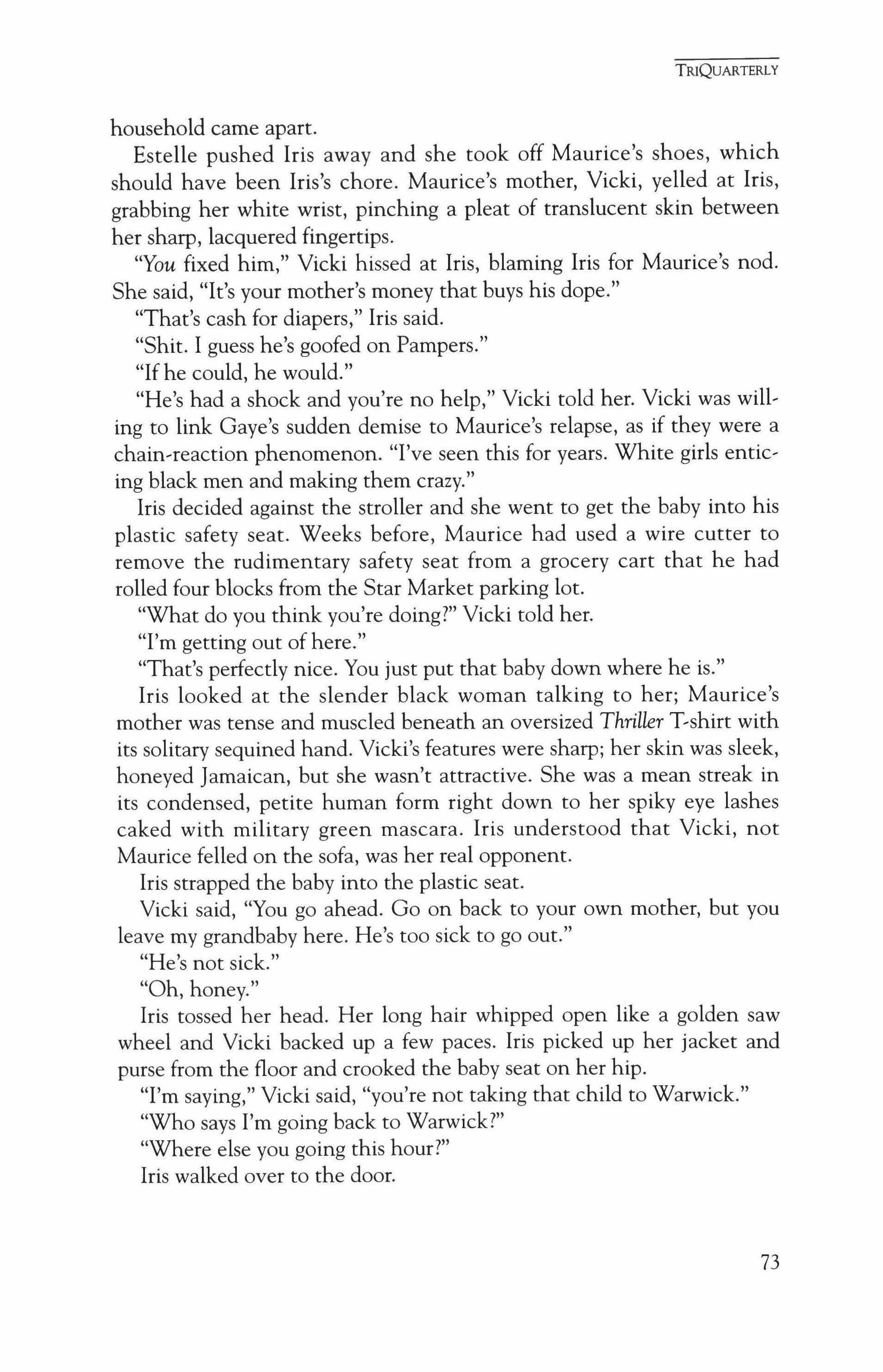
household came apart.
Estelle pushed Iris away and she took off Maurice's shoes, which should have been Iris's chore. Maurice's mother, Vicki, yelled at Iris, grabbing her white wrist, pinching a pleat of translucent skin between her sharp, lacquered fingertips.
"You fixed him," Vicki hissed at Iris, blaming Iris for Maurice's nod. She said, "It's your mother's money that buys his dope."
"That's cash for diapers," Iris said.
"Shit. I guess he's goofed on Pampers."
"If he could, he would."
"He's had a shock and you're no help," Vicki told her. Vicki was willing to link Gaye's sudden demise to Maurice's relapse, as if they were a chain-reaction phenomenon. "I've seen this for years. White girls enticing black men and making them crazy."
Iris decided against the stroller and she went to get the baby into his plastic safety seat. Weeks before, Maurice had used a wire cutter to remove the rudimentary safety seat from a grocery cart that he had rolled four blocks from the Star Market parking lot.
"What do you think you're doing?" Vicki told her.
"I'm getting out of here."
"That's perfectly nice. You just put that baby down where he is."
Iris looked at the slender black woman talking to her; Maurice's mother was tense and muscled beneath an oversized Thriller 'Tshirt with its solitary sequined hand. Vicki's features were sharp; her skin was sleek, honeyed Jamaican, but she wasn't attractive. She was a mean streak in its condensed, petite human form right down to her spiky eye lashes caked with military green mascara. Iris understood that Vicki, not Maurice felled on the sofa, was her real opponent.
Iris strapped the baby into the plastic seat.
Vicki said, "You go ahead. Go on back to your own mother, but you leave my grandbaby here. He's too sick to go out."
"He's not sick."
"Oh, honey."
Iris tossed her head. Her long hair whipped open like a golden saw wheel and Vicki backed up a few paces. Iris picked up her jacket and purse from the floor and crooked the baby seat on her hip.
"I'm saying," Vicki said, "you're not taking that child to Warwick."
"Who says I'm going back to Warwick?"
"Where else you going this hour?"
Iris walked over to the door.
TRIQUARTERLY
73
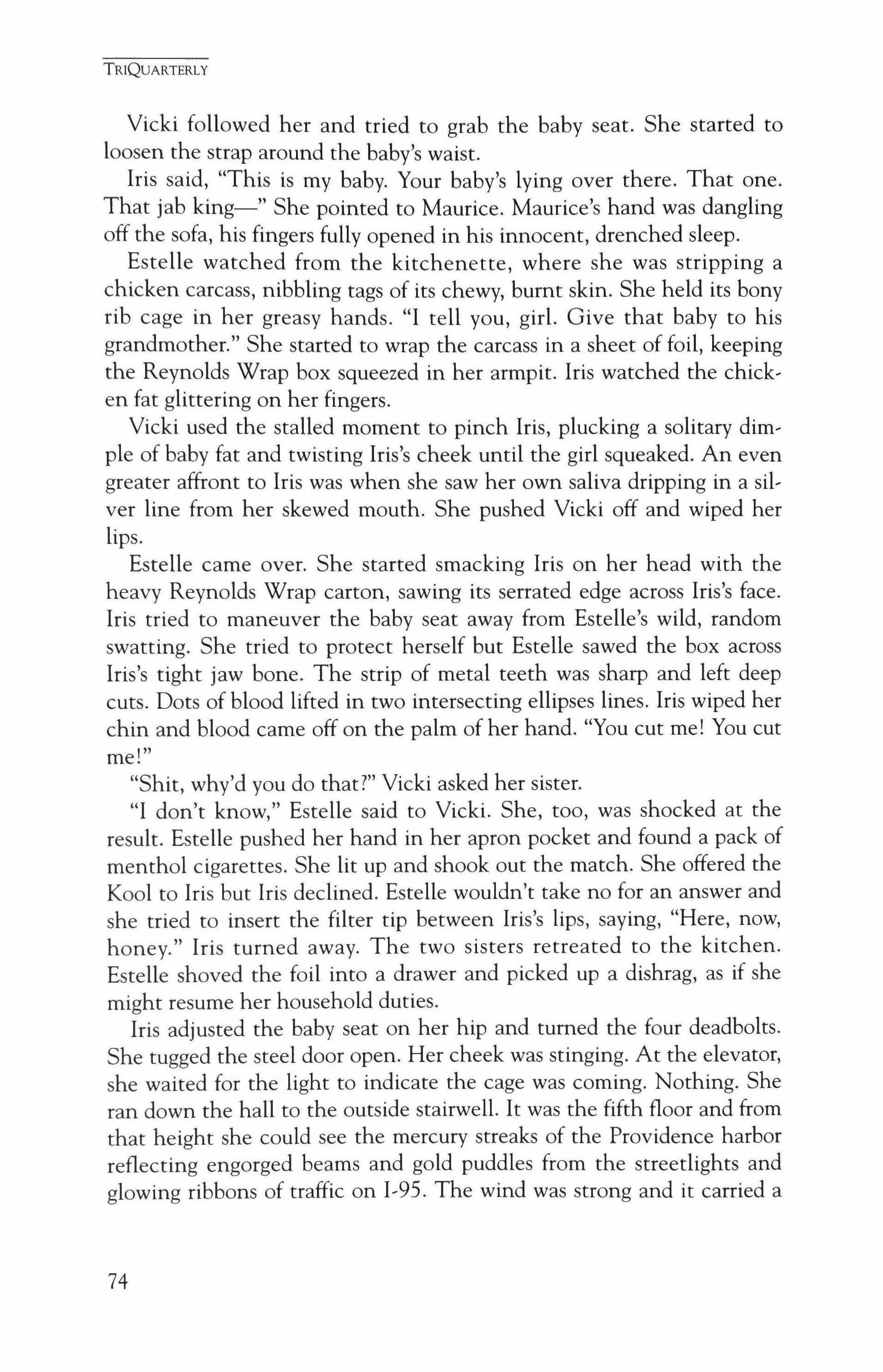
Vicki followed her and tried to grab the baby seat. She started to loosen the strap around the baby's waist.
Iris said, "This is my baby. Your baby's lying over there. That one. That jab king-" She pointed to Maurice. Maurice's hand was dangling off the sofa, his fingers fully opened in his innocent, drenched sleep.
Estelle watched from the kitchenette, where she was stripping a chicken carcass, nibbling tags of its chewy, burnt skin. She held its bony rib cage in her greasy hands. "I tell you, girl. Give that baby to his grandmother." She started to wrap the carcass in a sheet of foil, keeping the Reynolds Wrap box squeezed in her armpit. Iris watched the chicken fat glittering on her fingers.
Vicki used the stalled moment to pinch Iris, plucking a solitary dimple of baby fat and twisting Iris's cheek until the girl squeaked. An even greater affront to Iris was when she saw her own saliva dripping in a silver line from her skewed mouth. She pushed Vicki off and wiped her lips.
Estelle came over. She started smacking Iris on her head with the heavy Reynolds Wrap carton, sawing its serrated edge across Iris's face. Iris tried to maneuver the baby seat away from Estelle's wild, random swatting. She tried to protect herself but Estelle sawed the box across Iris's tight jaw bone. The strip of metal teeth was sharp and left deep cuts. Dots of blood lifted in two intersecting ellipses lines. Iris wiped her chin and blood came off on the palm of her hand. "You cut me! You cut me!"
"Shit, why'd you do that?" Vicki asked her sister.
"I don't know," Estelle said to Vicki. She, too, was shocked at the result. Estelle pushed her hand in her apron pocket and found a pack of menthol cigarettes. She lit up and shook out the match. She offered the Kool to Iris but Iris declined. Estelle wouldn't take no for an answer and she tried to insert the filter tip between Iris's lips, saying, "Here, now, honey." Iris turned away. The two sisters retreated to the kitchen. Estelle shoved the foil into a drawer and picked up a dishrag, as if she might resume her household duties.
Iris adjusted the baby seat on her hip and turned the four deadbolts. She tugged the steel door open. Her cheek was stinging. At the elevator, she waited for the light to indicate the cage was coming. Nothing. She ran down the hall to the outside stairwell. It was the fifth floor and from that height she could see the mercury streaks of the Providence harbor reflecting engorged beams and gold puddles from the streetlights and glowing ribbons of traffic on 1-95. The wind was strong and it carried a
TRIQUARTERLY
74
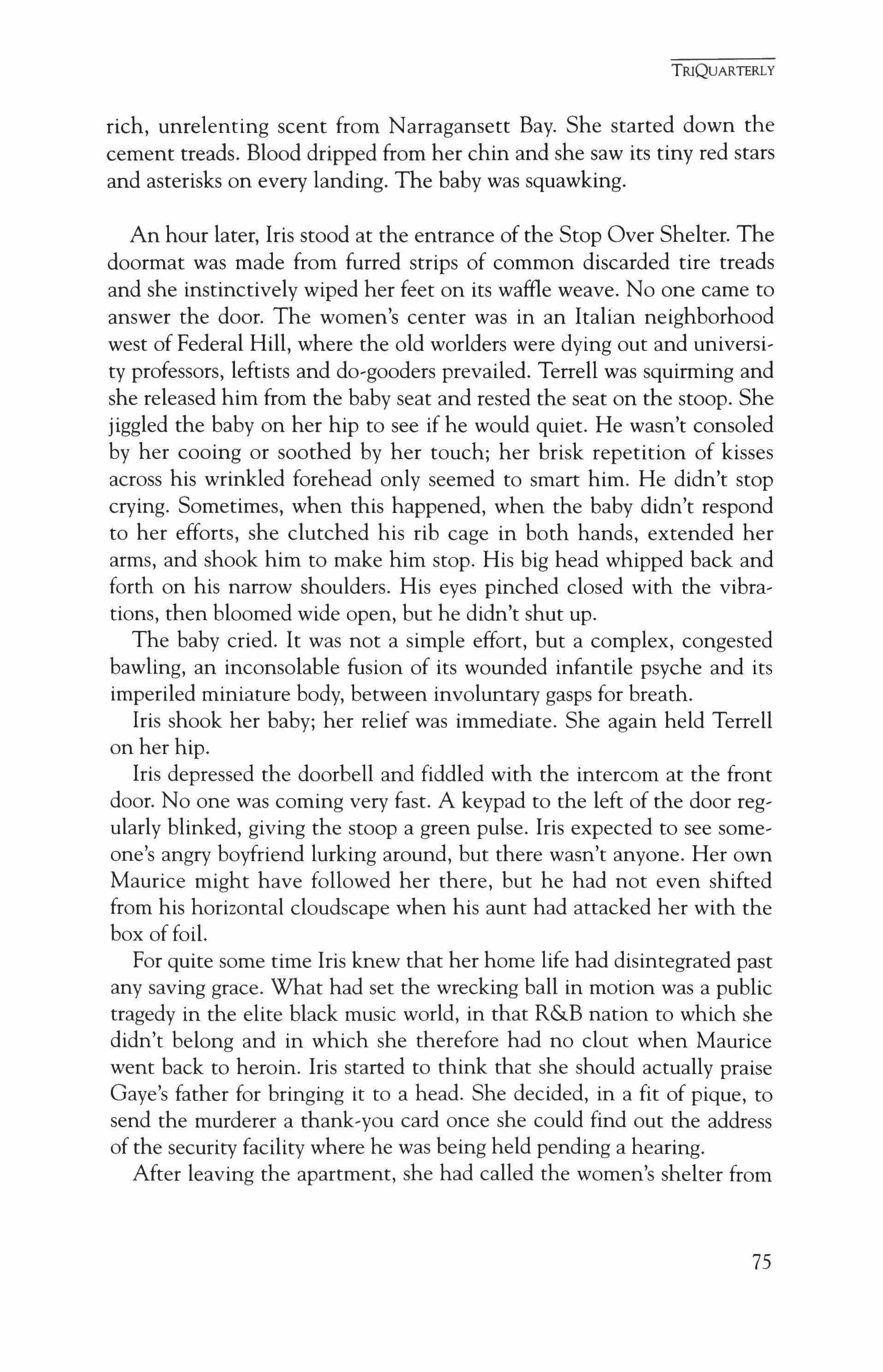
rich, unrelenting scent from Narragansett Bay. She started down the cement treads. Blood dripped from her chin and she saw its tiny red stars and asterisks on every landing. The baby was squawking.
An hour later, Iris stood at the entrance of the Stop Over Shelter. The doormat was made from furred strips of common discarded tire treads and she instinctively wiped her feet on its waffle weave. No one came to answer the door. The women's center was in an Italian neighborhood west of Federal Hill, where the old worlders were dying out and university professors, leftists and do-gooders prevailed. Terrell was squirming and she released him from the baby seat and rested the seat on the stoop. She jiggled the baby on her hip to see if he would quiet. He wasn't consoled by her cooing or soothed by her touch; her brisk repetition of kisses across his wrinkled forehead only seemed to smart him. He didn't stop crying. Sometimes, when this happened, when the baby didn't respond to her efforts, she clutched his rib cage in both hands, extended her arms, and shook him to make him stop. His big head whipped back and forth on his narrow shoulders. His eyes pinched closed with the vibrations, then bloomed wide open, but he didn't shut up.
The baby cried. It was not a simple effort, but a complex, congested bawling, an inconsolable fusion of its wounded infantile psyche and its imperiled miniature body, between involuntary gasps for breath.
Iris shook her baby; her relief was immediate. She again held Terrell on her hip.
Iris depressed the doorbell and fiddled with the intercom at the front door. No one was coming very fast. A keypad to the left of the door reg' ularly blinked, giving the stoop a green pulse. Iris expected to see some, one's angry boyfriend lurking around, but there wasn't anyone. Her own Maurice might have followed her there, but he had not even shifted from his horizontal cloudscape when his aunt had attacked her with the box of foil.
For quite some time Iris knew that her home life had disintegrated past any saving grace. What had set the wrecking ball in motion was a public tragedy in the elite black music world, in that R&B nation to which she didn't belong and in which she therefore had no clout when Maurice went back to heroin. Iris started to think that she should actually praise Gaye's father for bringing it to a head. She decided, in a fit of pique, to send the murderer a thank-you card once she could find out the address of the security facility where he was being held pending a hearing.
After leaving the apartment, she had called the women's shelter from
TRIQUARTERLY
75
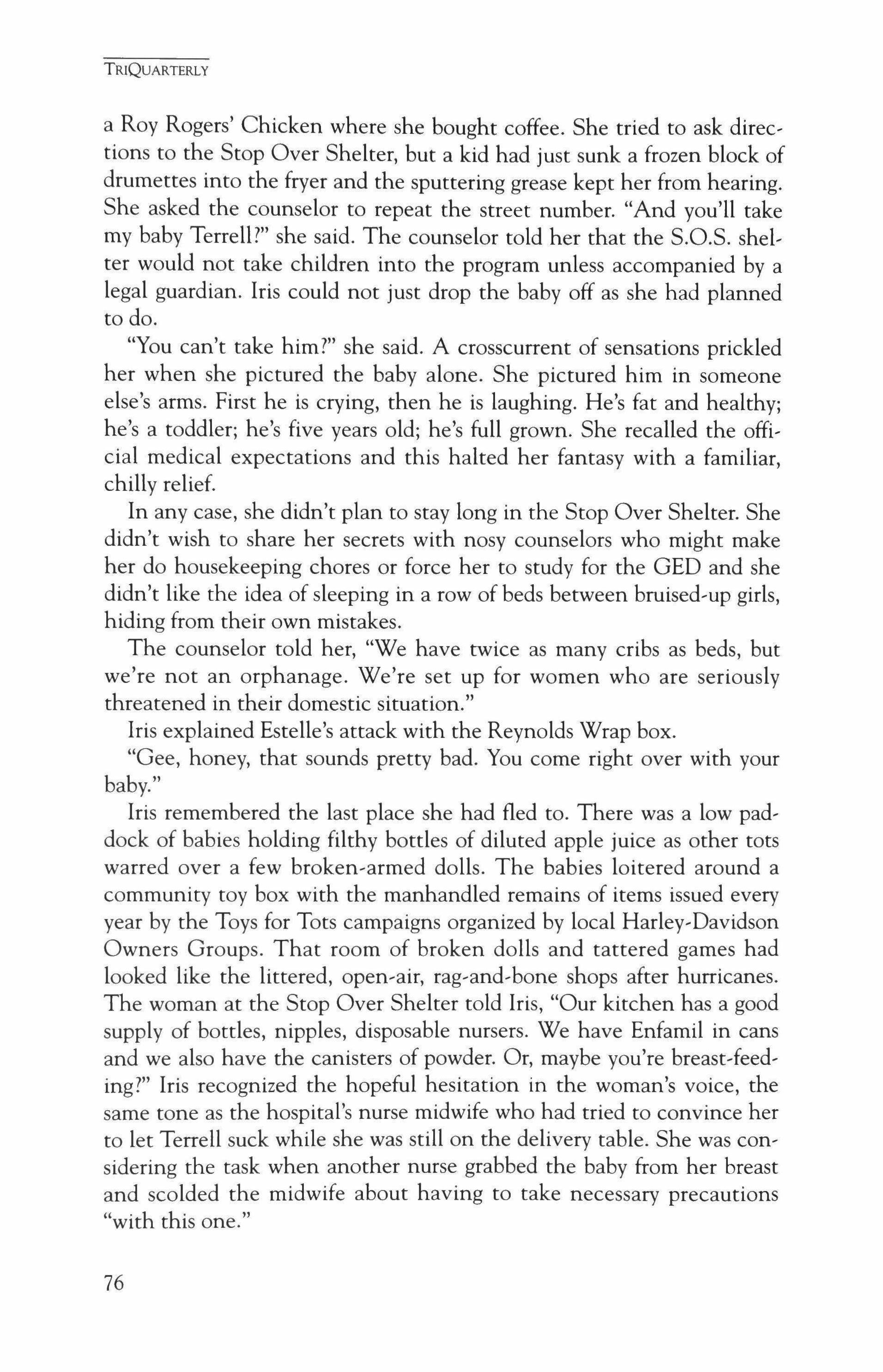
a Roy Rogers' Chicken where she bought coffee. She tried to ask directions to the Stop Over Shelter, but a kid had just sunk a frozen block of drumettes into the fryer and the sputtering grease kept her from hearing. She asked the counselor to repeat the street number. "And you'll take my baby Terrell?" she said. The counselor told her that the S.O.S. shelter would not take children into the program unless accompanied by a legal guardian. Iris could not just drop the baby off as she had planned to do.
"You can't take him?" she said. A crosscurrent of sensations prickled her when she pictured the baby alone. She pictured him in someone else's arms. First he is crying, then he is laughing. He's fat and healthy; he's a toddler; he's five years old; he's full grown. She recalled the official medical expectations and this halted her fantasy with a familiar, chilly relief.
In any case, she didn't plan to stay long in the Stop Over Shelter. She didn't wish to share her secrets with nosy counselors who might make her do housekeeping chores or force her to study for the GED and she didn't like the idea of sleeping in a row of beds between bruised-up girls, hiding from their own mistakes.
The counselor told her, "We have twice as many cribs as beds, but we're not an orphanage. We're set up for women who are seriously threatened in their domestic situation."
Iris explained Estelle's attack with the Reynolds Wrap box. "Gee, honey, that sounds pretty bad. You come right over with your baby."
Iris remembered the last place she had fled to. There was a low paddock of babies holding filthy bottles of diluted apple juice as other tots warred over a few broken-armed dolls. The babies loitered around a community toy box with the manhandled remains of items issued every year by the Toys for Tots campaigns organized by local Harley-Davidson Owners Groups. That room of broken dolls and tattered games had looked like the littered, open-air, rag-and-bone shops after hurricanes. The woman at the Stop Over Shelter told Iris, "Our kitchen has a good supply of bottles, nipples, disposable nursers. We have Enfamil in cans and we also have the canisters of powder. Or, maybe you're breast-feeding?" Iris recognized the hopeful hesitation in the woman's voice, the same tone as the hospital's nurse midwife who had tried to convince her to let Terrell suck while she was still on the delivery table. She was considering the task when another nurse grabbed the baby from her breast and scolded the midwife about having to take necessary precautions "with this one."
TRIQUARTERLY
76
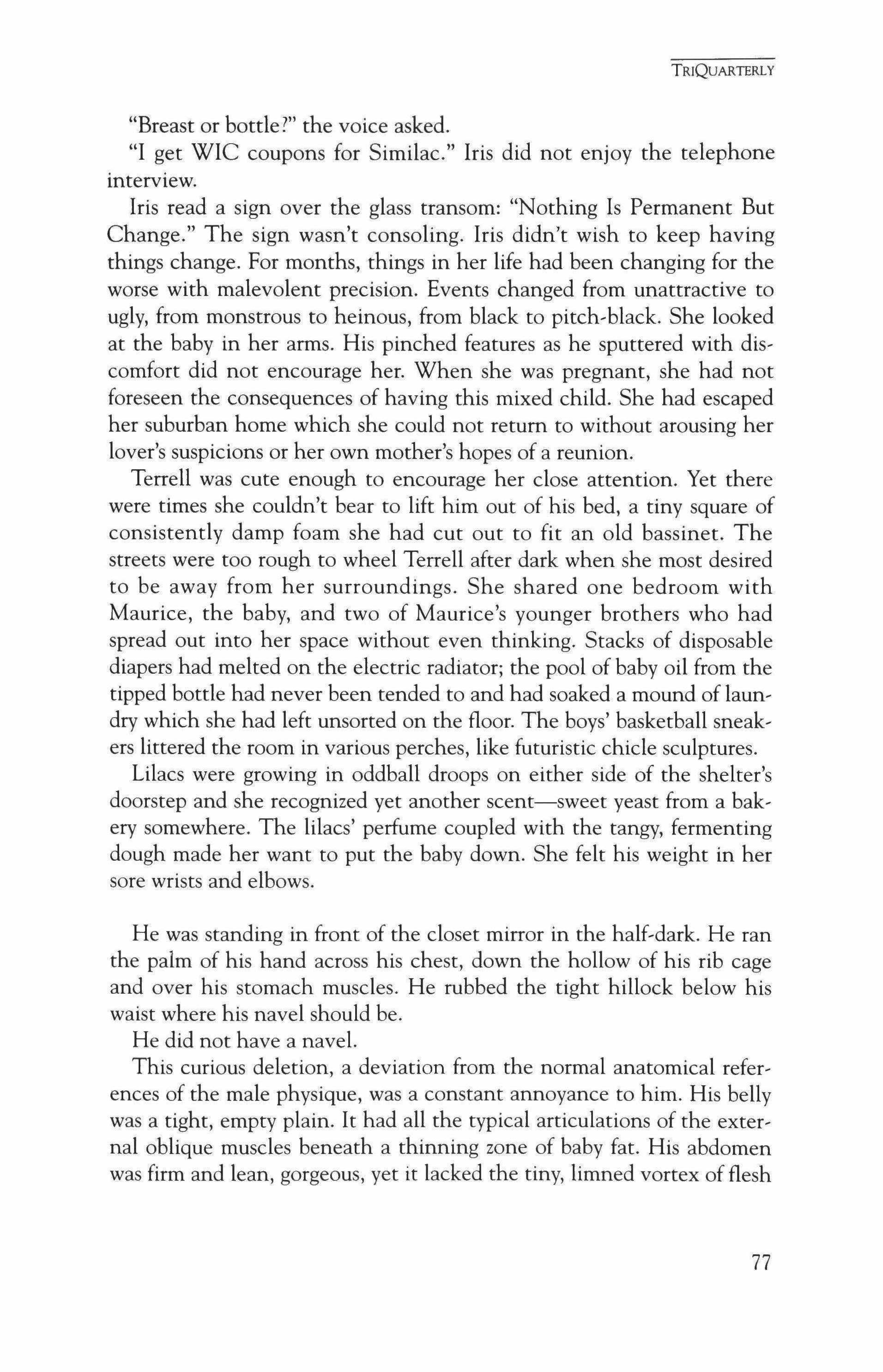
"Breast or bottle?" the voice asked.
"I get WIC coupons for Similac." Iris did not enjoy the telephone interview.
Iris read a sign over the glass transom: "Nothing Is Permanent But Change." The sign wasn't consoling. Iris didn't wish to keep having things change. For months, things in her life had been changing for the worse with malevolent precision. Events changed from unattractive to ugly, from monstrous to heinous, from black to pitch-black. She looked at the baby in her arms. His pinched features as he sputtered with discomfort did not encourage her. When she was pregnant, she had not foreseen the consequences of having this mixed child. She had escaped her suburban home which she could not return to without arousing her lover's suspicions or her own mother's hopes of a reunion.
Terrell was cute enough to encourage her close attention. Yet there were times she couldn't bear to lift him out of his bed, a tiny square of consistently damp foam she had cut out to fit an old bassinet. The streets were too rough to wheel Terrell after dark when she most desired to be away from her surroundings. She shared one bedroom with Maurice, the baby, and two of Maurice's younger brothers who had spread out into her space without even thinking. Stacks of disposable diapers had melted on the electric radiator; the pool of baby oil from the tipped bottle had never been tended to and had soaked a mound of laundry which she had left unsorted on the floor. The boys' basketball sneakers littered the room in various perches, like futuristic chicle sculptures.
Lilacs were growing in oddball droops on either side of the shelter's doorstep and she recognized yet another scent-sweet yeast from a bakery somewhere. The lilacs' perfume coupled with the tangy, fermenting dough made her want to put the baby down. She felt his weight in her sore wrists and elbows.
He was standing in front of the closet mirror in the half-dark. He ran the palm of his hand across his chest, down the hollow of his rib cage and over his stomach muscles. He rubbed the tight hillock below his waist where his navel should be.
He did not have a navel.
This curious deletion, a deviation from the normal anatomical references of the male physique, was a constant annoyance to him. His belly was a tight, empty plain. It had all the typical articulations of the external oblique muscles beneath a thinning zone of baby fat. His abdomen was firm and lean, gorgeous, yet it lacked the tiny, limned vortex of flesh
TRIQUARTERLY
77
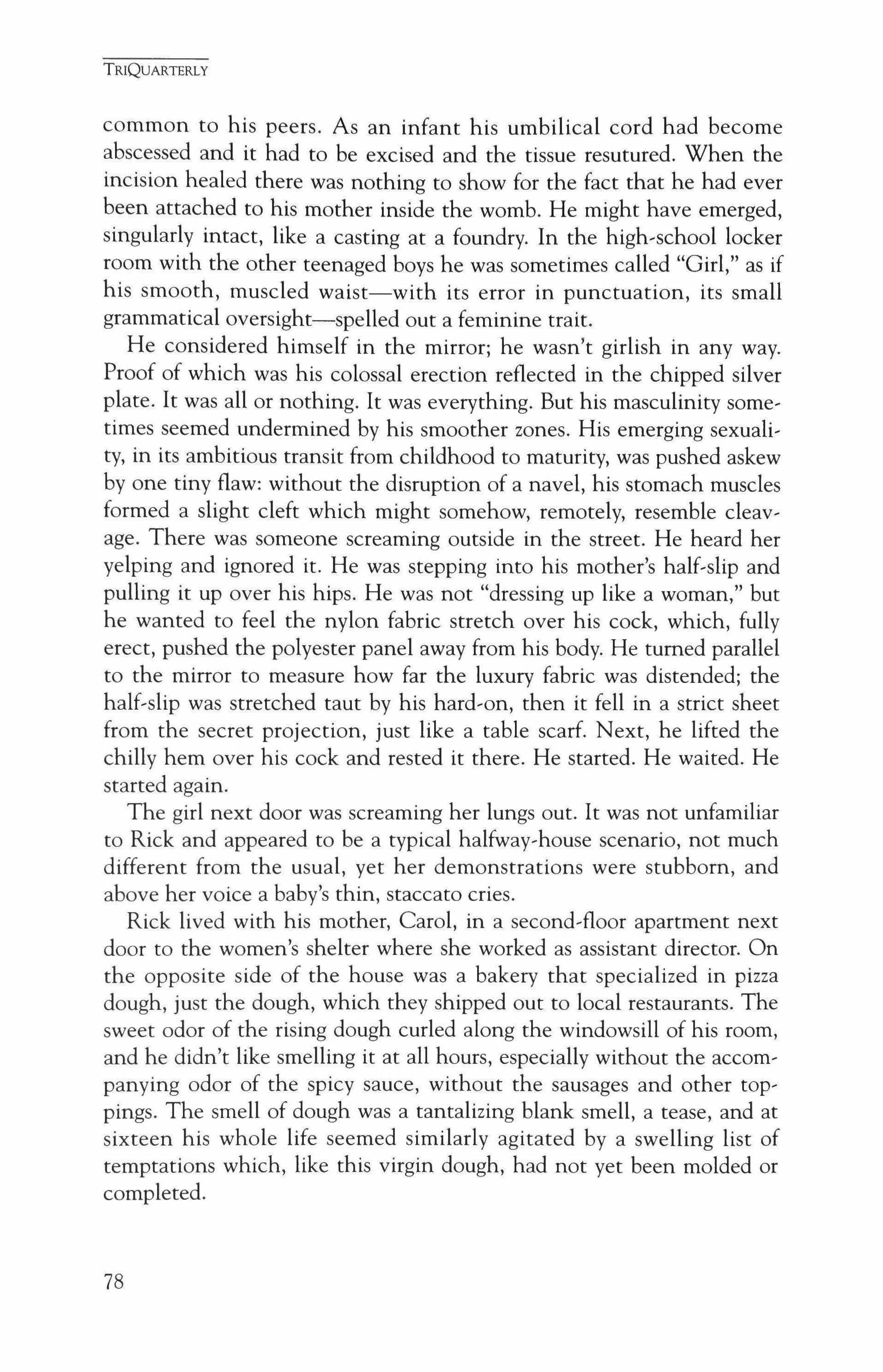
common to his peers. As an infant his umbilical cord had become abscessed and it had to be excised and the tissue resutured. When the incision healed there was nothing to show for the fact that he had ever been attached to his mother inside the womb. He might have emerged, singularly intact, like a casting at a foundry. In the high,school locker room with the other teenaged boys he was sometimes called "Girl," as if his smooth, muscled waist-with its error in punctuation, its small grammatical oversight-spelled out a feminine trait.
He considered himself in the mirror; he wasn't girlish in any way. Proof of which was his colossal erection reflected in the chipped silver plate. It was all or nothing. It was everything. But his masculinity some, times seemed undermined by his smoother zones. His emerging sexuality, in its ambitious transit from childhood to maturity, was pushed askew by one tiny flaw: without the disruption of a navel, his stomach muscles formed a slight cleft which might somehow, remotely, resemble cleavage. There was someone screaming outside in the street. He heard her yelping and ignored it. He was stepping into his mother's half,slip and pulling it up over his hips. He was not "dressing up like a woman," but he wanted to feel the nylon fabric stretch over his cock, which, fully erect, pushed the polyester panel away from his body. He turned parallel to the mirror to measure how far the luxury fabric was distended; the half-slip was stretched taut by his hard-on, then it fell in a strict sheet from the secret projection, just like a table scarf. Next, he lifted the chilly hem over his cock and rested it there. He started. He waited. He started again.
The girl next door was screaming her lungs out. It was not unfamiliar to Rick and appeared to be a typical halfway,house scenario, not much different from the usual, yet her demonstrations were stubborn, and above her voice a baby's thin, staccato cries.
Rick lived with his mother, Carol, in a second-floor apartment next door to the women's shelter where she worked as assistant director. On the opposite side of the house was a bakery that specialized in pizza dough, just the dough, which they shipped out to local restaurants. The sweet odor of the rising dough curled along the windowsill of his room, and he didn't like smelling it at all hours, especially without the accompanying odor of the spicy sauce, without the sausages and other top' pings. The smell of dough was a tantalizing blank smell, a tease, and at sixteen his whole life seemed similarly agitated by a swelling list of temptations which, like this virgin dough, had not yet been molded or completed.
TRIQUARTERLY
78
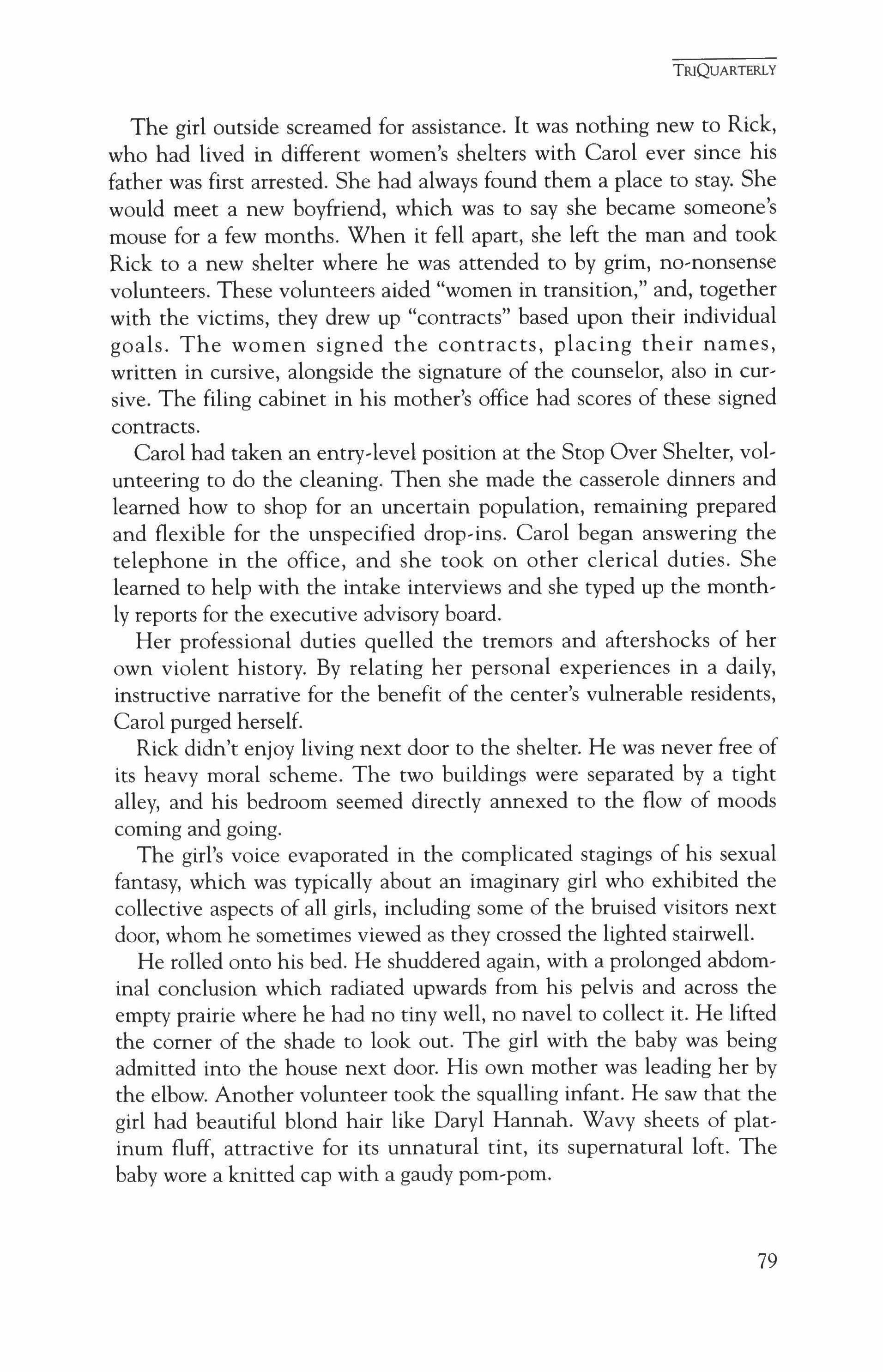
The girl outside screamed for assistance. It was nothing new to Rick, who had lived in different women's shelters with Carol ever since his father was first arrested. She had always found them a place to stay. She would meet a new boyfriend, which was to say she became someone's mouse for a few months. When it fell apart, she left the man and took Rick to a new shelter where he was attended to by grim, no-nonsense volunteers. These volunteers aided "women in transition," and, together with the victims, they drew up "contracts" based upon their individual goals. The women signed the contracts, placing their names, written in cursive, alongside the signature of the counselor, also in cursive. The filing cabinet in his mother's office had scores of these signed contracts.
Carol had taken an entry-level position at the Stop Over Shelter, volunteering to do the cleaning. Then she made the casserole dinners and learned how to shop for an uncertain population, remaining prepared and flexible for the unspecified drop-ins. Carol began answering the telephone in the office, and she took on other clerical duties. She learned to help with the intake interviews and she typed up the monthly reports for the executive advisory board.
Her professional duties quelled the tremors and aftershocks of her own violent history. By relating her personal experiences in a daily, instructive narrative for the benefit of the center's vulnerable residents, Carol purged herself.
Rick didn't enjoy living next door to the shelter. He was never free of its heavy moral scheme. The two buildings were separated by a tight alley, and his bedroom seemed directly annexed to the flow of moods coming and going.
The girl's voice evaporated in the complicated stagings of his sexual fantasy, which was typically about an imaginary girl who exhibited the collective aspects of all girls, including some of the bruised visitors next door, whom he sometimes viewed as they crossed the lighted stairwell.
He rolled onto his bed. He shuddered again, with a prolonged abdominal conclusion which radiated upwards from his pelvis and across the empty prairie where he had no tiny well, no navel to collect it. He lifted the comer of the shade to look out. The girl with the baby was being admitted into the house next door. His own mother was leading her by the elbow. Another volunteer took the squalling infant. He saw that the girl had beautiful blond hair like Daryl Hannah. Wavy sheets of platinum fluff, attractive for its unnatural tint, its supernatural loft. The baby wore a knitted cap with a gaudy porn-porn.
TRIQUARTERLY
79
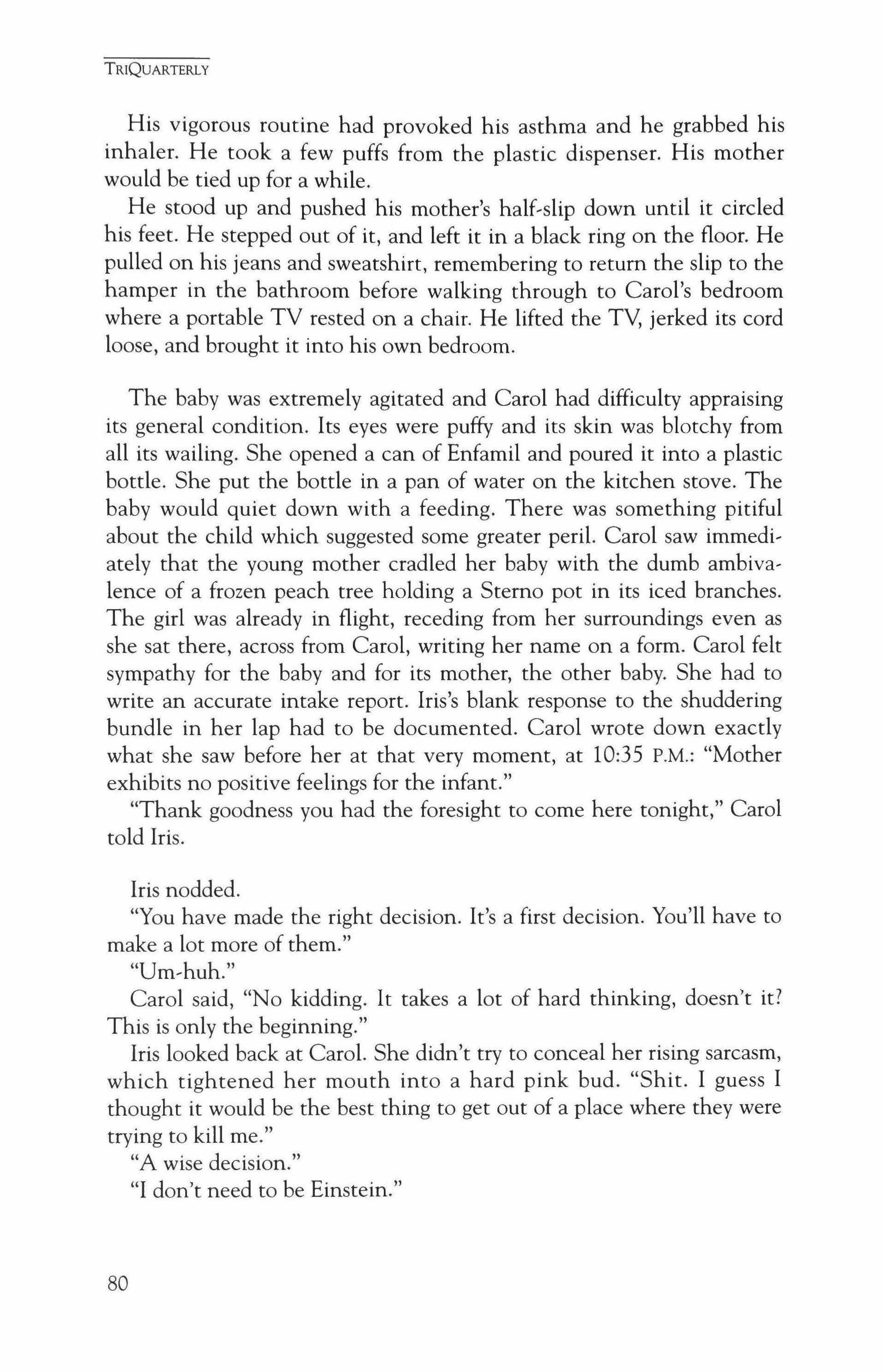
His vigorous routine had provoked his asthma and he grabbed his inhaler. He took a few puffs from the plastic dispenser. His mother would be tied up for a while.
He stood up and pushed his mother's half-slip down until it circled his feet. He stepped out of it, and left it in a black ring on the floor. He pulled on his jeans and sweatshirt, remembering to return the slip to the hamper in the bathroom before walking through to Carol's bedroom where a portable TV rested on a chair. He lifted the TV, jerked its cord loose, and brought it into his own bedroom.
The baby was extremely agitated and Carol had difficulty appraising its general condition. Its eyes were puffy and its skin was blotchy from all its wailing. She opened a can of Enfamil and poured it into a plastic bottle. She put the bottle in a pan of water on the kitchen stove. The baby would quiet down with a feeding. There was something pitiful about the child which suggested some greater peril. Carol saw immediately that the young mother cradled her baby with the dumb ambivalence of a frozen peach tree holding a Sterno pot in its iced branches. The girl was already in flight, receding from her surroundings even as she sat there, across from Carol, writing her name on a form. Carol felt sympathy for the baby and for its mother, the other baby. She had to write an accurate intake report. Iris's blank response to the shuddering bundle in her lap had to be documented. Carol wrote down exactly what she saw before her at that very moment, at 10:35 P.M.: "Mother exhibits no positive feelings for the infant."
"Thank goodness you had the foresight to come here tonight," Carol told Iris.
Iris nodded.
"You have made the right decision. It's a first decision. You'll have to make a lot more of them."
"Urn-huh."
Carol said, "No kidding. It takes a lot of hard thinking, doesn't it? This is only the beginning."
Iris looked back at Carol. She didn't try to conceal her rising sarcasm, which tightened her mouth into a hard pink bud. "Shit. I guess I thought it would be the best thing to get out of a place where they were trying to kill me."
"A wise decision."
"I don't need to be Einstein."
TRIQUARTERLY
80

Carol didn't smile. She showed respect for the seriousness of the attack. She had learned of many peculiar weapons used for their immediate availability. Table forks; nail scissors; snow shovels; wall phones; cast-iron doorstops; any small appliance that can be hurled across a room. Carol told the girl, "You have to be more than Einstein. You have to time-travel. The future isn't something that waits for you. You have to walk towards it or else it pushes you around."
Iris nodded at Carol as if she suddenly understood the small feat she had accomplished. She had fled from her persecutors.
Carol said, "You got up and walked out of that apartment before your baby got hurt."
Iris looked down at Terrell. Never once had she thought of his safety as a catalyst for her departure.
A staff nurse had corne back with a stainless-steel bowl of warm water to which she added a squirt of Betadine disinfectant. She pulled two gloves from a dispenser and their fine white powder drifted through the air. Wearing the gloves, she soaked a gauze sponge in the soapy water and dabbed it against Iris's face. Iris winced, but she didn't protest. The woman cleaned Iris's face, leaving the orange tint of the medicinal soap across her cheek. "I don't think stitches will help this." The nurse pinched the two-inch cuts together with her latex fingertips to see if they needed suturing. "These are probably going to scar, one way or the other. Do you think she needs to get these stitched?"
"You won't do it?" Carol asked the nurse.
"No."
"I understand," Carol said. Carol leaned closer to Iris's face to look at her cuts.
"Are you a doctor?" Iris said.
"Do you want a doctor?" Carol leaned back in her chair.
The nurse peeled off her soapy gloves.
"I guess she's too spooked to stitch me up. Well, I don't give a shit about stitches," Iris said.
Carol reached up to her head and collected clumps of her wavy hair, pulling it behind her ear. "See what I have here?"
Iris saw a raised scar at Carol's temple. The scar looked like pink piping edging Carol's hairline and upper cheek where her ear had been reattached, sewn a little off-center.
"He ripped it right off of me," Carol told her.
"He tore your ear off?"
"Just about did. I waited too long to get it fixed, that's why it looks
TRIQUARTERLY
81
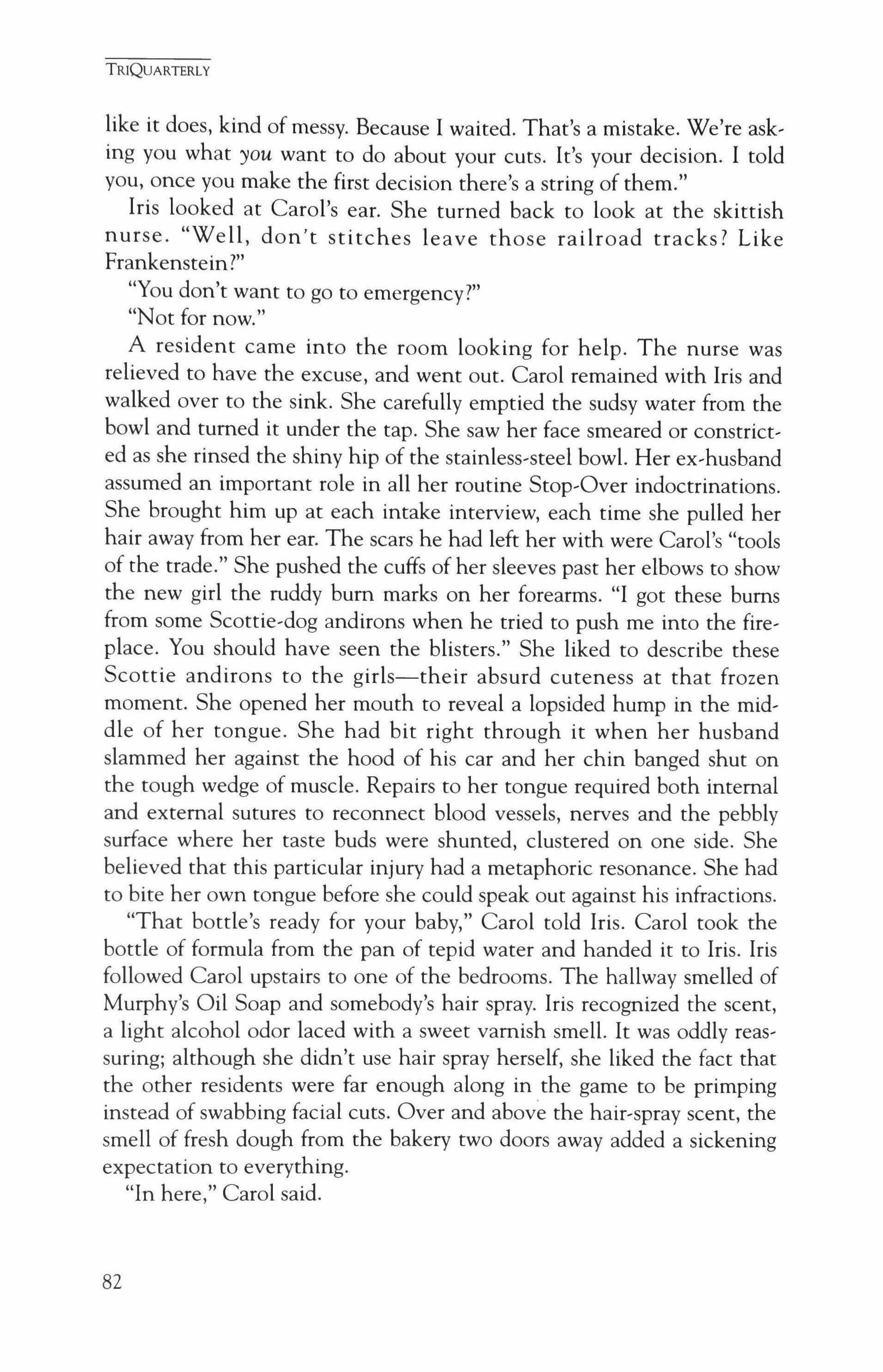
like it does, kind of messy. Because I waited. That's a mistake. We're asking you what you want to do about your cuts. It's your decision. I told you, once you make the first decision there's a string of them."
Iris looked at Carol's ear. She turned back to look at the skittish nurse. "Well, don't stitches leave those railroad tracks? Like Frankenstein?"
"You don't want to go to emergency?"
"Not for now."
A resident came into the room looking for help. The nurse was relieved to have the excuse, and went out. Carol remained with Iris and walked over to the sink. She carefully emptied the sudsy water from the bowl and turned it under the tap. She saw her face smeared or constricted as she rinsed the shiny hip of the stainless-steel bowl. Her ex-husband assumed an important role in all her routine Stop-Over indoctrinations. She brought him up at each intake interview, each time she pulled her hair away from her ear. The scars he had left her with were Carol's "tools of the trade." She pushed the cuffs of her sleeves past her elbows to show the new girl the ruddy bum marks on her forearms. "I got these bums from some Scottie-dog andirons when he tried to push me into the fireplace. You should have seen the blisters." She liked to describe these Scottie andirons to the girls-their absurd cuteness at that frozen moment. She opened her mouth to reveal a lopsided hump in the middle of her tongue. She had bit right through it when her husband slammed her against the hood of his car and her chin banged shut on the tough wedge of muscle. Repairs to her tongue required both internal and external sutures to reconnect blood vessels, nerves and the pebbly surface where her taste buds were shunted, clustered on one side. She believed that this particular injury had a metaphoric resonance. She had to bite her own tongue before she could speak out against his infractions.
"That bottle's ready for your baby," Carol told Iris. Carol took the bottle of formula from the pan of tepid water and handed it to Iris. Iris followed Carol upstairs to one of the bedrooms. The hallway smelled of Murphy's Oil Soap and somebody's hair spray. Iris recognized the scent, a light alcohol odor laced with a sweet varnish smell. It was oddly reassuring; although she didn't use hair spray herself, she liked the fact that the other residents were far enough along in the game to be primping instead of swabbing facial cuts. Over and above the hair-spray scent, the smell of fresh dough from the bakery two doors away added a sickening expectation to everything.
"In here," Carol said.
TRIQUARTERLY
82
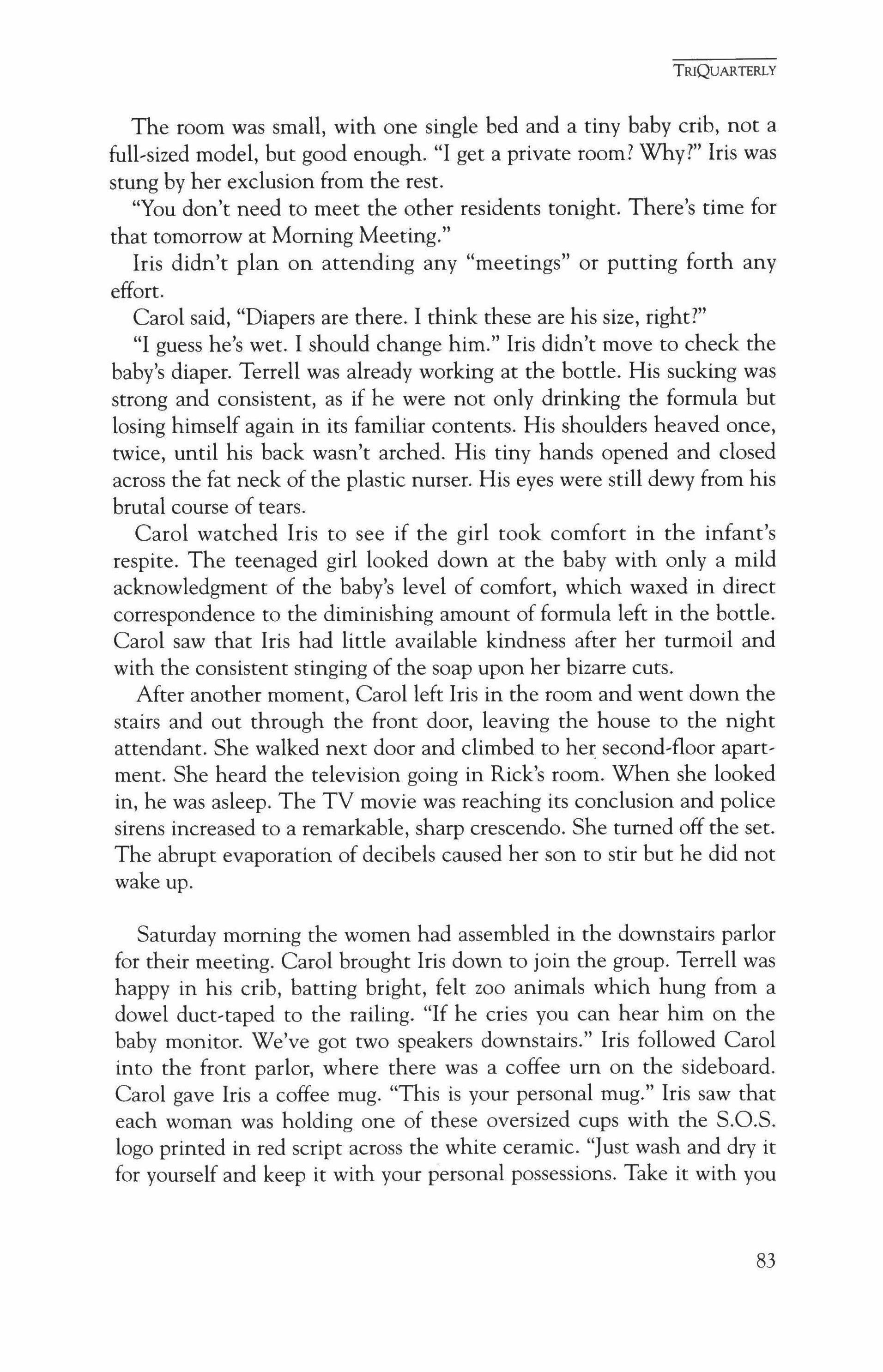
The room was small, with one single bed and a tiny baby crib, not a full-sized model, but good enough. "I get a private room? Why?" Iris was stung by her exclusion from the rest.
"You don't need to meet the other residents tonight. There's time for that tomorrow at Morning Meeting."
Iris didn't plan on attending any "meetings" or putting forth any effort.
Carol said, "Diapers are there. I think these are his size, right?"
"I guess he's wet. I should change him." Iris didn't move to check the baby's diaper. Terrell was already working at the bottle. His sucking was strong and consistent, as if he were not only drinking the formula but losing himself again in its familiar contents. His shoulders heaved once, twice, until his back wasn't arched. His tiny hands opened and closed across the fat neck of the plastic nurser. His eyes were still dewy from his brutal course of tears.
Carol watched Iris to see if the girl took comfort in the infant's respite. The teenaged girl looked down at the baby with only a mild acknowledgment of the baby's level of comfort, which waxed in direct correspondence to the diminishing amount of formula left in the bottle. Carol saw that Iris had little available kindness after her turmoil and with the consistent stinging of the soap upon her bizarre cuts.
After another moment, Carol left Iris in the room and went down the stairs and out through the front door, leaving the house to the night attendant. She walked next door and climbed to her second-floor apartment. She heard the television going in Rick's room. When she looked in, he was asleep. The TV movie was reaching its conclusion and police sirens increased to a remarkable, sharp crescendo. She turned off the set. The abrupt evaporation of decibels caused her son to stir but he did not wake up.
Saturday morning the women had assembled in the downstairs parlor for their meeting. Carol brought Iris down to join the group. Terrell was happy in his crib, batting bright, felt zoo animals which hung from a dowel duct-taped to the railing. "If he cries you can hear him on the baby monitor. We've got two speakers downstairs." Iris followed Carol into the front parlor, where there was a coffee urn on the sideboard. Carol gave Iris a coffee mug. "This is your personal mug." Iris saw that each woman was holding one of these oversized cups with the S.o.S. logo printed in red script across the white ceramic. "Just wash and dry it for yourself and keep it with your personal possessions. Take it with you
TRlQUARTERLY
83
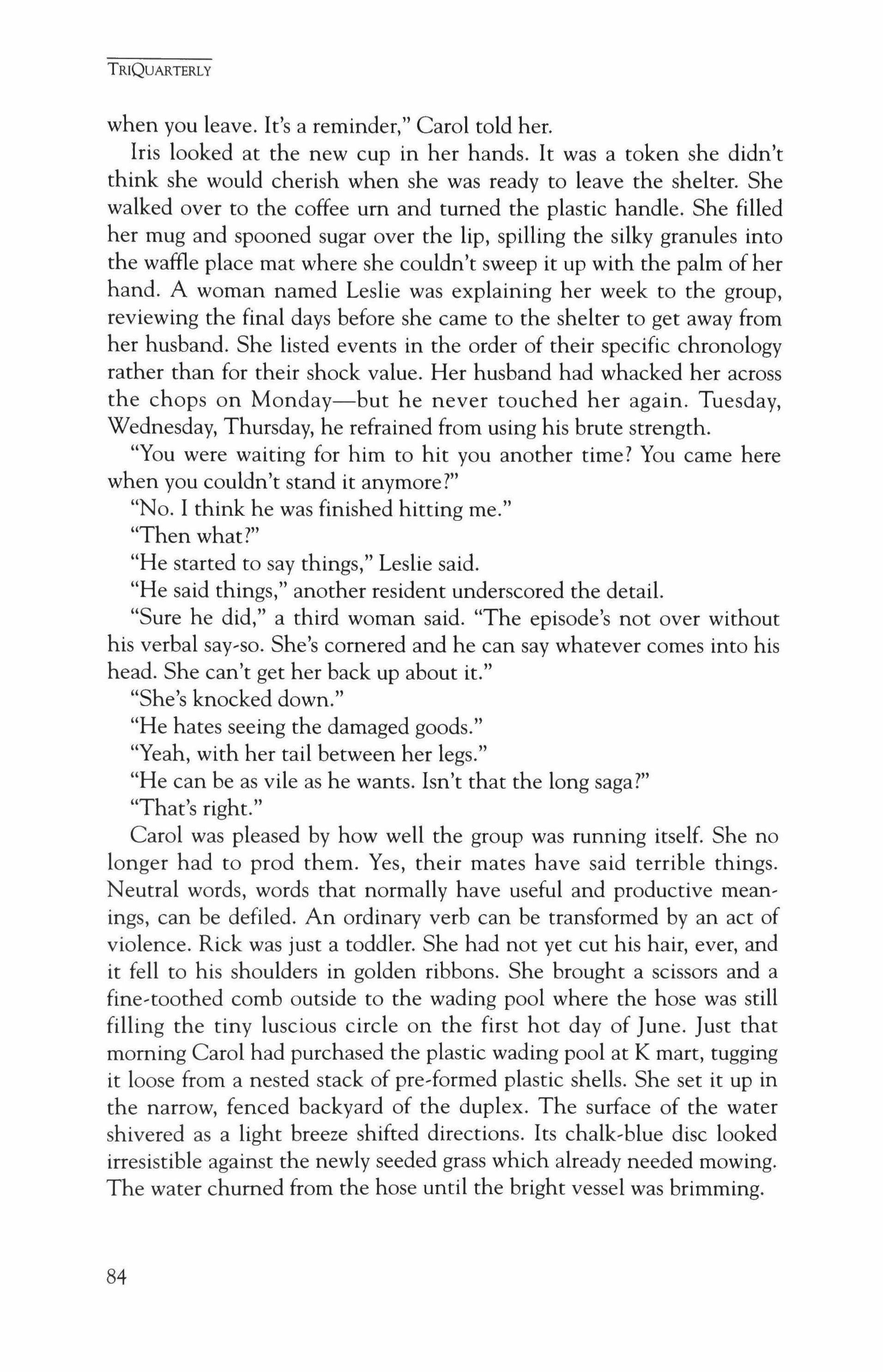
when you leave. It's a reminder," Carol told her.
Iris looked at the new cup in her hands. It was a token she didn't think she would cherish when she was ready to leave the shelter. She walked over to the coffee urn and turned the plastic handle. She filled her mug and spooned sugar over the lip, spilling the silky granules into the waffle place mat where she couldn't sweep it up with the palm of her hand. A woman named Leslie was explaining her week to the group, reviewing the final days before she came to the shelter to get away from her husband. She listed events in the order of their specific chronology rather than for their shock value. Her husband had whacked her across the chops on Monday-but he never touched her again. Tuesday, Wednesday, Thursday, he refrained from using his brute strength.
"You were waiting for him to hit you another time? You came here when you couldn't stand it anymore?"
"No. I think he was finished hitting me."
"Then what?"
"He started to say things," Leslie said.
"He said things," another resident underscored the detail.
"Sure he did," a third woman said. "The episode's not over without his verbal say-so. She's cornered and he can say whatever comes into his head. She can't get her back up about it."
"She's knocked down."
"He hates seeing the damaged goods."
"Yeah, with her tail between her legs."
"He can be as vile as he wants. Isn't that the long saga?"
"That's right."
Carol was pleased by how well the group was running itself. She no longer had to prod them. Yes, their mates have said terrible things. Neutral words, words that normally have useful and productive meanings, can be defiled. An ordinary verb can be transformed by an act of violence. Rick was just a toddler. She had not yet cut his hair, ever, and it fell to his shoulders in golden ribbons. She brought a scissors and a fine,toothed comb outside to the wading pool where the hose was still filling the tiny luscious circle on the first hot day of June. Just that morning Carol had purchased the plastic wading pool at K mart, tugging it loose from a nested stack of pre-formed plastic shells. She set it up in the narrow, fenced backyard of the duplex. The surface of the water shivered as a light breeze shifted directions. Its chalk,blue disc looked irresistible against the newly seeded grass which already needed mowing. The water churned from the hose until the bright vessel was brimming.
TRIQUARTERLY
84
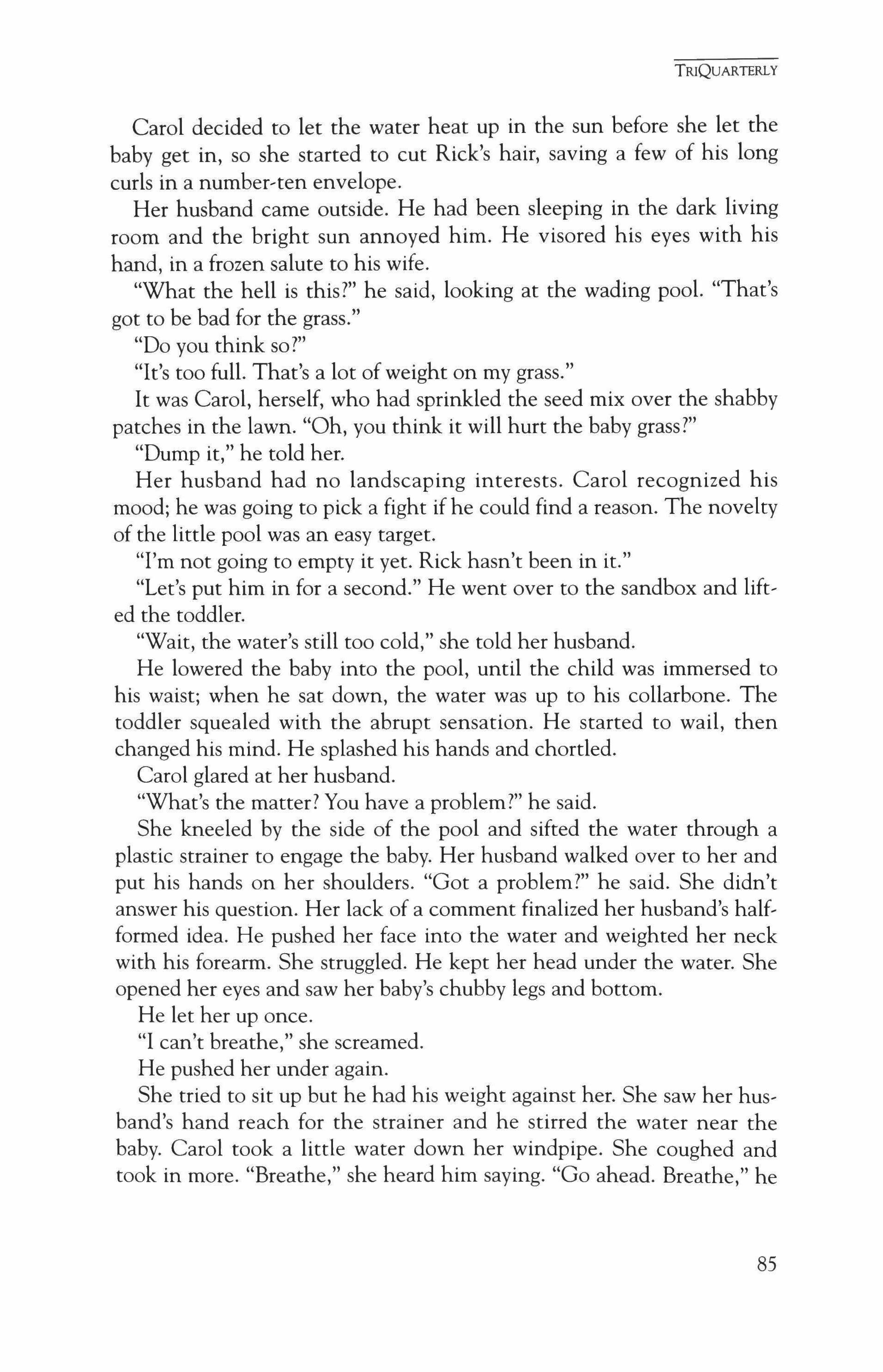
Carol decided to let the water heat up in the sun before she let the baby get in, so she started to cut Rick's hair, saving a few of his long curls in a number-ten envelope.
Her husband came outside. He had been sleeping in the dark living room and the bright sun annoyed him. He visored his eyes with his hand, in a frozen salute to his wife.
"What the hell is this?" he said, looking at the wading pool. "That's got to be bad for the grass."
"Do you think so?"
"It's too full. That's a lot of weight on my grass."
It was Carol, herself, who had sprinkled the seed mix over the shabby patches in the lawn. "Oh, you think it will hurt the baby grass?"
"Dump it," he told her.
Her husband had no landscaping interests. Carol recognized his mood; he was going to pick a fight ifhe could find a reason. The novelty of the little pool was an easy target.
"I'm not going to empty it yet. Rick hasn't been in it."
"Let's put him in for a second." He went over to the sandbox and lifted the toddler.
"Wait, the water's still too cold," she told her husband.
He lowered the baby into the pool, until the child was immersed to his waist; when he sat down, the water was up to his collarbone. The toddler squealed with the abrupt sensation. He started to wail, then changed his mind. He splashed his hands and chortled.
Carol glared at her husband.
"What's the matter? You have a problem?" he said.
She kneeled by the side of the pool and sifted the water through a plastic strainer to engage the baby. Her husband walked over to her and put his hands on her shoulders. "Got a problem?" he said. She didn't answer his question. Her lack of a comment finalized her husband's halfformed idea. He pushed her face into the water and weighted her neck with his forearm. She struggled. He kept her head under the water. She opened her eyes and saw her baby's chubby legs and bottom.
He let her up once.
"I can't breathe," she screamed.
He pushed her under again.
She tried to sit up but he had his weight against her. She saw her husband's hand reach for the strainer and he stirred the water near the baby. Carol took a little water down her windpipe. She coughed and took in more. "Breathe," she heard him saying. "Go ahead. Breathe," he
TRIQUARTERLY
85
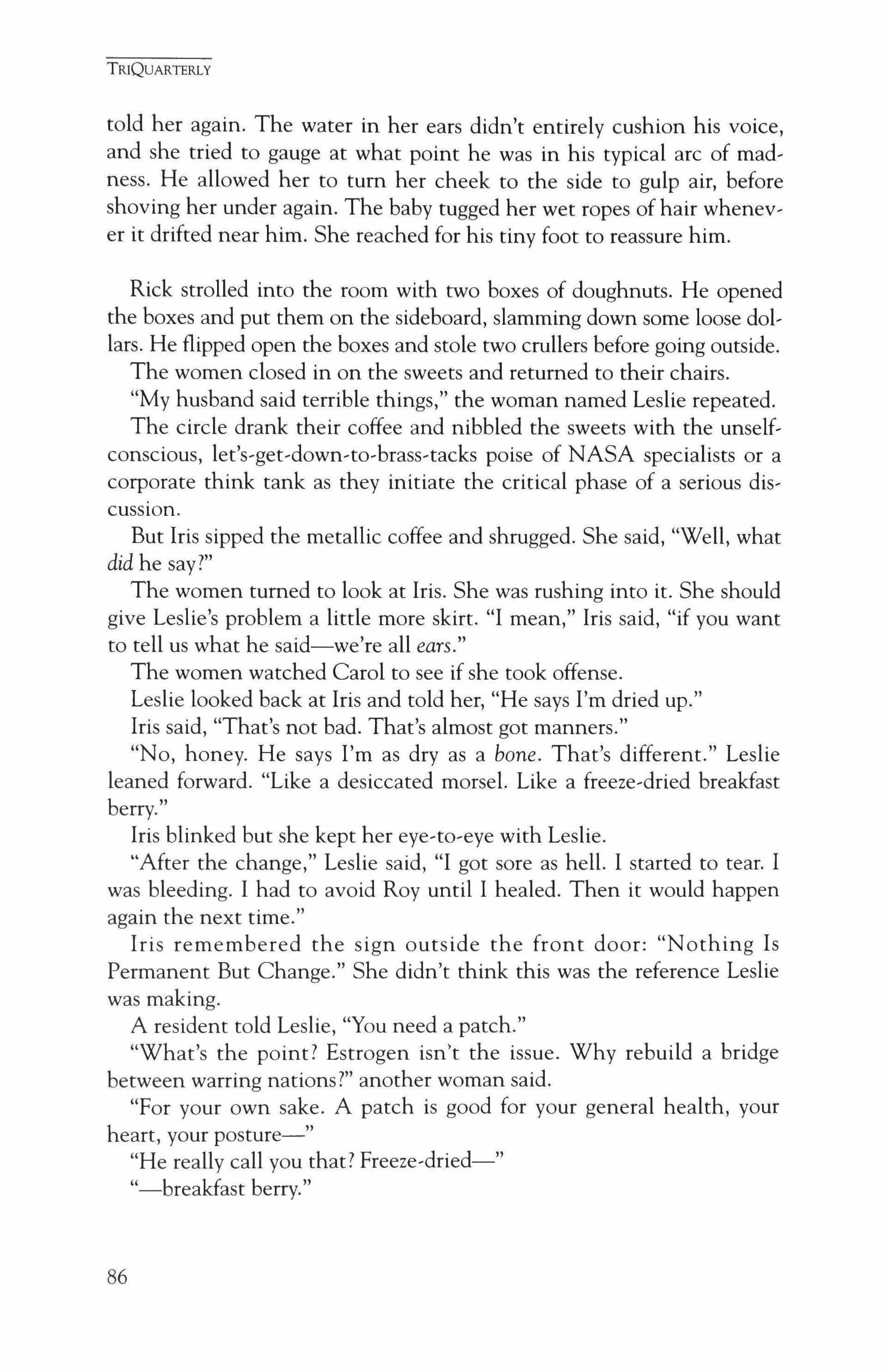
told her again. The water in her ears didn't entirely cushion his voice, and she tried to gauge at what point he was in his typical arc of madness. He allowed her to tum her cheek to the side to gulp air, before shoving her under again. The baby tugged her wet ropes of hair whenever it drifted near him. She reached for his tiny foot to reassure him.
Rick strolled into the room with two boxes of doughnuts. He opened the boxes and put them on the sideboard, slamming down some loose dollars. He flipped open the boxes and stole two crullers before going outside.
The women closed in on the sweets and returned to their chairs.
"My husband said terrible things," the woman named Leslie repeated.
The circle drank their coffee and nibbled the sweets with the unselfconscious, let's-get-down-to-brass-tacks poise of NASA specialists or a corporate think tank as they initiate the critical phase of a serious discussion.
But Iris sipped the metallic coffee and shrugged. She said, "Well, what did he say?"
The women turned to look at Iris. She was rushing into it. She should give Leslie's problem a little more skirt. "I mean," Iris said, "if you want to tell us what he said-we're all ears."
The women watched Carol to see if she took offense.
Leslie looked back at Iris and told her, "He says I'm dried up."
Iris said, "That's not bad. That's almost got manners."
"No, honey. He says I'm as dryas a bone. That's different." Leslie leaned forward. "Like a desiccated morsel. Like a freeze-dried breakfast berry."
Iris blinked but she kept her eye-to-eye with Leslie.
"After the change," Leslie said, "I got sore as hell. I started to tear. I was bleeding. I had to avoid Roy until I healed. Then it would happen again the next time."
Iris remembered the sign outside the front door: "Nothing Is Permanent But Change." She didn't think this was the reference Leslie was making.
A resident told Leslie, "You need a patch."
"What's the point? Estrogen isn't the issue. Why rebuild a bridge between warring nations?" another woman said.
"For your own sake. A patch is good for your general health, your heart, your posture-"
"He really call you that? Freeze-dried=-" "-breakfast berry."
TRIQUARTERLY
86
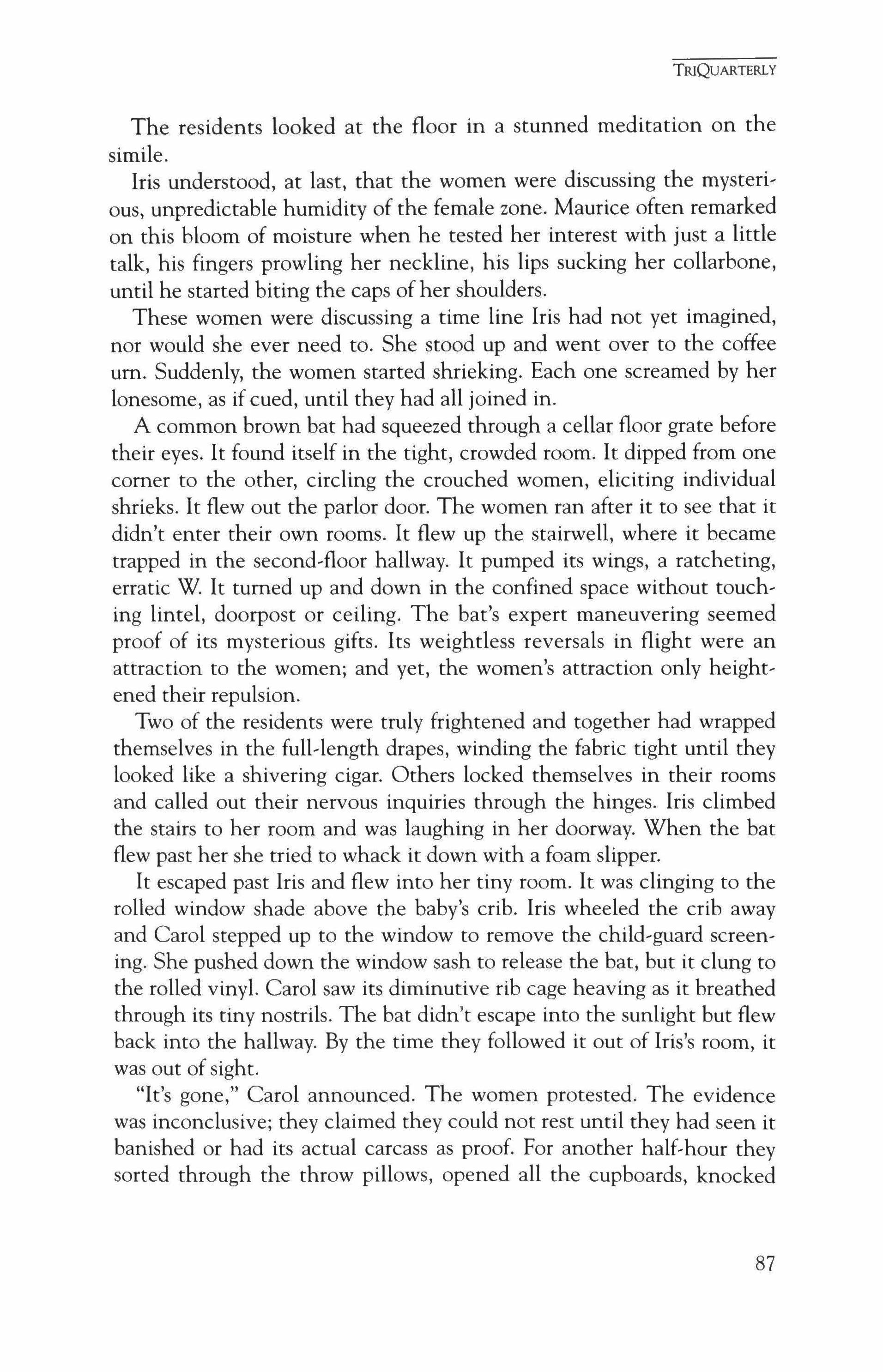
The residents looked at the floor in a stunned meditation on the simile.
Iris understood, at last, that the women were discussing the mysterious, unpredictable humidity of the female zone. Maurice often remarked on this bloom of moisture when he tested her interest with just a little talk, his fingers prowling her neckline, his lips sucking her collarbone, until he started biting the caps of her shoulders.
These women were discussing a time line Iris had not yet imagined, nor would she ever need to. She stood up and went over to the coffee urn. Suddenly, the women started shrieking. Each one screamed by her lonesome, as if cued, until they had all joined in.
A common brown bat had squeezed through a cellar floor grate before their eyes. It found itself in the tight, crowded room. It dipped from one comer to the other, circling the crouched women, eliciting individual shrieks. It flew out the parlor door. The women ran after it to see that it didn't enter their own rooms. It flew up the stairwell, where it became trapped in the second,floor hallway. It pumped its wings, a ratcheting, erratic w. It turned up and down in the confined space without touch, ing lintel, doorpost or ceiling. The bat's expert maneuvering seemed proof of its mysterious gifts. Its weightless reversals in flight were an attraction to the women; and yet, the women's attraction only height, ened their repulsion.
Two of the residents were truly frightened and together had wrapped themselves in the full,length drapes, winding the fabric tight until they looked like a shivering cigar. Others locked themselves in their rooms and called out their nervous inquiries through the hinges. Iris climbed the stairs to her room and was laughing in her doorway. When the bat flew past her she tried to whack it down with a foam slipper.
It escaped past Iris and flew into her tiny room. It was clinging to the rolled window shade above the baby's crib. Iris wheeled the crib away and Carol stepped up to the window to remove the child-guard screen' ing. She pushed down the window sash to release the bat, but it clung to the rolled vinyl. Carol saw its diminutive rib cage heaving as it breathed through its tiny nostrils. The bat didn't escape into the sunlight but flew back into the hallway. By the time they followed it out of Iris's room, it was out of sight.
"It's gone," Carol announced. The women protested. The evidence was inconclusive; they claimed they could not rest until they had seen it banished or had its actual carcass as proof. For another half-hour they sorted through the throw pillows, opened all the cupboards, knocked
TRIQUARTERLY
87
TRIQUARTERLY
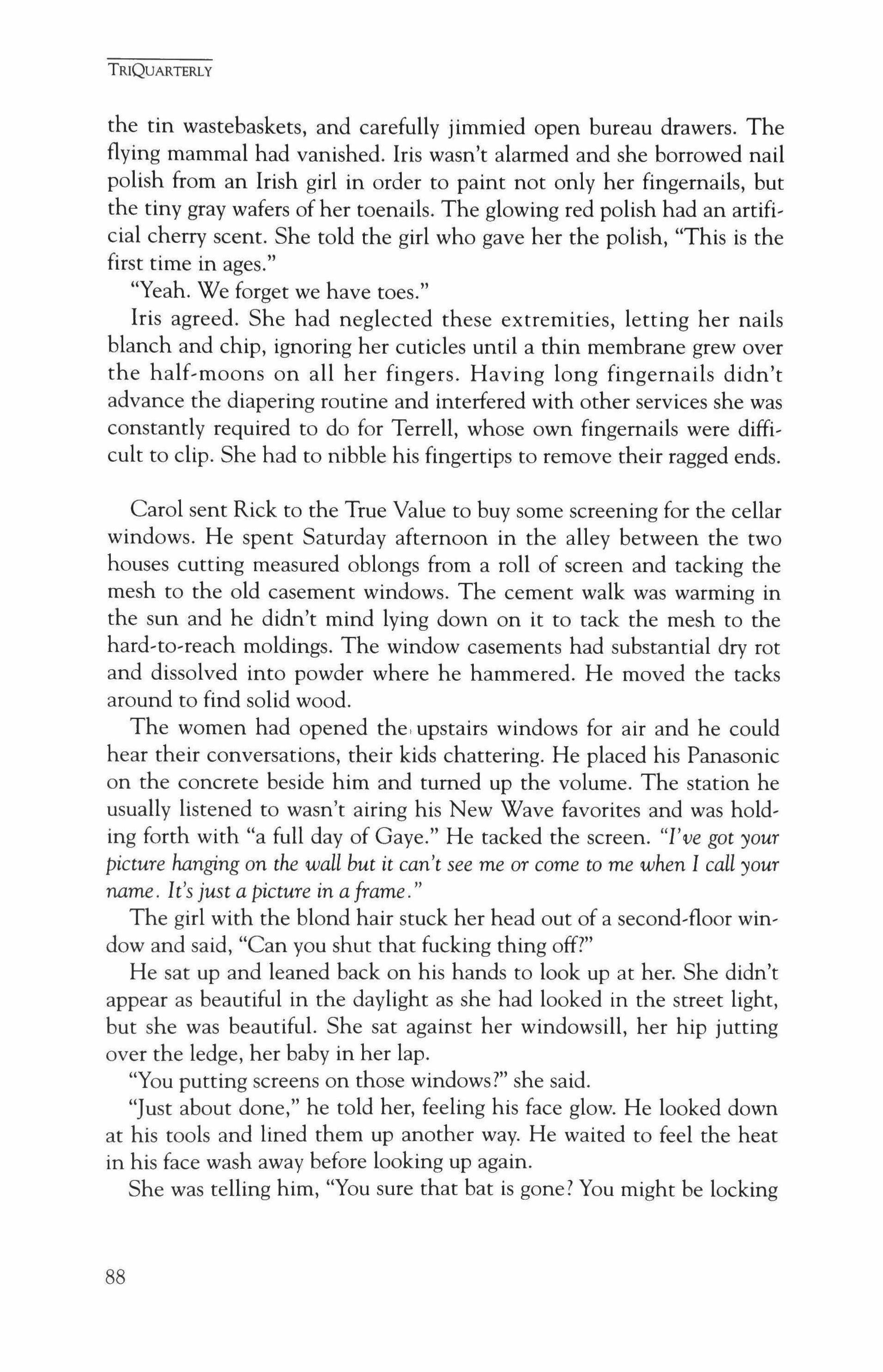
the tin wastebaskets, and carefully jimmied open bureau drawers. The flying mammal had vanished. Iris wasn't alarmed and she borrowed nail polish from an Irish girl in order to paint not only her fingernails, but the tiny gray wafers of her toenails. The glowing red polish had an artificial cherry scent. She told the girl who gave her the polish, "This is the first time in ages."
"Yeah. We forget we have toes."
Iris agreed. She had neglected these extremities, letting her nails blanch and chip, ignoring her cuticles until a thin membrane grew over the half-moons on all her fingers. Having long fingernails didn't advance the diapering routine and interfered with other services she was constantly required to do for Terrell, whose own fingernails were difficult to clip. She had to nibble his fingertips to remove their ragged ends.
Carol sent Rick to the True Value to buy some screening for the cellar windows. He spent Saturday afternoon in the alley between the two houses cutting measured oblongs from a roll of screen and tacking the mesh to the old casement windows. The cement walk was warming in the sun and he didn't mind lying down on it to tack the mesh to the hard-to-reach moldings. The window casements had substantial dry rot and dissolved into powder where he hammered. He moved the tacks around to find solid wood.
The women had opened the upstairs windows for air and he could hear their conversations, their kids chattering. He placed his Panasonic on the concrete beside him and turned up the volume. The station he usually listened to wasn't airing his New Wave favorites and was holding forth with "a full day of Gaye." He tacked the screen. "I've got your picture hanging on the wall but it can't see me or come to me when I call your name. It's just a picture in a frame.
The girl with the blond hair stuck her head out of a second-floor window and said, "Can you shut that fucking thing off?"
He sat up and leaned back on his hands to look up at her. She didn't appear as beautiful in the daylight as she had looked in the street light, but she was beautiful. She sat against her windowsill, her hip jutting over the ledge, her baby in her lap.
"You putting screens on those windows?" she said.
"Just about done," he told her, feeling his face glow. He looked down at his tools and lined them up another way. He waited to feel the heat in his face wash away before looking up again.
She was telling him, "You sure that bat is gone? You might be locking
88
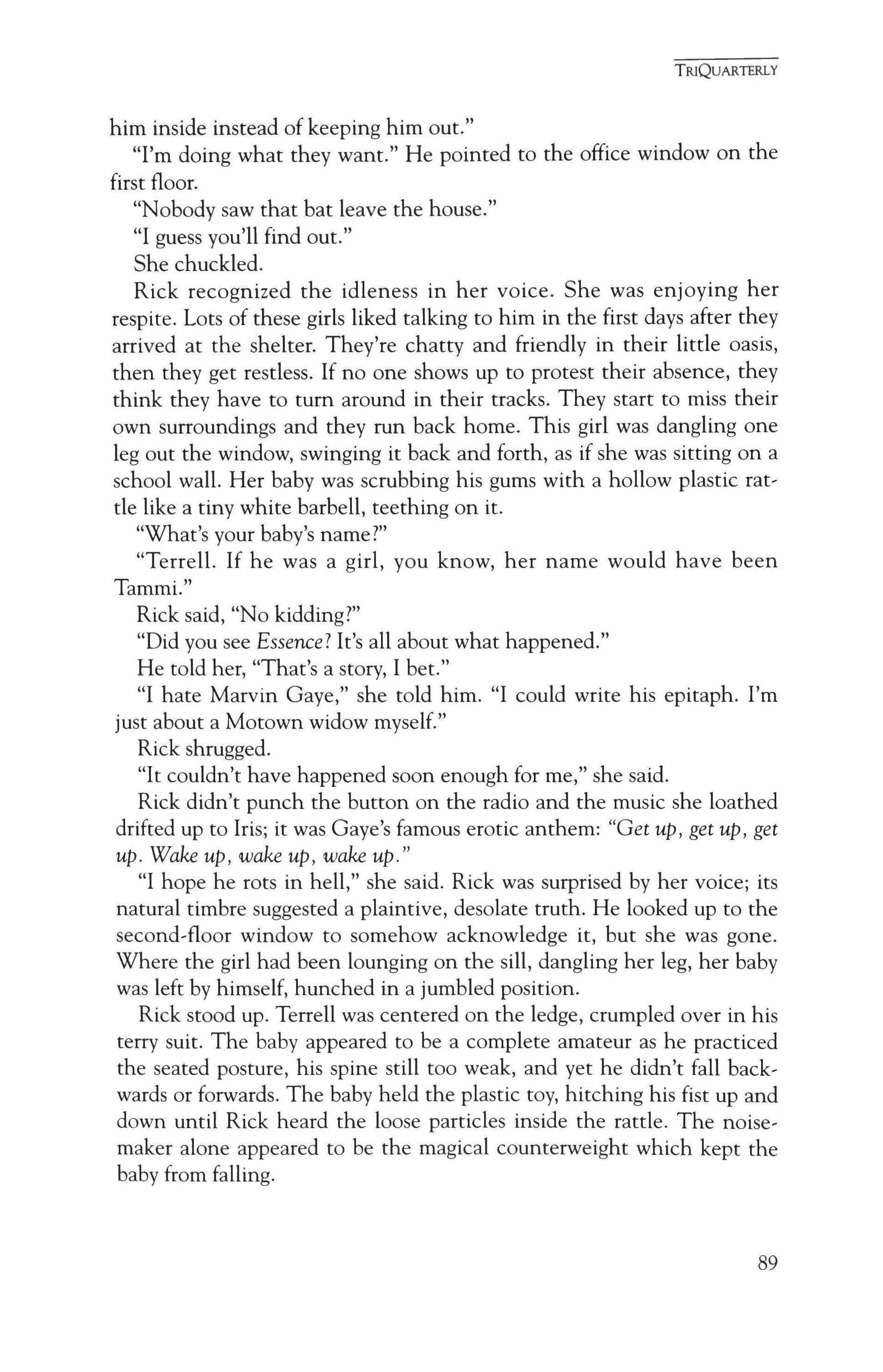
him inside instead of keeping him out."
"I'm doing what they want." He pointed to the office window on the first floor.
"Nobody saw that bat leave the house."
"I guess you'll find out."
She chuckled.
Rick recognized the idleness in her voice. She was enjoying her respite. Lots of these girls liked talking to him in the first days after they arrived at the shelter. They're chatty and friendly in their little oasis, then they get restless. If no one shows up to protest their absence, they think they have to tum around in their tracks. They start to miss their own surroundings and they run back home. This girl was dangling one leg out the window, swinging it back and forth, as if she was sitting on a school wall. Her baby was scrubbing his gums with a hollow plastic rattle like a tiny white barbell, teething on it.
"What's your baby's name?"
"Terrell. If he was a girl, you know, her name would have been Tammi."
Rick said, "No kidding?"
"Did you see Essence? It's all about what happened."
He told her, "That's a story, I bet."
"I hate Marvin Gaye," she told him. "I could write his epitaph. I'm just about a Motown widow myself."
Rick shrugged.
"It couldn't have happened soon enough for me," she said. Rick didn't punch the button on the radio and the music she loathed drifted up to Iris; it was Gaye's famous erotic anthem: "Get up, get up, get up. Wake up, wake up, wake up."
"I hope he rots in hell," she said. Rick was surprised by her voice; its natural timbre suggested a plaintive, desolate truth. He looked up to the second-floor window to somehow acknowledge it, but she was gone. Where the girl had been lounging on the sill, dangling her leg, her baby was left by himself, hunched in a jumbled position.
Rick stood up. Terrell was centered on the ledge, crumpled over in his terry suit. The baby appeared to be a complete amateur as he practiced the seated posture, his spine still too weak, and yet he didn't fall backwards or forwards. The baby held the plastic toy, hitching his fist up and down until Rick heard the loose particles inside the rattle. The noisemaker alone appeared to be the magical counterweight which kept the baby from falling.
TRIQUARTERLY
89
TRIQUARTERLY
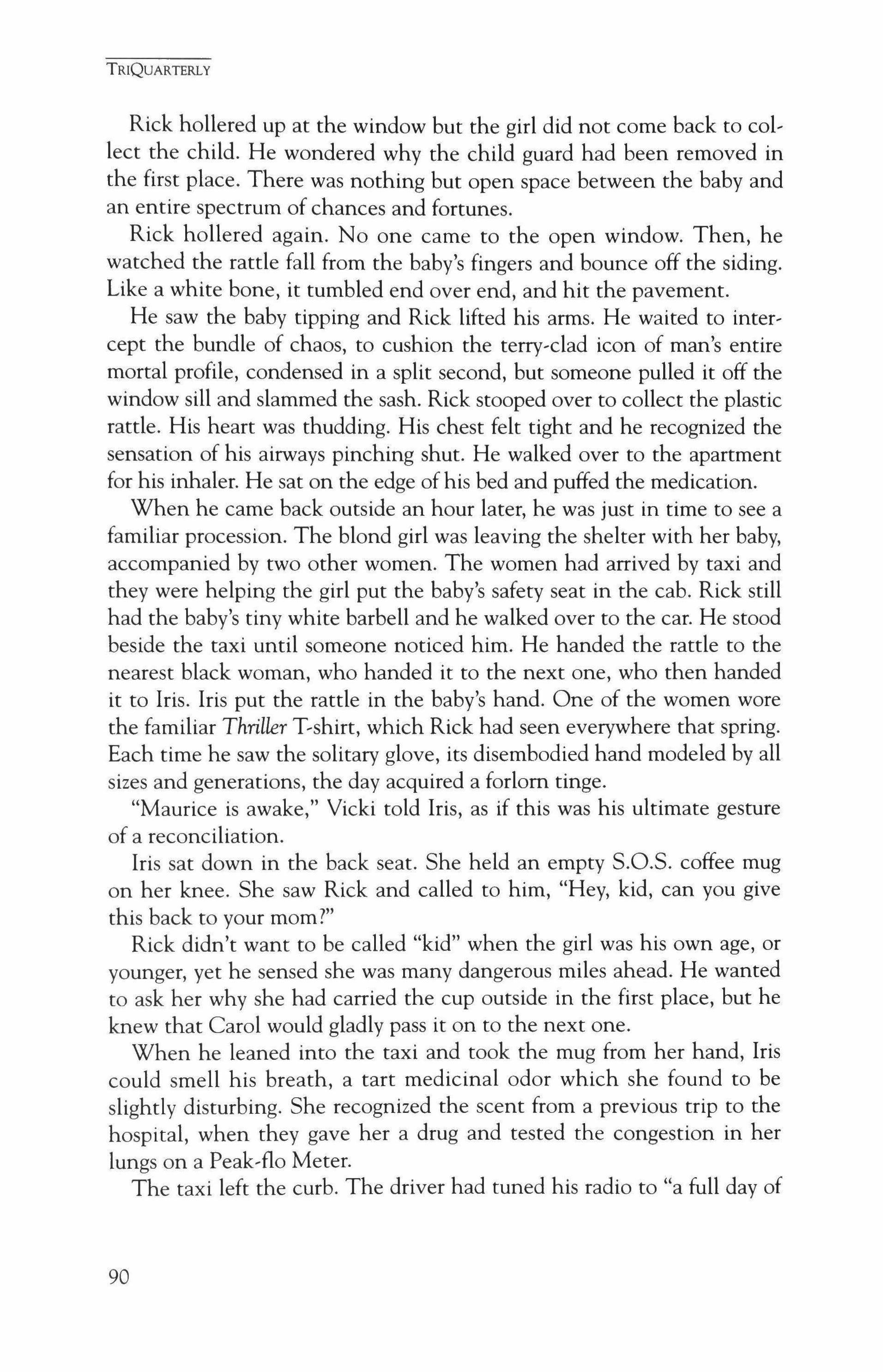
Rick hollered up at the window but the girl did not come back to collect the child. He wondered why the child guard had been removed in the first place. There was nothing but open space between the baby and an entire spectrum of chances and fortunes.
Rick hollered again. No one came to the open window. Then, he watched the rattle fall from the baby's fingers and bounce off the siding. Like a white bone, it tumbled end over end, and hit the pavement.
He saw the baby tipping and Rick lifted his arms. He waited to intercept the bundle of chaos, to cushion the terry-clad icon of man's entire mortal profile, condensed in a split second, but someone pulled it off the window sill and slammed the sash. Rick stooped over to collect the plastic rattle. His heart was thudding. His chest felt tight and he recognized the sensation of his airways pinching shut. He walked over to the apartment for his inhaler. He sat on the edge of his bed and puffed the medication.
When he came back outside an hour later, he was just in time to see a familiar procession. The blond girl was leaving the shelter with her baby, accompanied by two other women. The women had arrived by taxi and they were helping the girl put the baby's safety seat in the cab. Rick still had the baby's tiny white barbell and he walked over to the car. He stood beside the taxi until someone noticed him. He handed the rattle to the nearest black woman, who handed it to the next one, who then handed it to Iris. Iris put the rattle in the baby's hand. One of the women wore the familiar Thriller T�shirt, which Rick had seen everywhere that spring. Each time he saw the solitary glove, its disembodied hand modeled by all sizes and generations, the day acquired a forlorn tinge.
"Maurice is awake," Vicki told Iris, as if this was his ultimate gesture of a reconciliation.
Iris sat down in the back seat. She held an empty S.O.S. coffee mug on her knee. She saw Rick and called to him, "Hey, kid, can you give this back to your mom?"
Rick didn't want to be called "kid" when the girl was his own age, or younger, yet he sensed she was many dangerous miles ahead. He wanted to ask her why she had carried the cup outside in the first place, but he knew that Carol would gladly pass it on to the next one.
When he leaned into the taxi and took the mug from her hand, Iris could smell his breath, a tart medicinal odor which she found to be slightly disturbing. She recognized the scent from a previous trip to the hospital, when they gave her a drug and tested the congestion in her lungs on a Peak-flo Meter.
The taxi left the curb. The driver had tuned his radio to "a full day of
90
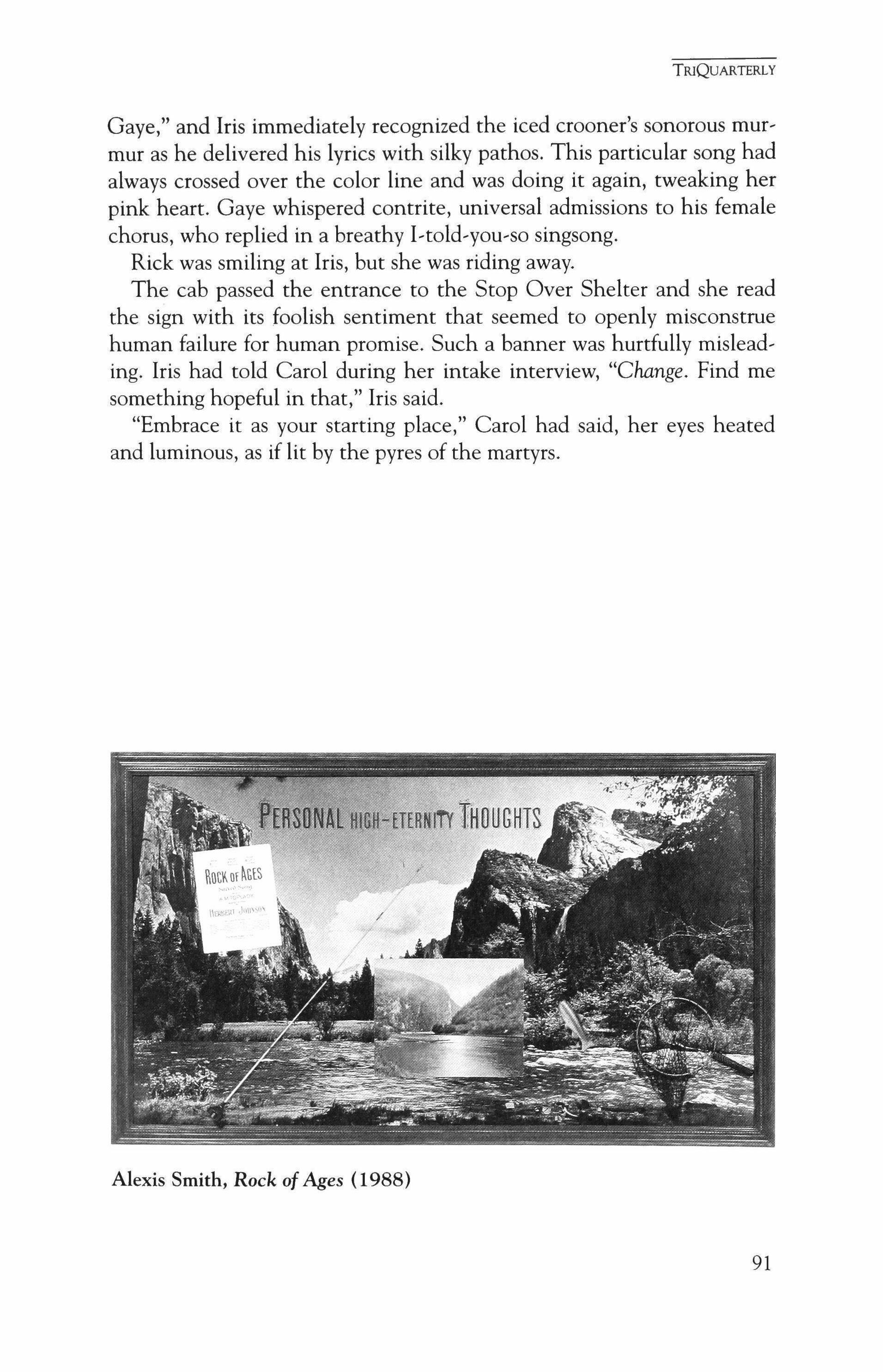
Gaye," and Iris immediately recognized the iced crooner's sonorous murmur as he delivered his lyrics with silky pathos. This particular song had always crossed over the color line and was doing it again, tweaking her pink heart. Gaye whispered contrite, universal admissions to his female chorus, who replied in a breathy l-told-vou-so singsong.
Rick was smiling at Iris, but she was riding away.
The cab passed the entrance to the Stop Over Shelter and she read the sign with its foolish sentiment that seemed to openly misconstrue human failure for human promise. Such a banner was hurtfully misleading. Iris had told Carol during her intake interview, "Change. Find me something hopeful in that," Iris said.
"Embrace it as your starting place," Carol had said, her eyes heated and luminous, as if lit by the pyres of the martyrs.
TRlQUARTERLY
91
Alexis Smith, Rock ofAges (1988)
Mistakes
Richard Burgin
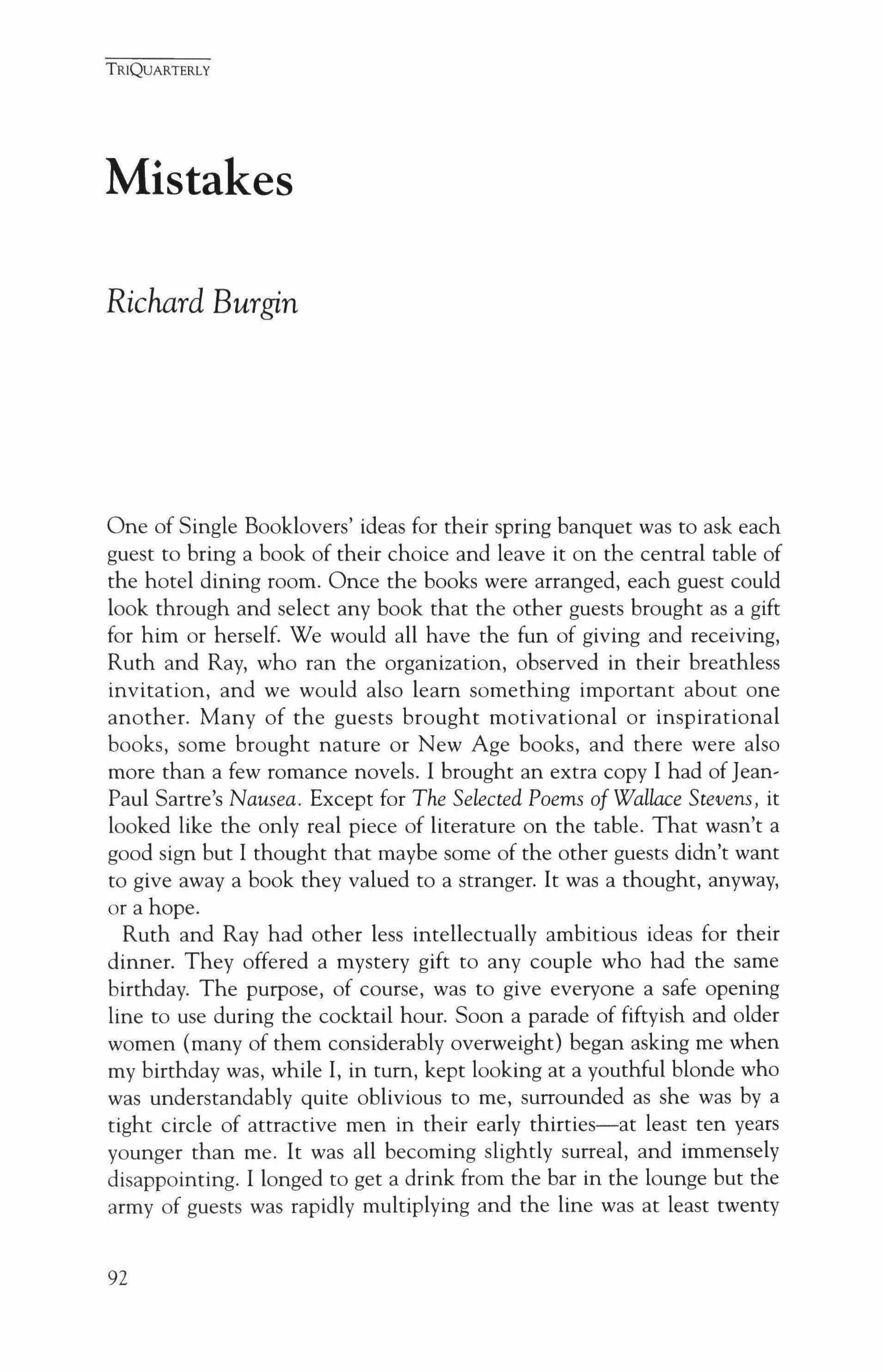
One of Single Booklovers' ideas for their spring banquet was to ask each guest to bring a book of their choice and leave it on the central table of the hotel dining room. Once the books were arranged, each guest could look through and select any book that the other guests brought as a gift for him or herself. We would all have the fun of giving and receiving, Ruth and Ray, who ran the organization, observed in their breathless invitation, and we would also learn something important about one another. Many of the guests brought motivational or inspirational books, some brought nature or New Age books, and there were also more than a few romance novels. I brought an extra copy I had of JeanPaul Sartre's Nausea. Except for The Selected Poems of Wallace Stevens, it looked like the only real piece of literature on the table. That wasn't a good sign but I thought that maybe some of the other guests didn't want to give away a book they valued to a stranger. It was a thought, anyway, or a hope.
Ruth and Ray had other less intellectually ambitious ideas for their dinner. They offered a mystery gift to any couple who had the same birthday. The purpose, of course, was to give everyone a safe opening line to use during the cocktail hour. Soon a parade of fiftyish and older women {many of them considerably overweight} began asking me when my birthday was, while I, in tum, kept looking at a youthful blonde who was understandably quite oblivious to me, surrounded as she was by a tight circle of attractive men in their early thirties-at least ten years younger than me. It was all becoming slightly surreal, and immensely disappointing. I longed to get a drink from the bar in the lounge but the army of guests was rapidly multiplying and the line was at least twenty
TRIQUARTERLY
92

deep. Suddenly it occurred to me that Independence Hall and a bevy of other historical landmarks were less than two blocks from the hotel. I'd lived in Philadelphia (in Center City, no less) for more than a decade, but I'd never visited any of those august places. If I left now there would still be enough light out to see one or two of them though it might still be drizzling out and I hadn't brought an umbrella. April really is turning out to be the cruelest month, I remember thinking.
Then I had another idea. When I first walked into the hotel I thought I'd seen a bar, a fairly quiet, unpopulated but definitely open bar. If the bar did exist, I could have a drink in peace and perhaps watch a ball game, assuming they had a TV there, which would make returning to my apartment a lot easier.
I must have been more possessed by this idea than I realized for I immediately started to extricate myselffrom the dense crowd of birthdaybabbling booklovers-but before I'd moved ten feet I bumped into a fairly tall man and made him spill some of his drink. I apologized profusely and insisted that he let me buy him another. He smiled and was good-natured about it. He was about my age, maybe an inch or two taller, with very even white teeth.
"Making your getaway?" he said.
"Can't deny it. I'd have to say this wasn't what I envisioned," I added.
"Oh, God no, it's a catastrophe, at least for me."
"Me, too. What a mistake."
"Well, it's inevitable," he said, or something like that. He told me his name was Evan, and I shook hands, being careful not to jeopardize the remainder of his drink that he was still holding. We talked for a few minutes and I discovered that he had brought the Wallace Stevens book. We laughed about that. Then I told him about the bar and invited him to have a drink with me there. I was going to make a joke about being glad I'd picked somebody up here but thought better of it.
The bar was more or less as I imagined it. There was even a basketball game on the TV on the wall. Perhaps because it was so gray outside the bar was even more dimly lit than I'd thought. It was hard to tell for sure but as we drank our gins Evan's eyes looked green like mine or at least had green in them. He was still talking about mistakes, apparently seizing it as his theme of the evening. It had begun with the mistake of coming to this affair in the vain hope of meeting an attractive woman, which brought to mind the mistake of joining this absurd dating club in the first place. He made some self-deprecating joke about his life being a mistake or a series of them and I said something about his good sense of humor
TRIQUARTERLY
93
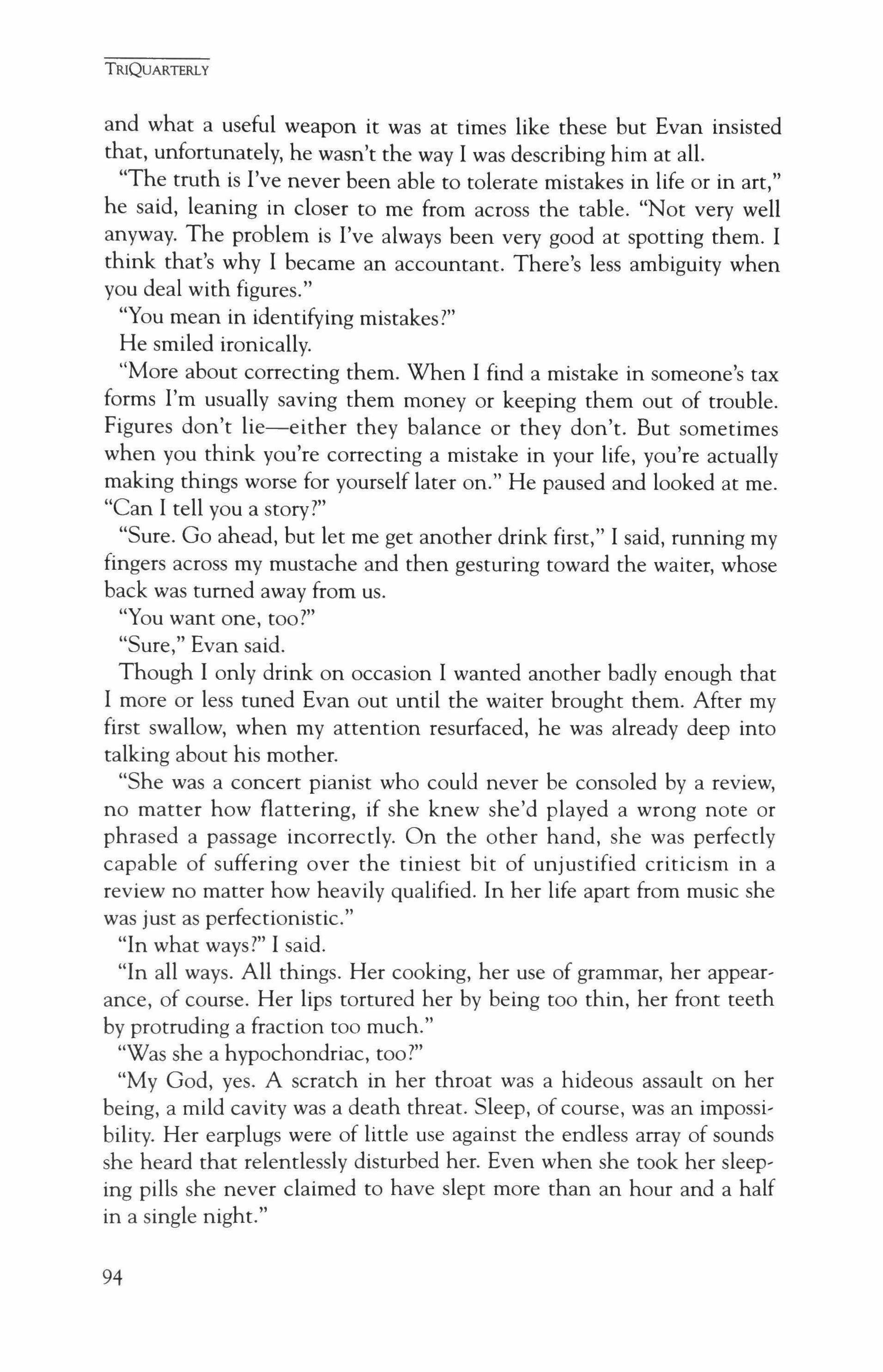
and what a useful weapon it was at times like these but Evan insisted that, unfortunately, he wasn't the way I was describing him at all.
"The truth is I've never been able to tolerate mistakes in life or in art," he said, leaning in closer to me from across the table. "Not very well anyway. The problem is I've always been very good at spotting them. I think that's why I became an accountant. There's less ambiguity when you deal with figures."
"You mean in identifying mistakes!"
He smiled ironically.
"More about correcting them. When I find a mistake in someone's tax forms I'm usually saving them money or keeping them out of trouble. Figures don't lie-either they balance or they don't. But sometimes when you think you're correcting a mistake in your life, you're actually making things worse for yourself later on." He paused and looked at me.
"Can I tell you a story!"
"Sure. Go ahead, but let me get another drink first," I said, running my fingers across my mustache and then gesturing toward the waiter, whose back was turned away from us.
"You want one, too!"
"Sure," Evan said.
Though I only drink on occasion I wanted another badly enough that I more or less tuned Evan out until the waiter brought them. After my first swallow, when my attention resurfaced, he was already deep into talking about his mother.
"She was a concert pianist who could never be consoled by a review, no matter how flattering, if she knew she'd played a wrong note or phrased a passage incorrectly. On the other hand, she was perfectly capable of suffering over the tiniest bit of unjustified criticism in a review no matter how heavily qualified. In her life apart from music she was just as perfectionistic."
"In what ways!" I said.
"In all ways. All things. Her cooking, her use of grammar, her appearance, of course. Her lips tortured her by being too thin, her front teeth by protruding a fraction too much."
"Was she a hypochondriac, too!"
"My God, yes. A scratch in her throat was a hideous assault on her being, a mild cavity was a death threat. Sleep, of course, was an impossibility. Her earplugs were of little use against the endless array of sounds she heard that relentlessly disturbed her. Even when she took her sleeping pills she never claimed to have slept more than an hour and a half in a single night."
TRIQUARTERLY
94
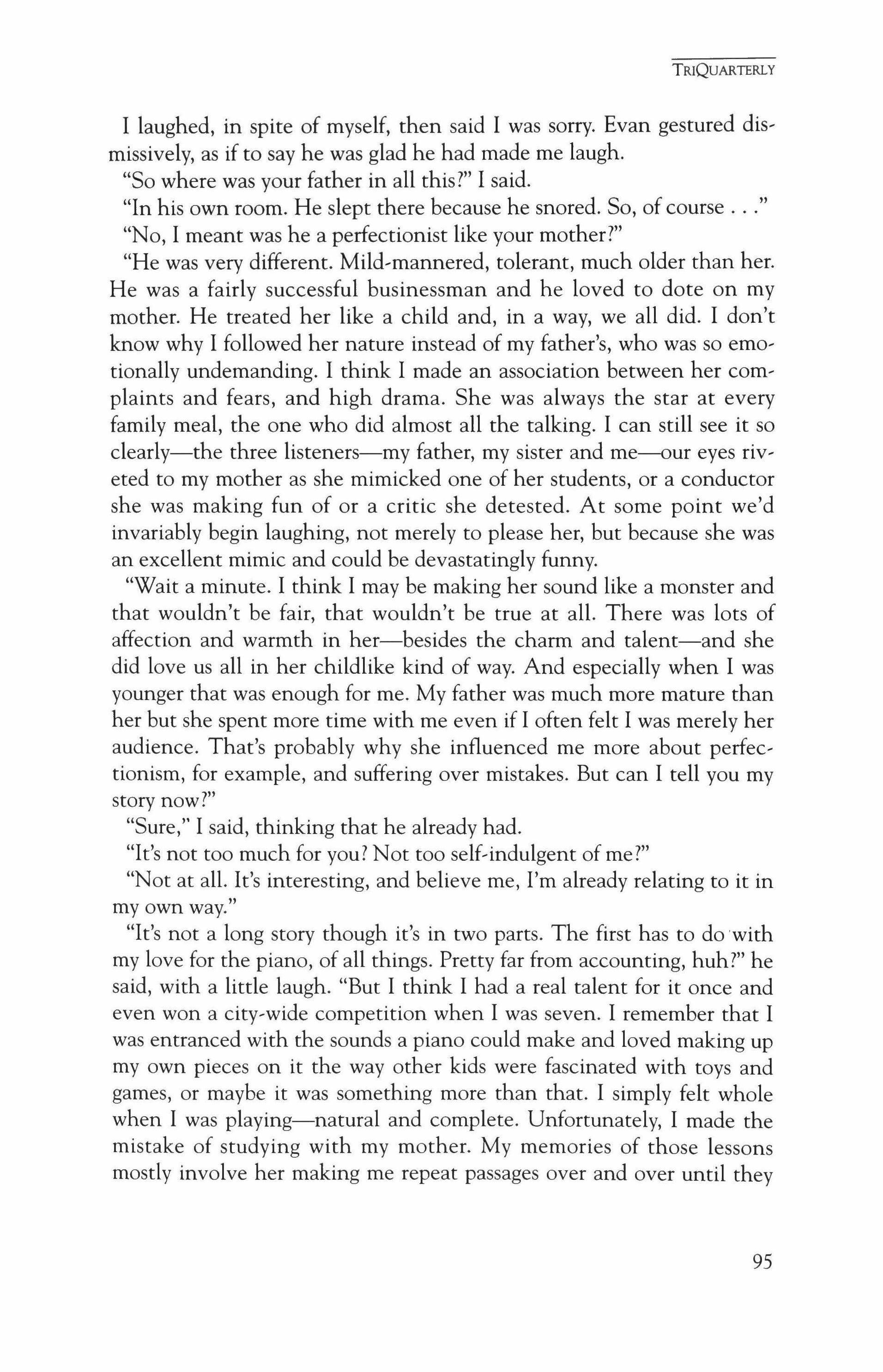
I laughed, in spite of myself, then said I was sorry. Evan gestured dismissively, as if to say he was glad he had made me laugh.
"So where was your father in all this?" I said.
"In his own room. He slept there because he snored. So, of course
"No, I meant was he a perfectionist like your mother?"
"He was very different. Mild-mannered, tolerant, much older than her. He was a fairly successful businessman and he loved to dote on my mother. He treated her like a child and, in a way, we all did. I don't know why I followed her nature instead of my father's, who was so ernotionally undemanding. I think I made an association between her complaints and fears, and high drama. She was always the star at every family meal, the one who did almost all the talking. I can still see it so clearly-the three listeners-my father, my sister and me-our eyes riveted to my mother as she mimicked one of her students, or a conductor she was making fun of or a critic she detested. At some point we'd invariably begin laughing, not merely to please her, but because she was an excellent mimic and could be devastatingly funny.
"Wait a minute. I think I may be making her sound like a monster and that wouldn't be fair, that wouldn't be true at all. There was lots of affection and warmth in her-besides the charm and talent-and she did love us all in her childlike kind of way. And especially when I was younger that was enough for me. My father was much more mature than her but she spent more time with me even if I often felt I was merely her audience. That's probably why she influenced me more about perfectionism, for example, and suffering over mistakes. But can I tell you my story now?"
"Sure," I said, thinking that he already had.
"It's not too much for you? Not too self-indulgent of me?"
"Not at all. It's interesting, and believe me, I'm already relating to it in my own way."
"It's not a long story though it's in two parts. The first has to do with my love for the piano, of all things. Pretty far from accounting, huh?" he said, with a little laugh. "But I think I had a real talent for it once and even won a city-wide competition when I was seven. I remember that I was entranced with the sounds a piano could make and loved making up my own pieces on it the way other kids were fascinated with toys and games, or maybe it was something more than that. I simply felt whole when I was playing-natural and complete. Unfortunately, I made the mistake of studying with my mother. My memories of those lessons mostly involve her making me repeat passages over and over until they
TRIQUARTERLY
95
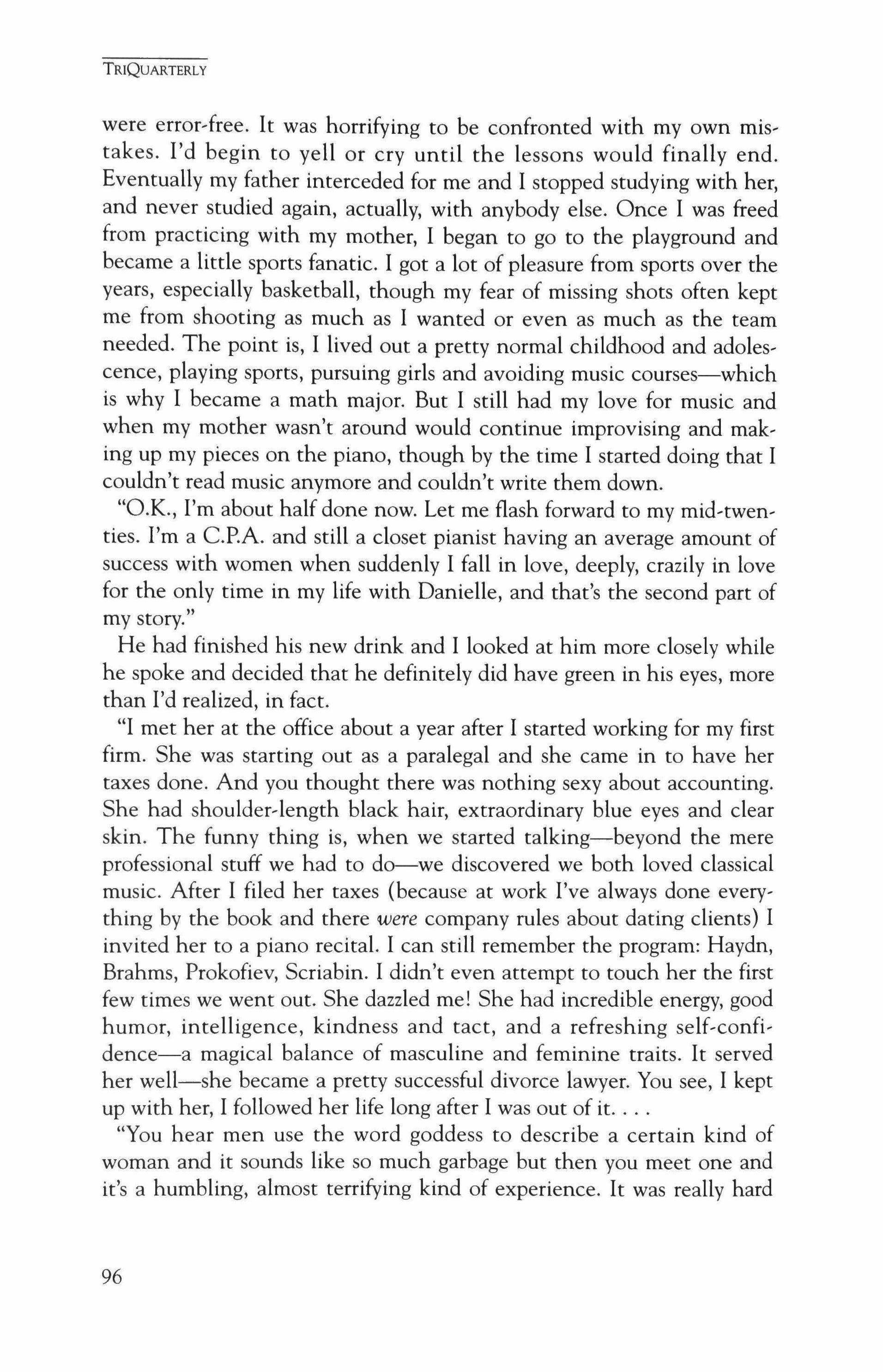
were error-free. It was horrifying to be confronted with my own mistakes. I'd begin to yell or cry until the lessons would finally end. Eventually my father interceded for me and I stopped studying with her, and never studied again, actually, with anybody else. Once I was freed from practicing with my mother, I began to go to the playground and became a little sports fanatic. I got a lot of pleasure from sports over the years, especially basketball, though my fear of missing shots often kept me from shooting as much as I wanted or even as much as the team needed. The point is, I lived out a pretty normal childhood and adolescence, playing sports, pursuing girls and avoiding music courses-which is why I became a math major. But I still had my love for music and when my mother wasn't around would continue improvising and making up my pieces on the piano, though by the time I started doing that I couldn't read music anymore and couldn't write them down.
"O.K., I'm about half done now. Let me flash forward to my mid-twenties. I'm a C.P.A. and still a closet pianist having an average amount of success with women when suddenly I fall in love, deeply, crazily in love for the only time in my life with Danielle, and that's the second part of my story."
He had finished his new drink and I looked at him more closely while he spoke and decided that he definitely did have green in his eyes, more than I'd realized, in fact.
"I met her at the office about a year after I started working for my first firm. She was starting out as a paralegal and she came in to have her taxes done. And you thought there was nothing sexy about accounting. She had shoulder-length black hair, extraordinary blue eyes and clear skin. The funny thing is, when we started talking-beyond the mere professional stuff we had to do-we discovered we both loved classical music. After I filed her taxes (because at work I've always done everything by the book and there were company rules about dating clients) I invited her to a piano recital. I can still remember the program: Haydn, Brahms, Prokofiev, Scriabin. I didn't even attempt to touch her the first few times we went out. She dazzled me! She had incredible energy, good humor, intelligence, kindness and tact, and a refreshing self-confidence-a magical balance of masculine and feminine traits. It served her well-she became a pretty successful divorce lawyer. You see, I kept up with her, I followed her life long after I was out of it
"You hear men use the word goddess to describe a certain kind of woman and it sounds like so much garbage but then you meet one and it's a humbling, almost terrifying kind of experience. It was really hard
TRIQUARTERLY
96
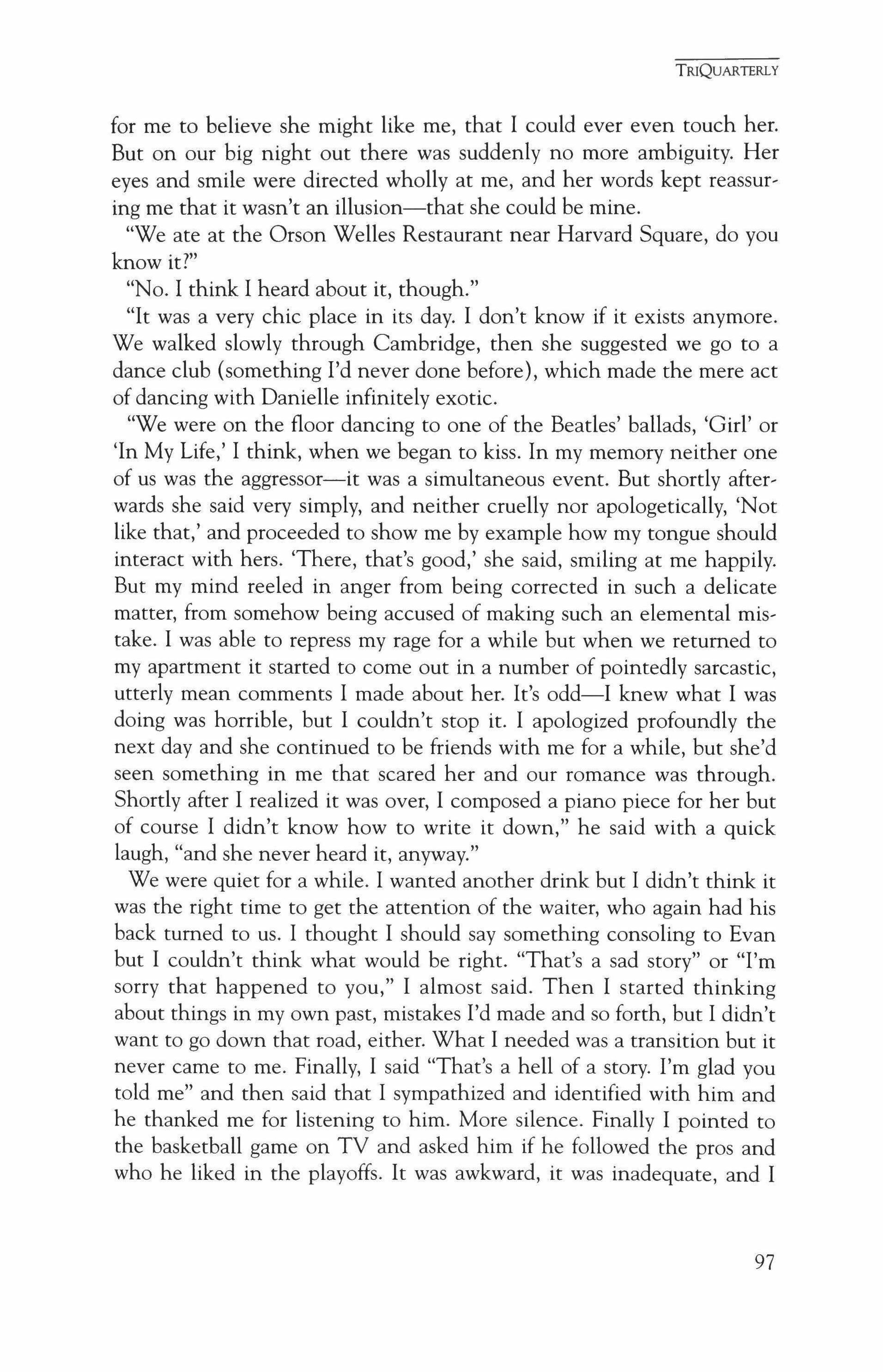
for me to believe she might like me, that I could ever even touch her. But on our big night out there was suddenly no more ambiguity. Her eyes and smile were directed wholly at me, and her words kept reassuring me that it wasn't an illusion-that she could be mine.
"We ate at the Orson Welles Restaurant near Harvard Square, do you know it?"
"No. I think I heard about it, though."
"It was a very chic place in its day. I don't know if it exists anymore. We walked slowly through Cambridge, then she suggested we go to a dance club (something I'd never done before), which made the mere act of dancing with Danielle infinitely exotic.
"We were on the floor dancing to one of the Beatles' ballads, 'Girl' or 'In My Life,' I think, when we began to kiss. In my memory neither one of us was the aggressor-it was a simultaneous event. But shortly afterwards she said very simply, and neither cruelly nor apologetically, 'Not like that,' and proceeded to show me by example how my tongue should interact with hers. 'There, that's good,' she said, smiling at me happily. But my mind reeled in anger from being corrected in such a delicate matter, from somehow being accused of making such an elemental mistake. I was able to repress my rage for a while but when we returned to my apartment it started to come out in a number of pointedly sarcastic, utterly mean comments I made about her. It's odd-I knew what I was doing was horrible, but I couldn't stop it. I apologized profoundly the next day and she continued to be friends with me for a while, but she'd seen something in me that scared her and our romance was through. Shortly after I realized it was over, I composed a piano piece for her but of course I didn't know how to write it down," he said with a quick laugh, "and she never heard it, anyway."
We were quiet for a while. I wanted another drink but I didn't think it was the right time to get the attention of the waiter, who again had his back turned to us. I thought I should say something consoling to Evan but I couldn't think what would be right. "That's a sad story" or "I'm sorry that happened to you," I almost said. Then I started thinking about things in my own past, mistakes I'd made and so forth, but I didn't want to go down that road, either. What I needed was a transition but it never came to me. Finally, I said "That's a hell of a story. I'm glad you told me" and then said that I sympathized and identified with him and he thanked me for listening to him. More silence. Finally I pointed to the basketball game on TV and asked him if he followed the pros and who he liked in the playoffs. It was awkward, it was inadequate, and I
TRIQUARTERLY
97

felt that in some way I was probably disappointing him but I couldn't come up with anything else.
Fortunately Evan watched the rest of the quarter with me, making a comment or two about the Sixers every minute or so. He seemed to believe in their future more than I did. I remember there was 4:51 left in the third quarter when we started watching-but of course that was in basketball time. With all the time-outs, fouls and commercials it was more like twenty,five minutes.
After the quarter ended we stretched and I yawned. Then I told Evan I'd enjoyed it, but that I was heading back to my apartment. He asked me where I lived and I told him a few blocks from the museum, just off the parkway. Evan's apartment was in Center City, near the Academy of Music. I asked him if he were going to try his luck again at the SBL din, ner, and he laughed and said he didn't think so, that he just planned to stay in the bar and watch the fourth quarter. I wished him luck, I wished the Sixers luck, I stood up and extended my hand and he stood up and shook it and then he suggested we exchange phone numbers in case we ever wanted to have another drink. I was somewhat surprised but I found a pen and scrap of paper (which I thought would be used under very different circumstances), tore it in half and exchanged the information. Then I shook his hand again, we both smiled and said goodbye and I walked out of the bar down the bright hall and out of the hoteL
When I got home my apartment was unusually cold and quiet, as if a blanket of snow had fallen while I was away. "April in Antarctica," I said under my breath as I paced around. I looked out the windows-but nothing much was going on in the street. Most of what I saw outside were the sides of other buildings. I walked into my studio and checked my answering machine. I'd responded to a number of personals in Philadelphia Magazine but no one had called back yet. Then I turned on the TV just to fill up my apartment with some noise. I heated up some leftover Chinese food and ate it while I watched TV and felt O.K. for a while until the nostalgic soundtrack for a watch commercial made me think about my ex-wife, which in tum reminded me of Donna. Then I got up from my La,Z,Boy and fixed myself a gin which I drank slowly until an hour later I was able to fall asleep.
That night I had an odd dream. I was walking through a park with Evan. It was a city park, but unusually large with a lake in it where men were rowing boats. I was talking animatedly to Evan but every time I tried to look at him he turned his face away. The last time I looked a black scarf was completely covering his face.
TRIQUARTERLY
98

The next three days were pretty routine. No more strange dreams, no more Antarctic apartment, nothing particularly humiliating at work. But I didn't like how much I was thinking about Donna, and the quiet in my apartment, which I often found comforting, was making me feel vaguely panicky. I called a couple of former girlfriends just to have someone to talk to for a few minutes, but nobody was home. Then, I opened my address book and a minute later surprised myself by calling Evan. I couldn't remember the last time I'd called a man just to talk and it was pretty awkward at first. Evan must have sensed what I was feeling because he quickly said he was glad I'd called, and that he wasn't doing anything either. It may even have been Evan who suggested we meet for a drink.
We agreed that we should meet somewhere midway between where we lived but that still left a lot of places to choose from. Perhaps because it doesn't have much of a nightlife, Philadelphia is one of those cities where eating and even drinking are taken very seriously and treated like an art form. The city is overloaded with places to eat and drink, and restaurants and bars are reviewed as if they were books or movies in newspapers and in the city's magazines. As a result, people become more finicky than they need to be, and we were no exception. We kept discussing places and then dismissing them for one reason or another until I finally said why don't we just meet at the hotel bar where we'd gone before and Evan laughed and said fine, it sounded good to him.
A half hour later we were at a table there, with the same dim lights and the brighter light from the hall glowing like a distant fire, with the same zombie waiter, but with no game and so no TV on this time. We sipped our drinks and found it a little difficult to talk at first. Then I said, "I have to say I'm surprised to be here with you."
"What do you mean?" he said.
"I'm surprised that I called you. Not that you're not interesting and perfectly charming, but that my whole life I've met interesting men from time to time in bars or in business situations, but I've never followed up and seen any of them a second time, socially. Maybe that was a mistake to let people pass out of my life that I shouldn't have just because they were men, people who might have become friends. You know, you told me about your mistakes last time, maybe that was one of mine."
"Actually, I was wondering what you thought of my little story. I remember you said that you identified," he said raising his eyebrows hopefully.
"I did, in a way, but I also think it's different with me. I mean to judge
TRIQUARTERLY
99
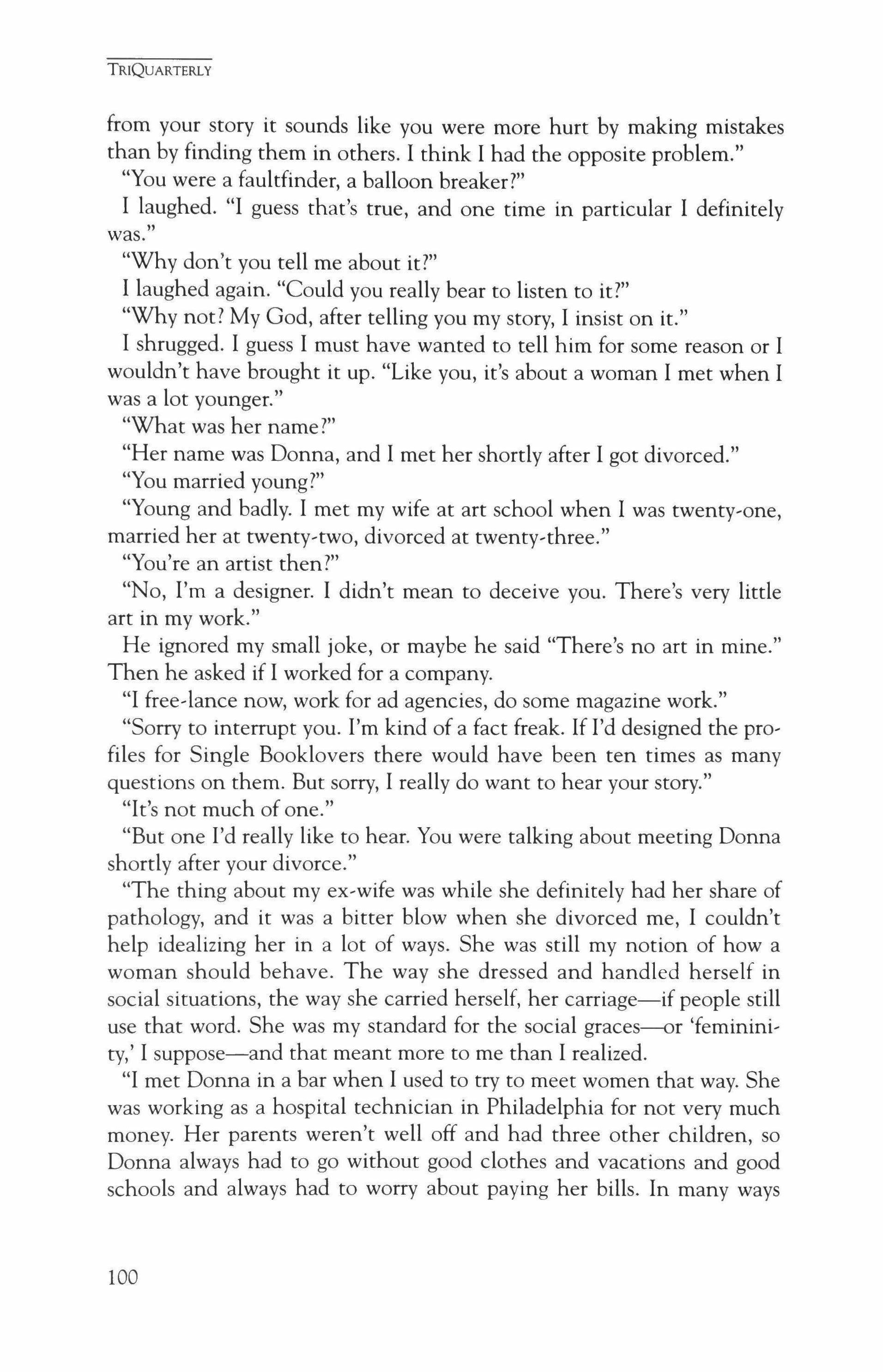
from your story it sounds like you were more hurt by making mistakes than by finding them in others. I think I had the opposite problem."
"You were a faultfinder, a balloon breaker?"
I laughed. "I guess that's true, and one time in particular I definitely was."
"Why don't you tell me about it?"
I laughed again. "Could you really bear to listen to it?"
"Why not? My God, after telling you my story, I insist on it."
I shrugged. I guess I must have wanted to tell him for some reason or I wouldn't have brought it up. "Like you, it's about a woman I met when I was a lot younger."
"What was her name?"
"Her name was Donna, and I met her shortly after I got divorced."
"You married young?"
"Young and badly. I met my wife at art school when I was twenty-one, married her at twenty-two, divorced at twenty-three."
"You're an artist then?"
"No, I'm a designer. I didn't mean to deceive you. There's very little art in my work."
He ignored my small joke, or maybe he said "There's no art in mine." Then he asked if I worked for a company.
"I free-lance now, work for ad agencies, do some magazine work."
"Sorry to interrupt you. I'm kind of a fact freak. If I'd designed the profiles for Single Booklovers there would have been ten times as many questions on them. But sorry, I really do want to hear your story."
"It's not much of one."
"But one I'd really like to hear. You were talking about meeting Donna shortly after your divorce."
"The thing about my ex-wife was while she definitely had her share of pathology, and it was a bitter blow when she divorced me, I couldn't help idealizing her in a lot of ways. She was still my notion of how a woman should behave. The way she dressed and handled herself in social situations, the way she carried herself, her carriage-if people still use that word. She was my standard for the social graces--or 'femininitv,' I suppose-and that meant more to me than I realized.
"I met Donna in a bar when I used to try to meet women that way. She was working as a hospital technician in Philadelphia for not very much money. Her parents weren't well off and had three other children, so Donna always had to go without good clothes and vacations and good schools and always had to worry about paying her bills. In many ways
TRIQUARTERLY
100
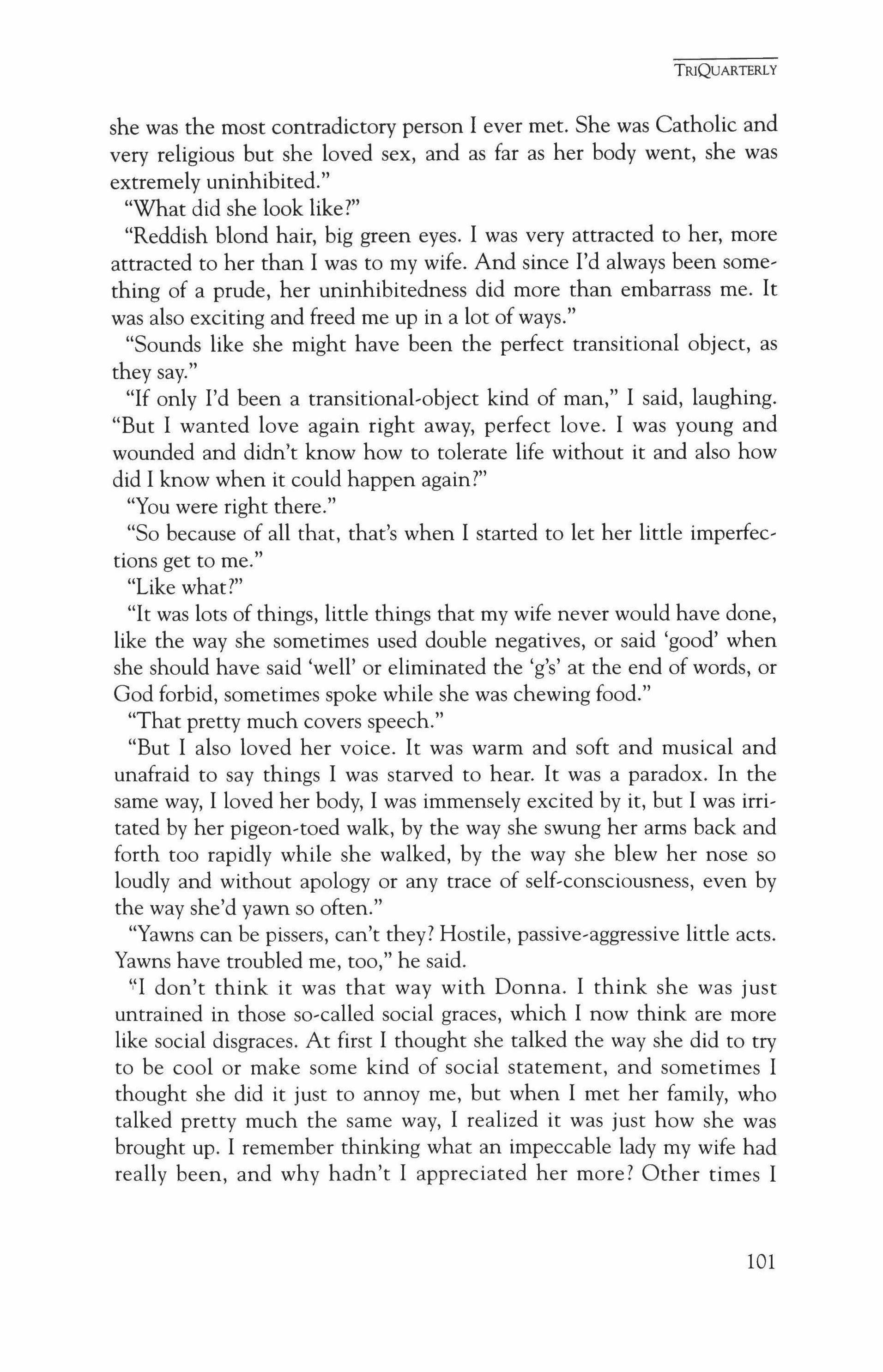
she was the most contradictory person I ever met. She was Catholic and very religious but she loved sex, and as far as her body went, she was extremely uninhibited."
"What did she look like?"
"Reddish blond hair, big green eyes. I was very attracted to her, more attracted to her than I was to my wife. And since I'd always been something of a prude, her uninhibitedness did more than embarrass me. It was also exciting and freed me up in a lot of ways."
"Sounds like she might have been the perfect transitional object, as they say."
"If only I'd been a transitional-object kind of man," I said, laughing. "But I wanted love again right away, perfect love. I was young and wounded and didn't know how to tolerate life without it and also how did I know when it could happen again?"
"You were right there."
"So because of all that, that's when I started to let her little imperfections get to me."
"Like what?"
"It was lots of things, little things that my wife never would have done, like the way she sometimes used double negatives, or said 'good' when she should have said 'well' or eliminated the 'g's' at the end of words, or God forbid, sometimes spoke while she was chewing food."
"That pretty much covers speech."
"But I also loved her voice. It was warm and soft and musical and unafraid to say things I was starved to hear. It was a paradox. In the same way, I loved her body, I was immensely excited by it, but I was irritated by her pigeon-toed walk, by the way she swung her arms back and forth too rapidly while she walked, by the way she blew her nose so loudly and without apology or any trace of self-consciousness, even by the way she'd yawn so often."
"Yawns can be pissers, can't they? Hostile, passive-aggressive little acts. Yawns have troubled me, too," he said.
','I don't think it was that way with Donna. I think she was just untrained in those so-called social graces, which I now think are more like social disgraces. At first I thought she talked the way she did to try to be cool or make some kind of social statement, and sometimes I thought she did it just to annoy me, but when I met her family, who talked pretty much the same way, I realized it was just how she was brought up. I remember thinking what an impeccable lady my wife had really been, and why hadn't I appreciated her more? Other times I 101
TRIQUARTERLY
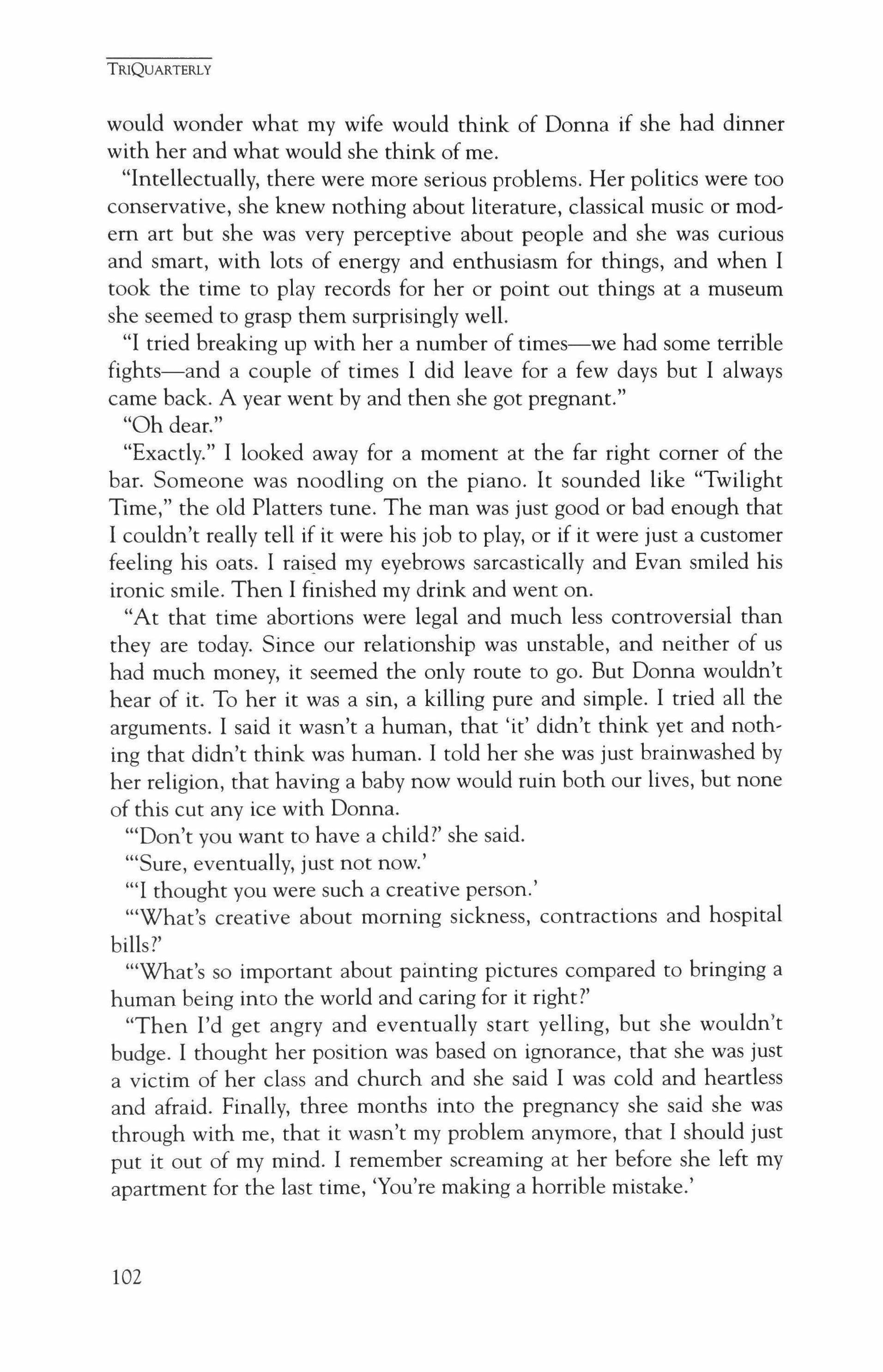
would wonder what my wife would think of Donna if she had dinner with her and what would she think of me.
"Intellectually, there were more serious problems. Her politics were too conservative, she knew nothing about literature, classical music or modem art but she was very perceptive about people and she was curious and smart, with lots of energy and enthusiasm for things, and when I took the time to play records for her or point out things at a museum she seemed to grasp them surprisingly well.
"I tried breaking up with her a number of times-we had some terrible fights-and a couple of times I did leave for a few days but I always came back. A year went by and then she got pregnant."
"Oh dear."
"Exactly." I looked away for a moment at the far right comer of the bar. Someone was noodling on the piano. It sounded like "Twilight Time," the old Platters tune. The man was just good or bad enough that I couldn't really tell if it were his job to play, or if it were just a customer feeling his oats. I raised my eyebrows sarcastically and Evan smiled his ironic smile. Then I finished my drink and went on.
"At that time abortions were legal and much less controversial than they are today. Since our relationship was unstable, and neither of us had much money, it seemed the only route to go. But Donna wouldn't hear of it. To her it was a sin, a killing pure and simple. I tried all the arguments. I said it wasn't a human, that 'it' didn't think yet and nothing that didn't think was human. I told her she was just brainwashed by her religion, that having a baby now would ruin both our lives, but none of this cut any ice with Donna.
"'Don't you want to have a child?' she said.
"'Sure, eventually, just not now.'
'''I thought you were such a creative person.'
"'What's creative about morning sickness, contractions and hospital bills?'
"'What's so important about painting pictures compared to bringing a human being into the world and caring for it right?'
"Then I'd get angry and eventually start yelling, but she wouldn't budge. I thought her position was based on ignorance, that she was just a victim of her class and church and she said I was cold and heartless and afraid. Finally, three months into the pregnancy she said she was through with me, that it wasn't my problem anymore, that I should just put it out of my mind. I remember screaming at her before she left my apartment for the last time, 'You're making a horrible mistake.'
TRIQUARTERLY
102
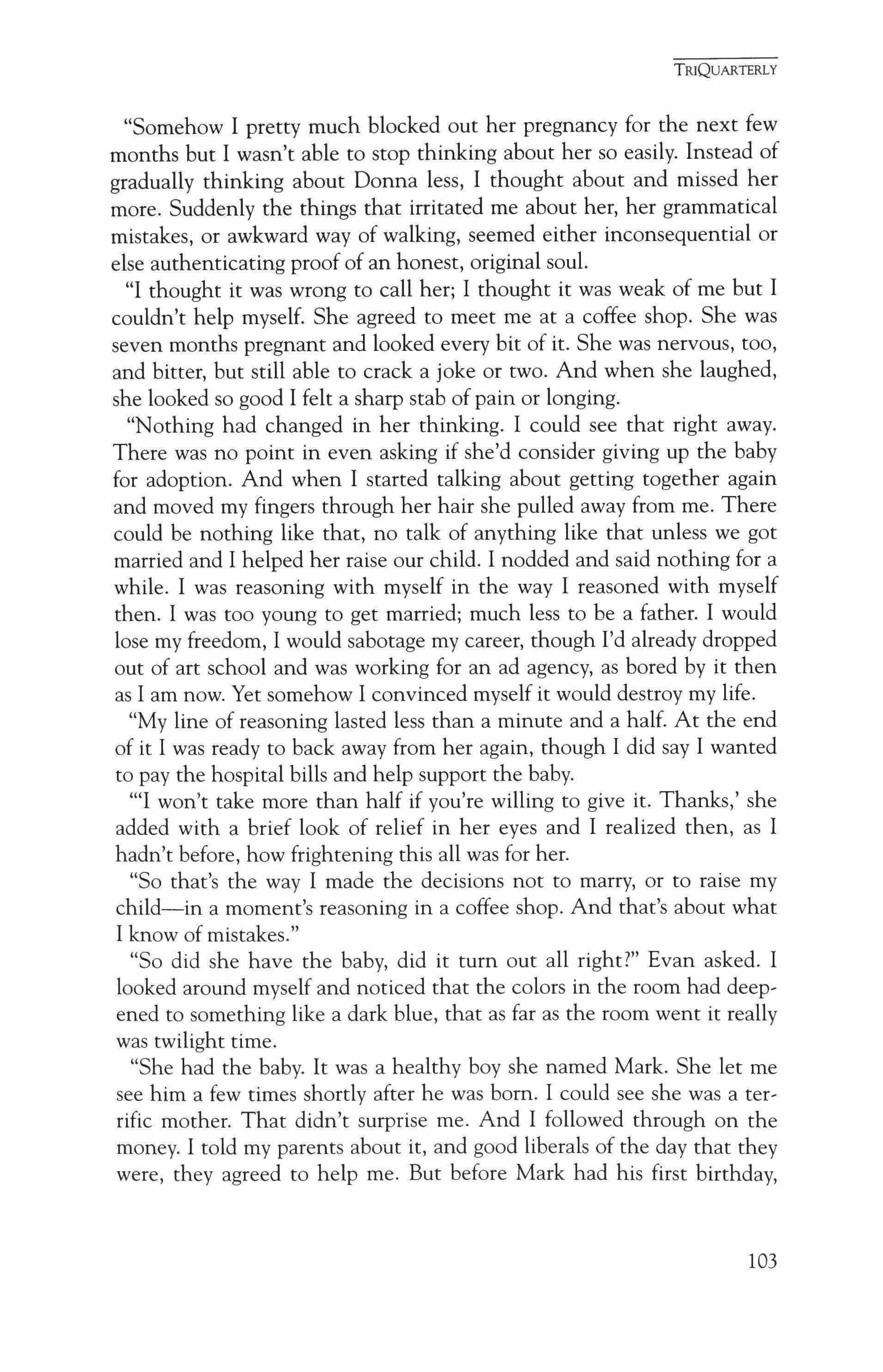
"Somehow I pretty much blocked out her pregnancy for the next few months but I wasn't able to stop thinking about her so easily. Instead of gradually thinking about Donna less, I thought about and missed her more. Suddenly the things that irritated me about her, her grammatical mistakes, or awkward way of walking, seemed either inconsequential or else authenticating proof of an honest, original soul.
"I thought it was wrong to call her; I thought it was weak of me but I couldn't help myself. She agreed to meet me at a coffee shop. She was seven months pregnant and looked every bit of it. She was nervous, too, and bitter, but still able to crack a joke or two. And when she laughed, she looked so good I felt a sharp stab of pain or longing.
"Nothing had changed in her thinking. I could see that right away. There was no point in even asking if she'd consider giving up the baby for adoption. And when I started talking about getting together again and moved my fingers through her hair she pulled away from me. There could be nothing like that, no talk of anything like that unless we got married and I helped her raise our child. I nodded and said nothing for a while. I was reasoning with myself in the way I reasoned with myself then. I was too young to get married; much less to be a father. I would lose my freedom, I would sabotage my career, though I'd already dropped out of art school and was working for an ad agency, as bored by it then as I am now. Yet somehow I convinced myself it would destroy my life.
"My line of reasoning lasted less than a minute and a half. At the end of it I was ready to back away from her again, though I did say I wanted to pay the hospital bills and help support the baby.
"'I won't take more than half if you're willing to give it. Thanks,' she added with a brief look of relief in her eyes and I realized then, as I hadn't before, how frightening this all was for her.
"So that's the way I made the decisions not to marry, or to raise my child-in a moment's reasoning in a coffee shop. And that's about what I know of mistakes."
"So did she have the baby, did it turn out all right?" Evan asked. I looked around myself and noticed that the colors in the room had deepened to something like a dark blue, that as far as the room went it really was twilight time.
"She had the baby. It was a healthy boy she named Mark. She let me see him a few times shortly after he was born. I could see she was a terrific mother. That didn't surprise me. And I followed through on the money. I told my parents about it, and good liberals of the day that they were, they agreed to help me. But before Mark had his first birthday,
TruQUARTERLY
103
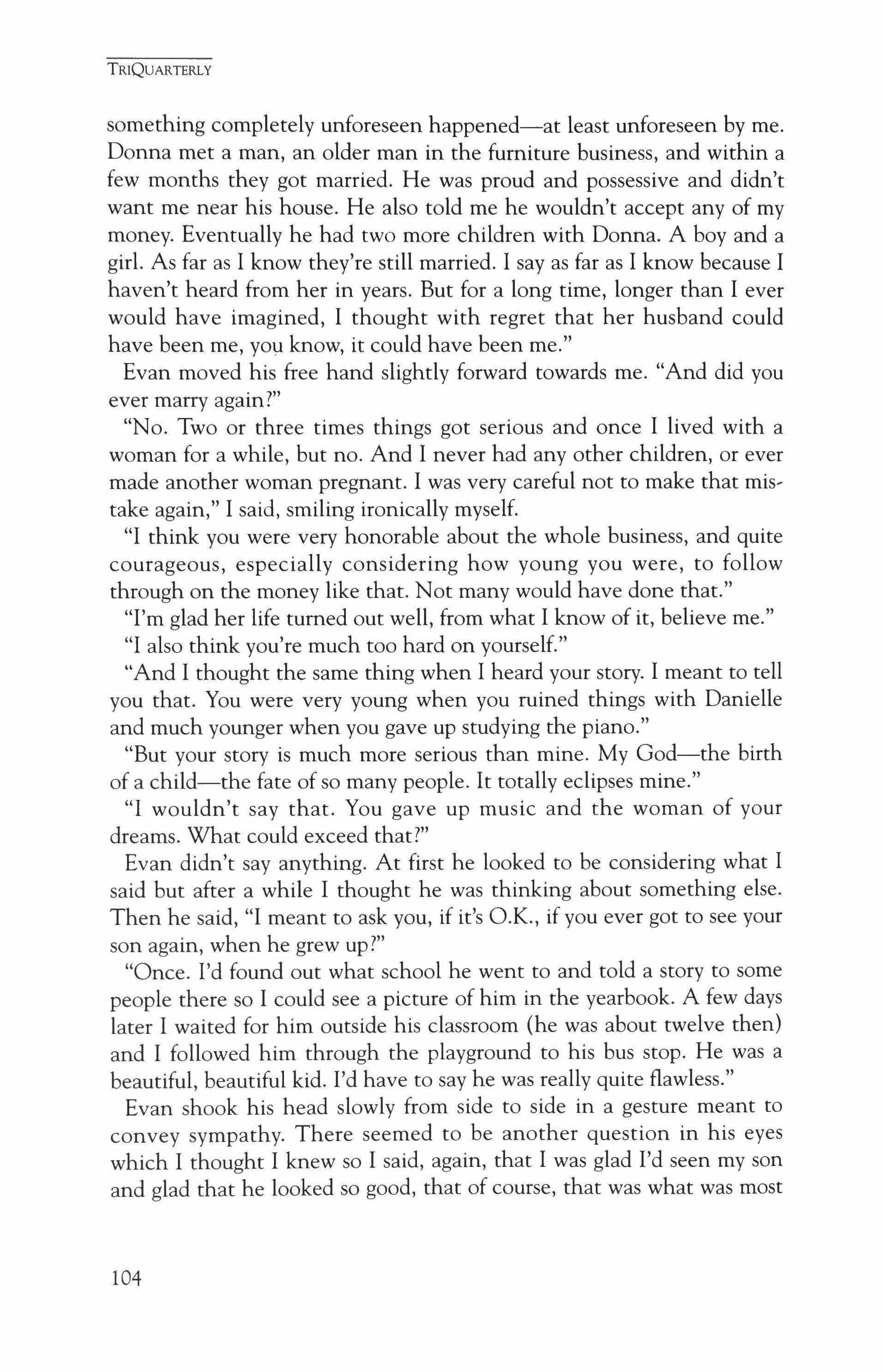
something completely unforeseen happened-at least unforeseen by me. Donna met a man, an older man in the furniture business, and within a few months they got married. He was proud and possessive and didn't want me near his house. He also told me he wouldn't accept any of my money. Eventually he had two more children with Donna. A boy and a girl. As far as I know they're still married. I say as far as I know because I haven't heard from her in years. But for a long time, longer than I ever would have imagined, I thought with regret that her husband could have been me, you know, it could have been me."
Evan moved his free hand slightly forward towards me. "And did you ever marry again?"
"No. Two or three times things got serious and once I lived with a woman for a while, but no. And I never had any other children, or ever made another woman pregnant. I was very careful not to make that mistake again," I said, smiling ironically myself.
"I think you were very honorable about the whole business, and quite courageous, especially considering how young you were, to follow through on the money like that. Not many would have done that."
"I'm glad her life turned out well, from what I know of it, believe me."
"I also think you're much too hard on yourself."
"And I thought the same thing when I heard your story. I meant to tell you that. You were very young when you ruined things with Danielle and much younger when you gave up studying the piano."
"But your story is much more serious than mine. My God-the birth of a child-the fate of so many people. It totally eclipses mine."
"I wouldn't say that. You gave up music and the woman of your dreams. What could exceed that?"
Evan didn't say anything. At first he looked to be considering what I said but after a while I thought he was thinking about something else. Then he said, "I meant to ask you, if it's O.K., if you ever got to see your son again, when he grew up?"
"Once. I'd found out what school he went to and told a story to some people there so I could see a picture of him in the yearbook. A few days later I waited for him outside his classroom (he was about twelve then) and I followed him through the playground to his bus stop. He was a beautiful, beautiful kid. I'd have to say he was really quite flawless."
Evan shook his head slowly from side to side in a gesture meant to convey sympathy. There seemed to be another question in his eyes which I thought I knew so I said, again, that I was glad I'd seen my son and glad that he looked so good, that of course, that was what was most
TRIQUARTERLY
104
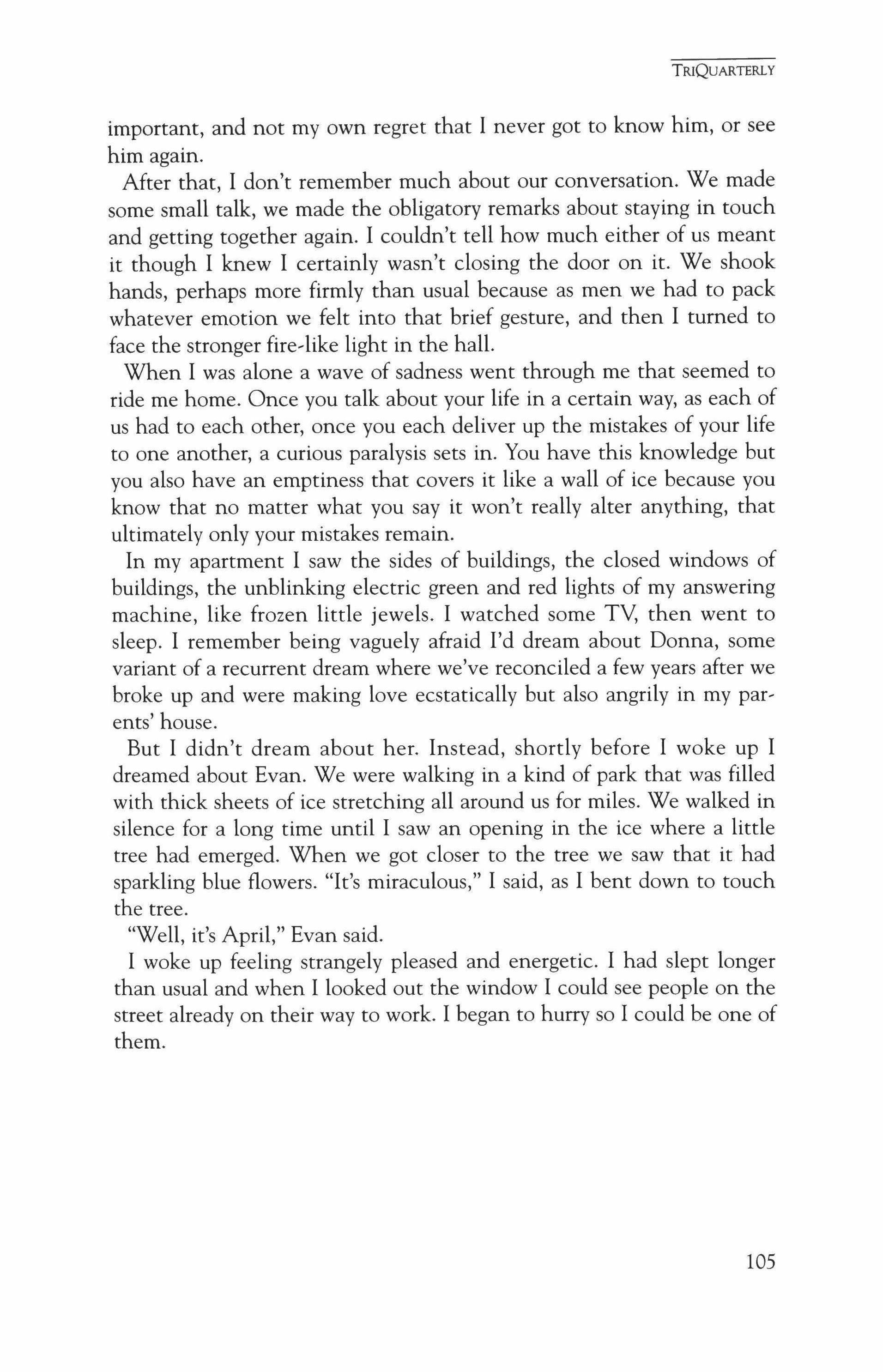
important, and not my own regret that I never got to know him, or see him again.
After that, I don't remember much about our conversation. We made some small talk, we made the obligatory remarks about staying in touch and getting together again. I couldn't tell how much either of us meant it though I knew I certainly wasn't closing the door on it. We shook hands, perhaps more firmly than usual because as men we had to pack whatever emotion we felt into that brief gesture, and then I turned to face the stronger fire-like light in the hall.
When I was alone a wave of sadness went through me that seemed to ride me home. Once you talk about your life in a certain way, as each of us had to each other, once you each deliver up the mistakes of your life to one another, a curious paralysis sets in. You have this knowledge but you also have an emptiness that covers it like a wall of ice because you know that no matter what you say it won't really alter anything, that ultimately only your mistakes remain.
In my apartment I saw the sides of buildings, the closed windows of buildings, the unblinking electric green and red lights of my answering machine, like frozen little jewels. I watched some TV, then went to sleep. I remember being vaguely afraid I'd dream about Donna, some variant of a recurrent dream where we've reconciled a few years after we broke up and were making love ecstatically but also angrily in my parents' house.
But I didn't dream about her. Instead, shortly before I woke up I dreamed about Evan. We were walking in a kind of park that was filled with thick sheets of ice stretching all around us for miles. We walked in silence for a long time until I saw an opening in the ice where a little tree had emerged. When we got closer to the tree we saw that it had sparkling blue flowers. "It's miraculous," I said, as I bent down to touch the tree.
"Well, it's April," Evan said.
I woke up feeling strangely pleased and energetic. I had slept longer than usual and when I looked out the window I could see people on the street already on their way to work. I began to hurry so I could be one of them.
TRIQUARTERLY
105
Do I Know You?
Peggy Shinner
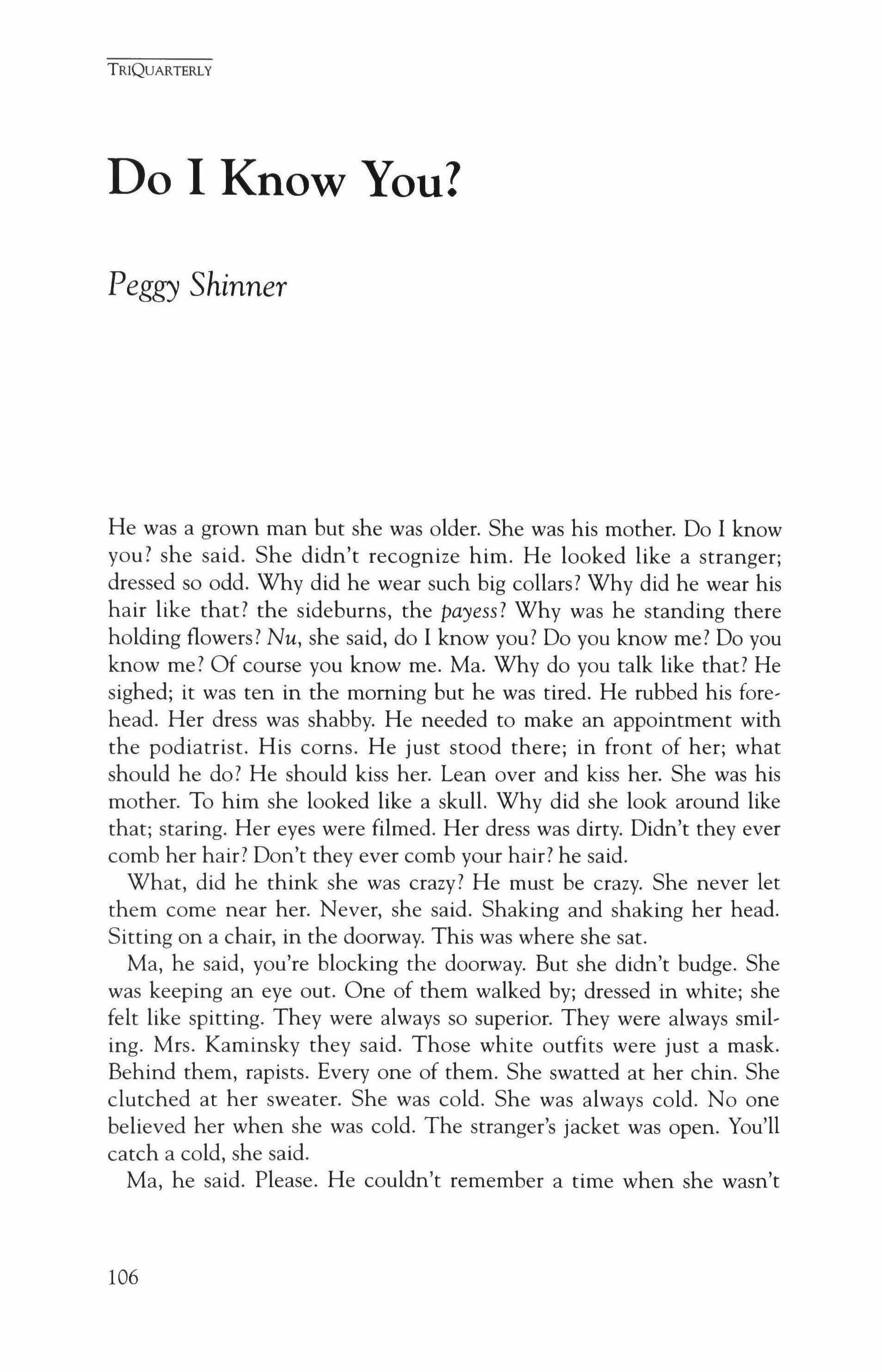
He was a grown man but she was older. She was his mother. Do I know you? she said. She didn't recognize him. He looked like a stranger; dressed so odd. Why did he wear such big collars? Why did he wear his hair like that? the sideburns, the payess? Why was he standing there holding flowers? Nu, she said, do I know you? Do you know me? Do you know me? Of course you know me. Ma. Why do you talk like that? He sighed; it was ten in the morning but he was tired. He rubbed his forehead. Her dress was shabby. He needed to make an appointment with the podiatrist. His corns. He just stood there; in front of her; what should he do? He should kiss her. Lean over and kiss her. She was his mother. To him she looked like a skull. Why did she look around like that; staring. Her eyes were filmed. Her dress was dirty. Didn't they ever comb her hair? Don't they ever comb your hair? he said. What, did he think she was crazy? He must be crazy. She never let them come near her. Never, she said. Shaking and shaking her head. Sitting on a chair, in the doorway. This was where she sat.
Ma, he said, you're blocking the doorway. But she didn't budge. She was keeping an eye out. One of them walked by; dressed in white; she felt like spitting. They were always so superior. They were always smiling. Mrs. Kaminsky they said. Those white outfits were just a mask. Behind them, rapists. Every one of them. She swatted at her chin. She clutched at her sweater. She was cold. She was always cold. No one believed her when she was cold. The stranger's jacket was open. You'll catch a cold, she said.
Ma, he said. Please. He couldn't remember a time when she wasn't
TRIQUARTERLY
106
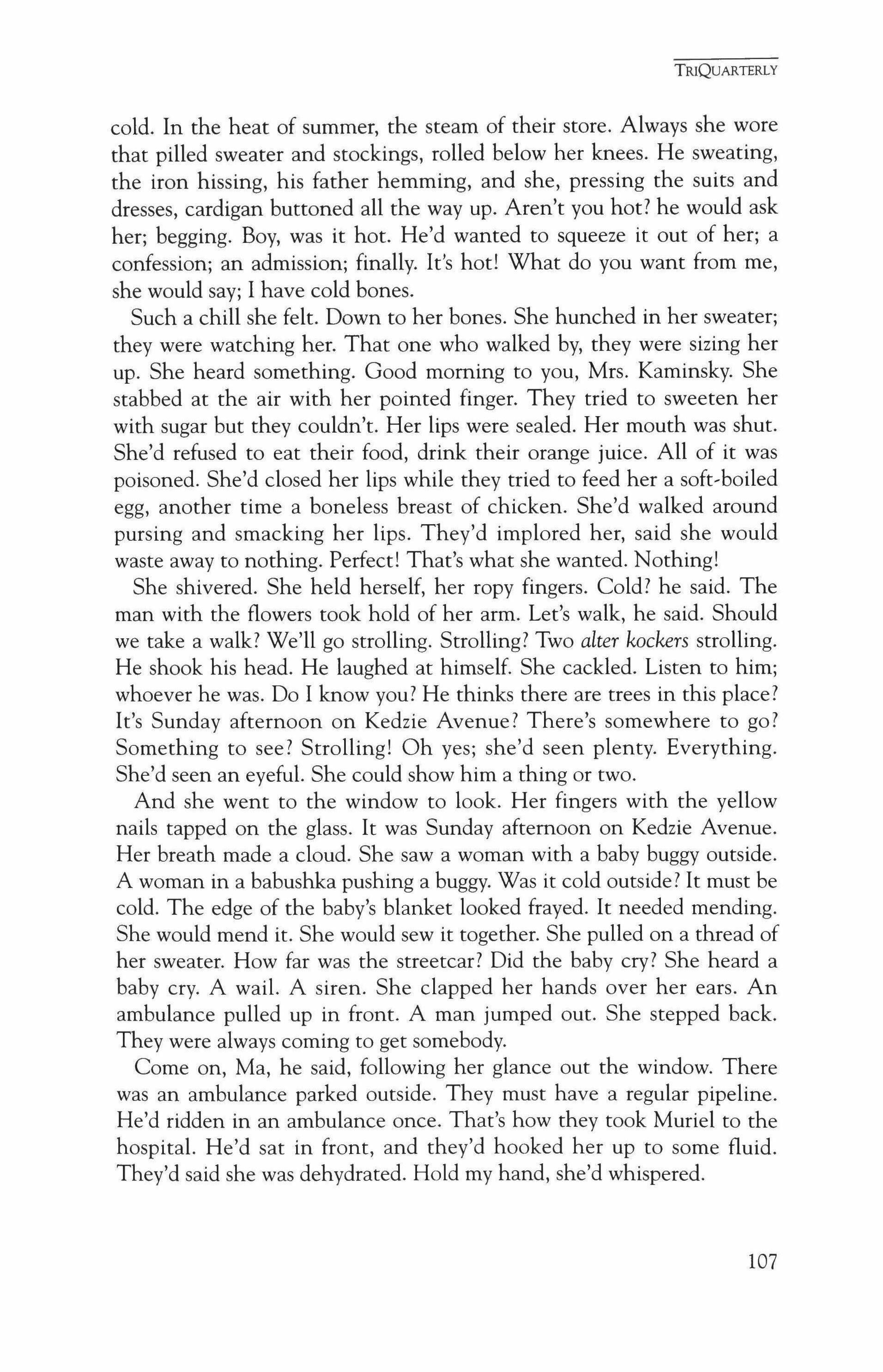
cold. In the heat of summer, the steam of their store. Always she wore that pilled sweater and stockings, rolled below her knees. He sweating, the iron hissing, his father hemming, and she, pressing the suits and dresses, cardigan buttoned all the way up. Aren't you hot? he would ask her; begging. Boy, was it hot. He'd wanted to squeeze it out of her; a confession; an admission; finally. It's hot! What do you want from me, she would say; I have cold bones.
Such a chill she felt. Down to her bones. She hunched in her sweater; they were watching her. That one who walked by, they were sizing her up. She heard something. Good morning to you, Mrs. Kaminsky. She stabbed at the air with her pointed finger. They tried to sweeten her with sugar but they couldn't. Her lips were sealed. Her mouth was shut. She'd refused to eat their food, drink their orange juice. All of it was poisoned. She'd closed her lips while they tried to feed her a soft-boiled egg, another time a boneless breast of chicken. She'd walked around pursing and smacking her lips. They'd implored her, said she would waste away to nothing. Perfect! That's what she wanted. Nothing!
She shivered. She held herself, her ropy fingers. Cold? he said. The man with the flowers took hold of her arm. Let's walk, he said. Should we take a walk? We'll go strolling. Strolling? Two alter kockers strolling. He shook his head. He laughed at himself. She cackled. Listen to him; whoever he was. Do I know you? He thinks there are trees in this place? It's Sunday afternoon on Kedzie Avenue? There's somewhere to go? Something to see? Strolling! Oh yes; she'd seen plenty. Everything. She'd seen an eyeful. She could show him a thing or two.
And she went to the window to look. Her fingers with the yellow nails tapped on the glass. It was Sunday afternoon on Kedzie Avenue. Her breath made a cloud. She saw a woman with a baby buggy outside. A woman in a babushka pushing a buggy. Was it cold outside? It must be cold. The edge of the baby's blanket looked frayed. It needed mending. She would mend it. She would sew it together. She pulled on a thread of her sweater. How far was the streetcar? Did the baby cry? She heard a baby cry. A wail. A siren. She clapped her hands over her ears. An ambulance pulled up in front. A man jumped out. She stepped back. They were always coming to get somebody.
Come on, Ma, he said, following her glance out the window. There was an ambulance parked outside. They must have a regular pipeline. He'd ridden in an ambulance once. That's how they took Muriel to the hospital. He'd sat in front, and they'd hooked her up to some fluid. They'd said she was dehydrated. Hold my hand, she'd whispered.
TRIQUARTERLY
107
TRIQUARTERLY
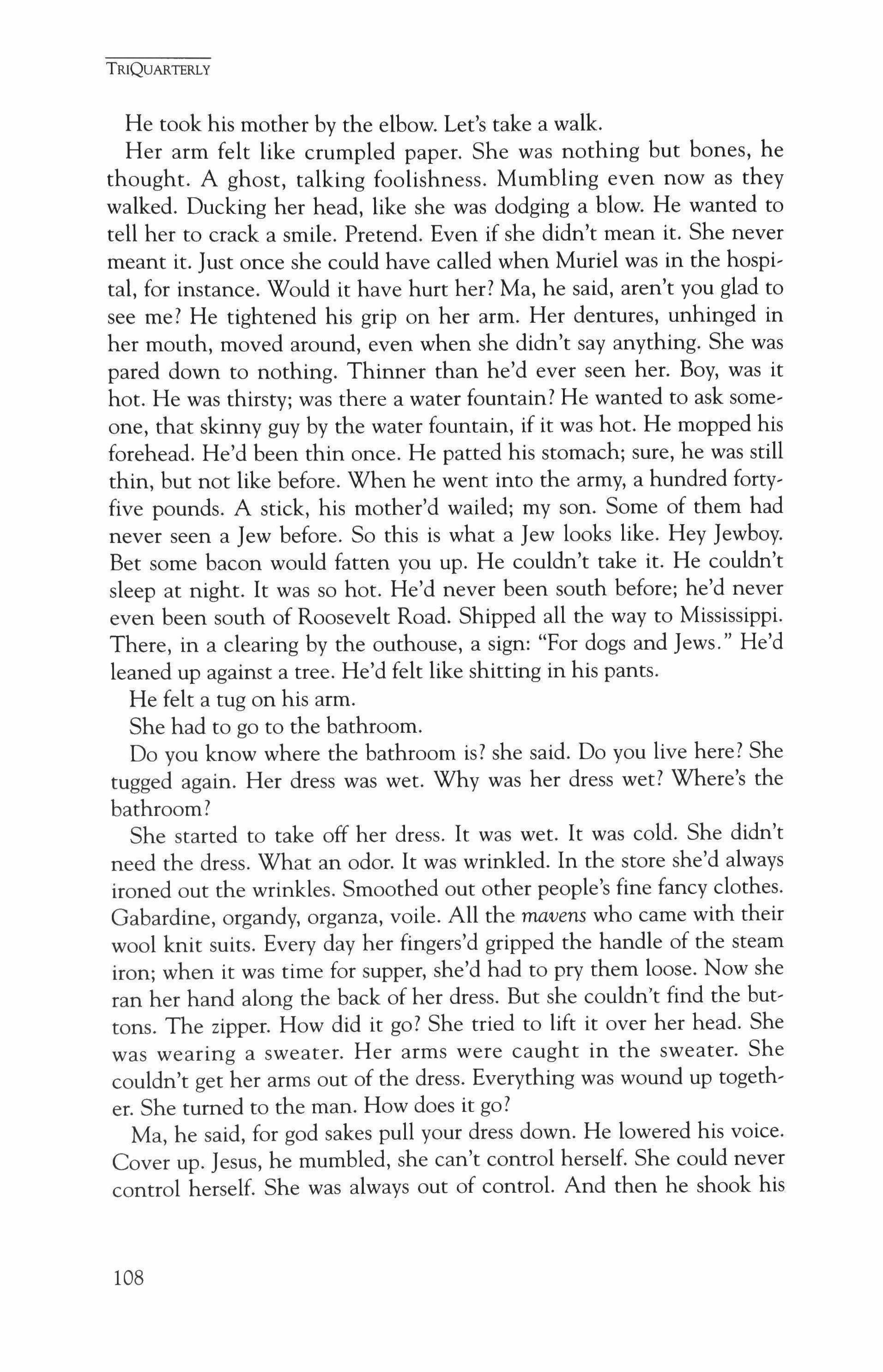
He took his mother by the elbow. Let's take a walk. Her arm felt like crumpled paper. She was nothing but bones, he thought. A ghost, talking foolishness. Mumbling even now as they walked. Ducking her head, like she was dodging a blow. He wanted to tell her to crack a smile. Pretend. Even if she didn't mean it. She never meant it. Just once she could have called when Muriel was in the hospital, for instance. Would it have hurt her? Ma, he said, aren't you glad to see me? He tightened his grip on her arm. Her dentures, unhinged in her mouth, moved around, even when she didn't say anything. She was pared down to nothing. Thinner than he'd ever seen her. Boy, was it hot. He was thirsty; was there a water fountain? He wanted to ask someone, that skinny guy by the water fountain, if it was hot. He mopped his forehead. He'd been thin once. He patted his stomach; sure, he was still thin, but not like before. When he went into the army, a hundred fortyfive pounds. A stick, his mother'd wailed; my son. Some of them had never seen a Jew before. So this is what a Jew looks like. Hey Jewboy. Bet some bacon would fatten you up. He couldn't take it. He couldn't sleep at night. It was so hot. He'd never been south before; he'd never even been south of Roosevelt Road. Shipped all the way to Mississippi. There, in a clearing by the outhouse, a sign: "For dogs and Jews." He'd leaned up against a tree. He'd felt like shirting in his pants.
He felt a tug on his arm.
She had to go to the bathroom.
Do you know where the bathroom is? she said. Do you live here? She tugged again. Her dress was wet. Why was her dress wet? Where's the bathroom?
She started to take off her dress. It was wet. It was cold. She didn't need the dress. What an odor. It was wrinkled. In the store she'd always ironed out the wrinkles. Smoothed out other people's fine fancy clothes. Gabardine, organdy, organza, voile. All the mavens who came with their wool knit suits. Every day her fingers'd gripped the handle of the steam iron; when it was time for supper, she'd had to pry them loose. Now she ran her hand along the back of her dress. But she couldn't find the buttons. The zipper. How did it go? She tried to lift it over her head. She was wearing a sweater. Her arms were caught in the sweater. She couldn't get her arms out of the dress. Everything was wound up together. She turned to the man. How does it go?
Ma, he said, for god sakes pull your dress down. He lowered his voice. Cover up. Jesus, he mumbled, she can't control herself. She could never control herself. She was always out of control. And then he shook his
108

head. He pulled himself together. Her dress was wet. His feet were hurting. Through the tops of her shoes, he could see the lumps of her toes twisted in every direction. He rubbed his eyes. He shifted his feet. He should have called Dr. Krivit last week. Now he'd have to wait for an appointment. Why don't we find the nurse, he said, looking at her dress. She stepped away from him. She didn't hear him. The nurse! Squirming, she glimpsed the back of her dress. A dark spot. She swung a hand at it. She would wait.
He looked up and down the hallway for a nurse. Through a crack in a door he saw footsteps shuffling. The flowers on the back of his mother's dress seemed like they were spreading; they were blooming. He was sweating. It was hot. Where was everybody? Last night Shirley'd worn something with flowers. Big and blousy with flowers. She was a lousy dresser. She looked like a streetwalker in that getup. His wife would never have worn something like that. Muriel Never, she said; then nothing. What, Ma? What? She glanced at him, stealthily, out of the comer of her eye. She glanced behind her. The nurse! Should she tell him? Should she warn him? What do you keep looking at? he said. But still he saw Shirley sitting at the bar; her high heels; her legs crossed. They'd met for a drink. He'd asked her for a drink. No big deal. Vodka tonic. She pulled on his arm. His mother was pulling on his arm. What? Where? He turned to see where she was looking. The nurses' station; the nurse, filing charts, writing something up. He started to go over. Come on, Ma, he said. But she shook her head. She wouldn't budge. Against the wall, she stayed right where she was.
Taking notes; spying; that's what the nurse was doing. Always writing. So she pressed against the wall. She shrunk herself up.
The nurse looked up. She put her pen down; she sagged a little. What was the time? She watched the second hand on the wall clock moving, circling. It seemed to pause before each lurch forward. She could hear it ticking as the seconds went by. She laid her hands on the mound of her belly. The baby kicked. He was turning. Was it a boy? She wanted a boy. Her feet were swollen; they were aching. Who would rub them? At her last appointment, she'd listened to the sound the baby'd made in her belly. It'd sounded like a subway rushing by.
What was the time? Ten thirteen. Mrs. Rabin died at ten thirteen. They'd called the ambulance but it hadn't come in time. She wrote it on the form. She filled out the death certificate. Date of birth at the top; hour of death at the bottom. In between, the nurse thought, was an entire lifetime. Now she'd have to call the family.
TRIQUARTERLY
109
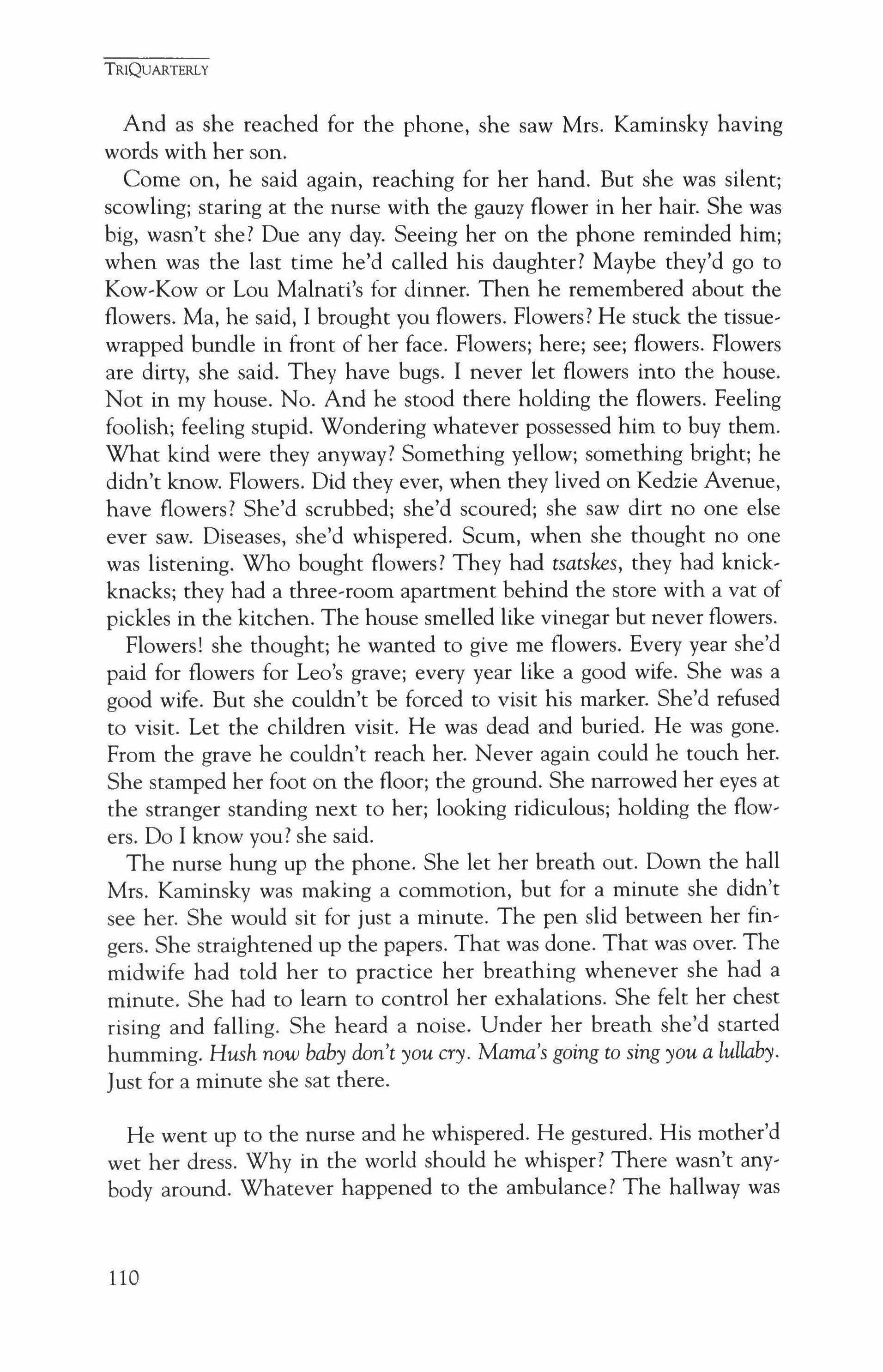
And as she reached for the phone, she saw Mrs. Kaminsky having words with her son.
Come on, he said again, reaching for her hand. But she was silent; scowling; staring at the nurse with the gauzy flower in her hair. She was big, wasn't she? Due any day. Seeing her on the phone reminded him; when was the last time he'd called his daughter? Maybe they'd go to Kow-Kow or Lou Malnati's for dinner. Then he remembered about the flowers. Ma, he said, I brought you flowers. Flowers? He stuck the tissuewrapped bundle in front of her face. Flowers; here; see; flowers. Flowers are dirty, she said. They have bugs. I never let flowers into the house. Not in my house. No. And he stood there holding the flowers. Feeling foolish; feeling stupid. Wondering whatever possessed him to buy them. What kind were they anyway? Something yellow; something bright; he didn't know. Flowers. Did they ever, when they lived on Kedzie Avenue, have flowers? She'd scrubbed; she'd scoured; she saw dirt no one else ever saw. Diseases, she'd whispered. Scum, when she thought no one was listening. Who bought flowers? They had tsatskes, they had knickknacks; they had a three-room apartment behind the store with a vat of pickles in the kitchen. The house smelled like vinegar but never flowers. Flowers! she thought; he wanted to give me flowers. Every year she'd paid for flowers for Leo's grave; every year like a good wife. She was a good wife. But she couldn't be forced to visit his marker. She'd refused to visit. Let the children visit. He was dead and buried. He was gone. From the grave he couldn't reach her. Never again could he touch her. She stamped her foot on the floor; the ground. She narrowed her eyes at the stranger standing next to her; looking ridiculous; holding the flowers. Do I know you? she said.
The nurse hung up the phone. She let her breath out. Down the hall Mrs. Kaminsky was making a commotion, but for a minute she didn't see her. She would sit for just a minute. The pen slid between her fingers. She straightened up the papers. That was done. That was over. The midwife had told her to practice her breathing whenever she had a minute. She had to learn to control her exhalations. She felt her chest rising and falling. She heard a noise. Under her breath she'd started humming. Hush now baby don't you cry. Mama's going to sing you a lullaby. Just for a minute she sat there.
He went up to the nurse and he whispered. He gestured. His mother'd wet her dress. Why in the world should he whisper? There wasn't anybody around. Whatever happened to the ambulance? The hallway was
TRIQUARTERLY
110

empty; quiet; he heard shuffling. They're probably all down in the beauty parlor, he thought, getting coifed. He'd seen a sign on the wall for the Sherwin Manor beauty contest. Get your hair done. Have a manicure. Why not? His daughter'd been pestering him to grow his hair lately. She'd said it would make him look more debonair. For the ladies, she'd said. For the ladies! Go out and have a good time. But his mother, would she get her hair done? She wouldn't let them touch a hair on her head. Was he crazy? That's what she'd said.
He leaned closer. He explained to the nurse about the dress. Against the wall his mother was still stomping her foot, shaking her head. Keep your voice down, Ma, he pleaded silently. From over here he could hear her. Putz. She raised her foot and stomped. Putz, again. His fingers curled. He kept his voice down while he talked to the nurse. His mother's dress was wet. She needed someone to help change her dress. She's wet herself again, the nurse thought, plodding down the hallway to get a box of Depends. She'd have to make a note of it; she'd write it on the chart. Mrs. Kaminsky is losing control of her bladder. The nurse saw it written in her mind. She filled in the lines on a chart. Why did Mrs. Kaminsky look so frightened there against the wall? If she backed up another step, she could disappear. I'd like to go home, the nurse thought. I'd like someone to rub my feet. On the right, the door to 201 was closed. The curtains were drawn. Minutes ago she'd pulled out the glucose drip from Mrs. Rabin's wrist. Now she climbed the footstool in the storage closet and reached for the Depends. Pretty soon she'd be changing somebody else's diapers. She patted her stomach. She touched the curve of the baby's head. She had three names picked out. Three names for a boy. Josiah. Zachary. Lukey. And if it was a girl? She had a friend once who was desperate for a daughter. When she'd finally pushed out a nine and a half-pound boy, she'd called him watermelon head.
Lukey, the nurse said, hugging the diapers to her chest. How's my baby? Then she led Mrs. Kaminsky into the bathroom. Where were they going? Where were they taking her? A hand was on her wrist. The one dressed in white was dragging her away. She looked behind at the man with the flowers. Far off she heard a cry; a wail; a siren. A sound escaped her lips. Get hold of yourself, he said. She snatched her sweater and wound it closer around her neck. The man wiped his forehead. He was rubbing his eyes. Didn't he need them to see? Why was he letting them take her away?
I'll stay right here, Ma, he said. I won't move an inch.
TRIQUARTERLY
111
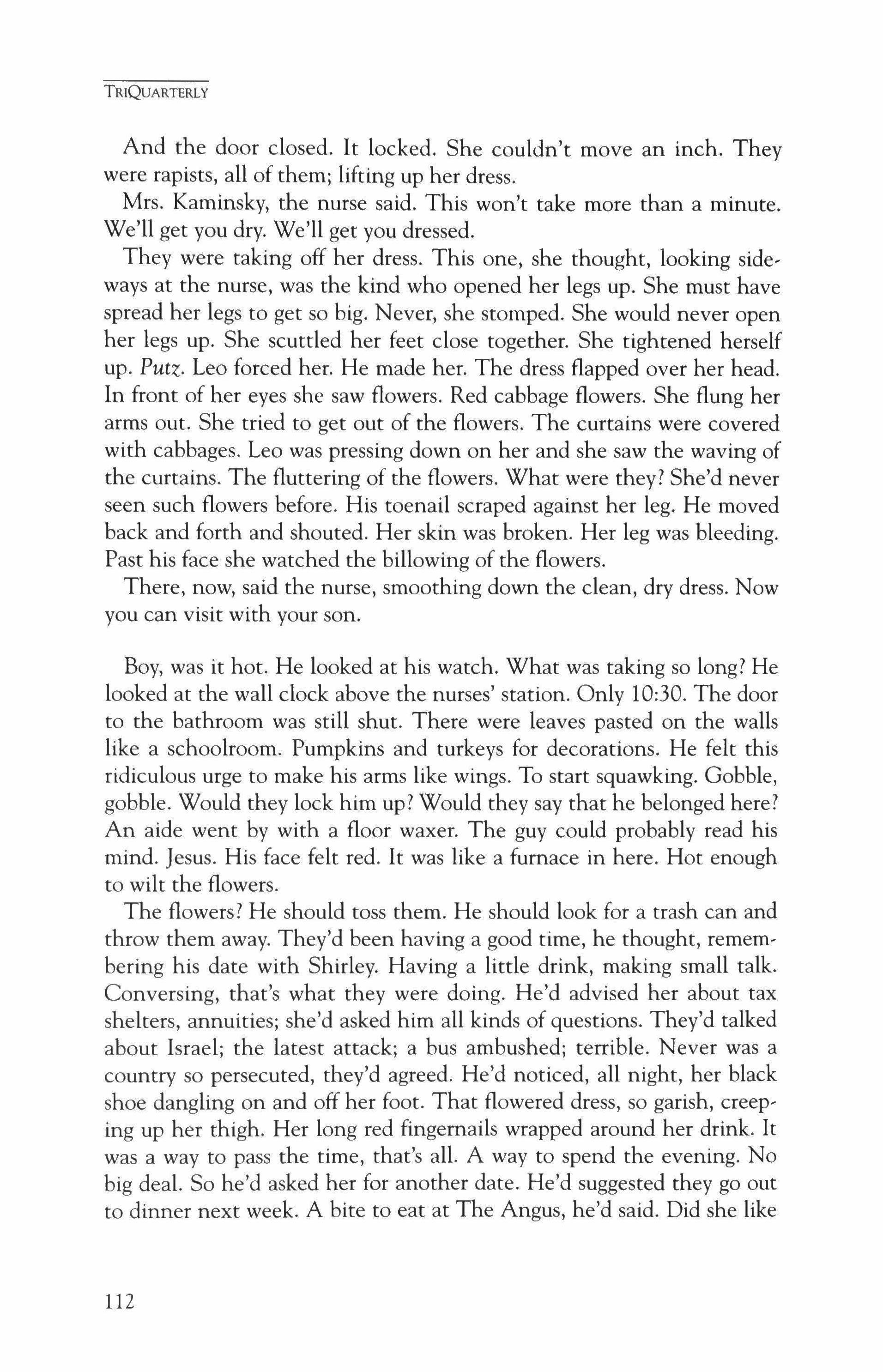
TRIQUARTERLY
And the door closed. It locked. She couldn't move an inch. They were rapists, all of them; lifting up her dress.
Mrs. Kaminsky, the nurse said. This won't take more than a minute. We'll get you dry. We'll get you dressed.
They were taking off her dress. This one, she thought, looking sideways at the nurse, was the kind who opened her legs up. She must have spread her legs to get so big. Never, she stomped. She would never open her legs up. She scuttled her feet close together. She tightened herself up. Putz. Leo forced her. He made her. The dress flapped over her head. In front of her eyes she saw flowers. Red cabbage flowers. She flung her arms out. She tried to get out of the flowers. The curtains were covered with cabbages. Leo was pressing down on her and she saw the waving of the curtains. The fluttering of the flowers. What were they? She'd never seen such flowers before. His toenail scraped against her leg. He moved back and forth and shouted. Her skin was broken. Her leg was bleeding. Past his face she watched the billowing of the flowers.
There, now, said the nurse, smoothing down the clean, dry dress. Now you can visit with your son.
Boy, was it hot. He looked at his watch. What was taking so long? He looked at the wall clock above the nurses' station. Only 10:30. The door to the bathroom was still shut. There were leaves pasted on the walls like a schoolroom. Pumpkins and turkeys for decorations. He felt this ridiculous urge to make his arms like wings. To start squawking. Gobble, gobble. Would they lock him up? Would they say that he belonged here? An aide went by with a floor waxer. The guy could probably read his mind. Jesus. His face felt red. It was like a furnace in here. Hot enough to wilt the flowers.
The flowers? He should toss them. He should look for a trash can and throw them away. They'd been having a good time, he thought, remembering his date with Shirley. Having a little drink, making small talk. Conversing, that's what they were doing. He'd advised her about tax shelters, annuities; she'd asked him all kinds of questions. They'd talked about Israel; the latest attack; a bus ambushed; terrible. Never was a country so persecuted, they'd agreed. He'd noticed, all night, her black shoe dangling on and off her foot. That flowered dress, so garish, creeping up her thigh. Her long red fingernails wrapped around her drink. It was a way to pass the time, that's all. A way to spend the evening. No big deal. So he'd asked her for another date. He'd suggested they go out to dinner next week. A bite to eat at The Angus, he'd said. Did she like
112

ribs? Figuring in his mind that it was a nice place but not too unreasonable. Yeah. Because this dating business was expensive. Thirty, forty dollars a pop; more with drinks; it added up. So as he left the tip, he asked her. And what did she say? What did she have the gall to answer? She thought it would be better not to. Better not to! What did that mean? What did that amount to? He was no fool. Right there at the crowded bar, with all those people, pushing and shoving, bumping into him, she turned him down. Plain and simple, she refused him.
Do I know you?
He jerked. There she was; his mother stood in front of him; in a clean dress, a dry dress. Do I know you?
She tugged at her collar. She pulled at her hem. Staring at the stranger with the sideburns, she wondered who he was.
He took off his glasses and focused. His mother stood in front of him, fussing with her dress. The nurse had changed the dress. It looks just like new, he said, but with her hand she flung his words away. What did he know? A stranger. She clasped her arms around her shoulders. He didn't know a thing.
You need a haircut, she said.
He took a swipe at his forehead. He was a grown man, but he felt like a piece of paper blowing around the street. This is the style now, Ma, he said. They wear it longer. That's what his daughter'd told him. She'd said he would look debonair. Debonair? Last night he'd looked like a dog. He'd felt like a fool. He should have known Shirley had no class. Anyone who dressed like that was a floozy. Could he drive her home? she'd asked, after she refused him. He wasn't about to drive her home. Let her spend money. Let her take a cab. She'd feel the pinch. What controls the world is a woman's pussy, he spit out at her, and then left her sitting in that flowered getup at the bar.
Let's go this way, he said, giving his mother a little nudge. Are we going for a ride?
For a walk, Ma. We're walking.
Shhh. I'll tell you a secret, she said.
They turned a comer.
There, coming towards her, the two who were inseparable. Tit for tat she called them. One in a wheelchair, the other pushing. Didn't they have nothing better to do. Whenever she listened, they talked nonsense. What a pretty dress, one said now. Who's that handsome young man? said the other.
Shhh, she repeated.
TRIQUARTERLY
113
TRIQUARTERLY
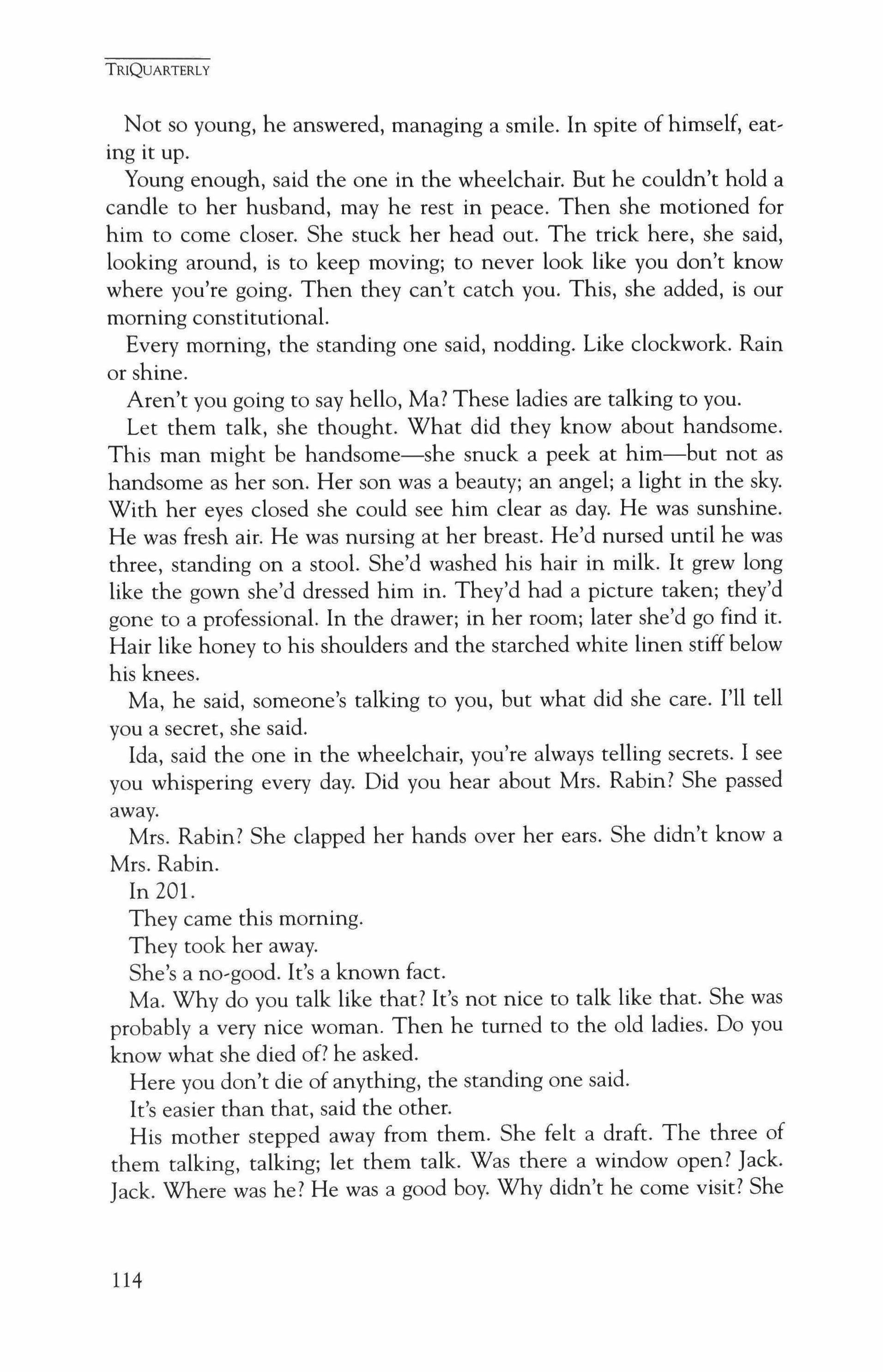
Not so young, he answered, managing a smile. In spite of himself, eating it up.
Young enough, said the one in the wheelchair. But he couldn't hold a candle to her husband, may he rest in peace. Then she motioned for him to come closer. She stuck her head out. The trick here, she said, looking around, is to keep moving; to never look like you don't know where you're going. Then they can't catch you. This, she added, is our morning constitutional.
Every morning, the standing one said, nodding. Like clockwork. Rain or shine.
Aren't you going to say hello, Ma? These ladies are talking to you.
Let them talk, she thought. What did they know about handsome. This man might be handsome-she snuck a peek at him-but not as handsome as her son. Her son was a beauty; an angel; a light in the sky. With her eyes closed she could see him clear as day. He was sunshine. He was fresh air. He was nursing at her breast. He'd nursed until he was three, standing on a stool. She'd washed his hair in milk. It grew long like the gown she'd dressed him in. They'd had a picture taken; they'd gone to a professional. In the drawer; in her room; later she'd go find it. Hair like honey to his shoulders and the starched white linen stiff below his knees.
Ma, he said, someone's talking to you, but what did she care. I'll tell you a secret, she said.
Ida, said the one in the wheelchair, you're always telling secrets. I see you whispering every day. Did you hear about Mrs. Rabin? She passed away.
Mrs. Rabin? She clapped her hands over her ears. She didn't know a Mrs. Rabin.
In 201.
They came this morning. They took her away.
She's a no-good. It's a known fact.
Ma. Why do you talk like that? It's not nice to talk like that. She was probably a very nice woman. Then he turned to the old ladies. Do you know what she died of? he asked.
Here you don't die of anything, the standing one said. It's easier than that, said the other.
His mother stepped away from them. She felt a draft. The three of them talking, talking; let them talk. Was there a window open? Jack. Jack. Where was he? He was a good boy. Why didn't he come visit? She
114
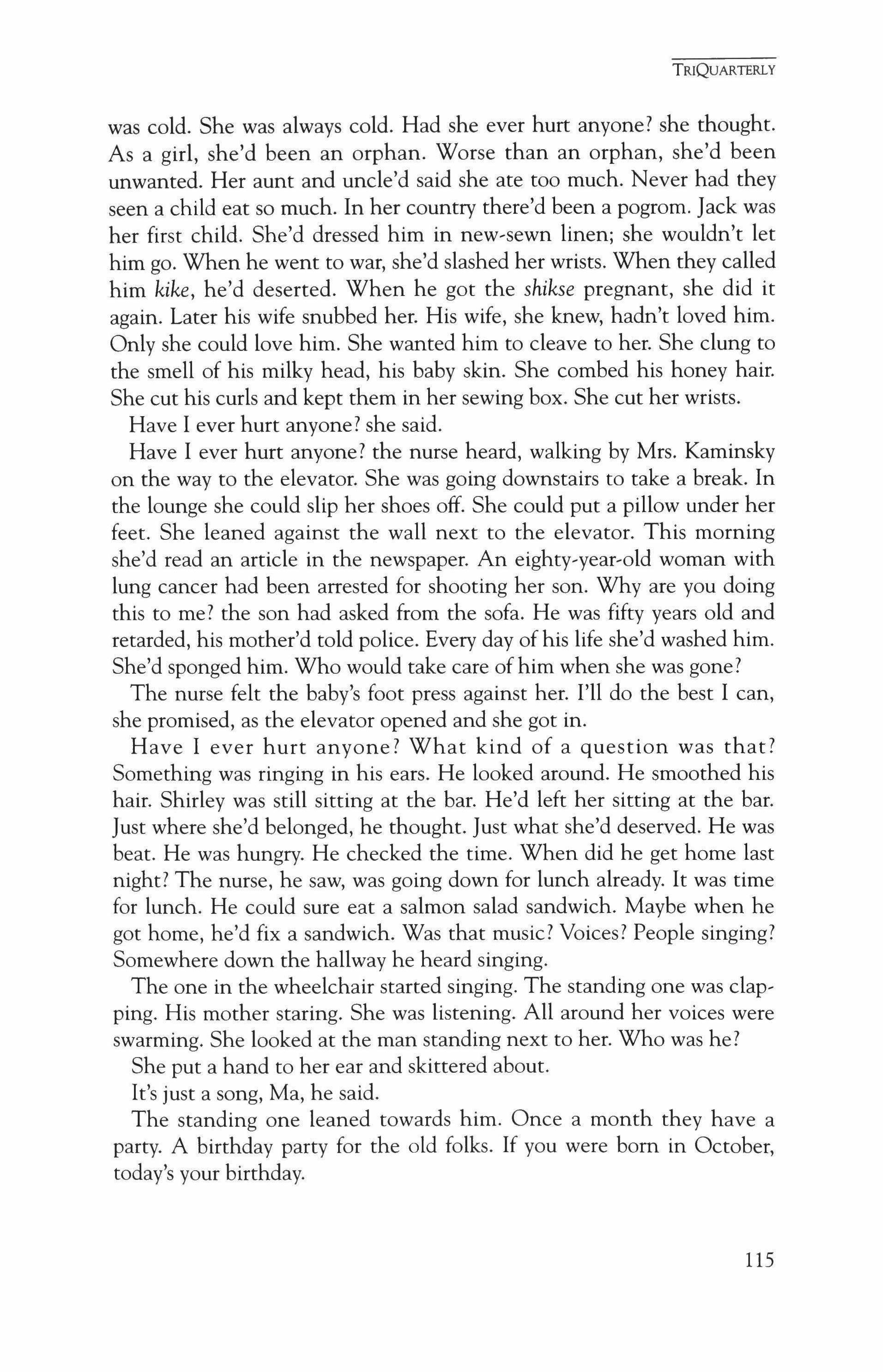
was cold. She was always cold. Had she ever hurt anyone? she thought. As a girl, she'd been an orphan. Worse than an orphan, she'd been unwanted. Her aunt and uncle'd said she ate too much. Never had they seen a child eat so much. In her country there'd been a pogrom. Jack was her first child. She'd dressed him in new-sewn linen; she wouldn't let him go. When he went to war, she'd slashed her wrists. When they called him kike, he'd deserted. When he got the shikse pregnant, she did it again. Later his wife snubbed her. His wife, she knew, hadn't loved him. Only she could love him. She wanted him to cleave to her. She clung to the smell of his milky head, his baby skin. She combed his honey hair. She cut his curls and kept them in her sewing box. She cut her wrists.
Have I ever hurt anyone? she said.
Have I ever hurt anyone? the nurse heard, walking by Mrs. Kaminsky on the way to the elevator. She was going downstairs to take a break. In the lounge she could slip her shoes off. She could put a pillow under her feet. She leaned against the wall next to the elevator. This morning she'd read an article in the newspaper. An eighty-year-old woman with lung cancer had been arrested for shooting her son. Why are you doing this to me? the son had asked from the sofa. He was fifty years old and retarded, his mother'd told police. Every day of his life she'd washed him. She'd sponged him. Who would take care of him when she was gone?
The nurse felt the baby's foot press against her. I'll do the best I can, she promised, as the elevator opened and she got in.
Have I ever hurt anyone? What kind of a question was that? Something was ringing in his ears. He looked around. He smoothed his hair. Shirley was still sitting at the bar. He'd left her sitting at the bar. Just where she'd belonged, he thought. Just what she'd deserved. He was beat. He was hungry. He checked the time. When did he get home last night? The nurse, he saw, was going down for lunch already. It was time for lunch. He could sure eat a salmon salad sandwich. Maybe when he got home, he'd fix a sandwich. Was that music? Voices? People singing? Somewhere down the hallway he heard singing.
The one in the wheelchair started singing. The standing one was clapping. His mother staring. She was listening. All around her voices were swarming. She looked at the man standing next to her. Who was he?
She put a hand to her ear and skittered about.
It's just a song, Ma, he said.
The standing one leaned towards him. Once a month they have a party. A birthday party for the old folks. If you were born in October, today's your birthday.
TRIQUARTERLY
115
TRIQUARTERLY
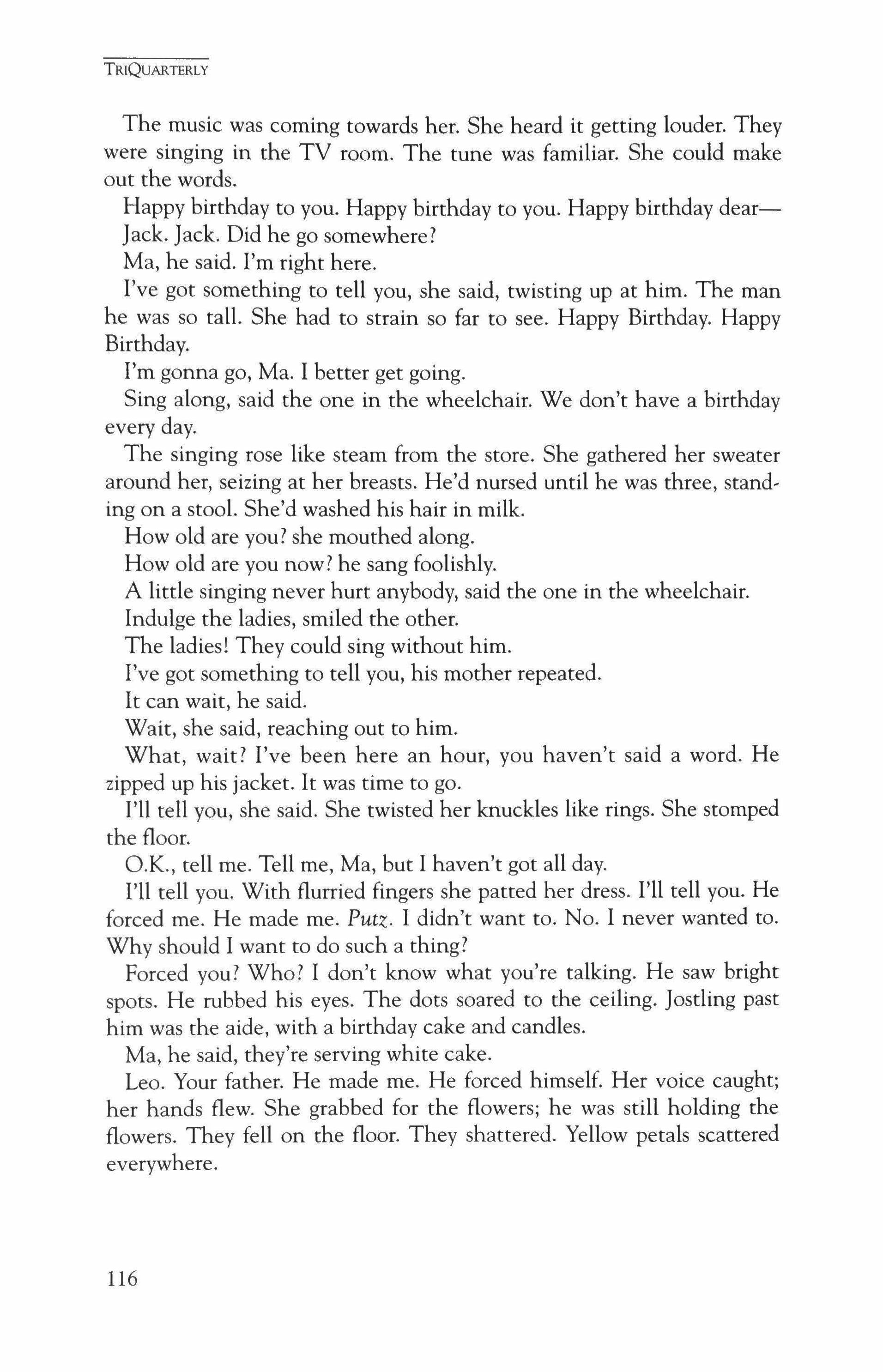
The music was coming towards her. She heard it getting louder. They were singing in the TV room. The tune was familiar. She could make out the words.
Happy birthday to you. Happy birthday to you. Happy birthday dearJack. Jack. Did he go somewhere?
Ma, he said. I'm right here.
I've got something to tell you, she said, twisting up at him. The man he was so tall. She had to strain so far to see. Happy Birthday. Happy Birthday.
I'm gonna go, Ma. I better get going.
Sing along, said the one in the wheelchair. We don't have a birthday every day.
The singing rose like steam from the store. She gathered her sweater around her, seizing at her breasts. He'd nursed until he was three, standing on a stool. She'd washed his hair in milk.
How old are you? she mouthed along.
How old are you now? he sang foolishly.
A little singing never hurt anybody, said the one in the wheelchair.
Indulge the ladies, smiled the other.
The ladies! They could sing without him.
I've got something to tell you, his mother repeated.
It can wait, he said.
Wait, she said, reaching out to him.
What, wait? I've been here an hour, you haven't said a word. He zipped up his jacket. It was time to go.
I'll tell you, she said. She twisted her knuckles like rings. She stomped the floor.
O.K., tell me. Tell me, Ma, but I haven't got all day.
I'll tell you. With flurried fingers she patted her dress. I'll tell you. He forced me. He made me. Putz. I didn't want to. No. I never wanted to.
Why should I want to do such a thing?
Forced you? Who? I don't know what you're talking. He saw bright spots. He rubbed his eyes. The dots soared to the ceiling. Jostling past him was the aide, with a birthday cake and candles.
Ma, he said, they're serving white cake.
Leo. Your father. He made me. He forced himself. Her voice caught; her hands flew. She grabbed for the flowers; he was still holding the flowers. They fell on the floor. They shattered. Yellow petals scattered everywhere.
116
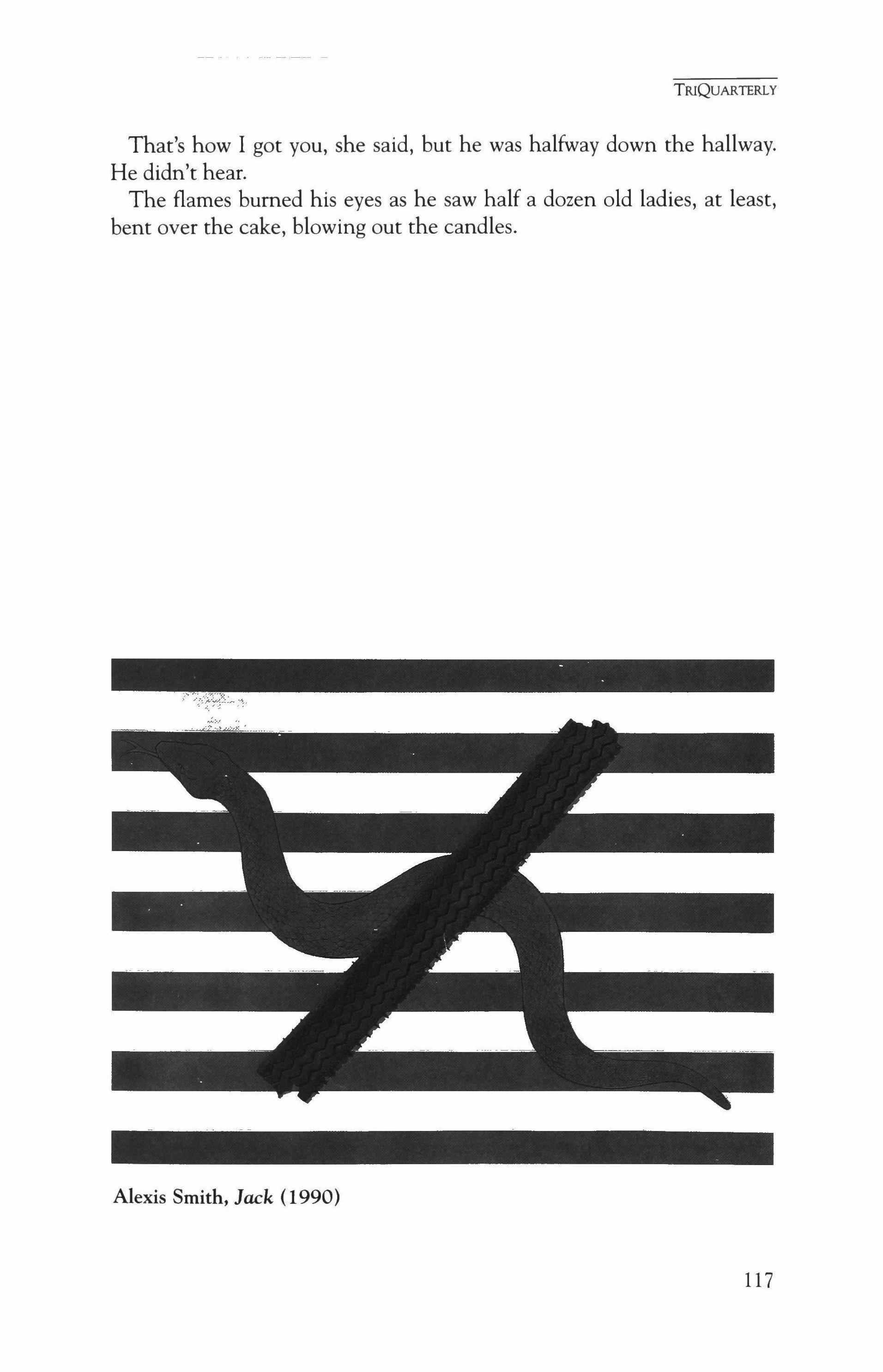
That's how I got you, she said, but he was halfway down the hallway. He didn't hear.
The flames burned his eyes as he saw half a dozen old ladies, at least, bent over the cake, blowing out the candles.
TRIQUARTERLY
117
Alexis Smith, Jack (1990)
As the Hawk Flies
John Bensko
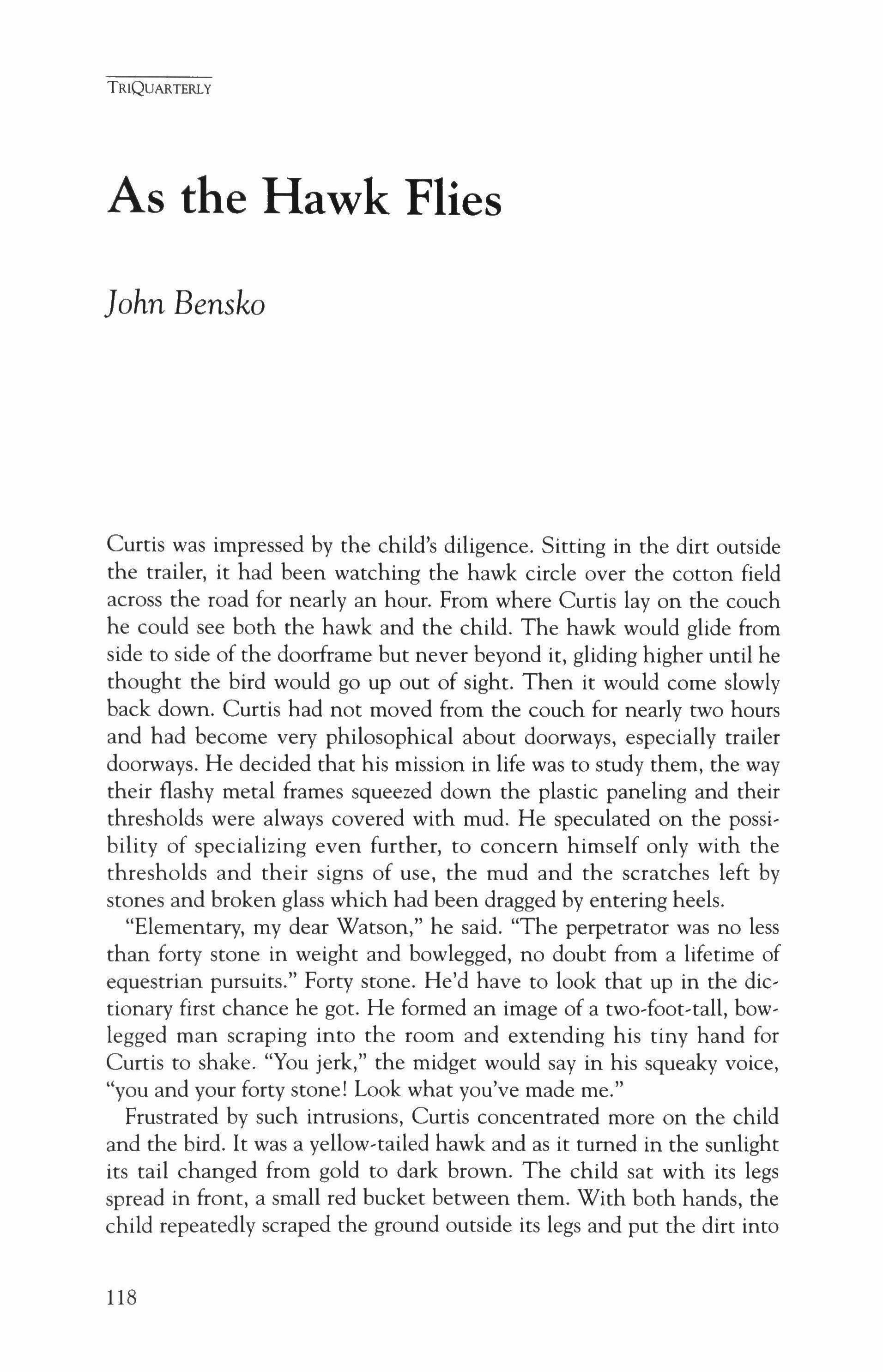
Curtis was impressed by the child's diligence. Sitting in the dirt outside the trailer, it had been watching the hawk circle over the cotton field across the road for nearly an hour. From where Curtis lay on the couch he could see both the hawk and the child. The hawk would glide from side to side of the doorframe but never beyond it, gliding higher until he thought the bird would go up out of sight. Then it would come slowly back down. Curtis had not moved from the couch for nearly two hours and had become very philosophical about doorways, especially trailer doorways. He decided that his mission in life was to study them, the way their flashy metal frames squeezed down the plastic paneling and their thresholds were always covered with mud. He speculated on the possibility of specializing even further, to concern himself only with the thresholds and their signs of use, the mud and the scratches left by stones and broken glass which had been dragged by entering heels.
"Elementary, my dear Watson," he said. "The perpetrator was no less than forty stone in weight and bowlegged, no doubt from a lifetime of equestrian pursuits." Forty stone. He'd have to look that up in the dictionary first chance he got. He formed an image of a two-foot-tall, bowlegged man scraping into the room and extending his tiny hand for Curtis to shake. "You jerk," the midget would say in his squeaky voice, "you and your forty stone! Look what you've made me."
Frustrated by such intrusions, Curtis concentrated more on the child and the bird. It was a yellow-tailed hawk and as it turned in the sunlight its tail changed from gold to dark brown. The child sat with its legs spread in front, a small red bucket between them. With both hands, the child repeatedly scraped the ground outside its legs and put the dirt into
TRIQUARTERLY
118
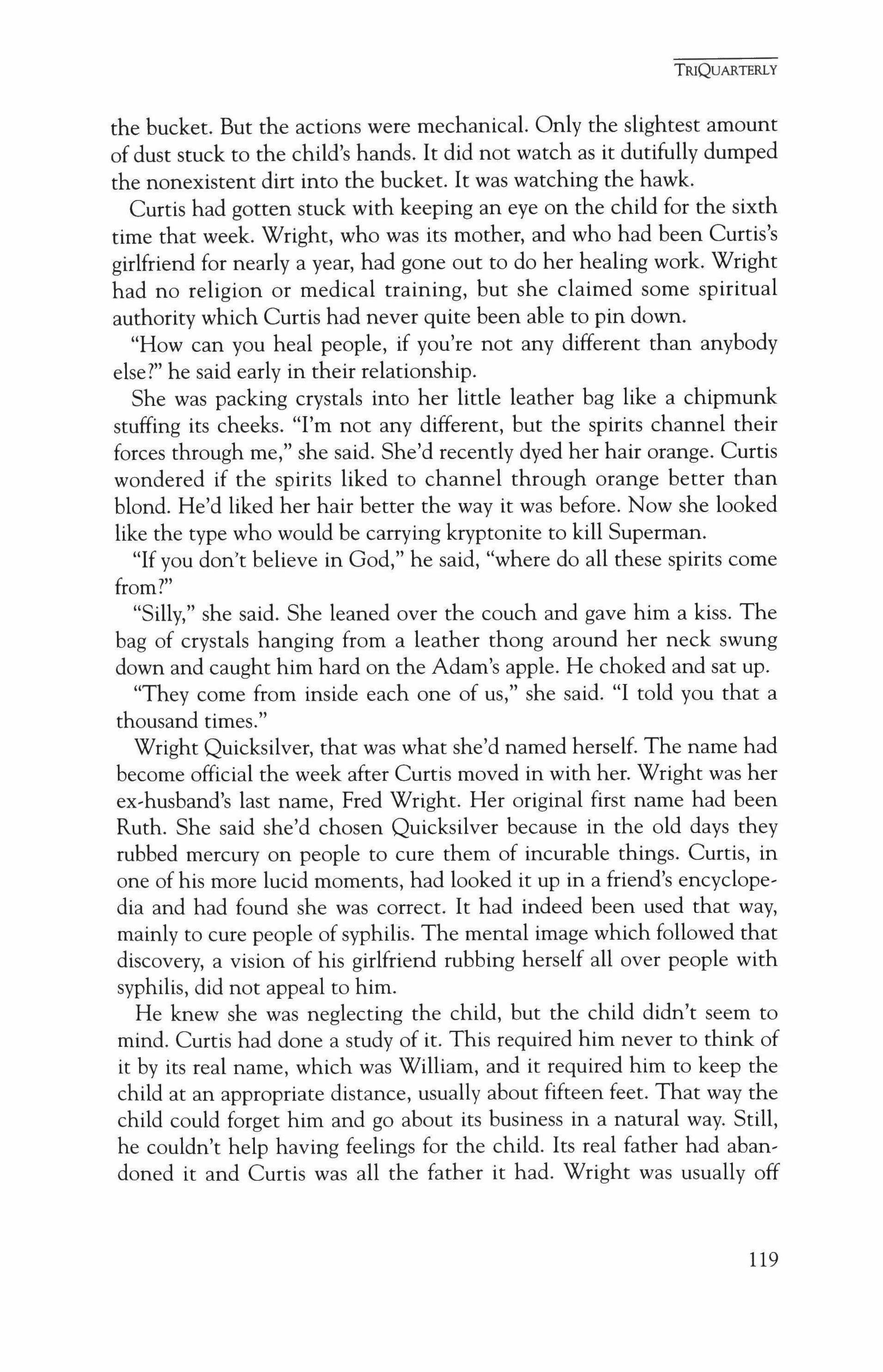
the bucket. But the actions were mechanical. Only the slightest amount of dust stuck to the child's hands. It did not watch as it dutifully dumped the nonexistent dirt into the bucket. It was watching the hawk.
Curtis had gotten stuck with keeping an eye on the child for the sixth time that week. Wright, who was its mother, and who had been Curtis's girlfriend for nearly a year, had gone out to do her healing work. Wright had no religion or medical training, but she claimed some spiritual authority which Curtis had never quite been able to pin down.
"How can you heal people, if you're not any different than anybody else?" he said early in their relationship.
She was packing crystals into her little leather bag like a chipmunk stuffing its cheeks. "I'm not any different, but the spirits channel their forces through me," she said. She'd recently dyed her hair orange. Curtis wondered if the spirits liked to channel through orange better than blond. He'd liked her hair better the way it was before. Now she looked like the type who would be carrying kryptonite to kill Superman.
"If you don't believe in God," he said, "where do all these spirits come from?"
"Silly," she said. She leaned over the couch and gave him a kiss. The bag of crystals hanging from a leather thong around her neck swung down and caught him hard on the Adam's apple. He choked and sat up.
"They come from inside each one of us," she said. "I told you that a thousand times."
Wright Quicksilver, that was what she'd named herself. The name had become official the week after Curtis moved in with her. Wright was her ex-husband's last name, Fred Wright. Her original first name had been Ruth. She said she'd chosen Quicksilver because in the old days they rubbed mercury on people to cure them of incurable things. Curtis, in one of his more lucid moments, had looked it up in a friend's encyclopedia and had found she was correct. It had indeed been used that way, mainly to cure people of syphilis. The mental image which followed that discovery, a vision of his girlfriend rubbing herself all over people with syphilis, did not appeal to him.
He knew she was neglecting the child, but the child didn't seem to mind. Curtis had done a study of it. This required him never to think of it by its real name, which was William, and it required him to keep the child at an appropriate distance, usually about fifteen feet. That way the child could forget him and go about its business in a natural way. Still, he couldn't help having feelings for the child. Its real father had abandoned it and Curtis was all the father it had. Wright was usually off 119
TRIQUARTERLY
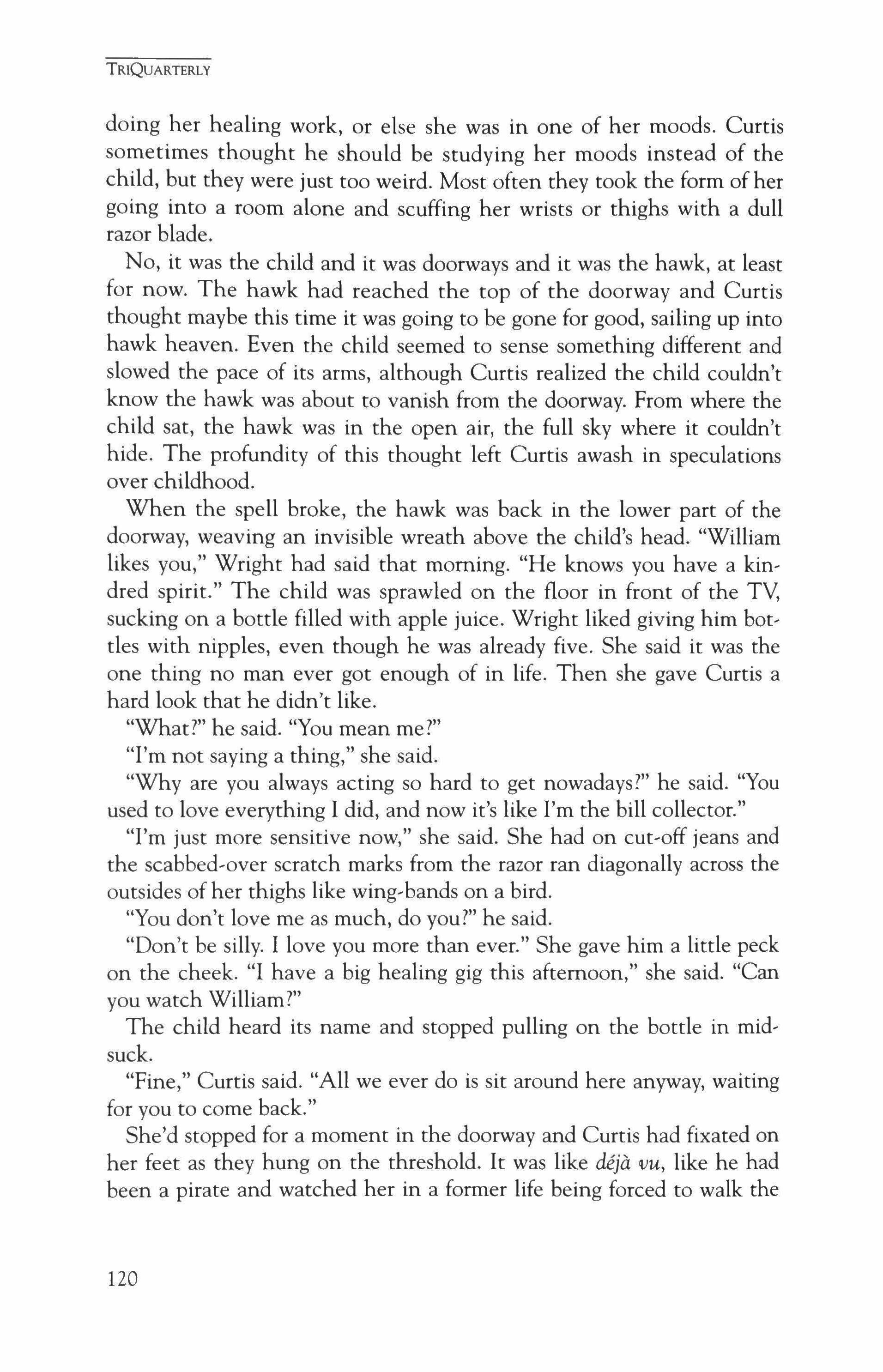
doing her healing work, or else she was in one of her moods. Curtis sometimes thought he should be studying her moods instead of the child, but they were just too weird. Most often they took the form of her going into a room alone and scuffing her wrists or thighs with a dull razor blade.
No, it was the child and it was doorways and it was the hawk, at least for now. The hawk had reached the top of the doorway and Curtis thought maybe this time it was going to be gone for good, sailing up into hawk heaven. Even the child seemed to sense something different and slowed the pace of its arms, although Curtis realized the child couldn't know the hawk was about to vanish from the doorway. From where the child sat, the hawk was in the open air, the full sky where it couldn't hide. The profundity of this thought left Curtis awash in speculations over childhood.
When the spell broke, the hawk was back in the lower part of the doorway, weaving an invisible wreath above the child's head. "William likes you," Wright had said that morning. "He knows you have a kindred spirit." The child was sprawled on the floor in front of the TV, sucking on a bottle filled with apple juice. Wright liked giving him bottles with nipples, even though he was already five. She said it was the one thing no man ever got enough of in life. Then she gave Curtis a hard look that he didn't like.
"What?" he said. "You mean me?"
"I'm not saying a thing," she said.
"Why are you always acting so hard to get nowadays?" he said. "You used to love everything I did, and now it's like I'm the bill collector."
"I'm just more sensitive now," she said. She had on cut-off jeans and the scabbed-over scratch marks from the razor ran diagonally across the outsides of her thighs like wing-bands on a bird.
"You don't love me as much, do you?" he said.
"Don't be silly. I love you more than ever." She gave him a little peck on the cheek. "I have a big healing gig this afternoon," she said. "Can you watch William?"
The child heard its name and stopped pulling on the bottle in midsuck.
"Fine," Curtis said. "All we ever do is sit around here anyway, waiting for you to come back."
She'd stopped for a moment in the doorway and Curtis had fixated on her feet as they hung on the threshold. It was like deja vu, like he had been a pirate and watched her in a former life being forced to walk the
TRIQUARTERLY
120
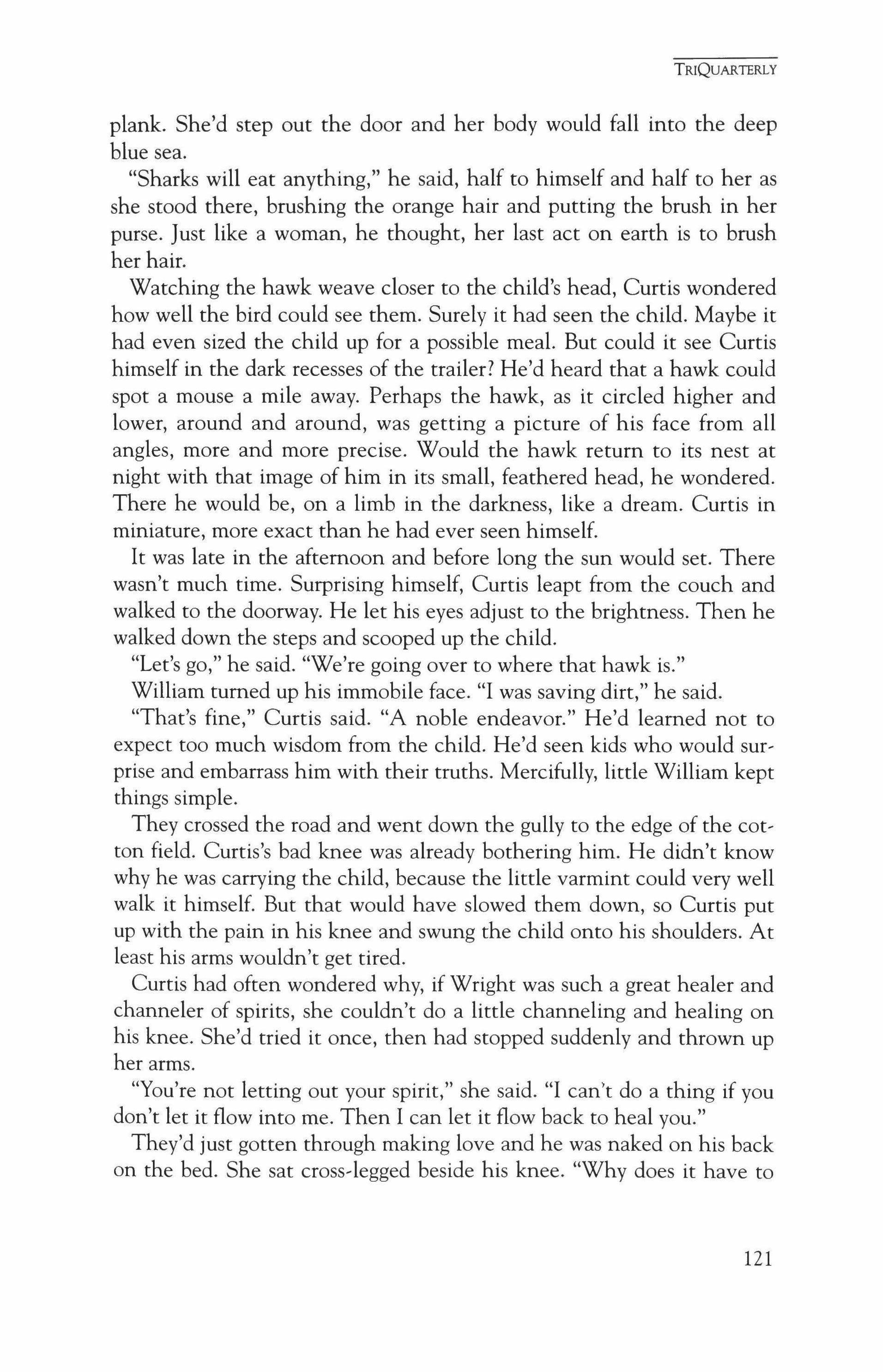
plank. She'd step out the door and her body would fall into the deep blue sea.
"Sharks will eat anything," he said, half to himself and half to her as she stood there, brushing the orange hair and putting the brush in her purse. Just like a woman, he thought, her last act on earth is to brush her hair.
Watching the hawk weave closer to the child's head, Curtis wondered how well the bird could see them. Surely it had seen the child. Maybe it had even sized the child up for a possible meal. But could it see Curtis himself in the dark recesses of the trailer? He'd heard that a hawk could spot a mouse a mile away. Perhaps the hawk, as it circled higher and lower, around and around, was getting a picture of his face from all angles, more and more precise. Would the hawk return to its nest at night with that image of him in its small, feathered head, he wondered. There he would be, on a limb in the darkness, like a dream. Curtis in miniature, more exact than he had ever seen himself.
It was late in the afternoon and before long the sun would set. There wasn't much time. Surprising himself, Curtis leapt from the couch and walked to the doorway. He let his eyes adjust to the brightness. Then he walked down the steps and scooped up the child.
"Let's go," he said. "We're going over to where that hawk is."
William turned up his immobile face. "I was saving dirt," he said.
"That's fine," Curtis said. "A noble endeavor." He'd learned not to expect too much wisdom from the child. He'd seen kids who would surprise and embarrass him with their truths. Mercifully, little William kept things simple.
They crossed the road and went down the gully to the edge of the cotton field. Curtis's bad knee was already bothering him. He didn't know why he was carrying the child, because the little varmint could very well walk it himself. But that would have slowed them down, so Curtis put up with the pain in his knee and swung the child onto his shoulders. At least his arms wouldn't get tired.
Curtis had often wondered why, if Wright was such a great healer and channeler of spirits, she couldn't do a little channeling and healing on his knee. She'd tried it once, then had stopped suddenly and thrown up her arms.
"You're not letting out your spirit," she said. "I can't do a thing if you don't let it flow into me. Then I can let it flow back to heal you."
They'd just gotten through making love and he was naked on his back on the bed. She sat cross-legged beside his knee. "Why does it have to
TRIQUARTERLY
121
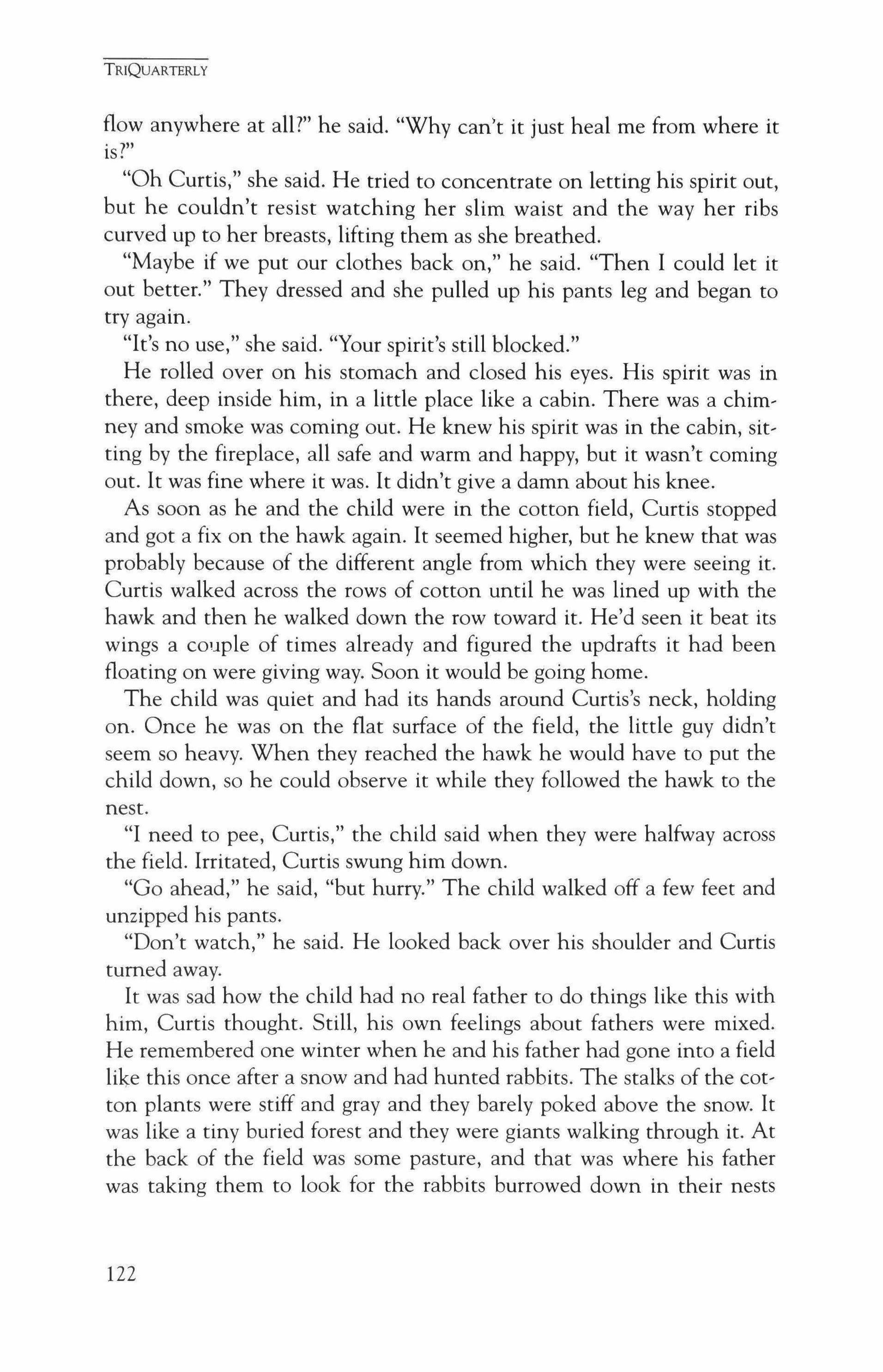
flow anywhere at all?" he said. "Why can't it just heal me from where it is?"
"Oh Curtis," she said. He tried to concentrate on letting his spirit out, but he couldn't resist watching her slim waist and the way her ribs curved up to her breasts, lifting them as she breathed.
"Maybe if we put our clothes back on," he said. "Then I could let it out better." They dressed and she pulled up his pants leg and began to try again.
"It's no use," she said. "Your spirit's still blocked."
He rolled over on his stomach and closed his eyes. His spirit was in there, deep inside him, in a little place like a cabin. There was a chimney and smoke was coming out. He knew his spirit was in the cabin, sitting by the fireplace, all safe and warm and happy, but it wasn't coming out. It was fine where it was. It didn't give a damn about his knee.
As soon as he and the child were in the cotton field, Curtis stopped and got a fix on the hawk again. It seemed higher, but he knew that was probably because of the different angle from which they were seeing it. Curtis walked across the rows of cotton until he was lined up with the hawk and then he walked down the row toward it. He'd seen it beat its wings a couple of times already and figured the updrafts it had been floating on were giving way. Soon it would be going home.
The child was quiet and had its hands around Curtis's neck, holding on. Once he was on the flat surface of the field, the little guy didn't seem so heavy. When they reached the hawk he would have to put the child down, so he could observe it while they followed the hawk to the nest.
"I need to pee, Curtis," the child said when they were halfway across the field. Irritated, Curtis swung him down.
"Go ahead," he said, "but hurry." The child walked off a few feet and unzipped his pants.
"Don't watch," he said. He looked back over his shoulder and Curtis turned away.
It was sad how the child had no real father to do things like this with him, Curtis thought. Still, his own feelings about fathers were mixed. He remembered one winter when he and his father had gone into a field like this once after a snow and had hunted rabbits. The stalks of the cotton plants were stiff and gray and they barely poked above the snow. It was like a tiny buried forest and they were giants walking through it. At the back of the field was some pasture, and that was where his father was taking them to look for the rabbits burrowed down in their nests
TRIQUARTERLY
122
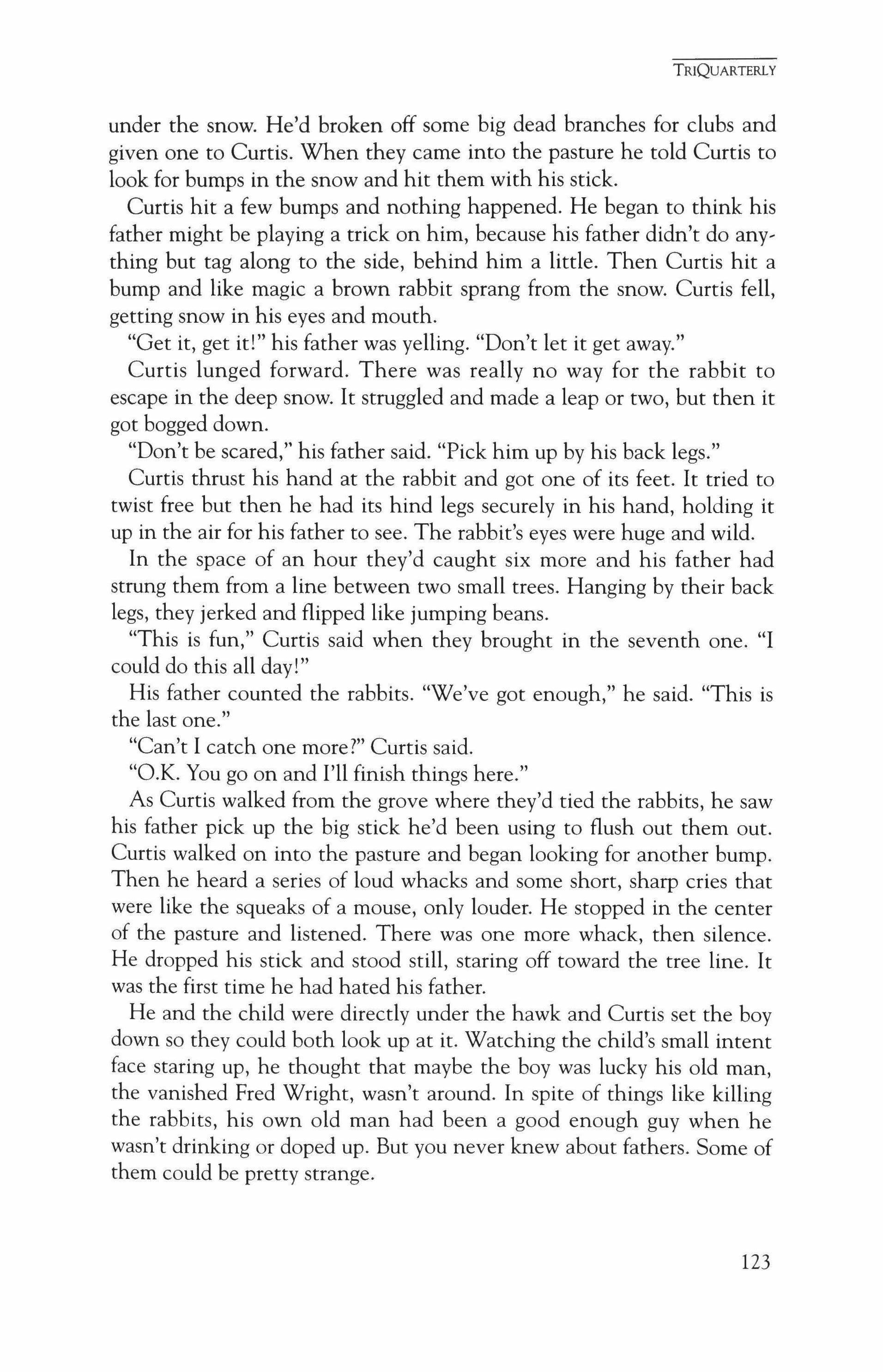
under the snow. He'd broken off some big dead branches for clubs and given one to Curtis. When they came into the pasture he told Curtis to look for bumps in the snow and hit them with his stick.
Curtis hit a few bumps and nothing happened. He began to think his father might be playing a trick on him, because his father didn't do anything but tag along to the side, behind him a little. Then Curtis hit a bump and like magic a brown rabbit sprang from the snow. Curtis fell, getting snow in his eyes and mouth.
"Get it, get it!" his father was yelling. "Don't let it get away."
Curtis lunged forward. There was really no way for the rabbit to escape in the deep snow. It struggled and made a leap or two, but then it got bogged down.
"Don't be scared," his father said. "Pick him up by his back legs."
Curtis thrust his hand at the rabbit and got one of its feet. It tried to twist free but then he had its hind legs securely in his hand, holding it up in the air for his father to see. The rabbit's eyes were huge and wild.
In the space of an hour they'd caught six more and his father had strung them from a line between two small trees. Hanging by their back legs, they jerked and flipped like jumping beans.
'This is fun," Curtis said when they brought in the seventh one. "I could do this all day!"
His father counted the rabbits. "We've got enough," he said. "This is the last one."
"Can't I catch one more?" Curtis said.
"O.K. You go on and I'll finish things here."
As Curtis walked from the grove where they'd tied the rabbits, he saw his father pick up the big stick he'd been using to flush out them out. Curtis walked on into the pasture and began looking for another bump. Then he heard a series of loud whacks and some short, sharp cries that were like the squeaks of a mouse, only louder. He stopped in the center of the pasture and listened. There was one more whack, then silence. He dropped his stick and stood still, staring off toward the tree line. It was the first time he had hated his father.
He and the child were directly under the hawk and Curtis set the boy down so they could both look up at it. Watching the child's small intent face staring up, he thought that maybe the boy was lucky his old man, the vanished Fred Wright, wasn't around. In spite of things like killing the rabbits, his own old man had been a good enough guy when he wasn't drinking or doped up. But you never knew about fathers. Some of them could be pretty strange.
TRIQUARTERLY
123

From directly below the hawk, watching it made Curtis dizzy. He was glad when it finally flapped its wings and glided off toward the swamp. He grabbed the child's arm and they ran across the field. Luckily a narrow dirt road ran from the back of the field through the swamp a few miles to the fields on the other side. Most of the trees in the swamp were dead, or they were cypresses whose sparse foliage didn't interfere with his seeing the hawk. For once, Curtis felt, luck was running his way.
"Isn't this great?" he yelled to the child. "We're going to follow it right to its nest."
"What for?" the child said. "We can see it tomorrow."
Curtis was dumbfounded. "Well, yes," he said, "but don't you want to see where it lives?"
"I know where it lives," the child said. "It lives in the swamp."
Curtis looked down at the child, whose short legs were pumping so fast they were blurs. "Use your imagination," he said. "What will its nest be like? What's the tree like where it lives? It gets to see your house every day. Don't you want to see its house?"
"It hasn't seen my room," the child answered. He stared up at Curtis with a look full of conviction.
The hawk had come lower and was just over the tops of the trees ahead of them and off to the right. It swooped up for a second, then dropped into the top of the biggest tree.
"That's it," Curtis said. "We're almost there."
"I'm hungry," the child said.
The summer had been dry and the swamp was like a cross between a marsh and a mud flat. Old limbs which would have been covered by water in the wet season lay across the mud like brown veins that had been pulled loose. Curtis and the child had trouble walking on the slippery mud, but when one would slip the other would help him to keep his balance, and soon they were beneath the hawk's tree. It was a big pin oak, on higher ground than the rest of the swamp, with grass beneath it.
"Just like a picnic," Curtis said as he sat down, pulling the child with him. They leaned their backs against the tree. The swamp seemed to center itself around them-as if the hawk, from way up high, had looked down and measured it, Curtis thought.
"You got to have food for a picnic," the child said.
"Don't get smart," Curtis replied. "My daddy always said that smart guys finish last." Curtis was suddenly embarrassed. He remembered that his father had said this in relation to making love to a woman.
"My daddy was mean," the child said. "My momma said not to do anything he did."
TRIQUARTERLY
124
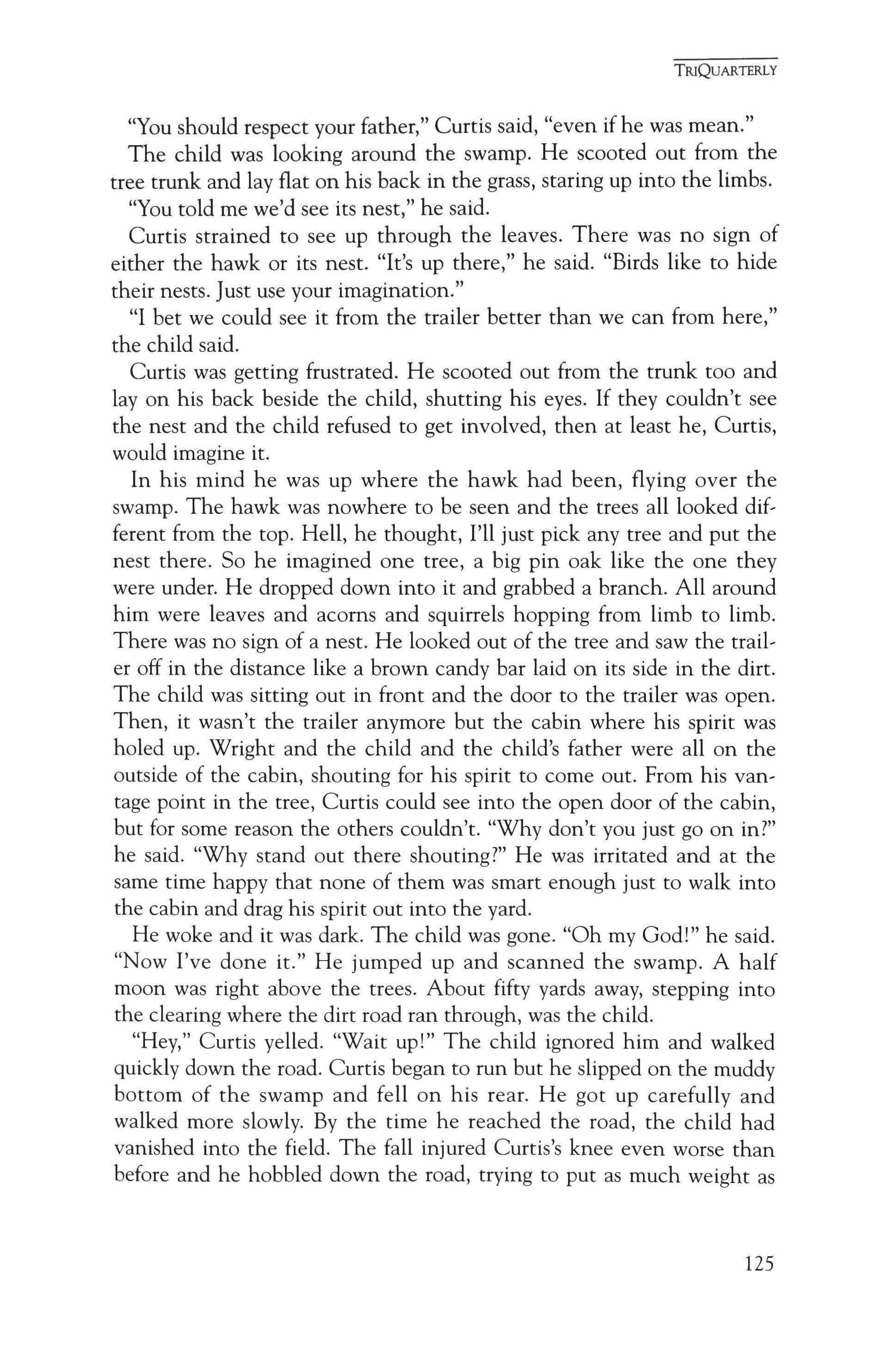
"You should respect your father," Curtis said, "even if he was mean."
The child was looking around the swamp. He scooted out from the tree trunk and lay flat on his back in the grass, staring up into the limbs.
"You told me we'd see its nest," he said.
Curtis strained to see up through the leaves. There was no sign of either the hawk or its nest. "It's up there," he said. "Birds like to hide their nests. Just use your imagination."
"I bet we could see it from the trailer better than we can from here," the child said.
Curtis was getting frustrated. He scooted out from the trunk too and lay on his back beside the child, shutting his eyes. If they couldn't see the nest and the child refused to get involved, then at least he, Curtis, would imagine it.
In his mind he was up where the hawk had been, flying over the swamp. The hawk was nowhere to be seen and the trees all looked different from the top. Hell, he thought, I'll just pick any tree and put the nest there. So he imagined one tree, a big pin oak like the one they were under. He dropped down into it and grabbed a branch. All around him were leaves and acorns and squirrels hopping from limb to limb. There was no sign of a nest. He looked out of the tree and saw the trailer off in the distance like a brown candy bar laid on its side in the dirt. The child was sitting out in front and the door to the trailer was open. Then, it wasn't the trailer anymore but the cabin where his spirit was holed up. Wright and the child and the child's father were all on the outside of the cabin, shouting for his spirit to come out. From his vantage point in the tree, Curtis could see into the open door of the cabin, but for some reason the others couldn't. "Why don't you just go on in?" he said. "Why stand out there shouting?" He was irritated and at the same time happy that none of them was smart enough just to walk into the cabin and drag his spirit out into the yard.
He woke and it was dark. The child was gone. "Oh my God!" he said. "Now I've done it." He jumped up and scanned the swamp. A half moon was right above the trees. About fifty yards away, stepping into the clearing where the dirt road ran through, was the child.
"Hey," Curtis yelled. "Wait up!" The child ignored him and walked quickly down the road. Curtis began to run but he slipped on the muddy bottom of the swamp and fell on his rear. He got up carefully and walked more slowly. By the time he reached the road, the child had vanished into the field. The fall injured Curtis's knee even worse than before and he hobbled down the road, trying to put as much weight as
TruQUARTERLY
125
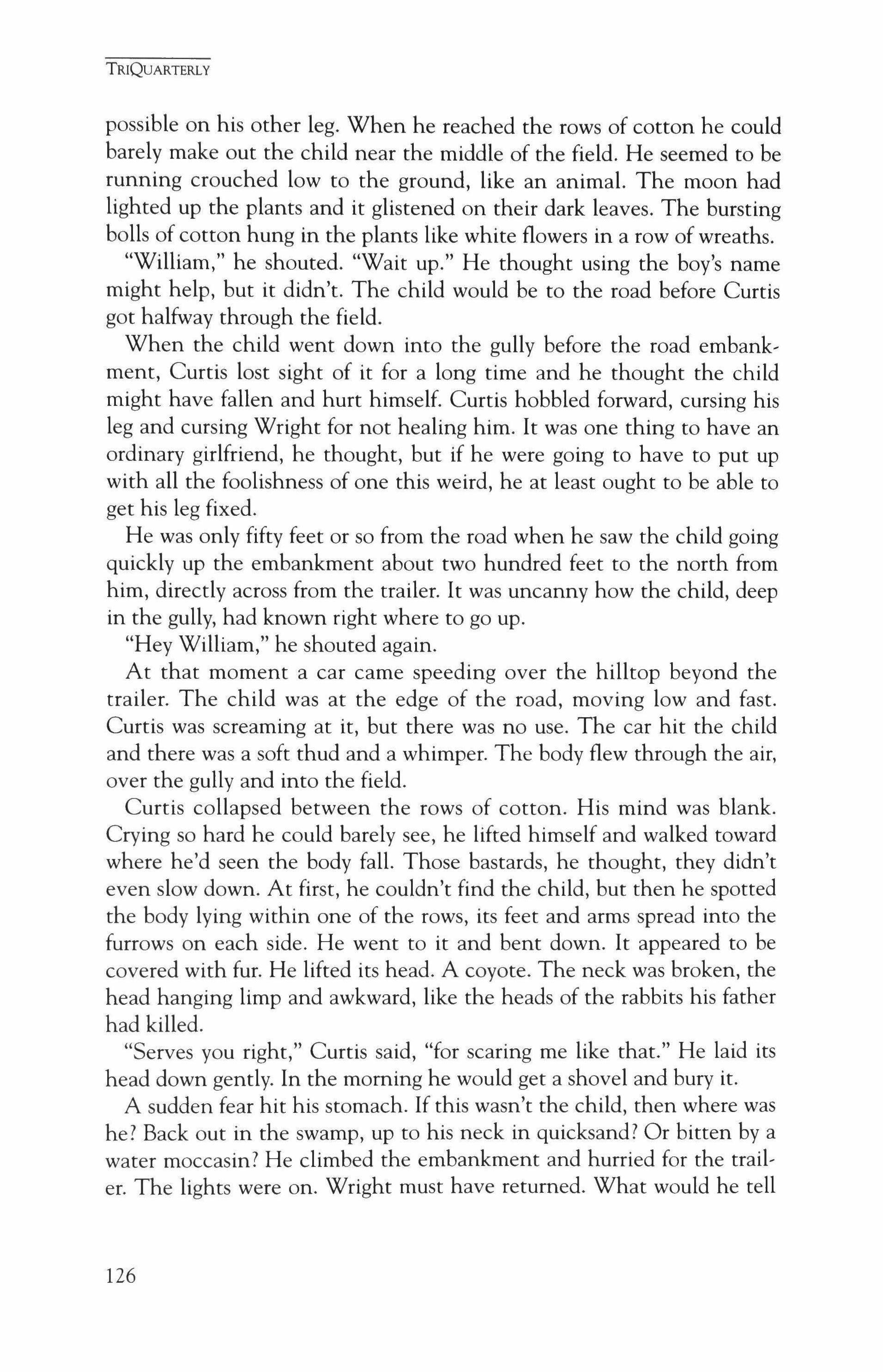
possible on his other leg. When he reached the rows of cotton he could barely make out the child near the middle of the field. He seemed to be running crouched low to the ground, like an animal. The moon had lighted up the plants and it glistened on their dark leaves. The bursting bolls of cotton hung in the plants like white flowers in a row of wreaths.
"William," he shouted. "Wait up." He thought using the boy's name might help, but it didn't. The child would be to the road before Curtis got halfway through the field.
When the child went down into the gully before the road embankment, Curtis lost sight of it for a long time and he thought the child might have fallen and hurt himself. Curtis hobbled forward, cursing his leg and cursing Wright for not healing him. It was one thing to have an ordinary girlfriend, he thought, but if he were going to have to put up with all the foolishness of one this weird, he at least ought to be able to get his leg fixed.
He was only fifty feet or so from the road when he saw the child going quickly up the embankment about two hundred feet to the north from him, directly across from the trailer. It was uncanny how the child, deep in the gully, had known right where to go up.
"Hey William," he shouted again.
At that moment a car came speeding over the hilltop beyond the trailer. The child was at the edge of the road, moving low and fast. Curtis was screaming at it, but there was no use. The car hit the child and there was a soft thud and a whimper. The body flew through the air, over the gully and into the field.
Curtis collapsed between the rows of cotton. His mind was blank. Crying so hard he could barely see, he lifted himself and walked toward where he'd seen the body fall. Those bastards, he thought, they didn't even slow down. At first, he couldn't find the child, but then he spotted the body lying within one of the rows, its feet and arms spread into the furrows on each side. He went to it and bent down. It appeared to be covered with fur. He lifted its head. A coyote. The neck was broken, the head hanging limp and awkward, like the heads of the rabbits his father had killed.
"Serves you right," Curtis said, "for scaring me like that." He laid its head down gently. In the morning he would get a shovel and bury it.
A sudden fear hit his stomach. If this wasn't the child, then where was he? Back out in the swamp, up to his neck in quicksand? Or bitten by a water moccasin? He climbed the embankment and hurried for the trailer. The lights were on. Wright must have returned. What would he tell
TRIQUARTERLY
126
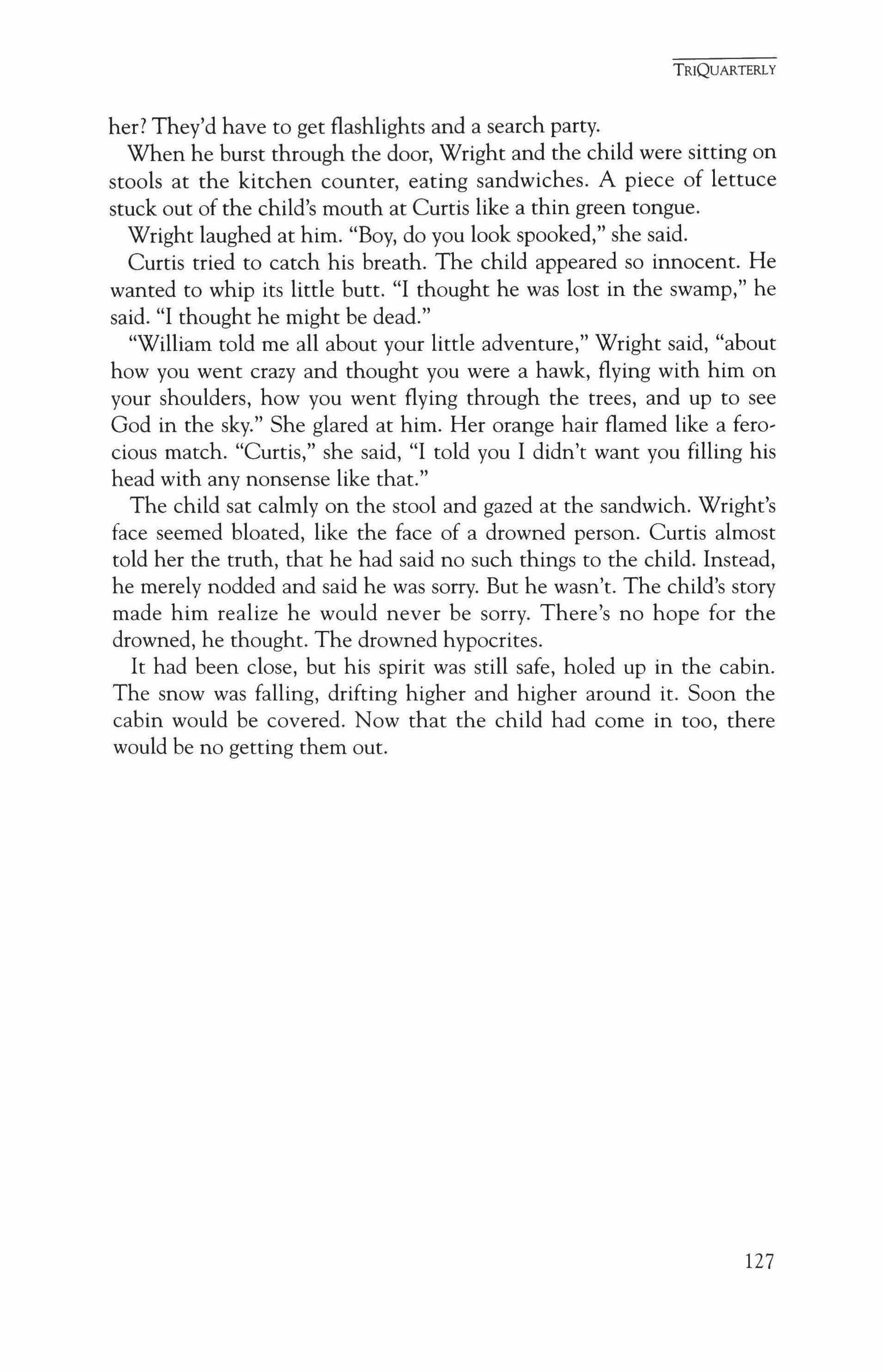
her? They'd have to get flashlights and a search party. When he burst through the door, Wright and the child were sitting on stools at the kitchen counter, eating sandwiches. A piece of lettuce stuck out of the child's mouth at Curtis like a thin green tongue. Wright laughed at him. "Boy, do you look spooked," she said. Curtis tried to catch his breath. The child appeared so innocent. He wanted to whip its little butt. "I thought he was lost in the swamp," he said. "I thought he might be dead."
"William told me all about your little adventure," Wright said, "about how you went crazy and thought you were a hawk, flying with him on your shoulders, how you went flying through the trees, and up to see God in the sky." She glared at him. Her orange hair flamed like a ferocious match. "Curtis," she said, "I told you I didn't want you filling his head with any nonsense like that."
The child sat calmly on the stool and gazed at the sandwich. Wright's face seemed bloated, like the face of a drowned person. Curtis almost told her the truth, that he had said no such things to the child. Instead, he merely nodded and said he was sorry. But he wasn't. The child's story made him realize he would never be sorry. There's no hope for the drowned, he thought. The drowned hypocrites.
It had been close, but his spirit was still safe, holed up in the cabin. The snow was falling, drifting higher and higher around it. Soon the cabin would be covered. Now that the child had corne in too, there would be no getting them out.
TRIQUARTERLY
127
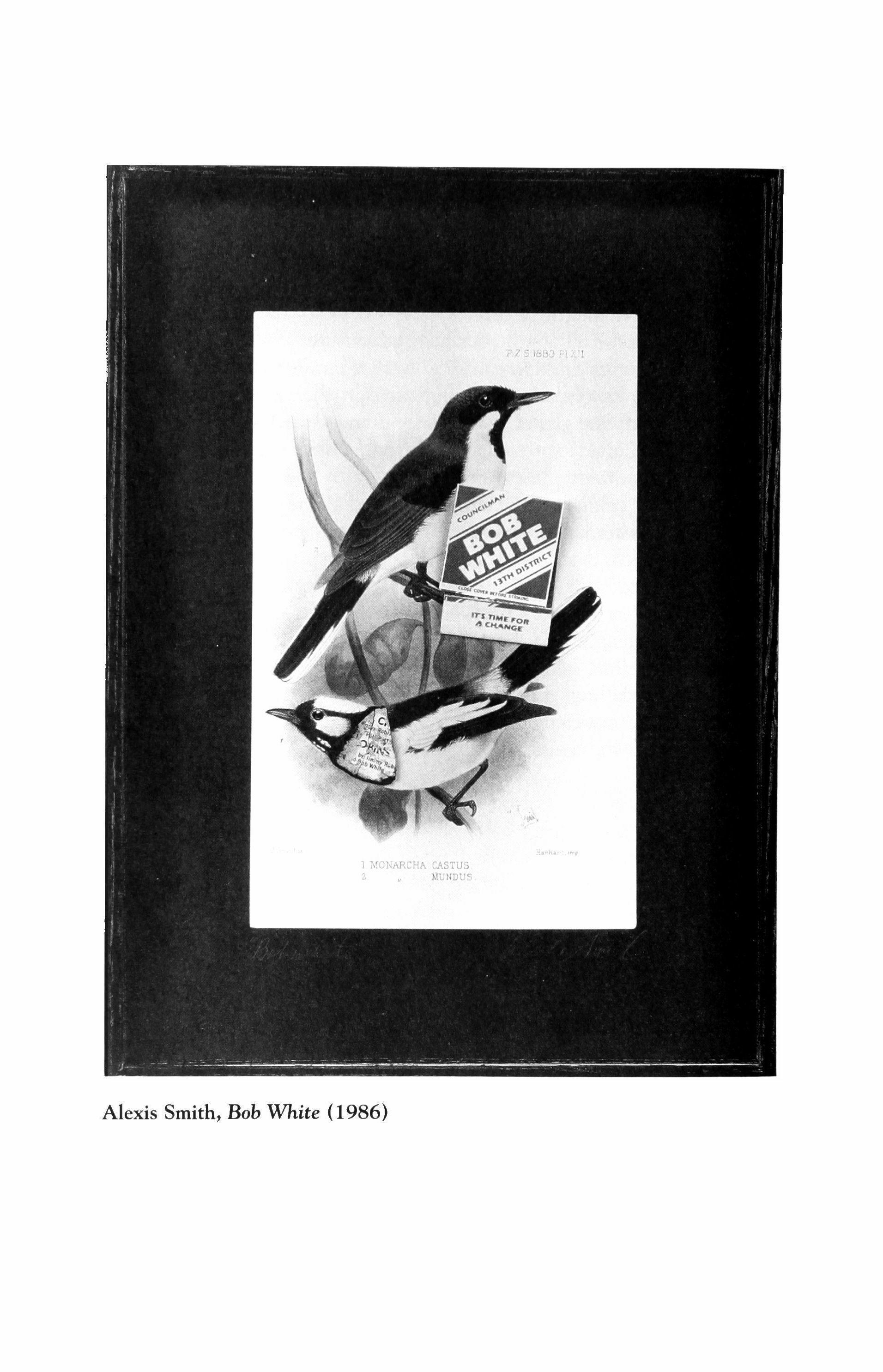 1
;\�OhJ\RCHf\ CASTUS MCHDUS
Alexis Smith, Bob White (1986)
1
;\�OhJ\RCHf\ CASTUS MCHDUS
Alexis Smith, Bob White (1986)
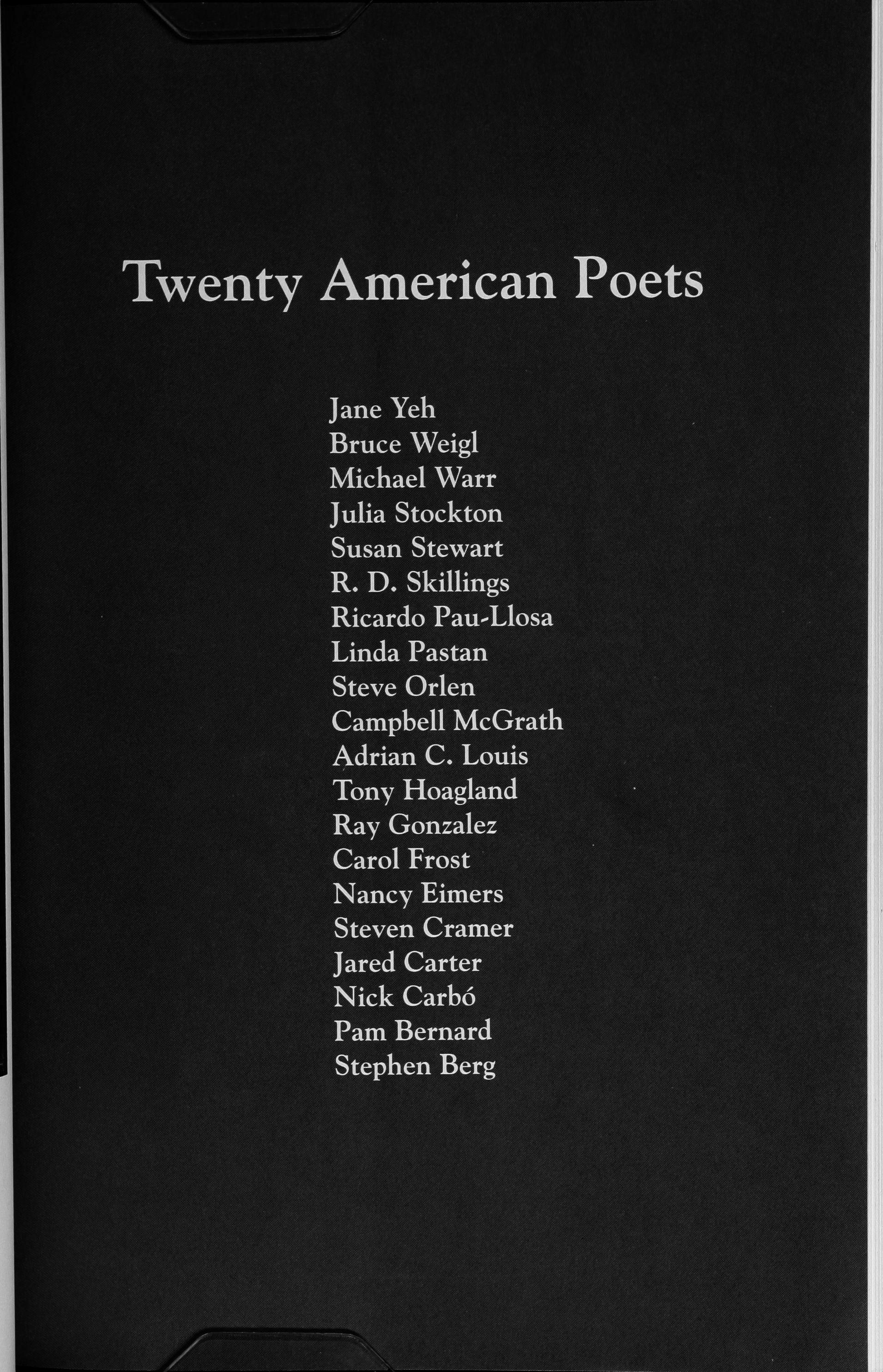
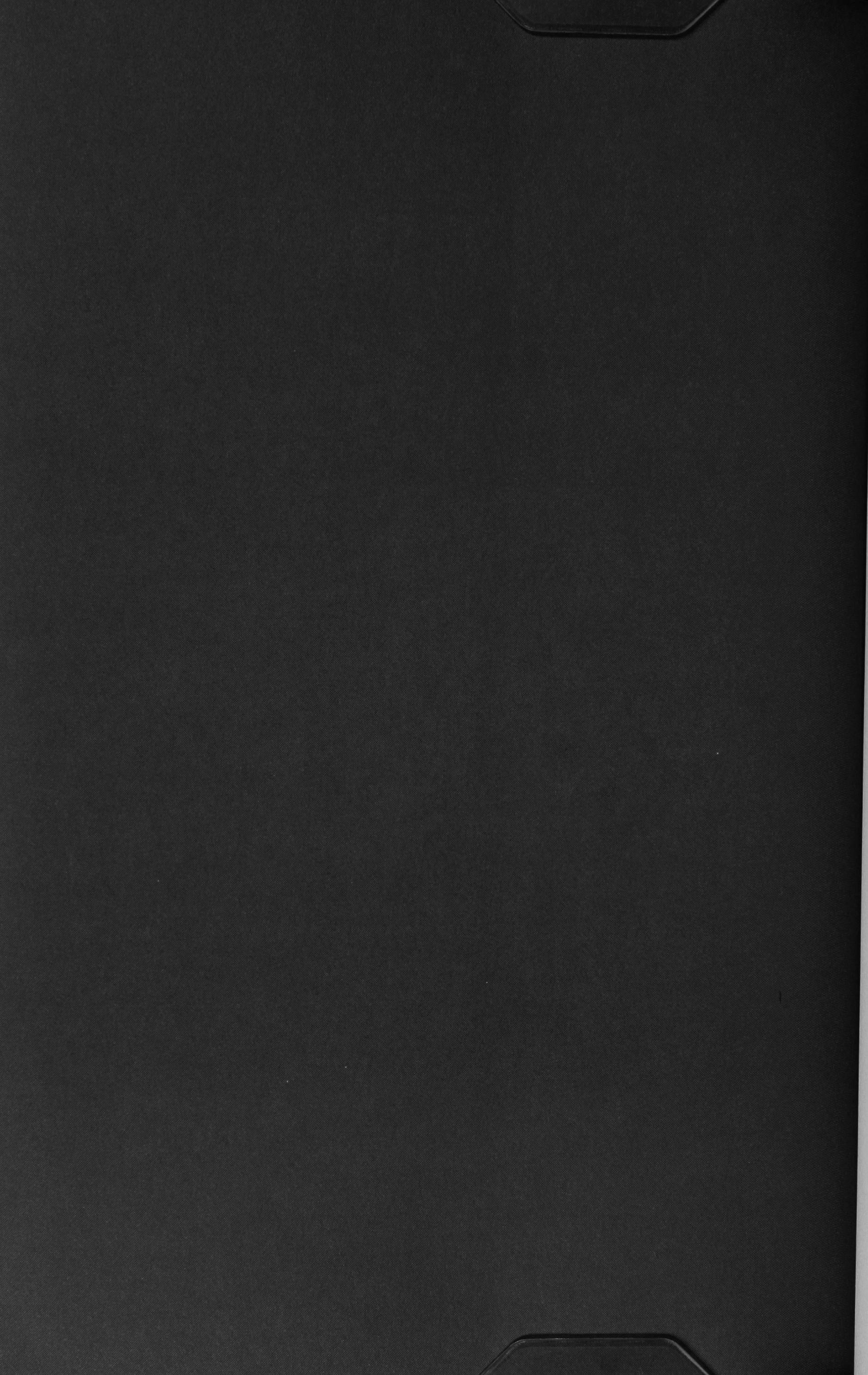
Two Poems
Jane Yeh
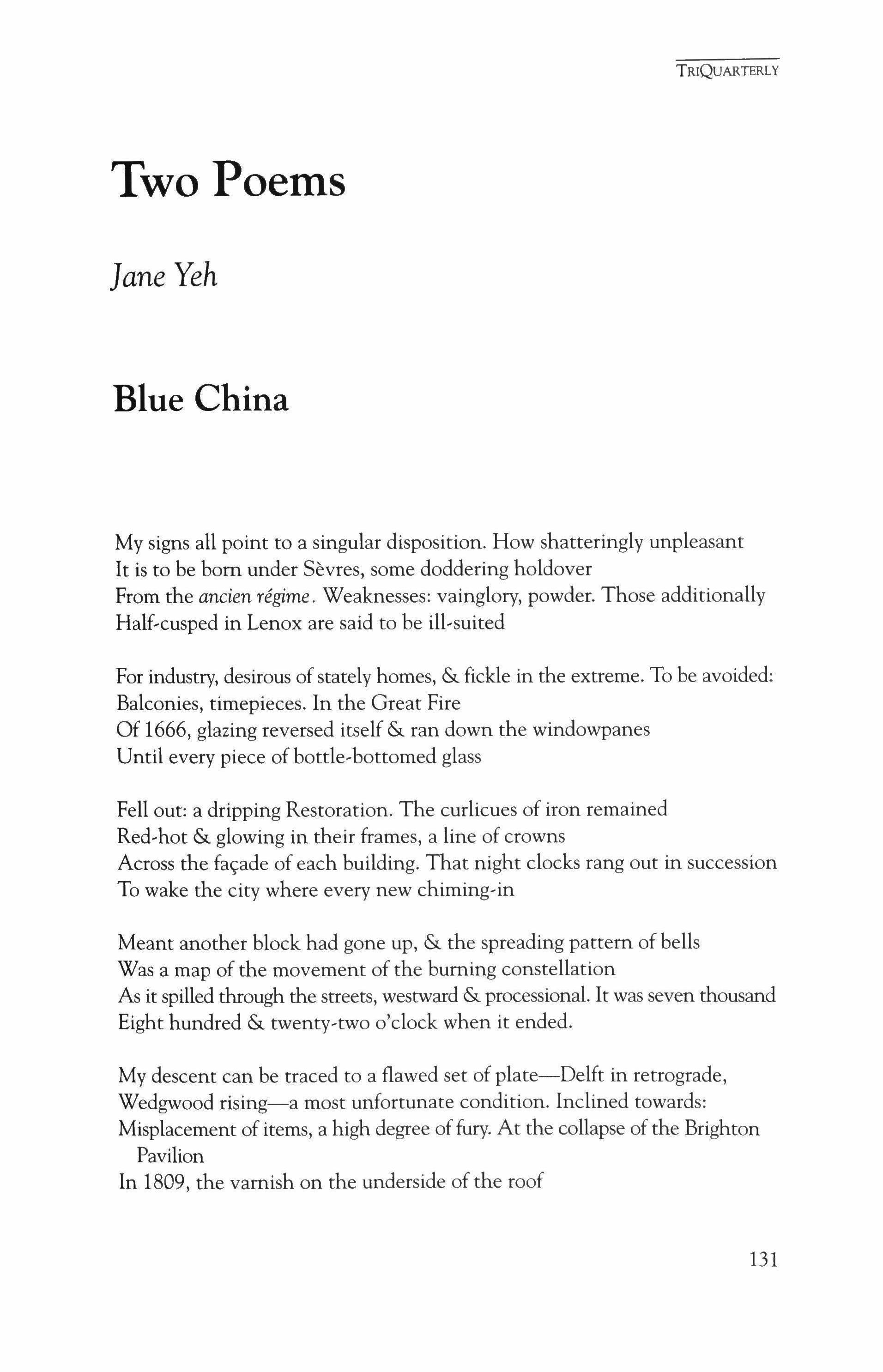
Blue China
My signs all point to a singular disposition. How shatteringly unpleasant It is to be born under Sevres, some doddering holdover
From the ancien regime. Weaknesses: vainglory, powder. Those additionally Half-cusped in Lenox are said to be ill-suited
For industry, desirous of stately homes, & fickle in the extreme. To be avoided: Balconies, timepieces. In the Great Fire
Of 1666, glazing reversed itself & ran down the windowpanes
Until every piece of bottle-bottomed glass
Fell out: a dripping Restoration. The curlicues of iron remained Red-hot & glowing in their frames, a line of crowns
Across the facade of each building. That night clocks rang out in succession
To wake the city where every new chiming-in
Meant another block had gone up, & the spreading pattern of bells
Was a map of the movement of the burning constellation
As it spilled through the streets, westward & processional. It was seven thousand Eight hundred & twenty-two o'clock when it ended.
My descent can be traced to a flawed set of plate-Delft in retrograde, Wedgwood rising-a most unfortunate condition. Inclined towards: Misplacement of items, a high degree offury. At the collapse of the Brighton Pavilion
In 1809, the varnish on the underside of the roof
TRIQUARTERLY
131
TRIQUARTERLY
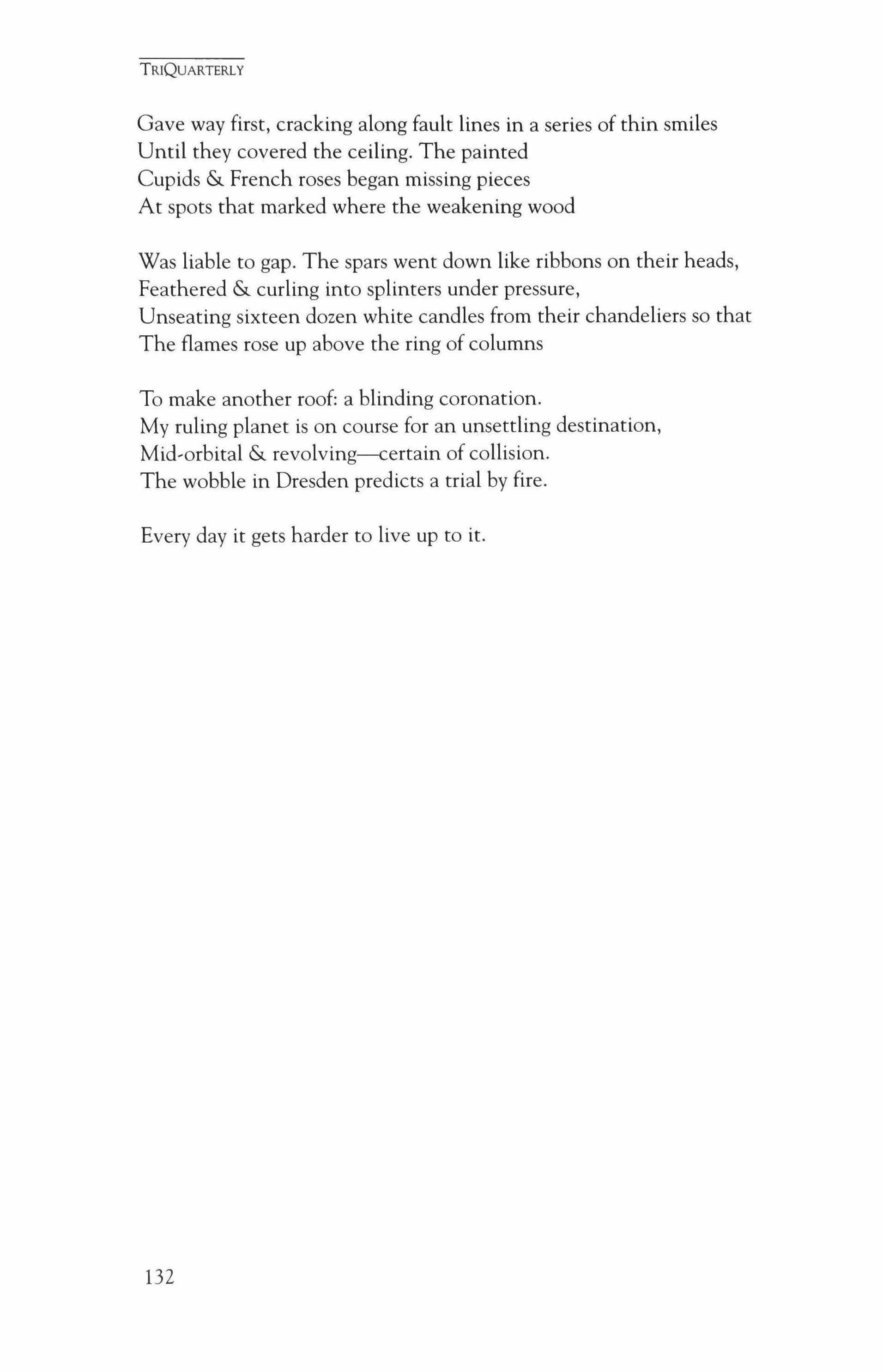
Gave way first, cracking along fault lines in a series of thin smiles Until they covered the ceiling. The painted Cupids & French roses began missing pieces At spots that marked where the weakening wood
Was liable to gap. The spars went down like ribbons on their heads, Feathered & curling into splinters under pressure, Unseating sixteen dozen white candles from their chandeliers so that The flames rose up above the ring of columns
To make another roof: a blinding coronation. My ruling planet is on course for an unsettling destination, Mid-orbital & revolving-certain of collision. The wobble in Dresden predicts a trial by fire.
Every day it gets harder to live up to it.
132
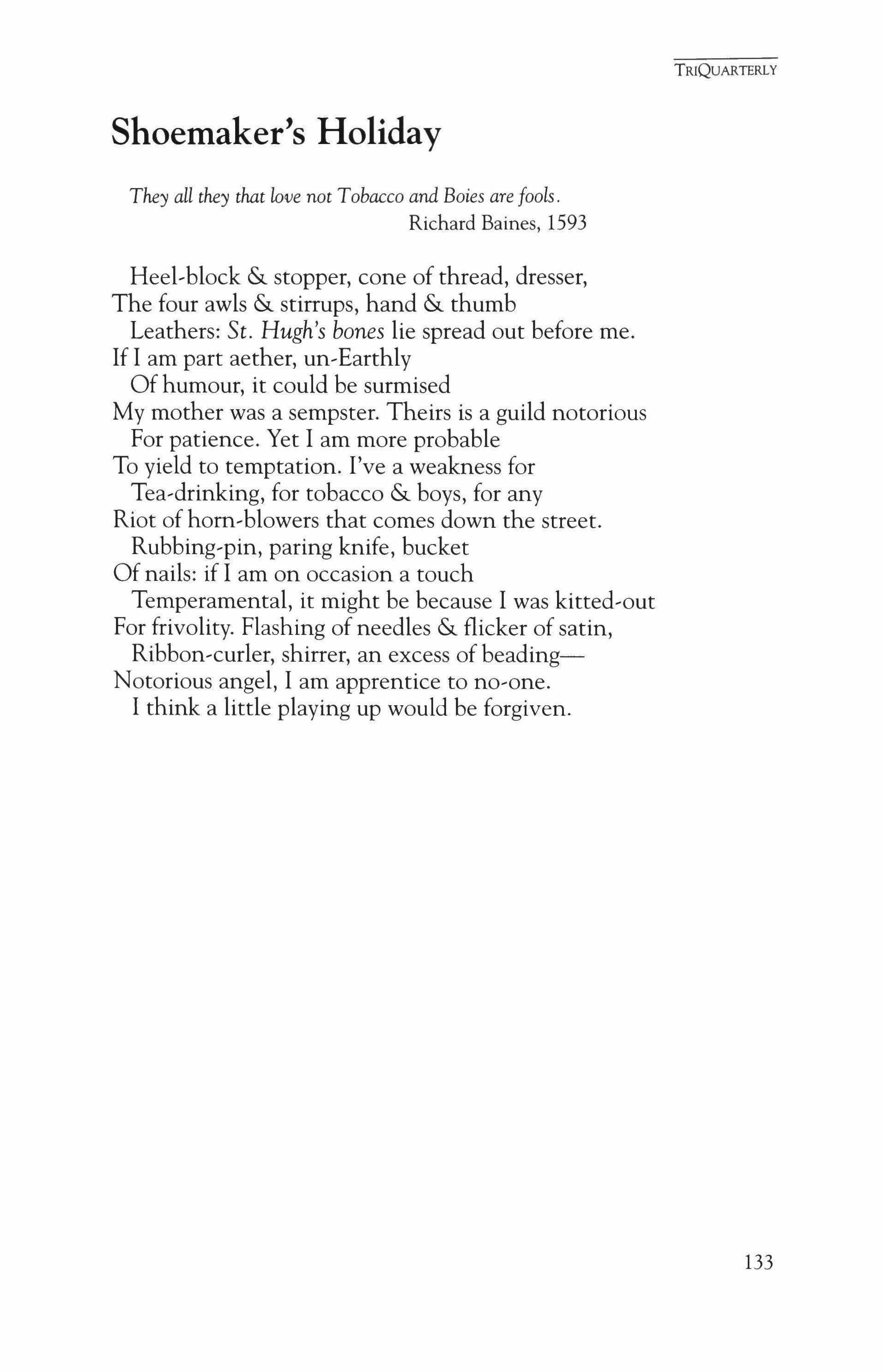
Shoemaker's Holiday
They all they that love not Tobacco and Boies are fools Richard Baines, 1593
Heel-block & stopper, cone of thread, dresser, The four awls & stirrups, hand & thumb
Leathers: St. Hugh's bones lie spread out before me. If I am part aether, un-Earthly
Of humour, it could be surmised
My mother was a sempster. Theirs is a guild notorious For patience. Yet I am more probable To yield to temptation. I've a weakness for Tea-drinking, for tobacco & boys, for any Riot of horn,blowers that comes down the street.
Rubbing-pin, paring knife, bucket
Of nails: if I am on occasion a touch
Temperamental, it might be because I was kitted-out For frivolity. Flashing of needles & flicker of satin, Ribbon-curler, shirrer, an excess of beadingNotorious angel, I am apprentice to no-one. I think a little playing up would be forgiven.
TRIQUARTERLY 133
Five Poems
Bruce Weigl
My Early Training
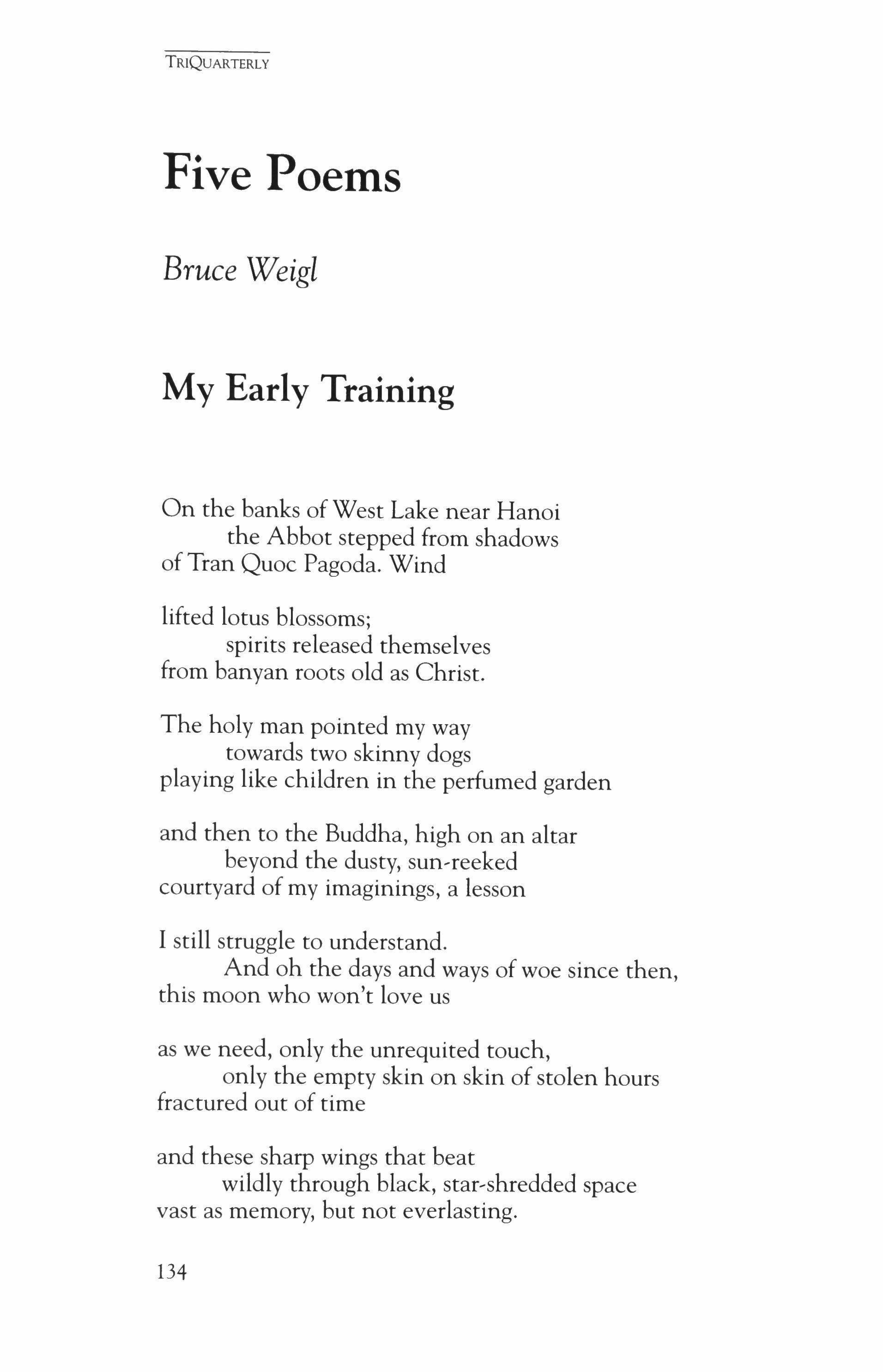
On the banks of West Lake near Hanoi the Abbot stepped from shadows of Tran Quoc Pagoda. Wind lifted lotus blossoms; spirits released themselves from banyan roots old as Christ.
The holy man pointed my way towards two skinny dogs playing like children in the perfumed garden and then to the Buddha, high on an altar beyond the dusty, sun,reeked courtyard of my imaginings, a lesson I still struggle to understand.
And oh the days and ways of woe since then, this moon who won't love us
as we need, only the unrequited touch, only the empty skin on skin of stolen hours fractured out of time and these sharp wings that beat wildly through black, star,shredded space vast as memory, but not everlasting.
TRIQUARTERLY
134
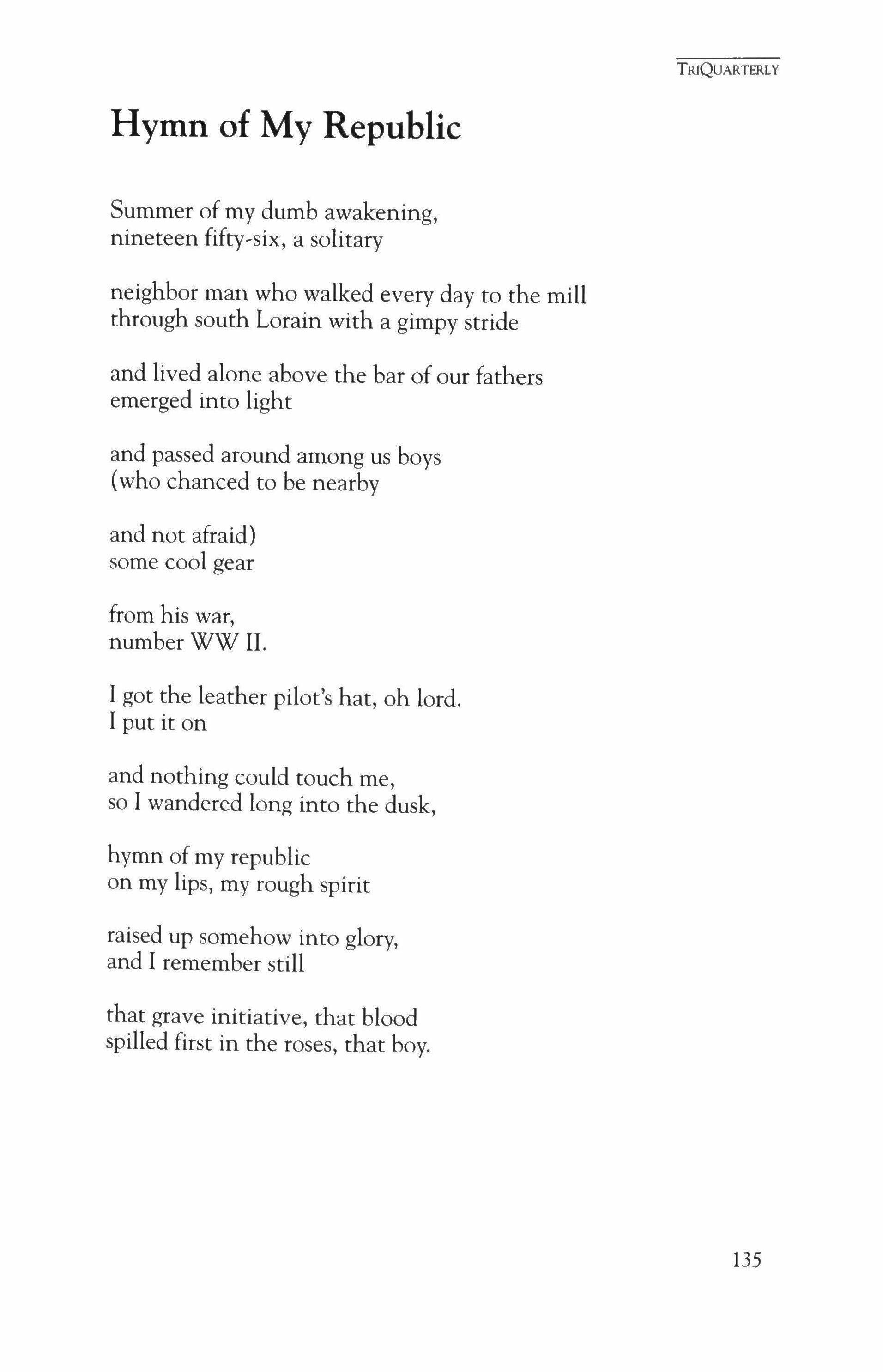
Hymn of My Republic
Summer of my dumb awakening, nineteen fifty-six, a solitary
neighbor man who walked every day to the mill through south Lorain with a gimpy stride and lived alone above the bar of our fathers emerged into light and passed around among us boys (who chanced to be nearby and not afraid) some cool gear from his war, number WW II.
I got the leather pilot's hat, oh lord. I put it on and nothing could touch me, so I wandered long into the dusk, hymn of my republic on my lips, my rough spirit raised up somehow into glory, and I remember still that grave initiative, that blood spilled first in the roses, that boy.
TRIQUARTERLY 135

Seeking the Redwing
Seeking the redwing on the lonely river
no fish rising no hatch on the wing
yet so much wide and willing light invades this river
you may be blessed, waist deep in the quick cold
may connect you to a dream or a prayer
(some have been taken clean away)
Seeking the redwing inside the brain
where the you assembled stitch by stitch
with the precious family grief (the ordinary grief)
yearns to be water cut through the limestone way.
TRIQUARTERLY
136
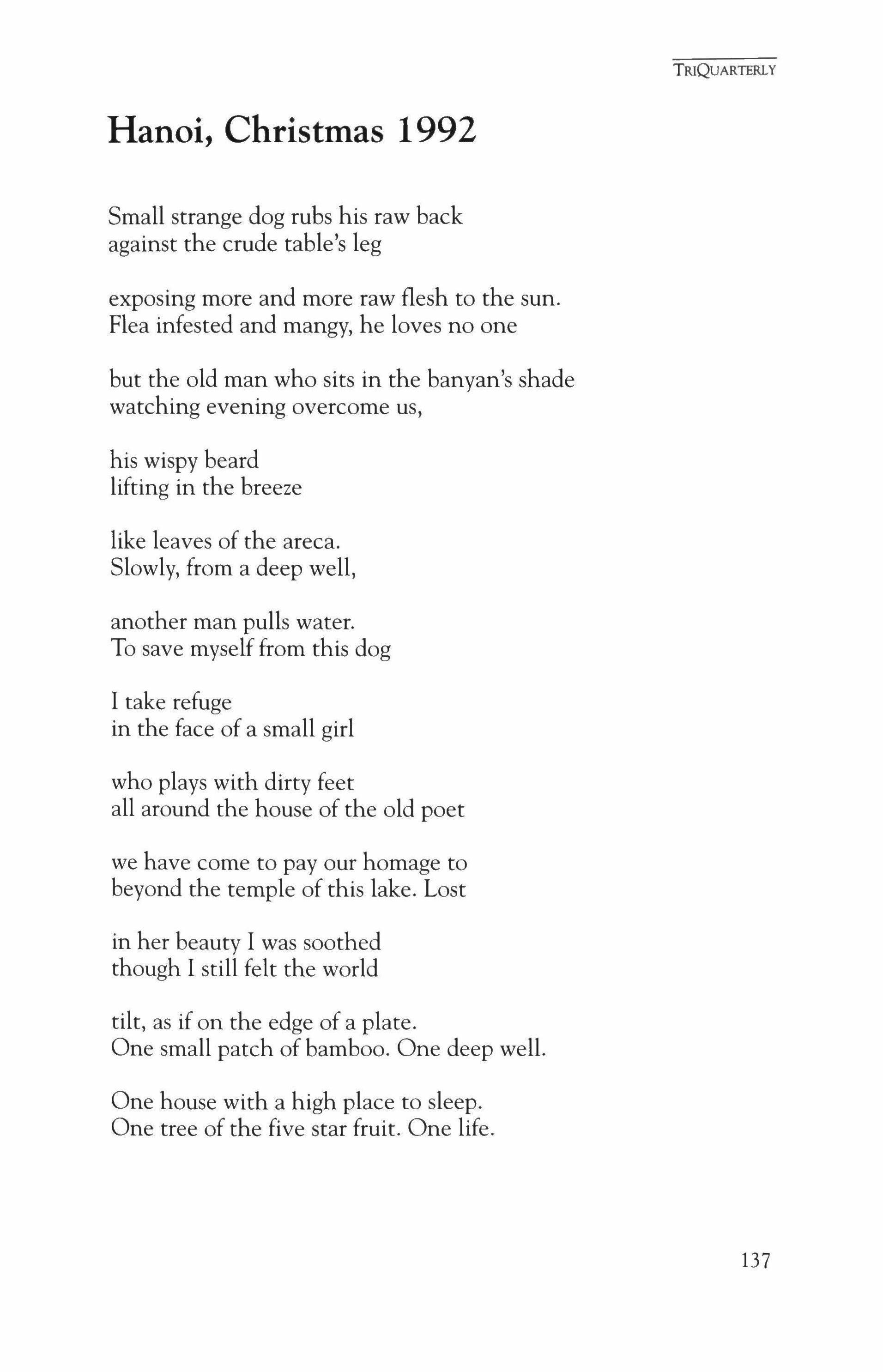
Hanoi, Christmas 1992
Small strange dog rubs his raw back against the crude table's leg
exposing more and more raw flesh to the sun. Flea infested and mangy, he loves no one
but the old man who sits in the banyan's shade watching evening overcome us, his wispy beard lifting in the breeze like leaves of the areca. Slowly, from a deep well, another man pulls water. To save myself from this dog I take refuge in the face of a small girl who plays with dirty feet all around the house of the old poet
we have come to pay our homage to beyond the temple of this lake. Lost in her beauty I was soothed though I still felt the world tilt, as if on the edge of a plate. One small patch of bamboo. One deep well.
One house with a high place to sleep. One tree of the five star fruit. One life.
TRIQUARTERLY
137
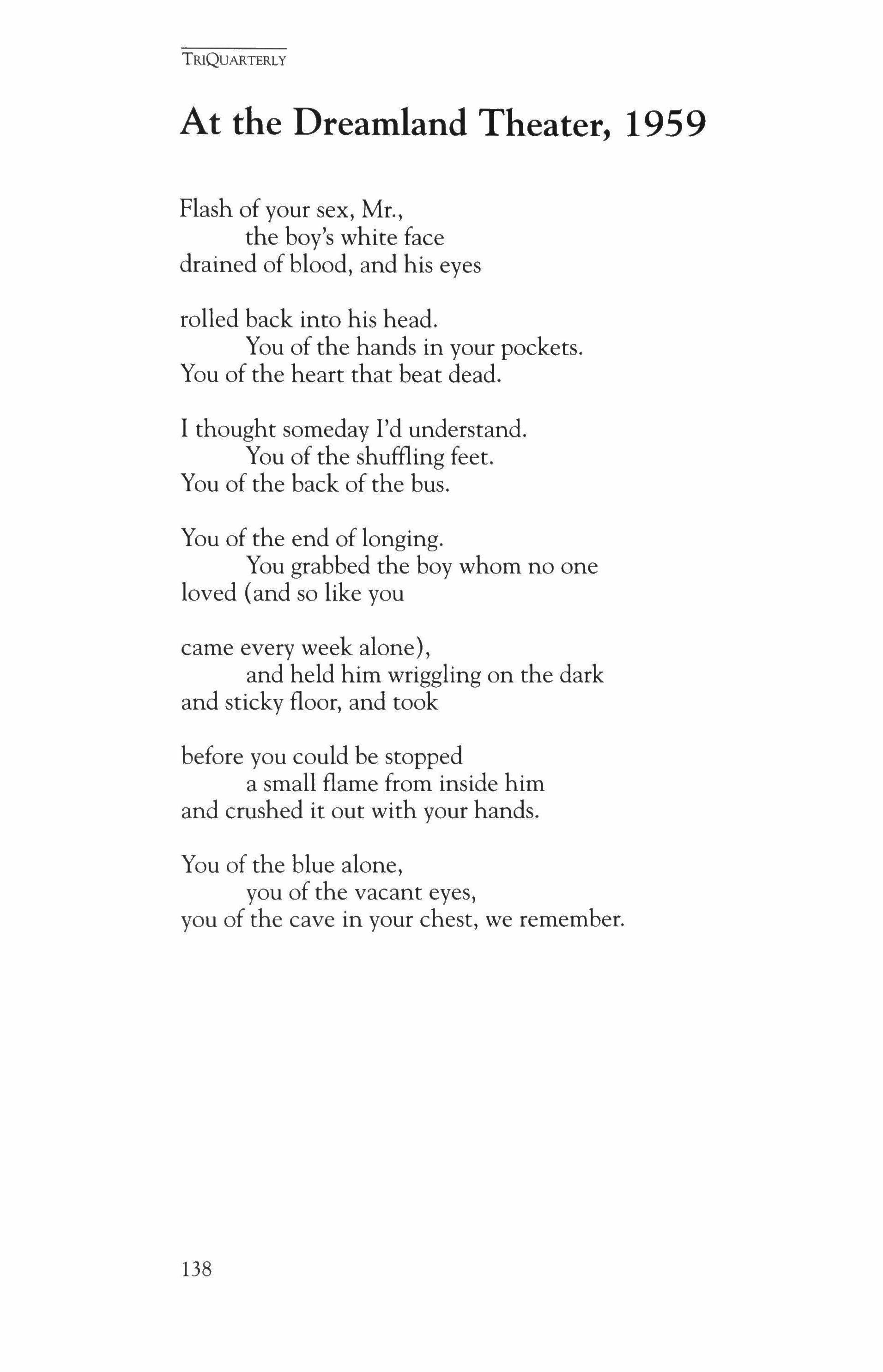
At the Dreamland Theater, 1959
Flash of your sex, Mr., the boy's white face drained of blood, and his eyes rolled back into his head. You of the hands in your pockets. You of the heart that beat dead.
I thought someday I'd understand. You of the shuffling feet. You of the back of the bus.
You of the end of longing. You grabbed the boy whom no one loved (and so like you came every week alone), and held him wriggling on the dark and sticky floor, and took before you could be stopped a small flame from inside him and crushed it out with your hands.
You of the blue alone, you of the vacant eyes, you of the cave in your chest, we remember.
TRIQUARTERLY
138
Two Poems
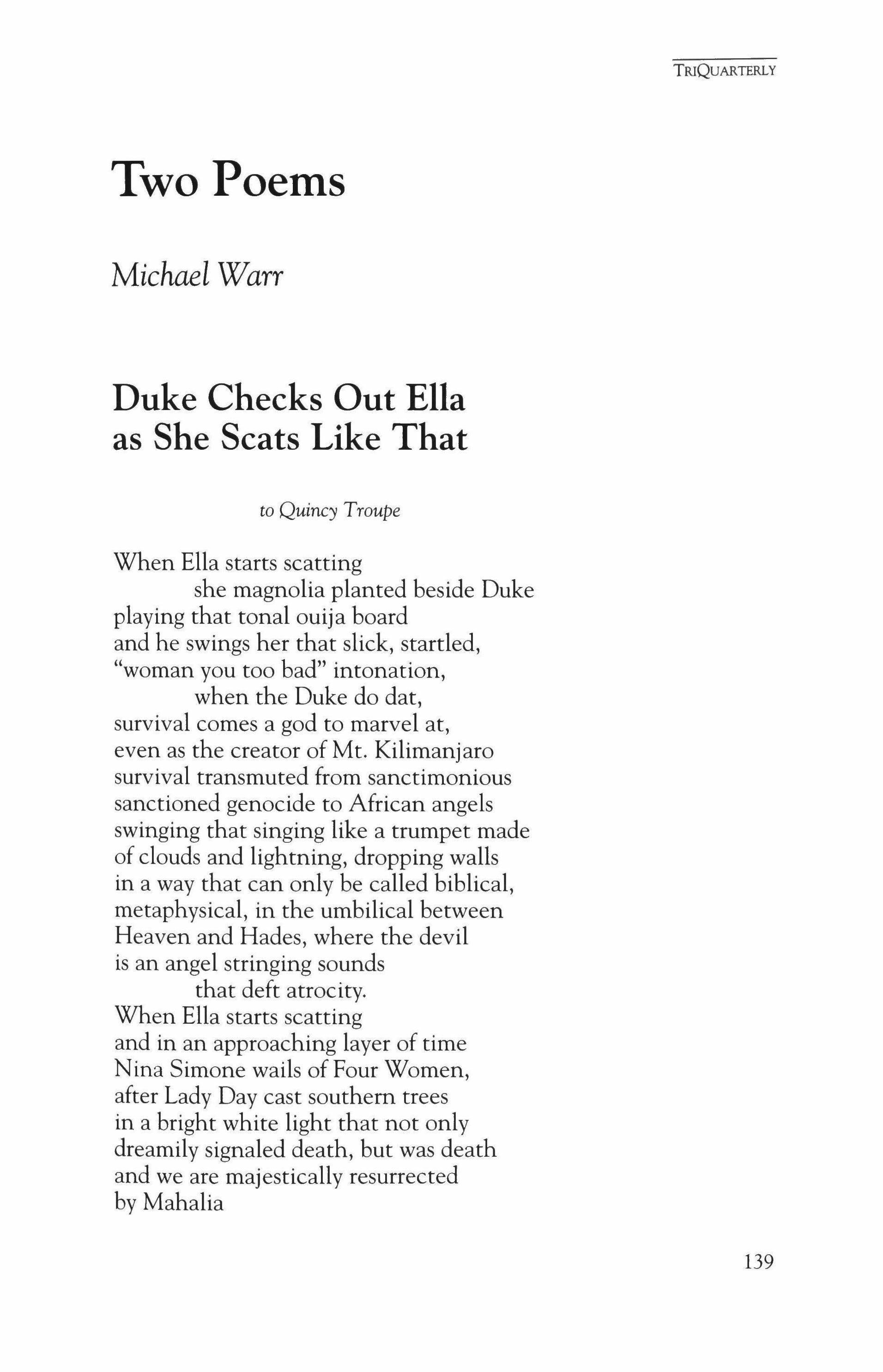 Michael Warr
Michael Warr
Duke Checks Out Ella as She Scats Like That
ta Quincy Traupe
When Ella starts scatting she magnolia planted beside Duke playing that tonal ouija board and he swings her that slick, startled, "woman you too bad" intonation, when the Duke do dat, survival comes a god to marvel at, even as the creator of Mt. Kilimanjaro survival transmuted from sanctimonious sanctioned genocide to African angels swinging that singing like a trumpet made of clouds and lightning, dropping walls in a way that can only be called biblical, metaphysical, in the umbilical between Heaven and Hades, where the devil is an angel stringing sounds that deft atrocity. When Ella starts scatting and in an approaching layer of time Nina Simone wails of Four Women, after Lady Day cast southern trees in a bright white light that not only dreamily signaled death, but was death and we are majestically resurrected by Mahalia
TRIQUARTERLY
139
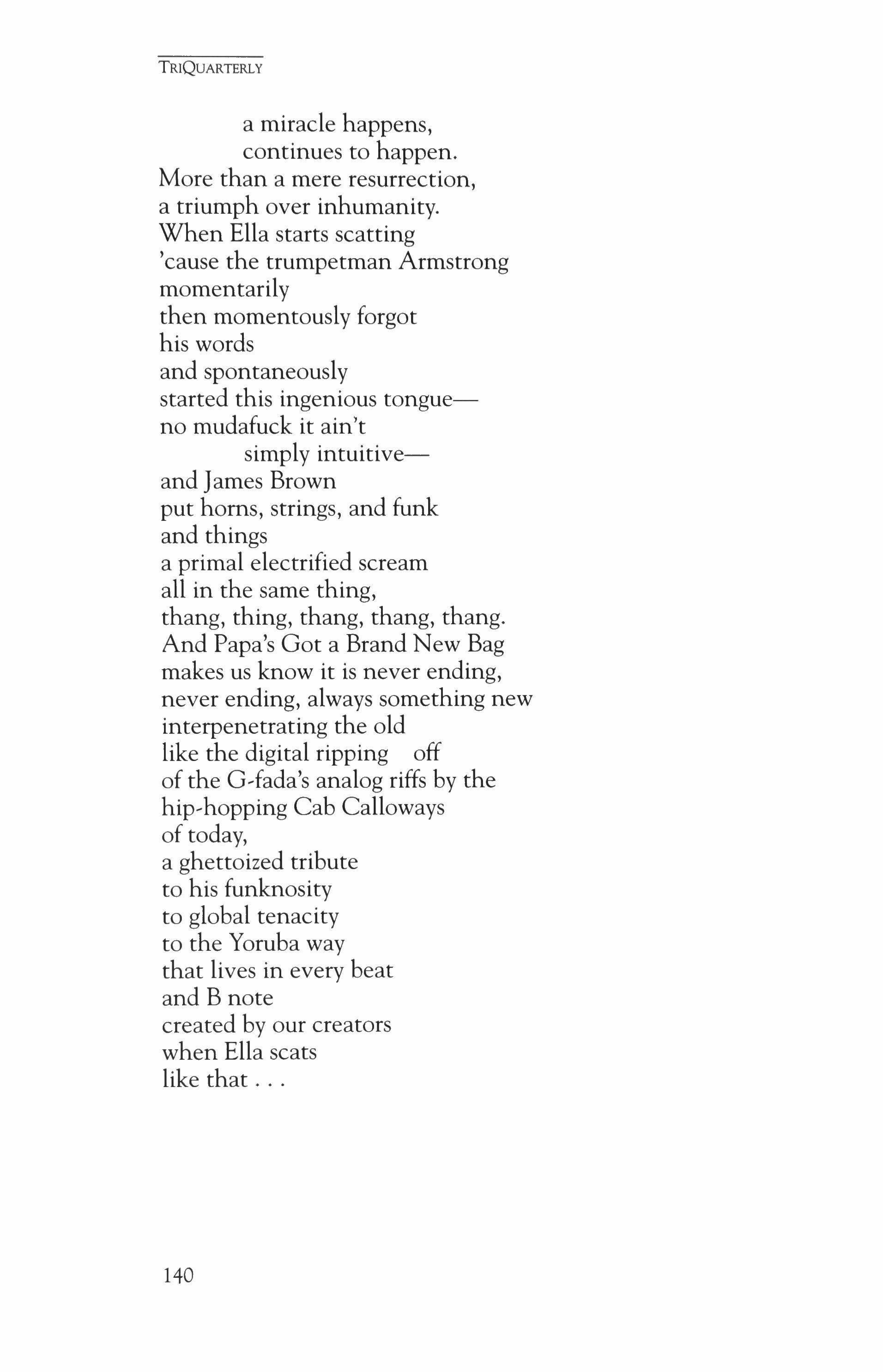
a miracle happens, continues to happen. More than a mere resurrection, a triumph over inhumanity. When Ella starts scatting 'cause the trumpetman Armstrong momentarily then momentously forgot his words and spontaneously started this ingenious tongueno mudafuck it ain't simply intuitiveand J ames Brown put horns, strings, and funk and things a primal electrified scream all in the same thing, thang, thing, thang, thang, thang. And Papa's Got a Brand New Bag makes us know it is never ending, never ending, always something new interpenetrating the old like the digital ripping off of the Gvfada's analog riffs by the hip-hopping Cab Calloways of today, a ghettoized tribute to his funknosity to global tenacity to the Yoruba way that lives in every beat and B note created by our creators when Ella scats like that
TRIQUARTERLY
140
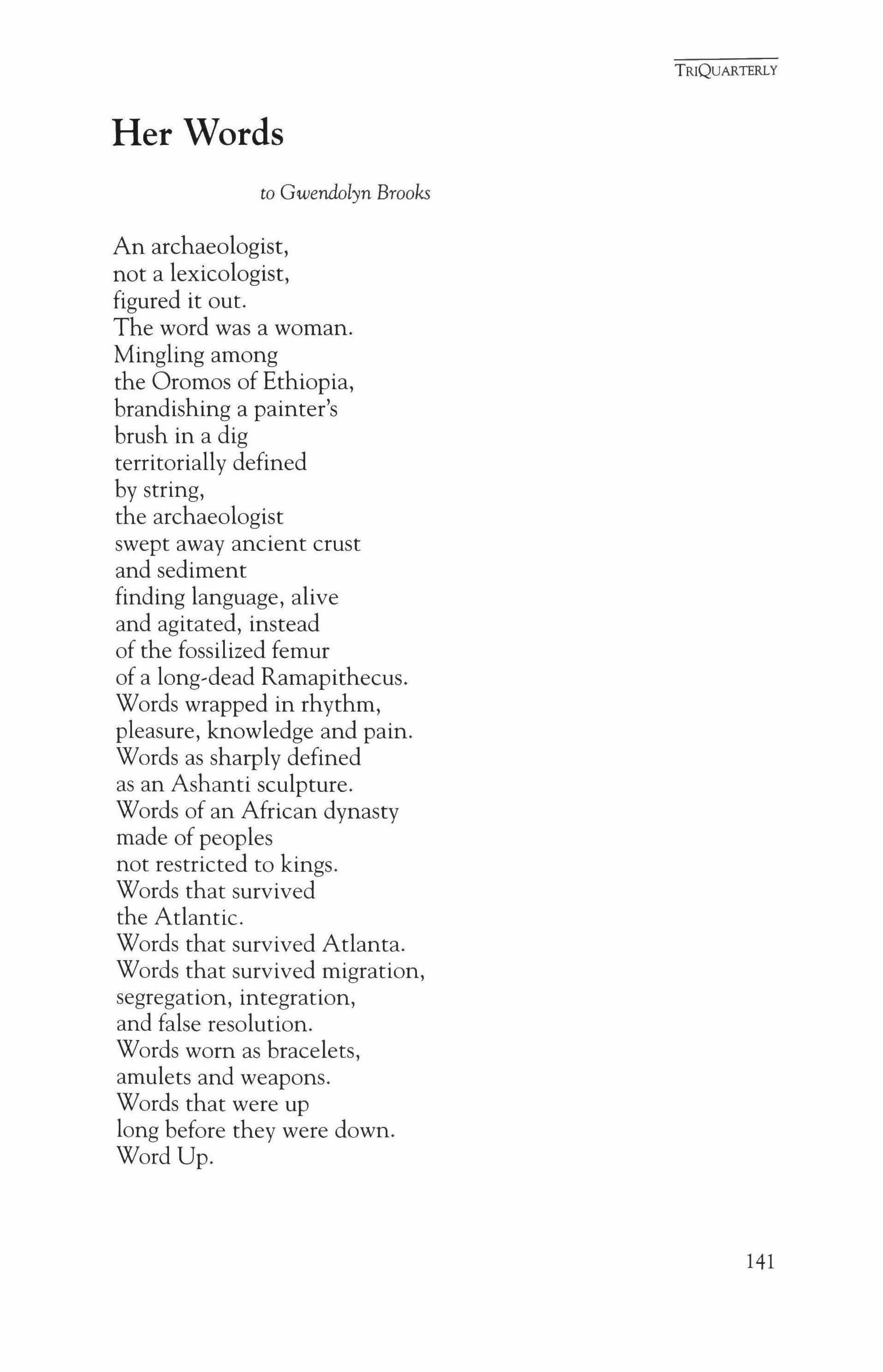
Her Words
to Gwendolyn Brooks
An archaeologist, not a lexicologist, figured it out. The word was a woman. Mingling among the Oromos of Ethiopia, brandishing a painter's brush in a dig territorially defined by string, the archaeologist swept away ancient crust and sediment finding language, alive and agitated, instead of the fossilized femur of a long-dead Ramapithecus. Words wrapped in rhythm, pleasure, knowledge and pain. Words as sharply defined as an Ashanti sculpture. Words of an African dynasty made of peoples not restricted to kings. Words that survived the Atlantic.
Words that survived Atlanta. Words that survived migration, segregation, integration, and false resolution.
Words worn as bracelets, amulets and weapons. Words that were up long before they were down. Word Up.
TRIQUARTERLY
141
TRIQUARTERLY
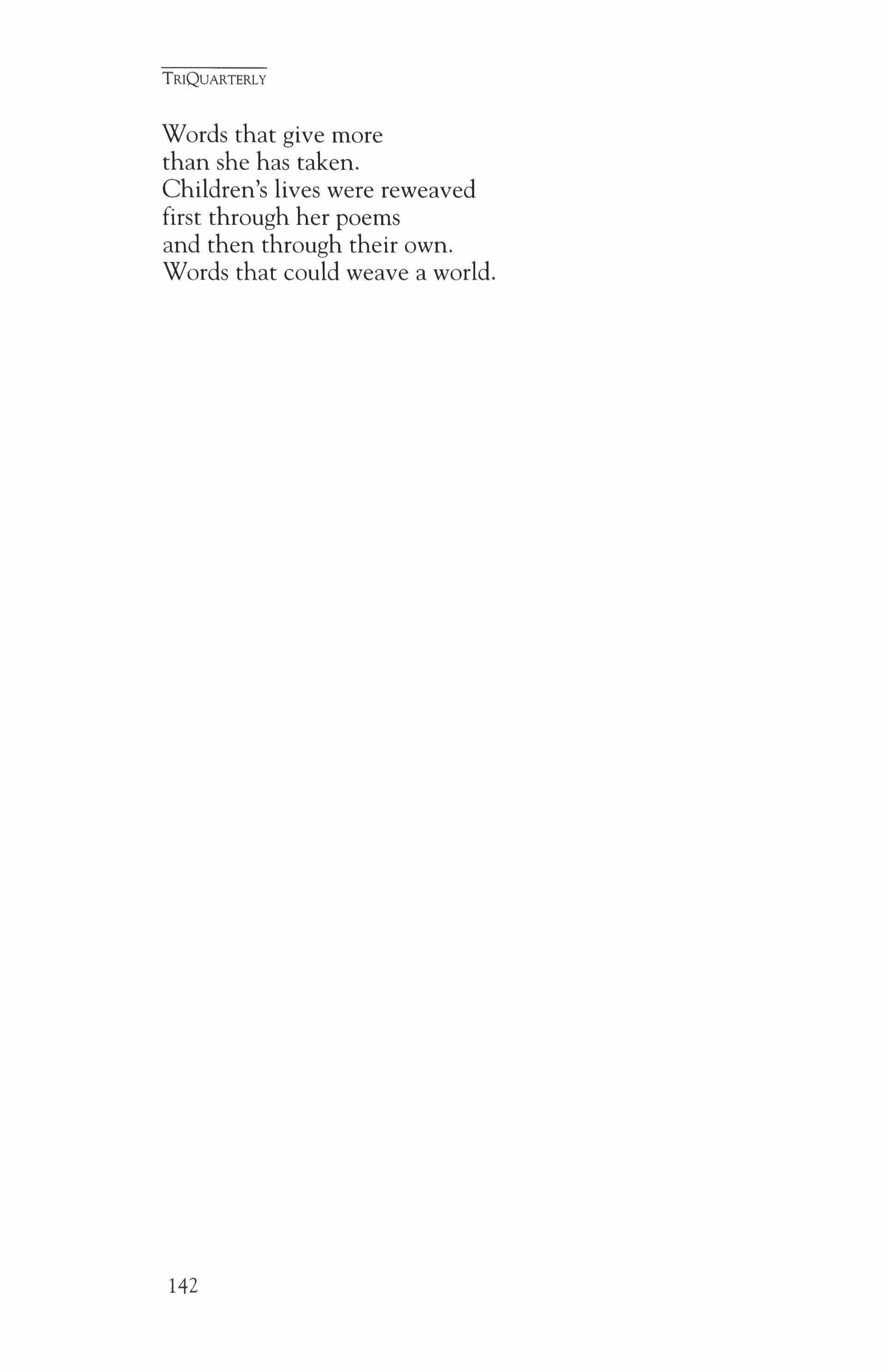
Words that give more than she has taken. Children's lives were reweaved first through her poems and then through their own. Words that could weave a world.
142
Two Poems
 ]ulia Stockton
]ulia Stockton
My Aunt's Niece's Anamnesis
Can worlds this multifold resign one genre to drains, to dumps, or final ends more fiery?
Take her who suits her suit in plaid lime green, an antique type I'd hate to reify.
She squats, at home among her blood-kin ogres. Like gargoyles chipped from opalescent chert, mouths agape, they chew their furzy gorse. Her drooled ogressiveness may make you retch.
One can feel self-lobotomouslv loppy, recalling facial tics and fangledy argot of folks we've come to ken-we know each polyp, kink, and phobia, every favored groat.
Once known, how to unknow the nudist brute, head gone argos-eyed, soul to starchy tuber?
TRIQUARTERLY 143
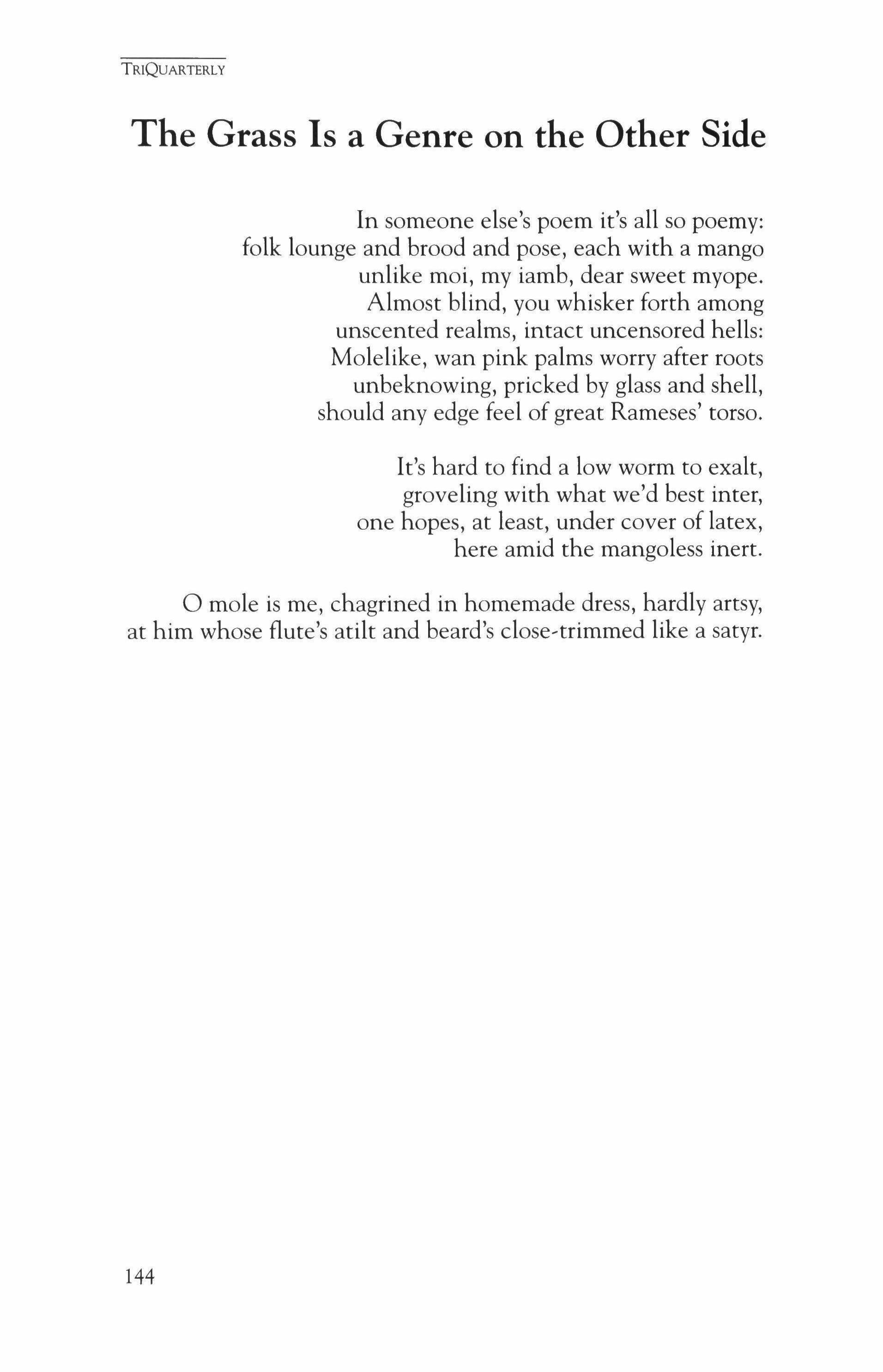
The Grass Is a Genre on the Other Side
In someone else's poem it's all so poemy: folk lounge and brood and pose, each with a mango unlike moi, my iamb, dear sweet myope. Almost blind, you whisker forth among unscented realms, intact uncensored hells: Molelike, wan pink palms worry after roots unbeknowing, pricked by glass and shell, should any edge feel of great Rameses' torso.
It's hard to find a low worm to exalt, groveling with what we'd best inter, one hopes, at least, under cover of latex, here amid the mangoless inert.
o mole is me, chagrined in homemade dress, hardly artsy, at him whose flute's atilt and beard's close-trimmed like a satyr.
TRIQUARTERLY
144

From the Series NOW (Dachau)
Photographs by Alan Cohen
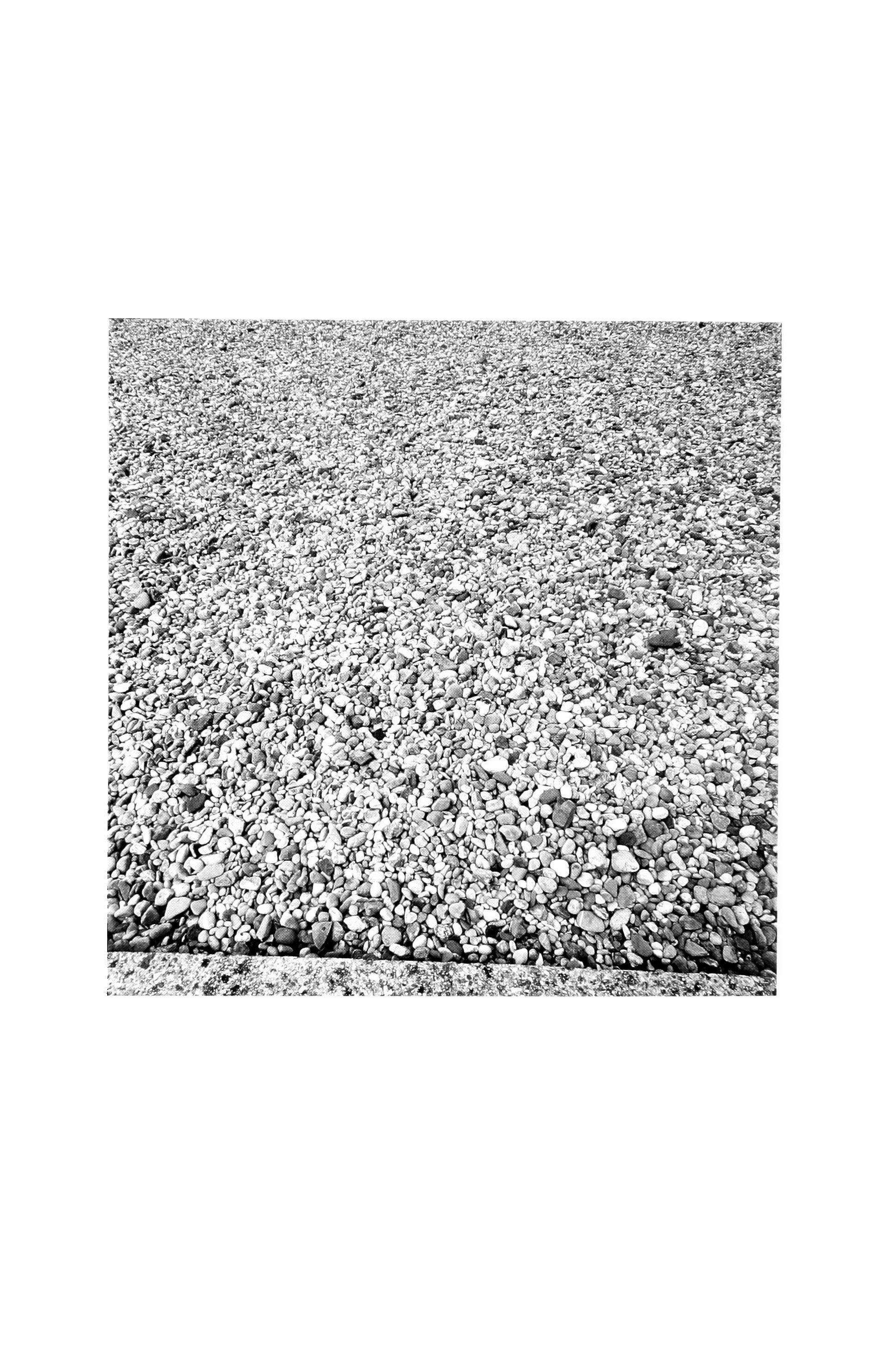


Two Poems
Susan Stewart
Little Night Songs
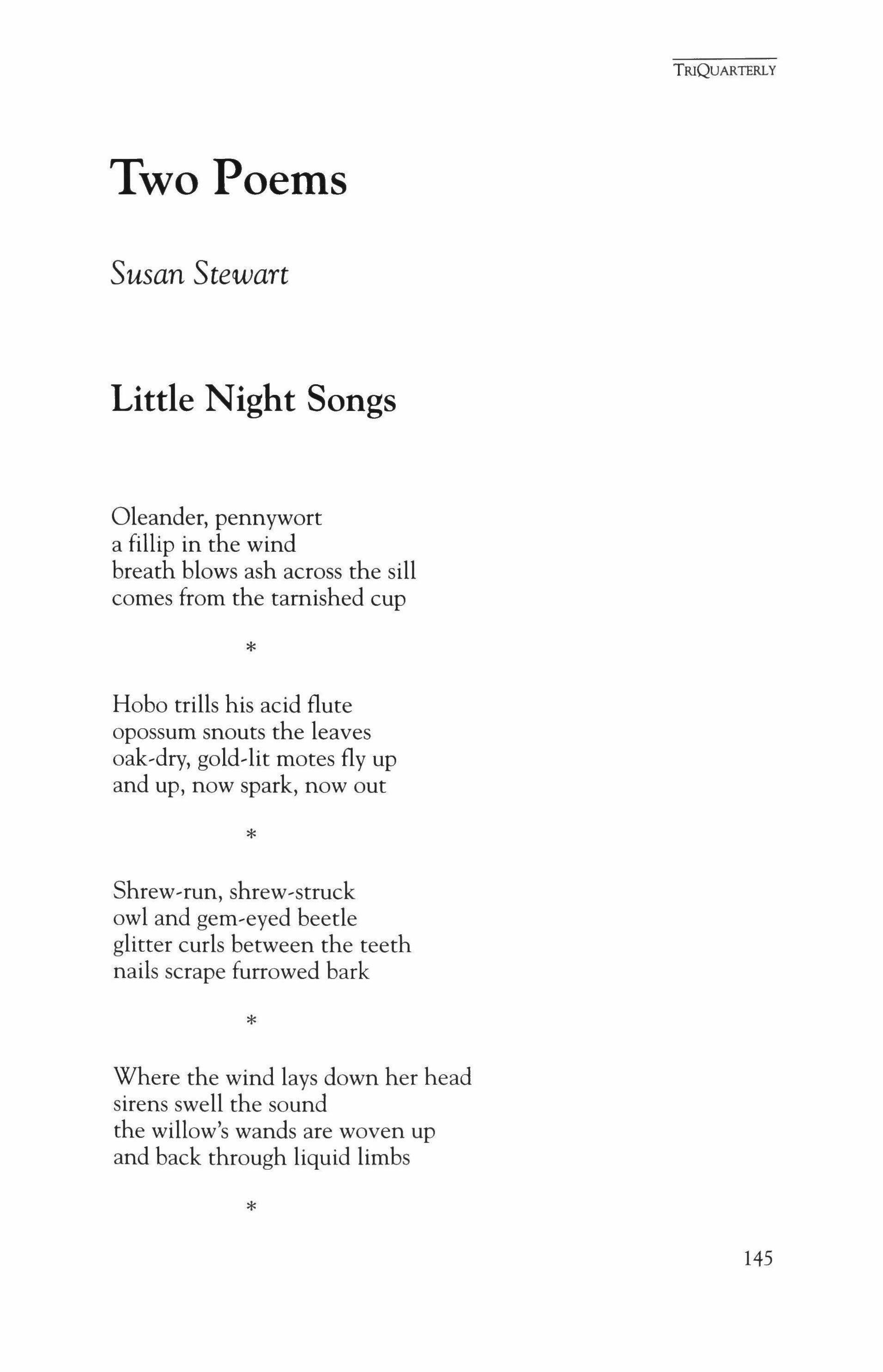
Oleander, pennywort a fillip in the wind breath blows ash across the sill comes from the tarnished cup
* Hobo trills his acid flute opossum snouts the leaves oak-dry, gold-lit motes fly up and up, now spark, now out
* Shrew-run, shrew-struck owl and gem-eyed beetle glitter curls between the teeth nails scrape furrowed bark
* Where the wind lays down her head sirens swell the sound the willow's wands are woven up and back through liquid limbs
*
TRIQUARTERLY
145
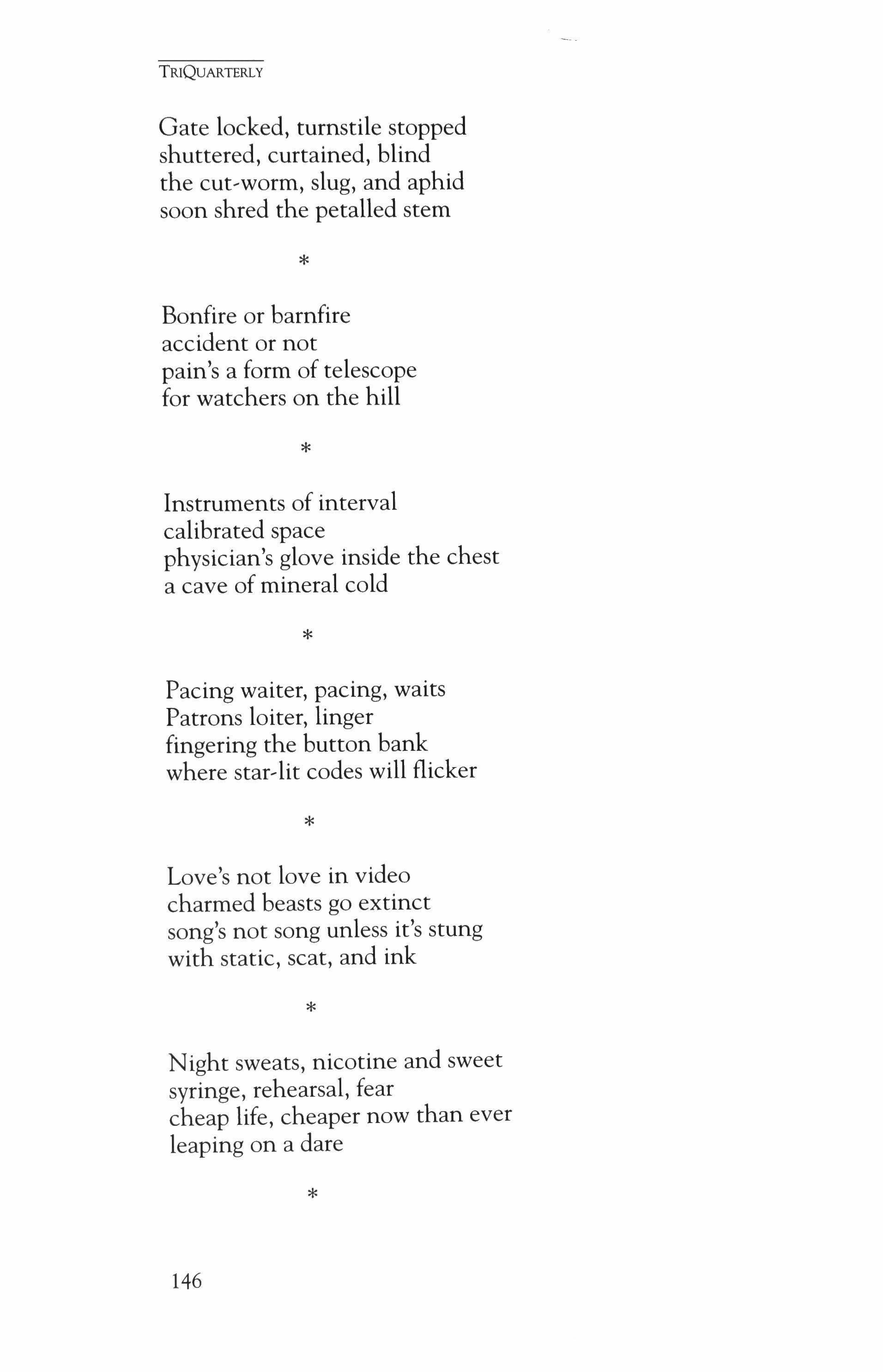
Gate locked, turnstile stopped shuttered, curtained, blind the cut-worm, slug, and aphid soon shred the petalled stem
*
Bonfire or barnfire accident or not pain's a form of telescope for watchers on the hill
* Instruments of interval calibrated space physician's glove inside the chest a cave of mineral cold
*
Pacing waiter, pacing, waits Patrons loiter, linger fingering the button bank where star-lit codes will flicker
*
Love's not love in video charmed beasts go extinct song's not song unless it's stung with static, scat, and ink
*
Night sweats, nicotine and sweet syringe, rehearsal, fear cheap life, cheaper now than ever leaping on a dare
*
TRIQUARTERLY
146
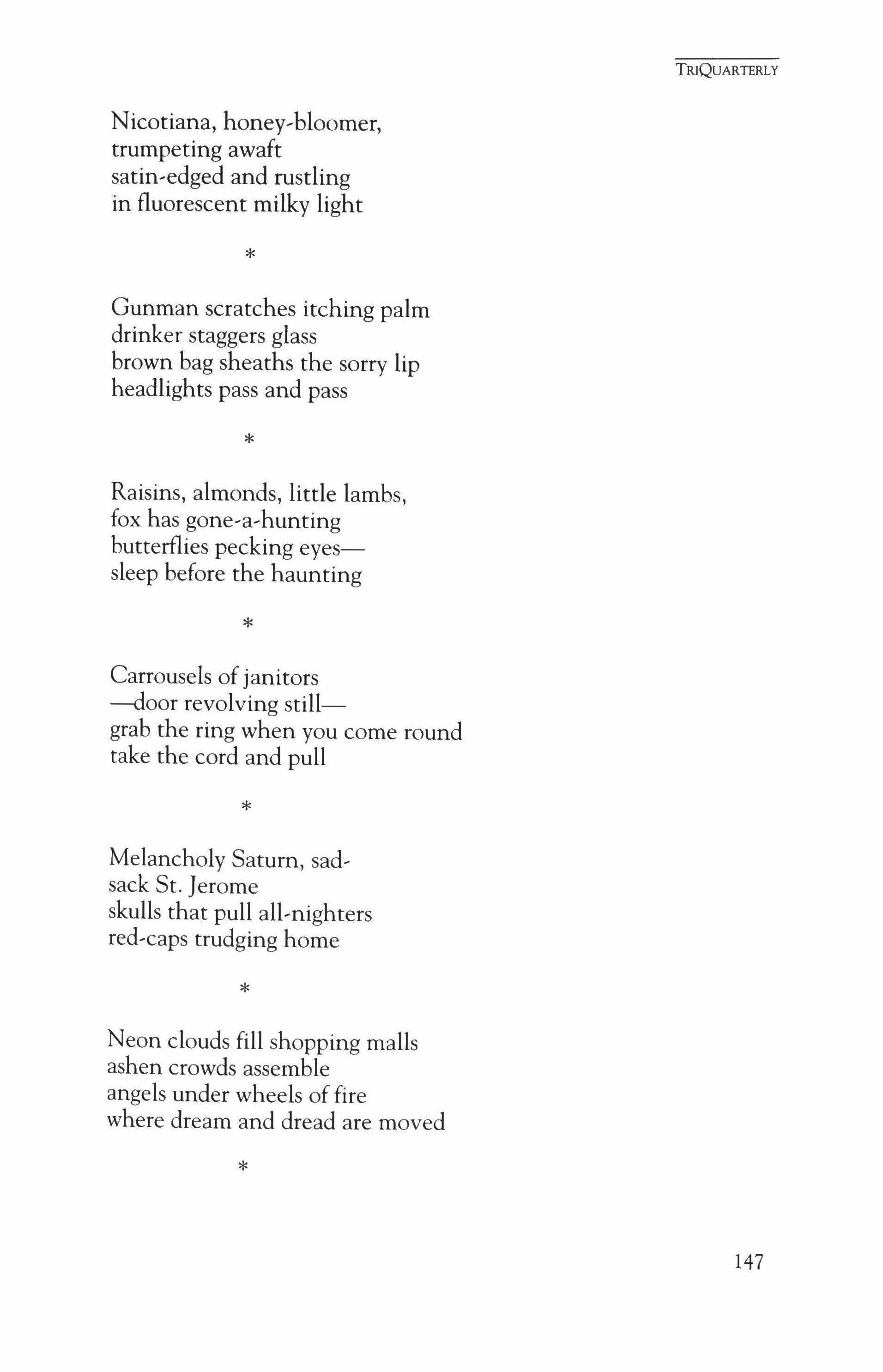
Nicotiana, honey-bloomer, trumpeting awaft satin-edged and rustling in fluorescent milky light
* Gunman scratches itching palm drinker staggers glass brown bag sheaths the sorry lip headlights pass and pass
*
Raisins, almonds, little lambs, fox has gone-a-hunting butterflies pecking eyessleep before the haunting
*
Carrousels of janitors -door revolving stillgrab the ring when you come round take the cord and pull
*
Melancholy Saturn, sadsack St. Jerome skulls that pull all-nighters red-caps trudging home
* Neon clouds fill shopping malls ashen crowds assemble angels under wheels of fire where dream and dread are moved
*
TRIQUARTERLY
147

Mauve and black and monochrome taste and hear and touch (vision stays empirical) harm's way stands unknowing
*
St. George took his shut-eye that bound up every wound brittle brakes and membrane webs around his sickness wound
*
Moon swings low above the sink dog-star's gone forgetting frost has barbed the hawthorn's thorn again and tinged the grass
* Resolution wanders rage slips from its edge foxglove checks the ferns with red where woodbine binds the bank
*
Cloud and moon and cloud again; old moon in her arms wing has gone to forage where sedges spring abreast
*
Cereus and spiderwort alight the bleariest wind that ever blew across the sill come drink now, drink it in
TRIQUARTERLY
148
Awaken
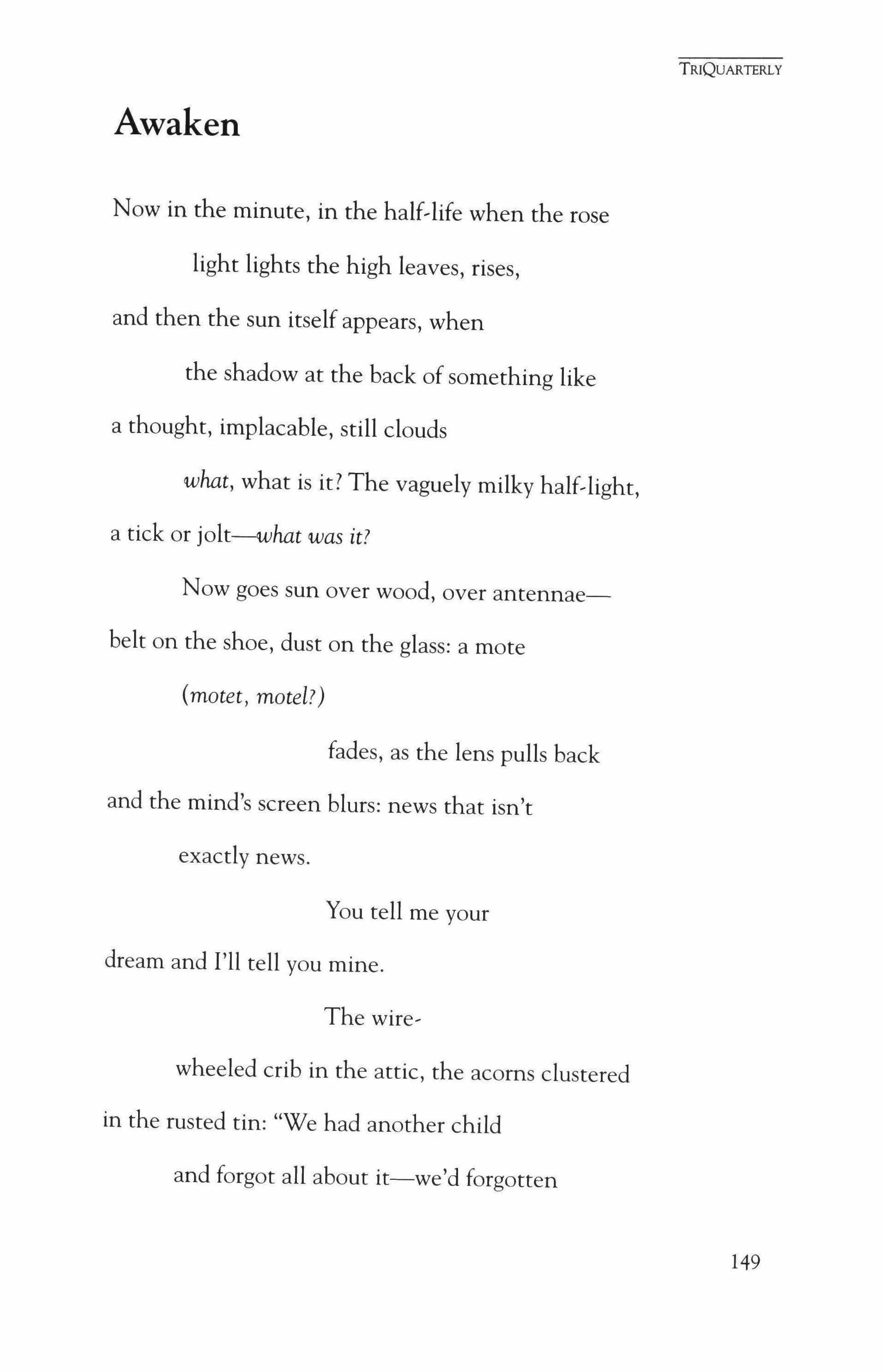
Now in the minute, in the halflife when the rose light lights the high leaves, rises, and then the sun itself appears, when the shadow at the back of something like a thought, implacable, still clouds what, what is it? The vaguely milky half-light, a tick or jolt-what was it?
Now goes sun over wood, over antennaebelt on the shoe, dust on the glass: a mote (motet, motel?)
fades, as the lens pulls back and the mind's screen blurs: news that isn't exactly news.
You tell me your dream and I'll tell you mine.
The wirewheeled crib in the attic, the acorns clustered in the rusted tin: "We had another child and forgot all about it-we'd forgotten
TRIQUARTERLY 149
TRIQUARTERLY
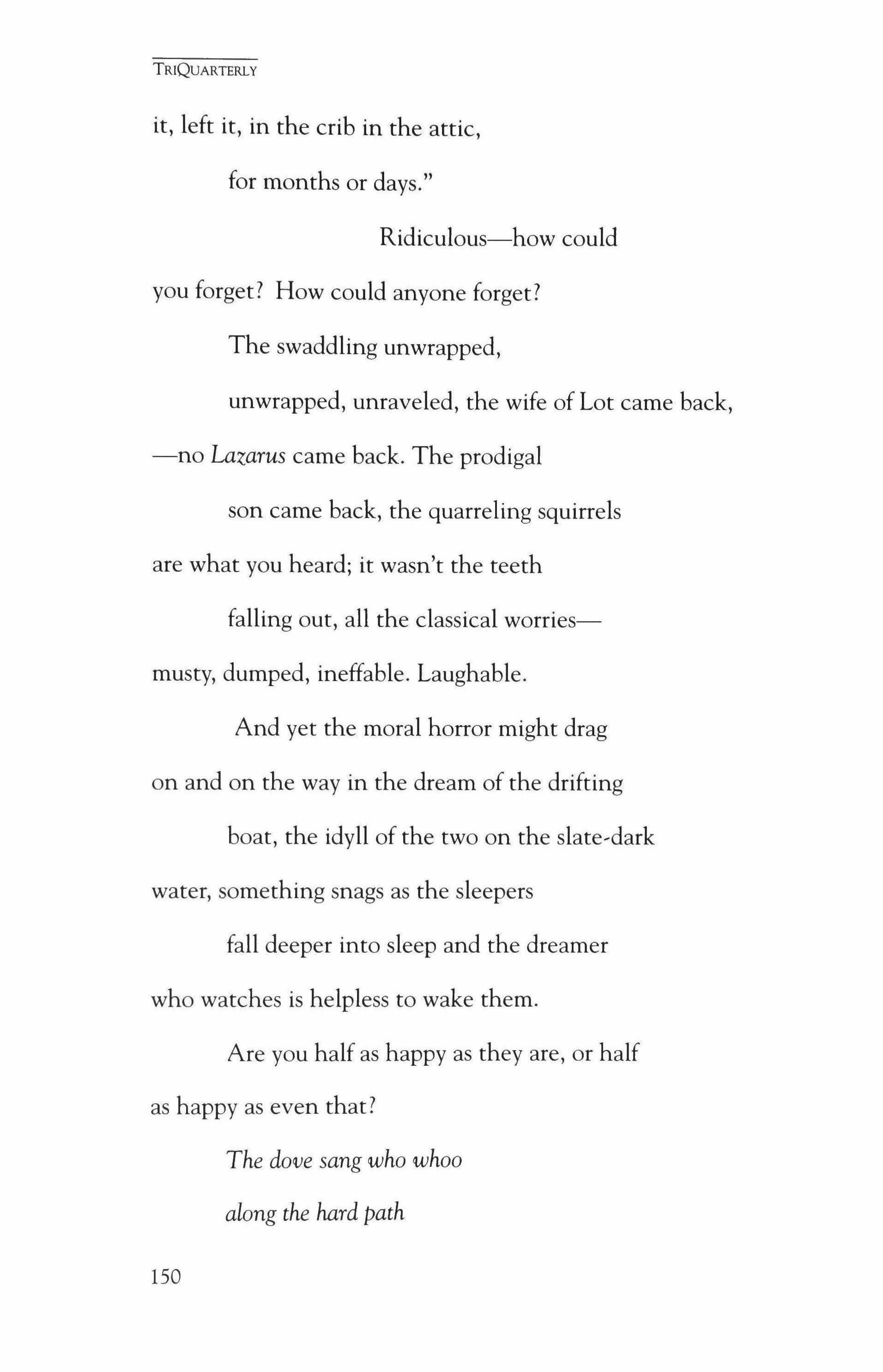
it, left it, in the crib in the attic, for months or days."
Ridiculous-how could you forget? How could anyone forget?
The swaddling unwrapped, unwrapped, unraveled, the wife of Lot came back, -no Lazarus came back. The prodigal son came back, the quarreling squirrels are what you heard; it wasn't the teeth falling out, all the classical worriesmusty, dumped, ineffable. Laughable.
And yet the moral horror might drag on and on the way in the dream of the drifting boat, the idyll of the two on the slate-dark water, something snags as the sleepers fall deeper into sleep and the dreamer who watches is helpless to wake them.
Are you half as happy as they are, or half as happy as even that?
The dove sang who whoo along the hard path
150

at twilight each star alone seemed a sign.
Nothing was joined nothing was lost.
Others in line lifted their hands.
Some seemed to pray some seemed to dance.
The dove sang who whoo along the hard path.
I looked for you but you were gone.
Now that the world's contracted thus, the cover thrown off to where-where are we now?
Do you call that a nightmare or a wish? Saying so doesn't make it so.
I saw in the diminishment of every living thing the radiance of its end.
I heard in the interval, in the intake of your breath, the cell's pulse, the quick and mortal pendulum.
TRIQUARTERLY 151
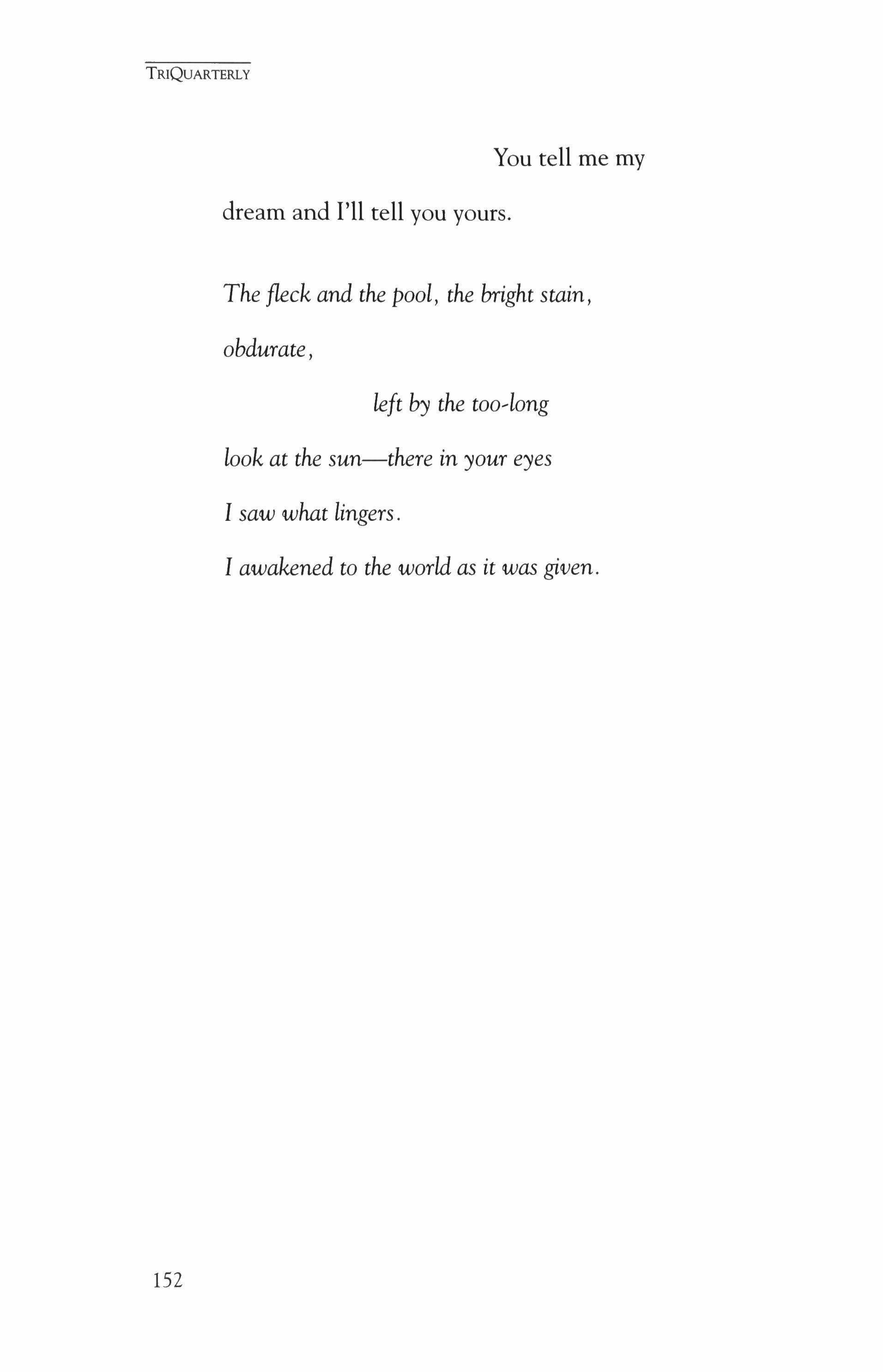
You tell me my dream and I'll tell you yours.
The fleck and the pool, the bright stain, obdurate, left by the too'long look at the sun-there in your eyes
I saw what lingers.
I awakened to the world as it was given.
TRIQUARTERLY
152
King's Dock
R. D. Skillings

There, Where the Kennebec River Runs both ways, Where the wide tidal water Moves with massive pull-
Shore once of King George III, Muddy boulders, piling stubs-
A many-windowed sunlit house
Shipwright-built on a steep rise, High lawn by mid-july
Mushy with wormy pears, Lower field flattened With salt hay at full moon,
A long-neglected, blackened Revolutionary War plaque On a lichen-scaled glacial rock,
The ragged stump Of a baby blue spruce
Hacked down one Christmas, Unmissed until spring,
TRIQUARTERLY
153
TRIQUARTERLY

A casque of white lilacs, Luxuriant, untended, Enclosing a dank
Antiquated stone well,
Glints of mica, feldspar, Quartz and flint
Comprise my memories Of childhood innocence.
Mother and Father Raked fall leaves And filled the well, Always empty On Memorial Day When we returned And I ran to confirm It had happened again:
Something become nothing.
I was eight On V] Day. The kitchen radio Static roared And they danced Around me, Their only progeny-
Minnow-pool-wader: Dragonfly-follower; Beholder of daddy longlegs, Moles, caterpillars and toads;
Scrambling cut-finger; nester In tall grass; thrilled hider From imaginary enemies, Cloud-faced God, voracious maw, Ghosts and comic-book crooks;
154
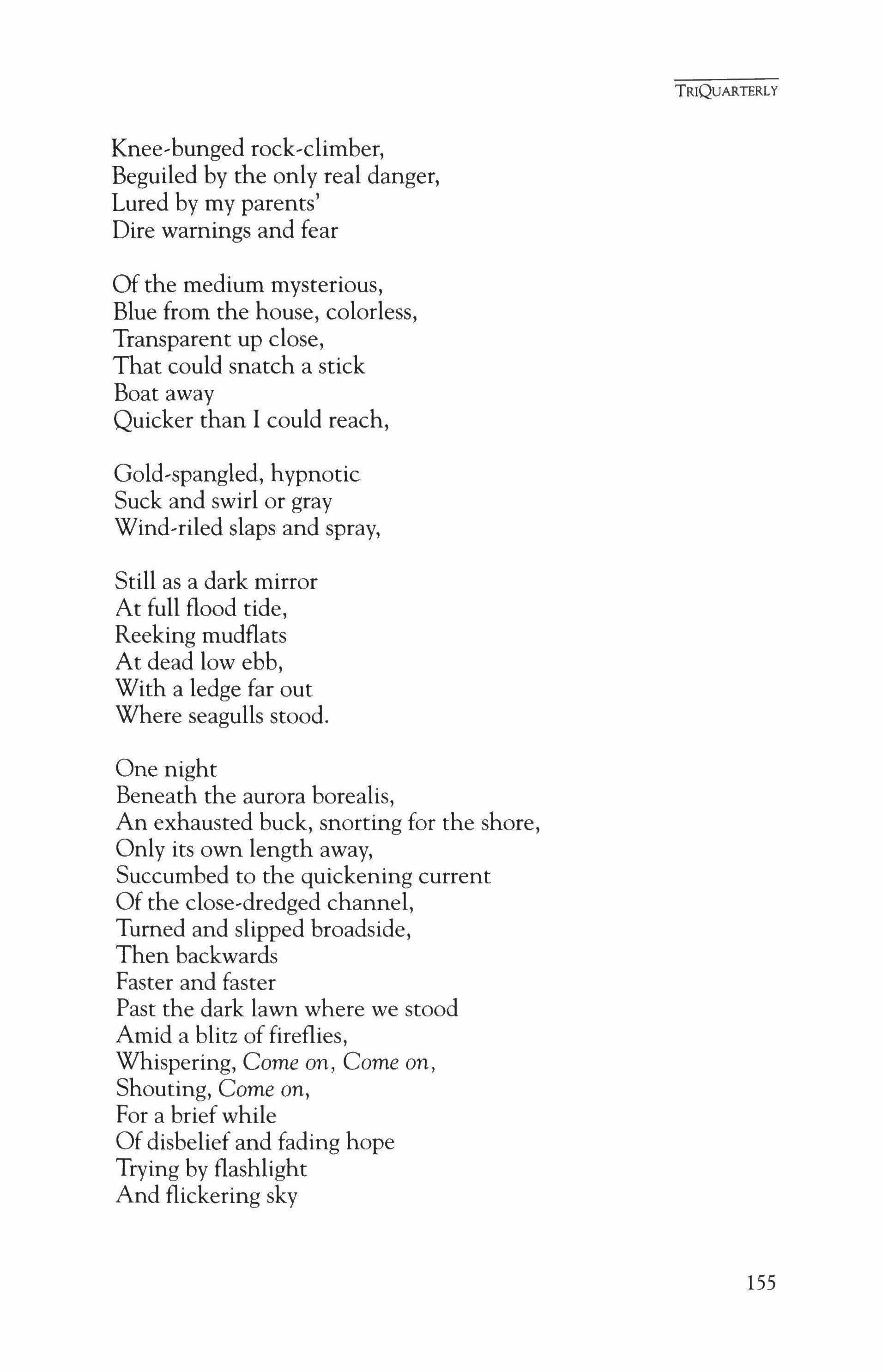
Knee-bunged rock-climber, Beguiled by the only real danger, Lured by my parents' Dire warnings and fear
Of the medium mysterious,
Blue from the house, colorless,
Transparent up close, That could snatch a stick
Boat away
Quicker than I could reach,
Gold-spangled, hypnotic
Suck and swirl or gray
Wind�riled slaps and spray,
Still as a dark mirror
At full flood tide, Reeking mudflats
At dead low ebb, With a ledge far out Where seagulls stood.
One night
Beneath the aurora borealis, An exhausted buck, snorting for the shore, Only its own length away, Succumbed to the quickening current
Of the close-dredged channel, Turned and slipped broadside, Then backwards Faster and faster
Past the dark lawn where we stood
Amid a blitz of fireflies, Whispering, Come on, Come on,
Shouting, Come on, For a brief while Of disbelief and fading hope
Trying by flashlight And flickering sky
TRIQUARTERLY
155
TRIQUARTERLY

To hold its wide eyes, Black nose, sky-thrust, And antlers in sight.
When I was ten
Father had gates set up At the driveway's end, Four rough granite blocks
Like two pair of giants' dice
Piled two by two
Astride the grassy track, Five feet high, Raw as new tombstones.
How grand they must have seemed To his ambitious eye, How promising His squat block columns
Bargained from a quarryman friend, Raised among strewn stones, Rose-buried bones of an old wall.
I climbed them
And sat like a king, No other children near, And watched the wildflower Pageants blaze, And fade and then bow down, And studied bee-writing.
But on the sultry air, No matter what the hour, A riveter's pound
Like a sleepless whine Rang in echoes
From the Iron Works
A mile down river Where warships were Always a-building.
156
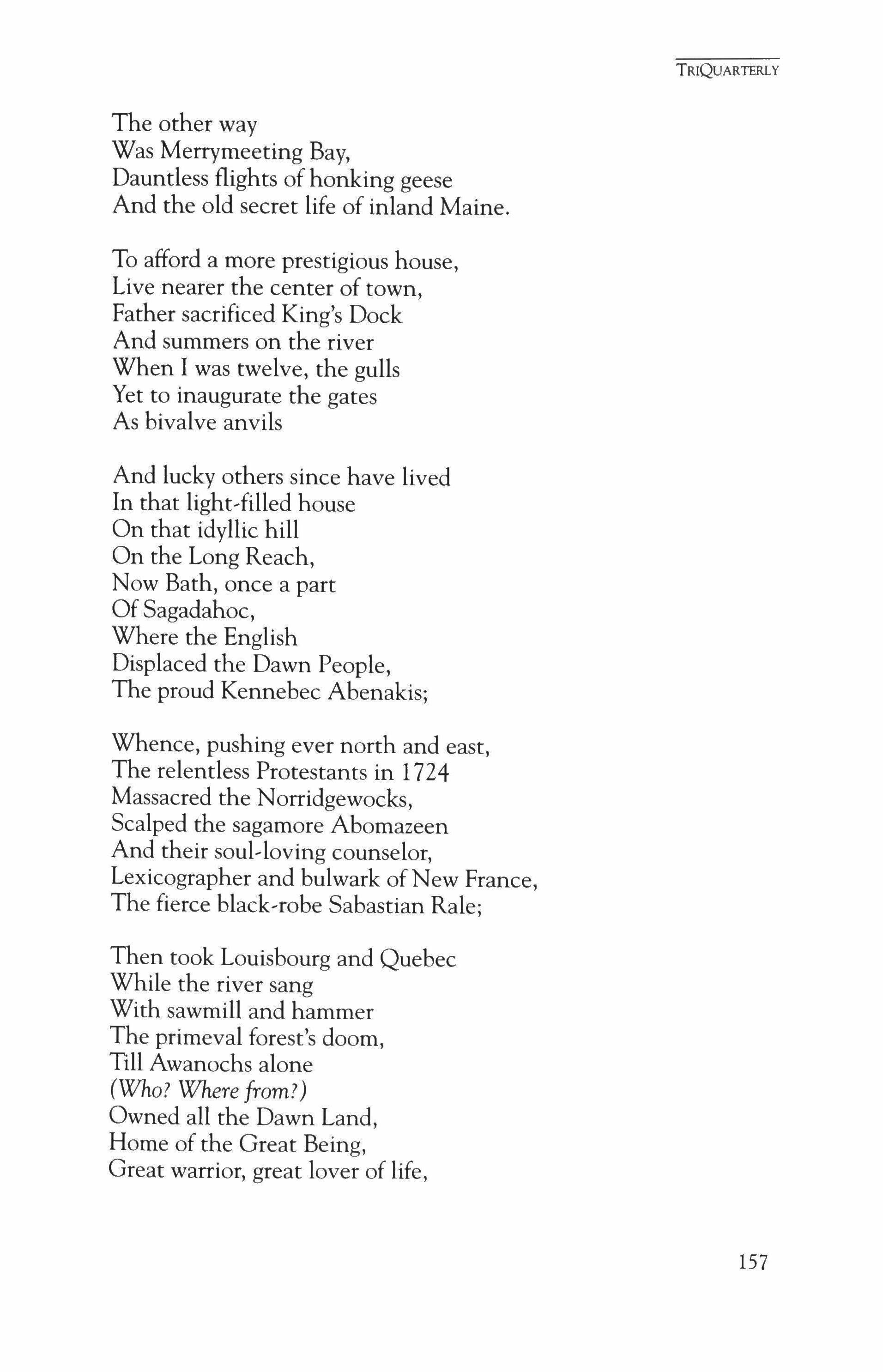
The other way
Was Merrymeeting Bay, Dauntless flights of honking geese
And the old secret life of inland Maine.
To afford a more prestigious house,
Live nearer the center of town, Father sacrificed King's Dock
And summers on the river
When I was twelve, the gulls
Yet to inaugurate the gates
As bivalve anvils
And lucky others since have lived
In that light-filled house
On that idyllic hill
On the Long Reach, Now Bath, once a part Of Sagadahoc, Where the English
Displaced the Dawn People, The proud Kennebec Abenakis;
Whence, pushing ever north and east,
The relentless Protestants in 1724
Massacred the Norridgewocks, Scalped the sagamore Abomazeen
And their soul-loving counselor, Lexicographer and bulwark of New France, The fierce black-robe Sabastian Rale;
Then took Louisbourg and Quebec
While the river sang With sawmill and hammer
The primeval forest's doom, Till Awanochs alone
(Who? Where from?)
Owned all the Dawn Land, Home of the Great Being, Great warrior, great lover of life,
TRIQUARTERLY
157
TRIQUARTERLY
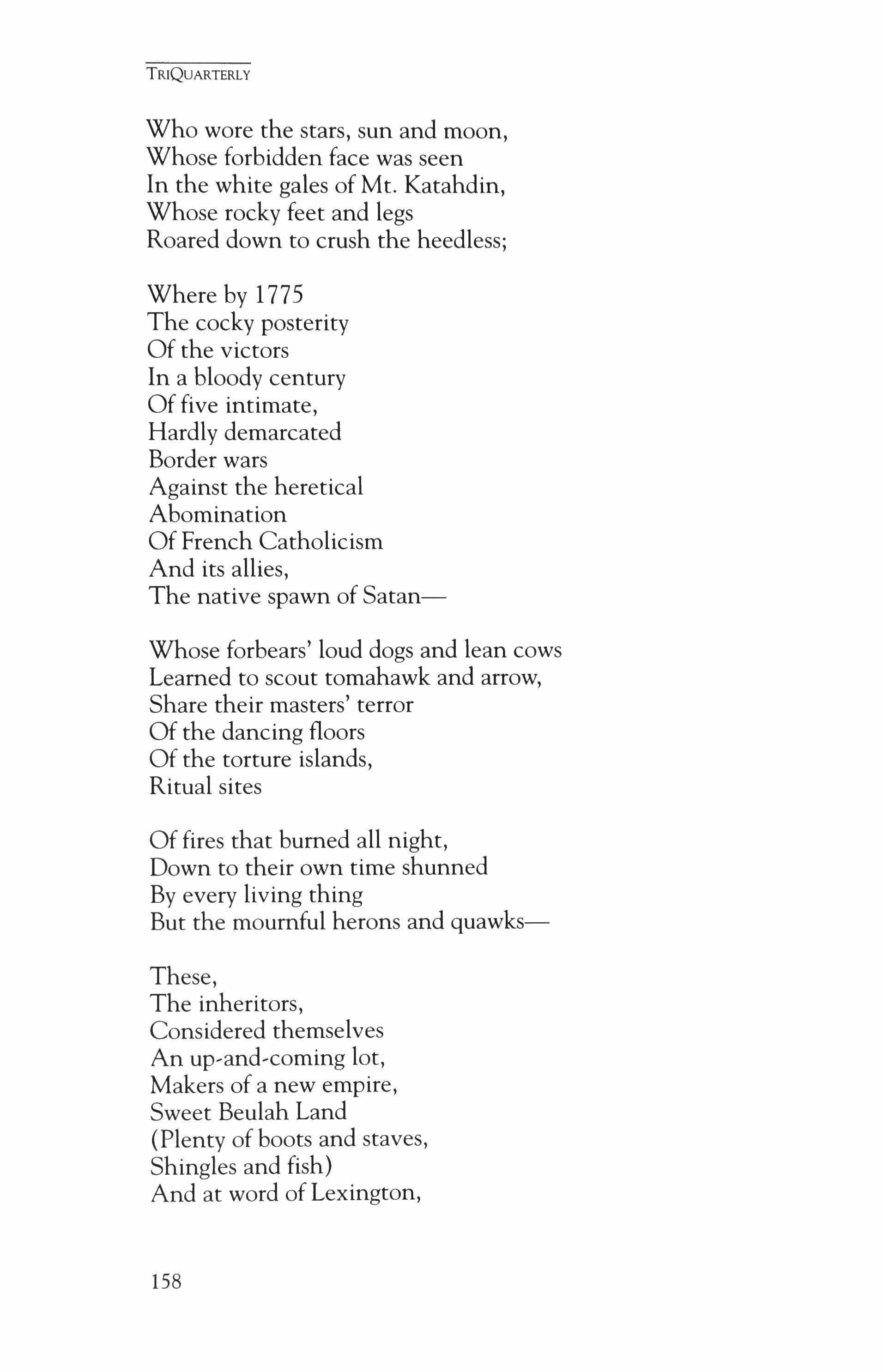
Who wore the stars, sun and moon, Whose forbidden face was seen
In the white gales of Mt. Katahdin, Whose rocky feet and legs
Roared down to crush the heedless;
Where by 1775
The cocky posterity
Of the victors
In a bloody century
Of five intimate, Hardly demarcated
Border wars
Against the heretical
Abomination
Of French Catholicism
And its allies,
The native spawn of Satan-
Whose forbears' loud dogs and lean cows
Learned to scout tomahawk and arrow,
Share their masters' terror
Of the dancing floors
Of the torture islands,
Ritual sites
Of fires that burned all night, Down to their own time shunned
By every living thing
But the mournful herons and quawks-
These,
The inheritors, Considered themselves
An up-and-coming lot, Makers of a new empire, Sweet Beulah Land
(Plenty of boots and staves, Shingles and fish)
And at word of Lexington,
158
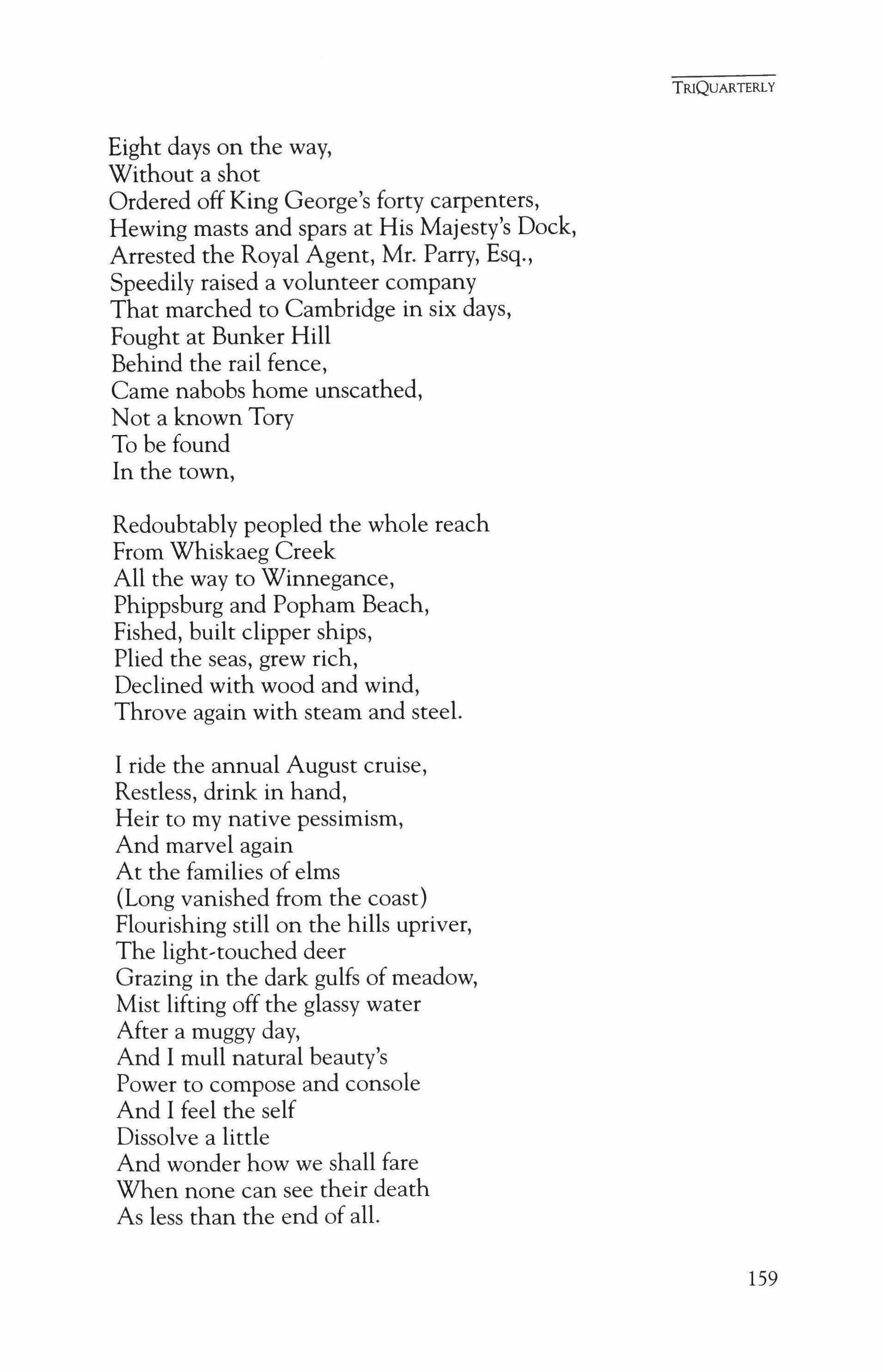
Eight days on the way, Without a shot
Ordered off King George's forty carpenters, Hewing masts and spars at His Majesty's Dock, Arrested the Royal Agent, Mr. Parry, Esq.,
Speedily raised a volunteer company
That marched to Cambridge in six days, Fought at Bunker Hill
Behind the rail fence, Came nabobs home unscathed, Nat a known Tory
To be found
In the town,
Redoubtably peopled the whole reach
From Whiskaeg Creek
All the way to Winnegance, Phippsburg and Popham Beach, Fished, built clipper ships, Plied the seas, grew rich, Declined with wood and wind, Throve again with steam and steel.
I ride the annual August cruise, Restless, drink in hand,
Heir to my native pessimism, And marvel again
At the families of elms
(Long vanished from the coast)
Flourishing still on the hills upriver, The light-touched deer
Grazing in the dark gulfs of meadow, Mist lifting off the glassy water
After a muggy day, And I mull natural beauty's Power to compose and console
And I feel the self
Dissolve a little
And wonder how we shall fare
When none can see their death
As less than the end of all.
TruQUARTERLY 159
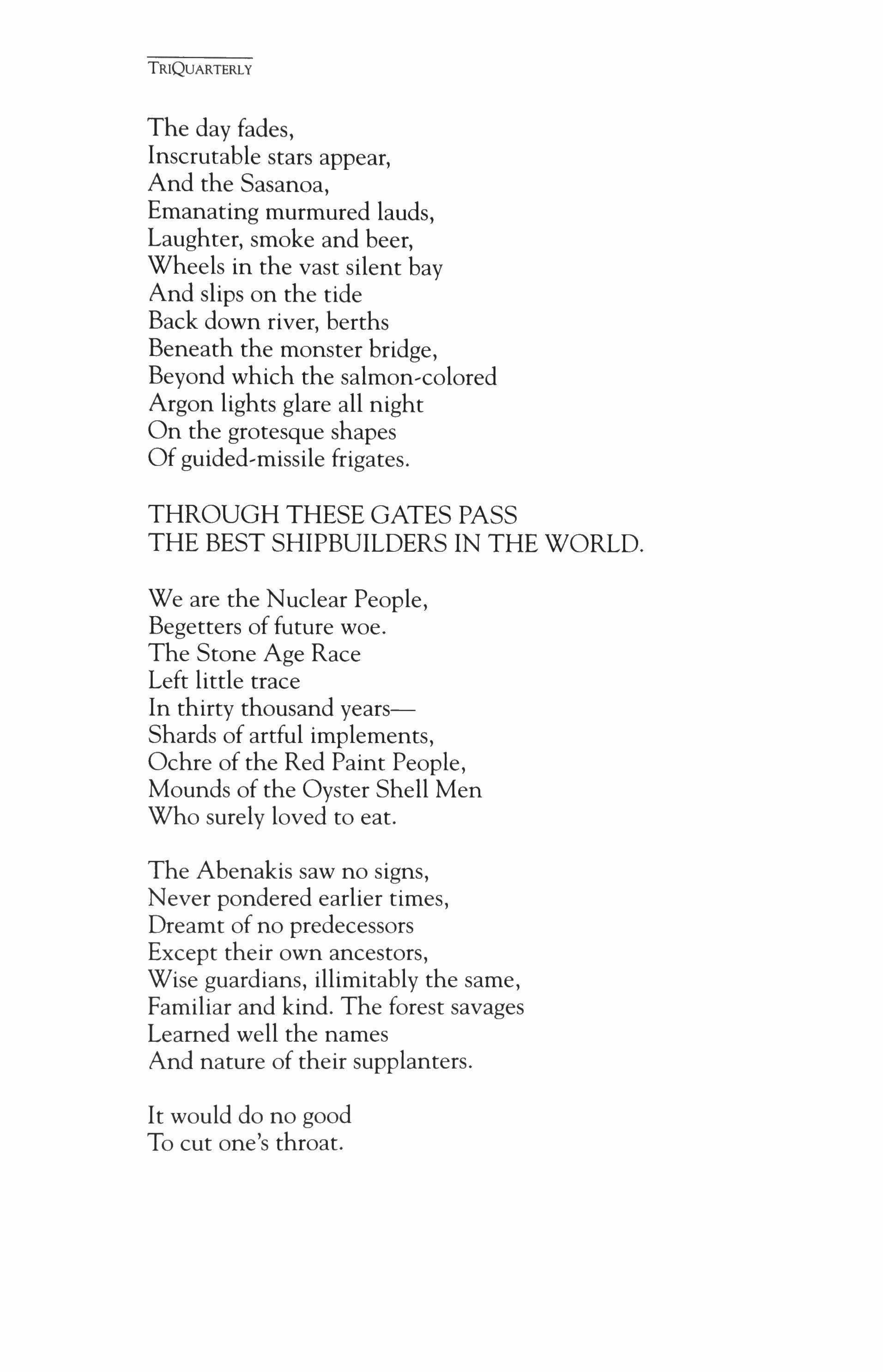
The day fades, Inscrutable stars appear, And the Sasanoa, Emanating murmured lauds, Laughter, smoke and beer, Wheels in the vast silent bay And slips on the tide Back down river, berths Beneath the monster bridge, Beyond which the salmon-colored Argon lights glare all night On the grotesque shapes Of guided-missile frigates.
THROUGH THESE GATES PASS THE BEST SHIPBUILDERS IN THE WORLD.
We are the Nuclear People, Begetters of future woe. The Stone Age Race Left little trace In thirty thousand yearsShards of artful implements, Ochre of the Red Paint People, Mounds of the Oyster Shell Men Who surely loved to eat.
The Abenakis saw no signs, Never pondered earlier times, Dreamt of no predecessors Except their own ancestors, Wise guardians, illimitably the same, Familiar and kind. The forest savages Learned well the names And nature of their supplanters.
It would do no good To cut one's throat.
TRIQUARTERLY
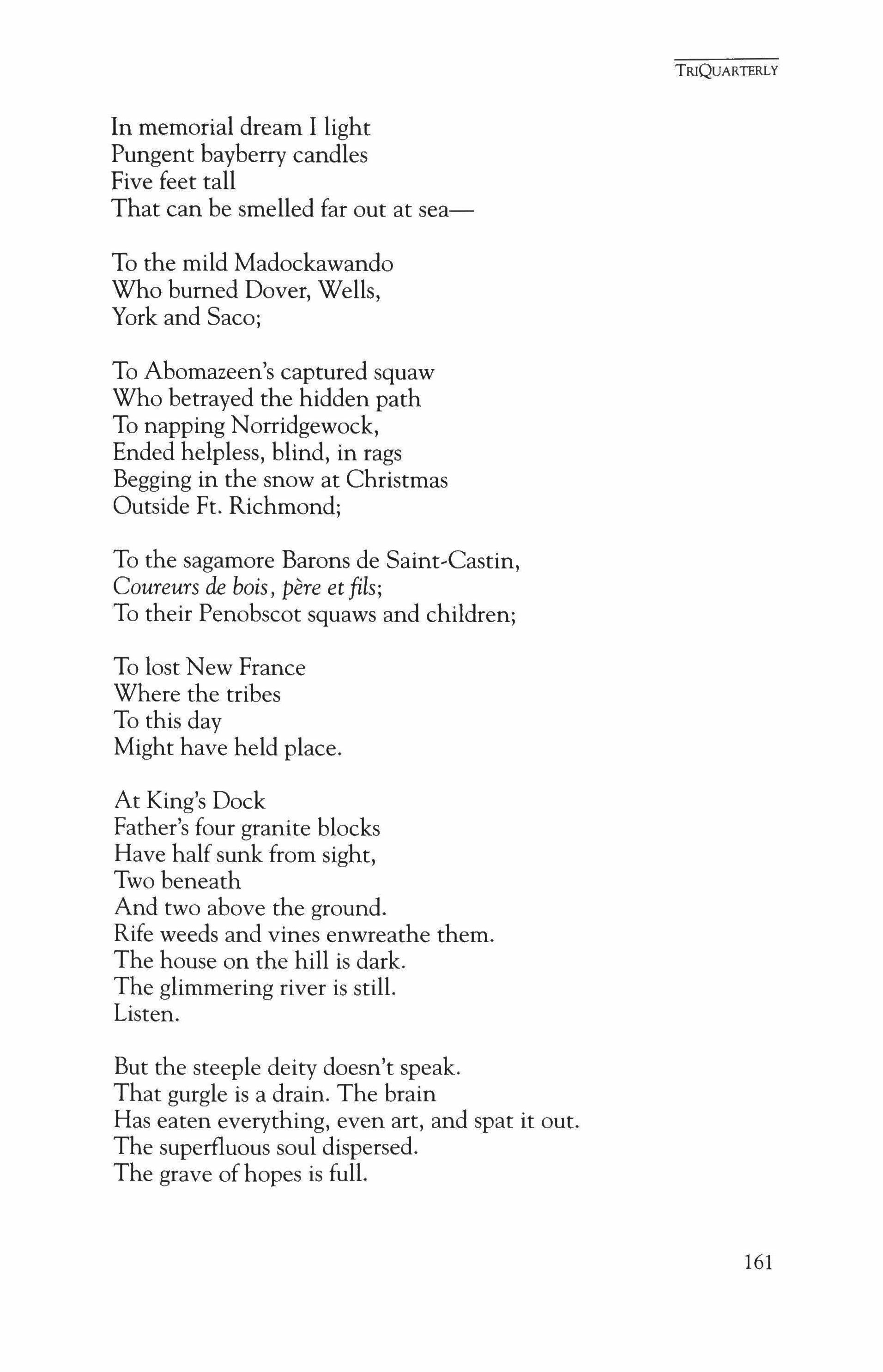
In memorial dream I light
Pungent bayberry candles
Five feet tall
That can be smelled far out at sea-
To the mild Madockawando
Who burned Dover, Wells, York and Saco;
To Abomazeen's captured squaw Who betrayed the hidden path
To napping Norridgewock, Ended helpless, blind, in rags
Begging in the snow at Christmas Outside Ft. Richmond;
To the sagamore Barons de Saint-Castin, Coureurs de bois, pere et fils;
To their Penobscot squaws and children;
To lost New France Where the tribes
To this day
Might have held place.
At King's Dock
Father's four granite blocks Have half sunk from sight, Two beneath
And two above the ground. Rife weeds and vines enwreathe them. The house on the hill is dark. The glimmering river is still. Listen.
But the steeple deity doesn't speak. That gurgle is a drain. The brain Has eaten everything, even art, and spat it out. The superfluous soul dispersed. The grave of hopes is full.
TruQUARTERLY 161
Two Poems
Ricardo Pau Llosa
Guayaquil

for M6nica
The photo the old man on the malec6n took reads us in the nineteenth century, within earshot of Bolivar and San Martin shaking bronze, marble-pantheoned hands. We pose beneath the tiles of shadow the trees and noon have paved. The old man uses a box for an eye. His arm will be swallowed by a dirty sleeve until our images dance in too bright a light on little pages.
As the four of us stand smiling by a cannon, the beggars move closer. Your cousin, like you, is beautiful and young. My friend the painter and I frame two nymphs. The trees and the white imprimaturs of the sun eat away at the male fringes.
The old man uncovers the lens, then covers it again and begs us not to move. His timing is manual, imprecise. Too much summer has no doubt flooded the project of this moment.
TRIQUARTERLY
162

It does not matter, he seems to say with a wave. Light is but the plagiarized discourse of angels, in Guayaquil at least, where the politely poor are circling, where the whole city smells as if God had pissed on the rooftops and his gold had washed down the grimy facades to fill mortal noses with equality.
Paradise hates the rose.
A while ago, in front of the church, we tried to feed the iguanas of Parque Seminario. They sniffed our offerings and disdained us. We saw them mate and thought it combat. They were fat and begged nothing,
orange, green and gray, spiked and helmeted like conquerors. No gargoyle is ever famished. Camouflaged yet detectable, they are nature's graffiti, content to lie monstrously on snarled extensions of seagrape or the oak's imperious arm.
Would that we, well-dressed among the mild impoverished and gaping at trees, might possess the reptiles' dualities, both shadow and thing, distinct but part of. Darwin's gargoyles have cut themselves free from cornice, spigot and prayer. They roam, a mute choir vacationing in anarchy, dismembering a rose with their leathery jaws, talons sunk into the pigeon's egg as they blink, one eye at a time, calmly embodying evils they unknowingly dispel.
TRIQUARTERLY 163
TRIQUARTERLY

The tropics move everything from its rightful place. Earlier, at the bank's museum, we saw colonial art encased in modem coolness. Goldleaf armored mere heads. A battered Jesus spouted blood, was devoured by ripped flesh. His heart dangled through a wound when the guide rocked the display. It seems the quiteiios wavered in the eighteenth century, so the icons grew brutal. Or maybe the indigenous artist coded his denunciations on the wooden master's idol.
I am jolted by the eyes of your cousin turning to the beggar woman in anger, "Work and leave us alone!"
The beggar followed the four of us down the malecon, a drying photo in each of our cupped palms. Indignation fails me like an angel. I have been strolling through the doorways of the elite for days, each one guarded by a shotgun and an idiot stare and thought nothing of it, and nothing of the bleeding gums
outside my hotel that pleaded I buy soap from her, and nothing of the blank gaze of the illiterate boy working on a water truck as on a pyramid, or the doorman offering to get me a girl.
And nothing of those bovine American children, the oldest seventeen, on the plane back to Miami, who had spent eight weeks with peasants, vaccinating dogs and digging latrines in the landscape of cocaine barons. This is the Children's Crusade, I thought.
164
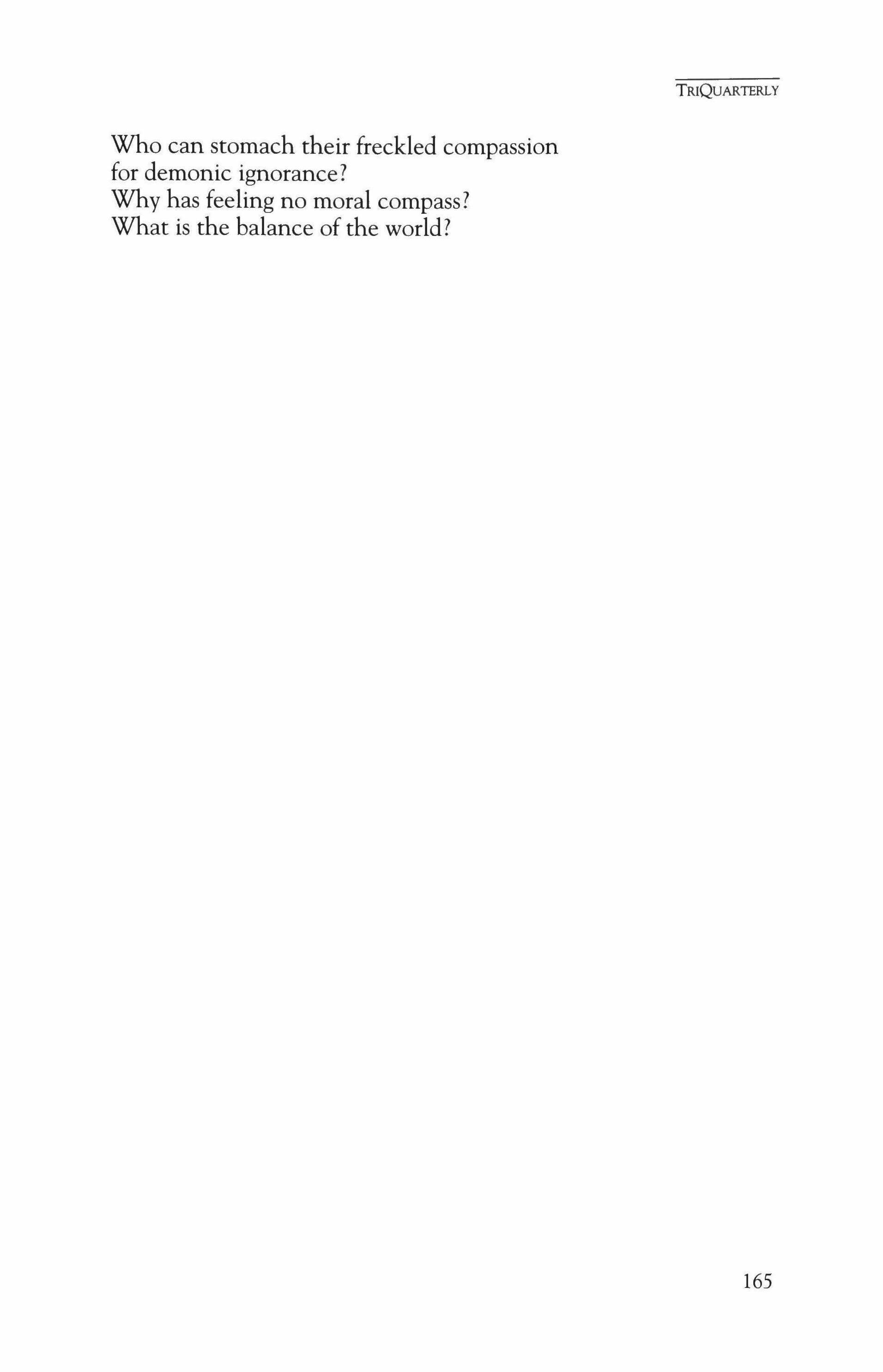
Who can stomach their freckled compassion for demonic ignorance?
Why has feeling no moral compass? What is the balance of the world?
TRIQUARTERLY
165
At the Bar
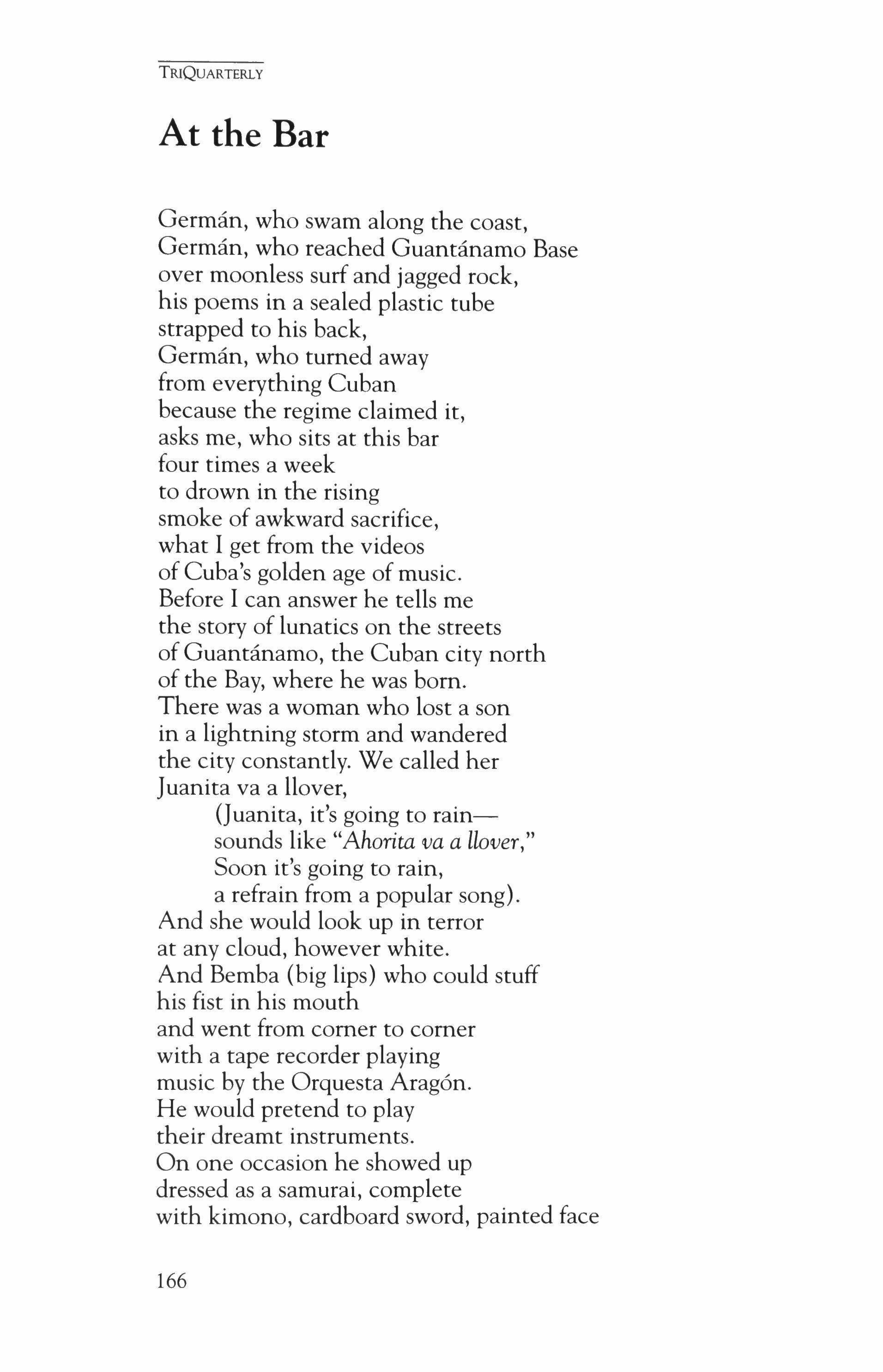
German, who swam along the coast, German, who reached Guantanamo Base over moonless surf and jagged rock, his poems in a sealed plastic tube strapped to his back, German, who turned away from everything Cuban because the regime claimed it, asks me, who sits at this bar four times a week to drown in the rising smoke of awkward sacrifice, what I get from the videos of Cuba's golden age of music. Before I can answer he tells me the story of lunatics on the streets of Guantanarno, the Cuban city north of the Bay, where he was born. There was a woman who lost a son in a lightning storm and wandered the city constantly. We called her Juanita va a Hover, (Juanita, it's going to rainsounds like "Ahorita va allover," Soon it's going to rain, a refrain from a popular song). And she would look up in terror at any cloud, however white. And Bemba (big lips) who could stuff his fist in his mouth and went from comer to comer with a tape recorder playing music by the Orquesta Aragon. He would pretend to play their dreamt instruments. On one occasion he showed up dressed as a samurai, complete with kimono, cardboard sword, painted face
TRIQUARTERLY
166
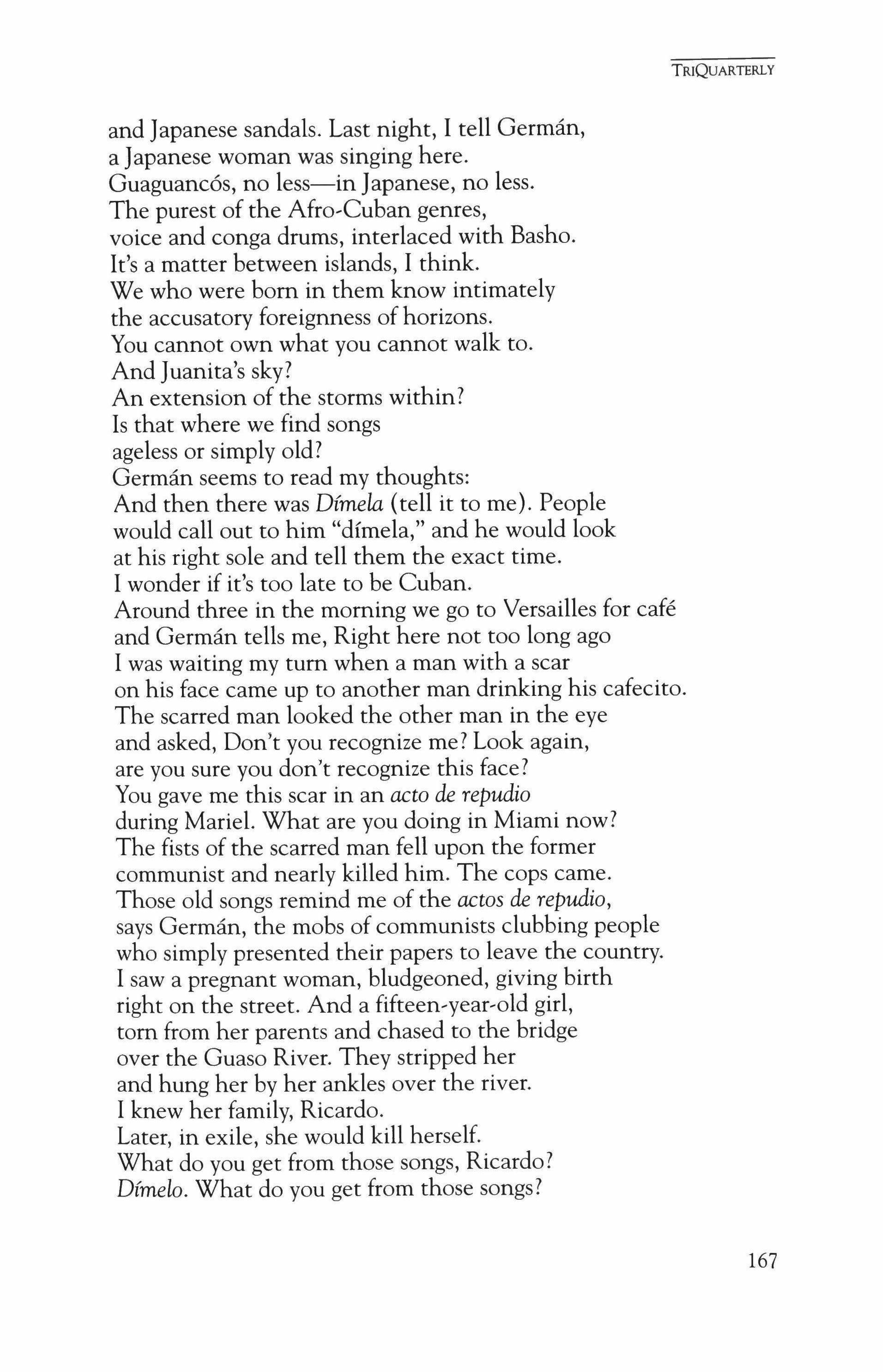
and Japanese sandals. Last night, I tell German, a Japanese woman was singing here. Guaguanc6s, no less-in Japanese, no less. The purest of the Afro-Cuban genres, voice and conga drums, interlaced with Basho. It's a matter between islands, I think. We who were born in them know intimately the accusatory foreignness of horizons. You cannot own what you cannot walk to. And Juanita's sky?
An extension of the storms within? Is that where we find songs ageless or simply old?
German seems to read my thoughts: And then there was Dfmela (tell it to me). People would call out to him "dfrnela," and he would look at his right sole and tell them the exact time. I wonder if it's too late to be Cuban.
Around three in the morning we go to Versailles for cafe and German tells me, Right here not too long ago I was waiting my tum when a man with a scar on his face came up to another man drinking his cafecito. The scarred man looked the other man in the eye and asked, Don't you recognize me? Look again, are you sure you don't recognize this face? You gave me this scar in an aeto de repudia during Mariel. What are you doing in Miami now? The fists of the scarred man fell upon the former communist and nearly killed him. The cops came. Those old songs remind me of the aetas de repudia, says German, the mobs of communists clubbing people who simply presented their papers to leave the country. I saw a pregnant woman, bludgeoned, giving birth right on the street. And a fifteen-year-old girl, tom from her parents and chased to the bridge over the Guaso River. They stripped her and hung her by her ankles over the river. I knew her family, Ricardo. Later, in exile, she would kill herself. What do you get from those songs, Ricardo? Dfmelo. What do you get from those songs?
TRIQUARTERLY
167
Anna at Eighteen Months
Linda Pastan

Just as it did for Eve, language comes tumbling in, word by parroted word as she names the world againeach beast and plant, each thing. For the floodgates are open wide and out of her dauntless mouth spill roughhewn syllables for elbow, eyes for chin. And touched by the wand of the word, roused from the alphabet's sleep new thoughts flutter awake like butterflies utterly changed, like her damp flirtatious lashes, beating their tiny wings.
TruQUARTERLY
168
The Rumanian Exquisite
Steve Orlen
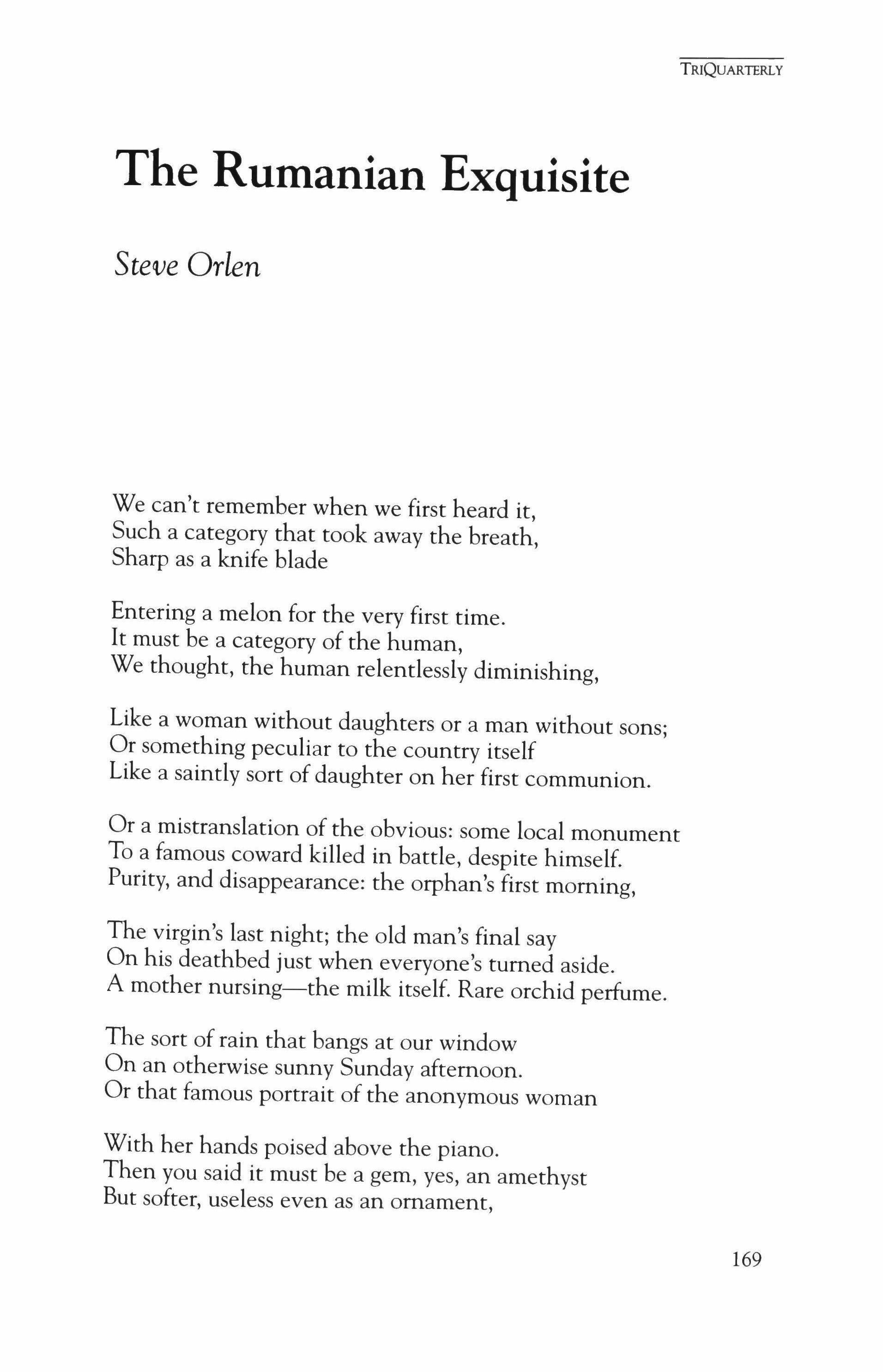
We can't remember when we first heard it, Such a category that took away the breath, Sharp as a knife blade
Entering a melon for the very first time. It must be a category of the human, We thought, the human relentlessly diminishing,
Like a woman without daughters or a man without sons; Or something peculiar to the country itself
Like a saintly sort of daughter on her first communion.
Or a mistranslation of the obvious: some local monument To a famous coward killed in battle, despite himself. Purity, and disappearance: the orphan's first morning,
The virgin's last night; the old man's final say On his deathbed just when everyone's turned aside. A mother nursing-the milk itself. Rare orchid perfume.
The sort of rain that bangs at our window On an otherwise sunny Sunday afternoon. Or that famous portrait of the anonymous woman
With her hands poised above the piano. Then you said it must be a gem, yes, an amethyst But softer, useless even as an ornament,
TRIQUARTERLY
169
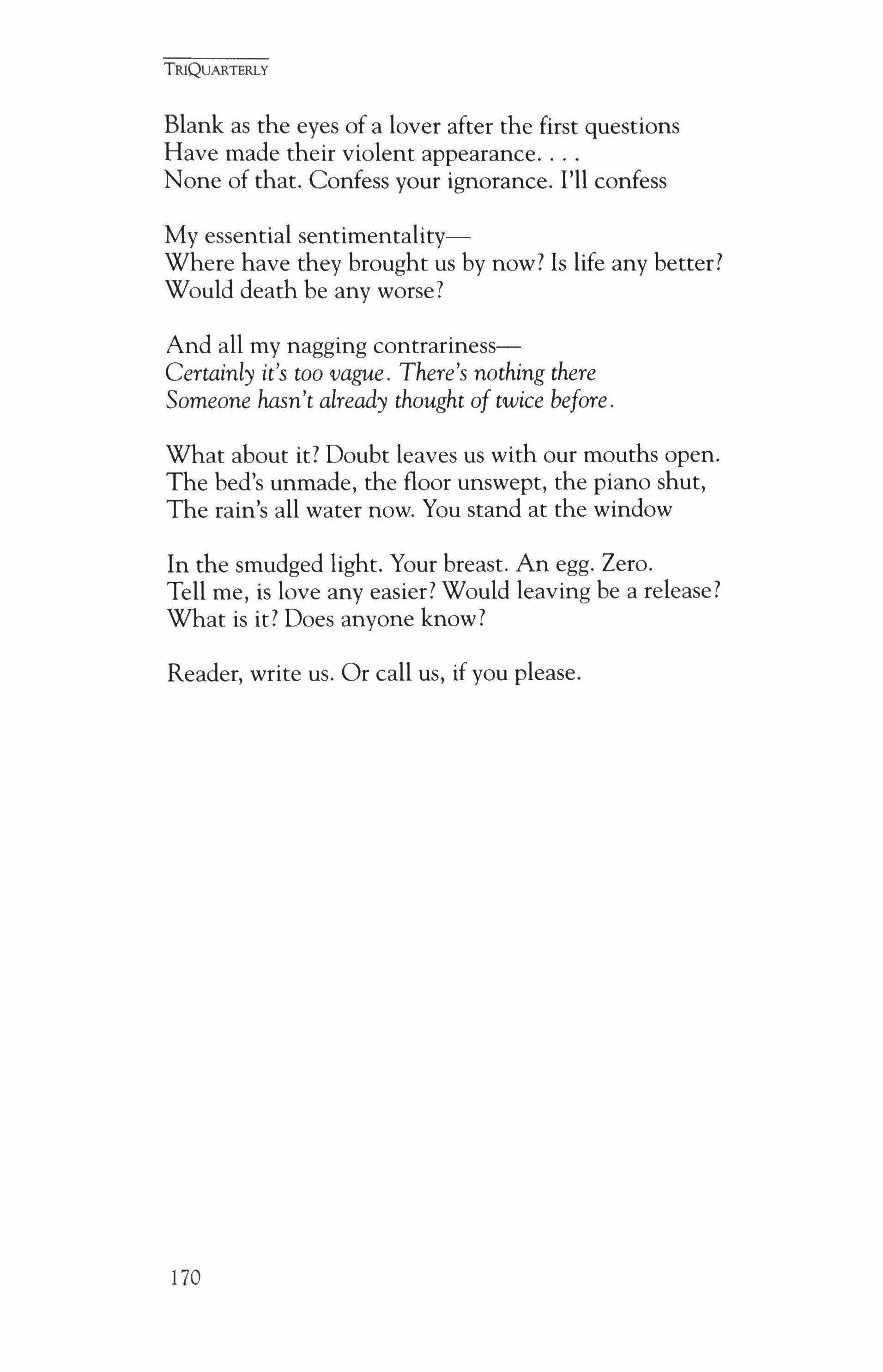
Blank as the eyes of a lover after the first questions Have made their violent appearance None of that. Confess your ignorance. I'll confess
My essential sentimentalityWhere have they brought us by now? Is life any better? Would death be any worse?
And all my nagging contrarinessCertainly it's too vague. There's nothing there Someone hasn't already thought of twice before.
What about it? Doubt leaves us with our mouths open. The bed's unmade, the floor unswept, the piano shut, The rain's all water now. You stand at the window
In the smudged light. Your breast. An egg. Zero. Tell me, is love any easier? Would leaving be a release? What is it? Does anyone know?
Reader, write us. Or call us, if you please.
TRIQUARTERLY
170
Dinosaurs Campbell McGrath
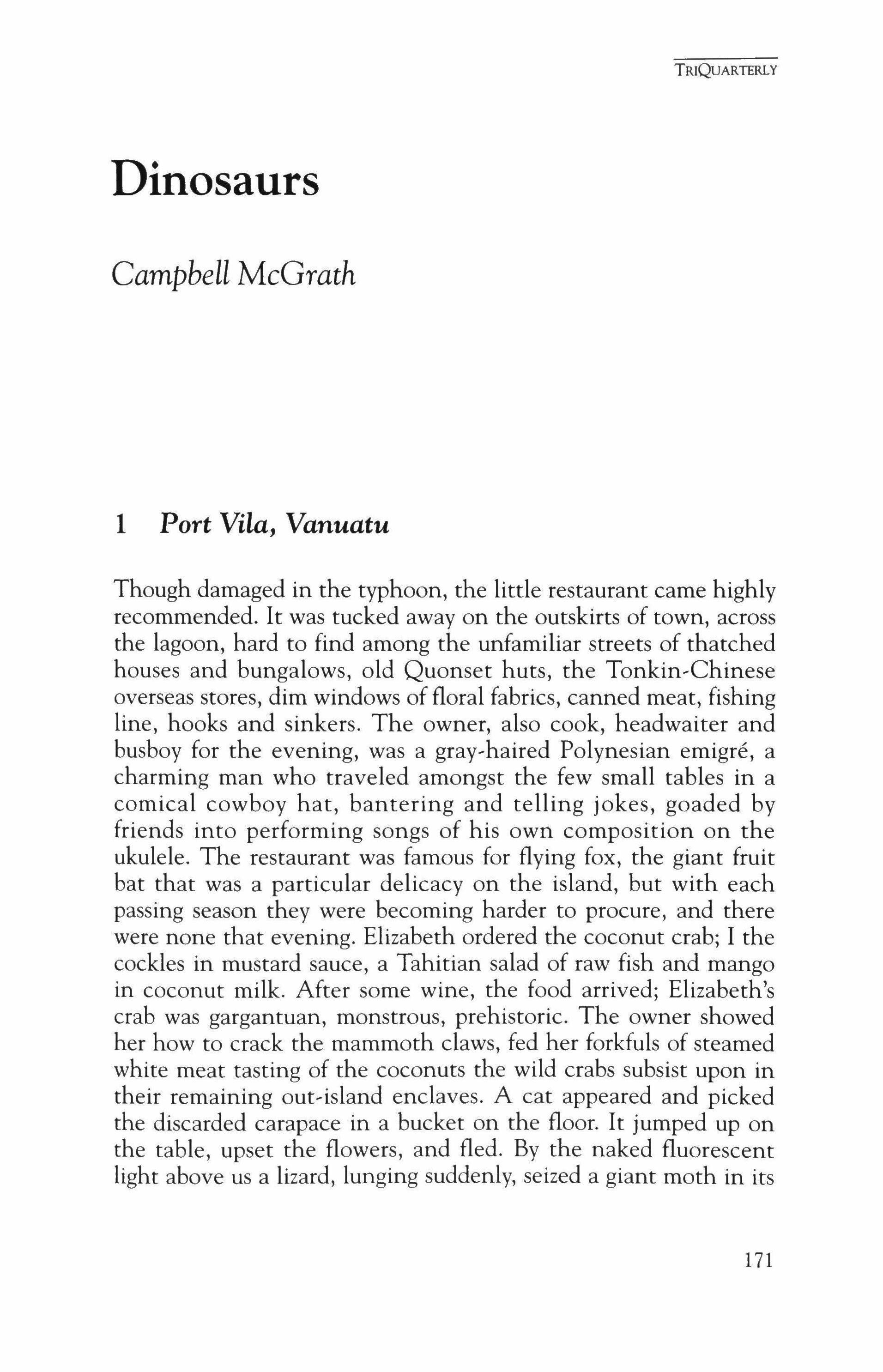
1 Port Vila, Vanuatu
Though damaged in the typhoon, the little restaurant came highly recommended. It was tucked away on the outskirts of town, across the lagoon, hard to find among the unfamiliar streets of thatched houses and bungalows, old Quonset huts, the Tonkin-Chinese overseas stores, dim windows of floral fabrics, canned meat, fishing line, hooks and sinkers. The owner, also cook, headwaiter and busboy for the evening, was a gray-haired Polynesian emigre, a charming man who traveled amongst the few small tables in a comical cowboy hat, bantering and telling jokes, goaded by friends into performing songs of his own composition on the ukulele. The restaurant was famous for flying fox, the giant fruit bat that was a particular delicacy on the island, but with each passing season they were becoming harder to procure, and there were none that evening. Elizabeth ordered the coconut crab; I the cockles in mustard sauce, a Tahitian salad of raw fish and mango in coconut milk. After some wine, the food arrived; Elizabeth's crab was gargantuan, monstrous, prehistoric. The owner showed her how to crack the mammoth claws, fed her forkfuls of steamed white meat tasting of the coconuts the wild crabs subsist upon in their remaining out-island enclaves. A cat appeared and picked the discarded carapace in a bucket on the floor. It jumped up on the table, upset the flowers, and fled. By the naked fluorescent light above us a lizard, lunging suddenly, seized a giant moth in its
TRIQUARTERLY
171
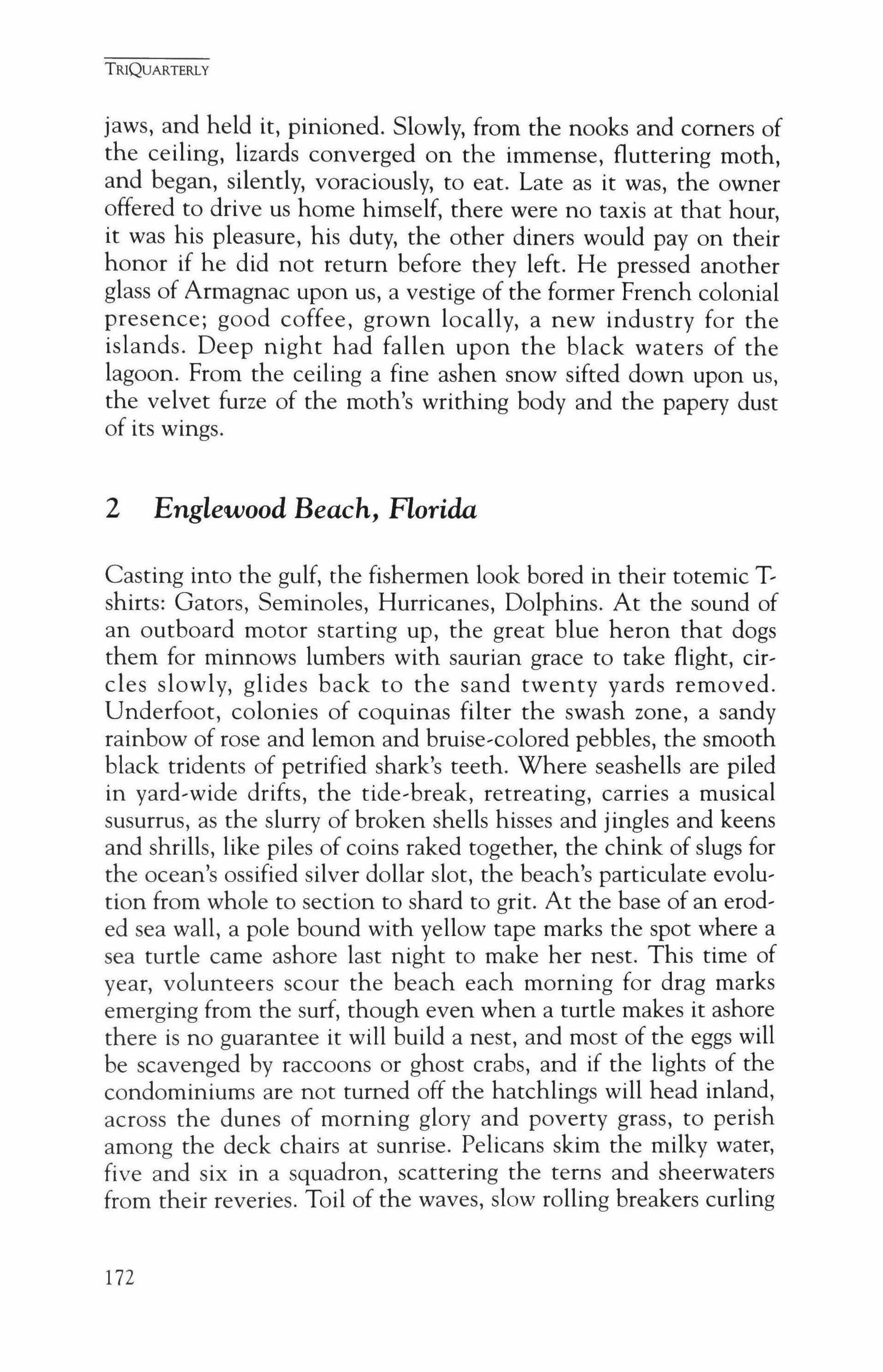
jaws, and held it, pinioned. Slowly, from the nooks and comers of the ceiling, lizards converged on the immense, fluttering moth, and began, silently, voraciously, to eat. Late as it was, the owner offered to drive us home himself, there were no taxis at that hour, it was his pleasure, his duty, the other diners would pay on their honor if he did not return before they left. He pressed another glass of Armagnac upon us, a vestige of the former French colonial presence; good coffee, grown locally, a new industry for the islands. Deep night had fallen upon the black waters of the lagoon. From the ceiling a fine ashen snow sifted down upon us, the velvet furze of the moth's writhing body and the papery dust of its wings.
2 Englewood Beach, Florida
Casting into the gulf, the fishermen look bored in their totemic T, shirts: Gators, Seminoles, Hurricanes, Dolphins. At the sound of an outboard motor starting up, the great blue heron that dogs them for minnows lumbers with saurian grace to take flight, cirdes slowly, glides back to the sand twenty yards removed. Underfoot, colonies of coquinas filter the swash zone, a sandy rainbow of rose and lemon and bruise-colored pebbles, the smooth black tridents of petrified shark's teeth. Where seashells are piled in yard-wide drifts, the tide-break, retreating, carries a musical susurrus, as the slurry of broken shells hisses and jingles and keens and shrills, like piles of coins raked together, the chink of slugs for the ocean's ossified silver dollar slot, the beach's particulate evolution from whole to section to shard to grit. At the base of an eroded sea wall, a pole bound with yellow tape marks the spot where a sea turtle came ashore last night to make her nest. This time of year, volunteers scour the beach each morning for drag marks emerging from the surf, though even when a turtle makes it ashore there is no guarantee it will build a nest, and most of the eggs will be scavenged by raccoons or ghost crabs, and if the lights of the condominiums are not turned off the hatchlings will head inland, across the dunes of morning glory and poverty grass, to perish among the deck chairs at sunrise. Pelicans skim the milky water, five and six in a squadron, scattering the terns and sheerwaters from their reveries. Toil of the waves, slow rolling breakers curling
TRIQUARTERLY
172
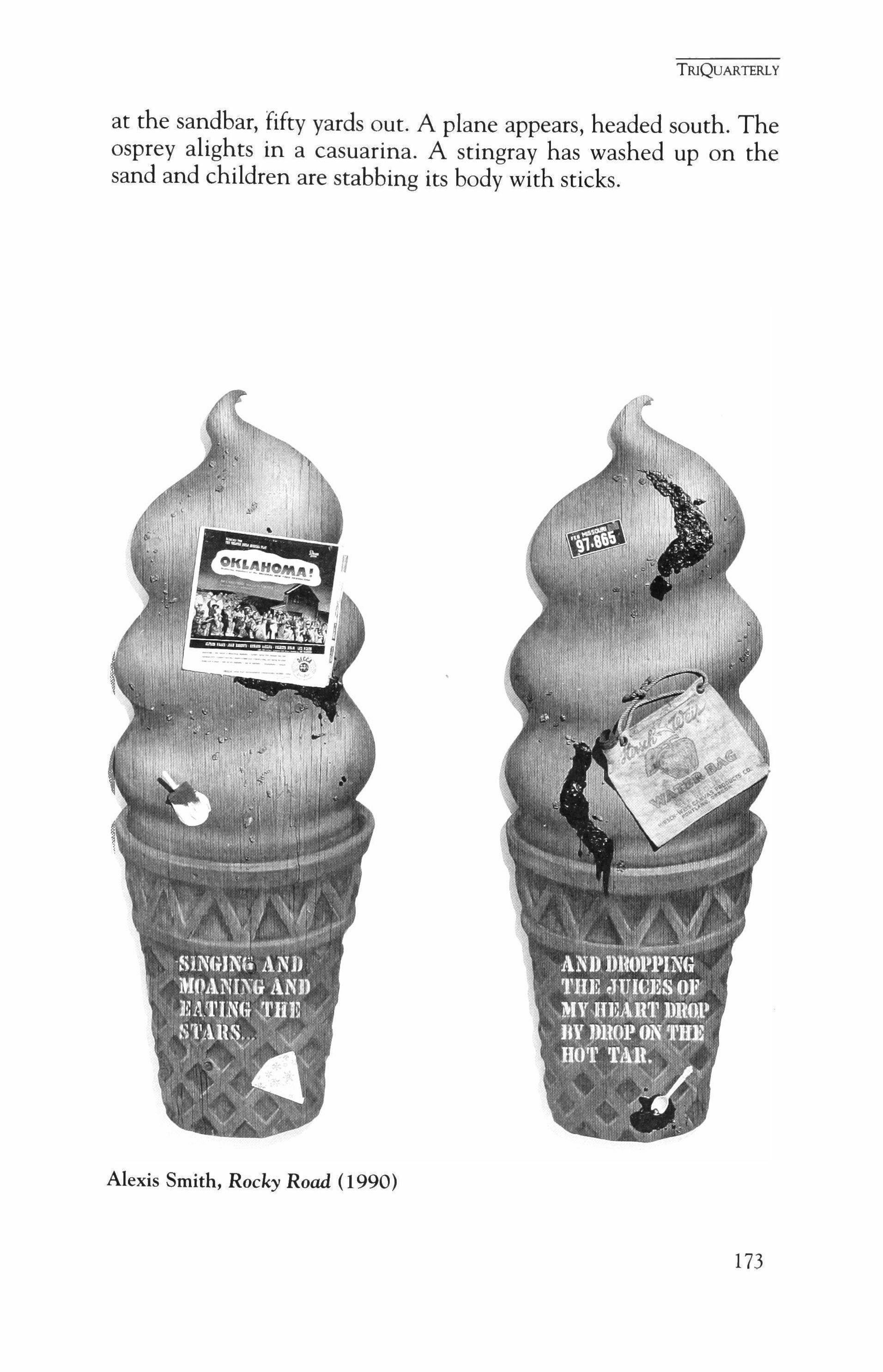
at the sandbar, fifty yards out. A plane appears, headed south. The osprey alights in a casuarina. A stingray has washed up on the sand and children are stabbing its body with sticks.
TRlQUARTERLY
173
Alexis Smith, Rocky Road (1990)
Ten Poems
Adrian C. Louis
Reductio Ad Absurdum
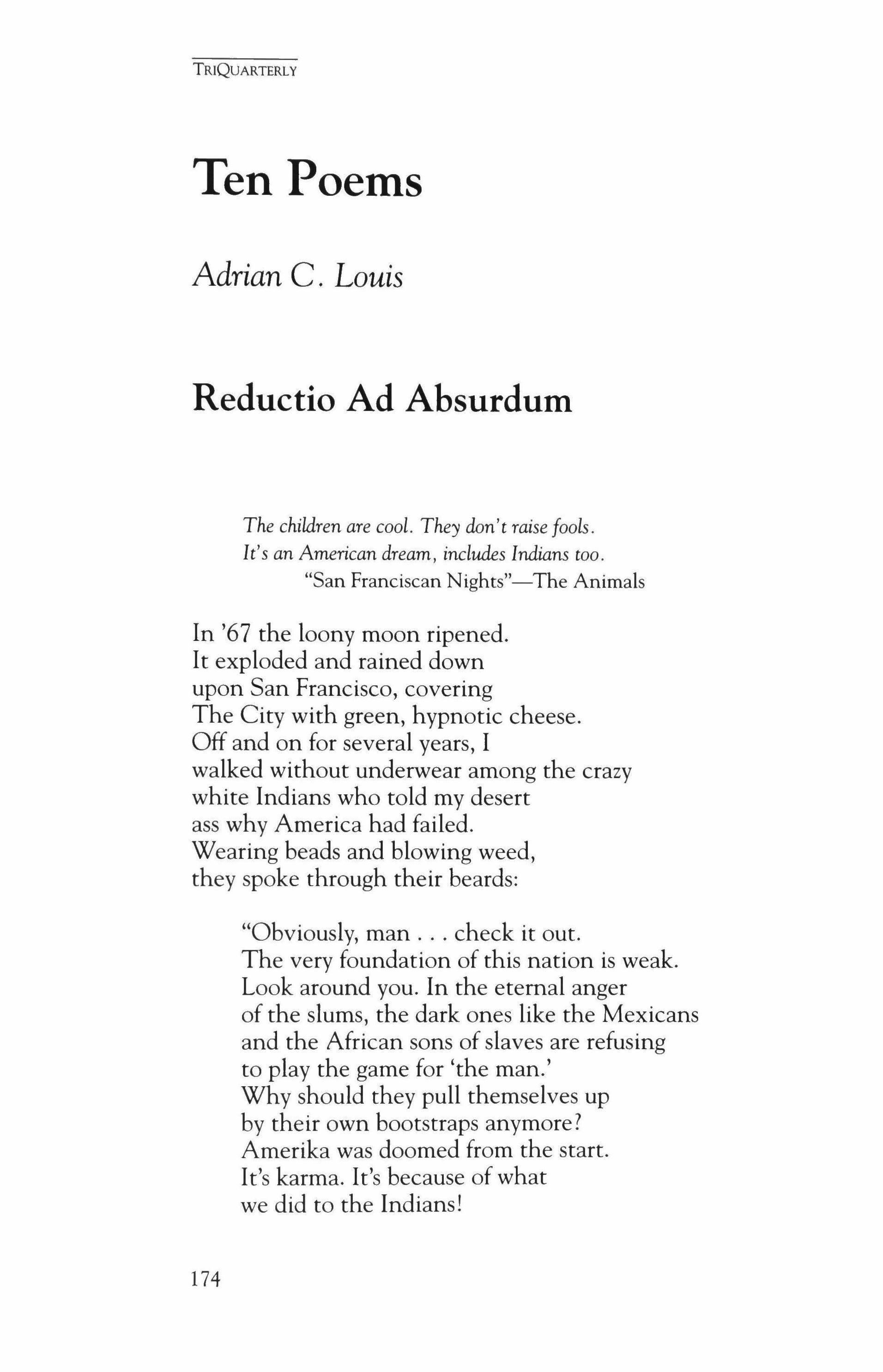
The children are cool. They don't raise fools It's an American dream, includes Indians too. "San Franciscan Nights"-The Animals
In '67 the loony moon ripened. It exploded and rained down upon San Francisco, covering The City with green, hypnotic cheese. Off and on for several years, I walked without underwear among the crazy white Indians who told my desert ass why America had failed. Wearing beads and blowing weed, they spoke through their beards:
"Obviously, man check it out. The very foundation of this nation is weak. Look around you. In the eternal anger of the slums, the dark ones like the Mexicans and the African sons of slaves are refusing to play the game for 'the man.' Why should they pull themselves up by their own bootstraps anymore? Amerika was doomed from the start. It's karma. It's because of what we did to the Indians!
TRIQUARTERLY
174
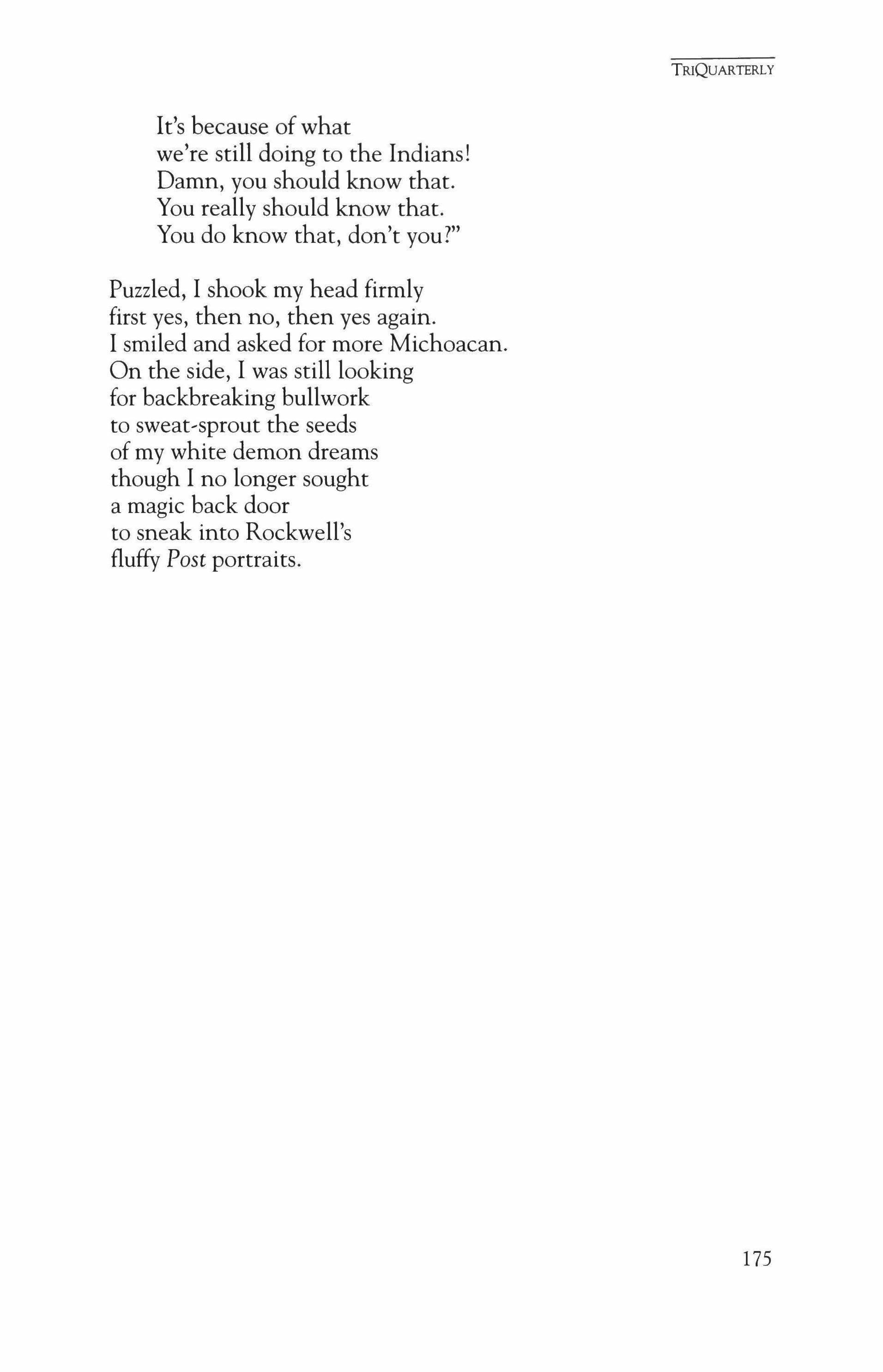
It's because of what we're still doing to the Indians! Damn, you should know that. You really should know that. You do know that, don't you?"
Puzzled, I shook my head firmly first yes, then no, then yes again. I smiled and asked for more Michoacan. On the side, I was still looking for backbreaking bullwork to sweat-sprout the seeds of my white demon dreams though I no longer sought a magic back door to sneak into Rockwell's fluffy Post portraits.
TRIQUARTERLY
175
Love Strikes

In Golden Gate Park beneath Hippie Hill near the benches filled with conga players I saw her electric thighs shimmering, sweating perfectly thumping to heart sounds amplified by wine and weed. There was nothing else to do but shake my butt alongside her. I did an awkward reflection of her demon dance and later she let me buy her some fish and chips. Said her name was China Girl. Said she'd ball me for a lid, then said she was just kidding. She'd ball me for free.
TRIQUARTERLY
176
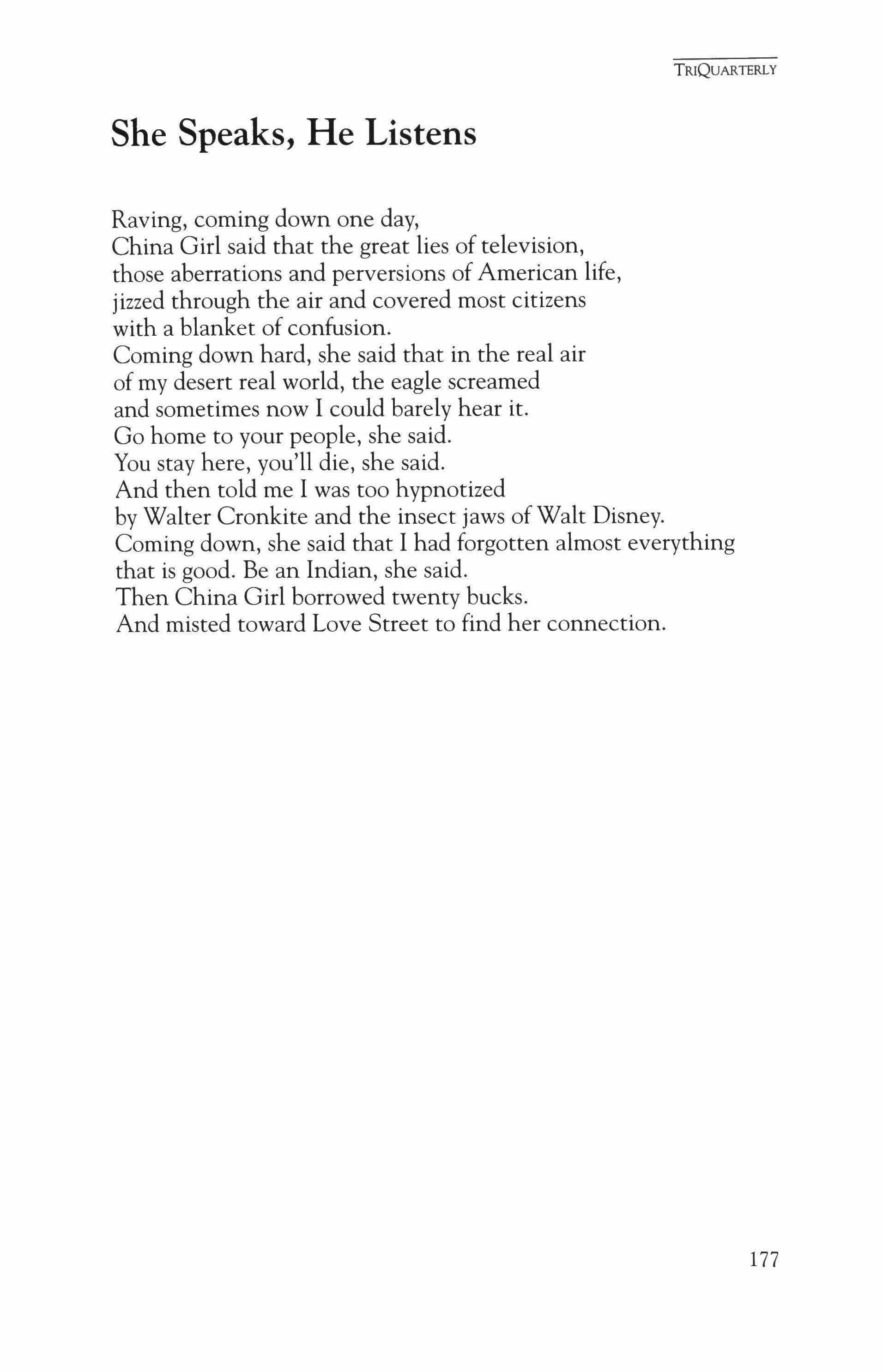
She Speaks, He Listens
Raving, coming down one day, China Girl said that the great lies of television, those aberrations and perversions of American life, jizzed through the air and covered most citizens with a blanket of confusion. Coming down hard, she said that in the real air of my desert real world, the eagle screamed and sometimes now I could barely hear it. Go home to your people, she said. You stay here, you'll die, she said. And then told me I was too hypnotized by Walter Cronkite and the insect jaws of Walt Disney. Coming down, she said that I had forgotten almost everything that is good. Be an Indian, she said. Then China Girl borrowed twenty bucks. And misted toward Love Street to find her connection.
TRIQUARTERLY
177

Listening to The Doors
Listening to The Doors blasting on the radio and toking mind-bending hash and speeding from Berkeley towards The City in China Girl's parents' paneled Ford wagon I fixated on the colony of driftwood sculptures in the mud flats before the Bay Bridge. The hash, the car, Jim Morrison and the eerie sculptures brought me towards panic. I prayed for calm and reached out to the small town of my desert mind. I remembered always watching the pimpled white kids leave my high school at three and spin their parents' cars out of the parking lot as disturbed as a nest of angry bees searching for an invisible honey thief. Indian kids, too poor to own cars, Us placed our feet upon the earth and moped towards our future or was it our past?
We weren't dreaming ofWovoka or Crazy Horse. We were dreaming of a good used car like China Girl's parents' paneled Ford wagon.
TRIQUARTERLY
178

At the Freight Yards
The ghost ofJesse James cornholes Doyle in fading freight yard dusk. My train time harmonica warbles sadder than Dylan and warns the majestic iron horse of our stand upon the tracks. Outlaw Doyle wants to hobo back east but his invisible six-shooters can't stop the dark tons of steel.
Whispers of death roar through the night. The cast,iron catatonic grumbles past and drowns out the chirps of citified crickets. The Southern Pacific beacon frown lights diesel smoke inside our brains and we hail the black caboose and fail and follow our shadows back up the crazed slopes to the heights of the Haight and beyond.
TRIQUARTERLY
179
Pacific Highway: 1967
Some of them knew pleasure. Some of them knew pain. Andfor some ofthem, it was only the moment that mattered.
-Jackson Browne
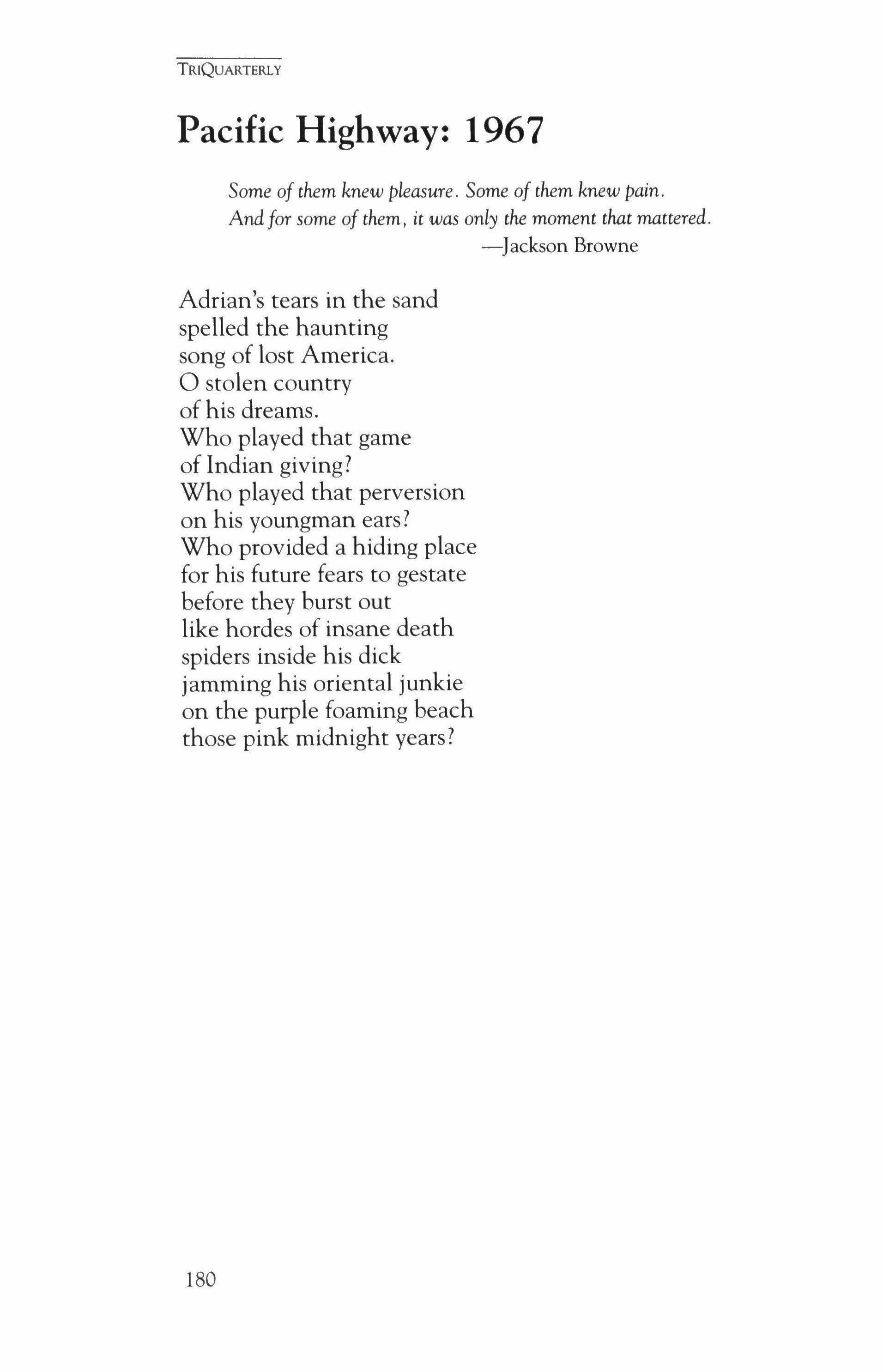
Adrian's tears in the sand spelled the haunting song of lost America. o stolen country of his dreams. Who played that game of Indian giving? Who played that perversion on his youngman ears? Who provided a hiding place for his future fears to gestate before they burst out like hordes of insane death spiders inside his dick jamming his oriental junkie on the purple foaming beach those pink midnight years?
TRIQUARTERLY
180
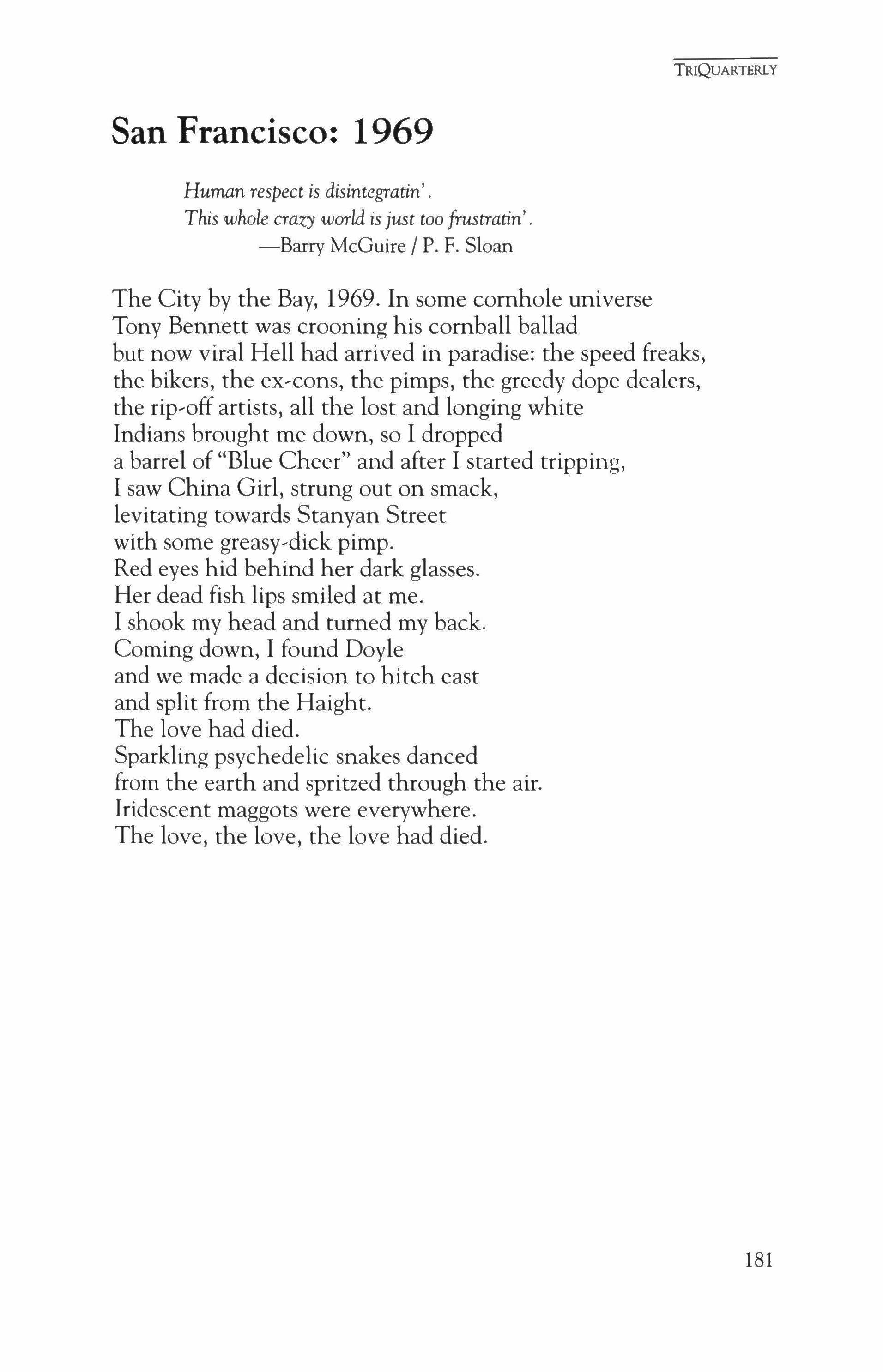
San Francisco: 1969
Human respect is disintegratin' This whole crazY world is just too frustratin' -Barry McGuire / P. F. Sloan
The City by the Bay, 1969. In some cornhole universe Tony Bennett was crooning his cornball ballad but now viral Hell had arrived in paradise: the speed freaks, the bikers, the ex-cons, the pimps, the greedy dope dealers, the rip-off artists, all the lost and longing white Indians brought me down, so I dropped a barrel of "Blue Cheer" and after I started tripping, I saw China Girl, strung out on smack, levitating towards Stanyan Street with some greasy-dick pimp. Red eyes hid behind her dark glasses. Her dead fish lips smiled at me. I shook my head and turned my back. Coming down, I found Doyle and we made a decision to hitch east and split from the Haight. The love had died.
Sparkling psychedelic snakes danced from the earth and spritzed through the air. Iridescent maggots were everywhere. The love, the love, the love had died.
TRIQUARTERLY
181

Trees, Rush Limbaugh, and the Failed Exorcism of China Girl's Ghost
April 1996. I was dreamflashing on the eucalyptus trees in Golden Gate Park twenty-eight years ago but then I snapped out of it. I exorcised the demons.
It is spring here on the Great Plains but the endless winter made sure my poplars were dead to the roots. And my old elms have finally refused to bud another year for the beetles. Dog pee has killed my young cedars. Damned crackhead Siouxs chopped down my two blue spruces at Christmas. My lilacs are verdant and rampant with weak-scented flowers but I doubt they'll support a noose. I say I should call Doc Kevorkian because I've contracted some deep form of madness that allows Rush Limbaugh to make sense to me. Sometimes I just doesn't know I'm wearied and worried too oftena million things to fret about. On "Good Morning America" I watch a florid, semi-puffy Bill Clinton jogging and sweating out the Big Macs and dodging questions about whether he has a soul or not. He's developed a drinker's nose.
Okay, yes, I was dreamflashing on the eucalyptus trees in Golden Gate Park twenty-eight years ago but I figured I'd snapped out of it.
TRIQUARTERLY
182
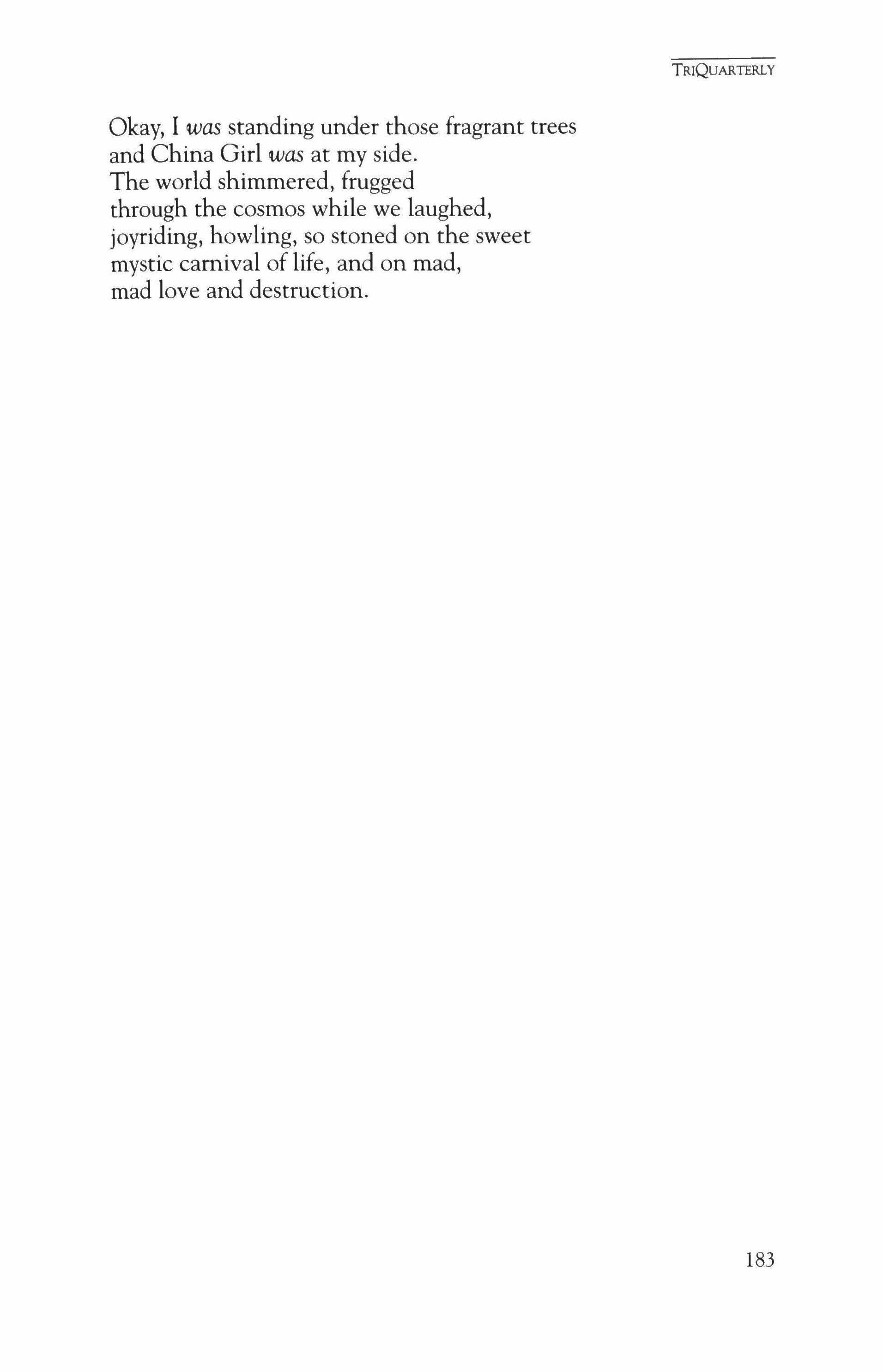
Okay, I was standing under those fragrant trees and China Girl was at my side. The world shimmered, frugged through the cosmos while we laughed, joyriding, howling, so stoned on the sweet mystic carnival of life, and on mad, mad love and destruction.
TRIQUARTERLY 183
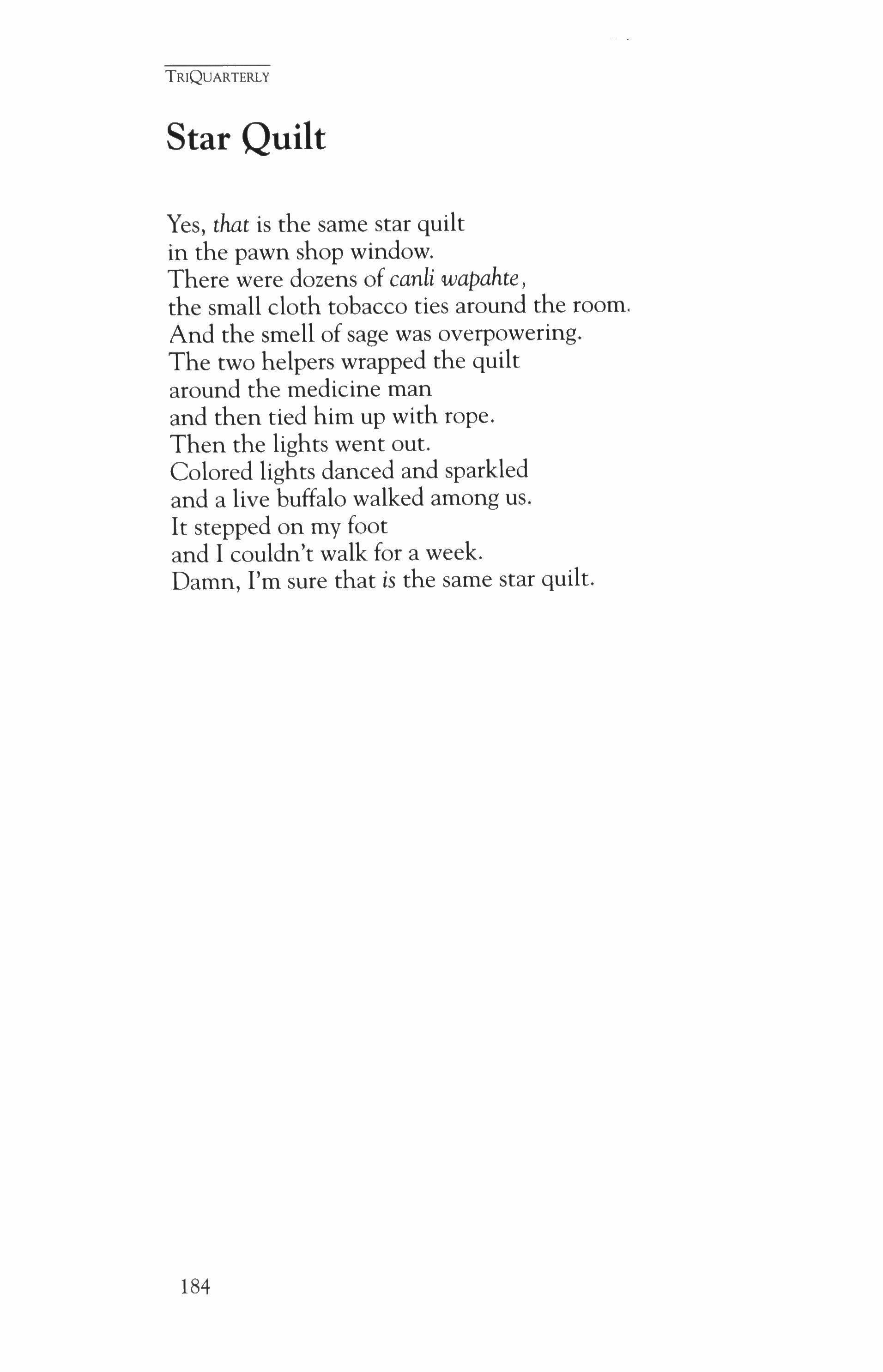
Star Quilt
Yes, that is the same star quilt in the pawn shop window. There were dozens of canli wapahte, the small cloth tobacco ties around the room. And the smell of sage was overpowering. The two helpers wrapped the quilt around the medicine man and then tied him up with rope. Then the lights went out. Colored lights danced and sparkled and a live buffalo walked among us. It stepped on my foot and I couldn't walk for a week. Damn, I'm sure that is the same star quilt.
TRIQUARTERLY
184
This Is the Rez
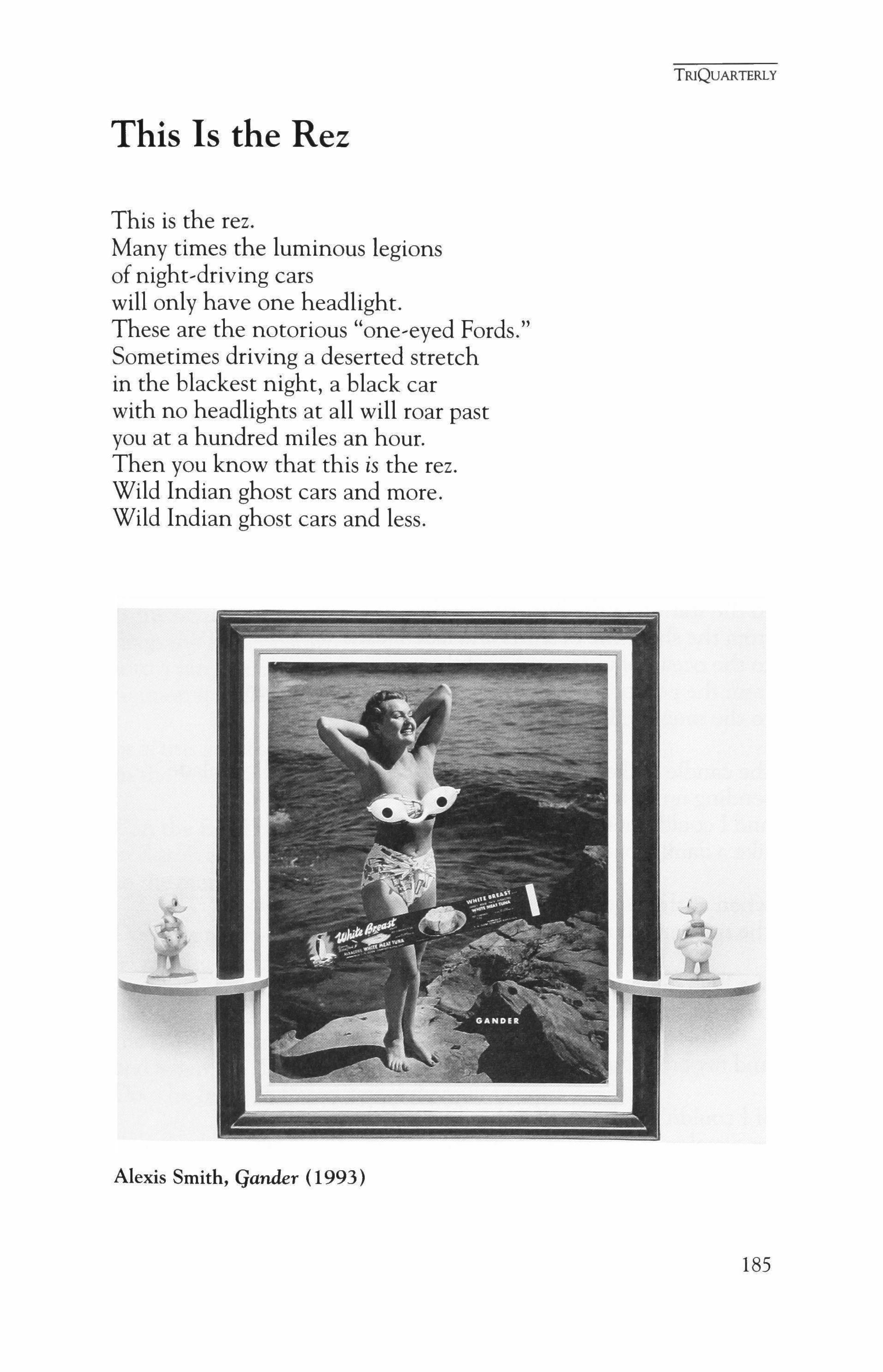
This is the rez. Many times the luminous legions of night-driving cars will only have one headlight. These are the notorious "one-eyed Fords." Sometimes driving a deserted stretch in the blackest night, a black car with no headlights at all will roar past you at a hundred miles an hour. Then you know that this is the rez. Wild Indian ghost cars and more. Wild Indian ghost cars and less.
TRIQUARTERLY
185
Alexis Smith, Gander (1993)
Three Poems
Tony Hoagland
Adam and Eve

I wanted to punch her right in the face and that's the truth.
After all, we had gotten from the station of the flickering glances to the station of the hungry mouths, from the shoreline of shirts and faded jeans to the ocean of unencumbered skin, from the perilous mountaintop of the apartment steps to the sanctified valley of the bed;
the candle flickering on the dressertop, its little yellow blade sending up its whiff of waxy smoke, and I could smell her readiness like a dank cloud poised above a field,
when at the crucial moment, the all,important moment the moment standing at attention
she held her milk-white hand agitatedly over the entrance to her body, and said no, and my brain burst into flame.
If I couldn't sink myself in her like a dark spur or dissolve into her like a dirt clod thrown in a river
TRIQUARTERLY
186
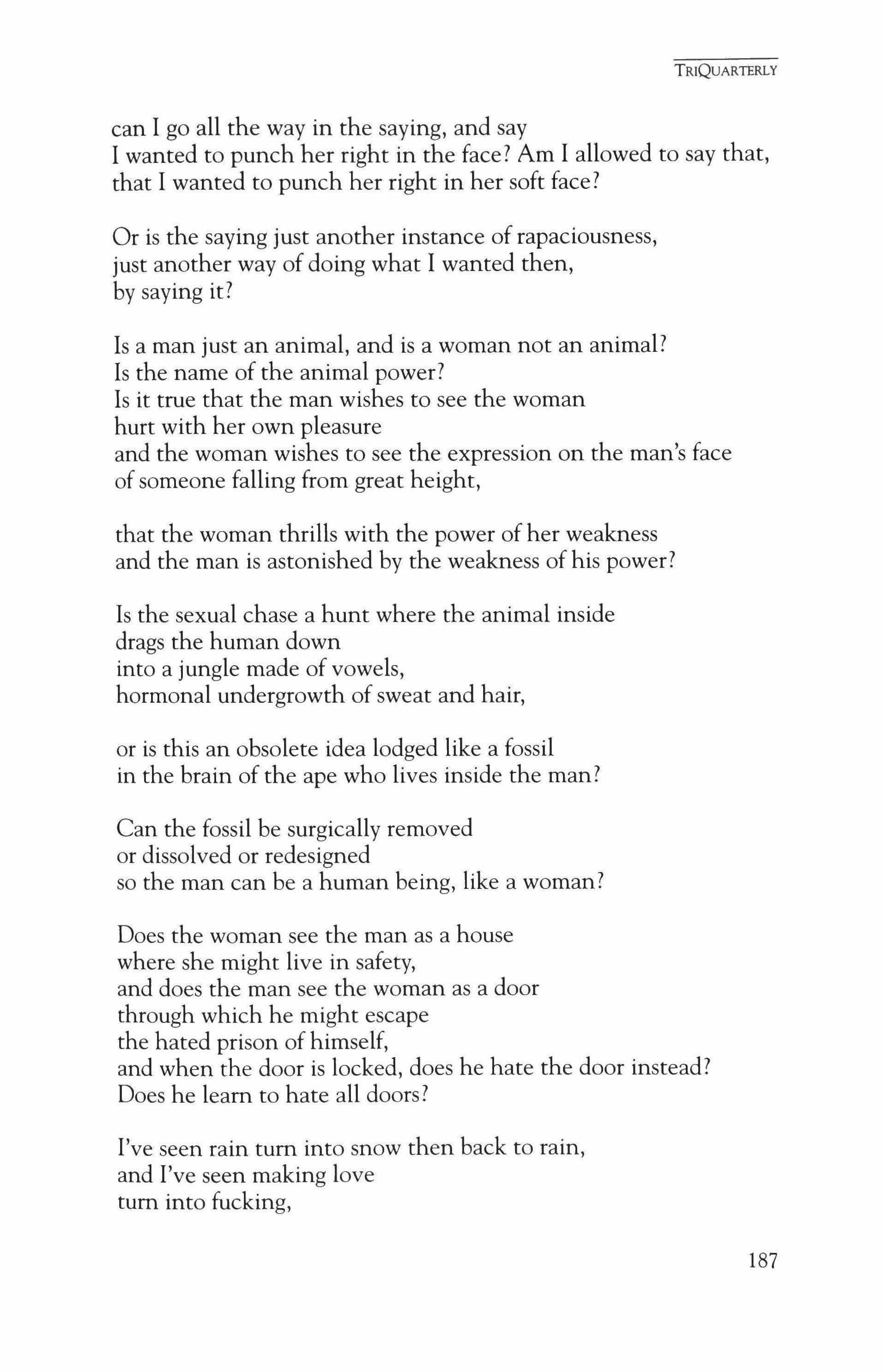
can I go all the way in the saying, and say I wanted to punch her right in the face? Am I allowed to say that, that I wanted to punch her right in her soft face?
Or is the saying just another instance of rapaciousness, just another way of doing what I wanted then, by saying it?
Is a man just an animal, and is a woman not an animal? Is the name of the animal power?
Is it true that the man wishes to see the woman hurt with her own pleasure and the woman wishes to see the expression on the man's face of someone falling from great height,
that the woman thrills with the power of her weakness and the man is astonished by the weakness of his power?
Is the sexual chase a hunt where the animal inside drags the human down into a jungle made of vowels, hormonal undergrowth of sweat and hair, or is this an obsolete idea lodged like a fossil in the brain of the ape who lives inside the man?
Can the fossil be surgically removed or dissolved or redesigned so the man can be a human being, like a woman?
Does the woman see the man as a house where she might live in safety, and does the man see the woman as a door through which he might escape the hated prison of himself, and when the door is locked, does he hate the door instead? Does he learn to hate all doors?
I've seen rain tum into snow then back to rain, and I've seen making love tum into fucking,
TRIQUARTERLY
187
TRIQUARTERLY
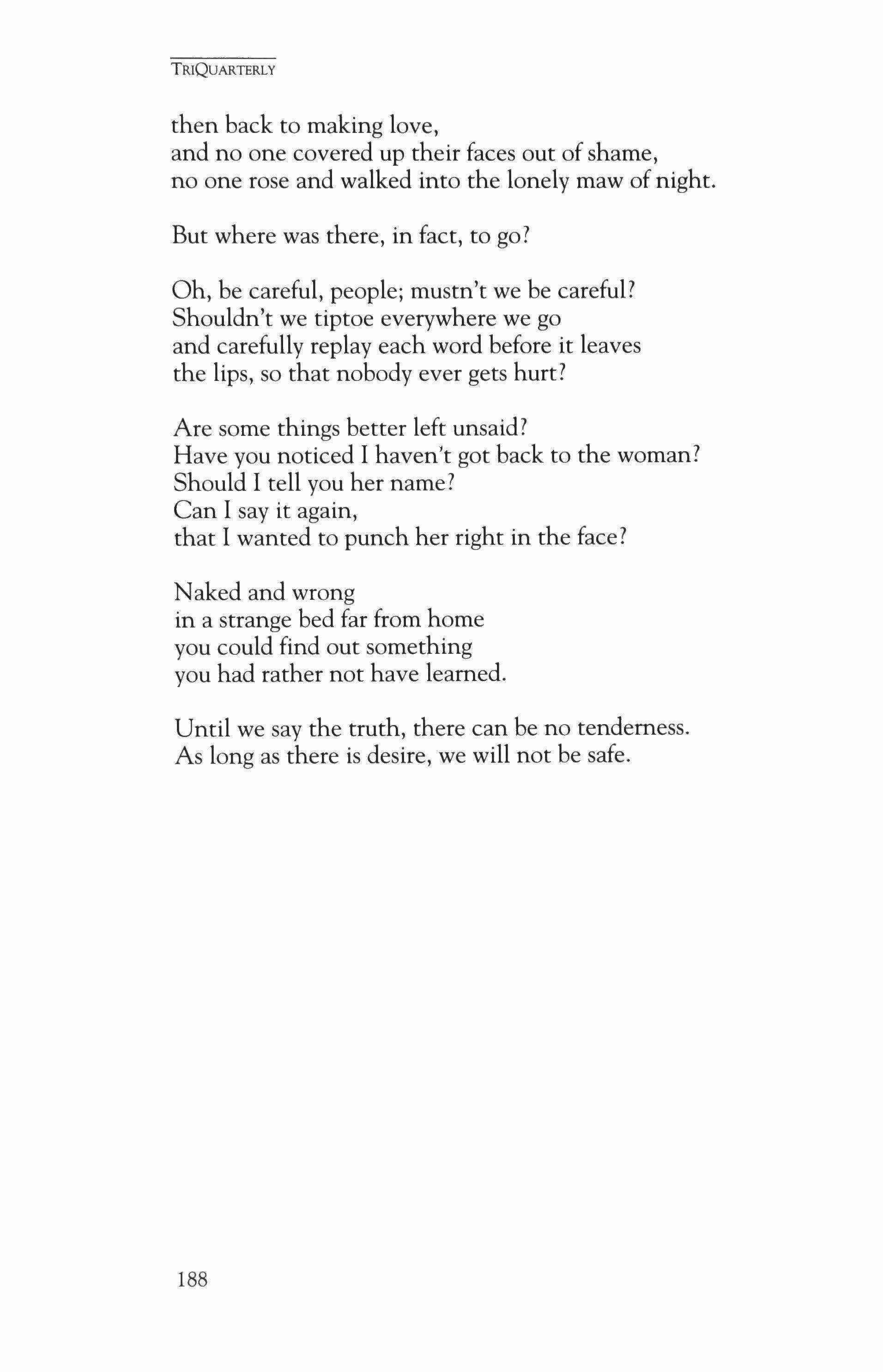
then back to making love, and no one covered up their faces out of shame, no one rose and walked into the lonely maw of night.
But where was there, in fact, to go?
Oh, be careful, people; mustn't we be careful? Shouldn't we tiptoe everywhere we go and carefully replay each word before it leaves the lips, so that nobody ever gets hurt?
Are some things better left unsaid?
Have you noticed I haven't got back to the woman?
Should I tell you her name?
Can I say it again, that I wanted to punch her right in the face?
Naked and wrong in a strange bed far from home you could find out something you had rather not have learned.
Until we say the truth, there can be no tenderness. As long as there is desire, we will not be safe.
188
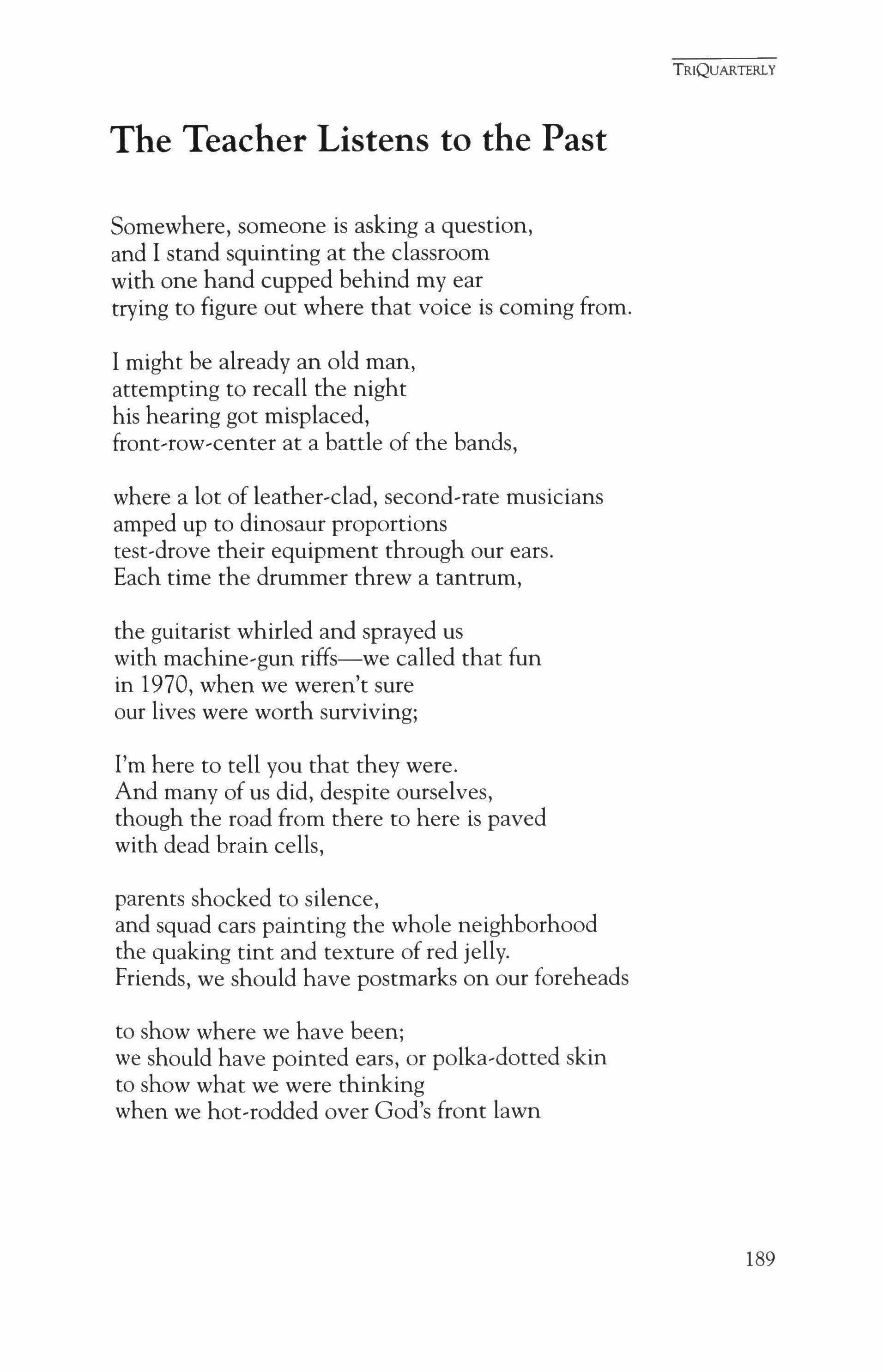
The Teacher Listens to the Past
Somewhere, someone is asking a question, and I stand squinting at the classroom with one hand cupped behind my ear trying to figure out where that voice is coming from.
I might be already an old man, attempting to recall the night his hearing got misplaced, front-row-center at a battle of the bands, where a lot of leather,clad, second-rate musicians amped up to dinosaur proportions test-drove their equipment through our ears. Each time the drummer threw a tantrum, the guitarist whirled and sprayed us with machine-gun riffs-we called that fun in 1970, when we weren't sure our lives were worth surviving;
I'm here to tell you that they were. And many of us did, despite ourselves, though the road from there to here is paved with dead brain cells, parents shocked to silence, and squad cars painting the whole neighborhood the quaking tint and texture of red jelly. Friends, we should have postmarks on our foreheads to show where we have been; we should have pointed ears, or polka-dotted skin to show what we were thinking when we hot-rodded over God's front lawn
TRIQUARTERLY 189
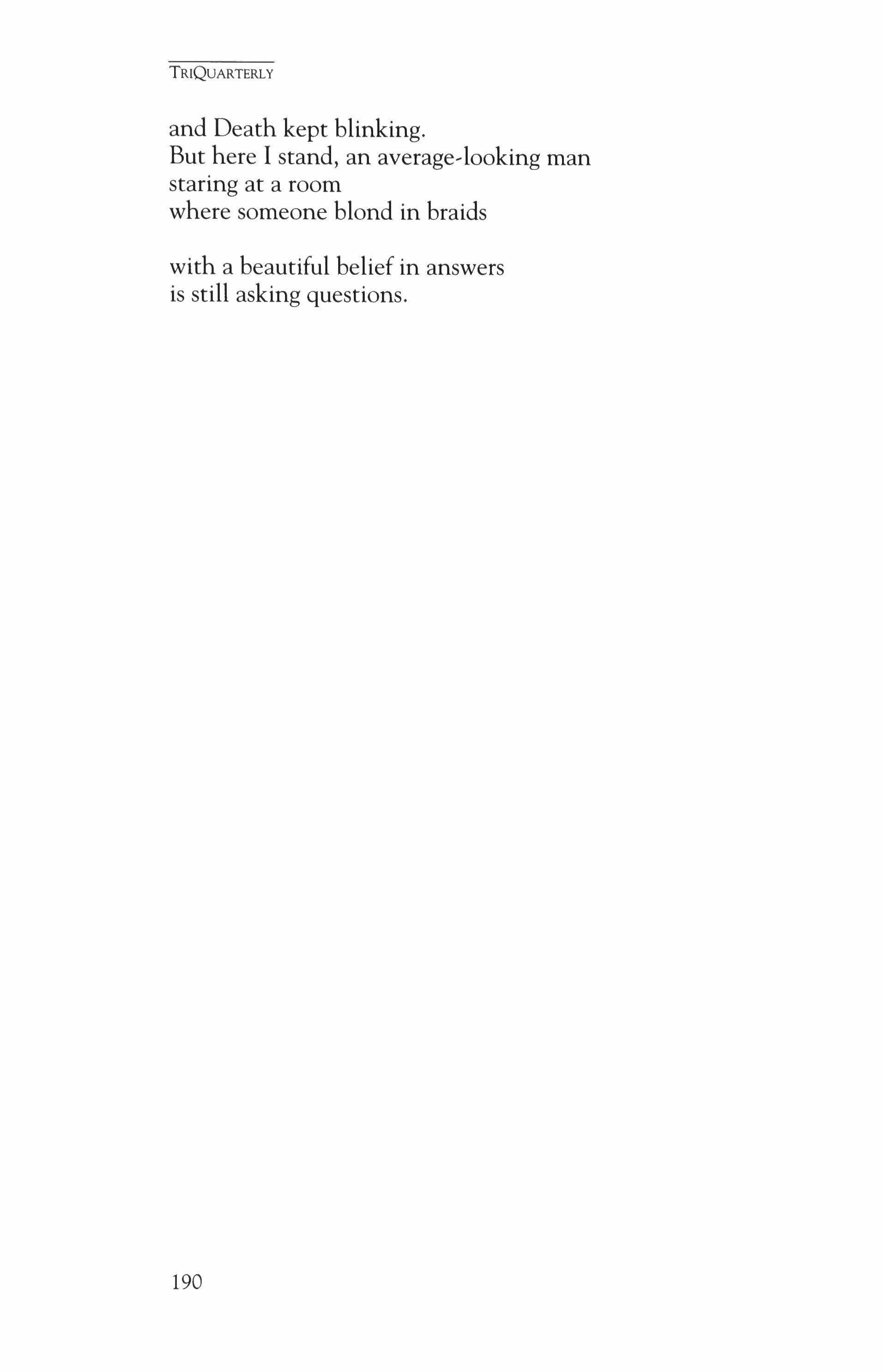
and Death kept blinking. But here I stand, an average-looking man staring at a room where someone blond in braids with a beautiful belief in answers is still asking questions.
TRIQUARTERLY
190
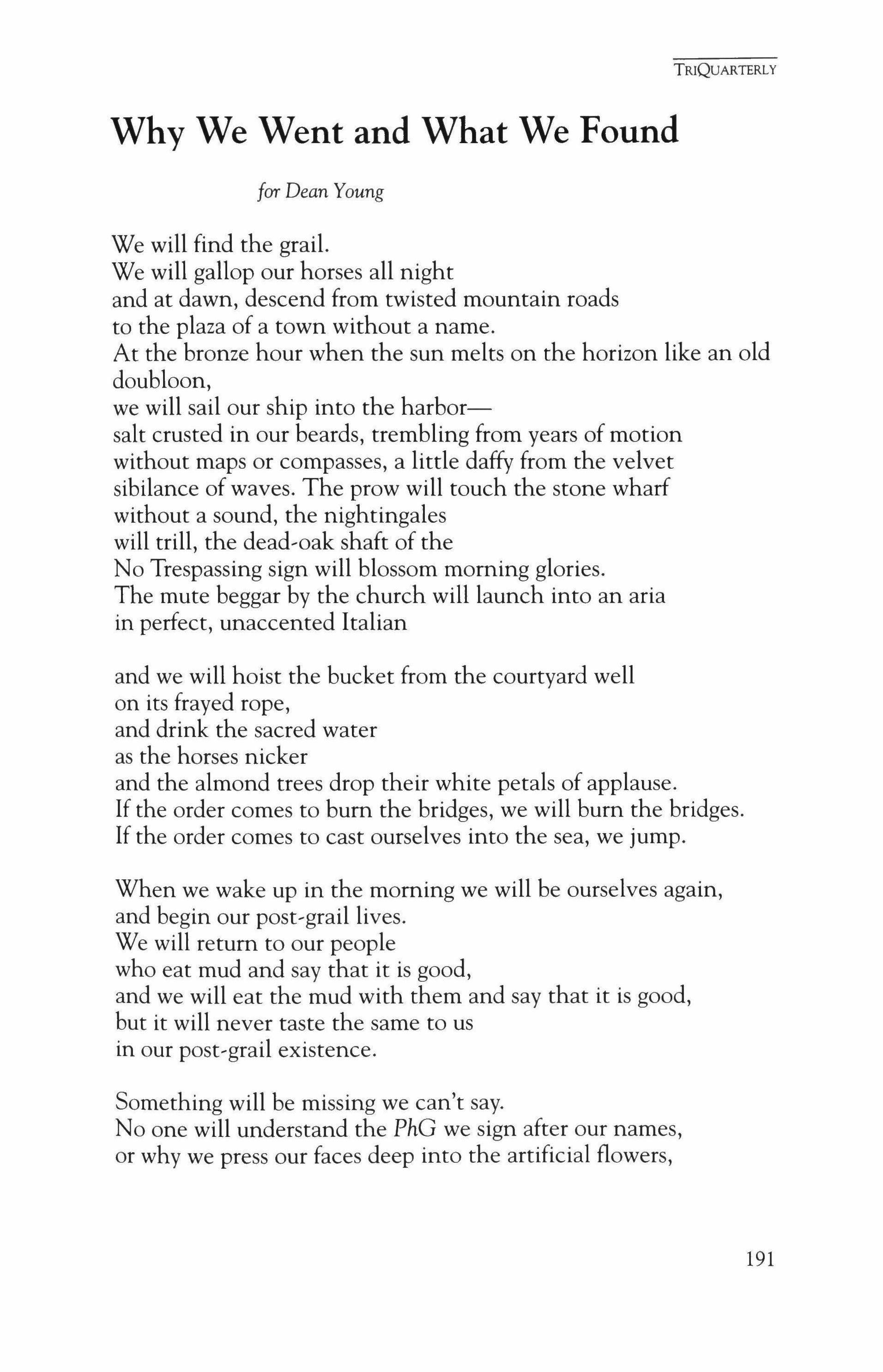
Why We Went and What We Found
for Dean Young
We will find the grail. We will gallop our horses all night and at dawn, descend from twisted mountain roads to the plaza of a town without a name. At the bronze hour when the sun melts on the horizon like an old doubloon, we will sail our ship into the harborsalt crusted in our beards, trembling from years of motion without maps or compasses, a little daffy from the velvet sibilance of waves. The prow will touch the stone wharf without a sound, the nightingales will trill, the dead,oak shaft of the No Trespassing sign will blossom morning glories. The mute beggar by the church will launch into an aria in perfect, unaccented Italian
and we will hoist the bucket from the courtyard well on its frayed rope, and drink the sacred water as the horses nicker and the almond trees drop their white petals of applause. If the order comes to bum the bridges, we will bum the bridges. If the order comes to cast ourselves into the sea, we jump.
When we wake up in the morning we will be ourselves again, and begin our post-grail lives. We will return to our people who eat mud and say that it is good, and we will eat the mud with them and say that it is good, but it will never taste the same to us in our post-grail existence.
Something will be missing we can't say. No one will understand the PhG we sign after our names, or why we press our faces deep into the artificial flowers,
TRIQUARTERLY
191
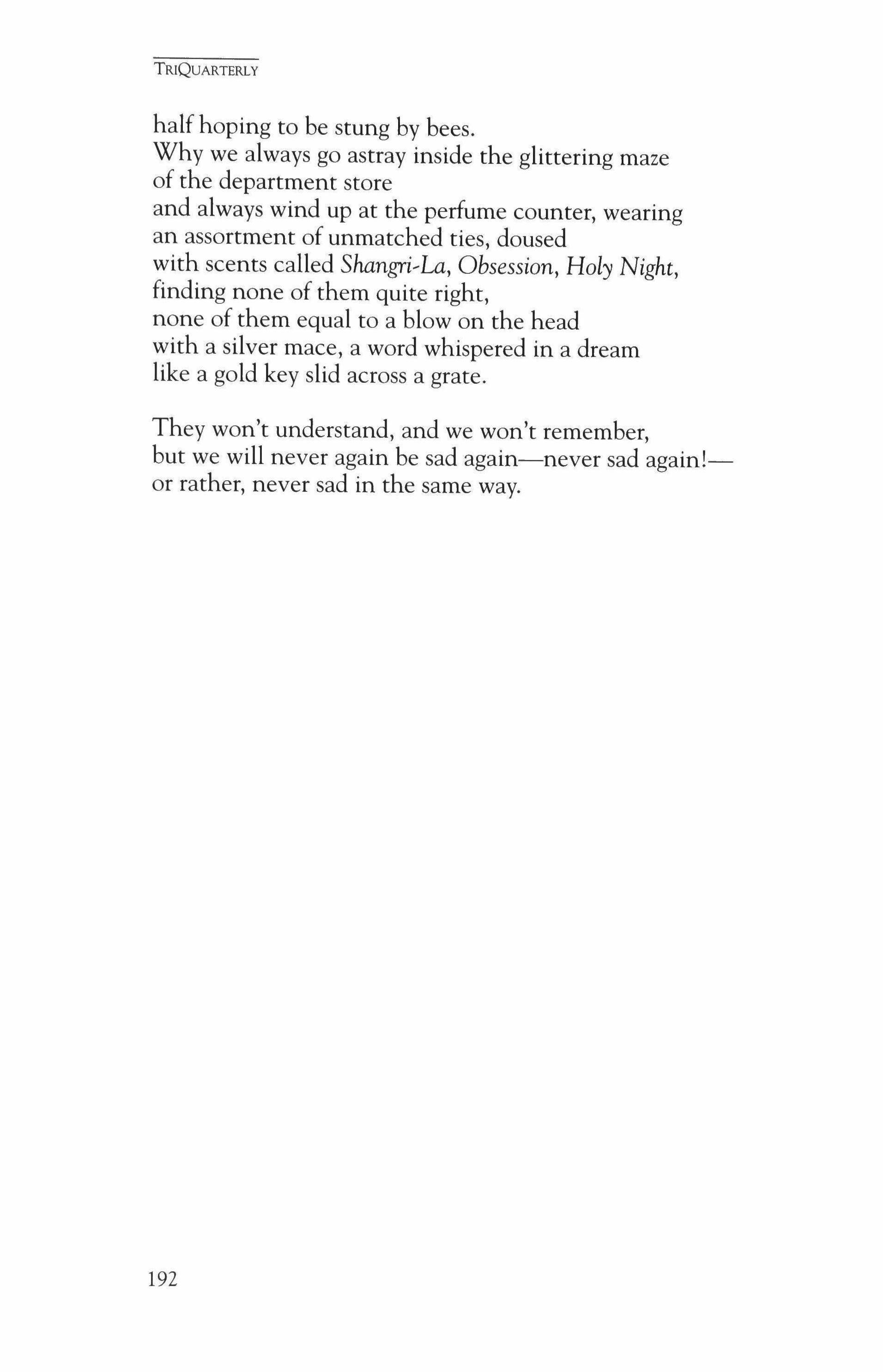
half hoping to be stung by bees. Why we always go astray inside the glittering maze of the department store and always wind up at the perfume counter, wearing an assortment of unmatched ties, doused with scents called Shangri,La, Obsession, Holy Night, finding none of them quite right, none of them equal to a blow on the head with a silver mace, a word whispered in a dream like a gold key slid across a grate.
They won't understand, and we won't remember, but we will never again be sad again-never sad again!or rather, never sad in the same way.
TRIQUARTERLY
192
Two Poems
Ray Gonzalez
Angelo
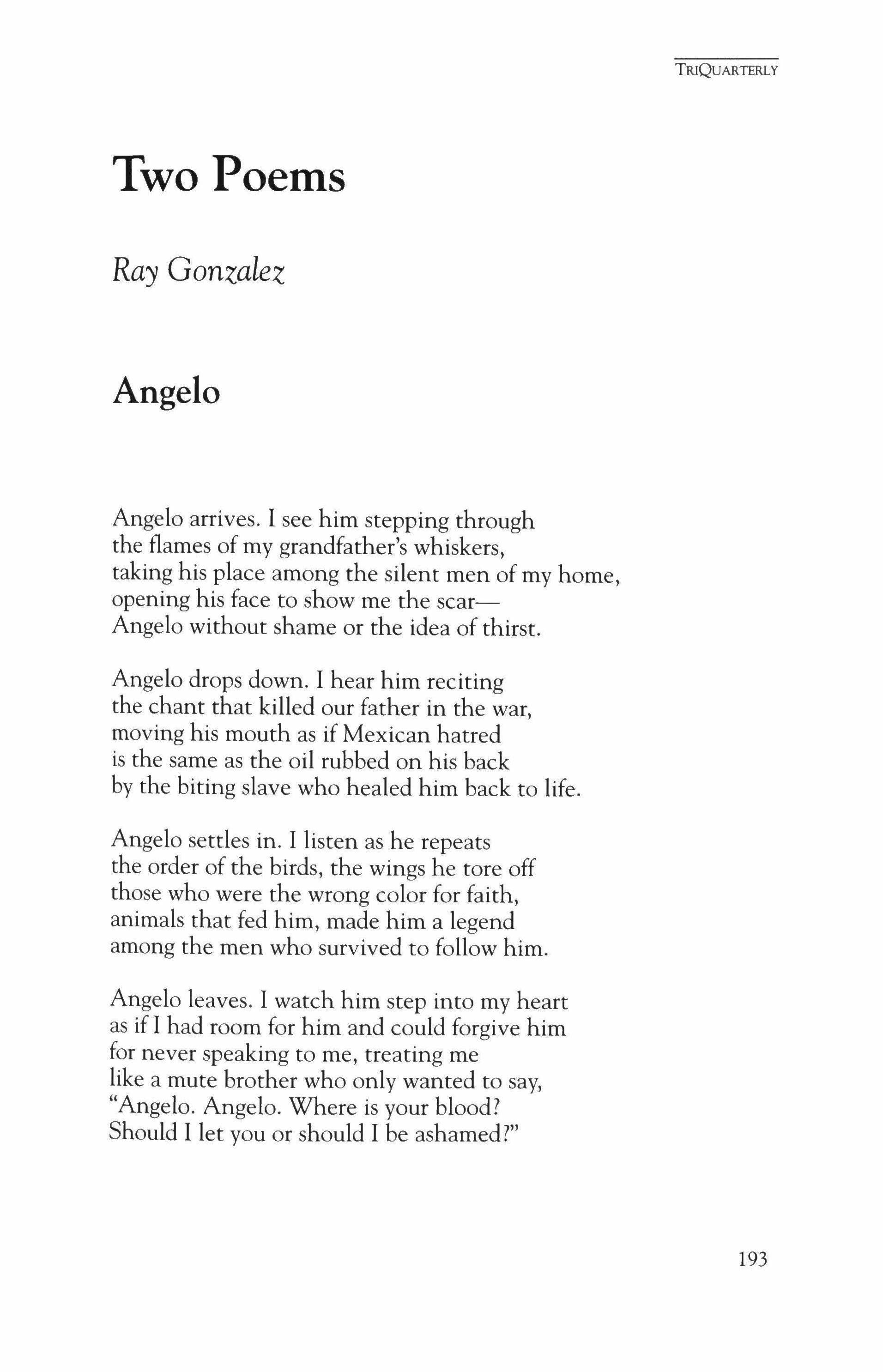
Angelo arrives. I see him stepping through the flames of my grandfather's whiskers, taking his place among the silent men of my home, opening his face to show me the scarAngelo without shame or the idea of thirst.
Angelo drops down. I hear him reciting the chant that killed our father in the war, moving his mouth as if Mexican hatred is the same as the oil rubbed on his back by the biting slave who healed him back to life.
Angelo settles in. I listen as he repeats the order of the birds, the wings he tore off those who were the wrong color for faith, animals that fed him, made him a legend among the men who survived to follow him.
Angelo leaves. I watch him step into my heart as if I had room for him and could forgive him for never speaking to me, treating me like a mute brother who only wanted to say, "Angelo. Angelo. Where is your blood? Should I let you or should I be ashamed?"
TruQUARTERLY 193
Mexican
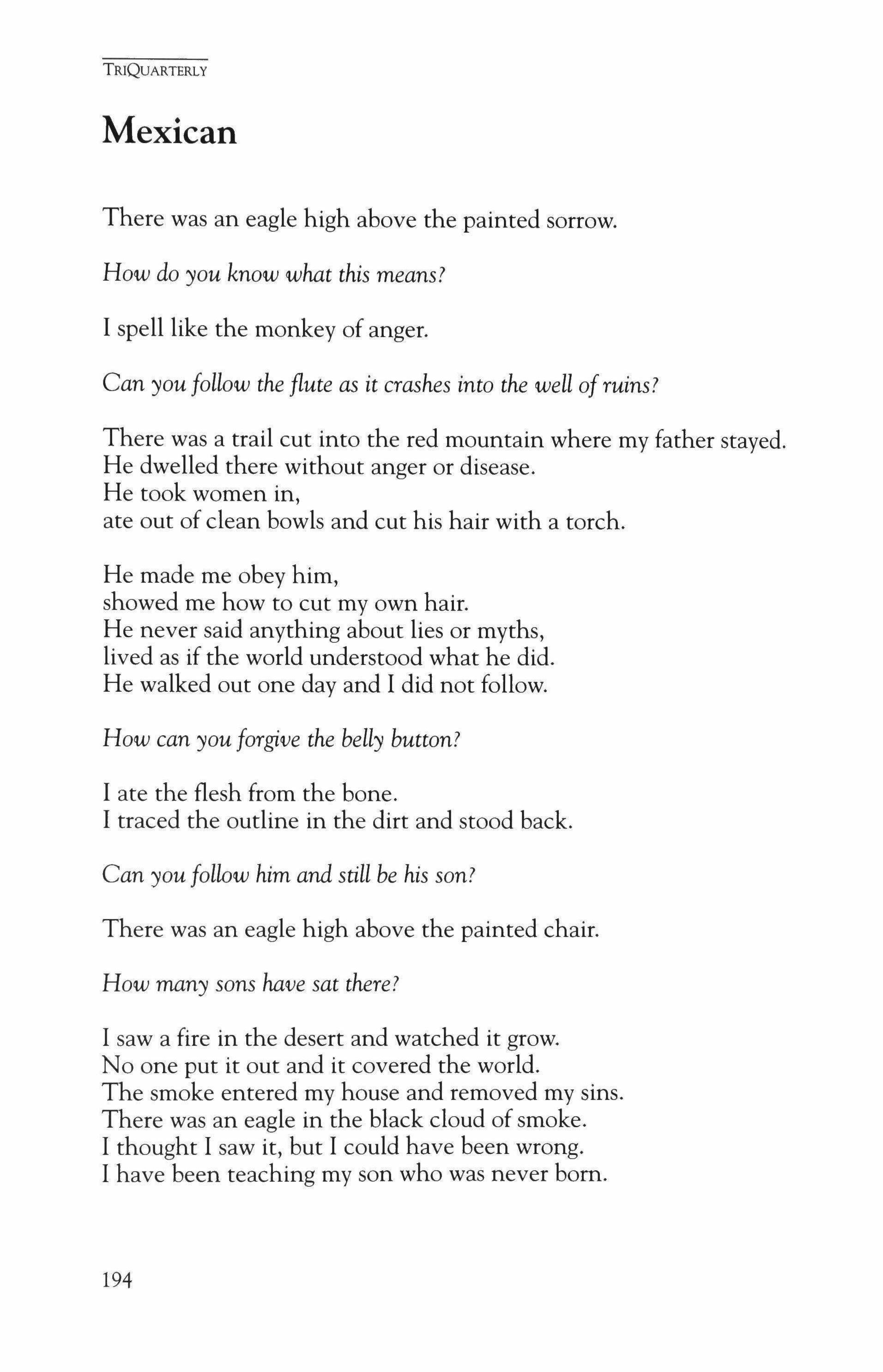
There was an eagle high above the painted sorrow.
How do you know what this means?
I spell like the monkey of anger.
Can you follow the flute as it crashes into the well of ruins?
There was a trail cut into the red mountain where my father stayed. He dwelled there without anger or disease. He took women in, ate out of clean bowls and cut his hair with a torch.
He made me obey him, showed me how to cut my own hair. He never said anything about lies or myths, lived as if the world understood what he did. He walked out one day and I did not follow.
How can you forgive the belly button?
I ate the flesh from the bone. I traced the outline in the dirt and stood back.
Can you follow him and still be his son?
There was an eagle high above the painted chair. How many sons have sat there?
I saw a fire in the desert and watched it grow. No one put it out and it covered the world. The smoke entered my house and removed my sins. There was an eagle in the black cloud of smoke. I thought I saw it, but I could have been wrong. I have been teaching my son who was never born.
TRIQUARTERLY
194
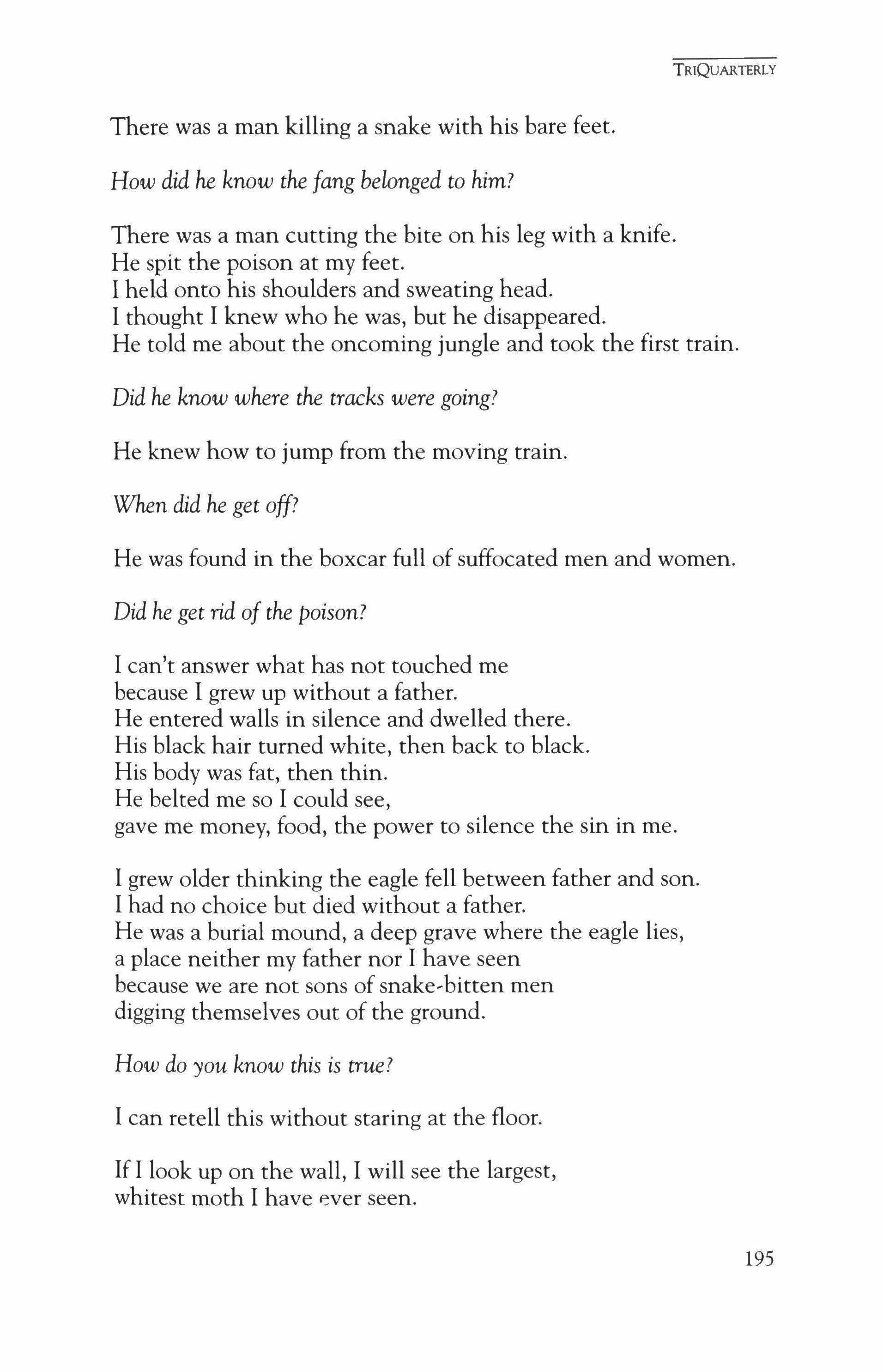
There was a man killing a snake with his bare feet.
How did he know the fang belonged to him?
There was a man cutting the bite on his leg with a knife. He spit the poison at my feet. I held onto his shoulders and sweating head. I thought I knew who he was, but he disappeared. He told me about the oncoming jungle and took the first train.
Did he know where the tracks were going?
He knew how to jump from the moving train.
When did he get off?
He was found in the boxcar full of suffocated men and women.
Did he get rid of the poison?
I can't answer what has not touched me because I grew up without a father. He entered walls in silence and dwelled there. His black hair turned white, then back to black. His body was fat, then thin. He belted me so I could see, gave me money, food, the power to silence the sin in me.
I grew older thinking the eagle fell between father and son. I had no choice but died without a father. He was a burial mound, a deep grave where the eagle lies, a place neither my father nor I have seen because we are not sons of snake-bitten men digging themselves out of the ground.
How do you know this is true?
I can retell this without staring at the floor.
If I look up on the wall, I will see the largest, whitest moth I have ever seen.
TRIQUARTERLY
195
Seven Poems
Carol Frost
Brave
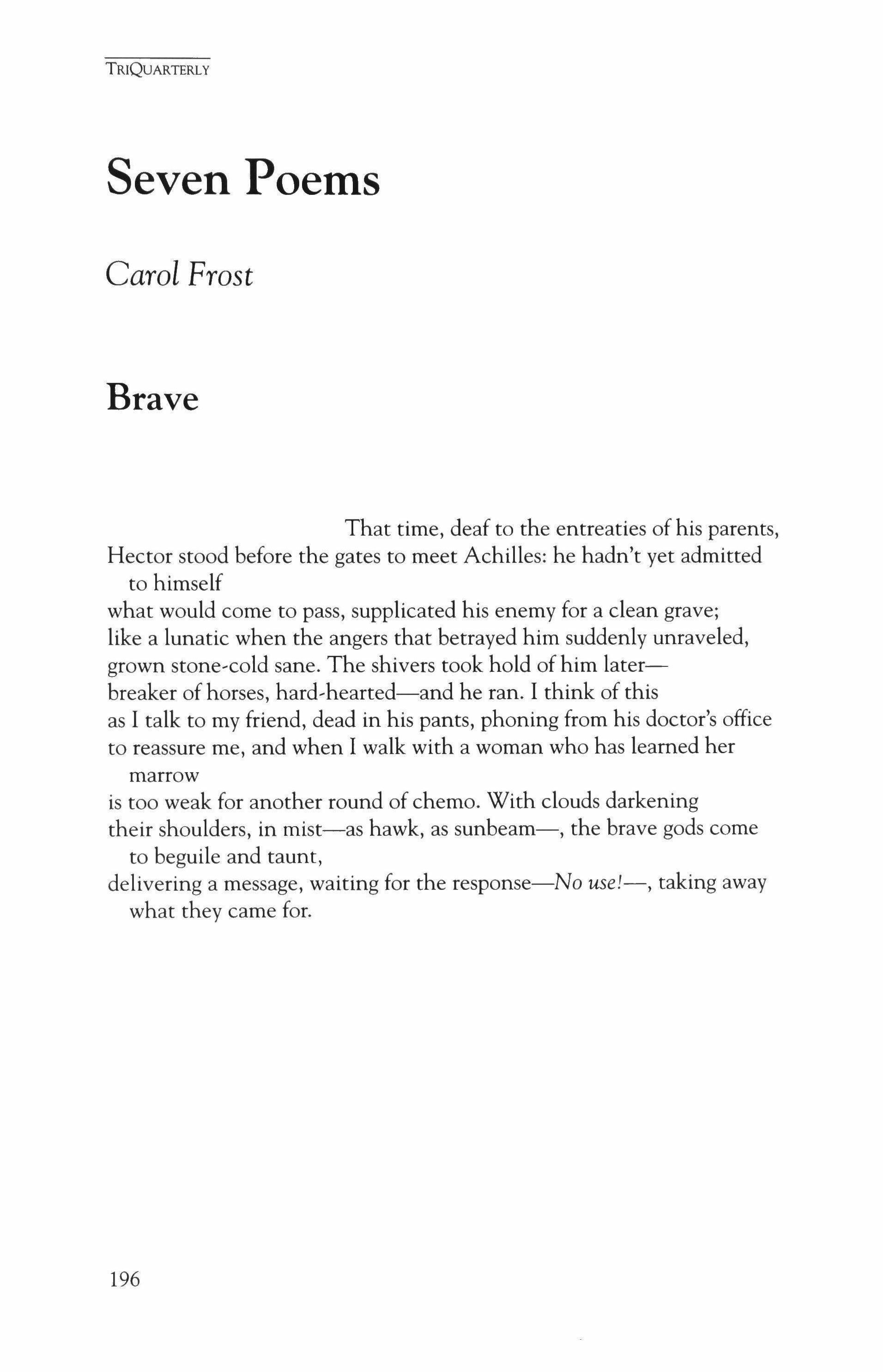
That time, deaf to the entreaties of his parents, Hector stood before the gates to meet Achilles: he hadn't yet admitted to himself what would come to pass, supplicated his enemy for a clean grave; like a lunatic when the angers that betrayed him suddenly unraveled, grown stone-cold sane. The shivers took hold of him laterbreaker ofhorses, hard-hearted=-and he ran. I think of this as I talk to my friend, dead in his pants, phoning from his doctor's office to reassure me, and when I walk with a woman who has learned her marrow is too weak for another round of chemo. With clouds darkening their shoulders, in mist-as hawk, as sunbeam-, the brave gods come to beguile and taunt, delivering a message, waiting for the response-No useJ-, taking away what they came for.
TRIQUARTERLY
196
Obsession
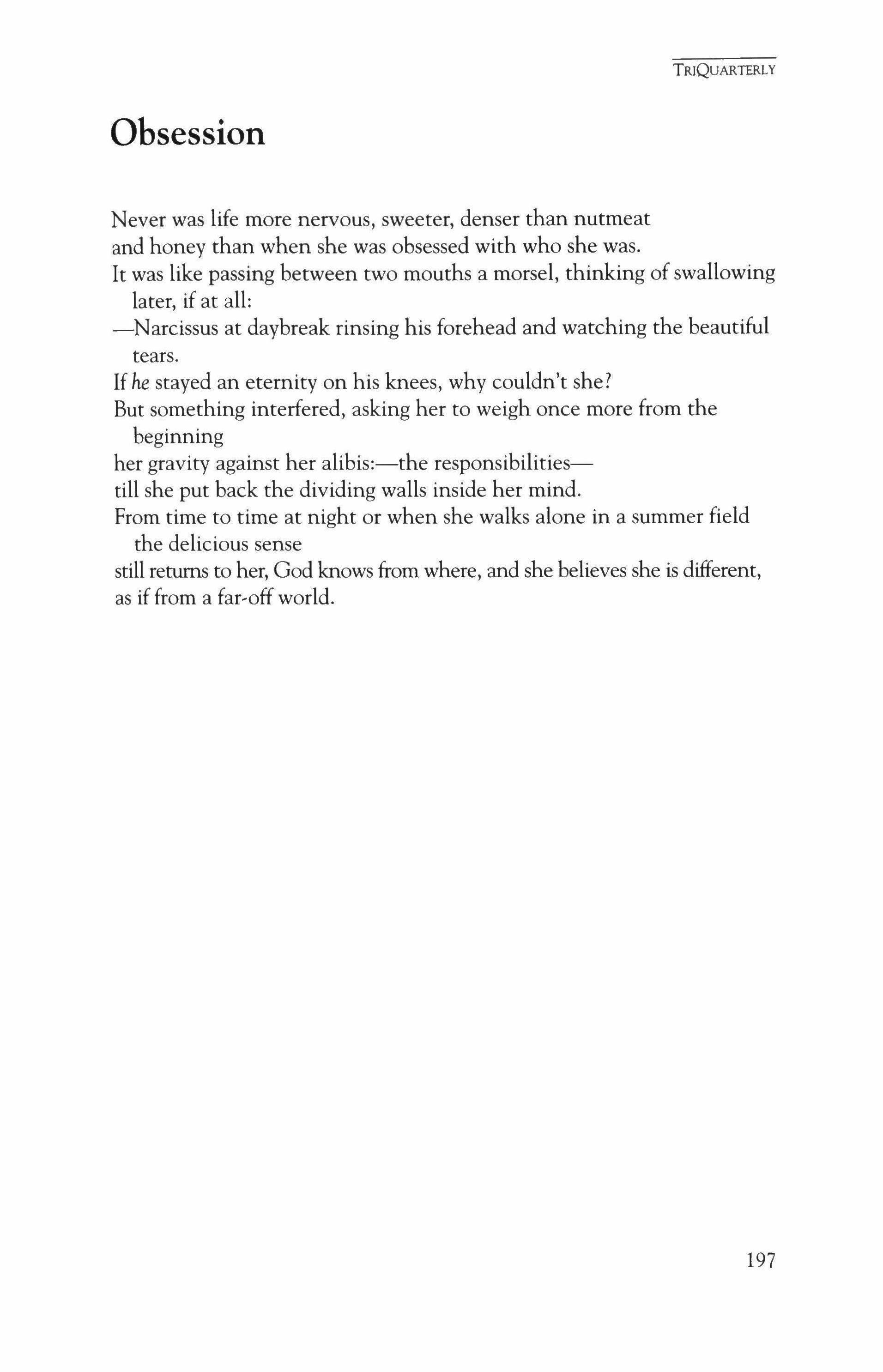
Never was life more nervous, sweeter, denser than nutmeat and honey than when she was obsessed with who she was. It was like passing between two mouths a morsel, thinking of swallowing later, if at all: -Narcissus at daybreak rinsing his forehead and watching the beautiful tears. If he stayed an eternity on his knees, why couldn't she? But something interfered, asking her to weigh once more from the beginning her gravity against her alibis:-the responsibilitiestill she put back the dividing walls inside her mind. From time to time at night or when she walks alone in a summer field the delicious sense still returns to her, God knows from where, and she believes she is different, as if from a far-off world.
TRIQUARTERLY
197
Comfort
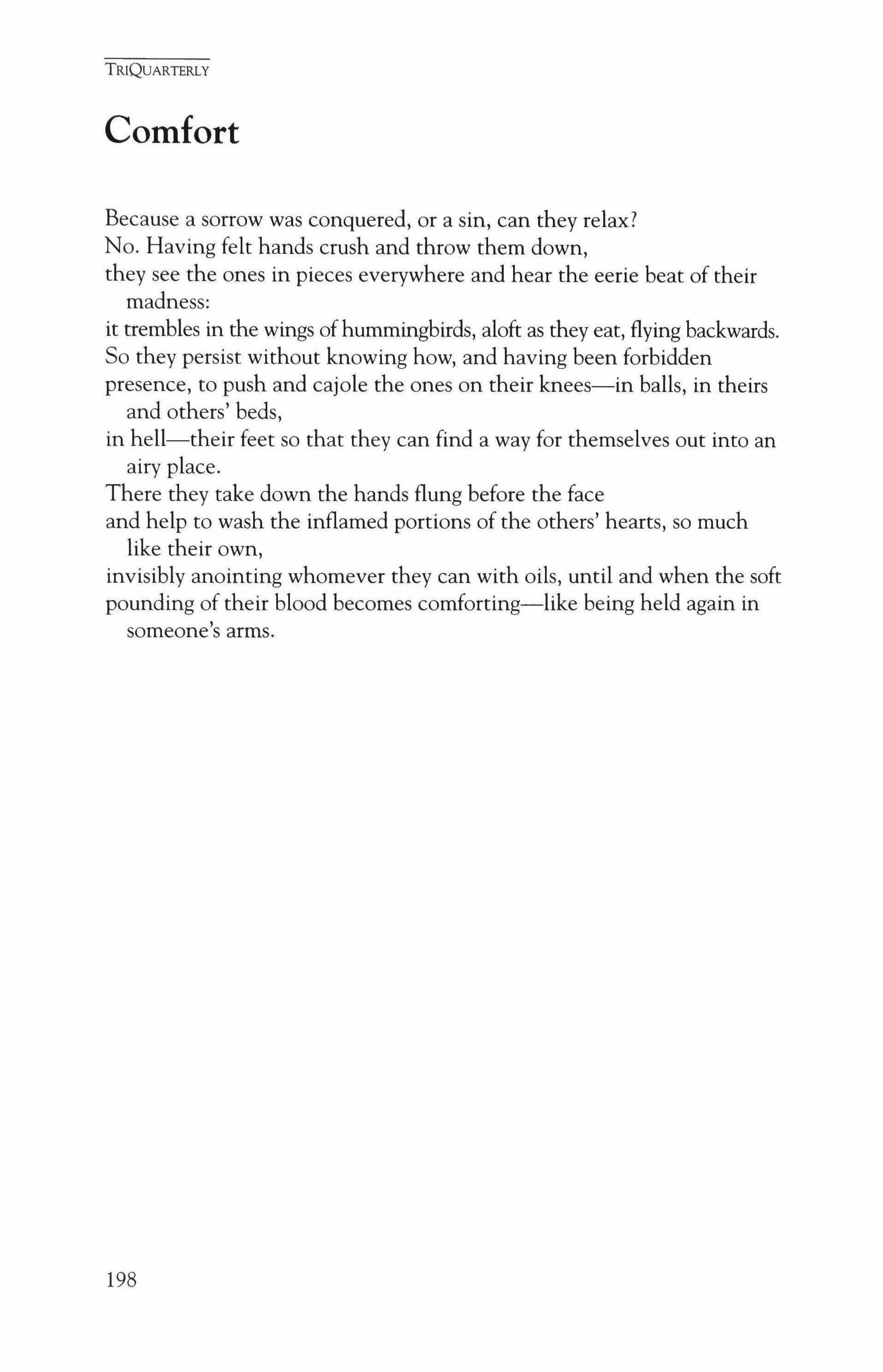
Because a sorrow was conquered, or a sin, can they relax? No. Having felt hands crush and throw them down, they see the ones in pieces everywhere and hear the eerie beat of their madness: it trembles in the wings ofhummingbirds, aloft as they eat, flying backwards. So they persist without knowing how, and having been forbidden presence, to push and cajole the ones on their knees-in balls, in theirs and others' beds, in hell-their feet so that they can find a way for themselves out into an airy place. There they take down the hands flung before the face and help to wash the inflamed portions of the others' hearts, so much like their own, invisibly anointing whomever they can with oils, until and when the soft pounding of their blood becomes comforting-like being held again in someone's arms.
TRIQUARTERLY
198
Patience
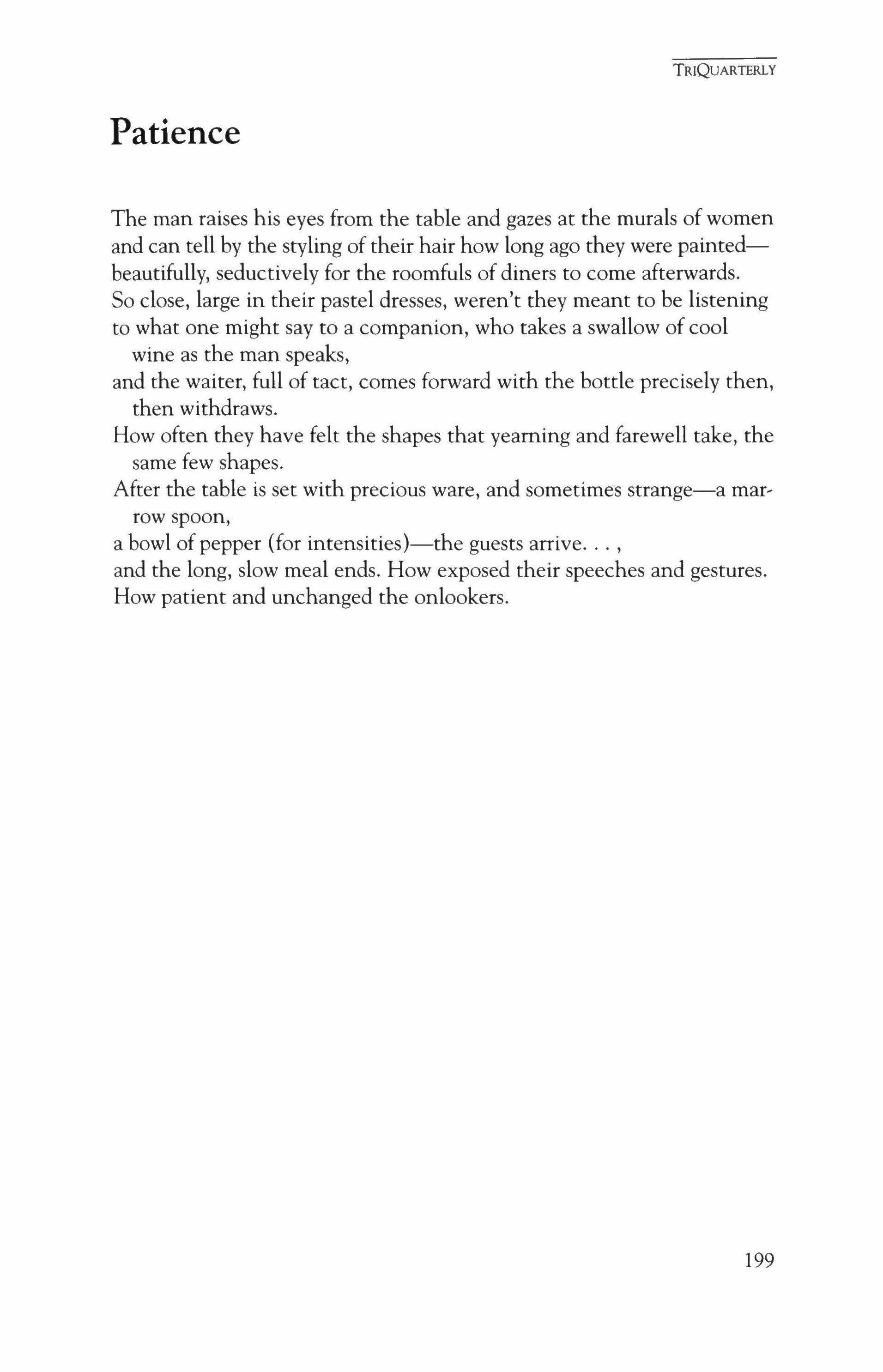
The man raises his eyes from the table and gazes at the murals of women and can tell by the styling of their hair how long ago they were paintedbeautifully, seductively for the roomfuls of diners to come afterwards. So close, large in their pastel dresses, weren't they meant to be listening to what one might say to a companion, who takes a swallow of cool wine as the man speaks, and the waiter, full of tact, comes forward with the bottle precisely then, then withdraws. How often they have felt the shapes that yearning and farewell take, the same few shapes. After the table is set with precious ware, and sometimes strange-a marrow spoon, a bowl of pepper (for intensities)-the guests arrive and the long, slow meal ends. How exposed their speeches and gestures. How patient and unchanged the onlookers.
TRIQUARTERLY
199
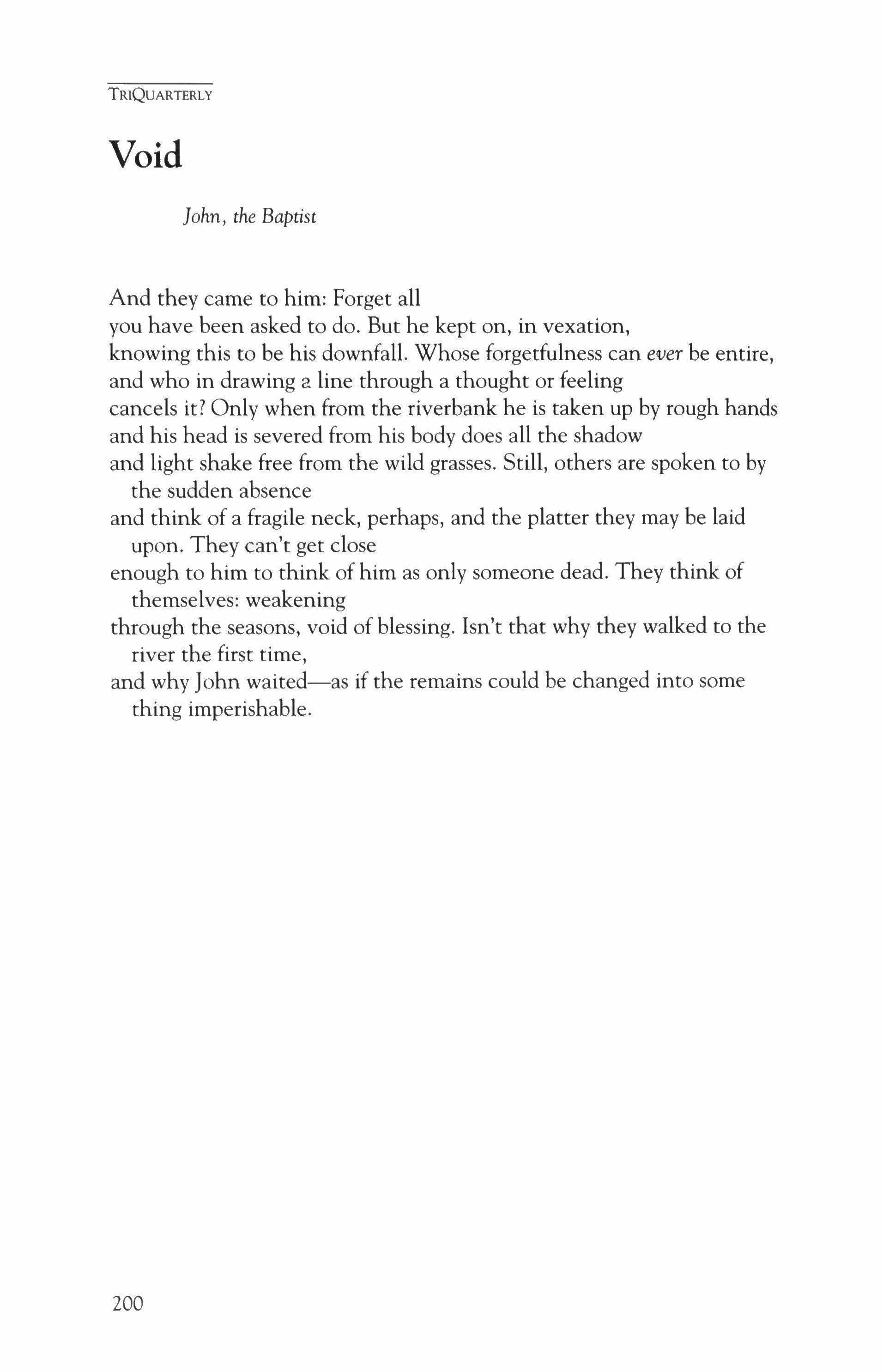
Void
John, the Baptist
And they carne to him: Forget all you have been asked to do. But he kept on, in vexation, knowing this to be his downfall. Whose forgetfulness can ever be entire, and who in drawing a line through a thought or feeling cancels it? Only when from the riverbank he is taken up by rough hands and his head is severed from his body does all the shadow and light shake free from the wild grasses. Still, others are spoken to by the sudden absence and think of a fragile neck, perhaps, and the platter they may be laid upon. They can't get close enough to him to think of him as only someone dead. They think of themselves: weakening through the seasons, void of blessing. Isn't that why they walked to the river the first time, and why John waited-as if the remains could be changed into some thing imperishable.
TRIQUARTERLY
200
Conscience
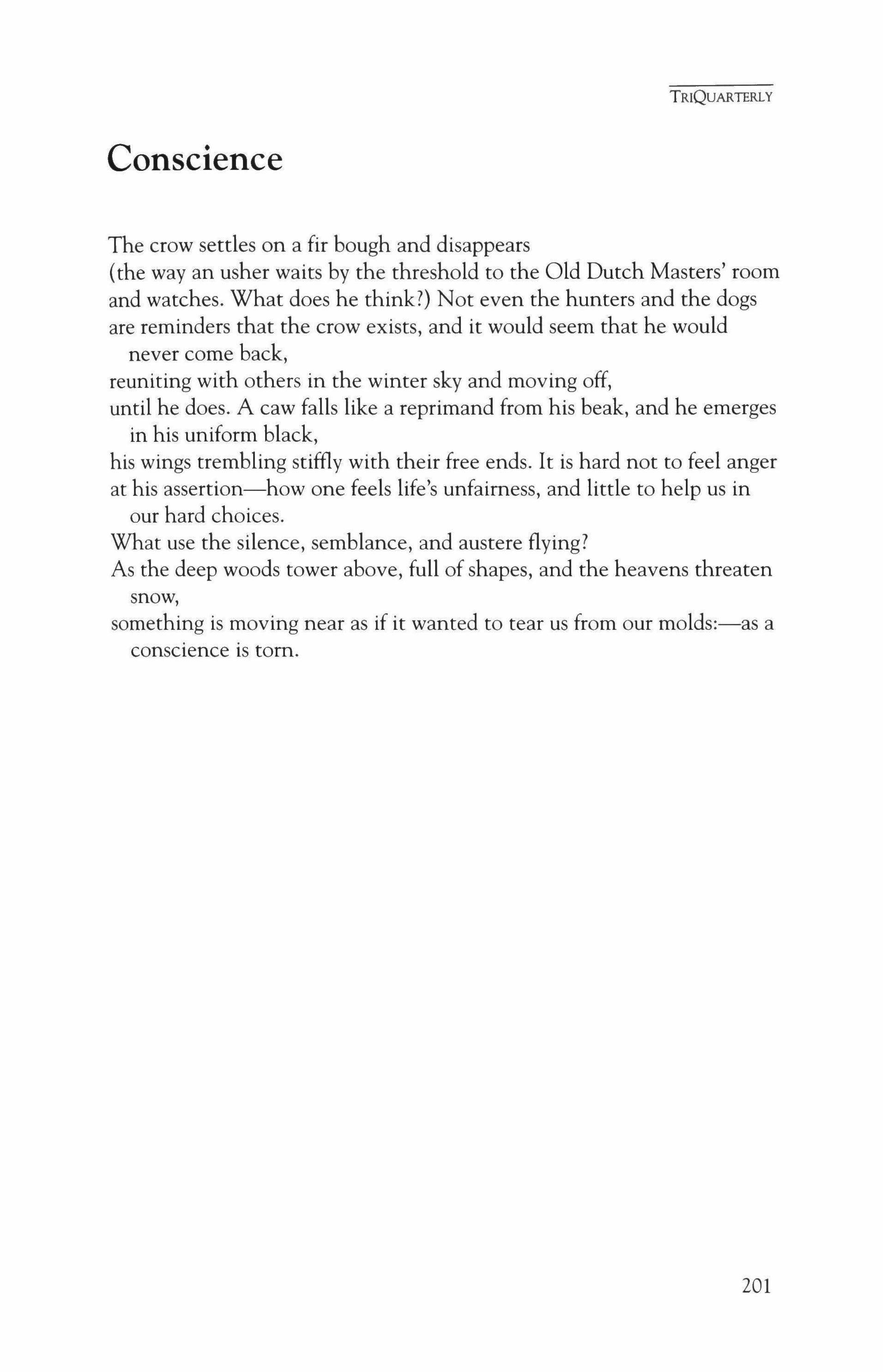
The crow settles on a fir bough and disappears (the wayan usher waits by the threshold to the Old Dutch Masters' room and watches. What does he think?) Not even the hunters and the dogs are reminders that the crow exists, and it would seem that he would never come back, reuniting with others in the winter sky and moving off, until he does. A caw falls like a reprimand from his beak, and he emerges in his uniform black, his wings trembling stiffly with their free ends. It is hard not to feel anger at his assertion-how one feels life's unfairness, and little to help us in our hard choices.
What use the silence, semblance, and austere flying? As the deep woods tower above, full of shapes, and the heavens threaten snow, something is moving near as if it wanted to tear us from our molds:-as a conscience is tom.
TRIQUARTERLY
201
Time

From his photographed face and squared shoulders, as though he'd stepped into a lit window, my Uncle Edi looks like he'd made a place for himself. It wasn't much good. He fell and was cast into ether beyond known borders. He was not brought sometime later in uniform or stripped on a slab, home, though his father and mother waited with others at the train station and in their apartment. Some said it was of no consequence, some days, the waiting lasting, folding over and over the dress clothes, filling the suitcase; and some went away into themselves because they were weakening from it: Why do we live a life, where do our kin go? Only (it is whispered) the unvisitable stars, some here, and some that were here, though still shining, powdery, cold, know answers and reasons and won't say.
TRIQUARTERLY
202
Two Poems
Nancy Eimers
Aphasiac
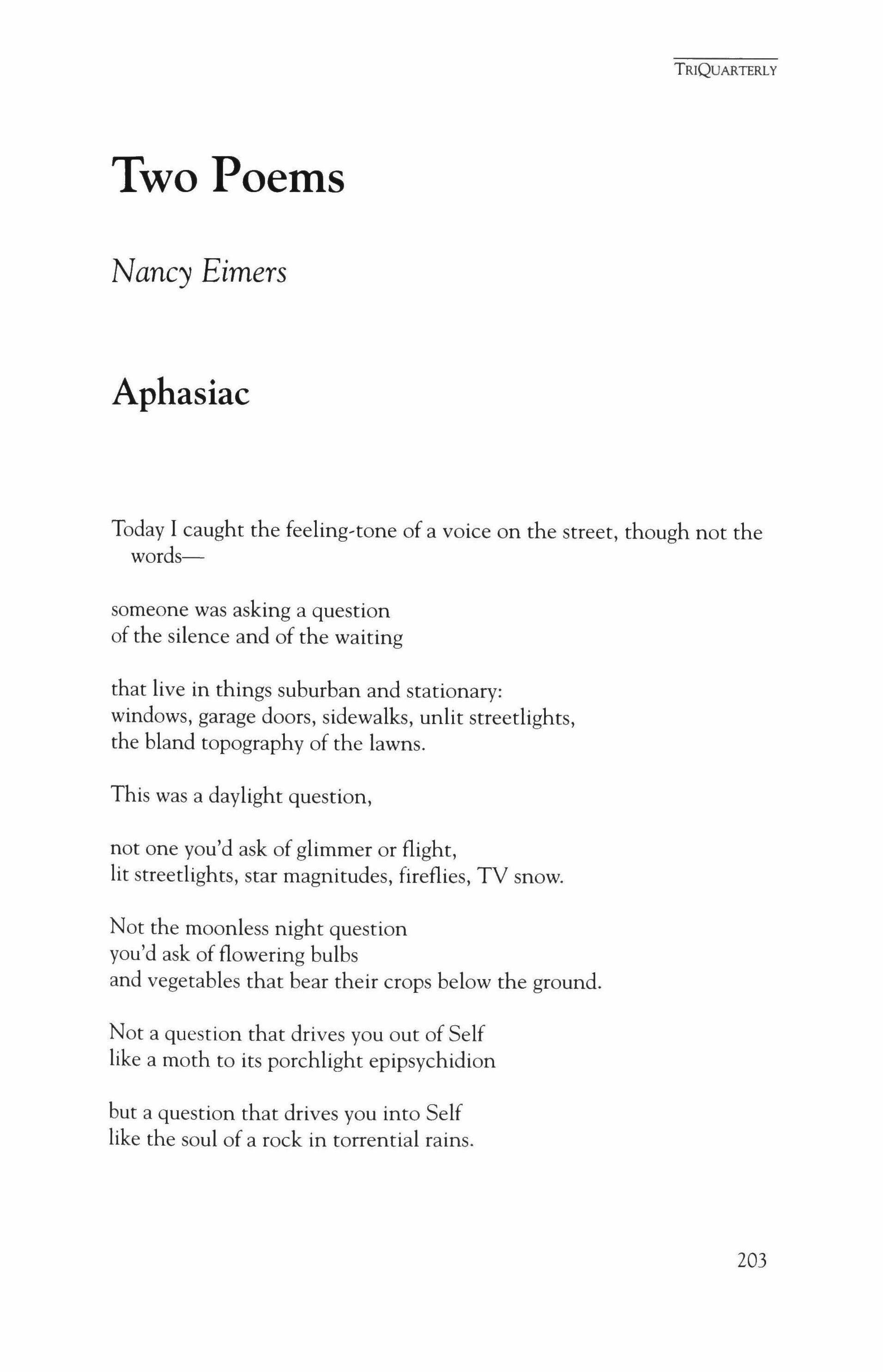
Today I caught the feeling-tone of a voice on the street, though not the words-
someone was asking a question of the silence and of the waiting that live in things suburban and stationary: windows, garage doors, sidewalks, unlit streetlights, the bland topography of the lawns.
This was a daylight question, not one you'd ask of glimmer or flight, lit streetlights, star magnitudes, fireflies, TV snow.
Not the moonless night question you'd ask of flowering bulbs and vegetables that bear their crops below the ground.
Not a question that drives you out of Self like a moth to its porchlighr epipsychidion
but a question that drives you into Self like the soul of a rock in torrential rains.
TRIQUARTERLY
203

Not the question a roadside diner asks of its empty parking lot.
Nothing a shadow could ask of a highway underpass.
This was a question mouthed by a man
not by the drone of an edger, not by the blown trees gliding into place. Not by the ants that follow their winding scent-paths through the blades of grass.
Asked by the visible, asked by the working lips and tongue.
What sounds and moves was asking its question of what does not,
something to do with the peeling paint on the walls and the crooked pitch of the roofs, the dampness creeping into the cinder-block basements
and soaking down the chimney flashings, the festering of the gutters, the glandular swell of the wood, the rust that lines the pipes that, linked together, would reach to outer space.
I don't remember an answeringjust the vertigo of ascent, just the looking over a cliff that is any question.
The street didn't know there was anything wrong with its shingles, flashings, sockets, anthills, deferrals, lulls.
I heard the sound slide out of its words. Not a full-moon question asked of the windows that gorge on the magnitudes of the stars
but a lifting up of a human voice that could not lie and could not promise to lift us out of disrepair
nor lift us in our waiting out of what we are waiting for.
TRIQUARTERLY
204

The Match Girl
for Lynda Hull
Did you know a poor girl in a fairy tale has to fall asleep in the bitterest cold on earth just to wake up in the garden of heaven? I had to die to warm my hands that were blue and cold with the journey,
had to cup their frozen wastes to the bluest flowers, lupine, margarite and the blue-skies petunia so the glacial melt at my fingertips could begin. By then the eons of smoke from my matches
had cauterized my nostrils and lungs so I couldn't smell even the loudest of heaven's flowers-the salvia making such ruckus and stink with its red that a million hummingbirds trembled into its ruffled sleeves. But my ears being for no reason heavenly now, I heard the million-and-first one splashing thunderously in the water pooled on a lily pad.
And the red-hot poker burned all day in case the night should return, though it never will, though all the time I think of asking it. This little light of mine
guttered out in my fingers. I probably blew it out. Then was it a shooting star I rode from earth to the lowest rung of the dark and looked down at the skyline-
I could FEEL the buildings shaken down to their girders, HEAR the loosening nuts and bolts as now I taste the nectar pumped along these dumb beseeching tongues. The earth below seemed blue inside
TRIQUARTERLY
205
TRIQUARTERLY

like an empty milk-of-magnesia bottleused up, rinsed and dried, set out on a windowsill. I want to ask if we remember long but I KNOW. The page will tum.
This little punk with smudgy eyes and hands who even as she was doing it vaguely remembered peeling matches out of the book of the dark, striking them one by one against a wall in a burning graffiti that ate itself up or was eaten by breath will forget. The skyline. The Gold Star Chili sign. The jitter and blink from the Shooting Star.
206
God's at the Top of the Stairs
Steven Cramer
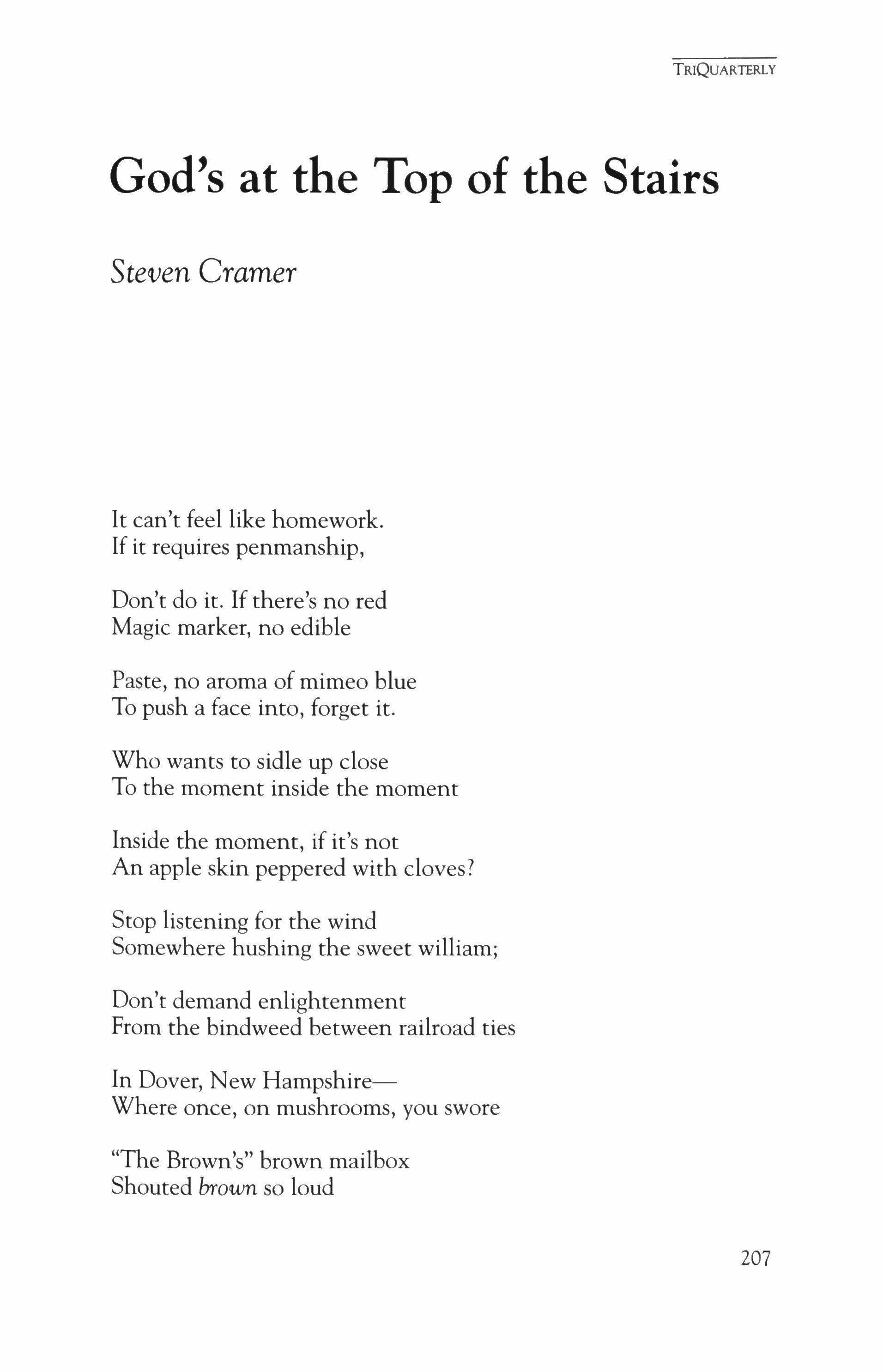
It can't feel like homework. If it requires penmanship,
Don't do it. If there's no red Magic marker, no edible
Paste, no aroma of mimeo blue
To push a face into, forget it.
Who wants to sidle up close To the moment inside the moment
Inside the moment, if it's not An apple skin peppered with cloves?
Stop listening for the wind Somewhere hushing the sweet william;
Don't demand enlightenment From the bindweed between railroad ties
In Dover, New HampshireWhere once, on mushrooms, you swore
"The Brown's" brown mailbox
Shouted brown so loud
TRIQUARTERLY
207
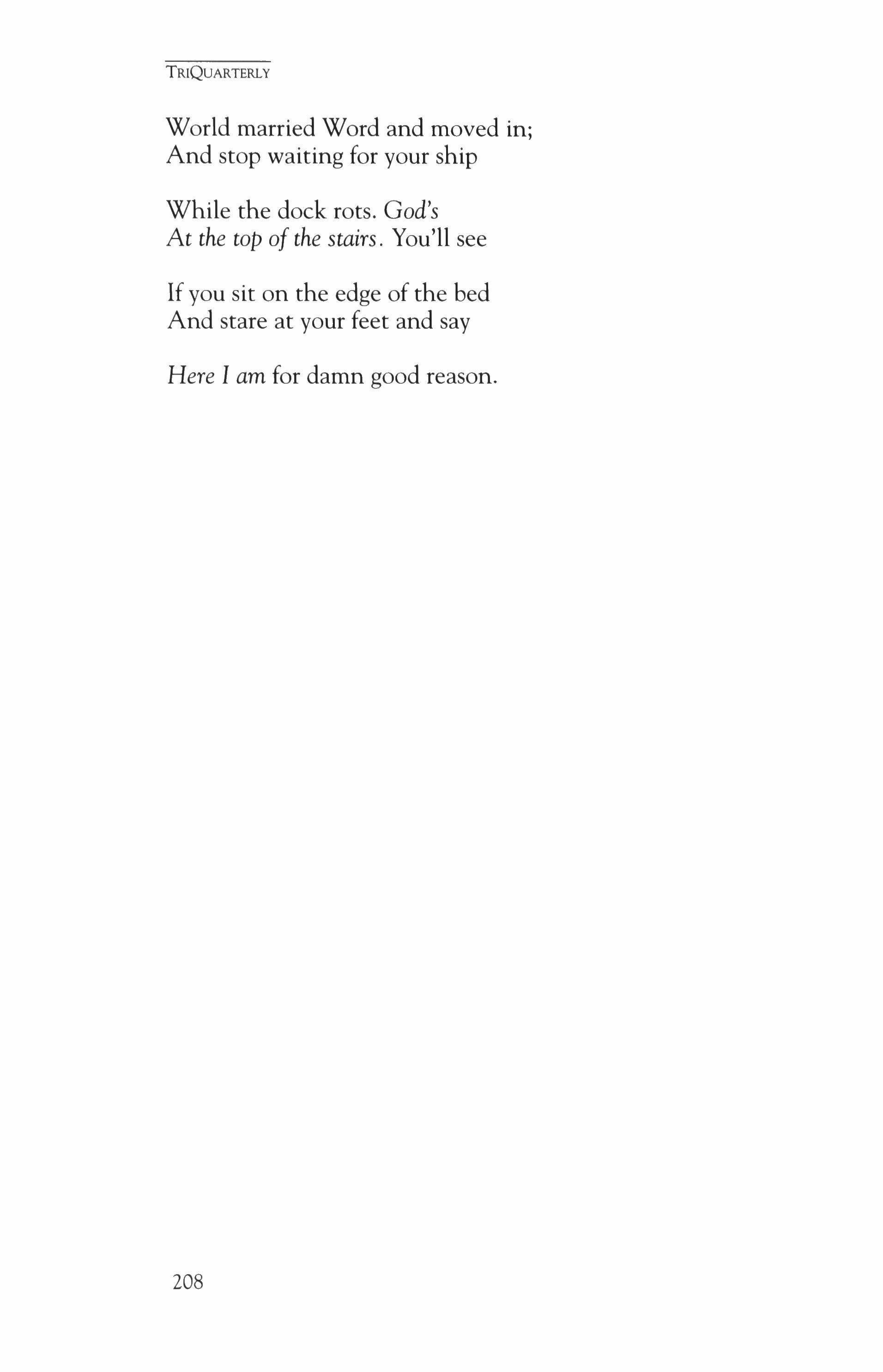
World married Word and moved in; And stop waiting for your ship
While the dock rots. God's At the top of the stairs. You'll see
If you sit on the edge of the bed And stare at your feet and say
Here I am for damn good reason.
TRIQUARTERLY
208
Two Poems
]ared Carter
Covered Bridge
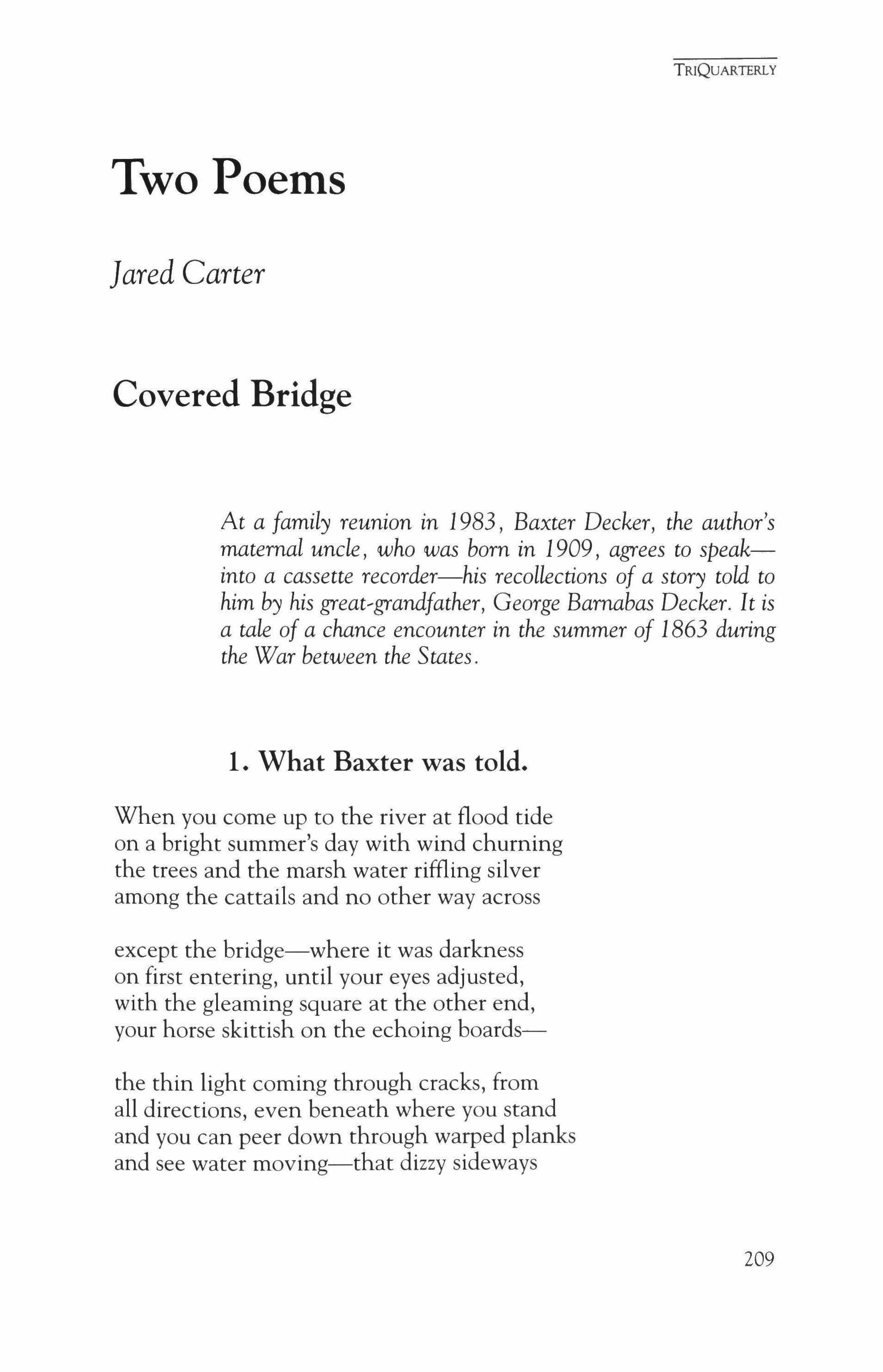
At a family reunion in 1983, Baxter Decker, the author's maternal uncle, who was born in 1909, agrees to speakinto a cassette recorder-his recollections of a story told to him by his great�grandfather, George Barnabas Decker. It is a tale of a chance encounter in the summer of 1863 during the War between the States.
1. What Baxter was told.
When you come up to the river at flood tide on a bright summer's day with wind churning the trees and the marsh water riffling silver among the cattails and no other way across
except the bridge-where it was darkness on first entering, until your eyes adjusted, with the gleaming square at the other end, your horse skittish on the echoing boards-
the thin light coming through cracks, from all directions, even beneath where you stand and you can peer down through warped planks and see water moving-that dizzy sideways
TRIQUARTERLY
209
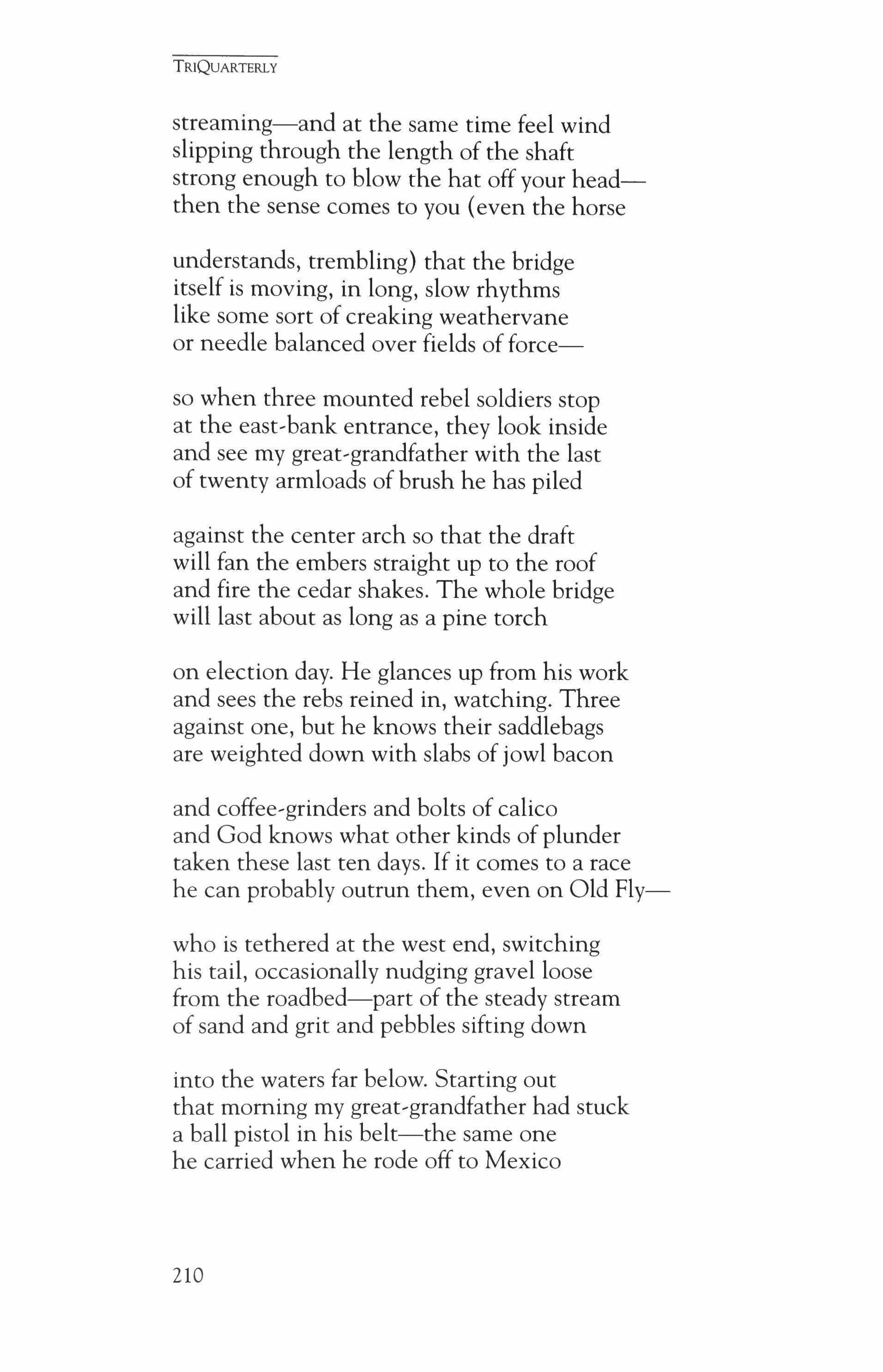
streaming-and at the same time feel wind slipping through the length of the shaft strong enough to blow the hat off your headthen the sense comes to you (even the horse understands, trembling) that the bridge itself is moving, in long, slow rhythms like some sort of creaking weathervane or needle balanced over fields of forceso when three mounted rebel soldiers stop at the east-bank entrance, they look inside and see my great-grandfather with the last of twenty armloads of brush he has piled against the center arch so that the draft will fan the embers straight up to the roof and fire the cedar shakes. The whole bridge will last about as long as a pine torch
on election day. He glances up from his work and sees the rebs reined in, watching. Three against one, but he knows their saddlebags are weighted down with slabs of jowl bacon and coffee-grinders and bolts of calico and God knows what other kinds of plunder taken these last ten days. If it comes to a race he can probably outrun them, even on Old Flywho is tethered at the west end, switching his tail, occasionally nudging gravel loose from the roadbed-part of the steady stream of sand and grit and pebbles sifting down
into the waters far below. Starting out that morning my great-grandfather had stuck a ball pistol in his belt-the same one he carried when he rode off to Mexico 210
TRIQUARTERLY
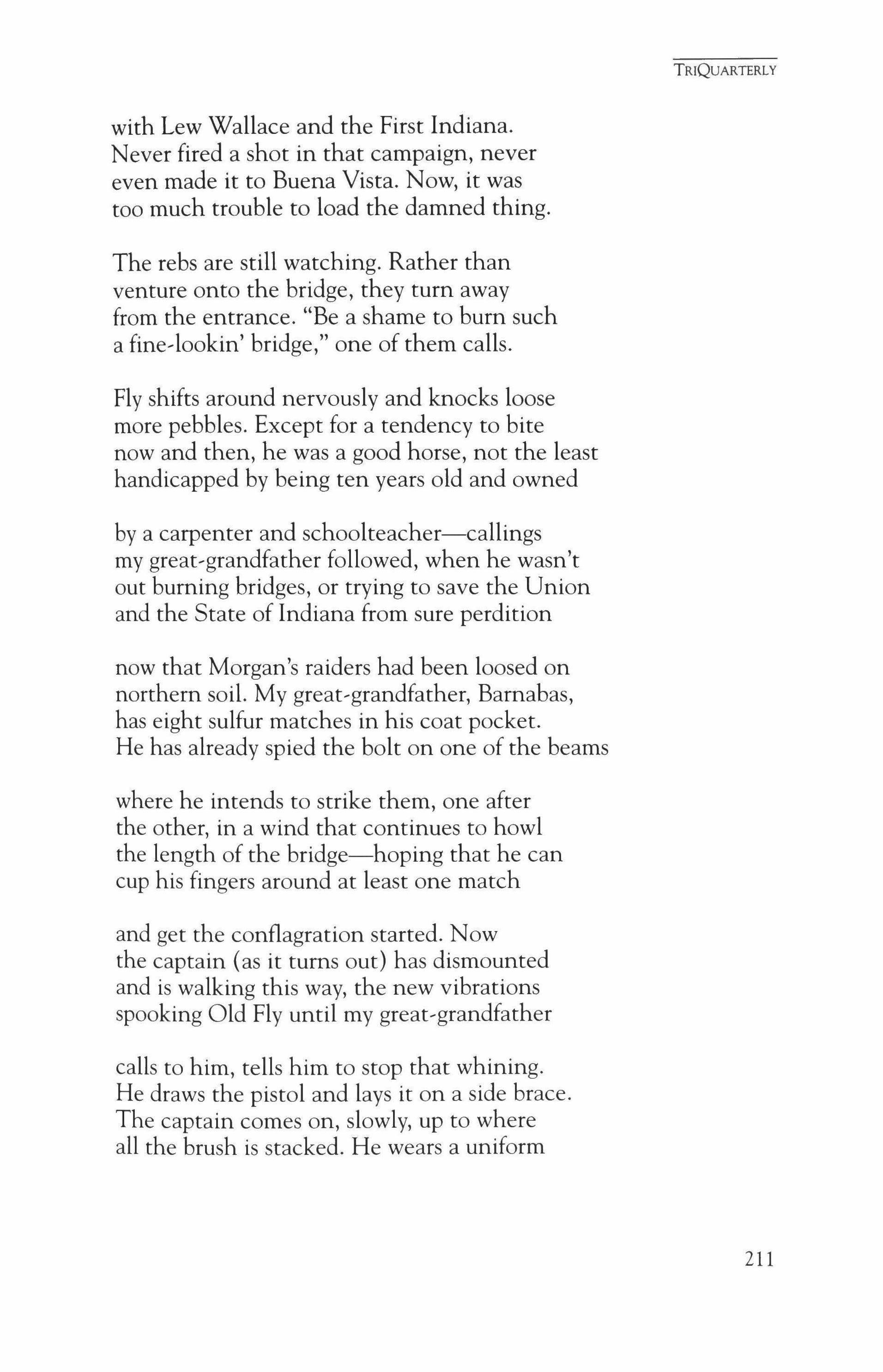
with Lew Wallace and the First Indiana. Never fired a shot in that campaign, never even made it to Buena Vista. Now, it was too much trouble to load the damned thing.
The rebs are still watching. Rather than venture onto the bridge, they turn away from the entrance. "Be a shame to burn such a fine-lcokin' bridge," one of them calls.
Fly shifts around nervously and knocks loose more pebbles. Except for a tendency to bite now and then, he was a good horse, not the least handicapped by being ten years old and owned by a carpenter and schoolteacher-callings my great,grandfather followed, when he wasn't out burning bridges, or trying to save the Union and the State of Indiana from sure perdition now that Morgan's raiders had been loosed on northern soil. My great,grandfather, Barnabas, has eight sulfur matches in his coat pocket. He has already spied the bolt on one of the beams
where he intends to strike them, one after the other, in a wind that continues to howl the length of the bridge-hoping that he can cup his fingers around at least one match and get the conflagration started. Now the captain (as it turns out) has dismounted and is walking this way, the new vibrations spooking Old Fly until my great,grandfather calls to him, tells him to stop that whining. He draws the pistol and lays it on a side brace. The captain comes on, slowly, up to where all the brush is stacked. He wears a uniform
TRIQUARTERLY 211
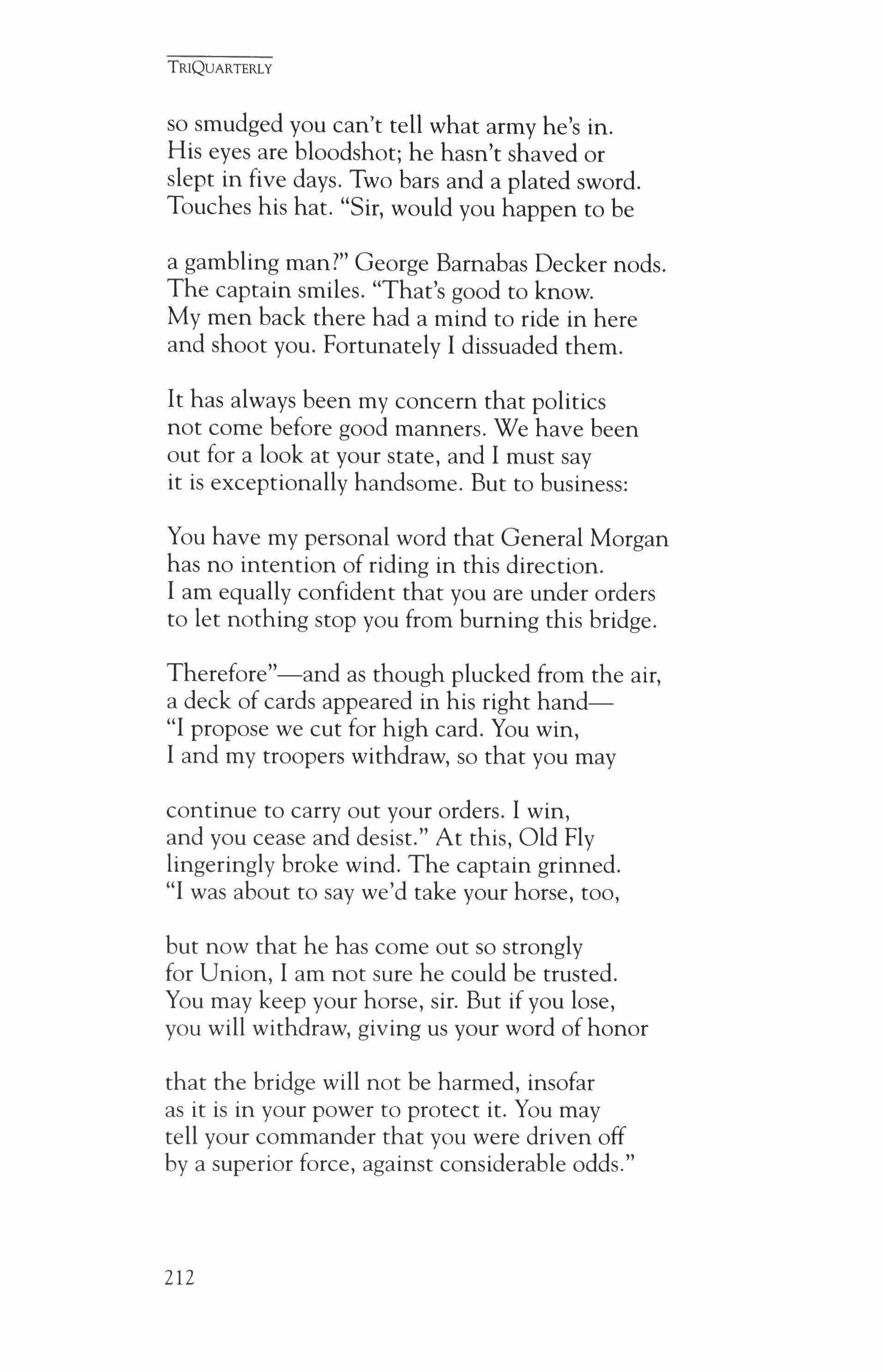
so smudged you can't tell what army he's in. His eyes are bloodshot; he hasn't shaved or slept in five days. Two bars and a plated sword. Touches his hat. "Sir, would you happen to be a gambling man?" George Barnabas Decker nods. The captain smiles. "That's good to know. My men back there had a mind to ride in here and shoot you. Fortunately I dissuaded them.
It has always been my concern that politics not come before good manners. We have been out for a look at your state, and I must say it is exceptionally handsome. But to business:
You have my personal word that General Morgan has no intention of riding in this direction. I am equally confident that you are under orders to let nothing stop you from burning this bridge.
Therefore"-and as though plucked from the air, a deck of cards appeared in his right hand"I propose we cut for high card. You win, I and my troopers withdraw, so that you may
continue to carry out your orders. I win, and you cease and desist." At this, Old Fly lingeringly broke wind. The captain grinned. "I was about to say we'd take your horse, too, but now that he has come out so strongly for Union, I am not sure he could be trusted. You may keep your horse, sir. But if you lose, you will withdraw, giving us your word of honor that the bridge will not be harmed, insofar as it is in your power to protect it. You may tell your commander that you were driven off by a superior force, against considerable odds."
TRIQUARTERLY
212

2. What Barnabas said.
"Now I helped build that bridge, as a young man," Barnabas told me, many years later, "working for Old Man Hogsett, who spit tobacco juice on the bolts, for grease, while we tightened them up. Spent two long, blistering months on a crew of six, fitting those big timbers, wading up to my ass in all that mud, getting kicked and bit by those damned bluenose mules and all the time that old man cussing me out, slobbering brown spit everywhere, and swearing I'd never be a carpenter's apprentice in hell. I tell you I was damned unhappy to see that reb bring out that deck of cards. That morning, when the mayor told me to get down there, I was looking forward to burning that bridge. To make matters worse, as a young roustabout
I had played faro and low ball and blackjack up and down both sides of the Ohio River as far south as Cairo, and I knew a tinplated smooth-talking Kentucky card-shark the minute
he opened his mouth. Had a better chance of cutting that bridge loose and floating it downriver and giving it to Jeff Davis himself than I did drawing high card against that back-room bushwhacker from Bowling Green. 'Surely you'll allow me to cut the cards?' I said in my best riverboat gambler's voice. The captain leaned over and laid the deck on one of those twelve-inch hand-dressed beams, alongside that damned empty pistol. Right away the wind whipped the first two or three cards off the deck and blew them on down the bridge
TRIQUARTERLY 213
TRIQUARTERLY

but the captain never turned a hair. I saw that tucked in his sash he had a horse pistol with a bore as big as one of those bridge bolts; it occurred to me he did not go about with
this piece unloaded. More cards kept blowing away and he just stood there, waiting for me to move. I reached out and stopped the cards from blowing, then cut them with one hand.
He nodded and smiled, and I took off the six of diamonds. He started to take a card, but at that moment the other two rebs rode up, their stolen appaloosas moving like smoke.
They'd been out reconnoitering the east bank; now they dismounted and came toward us. Suddenly a gust of wind lifted the deck into the air. 'I'll get them cards for you, Sir!' the boy
called out, but the captain raised a hand. 'That was our last deck,' he said, watching the cards flutter away. He turned to me: 'How many matches have you got!' 'Only eight,'
I said. 'That's all I could find this morning.' 'Well then,' he said, 'it's settled. It's the bridge against Fate, in a howling gale. Each of us has two tries to light the pile.'
They commenced to bet among themselves, rummaging through their pockets, finding an assortment of jackknives and cameo rings and ivory combs. The boy even had a horned toad in a cigar box but they made him throw it away, nudge it through a broken place in the bridge floor. 'It will be perfectly all right down there,' the captain assured him. Finally they were ready.
214

The captain and the boy bet against the bridge, the older man for it. The captain asked me for the matches. He gave back two, passed four out to the men, kept the last two himself.
The boy gave a rebel yell and got down and scrunched up a handful of dead leaves and after a bad start managed to get it going with the second match, even making some smoke before the wind blew it out. The older man, who looked like he wanted do it the easy way and shoot me on the spot-he simply struck both matches and tossed them toward the pile.
The captain frowned. Now it was my tum. I opened my coat against the wind and snapped the match with my thumbnail, and got it going good, then knelt, still holding it, and reached it over to the pile; in the next instant the wind snuffed it out. One down. Stepping forward, the captain produced a bill from his waistcoat, and held it up: bank note recently stolen and already worthless, from the looks of it. He wadded it up, struck a match and got it going, then tossed it onto the brush where it began to uncurl, burning all the while.
Old Fly, made nervous by the strange horses tied at the east end of the bridge, chose this particular moment to rare and whinny, and the rebel mounts began to stamp and neigh.
One of the ponies skittered onto the bridge; twigs from the pile fell through the cracks, scattering onto the river below. The captain and I each had one match left. The wind
TRIQUARTERLY 215
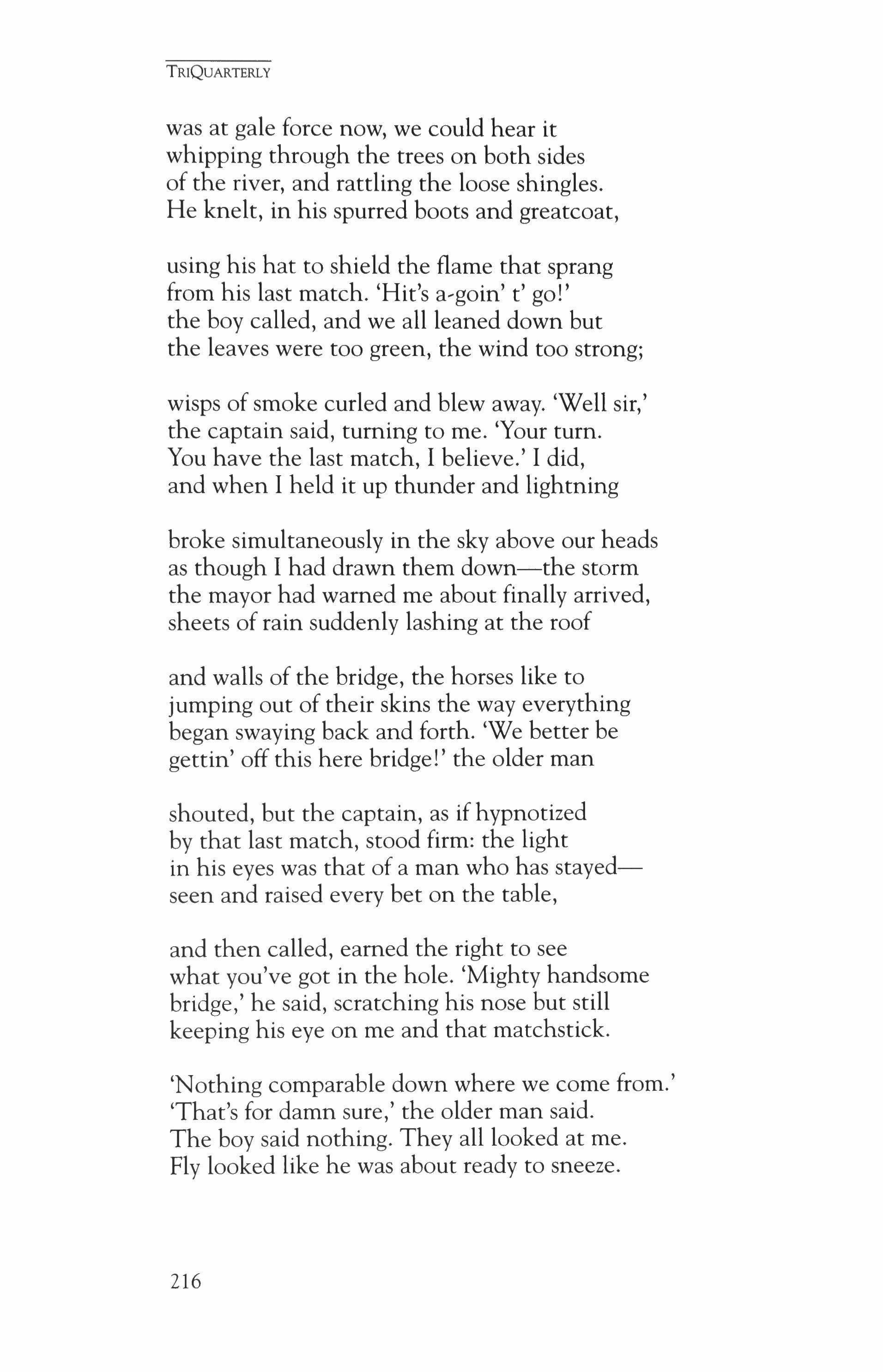
was at gale force now, we could hear it whipping through the trees on both sides of the river, and rattling the loose shingles. He knelt, in his spurred boots and greatcoat,
using his hat to shield the flame that sprang from his last match. 'Hit's a-goin' t' go!' the boy called, and we all leaned down but the leaves were too green, the wind too strong;
wisps of smoke curled and blew away. 'Well sir,' the captain said, turning to me. 'Your tum. You have the last match, I believe.' I did, and when I held it up thunder and lightning
broke simultaneously in the sky above our heads as though I had drawn them down-the storm the mayor had warned me about finally arrived, sheets of rain suddenly lashing at the roof
and walls of the bridge, the horses like to jumping out of their skins the way everything began swaying back and forth. 'We better be gettin' off this here bridge!' the older man
shouted, but the captain, as if hypnotized by that last match, stood firm: the light in his eyes was that of a man who has stayedseen and raised every bet on the table, and then called, earned the right to see what you've got in the hole. 'Mighty handsome bridge,' he said, scratching his nose but still keeping his eye on me and that matchstick.
'Nothing comparable down where we come from.' 'That's for damn sure,' the older man said. The boy said nothing. They all looked at me. Fly looked like he was about ready to sneeze.
TRIQUARTERLY
216
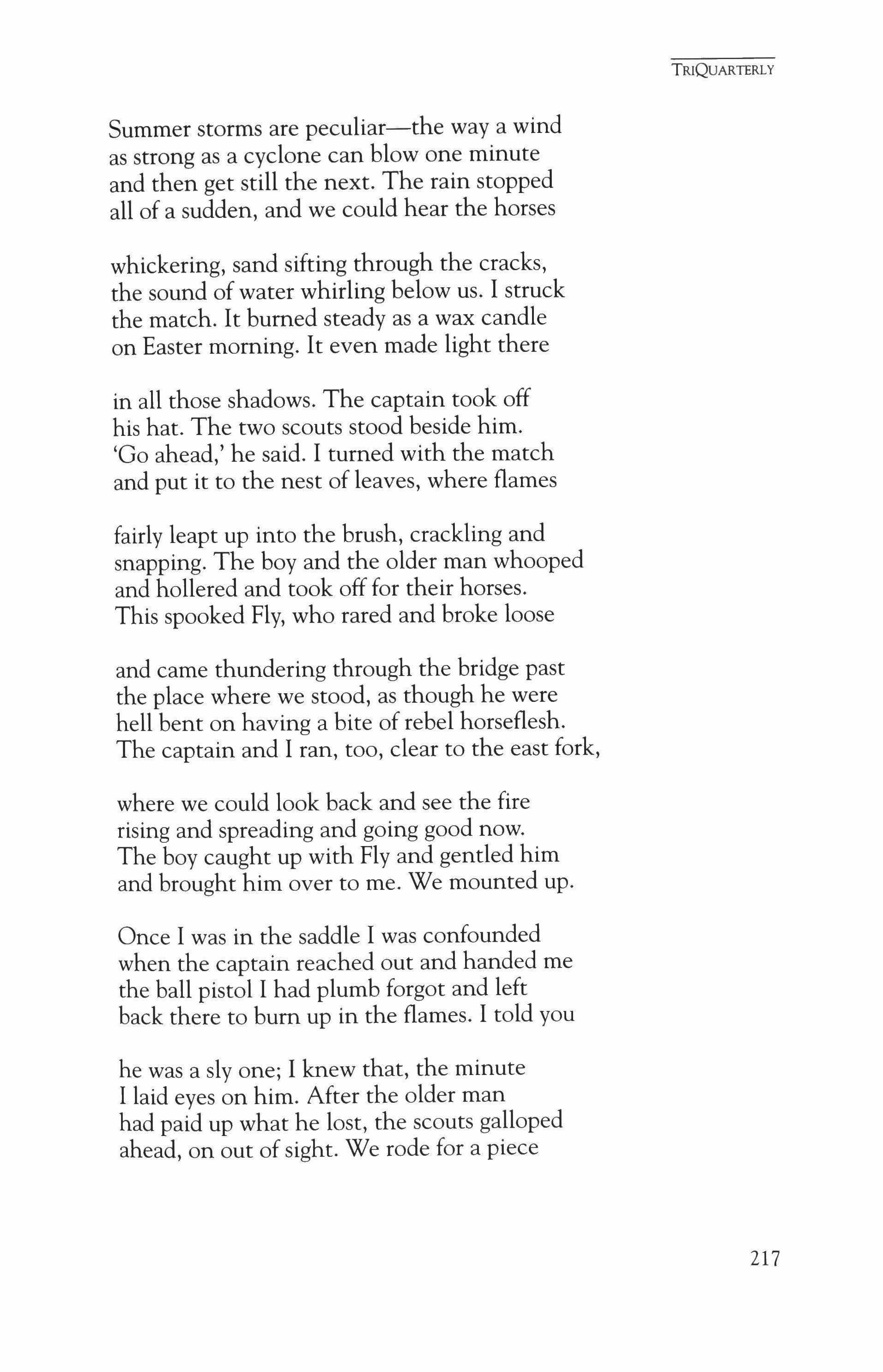
Summer storms are peculiar-the way a wind as strong as a cyclone can blow one minute and then get still the next. The rain stopped all of a sudden, and we could hear the horses
whickering, sand sifting through the cracks, the sound of water whirling below us. I struck the match. It burned steady as a wax candle on Easter morning. It even made light there in all those shadows. The captain took off his hat. The two scouts stood beside him. 'Go ahead,' he said. I turned with the match and put it to the nest of leaves, where flames
fairly leapt up into the brush, crackling and snapping. The boy and the older man whooped and hollered and took off for their horses. This spooked Fly, who rared and broke loose and came thundering through the bridge past the place where we stood, as though he were hell bent on having a bite of rebel horseflesh. The captain and I ran, too, clear to the east fork, where we could look back and see the fire rising and spreading and going good now. The boy caught up with Fly and gentled him and brought him over to me. We mounted up.
Once I was in the saddle I was confounded when the captain reached out and handed me the ball pistol I had plumb forgot and left back there to burn up in the flames. I told you
he was a sly one; I knew that, the minute I laid eyes on him. After the older man had paid up what he lost, the scouts galloped ahead, on out of sight. We rode for a piece
TRIQUARTERLY 217
TRIQUARTERLY

in the drizzle of rain. It was letting up. We could look back and see clouds of smoke boiling from the center of the bridge. Flames broke out here and there among the shakes.
'Well,' the captain said, 'I'm much obliged. I'll trade this old buck knife back to him before we reach Ohio. But I'm still ahead by half a slab of bacon, and this turnip watch.
And you, sir, far from having diverted General Morgan and his notorious raiders, have set fire to a bridge that half the county depended on to get their goods to market.'
I nodded but said nothing. 'I must say,' he went on, 'you're a likable fellow. And a gambler to boot. I'm truly sorry I can't take you prisoner. No point in that,
however, since we'll all be prisoners before this is over. That, or corpses, moldering in our graves.' He smiled to himself, as though recognizing where that last phrase had come from. 'So far, we haven't had much luck at persuading any of you Hoosiers to go along with us.' 'No,' I told him, 'but it would look better
if I had to walk back home.' 'Precisely,' he said. 'As though you had struggled against a superior force, and succeeded, firing the bridge despite considerable odds.'
He glanced at Fly. 'That's not much of a horse. Don't look like conscript material to me. What's his name?' 'Fly. Old Fly.' 'Had him long?' 'Seven years,' I said. 'He minds.'
218
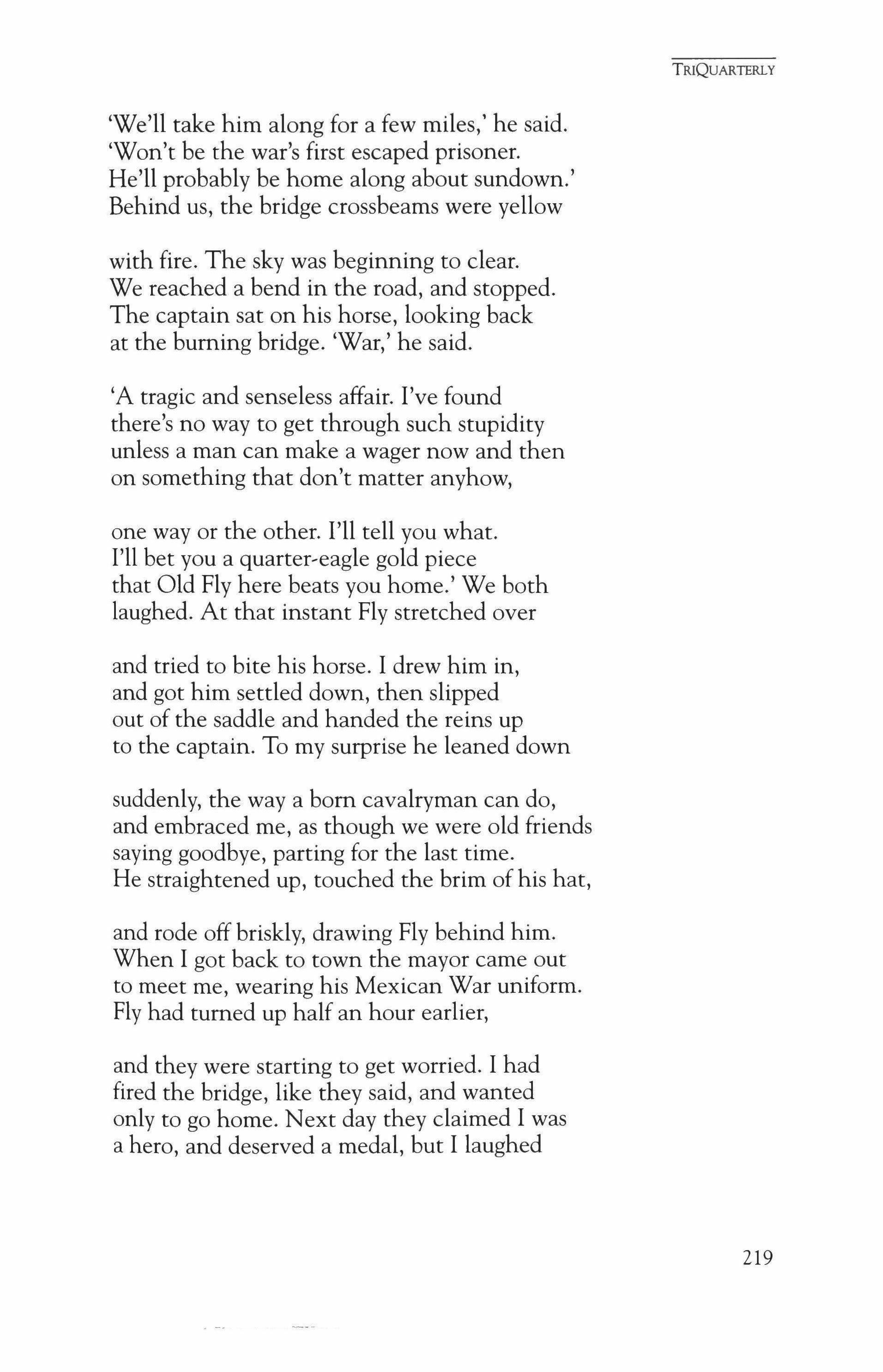
'We'll take him along for a few miles,' he said. 'Won't be the war's first escaped prisoner. He'll probably be home along about sundown.' Behind us, the bridge crossbeams were yellow with fire. The sky was beginning to clear. We reached a bend in the road, and stopped. The captain sat on his horse, looking back at the burning bridge. 'War,' he said.
'A tragic and senseless affair. I've found there's no way to get through such stupidity unless a man can make a wager now and then on something that don't matter anyhow,
one way or the other. I'll tell you what. I'll bet you a quarter,eagle gold piece that Old Fly here beats you home.' We both laughed. At that instant Fly stretched over and tried to bite his horse. I drew him in, and got him settled down, then slipped out of the saddle and handed the reins up to the captain. To my surprise he leaned down suddenly, the way a born cavalryman can do, and embraced me, as though we were old friends saying goodbye, parting for the last time. He straightened up, touched the brim ofhis hat, and rode off briskly, drawing Fly behind him. When I got back to town the mayor came out to meet me, wearing his Mexican War uniform. Fly had turned up half an hour earlier, and they were starting to get worried. I had fired the bridge, like they said, and wanted only to go home. Next day they claimed I was a hero, and deserved a medal, but I laughed
TRIQUARTERLY 219

and told them they'd sing a different tune when it came time to drive the hogs to market. Besides, details from Gettysburg were coming in, and they soon forgot all about that bridge."
3. Going fishing.
It wasn't until seven years later, when Grant was in the White House, that Schuyler Colfaxwhose sister lived in Mississinewa Countyshook loose the money to build a new bridge.
It was a trestle bridge made of iron girders, a quarter mile upstream from the point where the old bridge stood. Barnabas Decker, who watched it being built, and made sure
they did it right, lived on until 1920, and died in his ninetieth year. Summer days during the First War he used to take me fishing off that iron bridge, and he would point out
the two limestone piers, one on either side, where the covered bridge once stood. He would help me bait my hook, and show me how to cast my line out toward the most promising pools.
We would lean on the struts, keeping an eye on our bobbers, and he would tell the story of how he fired the first bridge, and saved the town of Somerset from sure destruction
at the hands of the rebel invasionary force. And if I didn't catch anything, sometimes he would take out the thick leather wallet he carried, and sort through all the bills
and clippings and membership cards in lodges that hadn't held a meeting in twenty years, and find, somewhere in that mass of papers, wrapped squarely in what he called "a piece
TRIQUARTERLY
220
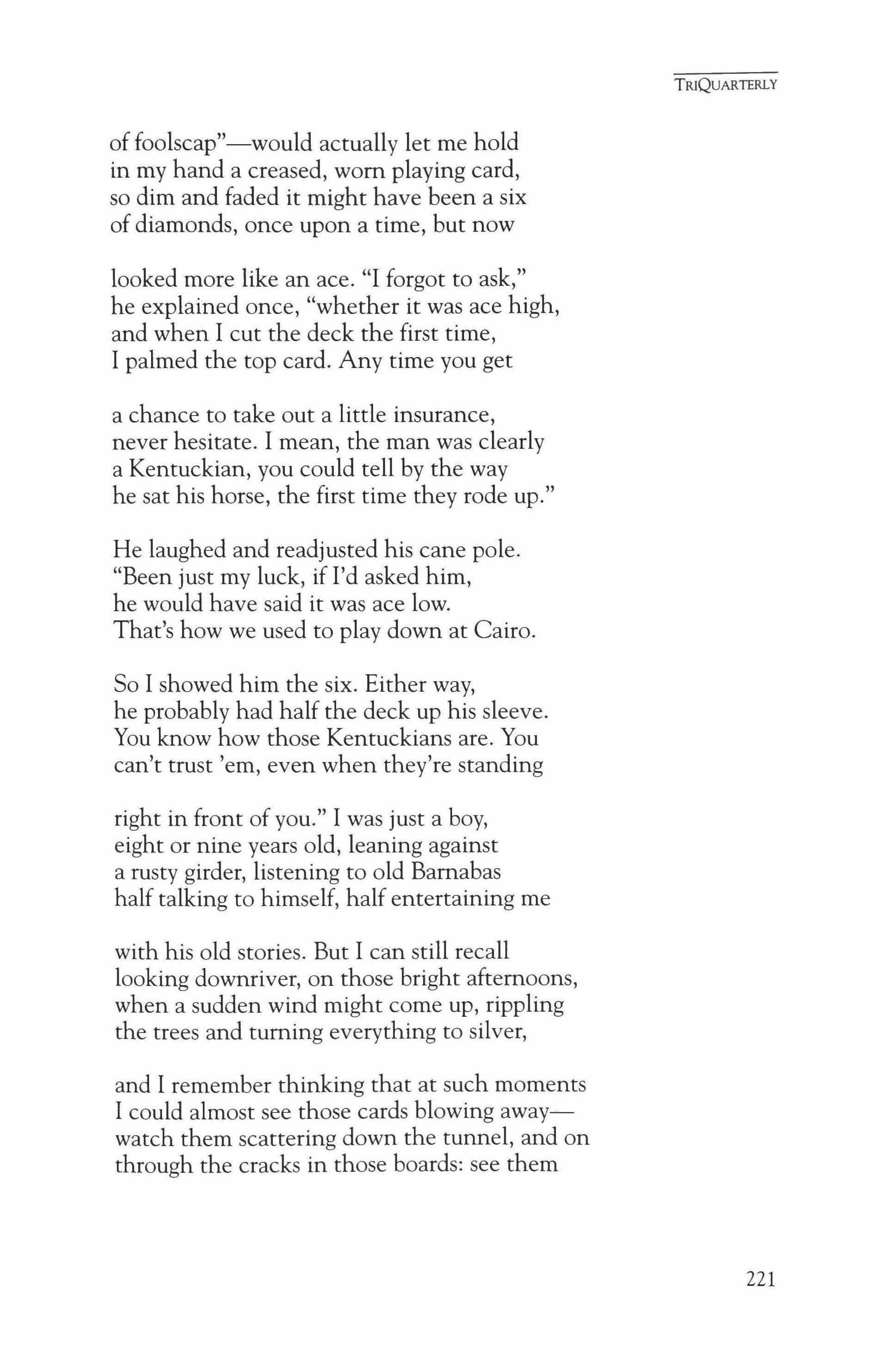
of foolscap"-would actually let me hold in my hand a creased, worn playing card, so dim and faded it might have been a six of diamonds, once upon a time, but now
looked more like an ace. "I forgot to ask," he explained once, "whether it was ace high, and when I cut the deck the first time, I palmed the top card. Any time you get
a chance to take out a little insurance, never hesitate. I mean, the man was clearly a Kentuckian, you could tell by the way he sat his horse, the first time they rode up."
He laughed and readjusted his cane pole. "Been just my luck, if I'd asked him, he would have said it was ace low. That's how we used to play down at Cairo.
So I showed him the six. Either way, he probably had half the deck up his sleeve. You know how those Kentuckians are. You can't trust 'em, even when they're standing
right in front of you." I was just a boy, eight or nine years old, leaning against a rusty girder, listening to old Barnabas half talking to himself, half entertaining me
with his old stories. But I can still recall looking downriver, on those bright afternoons, when a sudden wind might come up, rippling the trees and turning everything to silver,
and I remember thinking that at such moments I could almost see those cards blowing awaywatch them scattering down the tunnel, and on through the cracks in those boards: see them
TruQUARTERLY 221

tumbling and falling through the air toward the water, showing one last hand-queens and eights and a one-eyed jack-and then landing on the water and disappearing there-
all except this one card my great-grandfather had kept with him, all these years, that I could hold in my hand, and touch, and feel the softness of, while he told the story again.
It was that card that was buried with him, finally, in an inner pocket of his black suit, along with his ball pistol, and a turnip watch on a gold chain that turned out to be brass-
a watch he always said never did work anyhow but which he had borrowed, from a friend, years before, without really intending to, in case Old Fly never found his way back home.
TRIQUARTERLY
222
Recollections of a Contingent of Coxey's Army Passing Through Straughn, Indiana,
in April of
1894
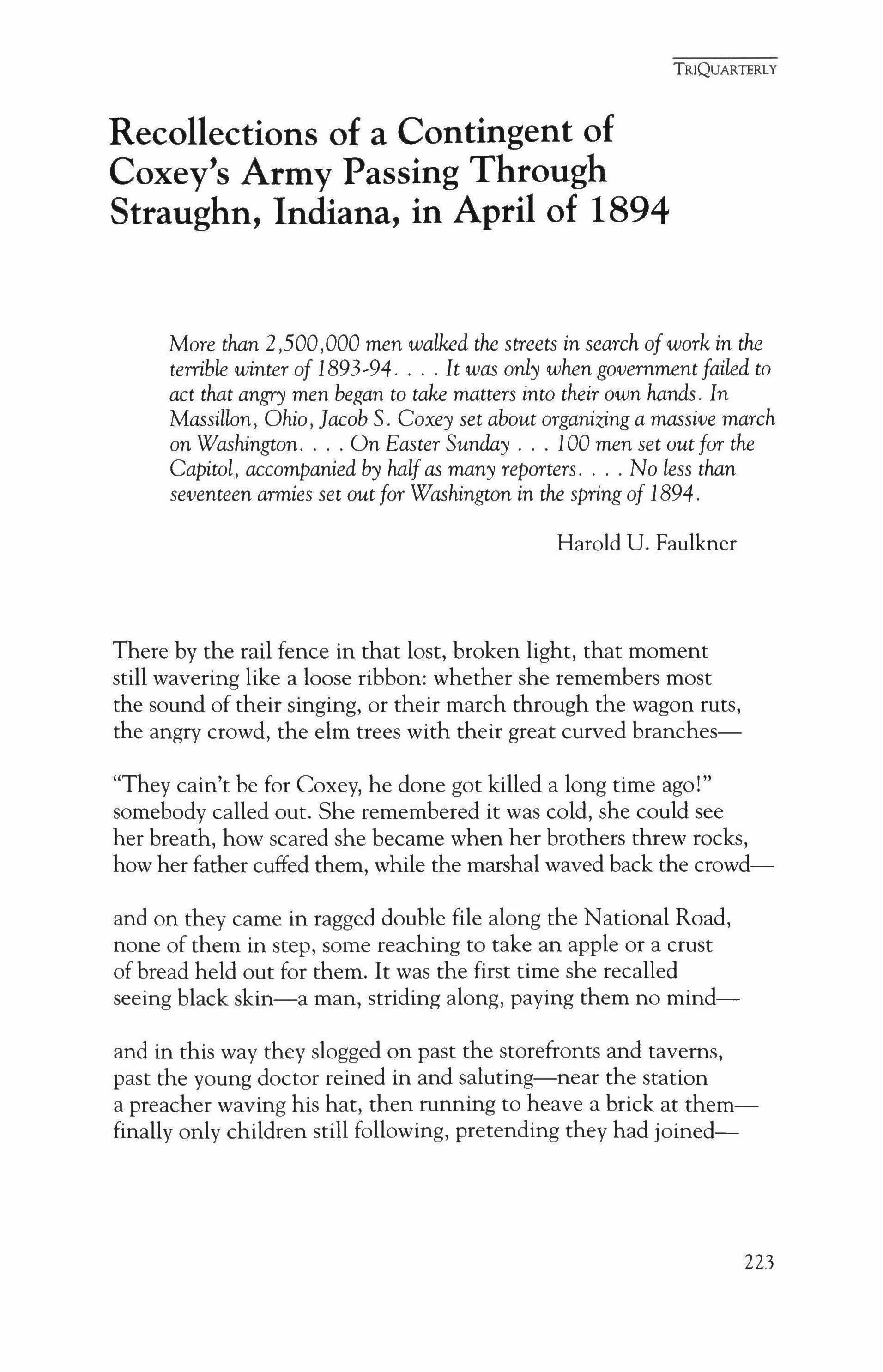
More than 2,500,000 men walked the streets in search of work in the terrible winter of 1893�94 It was only when government failed to act that angry men began to take matters into their own hands. In Massillon, Ohio, Jacob S. Coxey set about organizing a massive march on Washington On Easter Sunday 100 men set out for the Capitol, accompanied by half as many reporters No less than seventeen armies set out for Washington in the spring of 1894.
Harold U. Faulkner
There by the rail fence in that lost, broken light, that moment still wavering like a loose ribbon: whether she remembers most the sound of their singing, or their march through the wagon ruts, the angry crowd, the elm trees with their great curved branches-
''They cain't be for Coxey, he done got killed a long time ago!" somebody called out. She remembered it was cold, she could see her breath, how scared she became when her brothers threw rocks, how her father cuffed them, while the marshal waved back the crowd-
and on they came in ragged double file along the National Road, none of them in step, some reaching to take an apple or a crust of bread held out for them. It was the first time she recalled seeing black skin-a man, striding along, paying them no mind-
and in this way they slogged on past the storefronts and taverns, past the young doctor reined in and saluting-near the station a preacher waving his hat, then running to heave a brick at themfinally only children still following, pretending they had joined-
TRIQUARTERLY
223
TRIQUARTERLY
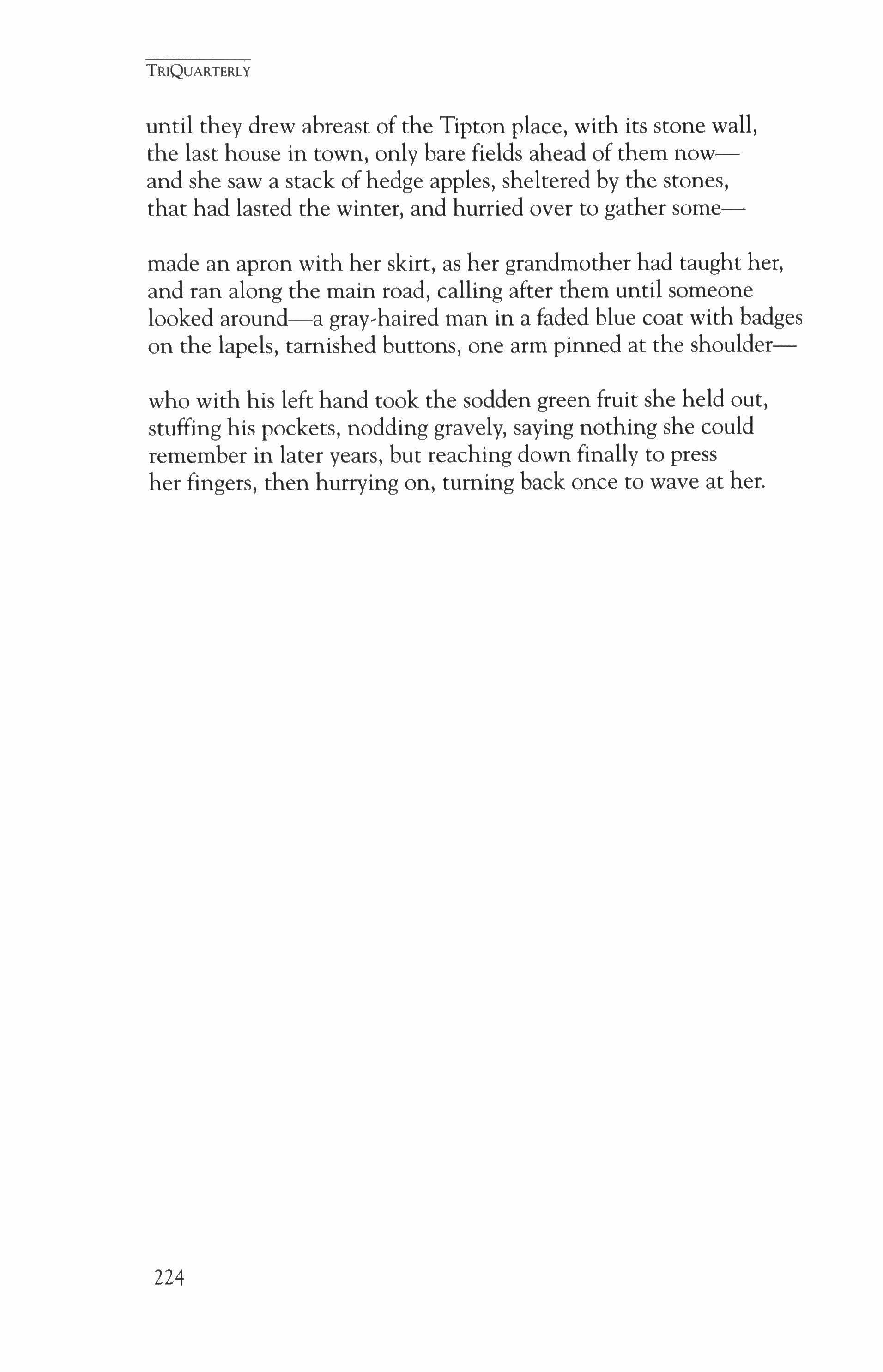
until they drew abreast of the Tipton place, with its stone wall, the last house in town, only bare fields ahead of them nowand she saw a stack of hedge apples, sheltered by the stones, that had lasted the winter, and hurried over to gather some-
made an apron with her skirt, as her grandmother had taught her, and ran along the main road, calling after them until someone looked around-a gray-haired man in a faded blue coat with badges on the lapels, tarnished buttons, one arm pinned at the shoulder-
who with his left hand took the sodden green fruit she held out, stuffing his pockets, nodding gravely, saying nothing she could remember in later years, but reaching down finally to press her fingers, then hurrying on, turning back once to wave at her.
224
Three Poems
Nick Carb6
Eras del Lugar
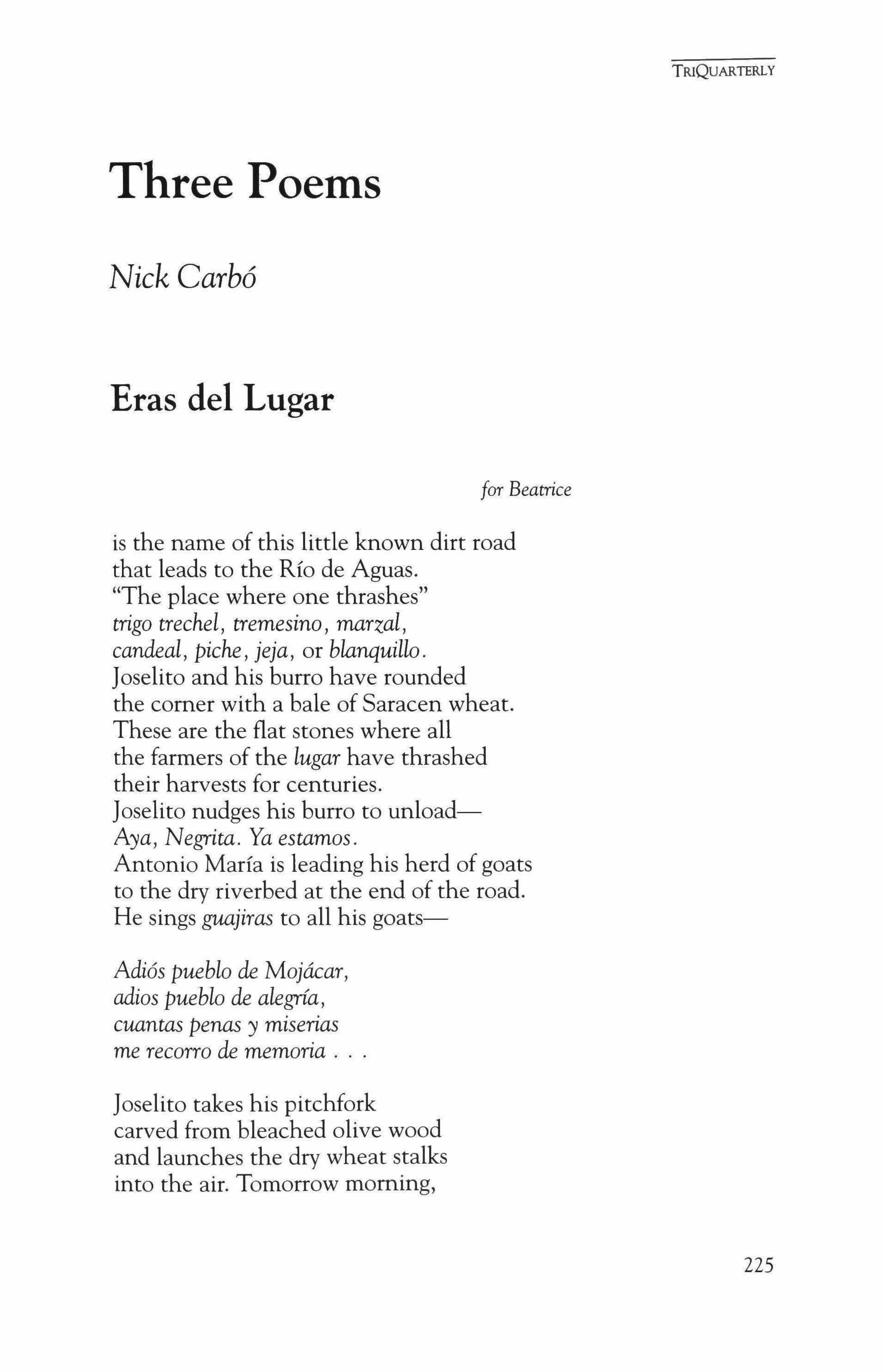
for Beatrice
is the name of this little known dirt road that leads to the Rio de Aguas. "The place where one thrashes" trigo trechel, tremesino, marzal, candeal, piche, jeja, or blanquillo.
[oselito and his burro have rounded the comer with a bale of Saracen wheat. These are the flat stones where all the farmers of the lugar have thrashed their harvests for centuries.
[oselito nudges his burro to unloadAya, Negrita. Ya estamos.
Antonio Maria is leading his herd of goats to the dry riverbed at the end of the road. He sings guajiras to all his goats-
Adios pueblo de Mojacar, adios pueblo de alegiia, cuantas penas y miserias me recorro de memoria
[oselito takes his pitchfork carved from bleached olive wood and launches the dry wheat stalks into the air. Tomorrow morning,
TRIQUARTERLY
225
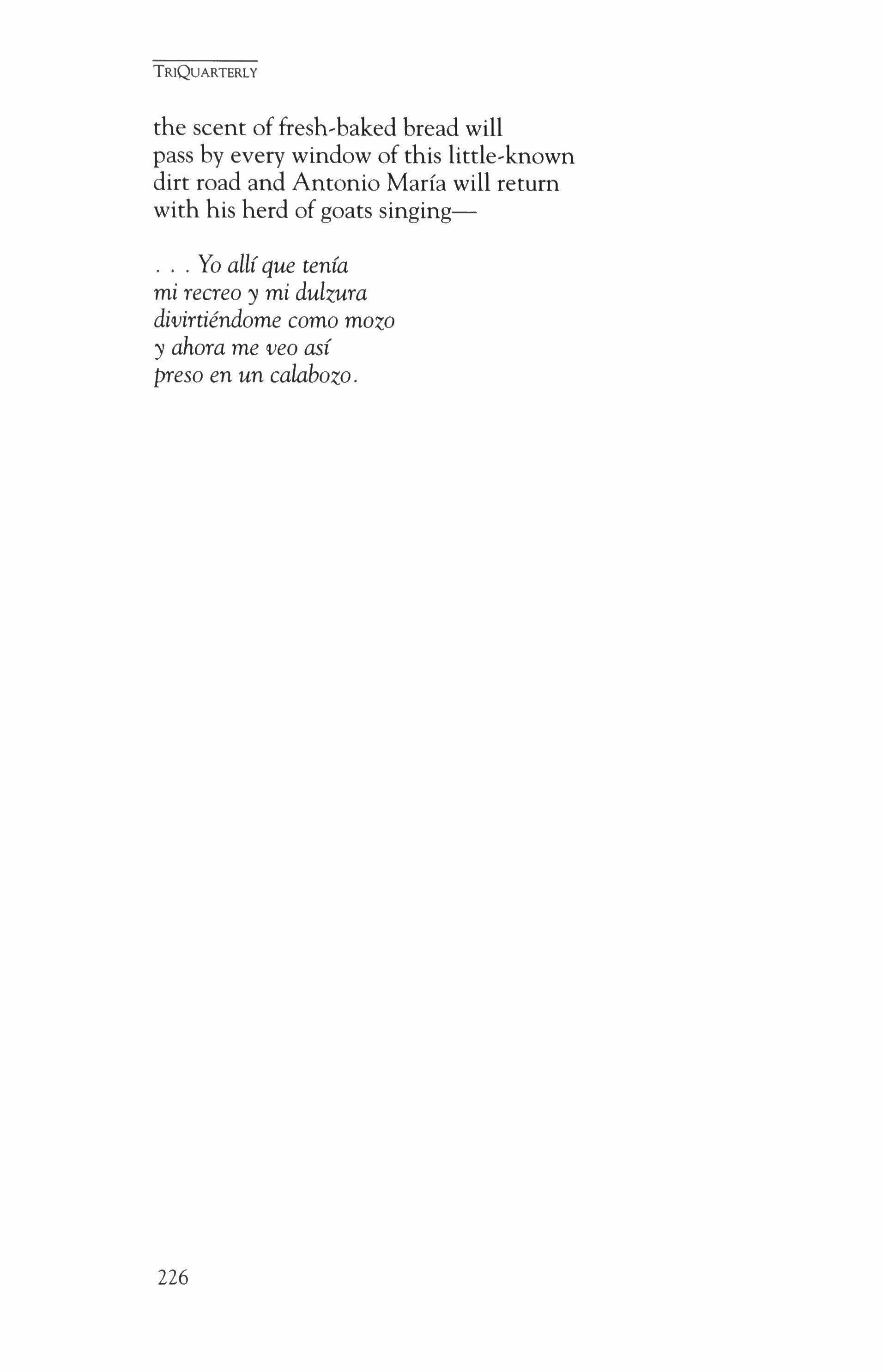
the scent of fresh-baked bread will pass by every window of this little-known dirt road and Antonio Marfa will return with his herd of goats singing-
Yo aU( que tenia mi reereo y mi dulzura divirtiendome eomo rnozo y ahara me veo as( preso en un calabozo.
TRIQUARTERLY
226
Mojacar Love Poem
 for Denise
for Denise
As we walk along the dry riverbed of Rio de Aguas, I think of basket weaving whispers around your all-night hips. And now that the moon is almost full, I wonder if the tiny bits of silver in the sand will catch that midnight Moorish light.
On nights like these, the locals say that the mountain of Mojacar la Vieja glows when the moon is just right. The sounds of the crickets, your footsteps, your non,asthmatic inhalings are also just right for something to happen. So I follow
what the lost river says give her a kiss on the neck. Your hair smells of the sea. Remove her blouse, her skirt, her socks.
Your skin between your breasts feels softer than the ripest olives from the groves on that hill. Kiss her from her toes up to her lips, up to her eyes. Your hands on my bare thighs taste better than a whole plate of membrillo-
we roll around on the fine soil of the riverbed, our bodies begin to sparkle with tiny bits of silver.
Our nude bodies are glowing like the mountain of Mojacar la Vieja which is also glowing.
TruQUARTERLY 227
EI Camino
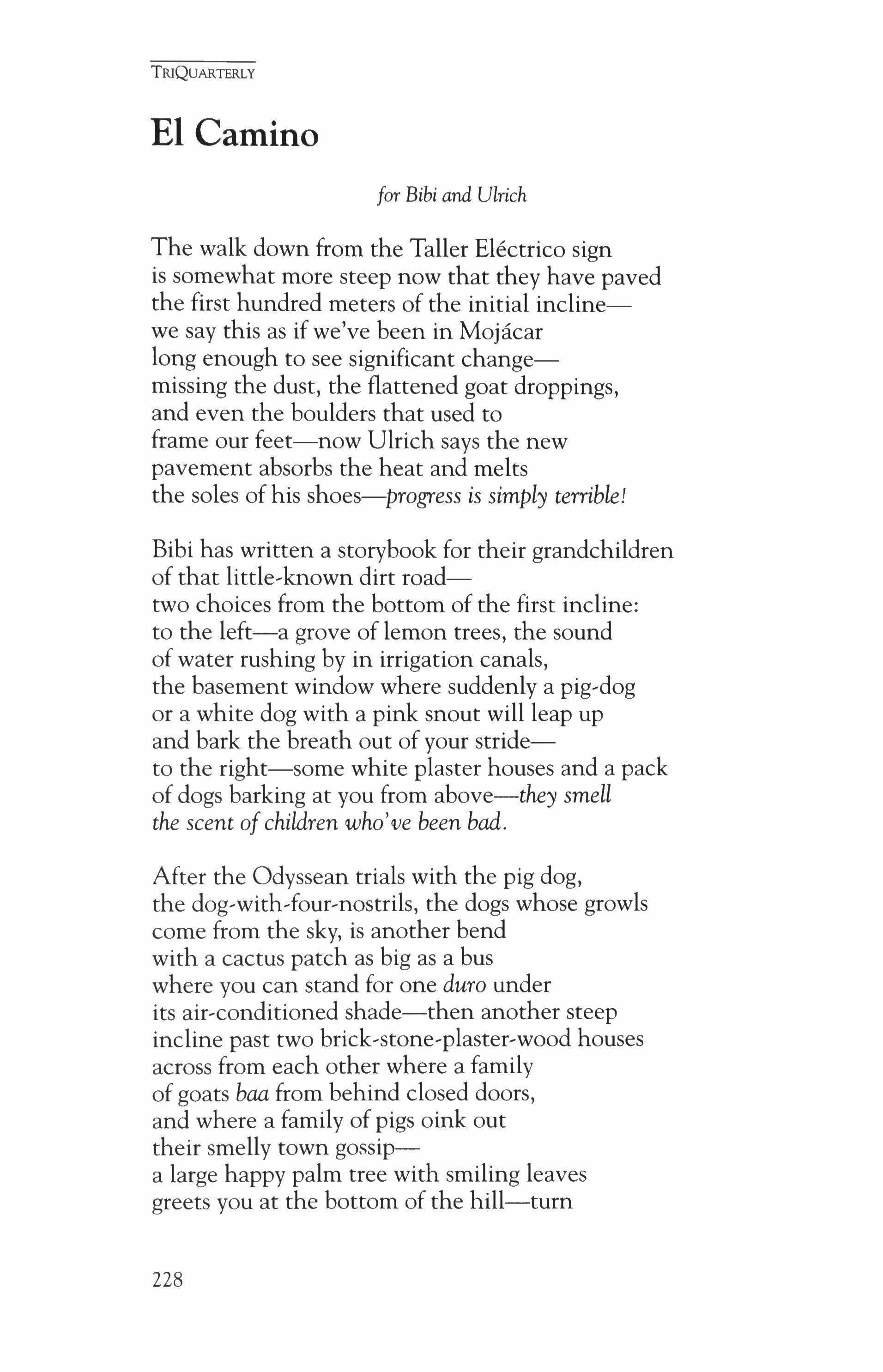
for Bibi and Ulrich
The walk down from the Taller Electrico sign is somewhat more steep now that they have paved the first hundred meters of the initial inclinewe say this as if we've been in Mojacar long enough to see significant changemissing the dust, the flattened goat droppings, and even the boulders that used to frame our feet-now Ulrich says the new pavement absorbs the heat and melts the soles of his shoes-progress is simply terrible!
Bibi has written a storybook for their grandchildren of that little-known dirt roadtwo choices from the bottom of the first incline: to the left-a grove of lemon trees, the sound of water rushing by in irrigation canals, the basement window where suddenly a pig-dog or a white dog with a pink snout will leap up and bark the breath out of your strideto the right-some white plaster houses and a pack of dogs barking at you from above-they smell the scent of children who've been bad.
After the Odyssean trials with the pig dog, the dog-with-four-nostrils, the dogs whose growls come from the sky, is another bend with a cactus patch as big as a bus where you can stand for one duro under its air-conditioned shade-then another steep incline past two brick-stone-plaster-wood houses across from each other where a family of goats baa from behind closed doors, and where a family of pigs oink out their smelly town gossipa large happy palm tree with smiling leaves greets you at the bottom of the hill-tum
TRIQUARTERLY
228
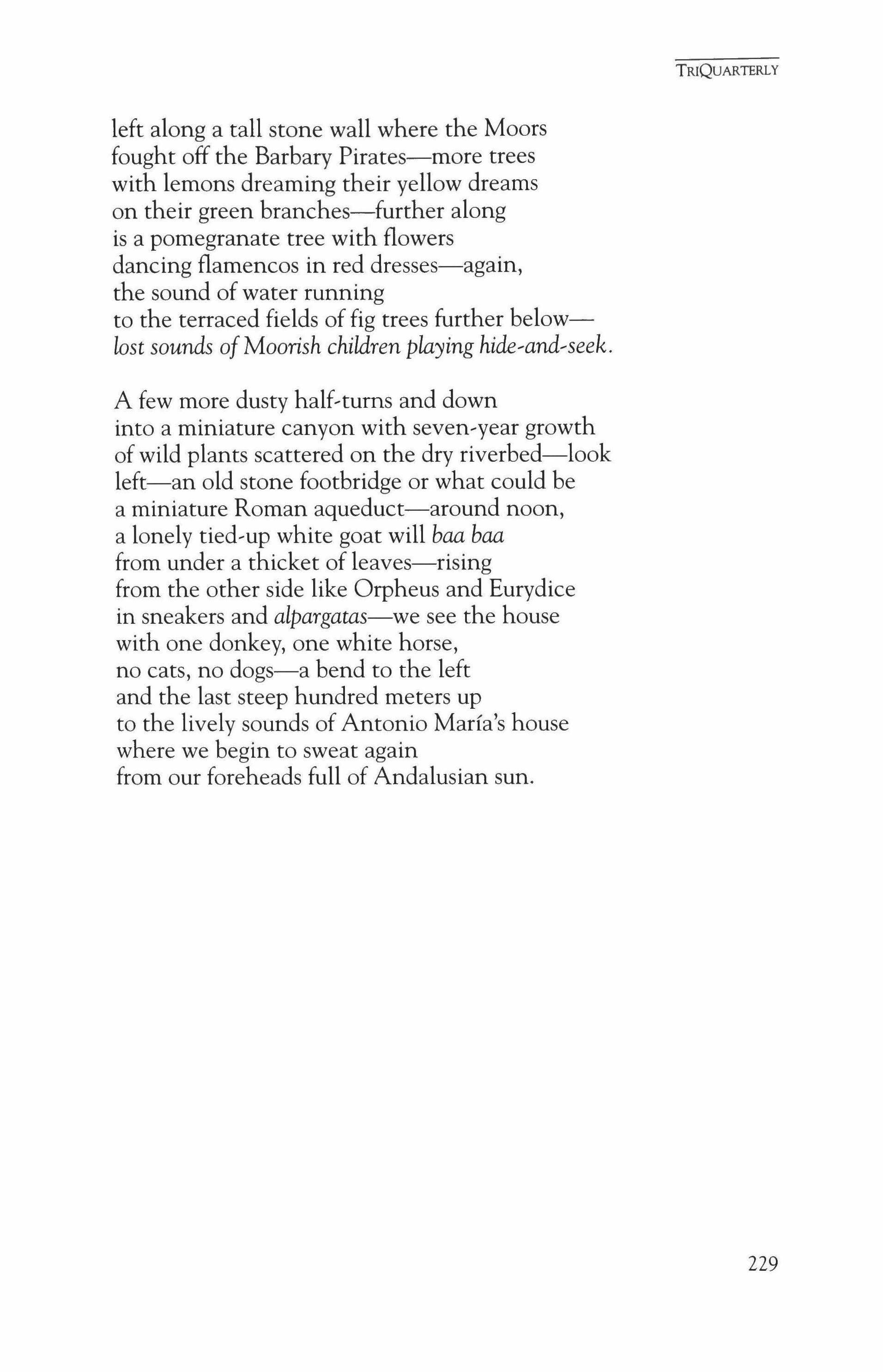
left along a tall stone wall where the Moors fought off the Barbary Pirates-more trees with lemons dreaming their yellow dreams on their green branches-further along is a pomegranate tree with flowers dancing flamencos in red dresses-again, the sound of water running to the terraced fields of fig trees further belowlost sounds ofMoorish children playing hide,and,seek.
A few more dusty half,turns and down into a miniature canyon with seven-year growth ofwild plants scattered on the dry riverbed-look left-an old stone footbridge or what could be a miniature Roman aqueduct-around noon, a lonely tied-up white goat will baa baa from under a thicket of leaves-rising from the other side like Orpheus and Eurydice in sneakers and alpargatas-we see the house with one donkey, one white horse, no cats, no dogs-a bend to the left and the last steep hundred meters up to the lively sounds of Antonio Marfa's house where we begin to sweat again from our foreheads full of Andalusian sun.
TruQUARTERLY 229
Five Poems
Pam Bernard
Social Studies
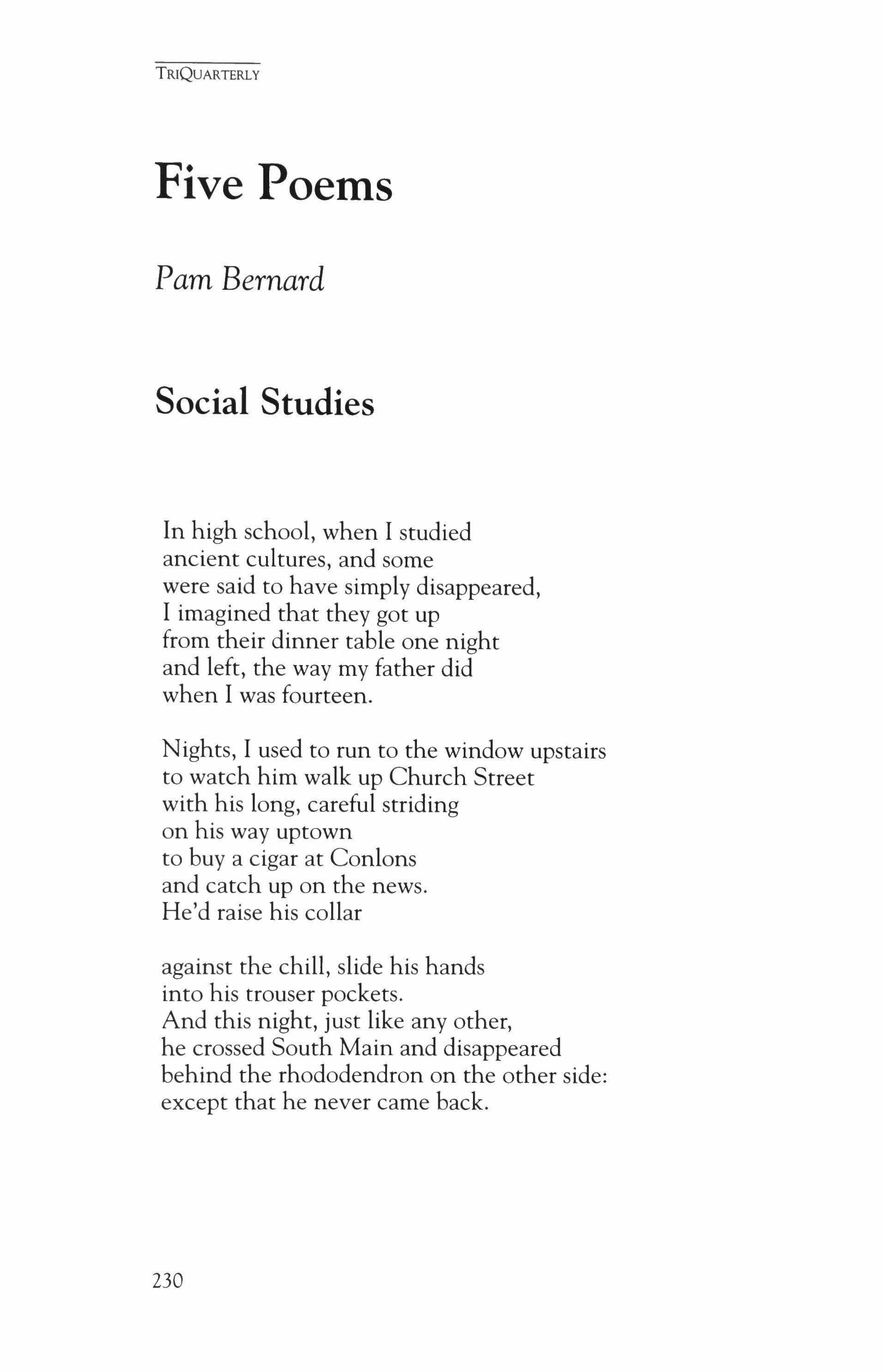
In high school, when I studied ancient cultures, and some were said to have simply disappeared, I imagined that they got up from their dinner table one night and left, the way my father did when I was fourteen.
Nights, I used to run to the window upstairs to watch him walk up Church Street with his long, careful striding on his way uptown to buy a cigar at Conlons and catch up on the news. He'd raise his collar
against the chill, slide his hands into his trouser pockets. And this night, just like any other, he crossed South Main and disappeared behind the rhododendron on the other side: except that he never came back.
TRIQUARTERLY
230
Of Sameness and Thirst
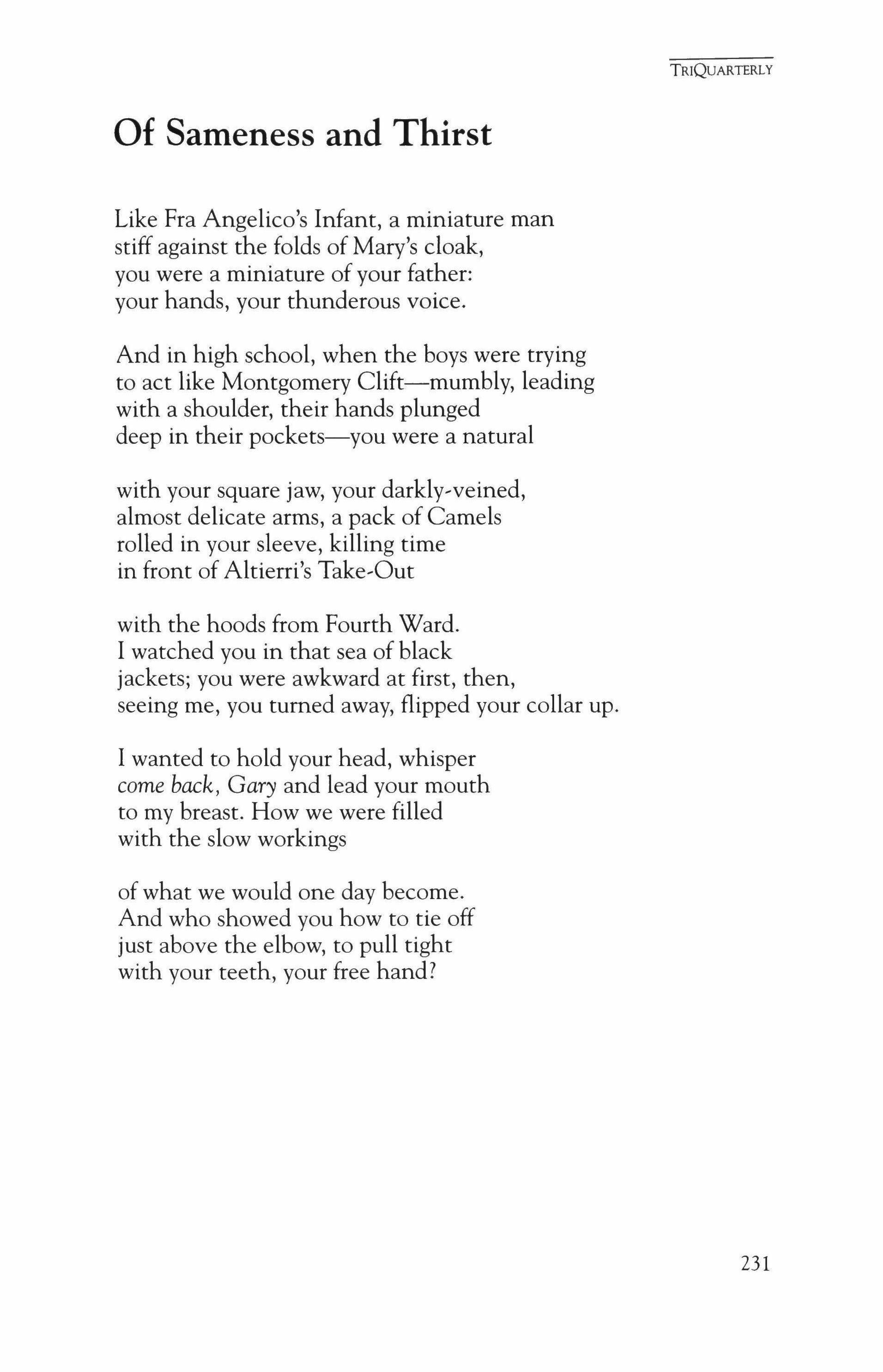
Like Fra Angelico's Infant, a miniature man stiff against the folds of Mary's cloak, you were a miniature of your father: your hands, your thunderous voice.
And in high school, when the boys were trying to act like Montgomery Clift-mumbly, leading with a shoulder, their hands plunged deep in their pockets-you were a natural with your square jaw, your darkly-veined, almost delicate arms, a pack of Camels rolled in your sleeve, killing time in front of Altierri's Take-Out
with the hoods from Fourth Ward. I watched you in that sea of black jackets; you were awkward at first, then, seeing me, you turned away, flipped your collar up.
I wanted to hold your head, whisper come back, Gary and lead your mouth to my breast. How we were filled with the slow workings of what we would one day become. And who showed you how to tie off just above the elbow, to pull tight with your teeth, your free hand?
TRIQUARTERLY 231
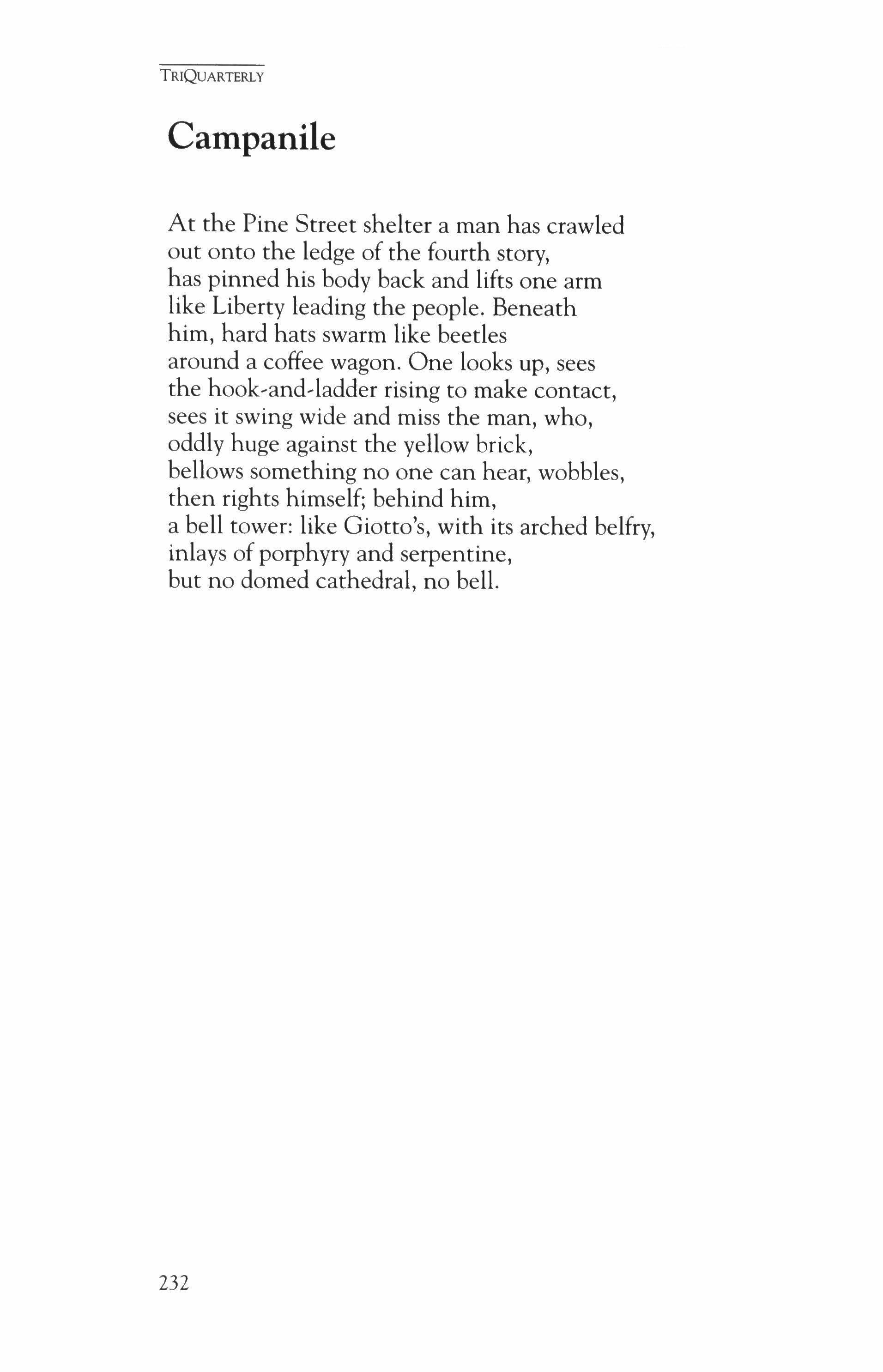
Campanile
At the Pine Street shelter a man has crawled out onto the ledge of the fourth story, has pinned his body back and lifts one arm like Liberty leading the people. Beneath him, hard hats swarm like beetles around a coffee wagon. One looks up, sees the hook,and,ladder rising to make contact, sees it swing wide and miss the man, who, oddly huge against the yellow brick, bellows something no one can hear, wobbles, then rights himself; behind him, a bell tower: like Giotto's, with its arched belfry, inlays of porphyry and serpentine, but no domed cathedral, no bell.
TRIQUARTERLY
232

Wakened
for my sister, Pat
You were looking at Lifealmost eleven and grown up in pedal pushers and short hair. I was sitting next to you pretending to be looking, too, but instead I studied your hands as you carefully turned the pages, wetting your index finger with your tongue while you scanned left, then right. The milky globe of your eye, from where I sat, was almost transparent, the iris a dark sliver, each eyelash precisely curved. As you swept your bangs from your forehead, your blouse opened above the top button. I lowered only my eyes to the sudden abundance of skin, the small breasts so newly formed I hadn't known-
Something made you stopmade you lean closer to the page, your lips part. I followed your gaze to two soldiers standing in a field; near them, one boot, a coat.
See this? you whispered, your nail pressing into a blot in the grass resembling a face-it's a head�and your finger moved across the page to a small mound near the boot. See the hand? I looked closer to see, counted three blocky fingers, a thumb; imagined a foot inside the boot like a last holding its shape. And though
TRIQUARTERLY 233
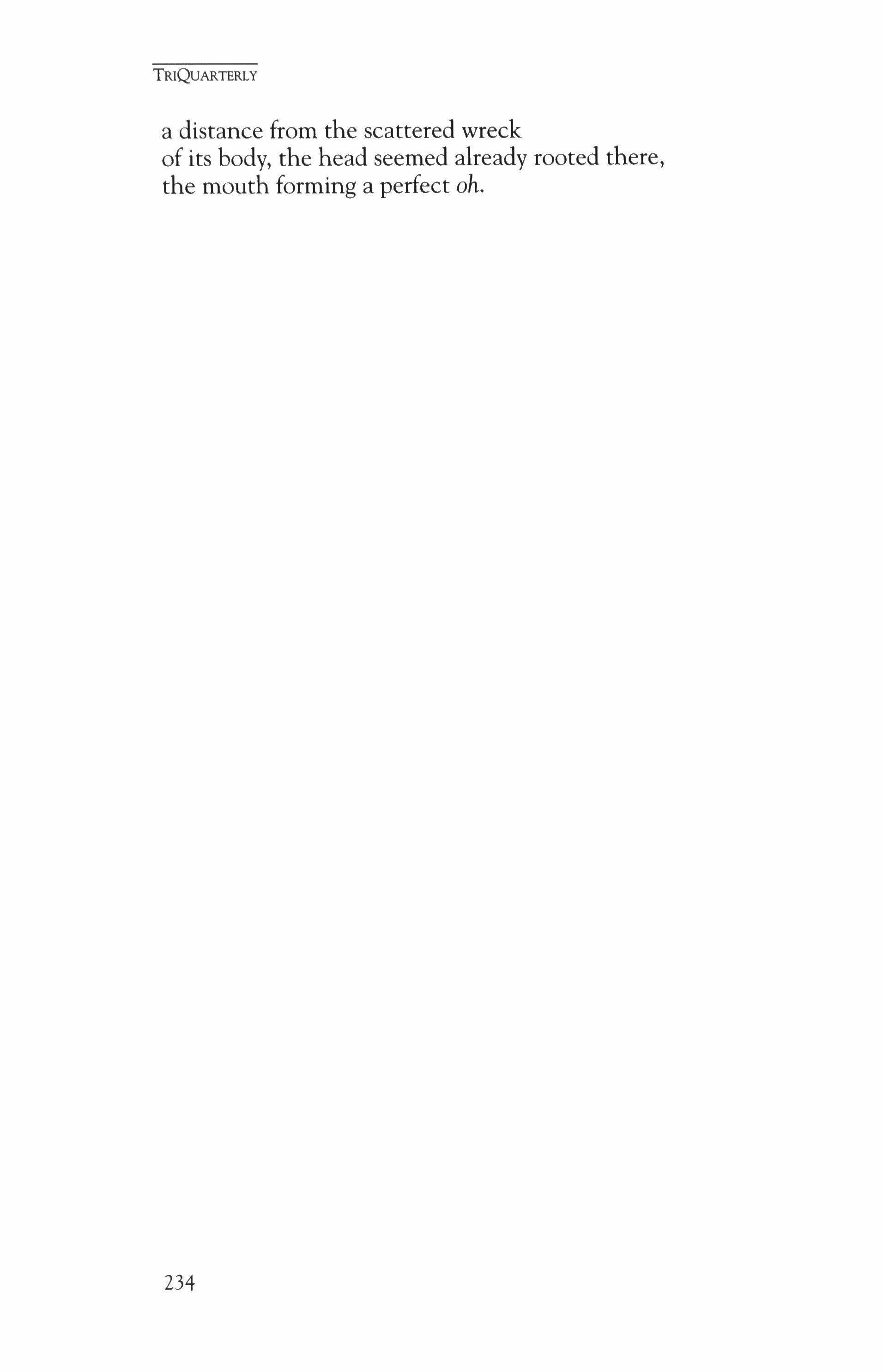
a distance from the scattered wreck of its body, the head seemed already rooted there, the mouth forming a perfect oh.
TRIQUARTERLY
234
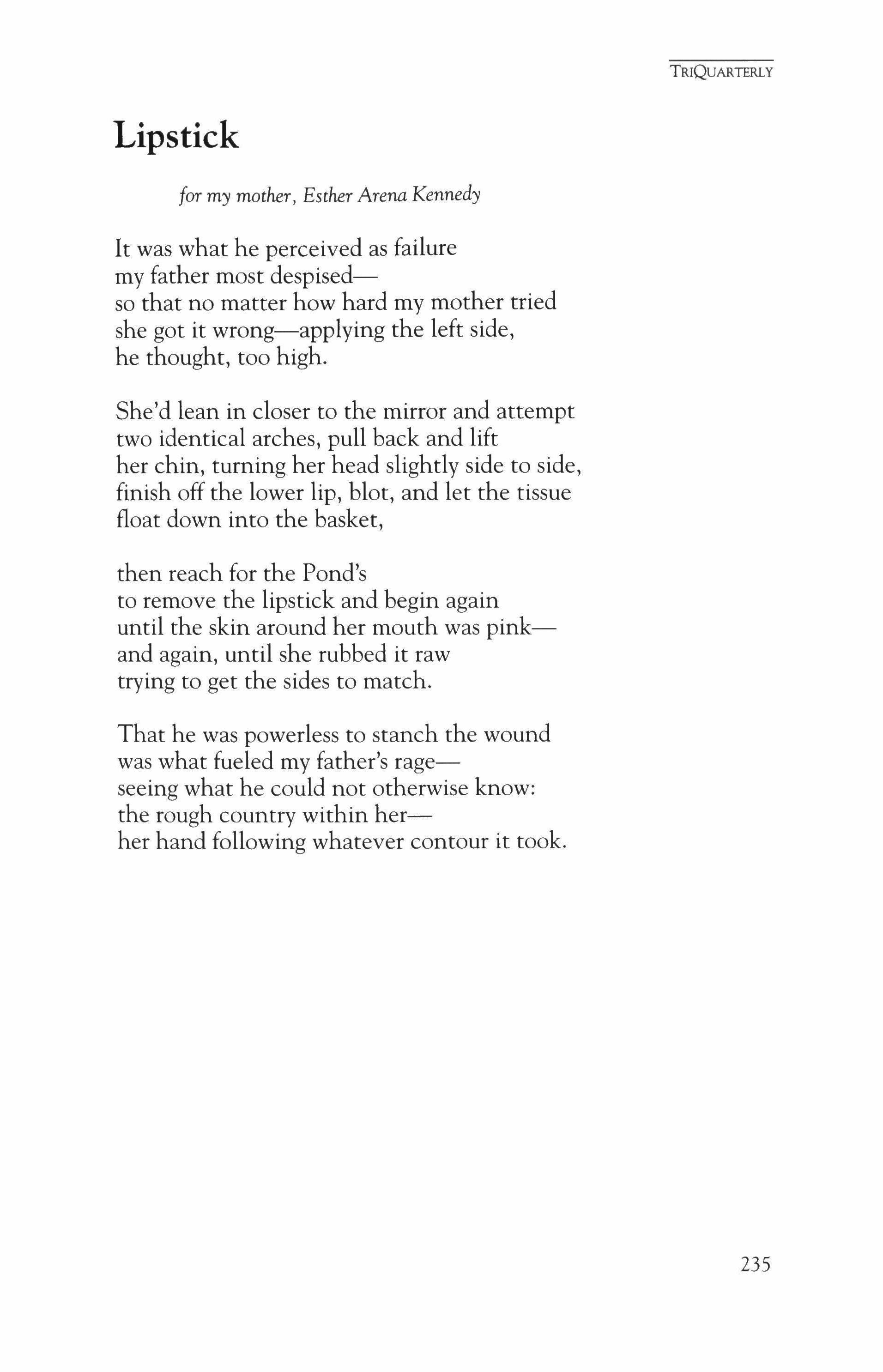
Lipstick
for my mother, Esther Arena Kennedy
It was what he perceived as failure my father most despisedso that no matter how hard my mother tried she got it wrong-applying the left side, he thought, too high.
She'd lean in closer to the mirror and attempt two identical arches, pull back and lift her chin, turning her head slightly side to side, finish off the lower lip, blot, and let the tissue float down into the basket, then reach for the Pond's to remove the lipstick and begin again until the skin around her mouth was pinkand again, until she rubbed it raw trying to get the sides to match.
That he was powerless to stanch the wound was what fueled my father's rageseeing what he could not otherwise know: the rough country within herher hand following whatever contour it took.
TRIQUARTERLY 235
From Treatise on the Rainbow
Stephen Berg
Thirst
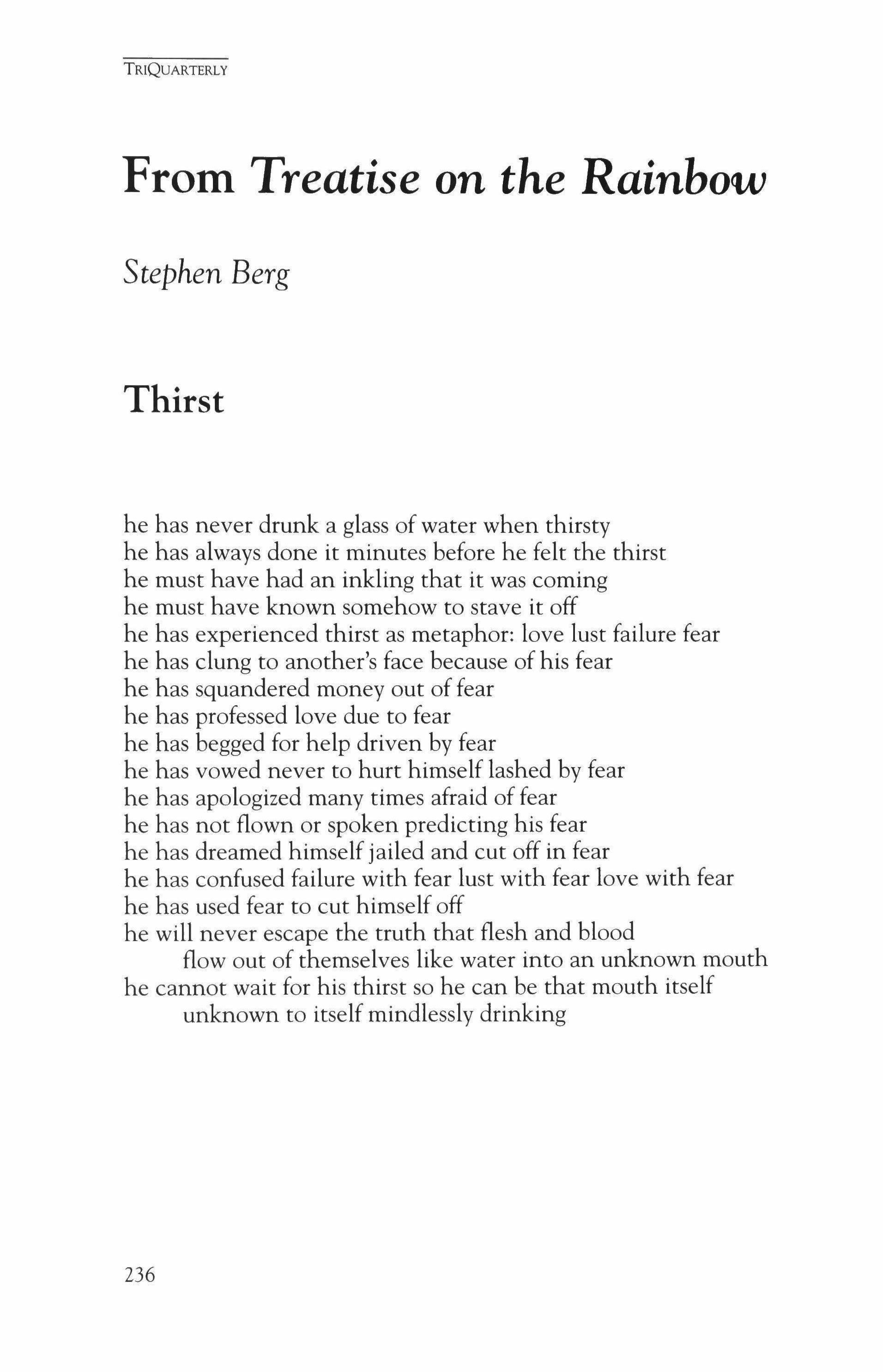
he has never drunk a glass of water when thirsty he has always done it minutes before he felt the thirst he must have had an inkling that it was coming he must have known somehow to stave it off he has experienced thirst as metaphor: love lust failure fear he has clung to another's face because of his fear he has squandered money out of fear he has professed love due to fear he has begged for help driven by fear he has vowed never to hurt himself lashed by fear he has apologized many times afraid of fear he has not flown or spoken predicting his fear he has dreamed himselfjailed and cut off in fear he has confused failure with fear lust with fear love with fear he has used fear to cut himself off he will never escape the truth that flesh and blood flow out of themselves like water into an unknown mouth he cannot wait for his thirst so he can be that mouth itself unknown to itself mindlessly drinking
TRIQUARTERLY
236
Death

he grew disgusted with poetry the word the thing he wanted to be like a Chinese wisdom thinker he tried to act like a Japanese maniac sword master he was tired of the bullshit profundities of clear description and brilliant thought he loved gun shops and visited them when he was in the country fishing
he'd stand at the counter staring through the glass top at the rows of pistols black silver filigreed he'd ask to hold one aim at a customer a wall
he even bought bullets once only the box of bullets he liked to heft one in his hand taste the tip feel the cold jacket on his lips
he remembered when he shot chunks of ice in Iowa
he and Jeff used Jeff's .22 ice on the river splashing up when they were hit
he inherited the rifle when Jeff died a few years back he stored it in the closet took it out leaned it against the wall near his desk
he fired it one afternoon at Bill's gun club later left it at Bill's he looks at his empty hands some days he doesn't care he doesn't care enough he doesn't care nearly enough
beautiful inevitable cosmic law
everyone will die he looks at his two bare palms strangely his own but someone else's
he sees them grow light in darkness one night
he has awakened to himself turns the bedroom doorknob with his right hand opens the door goes down stairs in darkness he holds one hand up in front of a window until he can make out each finger against the brighter dark of the sky
TRIQUARTERLY
237
Cap
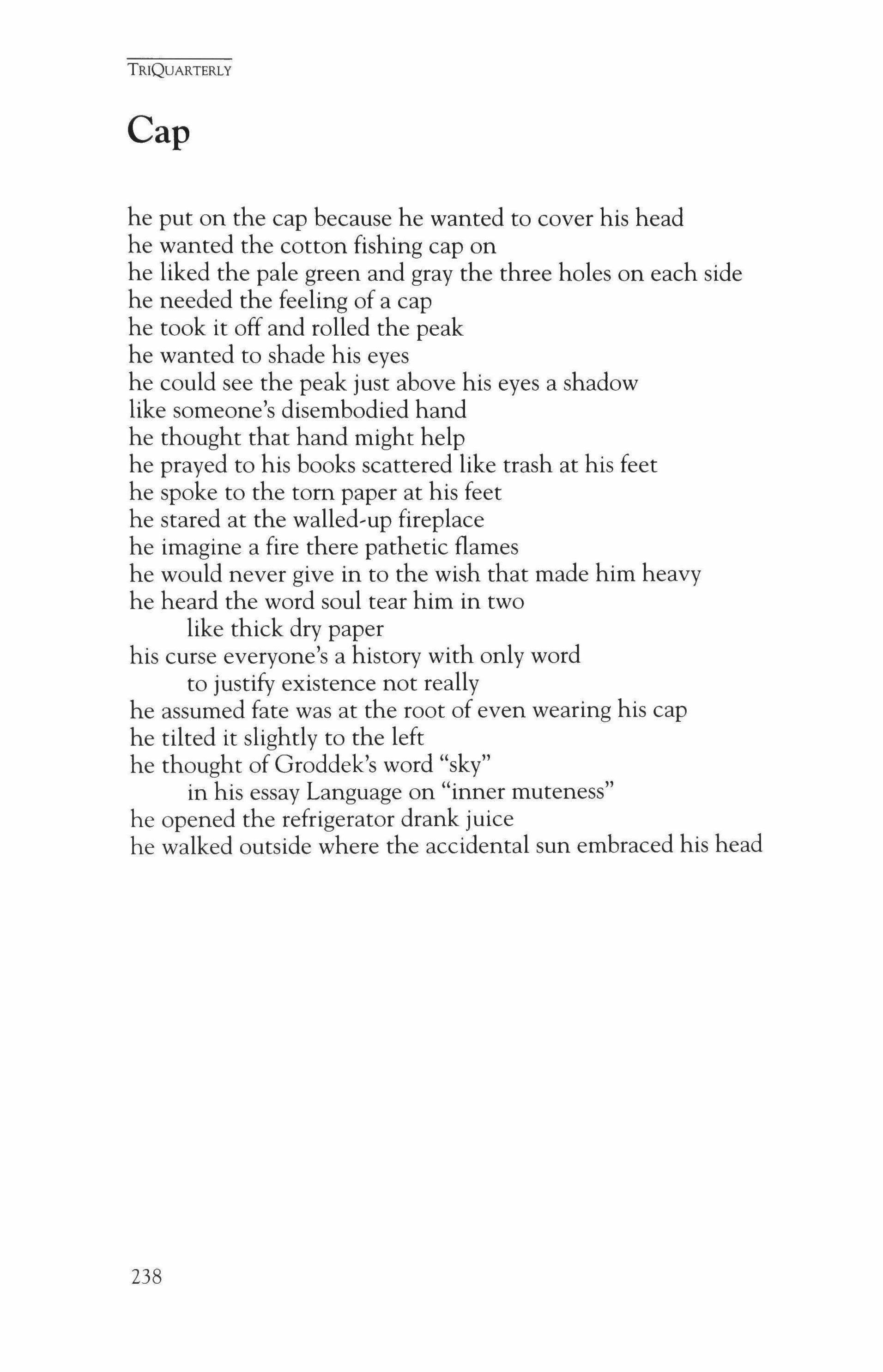
he put on the cap because he wanted to cover his head he wanted the cotton fishing cap on he liked the pale green and gray the three holes on each side he needed the feeling of a cap he took it off and rolled the peak he wanted to shade his eyes
he could see the peak just above his eyes a shadow like someone's disembodied hand he thought that hand might help he prayed to his books scattered like trash at his feet
he spoke to the tom paper at his feet he stared at the walled-up fireplace
he imagine a fire there pathetic flames
he would never give in to the wish that made him heavy he heard the word soul tear him in two like thick dry paper
his curse everyone's a history with only word to justify existence not really he assumed fate was at the root of even wearing his cap he tilted it slightly to the left he thought of Groddek's word "sky" in his essay Language on "inner muteness" he opened the refrigerator drank juice he walked outside where the accidental sun embraced his head
TRIQUARTERLY
238
Speak
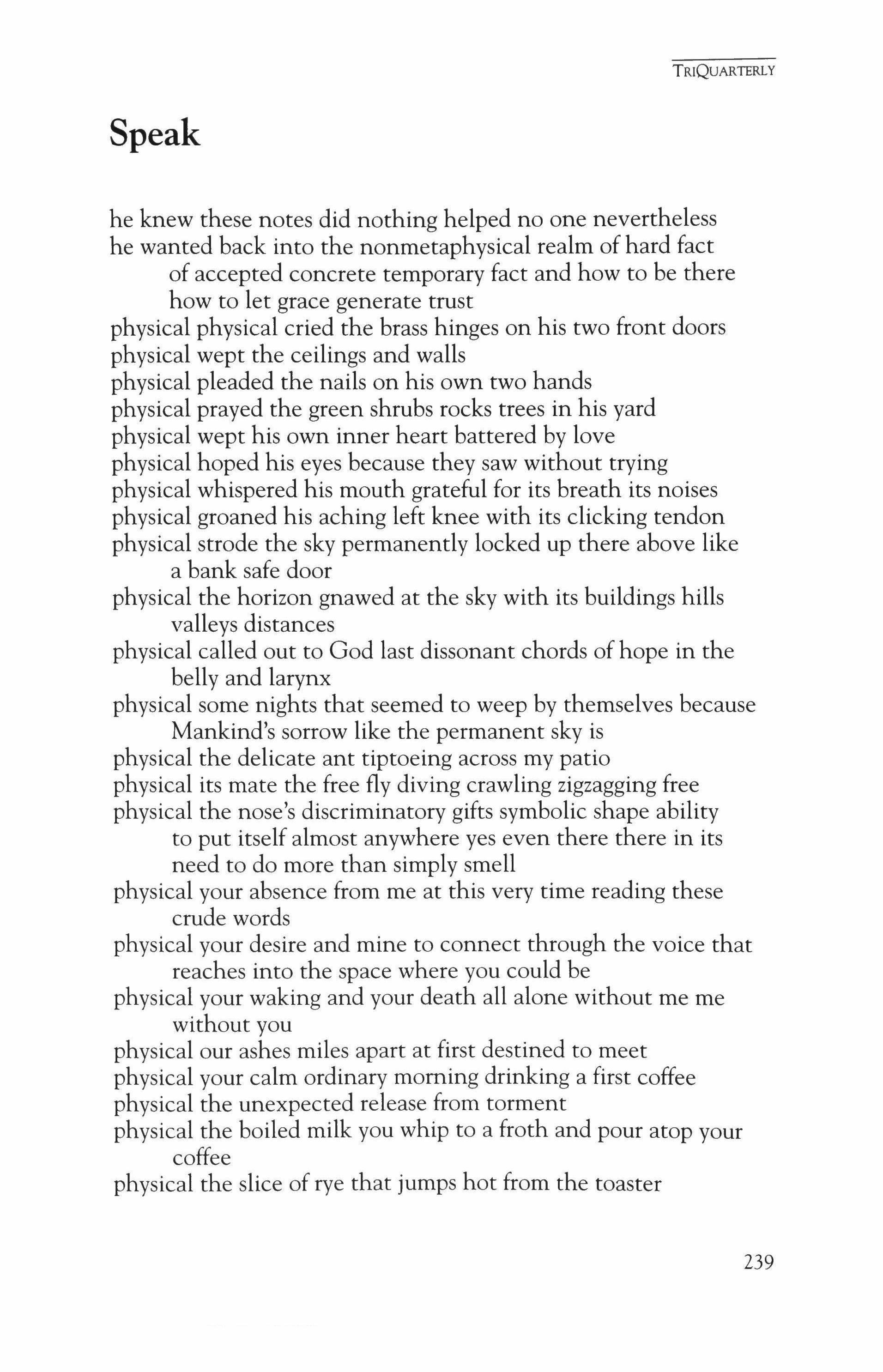
he knew these notes did nothing helped no one nevertheless he wanted back into the nonmetaphysical realm of hard fact of accepted concrete temporary fact and how to be there how to let grace generate trust
physical physical cried the brass hinges on his two front doors
physical wept the ceilings and walls
physical pleaded the nails on his own two hands
physical prayed the green shrubs rocks trees in his yard
physical wept his own inner heart battered by love
physical hoped his eyes because they saw without trying
physical whispered his mouth grateful for its breath its noises
physical groaned his aching left knee with its clicking tendon
physical strode the sky permanently locked up there above like a bank safe door
physical the horizon gnawed at the sky with its buildings hills valleys distances
physical called out to God last dissonant chords of hope in the belly and larynx
physical some nights that seemed to weep by themselves because Mankind's sorrow like the permanent sky is
physical the delicate ant tiptoeing across my patio
physical its mate the free fly diving crawling zigzagging free physical the nose's discriminatory gifts symbolic shape ability to put itself almost anywhere yes even there there in its need to do more than simply smell
physical your absence from me at this very time reading these crude words
physical your desire and mine to connect through the voice that reaches into the space where you could be
physical your waking and your death all alone without me me without you
physical our ashes miles apart at first destined to meet
physical your calm ordinary morning drinking a first coffee
physical the unexpected release from torment
physical the boiled milk you whip to a froth and pour atop your coffee
physical the slice of rye that jumps hot from the toaster
TRIQUARTERLY
239
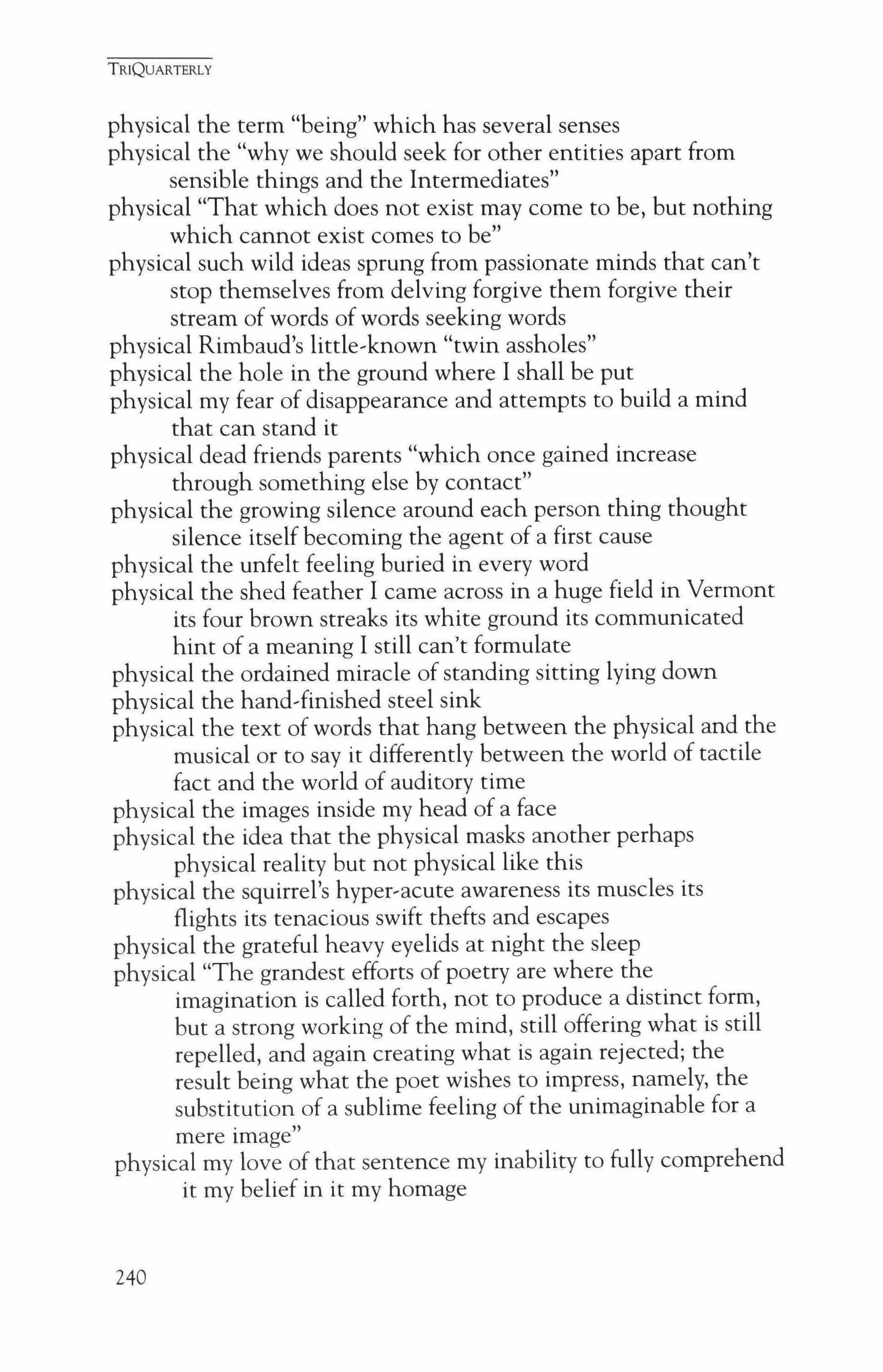
physical the term "being" which has several senses
physical the "why we should seek for other entities apart from sensible things and the Intermediates"
physical "That which does not exist may come to be, but nothing which cannot exist comes to be"
physical such wild ideas sprung from passionate minds that can't stop themselves from delving forgive them forgive their stream of words of words seeking words
physical Rimbaud's Iittle-known "twin assholes"
physical the hole in the ground where I shall be put
physical my fear of disappearance and attempts to build a mind that can stand it
physical dead friends parents "which once gained increase through something else by contact"
physical the growing silence around each person thing thought silence itself becoming the agent of a first cause
physical the unfelt feeling buried in every word
physical the shed feather I came across in a huge field in Vermont its four brown streaks its white ground its communicated hint of a meaning I still can't formulate
physical the ordained miracle of standing sitting lying down
physical the hand-finished steel sink
physical the text of words that hang between the physical and the musical or to say it differently between the world of tactile fact and the world of auditory time
physical the images inside my head of a face
physical the idea that the physical masks another perhaps physical reality but not physical like this
physical the squirrel's hyper-acute awareness its muscles its flights its tenacious swift thefts and escapes
physical the grateful heavy eyelids at night the sleep
physical "The grandest efforts of poetry are where the imagination is called forth, not to produce a distinct form, but a strong working of the mind, still offering what is still repelled, and again creating what is again rejected; the result being what the poet wishes to impress, namely, the substitution of a sublime feeling of the unimaginable for a " mere image
physical my love of that sentence my inability to fully comprehend it my belief in it my homage
TRIQUARTERLY
240
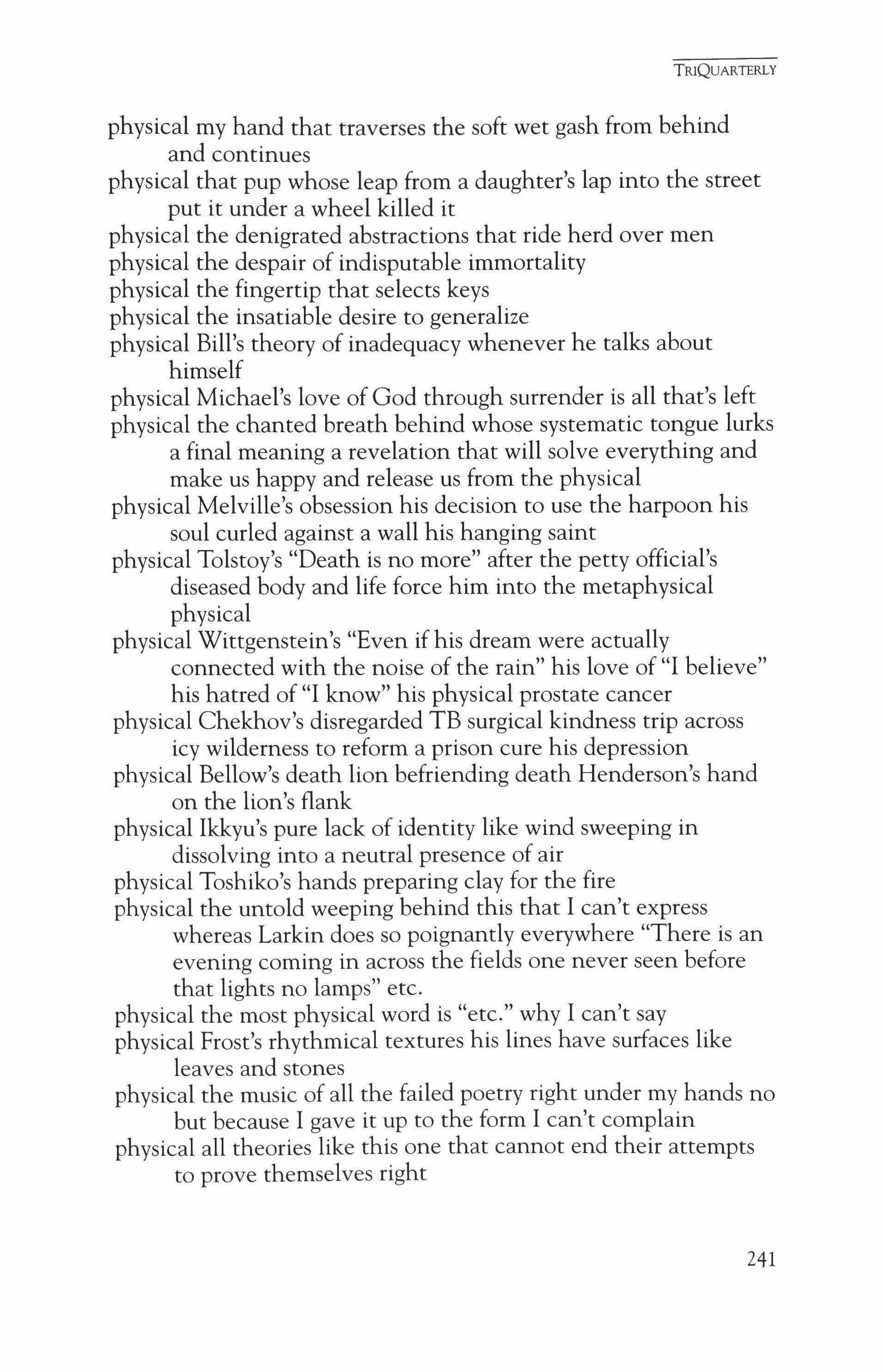
physical my hand that traverses the soft wet gash from behind and continues
physical that pup whose leap from a daughter's lap into the street put it under a wheel killed it
physical the denigrated abstractions that ride herd over men
physical the despair of indisputable immortality
physical the fingertip that selects keys
physical the insatiable desire to generalize
physical Bill's theory of inadequacy whenever he talks about himself
physical Michael's love of God through surrender is all that's left physical the chanted breath behind whose systematic tongue lurks a final meaning a revelation that will solve everything and make us happy and release us from the physical
physical Melville's obsession his decision to use the harpoon his soul curled against a wall his hanging saint
physical Tolstoy's "Death is no more" after the petty official's diseased body and life force him into the metaphysical physical
physical Wittgenstein's "Even if his dream were actually connected with the noise of the rain" his love of "I believe" his hatred of "I know" his physical prostate cancer
physical Chekhov's disregarded TB surgical kindness trip across icy wilderness to reform a prison cure his depression
physical Bellow's death lion befriending death Henderson's hand on the lion's flank
physical Ikkyu's pure lack of identity like wind sweeping in dissolving into a neutral presence of air
physical Toshiko's hands preparing clay for the fire
physical the untold weeping behind this that I can't express whereas Larkin does so poignantly everywhere "There is an evening coming in across the fields one never seen before that lights no lamps" etc.
physical the most physical word is "etc." why I can't say
physical Frost's rhythmical textures his lines have surfaces like leaves and stones
physical the music of all the failed poetry right under my hands no but because I gave it up to the form I can't complain
physical all theories like this one that cannot end their attempts to prove themselves right
TRIQUARTERLY
241
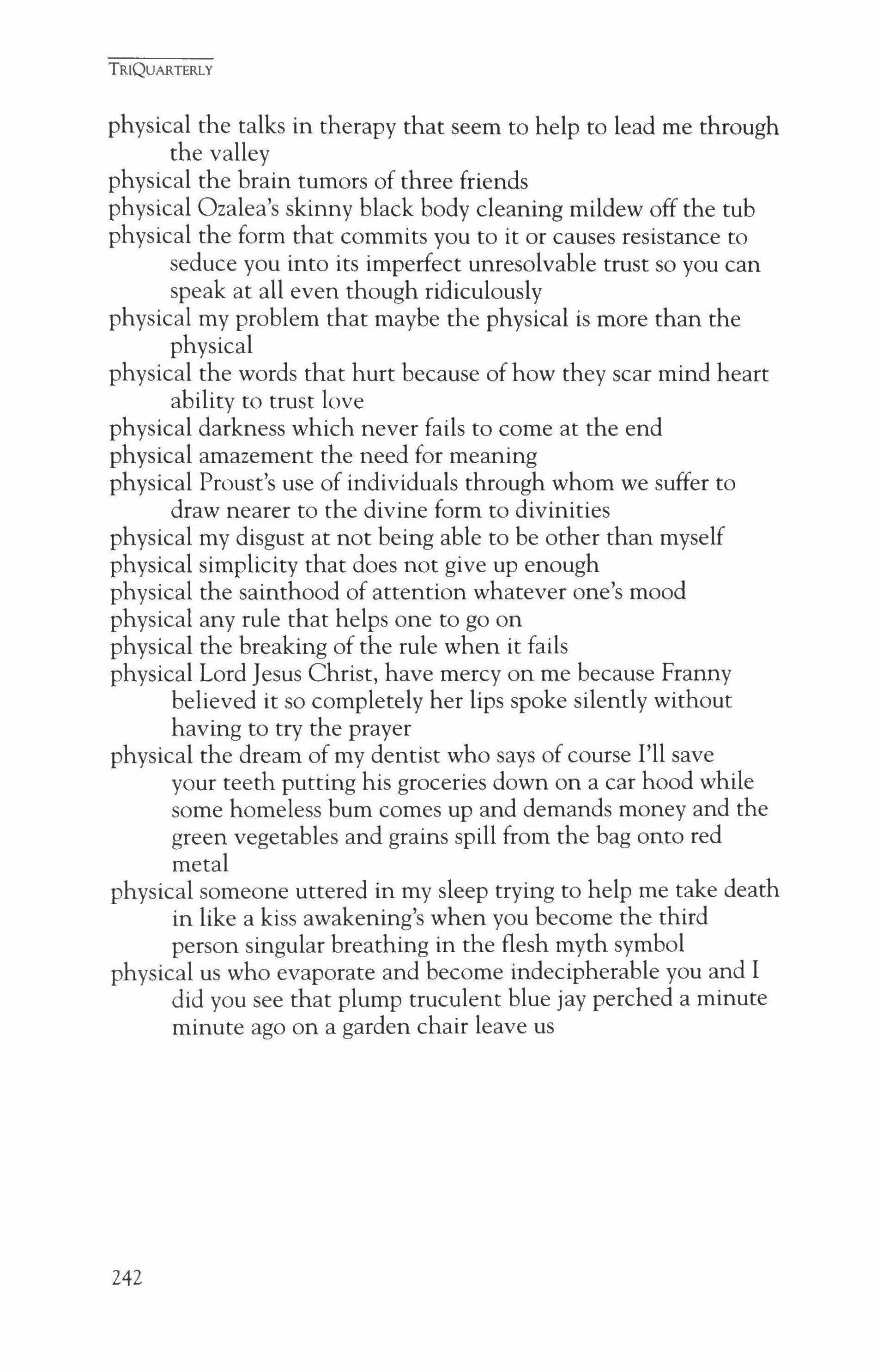
physical the talks in therapy that seem to help to lead me through the valley
physical the brain tumors of three friends
physical Ozalea's skinny black body cleaning mildew off the tub physical the form that commits you to it or causes resistance to seduce you into its imperfect unresolvable trust so you can speak at all even though ridiculously physical my problem that maybe the physical is more than the physical physical the words that hurt because of how they scar mind heart ability to trust love physical darkness which never fails to come at the end physical amazement the need for meaning physical Proust's use of individuals through whom we suffer to draw nearer to the divine form to divinities
physical my disgust at not being able to be other than myself physical simplicity that does not give up enough physical the sainthood of attention whatever one's mood physical any rule that helps one to go on physical the breaking of the rule when it fails physical Lord Jesus Christ, have mercy on me because Franny believed it so completely her lips spoke silently without having to try the prayer
physical the dream of my dentist who says of course I'll save your teeth putting his groceries down on a car hood while some homeless bum comes up and demands money and the green vegetables and grains spill from the bag onto red metal
physical someone uttered in my sleep trying to help me take death in like a kiss awakening's when you become the third person singular breathing in the flesh myth symbol physical us who evaporate and become indecipherable you and I did you see that plump truculent blue jay perched a minute minute ago on a garden chair leave us
TRIQUARTERLY
242
Caritas
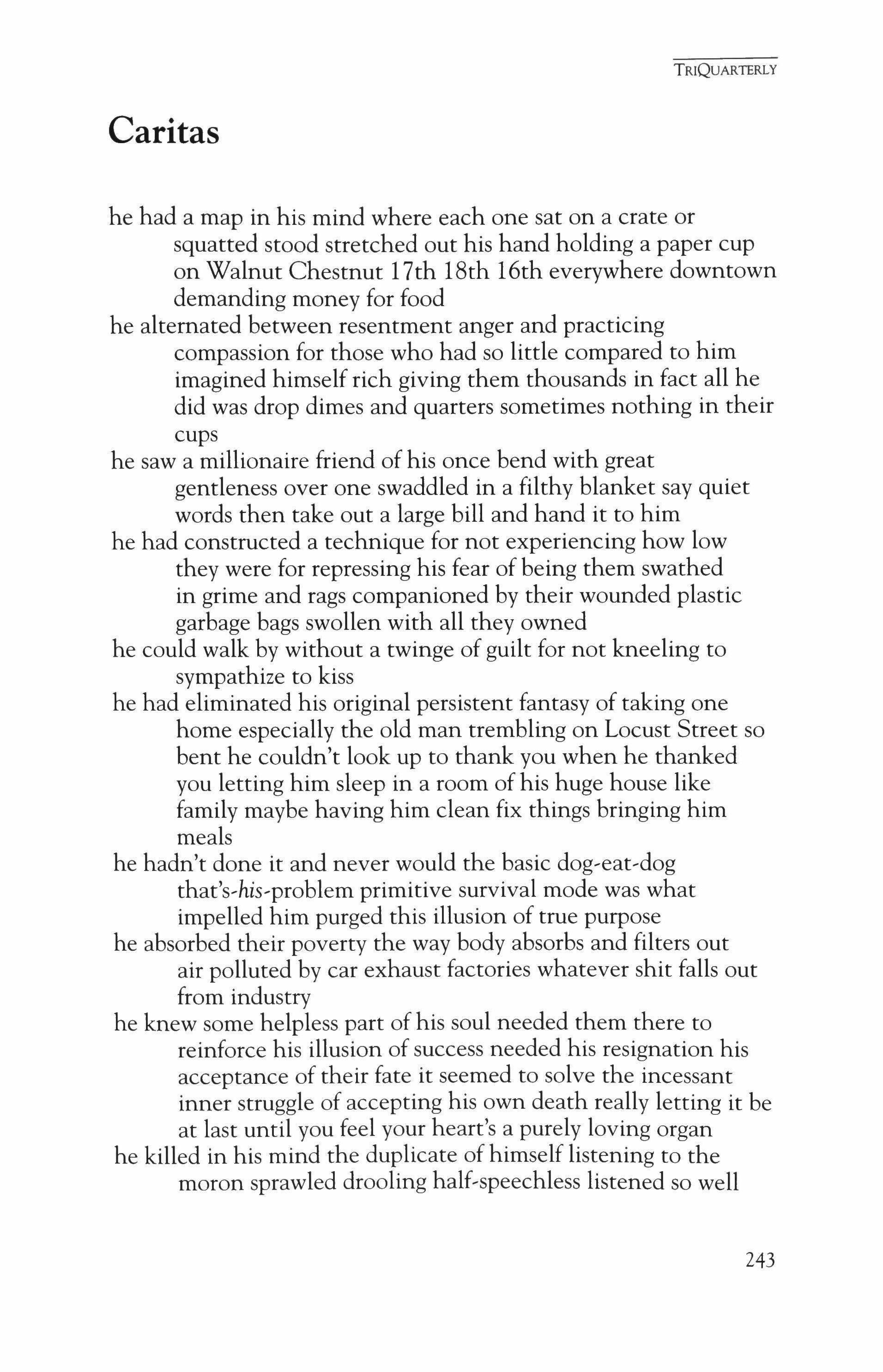
he had a map in his mind where each one sat on a crate or squatted stood stretched out his hand holding a paper cup on Walnut Chestnut 17th ISth 16th everywhere downtown demanding money for food he alternated between resentment anger and practicing compassion for those who had so little compared to him imagined himself rich giving them thousands in fact all he did was drop dimes and quarters sometimes nothing in their cups
he saw a millionaire friend of his once bend with great gentleness over one swaddled in a filthy blanket say quiet words then take out a large bill and hand it to him he had constructed a technique for not experiencing how low they were for repressing his fear of being them swathed in grime and rags companioned by their wounded plastic garbage bags swollen with all they owned he could walk by without a twinge of guilt for not kneeling to sympathize to kiss he had eliminated his original persistent fantasy of taking one home especially the old man trembling on Locust Street so bent he couldn't look up to thank you when he thanked you letting him sleep in a room of his huge house like family maybe having him clean fix things bringing him meals
he hadn't done it and never would the basic dog-eat-dog that's-his-problem primitive survival mode was what impelled him purged this illusion of true purpose he absorbed their poverty the way body absorbs and filters out air polluted by car exhaust factories whatever shit falls out from industry he knew some helpless part of his soul needed them there to reinforce his illusion of success needed his resignation his acceptance of their fate it seemed to solve the incessant inner struggle of accepting his own death really letting it be at last until you feel your heart's a purely loving organ he killed in his mind the duplicate ofhimself listening to the moron sprawled drooling half-speechless listened so well
TRIQUARTERLY
243
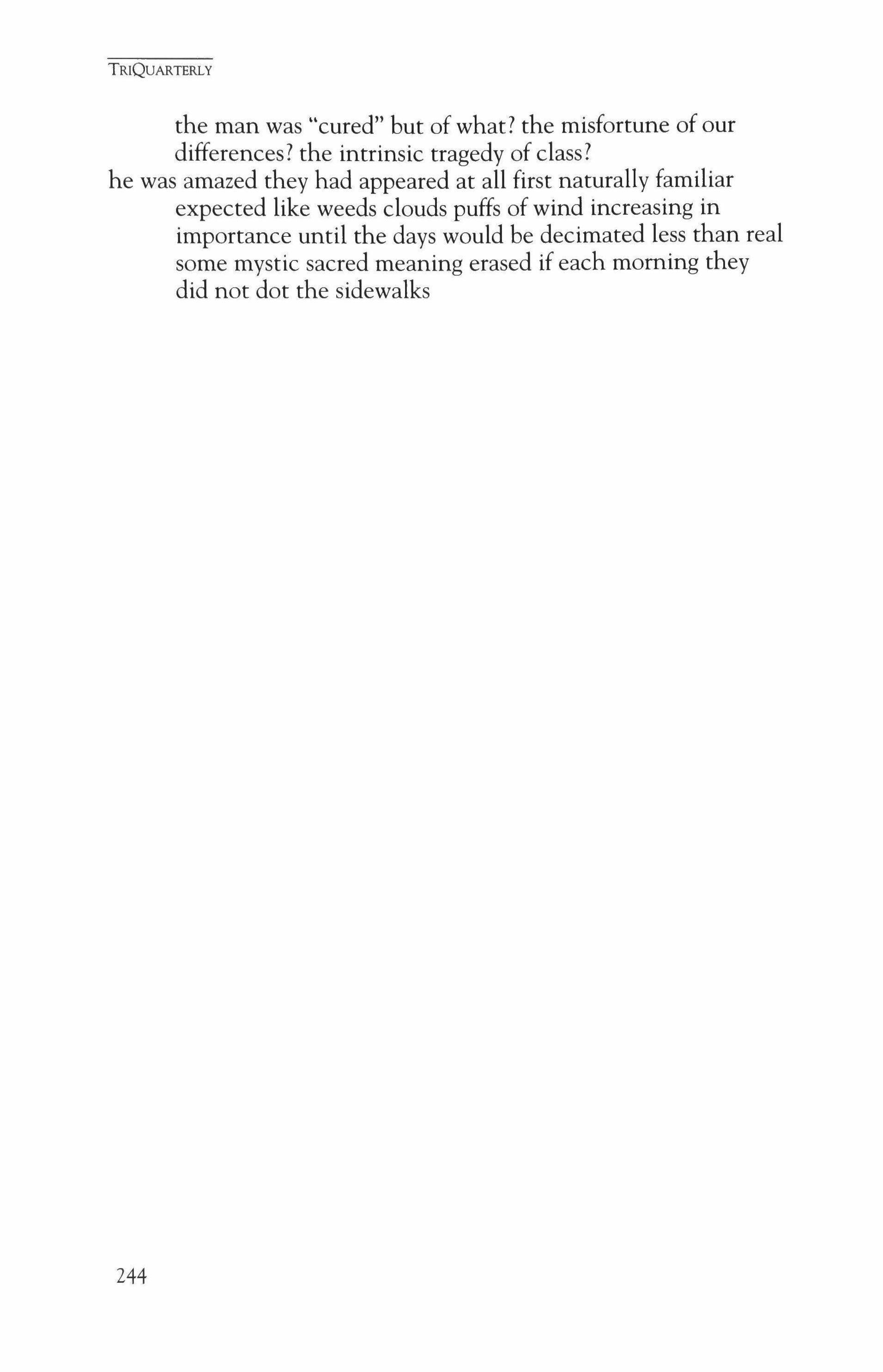
the man was "cured" but of what? the misfortune of our differences? the intrinsic tragedy of class? he was amazed they had appeared at all first naturally familiar expected like weeds clouds puffs of wind increasing in importance until the days would be decimated less than real some mystic sacred meaning erased if each morning they did not dot the sidewalks
TRIQUARTERLY
244
Shit stick
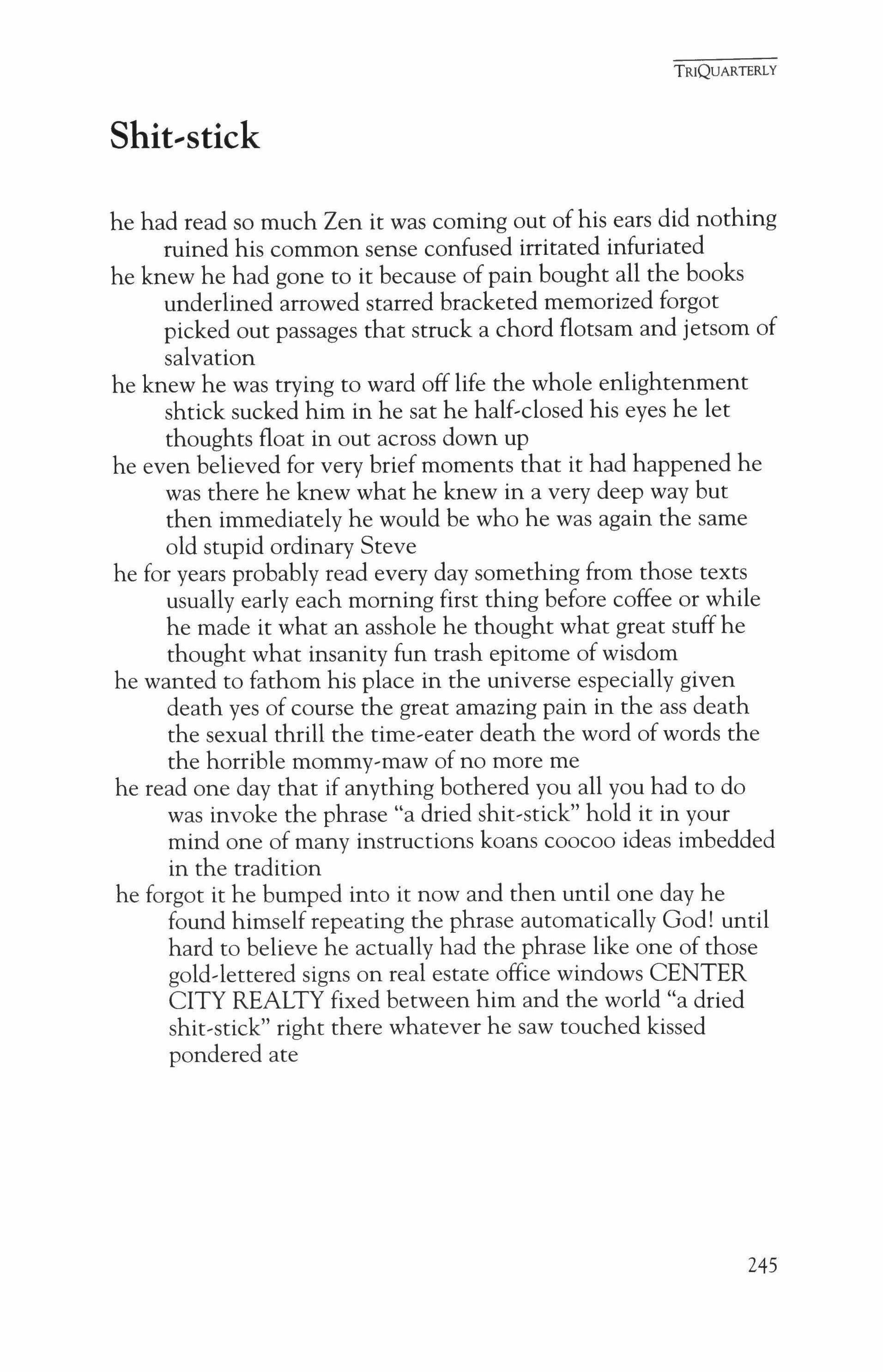
he had read so much Zen it was coming out ofhis ears did nothing ruined his common sense confused irritated infuriated he knew he had gone to it because of pain bought all the books underlined arrowed starred bracketed memorized forgot picked out passages that struck a chord flotsam and jetsom of salvation he knew he was trying to ward off life the whole enlightenment shtick sucked him in he sat he halfclosed his eyes he let thoughts float in out across down up he even believed for very brief moments that it had happened he was there he knew what he knew in a very deep way but then immediately he would be who he was again the same old stupid ordinary Steve he for years probably read every day something from those texts usually early each morning first thing before coffee or while he made it what an asshole he thought what great stuff he thought what insanity fun trash epitome of wisdom he wanted to fathom his place in the universe especially given death yes of course the great amazing pain in the ass death the sexual thrill the time-eater death the word of words the the horrible mommy-maw of no more me he read one day that if anything bothered you all you had to do was invoke the phrase "a dried shit-stick" hold it in your mind one of many instructions koans coocoo ideas imbedded in the tradition he forgot it he bumped into it now and then until one day he found himselfrepeating the phrase automatically God! until hard to believe he actually had the phrase like one of those gold-lettered signs on real estate office windows CENTER CITY REALTY fixed between him and the world "a dried shit-stick" right there whatever he saw touched kissed pondered ate
TRIQUARTERLY
245
Thread
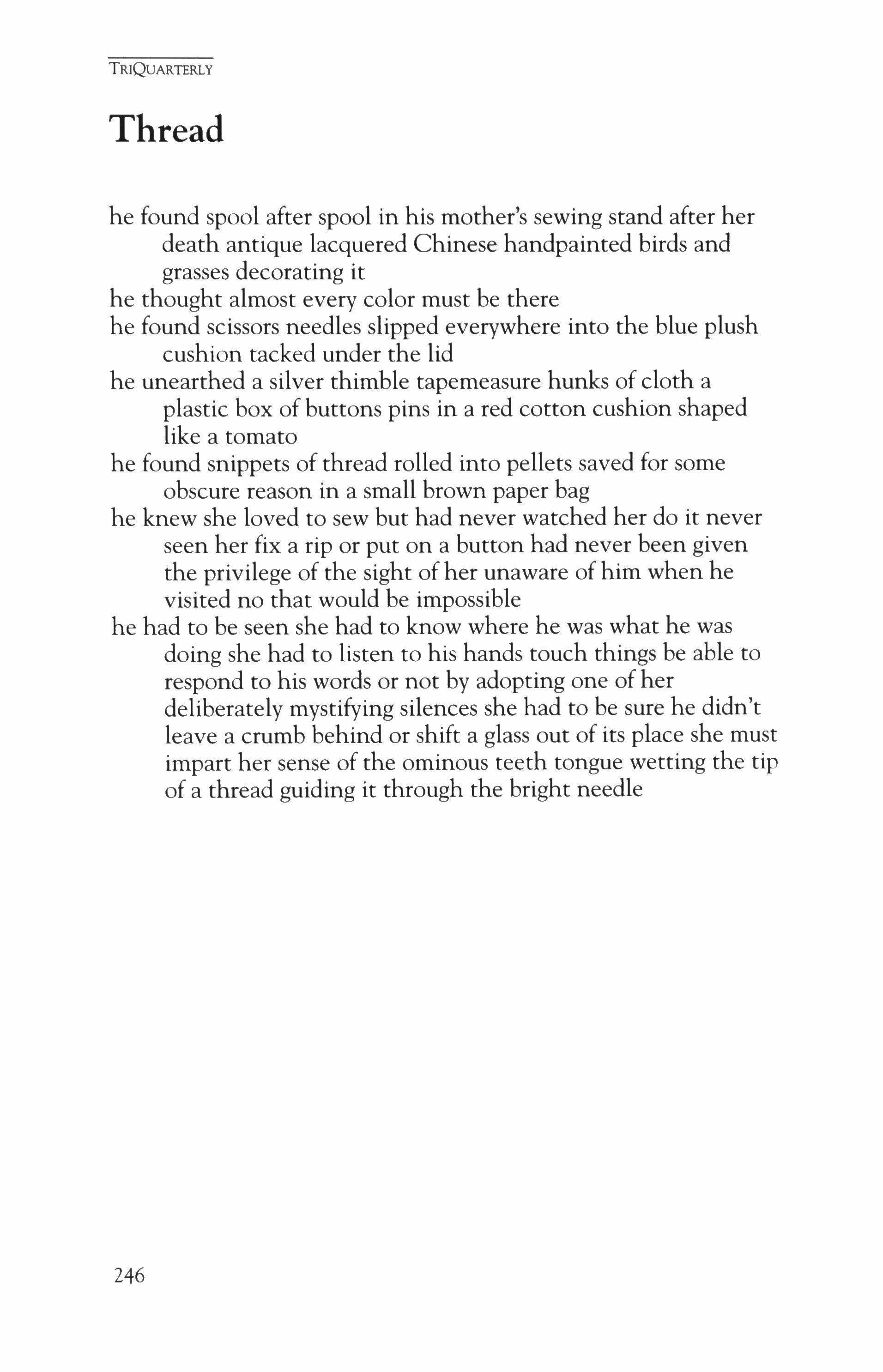
he found spool after spool in his mother's sewing stand after her death antique lacquered Chinese handpainted birds and grasses decorating it
he thought almost every color must be there he found scissors needles slipped everywhere into the blue plush cushion tacked under the lid
he unearthed a silver thimble tapemeasure hunks of cloth a plastic box of buttons pins in a red cotton cushion shaped like a tomato
he found snippets of thread rolled into pellets saved for some obscure reason in a small brown paper bag
he knew she loved to sew but had never watched her do it never seen her fix a rip or put on a button had never been given the privilege of the sight of her unaware of him when he visited no that would be impossible
he had to be seen she had to know where he was what he was doing she had to listen to his hands touch things be able to respond to his words or not by adopting one of her deliberately mystifying silences she had to be sure he didn't leave a crumb behind or shift a glass out of its place she must
impart her sense of the ominous teeth tongue wetting the tip of a thread guiding it through the bright needle
TRIQUARTERLY
246
Hooks
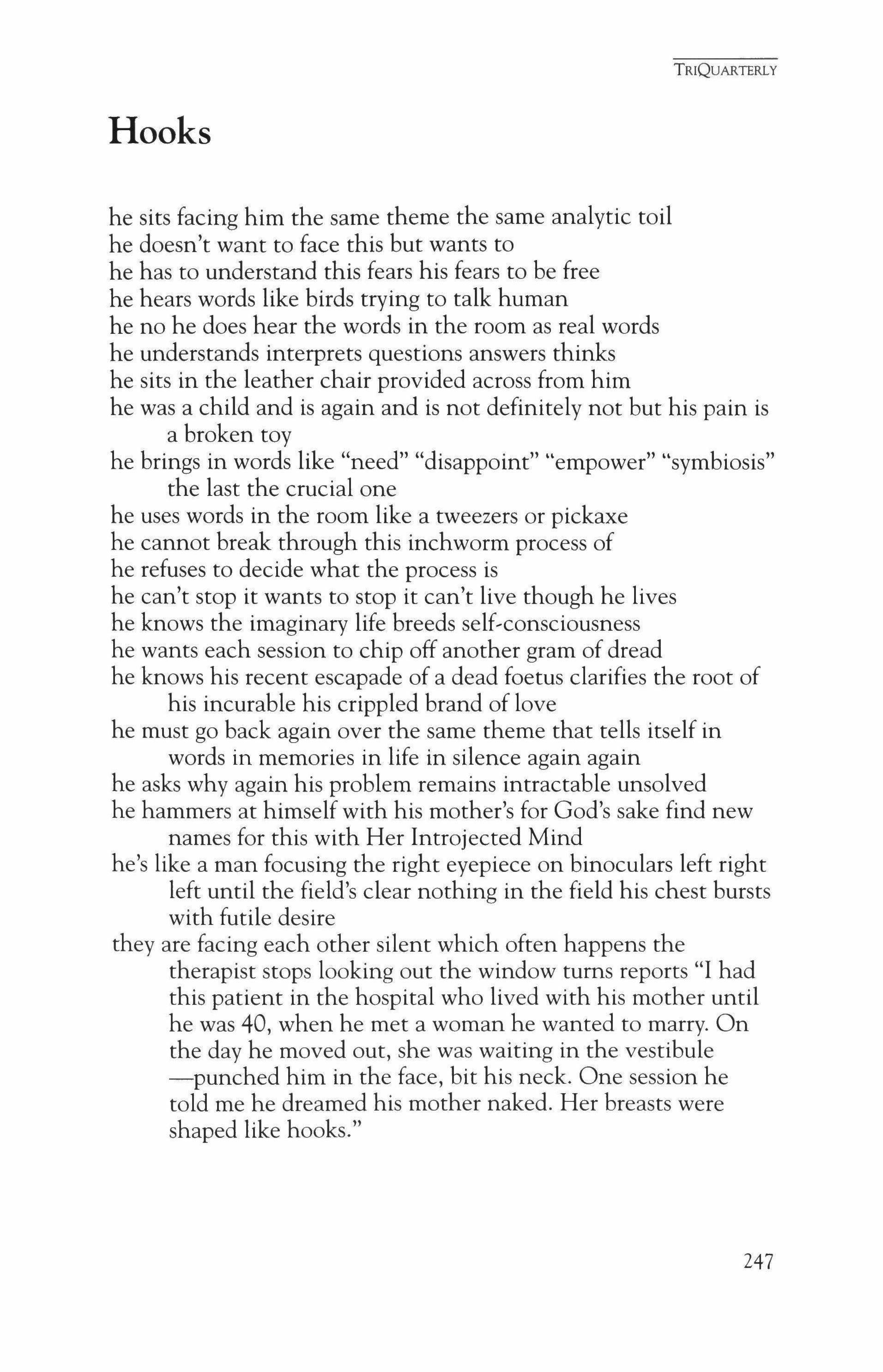
he sits facing him the same theme the same analytic toil he doesn't want to face this but wants to he has to understand this fears his fears to be free he hears words like birds trying to talk human he no he does hear the words in the room as real words he understands interprets questions answers thinks he sits in the leather chair provided across from him he was a child and is again and is not definitely not but his pain is a broken toy he brings in words like "need" "disappoint" "empower" "symbiosis" the last the crucial one he uses words in the room like a tweezers or pickaxe he cannot break through this inchworm process of he refuses to decide what the process is he can't stop it wants to stop it can't live though he lives he knows the imaginary life breeds self-consciousness he wants each session to chip off another gram of dread he knows his recent escapade of a dead foetus clarifies the root of his incurable his crippled brand of love he must go back again over the same theme that tells itself in words in memories in life in silence again again he asks why again his problem remains intractable unsolved he hammers at himself with his mother's for God's sake find new names for this with Her Introjected Mind he's like a man focusing the right eyepiece on binoculars left right left until the field's clear nothing in the field his chest bursts with futile desire they are facing each other silent which often happens the therapist stops looking out the window turns reports "I had this patient in the hospital who lived with his mother until he was 40, when he met a woman he wanted to marry. On the day he moved out, she was waiting in the vestibule -punched him in the face, bit his neck. One session he told me he dreamed his mother naked. Her breasts were shaped like hooks."
TRIQUARTERLY
247
Windows
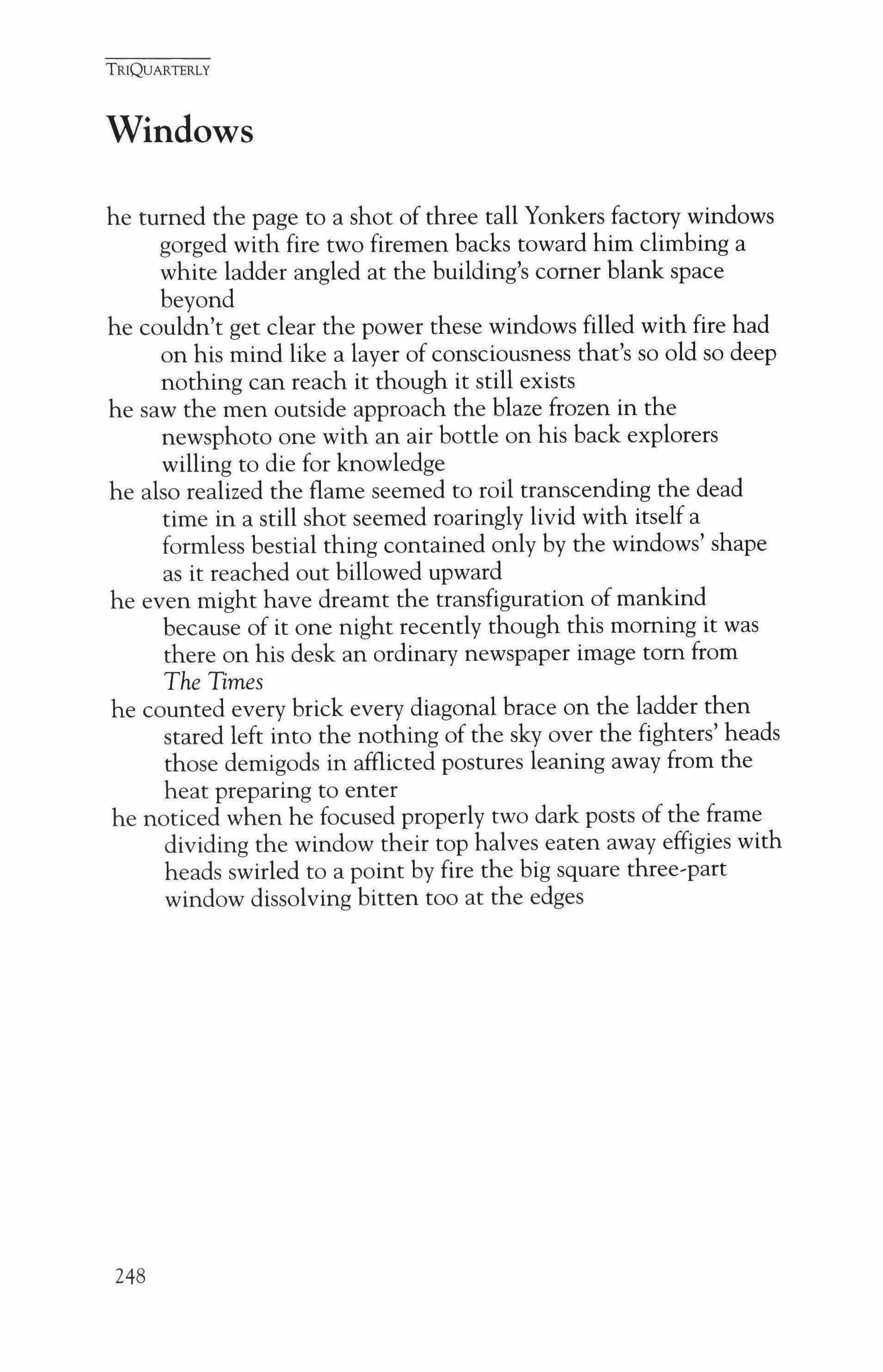
he turned the page to a shot of three tall Yonkers factory windows gorged with fire two firemen backs toward him climbing a white ladder angled at the building's corner blank space beyond he couldn't get clear the power these windows filled with fire had on his mind like a layer of consciousness that's so old so deep nothing can reach it though it still exists he saw the men outside approach the blaze frozen in the newsphoto one with an air bottle on his back explorers willing to die for knowledge he also realized the flame seemed to roil transcending the dead time in a still shot seemed roaringly livid with itself a formless bestial thing contained only by the windows' shape as it reached out billowed upward he even might have dreamt the transfiguration of mankind because of it one night recently though this morning it was there on his desk an ordinary newspaper image torn from The Times he counted every brick every diagonal brace on the ladder then stared left into the nothing of the sky over the fighters' heads those demigods in afflicted postures leaning away from the heat preparing to enter he noticed when he focused properly two dark posts of the frame dividing the window their top halves eaten away effigies with heads swirled to a point by fire the big square three,part window dissolving bitten too at the edges
TRIQUARTERLY
248


Contributors

A native of Cardiff, Wales, Dannie Abse published his first book of poems in 1948 while he was a medical student. He has published nine more volumes of poems in the United Kingdom, as well as a Selected Poems (u. K.: Penguin, 1994). His books available in the u.s. include a book of poems,White Coal, Purple Coat (Persea Books, 1989), and a collection of prose, Intermittent Journals (Dufour Editions, 1995). A poem of his appeared in TQ #67. *** Angela Jackson's collections of poems include Dark Legs and Silk Kisses: The Beatitudes of the Spinners (TriQuarterly Books, 1993), Voo Doo/Love Magic (Third World Press, 1974), The Greenville Club, in Four Black Poets (BookMark Press, 1978) and The Man with the White Liver, in Contact II (1985, 1987). Other sections of her novel, Treemont Stone, have appeared in TQ #60, #65 and #74. She teaches at Howard University. *** Martha Stephens teaches modem literature at the University of Cincinnati and is active in movements for social change in Ohio and Central America. Her second novel, Children of the World (Southern Methodist University Press, 1994), is set in a working-class community in South Georgia, where she grew up. *** Leon Rooke's novels include A Good Baby (1990), Shakespeare's Dog (1983) and A Fat Woman (1981), all published by Knopf. He is the author of several short-story collections, and his stories have appeared in TQ #68 and #78. *** Maria Flook teaches in the Bennington Writing Seminars and is the author of two novels, Open Water (1995) and Family Night (1993), both published by Pantheon; a paperback edition of Open Water is due this fall from Ecco Press. Her story "Prince of Motown" is part of Rhode Island Fish Company, which is 251
TruQUARTERLY
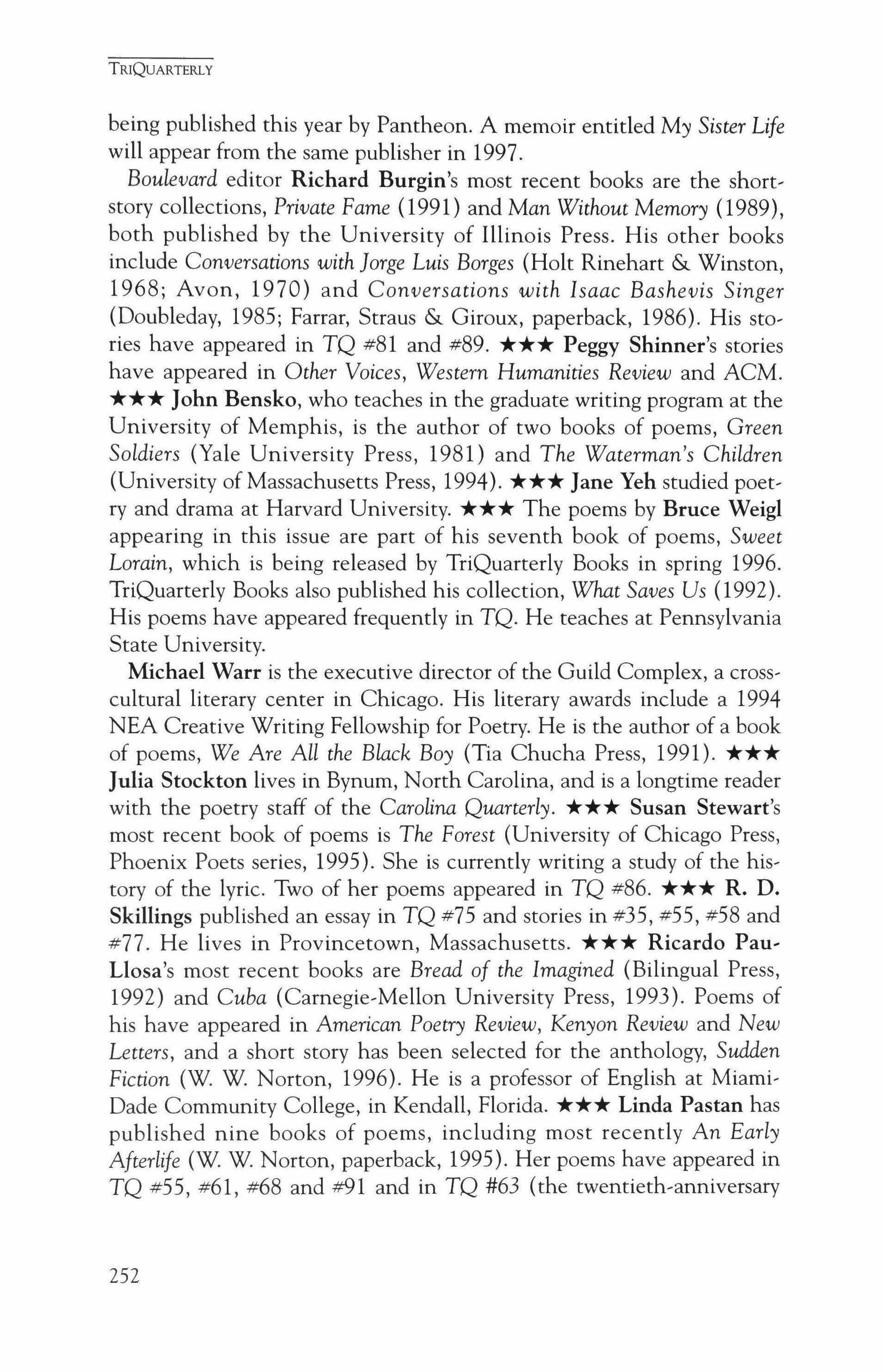
being published this year by Pantheon. A memoir entitled My Sister Life will appear from the same publisher in 1997.
Boulevard editor Richard Burgin's most recent books are the shortstory collections, Private Fame (1991) and Man Without Memory (1989), both published by the University of Illinois Press. His other books include Conversations with Jorge Luis Borges (Holt Rinehart & Winston, 1968; Avon, 1970) and Conversations with Isaac Bashevis Singer (Doubleday, 1985; Farrar, Straus & Giroux, paperback, 1986). His stories have appeared in TQ #81 and #89. *** Peggy Shinner's stories have appeared in Other Voices, Western Humanities Review and ACM. *** John Bensko, who teaches in the graduate writing program at the University of Memphis, is the author of two books of poems, Green Soldiers (Yale University Press, 1981) and The Waterman's Children (University of Massachusetts Press, 1994). *** Jane Yeh studied poetry and drama at Harvard University. *** The poems by Bruce Weigl appearing in this issue are part of his seventh book of poems, Sweet Lorain, which is being released by TriQuarterly Books in spring 1996. TriQuarterly Books also published his collection, What Saves Us (1992). His poems have appeared frequently in TQ. He teaches at Pennsylvania State University.
Michael Warr is the executive director of the Guild Complex, a crosscultural literary center in Chicago. His literary awards include a 1994 NEA Creative Writing Fellowship for Poetry. He is the author of a book of poems, We Are All the Black Boy (Tia Chucha Press, 1991). *** Julia Stockton lives in Bynum, North Carolina, and is a longtime reader with the poetry staff of the Carolina Quarterly. *** Susan Stewart's most recent book of poems is The Forest (University of Chicago Press, Phoenix Poets series, 1995). She is currently writing a study of the history of the lyric. Two of her poems appeared in TQ #86. *** R. D. Skillings published an essay in TQ #75 and stories in #35, #55, #58 and #77. He lives in Provincetown, Massachusetts. *** Ricardo PauLlosa's most recent books are Bread of the Imagined (Bilingual Press, 1992) and Cuba (Carnegie-Mellon University Press, 1993). Poems of his have appeared in American Poetry Review, Kenyon Review and New Letters, and a short story has been selected for the anthology, Sudden Fiction (W. W. Norton, 1996). He is a professor of English at MiamiDade Community College, in Kendall, Florida. *** Linda Pastan has published nine books of poems, including most recently An Early Afterlife (W. W. Norton, paperback, 1995). Her poems have appeared in TQ #55, #61, #68 and #91 and in TQ #63 (the twentieth-anniversary
TRIQUARTERLY
252
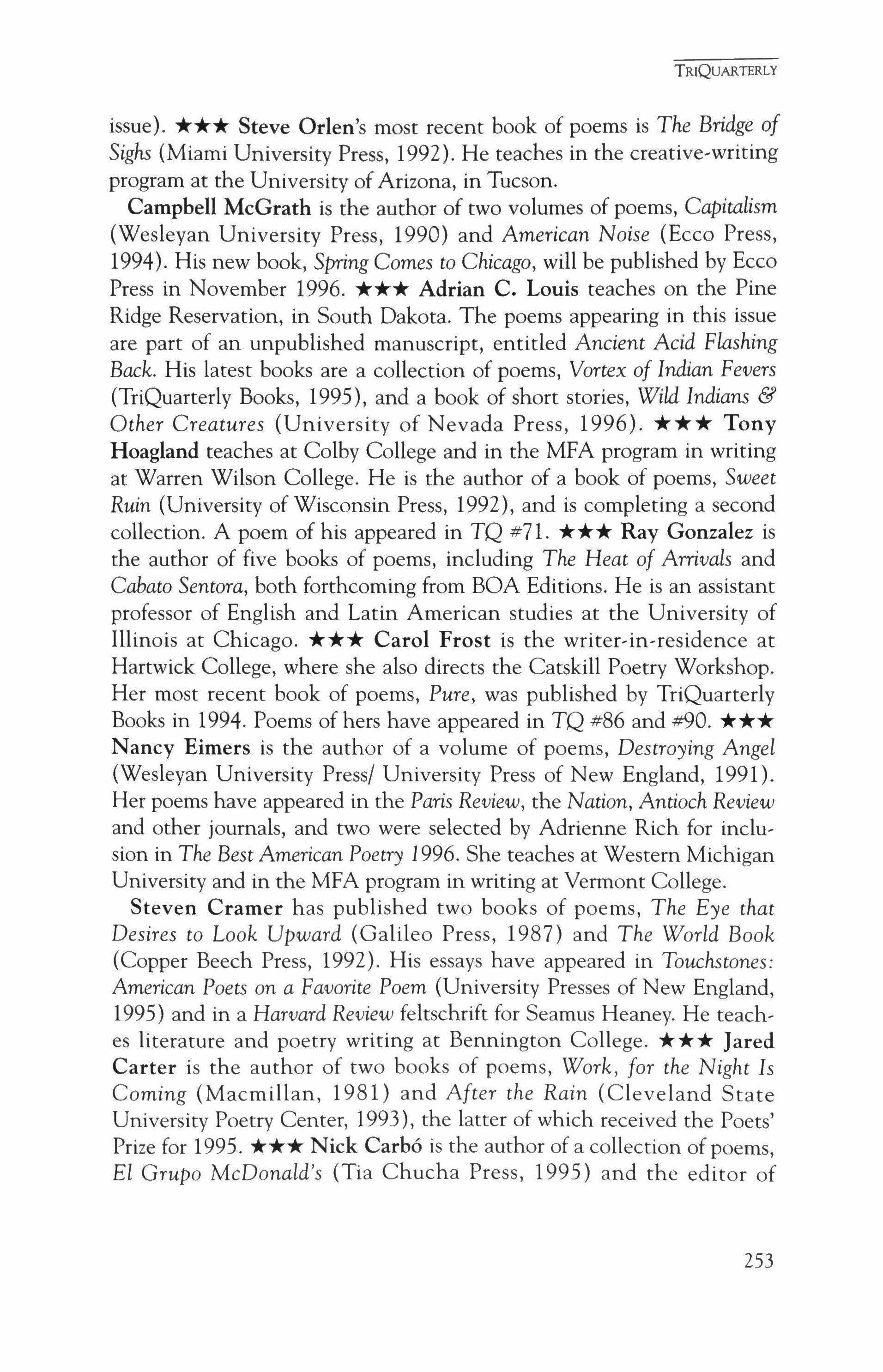
issue}. *** Steve Orlen's most recent book of poems is The Bridge of Sighs (Miami University Press, 1992). He teaches in the creative-writing program at the University of Arizona, in Tucson.
Campbell McGrath is the author of two volumes of poems, Capitalism (Wesleyan University Press, 1990) and American Noise (Ecco Press, 1994). His new book, Spring Comes to Chicago, will be published by Ecco Press in November 1996. *** Adrian C. Louis teaches on the Pine Ridge Reservation, in South Dakota. The poems appearing in this issue are part of an unpublished manuscript, entitled Ancient Acid Flashing Back. His latest books are a collection of poems, Vortex of Indian Fevers (TriQuarterly Books, 1995), and a book of short stories, Wild Indians & Other Creatures (University of Nevada Press, 1996). *** Tony Hoagland teaches at Colby College and in the MFA program in writing at Warren Wilson College. He is the author of a book of poems, Sweet Ruin (University of Wisconsin Press, 1992), and is completing a second collection. A poem of his appeared in TQ #71. *** Ray Gonzalez is the author of five books of poems, including The Heat of Arrivals and Cabato Sentora, both forthcoming from BOA Editions. He is an assistant professor of English and Latin American studies at the University of Illinois at Chicago. *** Carol Frost is the writer-in-residence at Hartwick College, where she also directs the Catskill Poetry Workshop. Her most recent book of poems, Pure, was published by TriQuarterly Books in 1994. Poems of hers have appeared in TQ #86 and #90. *** Nancy Eimers is the author of a volume of poems, Destroying Angel (Wesleyan University Press/ University Press of New England, 1991). Her poems have appeared in the Paris Review, the Nation, Antioch Review and other journals, and two were selected by Adrienne Rich for inclusion in The Best American Poetry 1996. She teaches at Western Michigan University and in the MFA program in writing at Vermont College. Steven Cramer has published two books of poems, The Eye that Desires to Look Upward (Galileo Press, 1987) and The World Book (Copper Beech Press, 1992). His essays have appeared in Touchstones: American Poets on a Favorite Poem (University Presses of New England, 1995) and in a Harvard Review feltschrift for Seamus Heaney. He teaches literature and poetry writing at Bennington College. *** Jared Carter is the author of two books of poems, Work, for the Night Is Coming (Macmillan, 1981) and After the Rain (Cleveland State University Poetry Center, 1993), the latter of which received the Poets' Prize for 1995. *** Nick Carbo is the author of a collection of poems, El Grupo McDonald's (Tia Chucha Press, 1995) and the editor of
TRIQUARTERLY
253
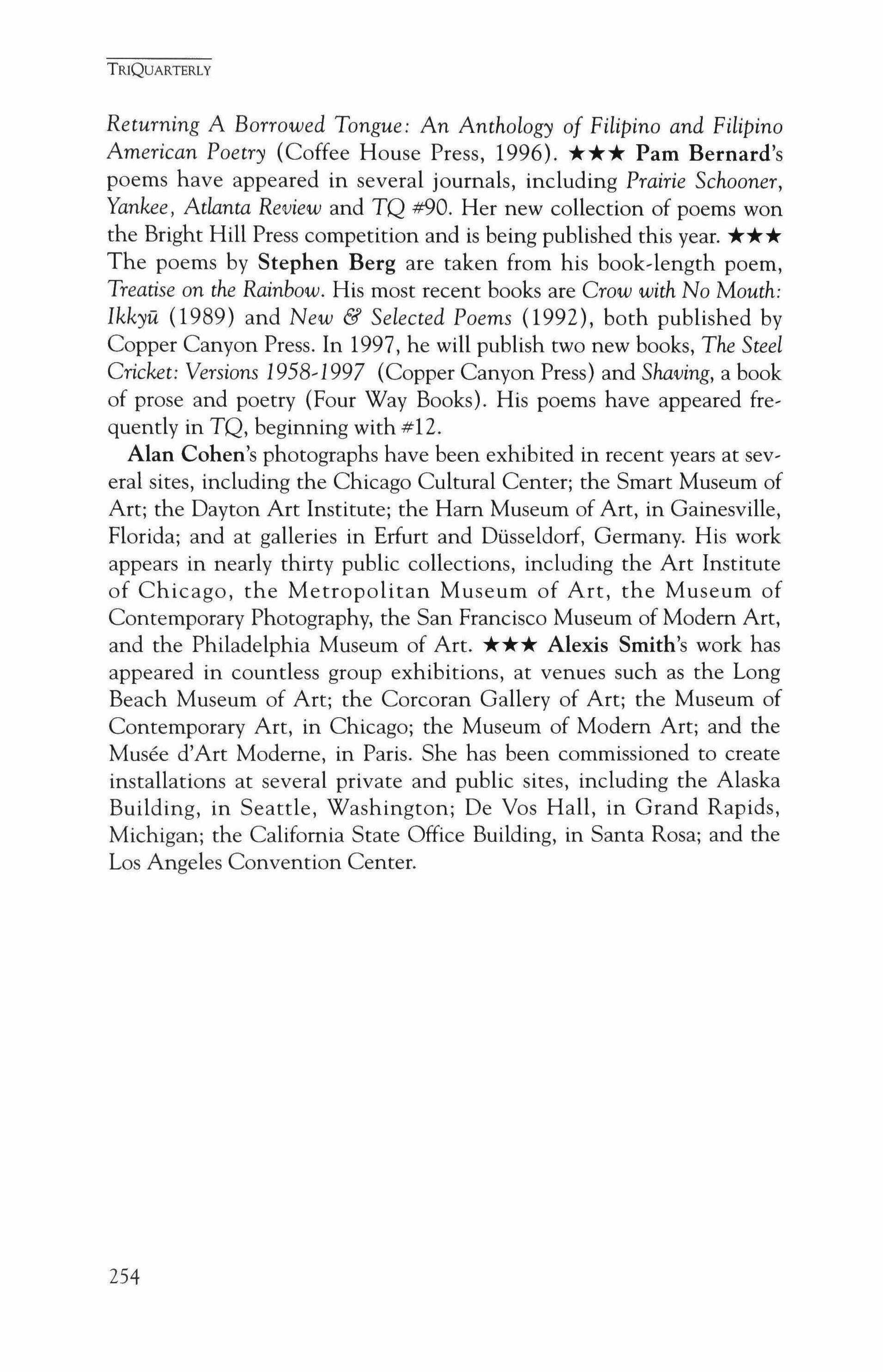
Returning A Borrowed Tongue: An Anthology of Filipino and Filipino American Poetry (Coffee House Press, 1996). *** Pam Bernard's poems have appeared in several journals, including Prairie Schooner, Yankee, Atlanta Review and TQ #90. Her new collection of poems won the Bright Hill Press competition and is being published this year. *** The poems by Stephen Berg are taken from his book,length poem, Treatise on the Rainbow. His most recent books are Crow with No Mouth: Ikkyu (1989) and New & Selected Poems (1992), both published by Copper Canyon Press. In 1997, he will publish two new books, The Steel Cricket: Versions 1958�1997 (Copper Canyon Press) and Shaving, a book of prose and poetry (Four Way Books). His poems have appeared frequently in TQ, beginning with #12.
Alan Cohen's photographs have been exhibited in recent years at several sites, including the Chicago Cultural Center; the Smart Museum of Art; the Dayton Art Institute; the Ham Museum of Art, in Gainesville, Florida; and at galleries in Erfurt and Dusseldorf, Germany. His work appears in nearly thirty public collections, including the Art Institute of Chicago, the Metropolitan Museum of Art, the Museum of Contemporary Photography, the San Francisco Museum of Modem Art, and the Philadelphia Museum of Art. *** Alexis Smith's work has appeared in countless group exhibitions, at venues such as the Long Beach Museum of Art; the Corcoran Gallery of Art; the Museum of Contemporary Art, in Chicago; the Museum of Modem Art; and the Musee d'Art Moderne, in Paris. She has been commissioned to create installations at several private and public sites, including the Alaska Building, in Seattle, Washington; De Vos Hall, in Grand Rapids, Michigan; the California State Office Building, in Santa Rosa; and the Los Angeles Convention Center.
TRIQUARTERLY
254
SPRING 1996
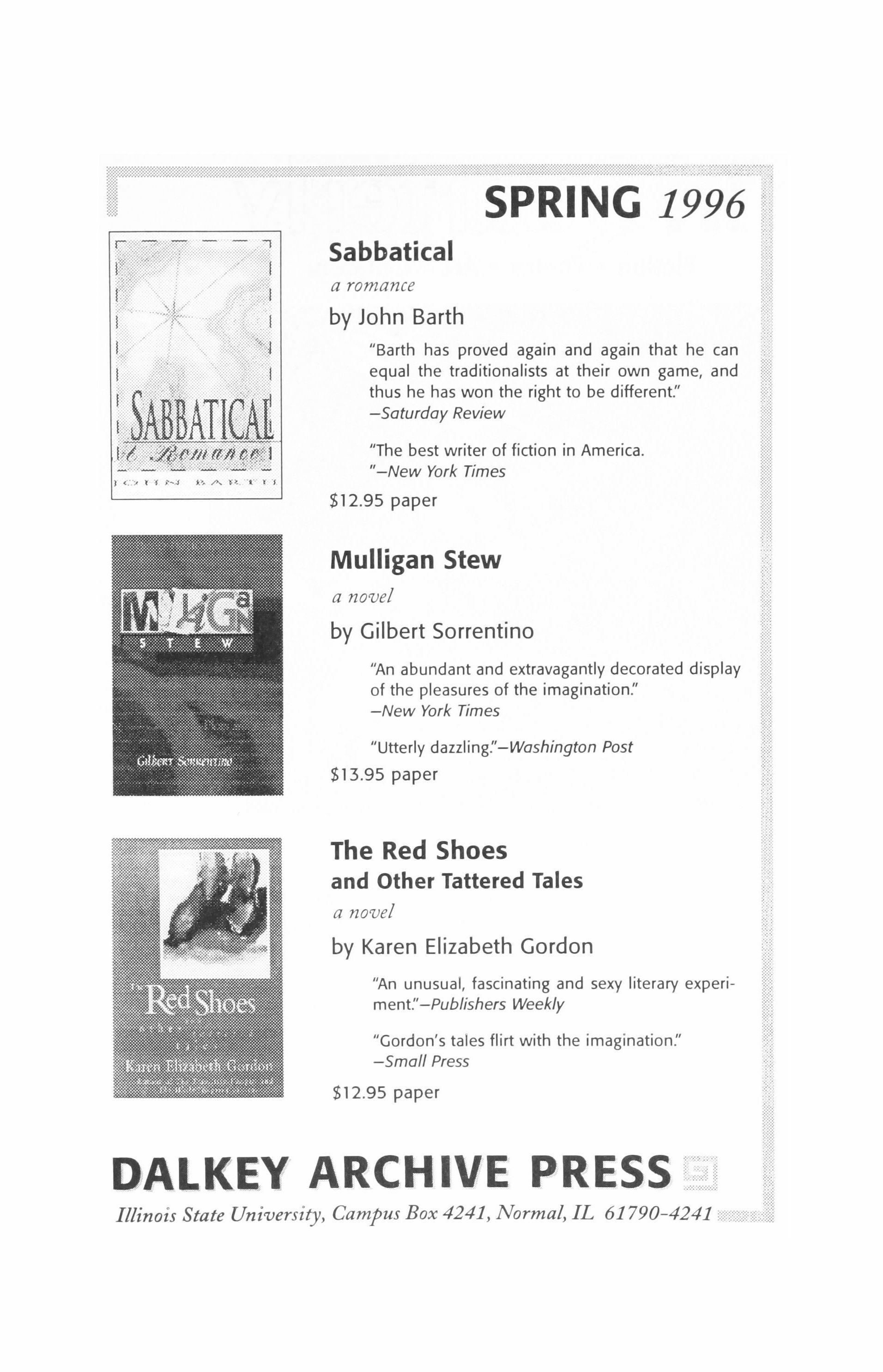
Sabbatical a romance
by John Barth
"Barth has proved again and again that he can equal the traditionalists at their own game, and thus he has won the right to be different" -Saturday Review
"The best writer of fiction in America. "<-New York Times
$12.95 paper
Mulligan Stew a novel
by Gilbert Sorrentino
"An abundant and extravagantly decorated display of the pleasures of the imagination:' -New York Times
"Utterly dazzling:'-Washington Post
$13.95 paper
The Red Shoes and Other Tattered Tales a novel
by Karen Elizabeth Gordon
"An unusual, fascinating and sexy literary experimenf'-Publishers Weekly
"Gordon's tales flirt with the imagination:' -Small Press
$12.95 paper
DALKEY
Illinois State University, Campus Box 4241, Normal, IL 61790-4241
ARCH IVE PRESS
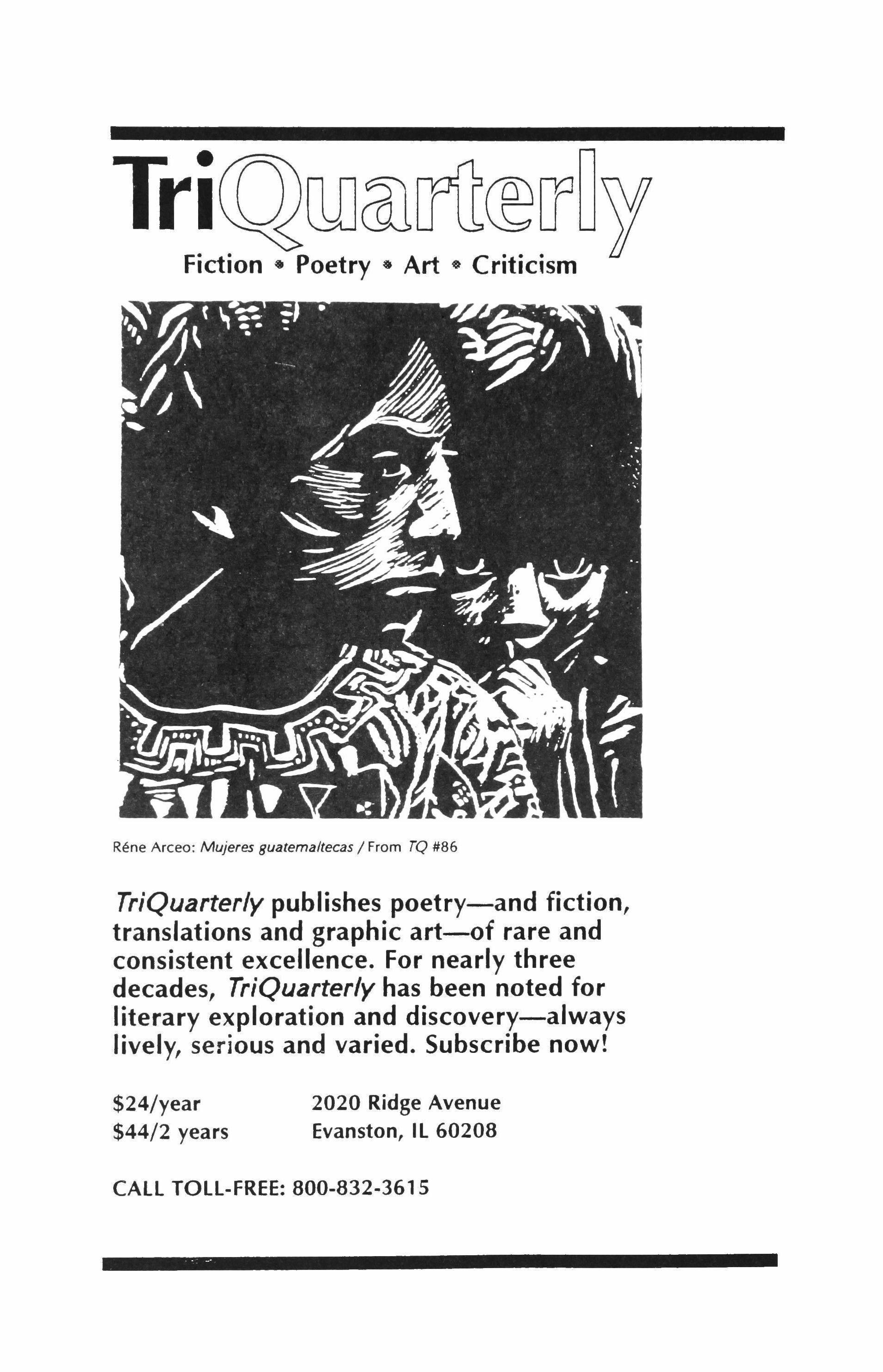
TriC02M@ITiIce[f�y
Art
Criticism
Fiction Poetry
•
TriQuarterly publishes poetry-and fiction, translations and graphic art-of rare and consistent excellence. For nearly three decades, TriQuarterly has been noted for literary exploration and discovery-always lively, serious and varied. Subscribe now! $24/year $44/2 years 2020 Ridge Avenue Evanston, I L 60208 CALL TOLL-FREE: 800-832-3615
Rene Arceo: Mujeres guetemelteces I From TQ #86
Advisory Editors

Former Contributors
coast
Stuart Dybek
Nancy Eimers
Jaimy Gordon
Kim Addonizio
Anthony Bukoski
Mark Cox
David Clewell
Alison Hawthorne Deming
Denise Duhamel
Anne Finger
Alice Fogel
Greg Glazner
Edward Hirsch
Lynda Hull
Richard Jackson
Subscription orders
"A lively literary magazine on the rise."
-Ronald Spatz, Editor, Almka Quarterly Review
"The journal looks wonderful-both its content and design. The fiction is very fresh, and at the same time polished-a more exciting selection than I've seen in a journal in a while."
-Debra Monroe, author of A Wild, Co/J State, New Fangled, and The Source ofTrouble
Mark Halliday
William Olsen
Herbert Scott
Lisa Lewis
Rick Lyon
Michael Martone
Kate McCorkle
Alane Rollings
David Rivard
Leon Rooke
Maura Stanton
Jean Thompson
Roger Weingarren
Dean Young and many others
Please send subscription orders:
Attention Business Manager
Third Coast, Department of English Western Michigan Universiry Kalamazoo, MI 49008-5092
Rates are as follows:
Sample Copy: $6
One Year Subscription/Two Issues: $11
Two Year Subscription/Four Issues: $20
Three Year Subscription/Six Issues: $29
Please include your address and telephone number with your check or money order.
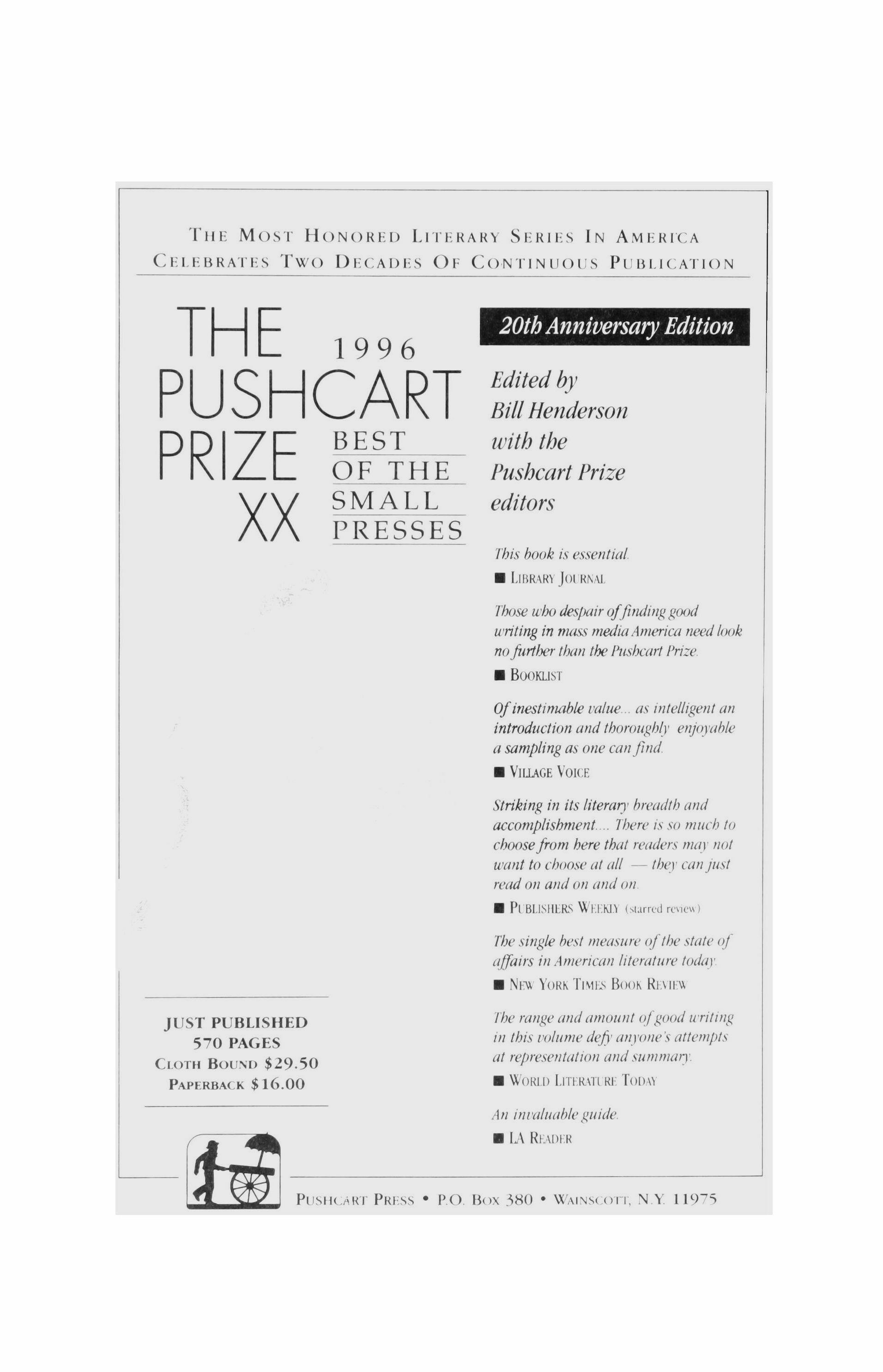
THE PUSHCART PRIZE
20thAnniversary Edition
Edited by Bill Henderson with the Pushcart
Prize editors
This book is essential.
• LIIlRAR\ JOl HMI.
Those who despairoffindinggood uriting in mass media America need look nofurtber than the Pushcart Pri:e.
• BOOKlJST
Ofinestimable mille as intelligent an introduction and tborougblv enjoyable a sampling as aile canfind.
• VIUAGE VOICE
Striking i71 its iiterary breadth and accomplishment
There is so much to choosefrom here that readers mav IIOt wall! to choose lit att - tbev can just read all and all and Oil
• Pl BLlSII�RS Wu:hJ.\ (".trred review)
The single best measure oftbe state of affairs ill American literature today
• NE\\ YORI\ TI\II.' Boos RI.IIFII
The range and (1111 alllit ofgood lailillg ill this iolume defy anyone's attempts (It representation and summary.
• WORLD LITI RITl RI' TOll 1\
All inratuableguide.
.LARIJlllIH
T J-I E M 0 S THo NOR E D LIT ERA H Y S E HIE SIN A M E HlC A CELEBRATES Two DECADES OF CONTINUOUS PUBLICATION
XX JUST PUBLISHED 570 PAGES CLOTH 80U;\;D $29.50 PAPERBACK $16.00 1996 BEST OF THE SMALL PRESSES
�
l.l..mJ Pll�IICIlRI PI\f.s� PO Box 380 WAIN,( on. NY 1197'5
BlackWarriorReview
Rita Doue
Gerald Stern
GregPape
Suphm Dobyns
Thomas Rabbitt
Christoph�rBuckky
Dara Wi�r
MarkJarman
Cbas« Twich�ll
Marc Straus
Joy Williams
Radney[one: RichardJackson
Andre Dubus

Publishing the finest fiction, poetry, and essays since 1974, and featuring the BWR chapbook series.
One of the "19 Magazines That Matter" - Writers Digest the Black warrior Review has become one of our few indispensable literary magazines." - William Matthews
TonyArdizeane
Beckian Fritz Goldb"g
Mark CosulkJ
Alison Baker
Sharon Sbeehe Stark
Brendan Galvin
Alan Cbeus«
GarySoto
[orie Graham
Marjorie Sandor
Albert Goldbarth
John Taggart
BuhNugmt
Karen Graffeo
Sample copy $6, one year subscription $u
Box 2936 Tuscaloosa, Alabama 35486 2°5.348.4518 Distributed by Ingram Periodicals
P.O.
What is THE THREEPENNY REVIEW?
� ITS WRITERS:
John Berger, Paul Bowles, Lars Eighner, Louise Gluck, Nadine Gordimer, Thorn Gunn, Elizabeth Hardwick, Diane Johnson, Tony Kushner, Leonard Michaels, Czeslaw Milosz, Robert Pinsky, Luc Sante, Vikram Seth, Susan Sontag, Amy Tan, Gore Vidal.
� ITS READERS:
"The Threepenny Review continues to be one of the brightest, liveliest, most intelligent and culturally alert journals in the country. It's one of the very few magazines that give one the feeling that there really is a conversation going on in this country about the arts and about ideas. I always read it with pleasure."
-Robert Hass
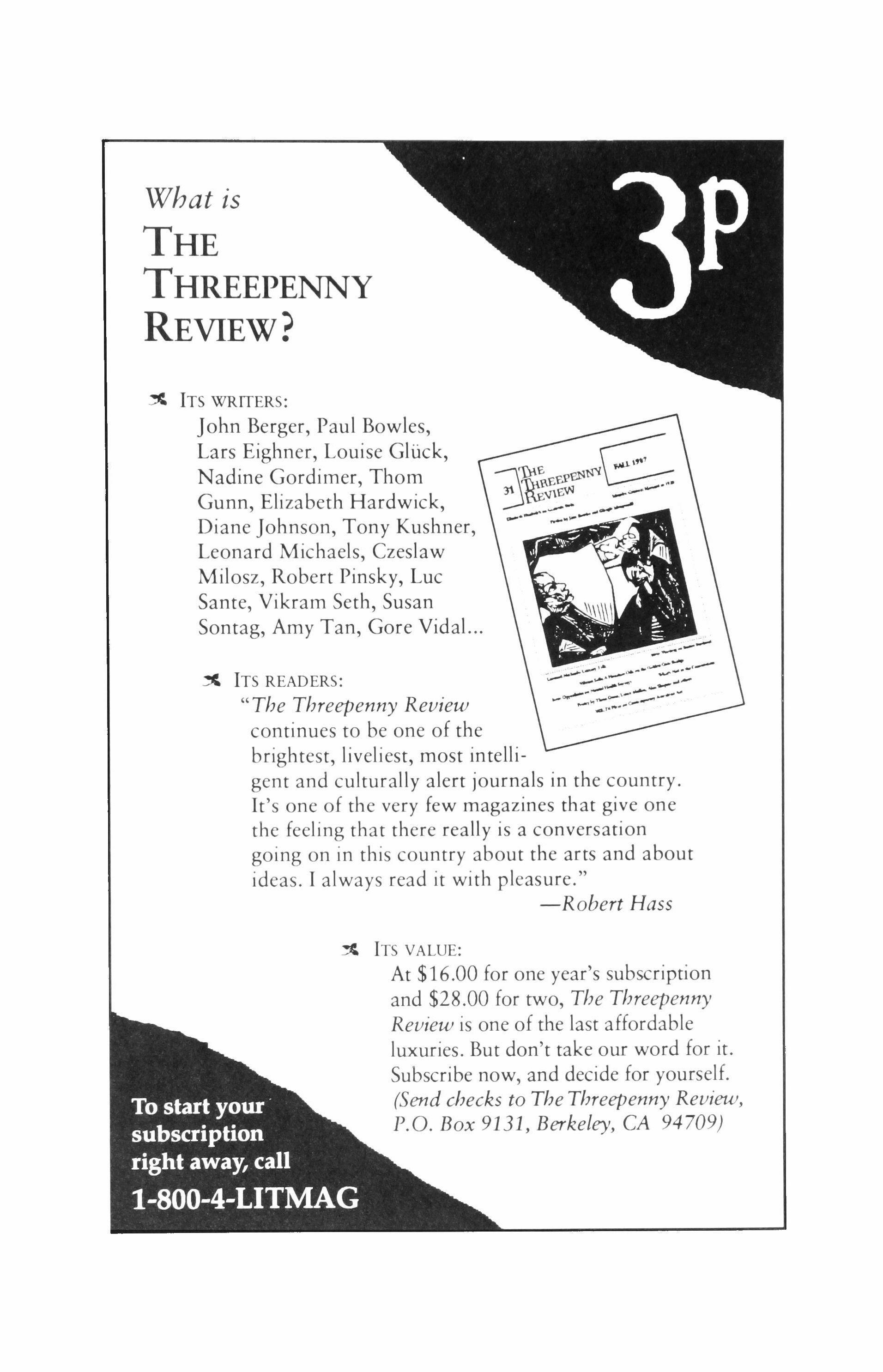
� ITS VALUE:
At $16.00 for one year's subscription and $28.00 for two, The Threepenny Review is one of the last affordable luxuries. But don't take our word for it. Subscribe now, and decide for yourself. (Send checks to The Threepenny Review, P.O. Box 9131, Berkeley, CA 94709)
To start your subscription right away, call 1-800-4-LITMAG
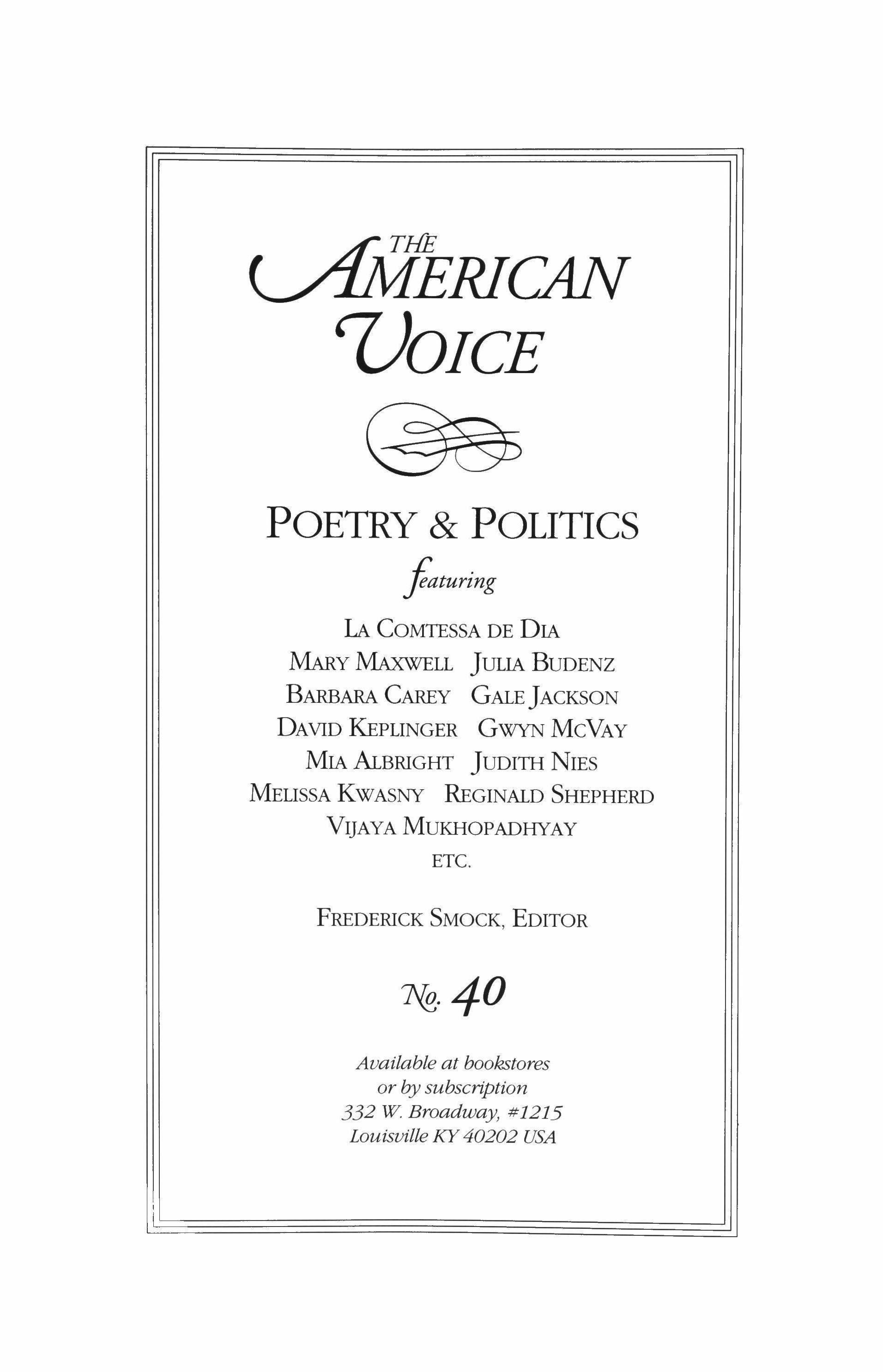
POETRY & POLITICS
jaturing
LA COMTESSA DE DIA
MARy MAxwELL JULIA BUDENZ
BARBARA CAREY GALEJACKSON
DAVID KEPLINGER GWYN MCVAY
MIA ALBRIGHT JUDITH NIES
MELISSA KWASNY REGINALD SHEPHERD VIJAYA MUKHOPADHYAY
ETC.
FREDERICK SMOCK, EDITOR
.i
@&
tAMERICAN VOICE
1X£·40 Available at bookstores or bysubscription 332 W Broadway, #1215 Louisville KY 40202 USA
Announcing the Master of Fine Arts in Writing
at the School ofthe Art Institute of Chicago
Beginning in the fall of 1996, the Masters of Fine Arts in Writing program is designed for writers of fiction, poetry, scripts, and creative non-fiction, and the work of artists who use both image and text in their work. The program draws upon a distinguished faculty of writers, artists, and scholars with a diversity of artistic and intellectual concerns.
For further information: call 312. 899-5219 or 800. 232-7242 fax 312.899-1840 email admiss@artic.edu
Admissions
The School of the Art Institute of Chicago 37 South Wabash Avenue Chicago, Illinois 60603
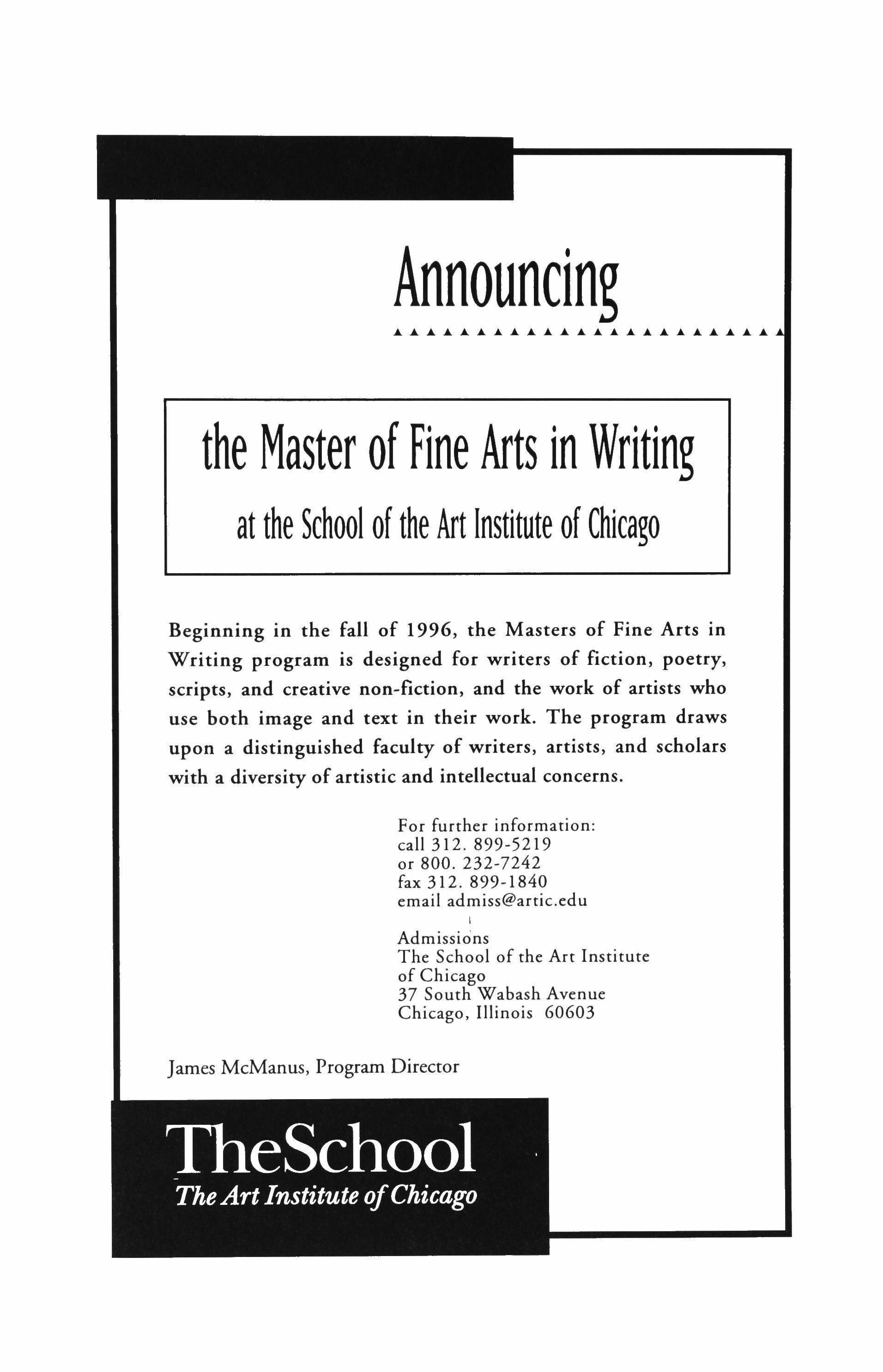 James
James
McManus, Program Director
Art
TheSchoolThe
Institute ofChicago
EPOCH
FICTION, POETRY, ESSAYS SINCE 1947
Zebra Mike gallops into Dutch rail station
ROTIERDII. \1. '\,)thcriamh tAP) Mal '. 1991 Dutch rail commutercoukln'r believe theu t'y'" when a zebra galh,ped mto til" -tauon mSlc'h.J of thetr monung tram. a zoo spokesman '3)
Vandals hrni,e into /d'H\ Mlk,,\ ,tl:lbk, at Bhjdorp Lon Tuevday an,i frightened the :?:'y"ar-old ammal '0 badly that 11 fumpcd a 6-fo()t-rugl1 telKe. spokesman Kuno Bhjenberg 'fml Wednesday.
Vltkc ran onto a nearby railway hue and "galloped a krlomerer (rrule) Of S() along the tracks, straurht mto (Rotterdam) Central Srauon." Blnenbera sald.
"You can', \,fly he wasn't noticed." he said.

PubliShed three times per year. Sample copy $5.00. One year subscription $11.00. Available from 251 Goldwin Smith Hall, Cornell University, Ithaca, NY 14853-3201
"You Can't Say He Wasn't Noticed" (from The Annunciation Series) 1992,53/13" X 5 3/8" X 7/8", mixed media, by Emoretta Yang Morris
SHENANDOAH
THE WASHINGTON AND LEE UNIVERSITY REVIEW
Betty Adcock
David Baker
Kathryn Stripling Byer
Hayden Carruth
Peter Cooley
Nicholas Delbanco
John Engels
Margaret Gibson
Eamon Grennan
Susan Hahn
Robin Hemley
Michael Longley
Kent Nelson
Mary Oliver
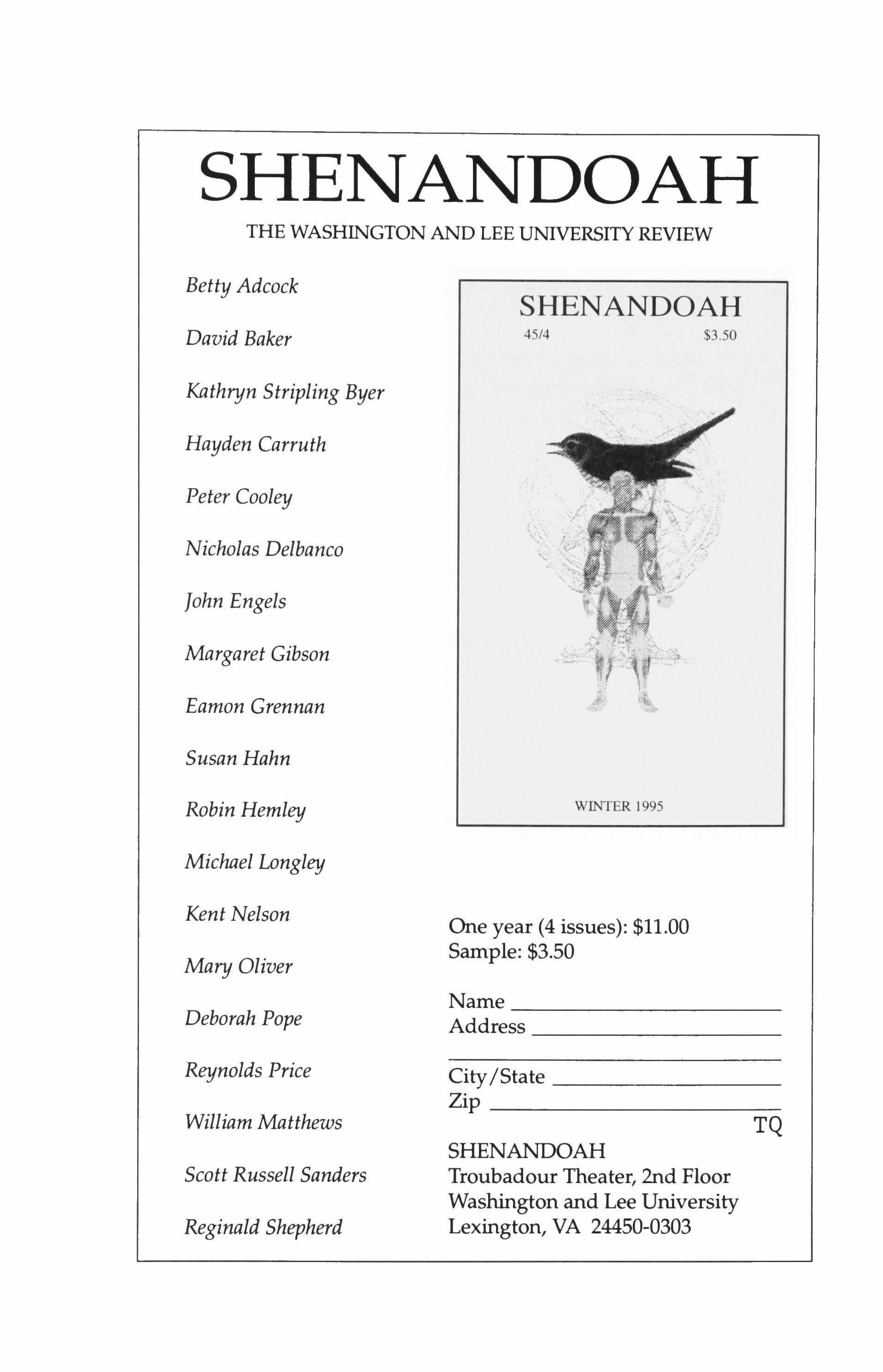
One year (4 issues): $11.00 Sample: $3.50
Deborah Pope Name Address
Reynolds Price
William Matthews
Scott Russell Sanders
Reginald Shepherd
City/State
Zip
SHENANDOAH
Troubadour Theater, 2nd Floor
Washington and Lee University Lexington, VA 24450-0303
SHENANDOAH 45/4 WINTER 1995
$3.50
TQ
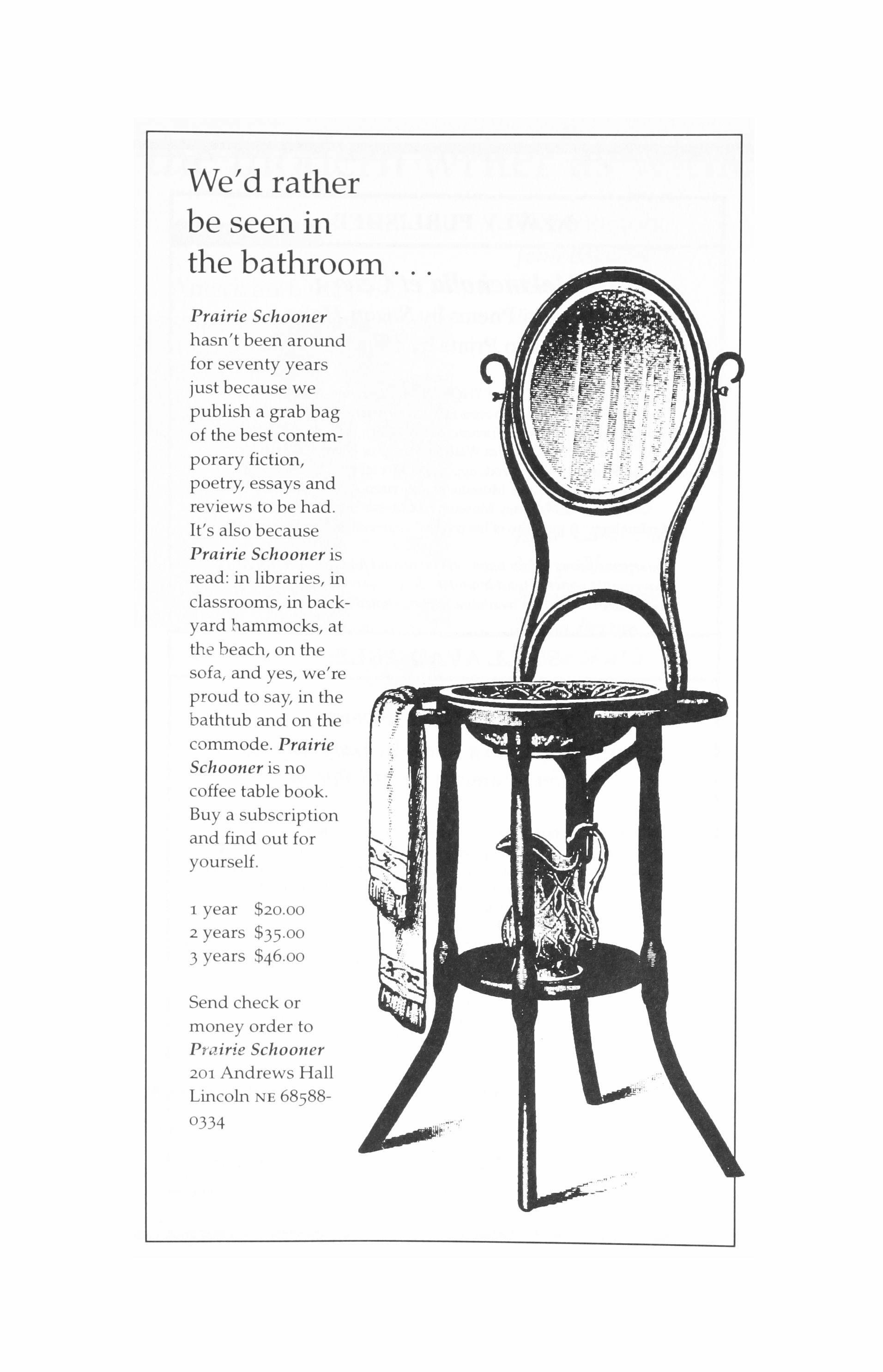
We'd rather be seen in the bathroom
Prairie Schooner hasn't been around for seventy years just because we publish a grab bag of the best contemporary fiction, poetry, essays and reviews to be had. It's also because Prairie Schooner is read: in libraries, in classrooms, in backyard hammocks, at the beach, on the sofa, and yes, we're proud to say, in the bathtub and on the commode. Prairie Schooner is no coffee table book.
Buy a subscription and find out for yourself.
1 year $20.00
2 years $35.00
3 years $46.00
Send check or money order to Prairie Schooner
201 Andrews Hall Lincoln NE 685880334
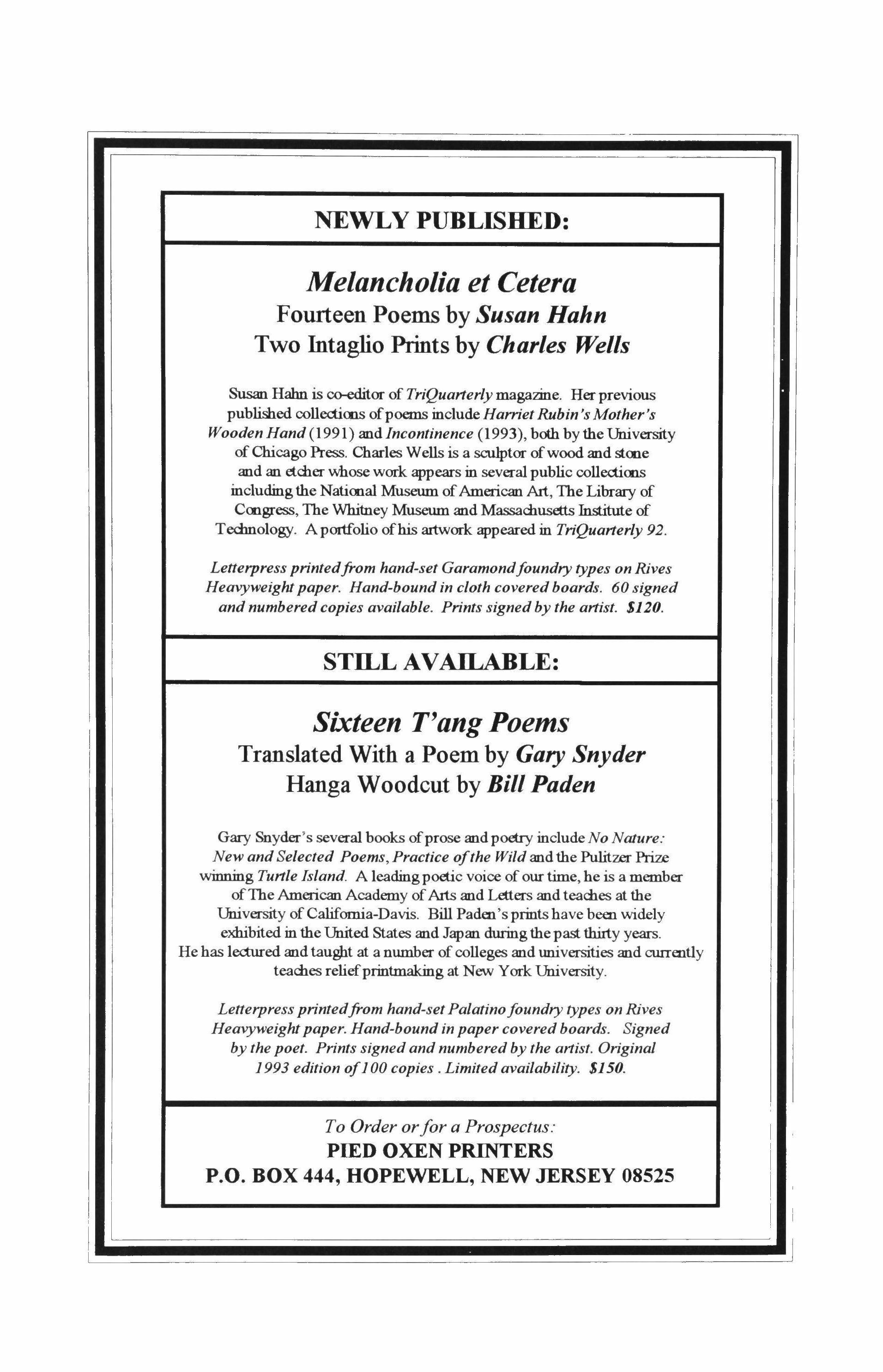
NEWLY PUBLISHED:
Melancholia et Cetera
Fourteen Poems by Susan Hahn
Two Intaglio Prints by Charles Wells
Susan Hahn is co-editor of TriQuarterlymagazine. Her previous published collections ofpoems include HarrietRubin's Mother's Wooden Hand (1991) and Incontinence (1993), both by the University of Chicago Press. Charles Wells is a sculptor ofwood and stoae and an etcher whose work appears in several public collections includingthe Natiooal Museum ofAmerican Art, The Library of Congress, The Whitney Museum and Massachusetts Institute of Technology. A portfolio ofhis artwork appeared in TriQuarterly 92.
Letterpressprintedfrom hand-set Garamondfoundry types on Rives Heavyweightpaper. Hand-bound in cloth covered boards. 60 signed and numbered copies available. Prints signedby the artist. S120.
STILL AVAILABLE:
Sixteen T'ang Poems
Translated With a Poem by Gary Snyder
Hanga
Woodcut by Bill Paden
Gary Snyder's several books ofprose and poetry include No Nature: New and Selected Poems, Practice ofthe Wild and the Pulitzer Prize winning Turtle Island. A leadingpoetic voice of our time, he is a member ofThe American Academy ofArts and Letters and teaches at the University of California-Davis. Bill Paden's prints have been widely exhibited in the United States and Japan during thepast thirty years. He has lectured andtaught at a number of colleges and universities and currently teaches reliefprintmaking at New York University.
Letterpressprintedfrom hand-setPalatinofoundry types on Rives Heavyweightpaper. Hand-bound in paper covered boards. Signed by the poet. Prints signed and numbered by the artist. Original 1993 edition of100 copies. Limited availability. S150.
To Order orfor a Prospectus: PIED OXEN PRINTERS
P.O. BOX 444, HOPEWELL, NEW JERSEY 08525
the modern writer as witness
American Cities
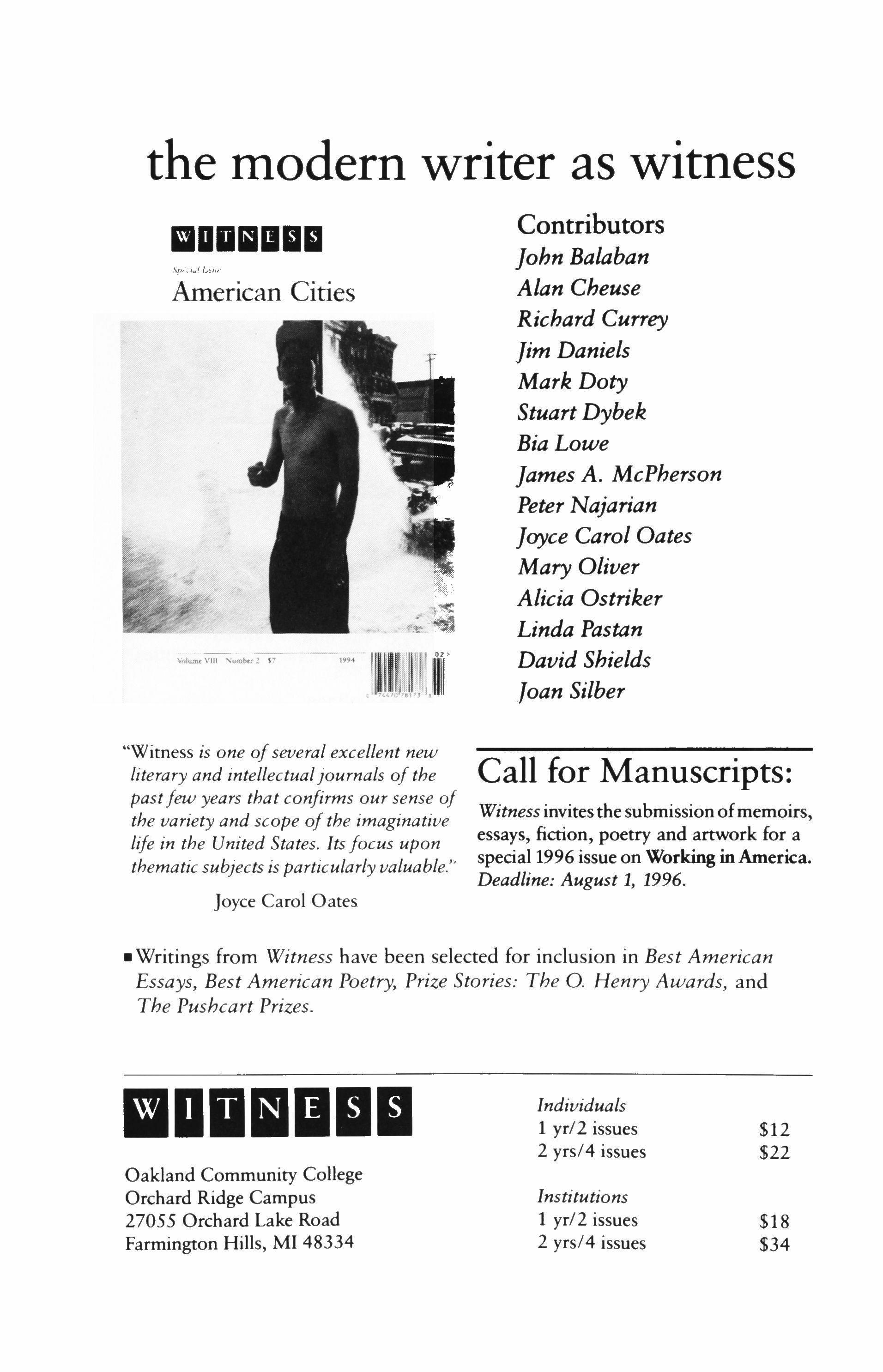
"Witness is one of several excellent new literary and intellectualjournals of the pastfew years that confirms our sense of the variety and scope of the imaginative life in the United States. Its focus upon thematic subjects is particularly valuable."
Joyce Carol Oates
Contributors
John Balaban
Alan Cheuse
Richard Currey
Jim Daniels
Mark Doty
Stuart Dybek
Bia Lowe
James A. McPherson
Peter Najarian
Joyce Carol Oates
Mary Oliver
Alicia Ostriker
Linda Pastan
David Shields
Joan Silber
Call for Manuscripts:
Witness invites the submissionofmemoirs, essays, fiction, poetry and artwork for a special 1996 issue on Working in America. Deadline: August 1, 1996,
• Writings from Witness have been selected for inclusion in Best American Essays, Best American Poetry, Prize Stories: The 0. Henry Awards, and The Pushcart Prizes.
1111111111.
II' '1' ",1,1
11111111111
27055
Farmington Hills,
48334 Individuals 1 yr/2 issues 2 yrs/4 issues $12 $22 Institutions 1 yr/2 issues 2 yrs/4 issues $18 $34
Oakland Community College Orchard Ridge Campus
Orchard Lake Road
MI
Where you can still hear people thinking for themselves
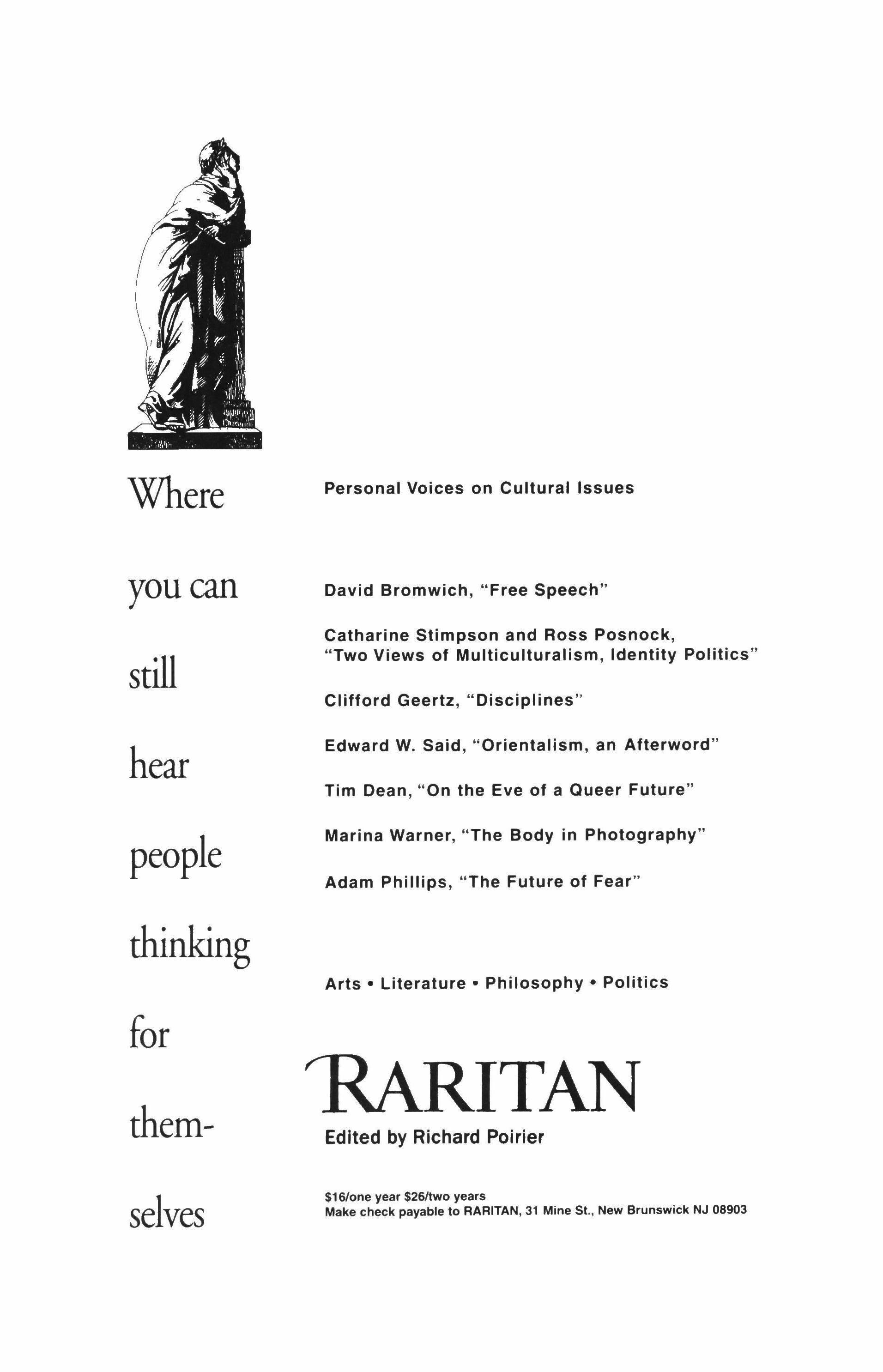
Personal Voices on Cultural Issues
David Bromwich, "Free Speech"
Catharine Stimpson and Ross Posnock, "Two Views of Multiculturalism, Identity Politics"
Clifford Geertz, "Disciplines"
Edward W. Said, "Orientalism, an Afterword"
Tim Dean, "On the Eve of a Queer Future"
Marina Warner, "The Body in Photography"
Adam Phillips, "The Future of Fear"
Arts· Literature· Philosophy· Politics
Edited by Richard Poirier
�RITAN
$l61one year $261two years Make check payable to RARITAN, 31 Mine St., New Brunswick NJ 08903
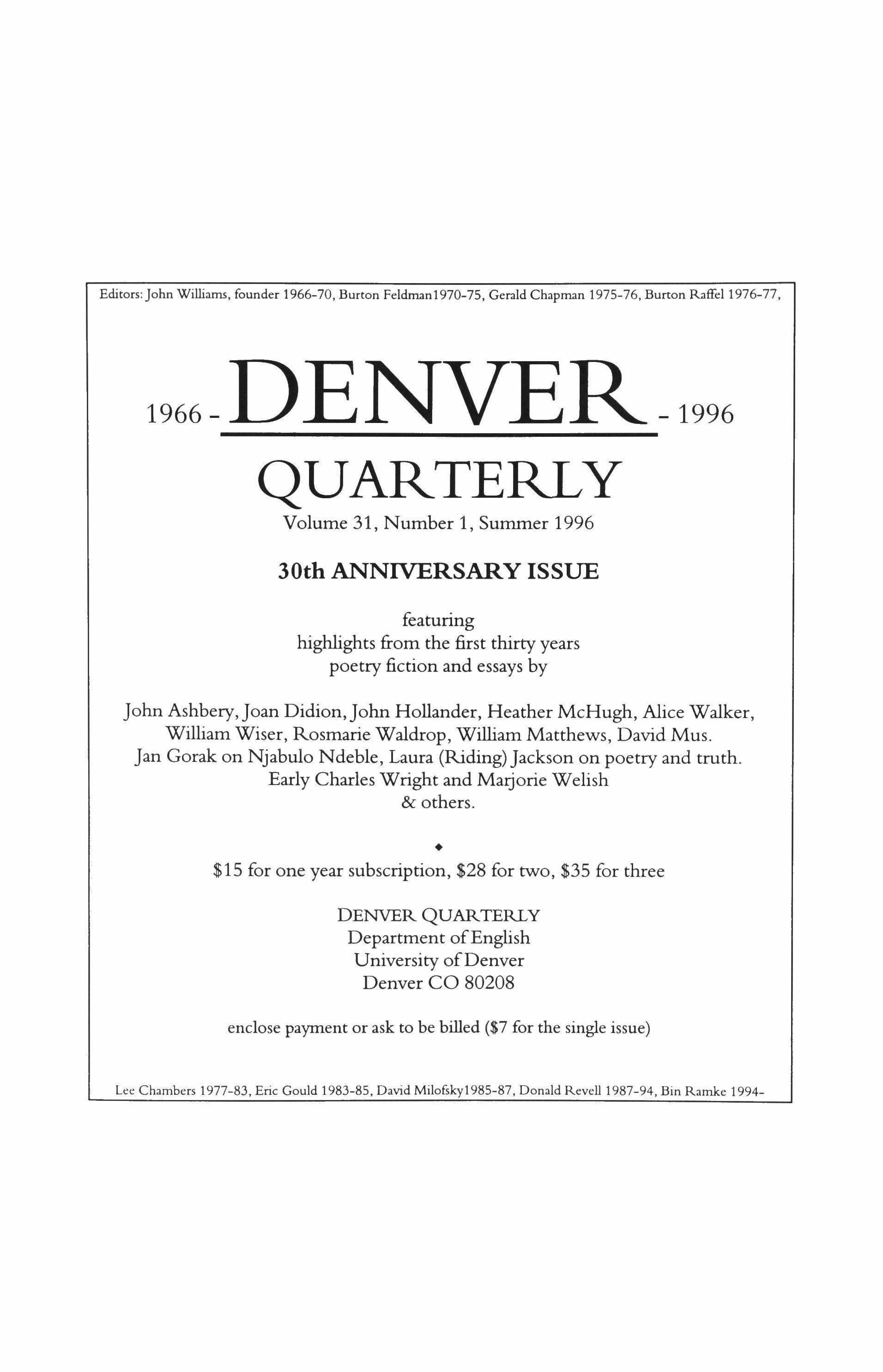
Editors: John Williams. founder 1966-70. Burton FeldmanI970-75. Gerald Chapman 1975-76. Burton Raffel 1976-77.
1966-DENVER -1996
QUARTERLY
Volume 31, Number 1, Summer 1996
30th ANNIVERSARY ISSUE
featuring highlights from the first thirty years poetry fiction and essays by John Ashbery,Joan Didion,John Hollander, Heather McHugh, Alice Walker, William Wiser, Rosmarie Waldrop, William Matthews, David Mus. Jan Gorak on Njabulo Ndeble, Laura (Riding)Jackson on poetry and truth. Early Charles Wright and Marjorie Welish & others
$15 for one year subscription, $28 for two, $35 for three
DENVER QUARTERLY Department ofEnglish University ofDenver Denver CO 80208 enclose payment or ask to be billed ($7 for the single issue)
Lee Chambers 1977-83. Eric Gould 1983-85. David MilofskyI985-87. Donald Revell 1987-94. Bin Ramke 1994-
continues to make history
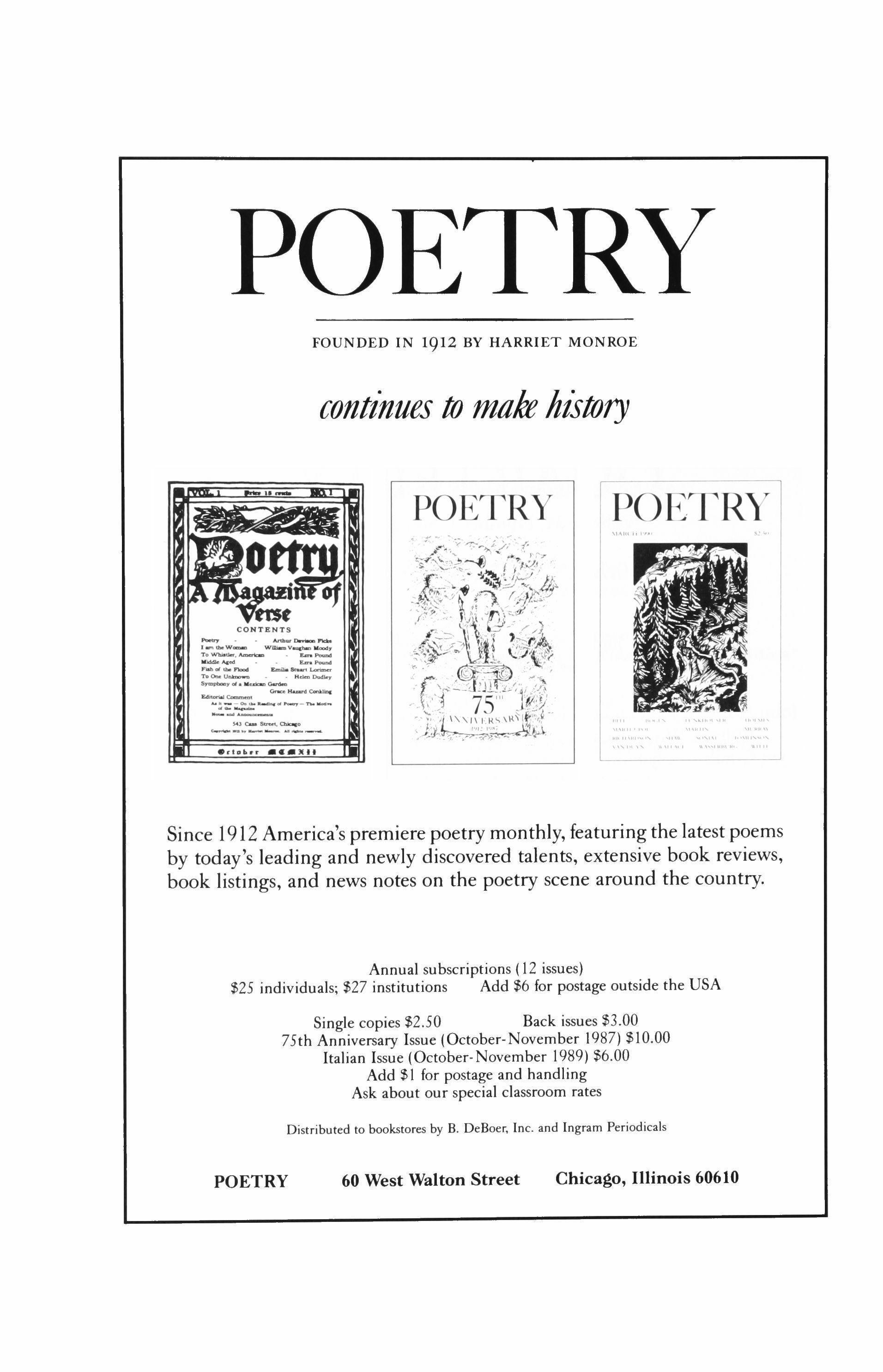
Since 1912 America's premiere poetry monthly, featuring the latest poems by today's leading and newly discovered talents, extensive book reviews, book listings, and news notes on the poetry scene around the country.
Annual subscriptions (12 issues)
$25 individuals; $27 institutions Add $6 for postage outside the USA
Single copies $2.50 Back issues $3.00 75th Anniversary Issue (October-November 1987) $10.00 Italian Issue (October-November 1989) $6.00 Add $1 for postage and handling
Ask about our special classroom rates
Distributed to bookstores by B. Deboer, Inc. and Ingram Periodicals POETRY 60 West Walton Street Chicago, Illinois 60610
POETRY
FOUNDED IN 1912 BY HARRIET MONROE
ToWbJ.Rlo<...............
�od �P<>und l"IaIIoitboPlDDd
S)"Cl>PbD<>yolallll"_Go;rdoQ �c:.-m.m
::':'==d�_n. SIolCuosu-..ou.:..o
Anb", 1JInoWan'_' I...,_W_ WllliamV_'-MOOdy
E.ao
E.mlI.ooSnoan� ThODoU Joiekno..dloy
c;.,...,,��
POETRY POETRY
Sky Over EI Nido
IIOIDIII 8W c. MI. MI.&WO
A worldly, modern Mexico-far from the gringo's manana-land of mariachis and margaritas-is revealed in many of these thirteen stories.
cloth
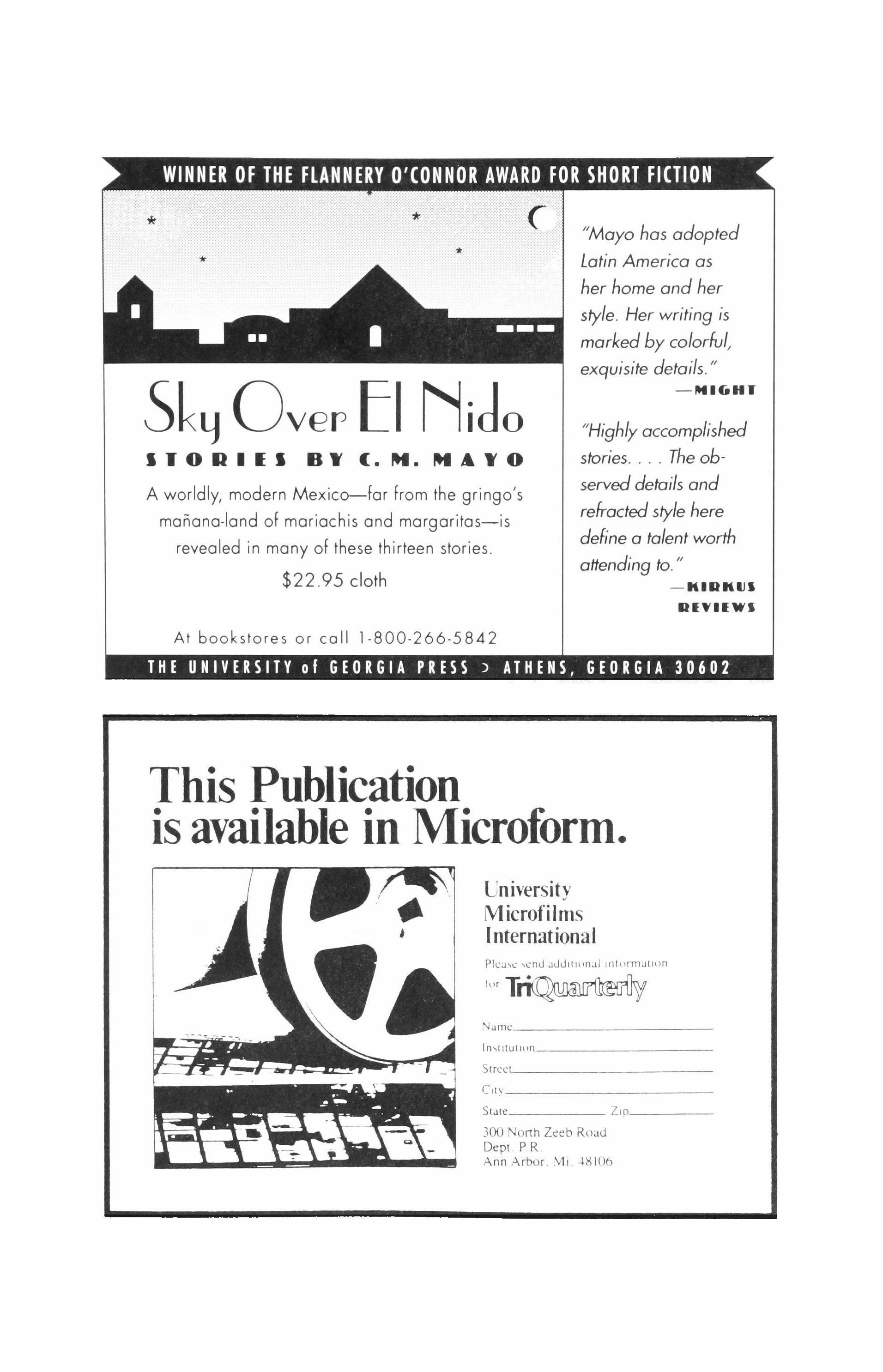
"Mayo has adopted Latin America as her home and her style. Her writing is marked by colorful, exquisite details."
-,",16HT
"Highly accomplished stories The observed details and refracted style here define a talent worth attending to."
-KllliUJI
In"IIE16'1
$22.95
At bookstores or coil 1-800-266-5842
THE UNIVERSITY of GEORGIA PRESS) ATHENS, GEORGIA 30602
This Publication is available in Microform. University Microfilms I nternationaI Numc In\(IIUIIPn S[rcc� Cuv S(..I(e Ztp 300 NOClh Zeeb Ro"d Dept P R. Ann Arbor
��l()b
.v1l.
TriQuarterly thanks the following past donors and life subscribers:
David C. Abercrombie
Mr. and Mrs. Walter L. Adams
Amin Alimard
Lois Ames
Richard H. Anderson
Roger K. Anderson
Sandy Anderson
I. N. C. Aniebo
Anonymous
University of Arizona Poetry Center
Gayle Arnzen
Michael Attas
Asa Baber
Hadassah Baskin
Tom G. Bell
Sandra Berris
Simon J. Blattner, Jr.
Mr. and Mrs. Andrew K. Block
Louise Blosten
Carol Bly
Susan DeWitt Bodemer
Kay Bonetti
Robert Boruch
Mr. and Mrs. Richard S. Brennan
Van K. Brock
Gwendolyn Brooks
Timothy Browne
Paul Bundy
Eric O. Cahn
David Cassak
Stephen Chapman
Anthony Chase
Michael Chwe
Willard Cook
Mr. and Mrs. William Cottle
Robert A. Creamer
Andrew Cyr
Doreen Davie
Kenneth Day
Mark W. DeBree
Elizabeth Des Pres
Anstiss Drake
J. A. Dufresne
Mr. and Mrs. Donald Egan
John B. Elliott
Christopher English
Carol Erickson
Steven Finch
David R. Fine
Mr. and Mrs. H. Bernard Firestone
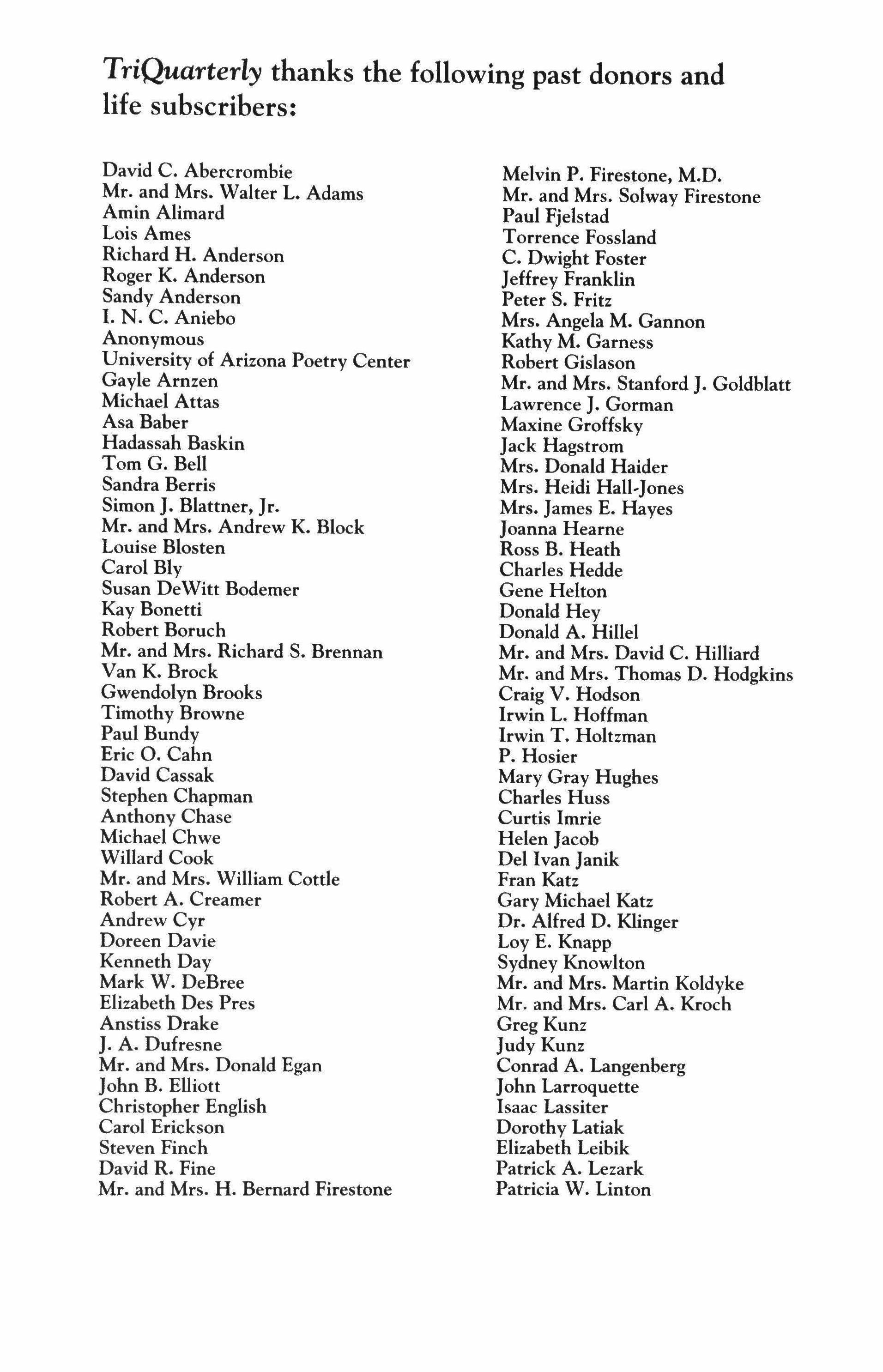
Melvin P. Firestone, M.D.
Mr. and Mrs. Solway Firestone
Paul Fjelstad
Torrence Fossland
C. Dwight Foster
Jeffrey Franklin
Peter S. Fritz
Mrs. Angela M. Gannon
Kathy M. Garness
Robert Gislason
Mr. and Mrs. Stanford J. Goldblatt
Lawrence J. Gorman
Maxine Groffsky
Jack Hagstrom
Mrs. Donald Haider
Mrs. Heidi Hall-Jones
Mrs. James E. Hayes
Joanna Hearne
Ross B. Heath
Charles Hedde
Gene Helton
Donald Hey
Donald A. Hillel
Mr. and Mrs. David C. Hilliard
Mr. and Mrs. Thomas D. Hodgkins
Craig V. Hodson
Irwin L. Hoffman
Irwin T. Holtzman
P. Hosier
Mary Gray Hughes
Charles Huss
Curtis Imrie
Helen Jacob
Del Ivan Janik
Fran Katz
Gary Michael Katz
Dr. Alfred D. Klinger
Loy E, Knapp
Sydney Knowlton
Mr. and Mrs. Martin Koldyke
Mr. and Mrs. Carl A. Kroch
Greg Kunz
Judy Kunz
Conrad A. Langenberg
John Larroquette
Isaac Lassiter
Dorothy Latiak
Elizabeth Leibik
Patrick A. Lezark
Patricia W. Linton
Philip Lister
Mr. and Mrs. W. J. Lorentz de Haas
Kubet Luchterhand
Ellen 1. Marks
Richard Marmulstein
James Marquardt
Charles T. Martin, Jr.
Ms. Jane Mayer
Kevin McCanna
Robert D. McChesney
Charles Gene McDaniel
Martin H. McGrath
Robert McMillan
Mr. and Mrs. Andrew McNally
Michael Meaney
George Meredith
Lois Adele Meyer
Cliff Michel Gallery
University of Michigan Hopwood Room
Michal Miller
Ralph Miller
Kenneth Monroe
William T. Morgan
Max Nathan
Dean Neprud
Fred S. Novv
Catherine Ohs
Lenrie Peters
Paul Peters and Rosemarie Kozdron
Scott Peters
Jane Petro
Lee Phillip
Mrs. Marlene Welsh Phillips
Evelyn Pine
Doyle Pitman
Fran Podulka
Geraldine R. Pratt
Alex T. Primm
Richard Prinz, M.D.
Honora Rankine-Galloway
Anne Kathervn Ream
J. M. Reese
Peter Reich
Susan Reiners
Don Reynolds
Mary Ellen Reynolds
Christopher Richter
Diane Rider
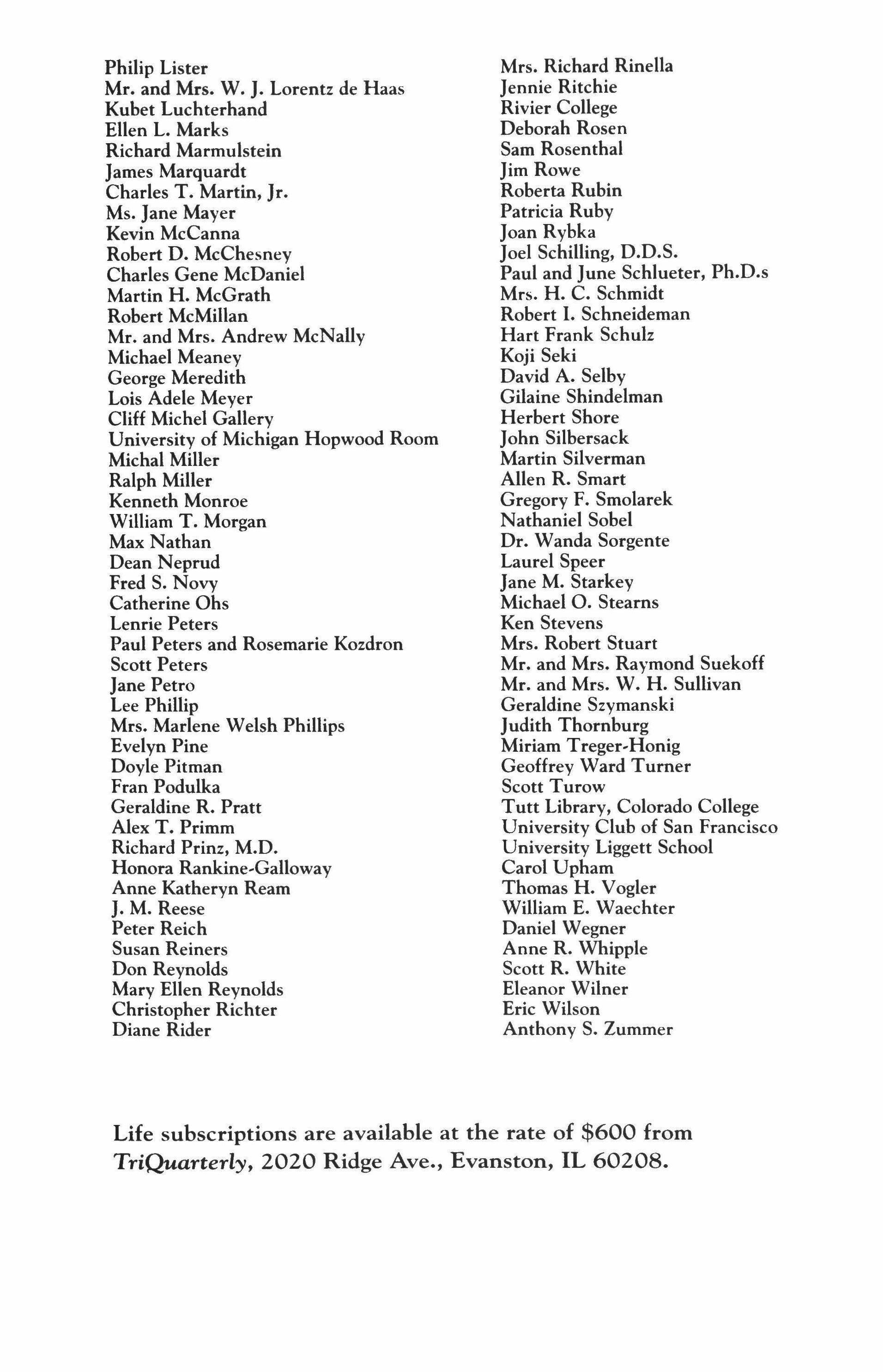
Mrs. Richard Rinella
Jennie Ritchie
Rivier College
Deborah Rosen
Sam Rosenthal
Jim Rowe
Roberta Rubin
Patricia Ruby
Joan Rybka
Joel Schilling, D.D.S.
Paul and June Schlueter, Ph.D.s
Mrs. H. C. Schmidt
Robert 1. Schneideman
Hart Frank Schulz
Koji Seki
David A. Selby
Gilaine Shindelman
Herbert Shore
John Silbersack
Martin Silverman
Allen R. Smart
Gregory F. Smolarek
Nathaniel Sobel
Dr. Wanda Sorgente
Laurel Speer
Jane M. Starkey
Michael O. Stearns
Ken Stevens
Mrs. Robert Stuart
Mr. and Mrs. Raymond Suekoff
Mr. and Mrs. W. H. Sullivan
Geraldine Szymanski
Judith Thornburg
Miriam Treger-Honig
Geoffrey Ward Turner
Scott Turow
Tutt Library, Colorado College
University Club of San Francisco
University Liggett School
Carol Upham
Thomas H. Vogler
William E. Waechter
Daniel Wegner
Anne R. Whipple
Scott R. White
Eleanor Wilner
Eric Wilson
Anthony S. Zummer
Life subscriptions are available at the rate of $600 from TriQuarterly, 2020 Ridge Ave., Evanston, IL 60208.
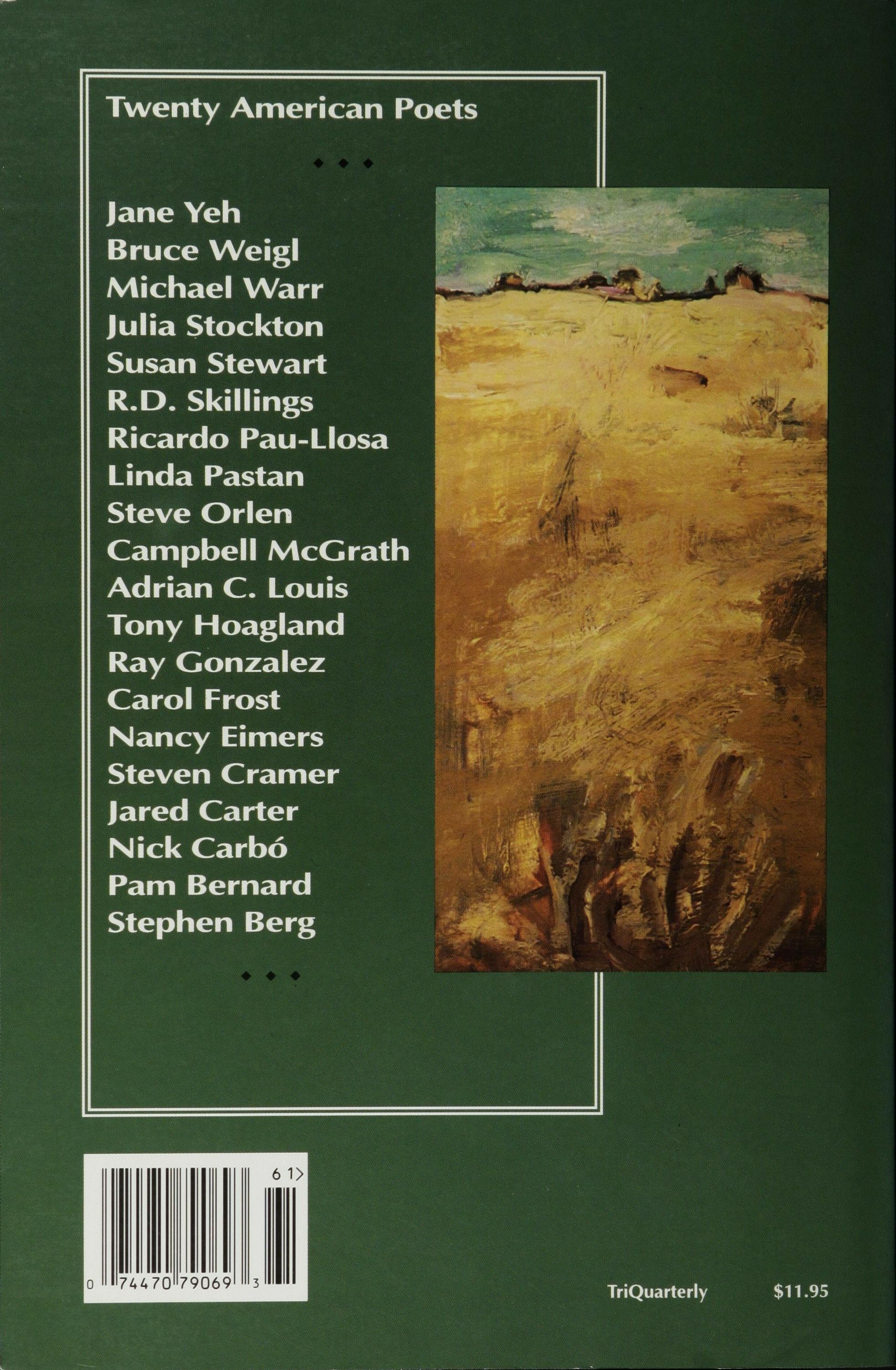







































































 Alexis Smith, Fruits 'n' Nuts (1990)
Alexis Smith, Fruits 'n' Nuts (1990)


























































 1
;\�OhJ\RCHf\ CASTUS MCHDUS
Alexis Smith, Bob White (1986)
1
;\�OhJ\RCHf\ CASTUS MCHDUS
Alexis Smith, Bob White (1986)










 Michael Warr
Michael Warr



 ]ulia Stockton
]ulia Stockton






















































































 for Denise
for Denise


































 James
James











